Dr. Ye’ Tun Lecturer
Dr. Wint Pa Pa Kyaw Professor
Dr Khin Myo Win Professor
Dr Khin Ma Ma Myo Professor
Dr Min Maung Maung Professor
Dr Khin Swe Oo Professor
Dr Ye Myint Aung Professor
Dr Aung Moe Khaing Professor
Dr Thwin Pa Pa Professor & Head
Dr Wint Thuzar Than Professor
Dr Thet Thet Naing Professor
Dr Theingi Kyaw Professor
Dr Sandar Win Professor
Dr Ohn Mar Oo Professor
Dr Saw Lin Oo Lecturer
Dr Khin Muyar Aung Professor
Daw Moet Moet Than Assistant Professor
Dr Wint War War Hlaing Professor
Dr. San San Khine Professor
Dr Myat Kyaw Thu Professor, Department of Chemistry
Dr Win Yu Khaing Assistant Lecturer
Dr Me Me Naing Professor
Dr Kalayar Myat Myat Htwe Professor
Dr. Lwin Mar Oo Professor
Dr Hnin Hnin Saw Hla Maung Professor
Dr Cho Cho Thet Professor Dept of Physics
Dr Nwe Ni Win Professor
U Pyae Sone Oo Tutor
Dr Thin Thin Soe Associate Professor
Dr Aye Aye Khaing Professor
Dr. Maung Maung Hla Professor
Dr San San Oo Professor
Daw Ni Ni Aung Associate Professor
Dr Thet Thet Hlaing Professor
Dr Khin Sandar Myint Associate Professor
Dr. Khin Thandar Oo Associate Professor
Dr Nyein Thida Professor
Dr Su Su Kyi Professor
Dr San San Aye Professor, Department of Chemistry
Prof. Dr Ohn Mar Khin Professor
Dr Myint Thida Professor
Dr Khin Si Win Professor
Daw Khaing May Thu Tutor
Dr Shwe Sin Oo Associate Professor
Dr Aung Kyaw Myat Professor
Dr Khin Wai Hlaing Professor
Daw Khin Moe Moe Kyu Associate Professor
Dr Pyiet Phyo Kyaw Professor
Daw Padauk Wah Assistant Lecturer
Daw Aint Thin Zar Kyaw Lecturer
Dr Zin Zin Htet Aung Lecturer
Dr Khin Khin Soe Associate Professor
Dr Thida Oo Associate Professor
Dr Min Soe Professor
Dr Seinn Lei Lei Phyu Associate Professor
Dr Lwin Mar Saing Professor
Dr Sann Sann Shein Professor
Dr Ohn Mar Swe Associate Professor
Dr Tin Myo Myo Swe Professor
U Zahit Hussein Associate Professor
Dr Khin Lay Nwe Professor
Dr Nyan Tun Professor
Dr Thazin Oo Demonstrator
Daw Su Myat Thwin Lecturer
U Toe Toe Tutor
Dr Mya Thandar Aung Associate Professor
Dr Nan Hlaing Professor
Dr. Su Su Mon Associate Professor
Daw Thandar Sein Lecturer
Dr Thet Thet Mar Win Professor, Department of Botany
Dr Zin Mar Win Associate Professor
Dr San San Win Professor
Daw Tin Myat Latt Associate Professor
Dr Aye Aye Khine Professor
Daw Hnin Wutyi Phoo Demonstrator
Daw Su Thandar Aung Lecturer
Daw Moe Thandar Soe Tutor
Dr. Ko Myint Associate Professor
Daw Tin Tin Khine Tutor
U Soe Min Aung Lecturer
Dr Yee Mun Than Associate Professor
Dr.Wai Wai Thein Associate Professor
Dr Thazin Hlaing Associate Professor
Dr. Myint Zu Win Associate Professor
Dr Khine Khine Linn Associate Professor
Dr Cho Cho Sein Professor
Daw San Myint Tin Demonstrator
U Soe Win Than Tutor
Dr Hay Mar Aung Kyaw Demonstrator
Dr Myo Kyaw Hlaing Lecturer
Daw Thu Zar Khaing Tutor
Dr Tin Lay Mon Associate Professor
Daw Lwin Cho Latt Associate Professor
Dr Yin Yin Su Win Professor
Dr Khin Ei Ei Thein Associate Professor
Dr Win Thi Yein Lecturer
Dr Aye Aye Swe Associate Professor
Dr Thin Yu Naing Lecturer
Dr Ni Ni Win Professor
Daw Pwint Phyu Khine Demonstrator
Daw Aye Aye Swe Associate Professor
Dr Aye Thandar Associate Professor
Dr Ni Ni Htun Associate Professor
Dr Myo Myo Tun Associate Professor
Dr Nay Yee Nyunt Oo Lecturer
Dr Chaw Chaw Su win Associate Professor
Dr Thazin Htet Tin Assistant Lecturer
Dr Nwe Nwe Aye Associate Professor
Daw Nyo Mar Soe Tutor
U Thant Zaw Moe Assistant Lecturer
Dr. Wah Wah Aung Associate Professor
Dr Myint Sandar Win Associate Professor
Dr Cho Cho Thin Associate Professor
Daw Nwe Nwe Tun Lecturer
Dr Swe Swe Aye Associate Professor
Dr Chan Nyein Aung Associate Professor
Daw Phyu Phyu Aung Assistant Lecturer
Dr Thida Myint Professor
Dr Swe Sint Lecturer
Dr Nwe Nwe Moe Lecturer
Daw Win Win Aung Lecturer
Daw Aye Aye Kyu Lecturer
Dr Nwet Nwet Aung Lecturer
Daw Phyu Phyu Win Lecturer
Dr Zar Yie Win Lecturer
Dr Oak Soe San Lecturer
Dr Hnin Aye Phyo Tutor
U Than Tun Aung Lecturer
Dr San Yu Kyi Associate Professor
Daw Win Pa Pa Lwin Tutor
Daw Htet Htet Lyin Lecturer
Daw Thidar Kyaw Lecturer
Daw Pan Ei Khaing Soe Tutor
U Aung Khaing Lecturer
Dr Mya Phyu Moe Associate Professor
Dr. Ei Ei Phyu Lecturer
Dr Thet Oo Zan Lecturer
Daw Yu Yu Aye Lecturer
Daw Yamin Thet Lecturer
Dr Yin Yin Khine Associate Professor
Dr Khin San Yu, Lecturer, Department of Geography
Daw Aye Aye Cho Lecturer
Dr. Khin Hninn Wint Kyaw Lecturer
Dr Kyawt Kyawt Khine Than Lecturer
Daw Aye Ei Ei Aung Than Lecturer
Daw Khin Nyein Chan Thaw Tutor
Daw Thant Thant Phone Lecturer
Dr Aye Aye Cho Lecturer
Dr Ni Zin Soe Associate Professor
Dr Saw Thanda, Lecturer, Department of Geography
Daw Aye Aye Oo Lecturer
Dr Thet Thet Swe Lecturer
Daw Thwin Hnin Hlaing Lecturer
Dr Khine Zar Ni Lecturer
Daw Aye Aye Thant Lecturer
Daw Htwe Htwe Khaing Lecturer
Daw Kay Khine Wint Tutor
U Hein Myat Thu Assistant Lecturer
Dr. May Thu Rein Oo Lecturer
Dr Ni Ni Aye Lecturer
Dr Yin Yawai Phoo Assistant Lecturer
Daw Soe Mi Mi Lecturer
U Win Htut Lecturer
Dr Kathy Myint Lecturer
Daw Thwe Thwe San Tutor
Dr July Maung Maung Lecturer
Daw Khin Than Naing Soe Lecturer
Daw Khin Chue Chue Lwin Lecturer
Dr Cho Cho Aye Lecturer
Dr. Thu Zar Tin Lecturer
Daw Nem Sian Man Lecturer
Daw Margret Hkawn Tawn Lecturer
Dr May Kalayar Kyaing Lecturer
U Phyo Aung Lecturer
U Phyo Min Assistant Lecturer
Dr Sandar Aung Assistant Lecturer
Dr Amy Aung Lecturer
Daw Kay Khaing Lwin Lecturer
Daw Khin Moh Moh Tutor
Dr Win Ko Ko Lecturer
Daw Aye Aye Khine Lecturer
Daw Htet Htet Lin Lecturer
Daw Eh Moo Ra Moo Tutor
Dr Lay Ngone Lecturer
Dr Oak Kar Shin Assistant Lecturer
Dr Swe Swe Win Lecturer
Dr Tin Myo Han Lecturer
Daw Thazin Htet Tin Demonstrator
Dr Yu Par Kyaw Lecturer
Dr Khin Nwe win Lecturer
Daw May Thet Toe Assistant Lecturer
Dr Jue Jue Khin Assistant Lecturer
U Zayar Kyaw Lecturer
Dr Khin Ni Maw Aung Lecturer
Daw Aye Aye Chan Assistant Lecturer
Dr Aye Aye Myat Demonstrator
Dr Myat Thuzar Lecturer
Daw Aye Mya Phyu Assistant Lecturer
Dr Khin Aye Aye San Lecturer
Daw Ngwe Sin Demonstrator
Dr Wai Yan Lai Aung Demonstrator
Daw Wai Mar Phyo Assistant Lecturer
Daw Pann Myat Shwe Yee Demonstrator
Daw San Thu Zar Aye Demonstrator
Dr Soe Soe Naing Lecturer
Daw Kay Khine Win Swe Demonstrator
U Ba Thwin Part Time Professors
Daw Khin Nyein Aye Demonstrator
Daw May Phyo Tun Demonstrator
Daw Nyein Nyein Nwe Assistant Lecturer
Prof. Daw Wai Wai Kyi Part Time Professors
Daw Nyein Nyein Thwe Demonstrator
Daw Nyein Ei Ei Kyaw Demonstrator
Daw Khin May Than Assistant Lecturer
Daw Aye Chan Khin Assistant Lecturer
Daw Pont Pont Demonstrator
Daw May Thazin Kyaw Demonstrator
Daw Wai Wai Soe Assistant Lecturer
Daw Cho Cho Myo Aung Assistant Lecturer
Daw Zin Mar Hmwe Demonstrator
Dr Htun Ei Ei Zar win Demonstrator
Daw Aye San Myint Demonstrator
Daw Moh Moh Win Demonstrator
Dr Khin Ohn Myint Lecturer
Daw Thet Lel Tutor
Daw San Htet San Demonstrator
Daw Ei Ei Min Demonstrator
Dr Cho Cho Lecturer
Daw May Moe Kabyar Maung Totor
U Kyaw Naing Than Demonstrator
Daw Mar Cho Demonstrator
Dr Khin Lay Thwe Lecturer
U Saw Soe Moe Thu Demonstrator
U Than Zin Htoo Demonstrator
U Myo Naing Demonstrator
Daw Aye Aye Lwin Demonstrator
Daw Mya Phyo Nandar Demonstrator
Daw Win Pa Pa Phyo Demonstrator
Daw Aye Chan Thu Demonstrator
Daw Aye Myat Myat Phyo Demonstrator
Daw Mya Thein Nwe Demonstrator
Daw Win Htet Htet Moe Demonstrator
Daw Yei Mon Thein Demonstrator
Daw Cho Cho Tun Demonstrator
Dr Pan Myat Nge Lecturer
Daw Soe Paing Paing Oo Demonstrator
U Sithu Aung Min Assistant Lecturer
Daw Soe Soe Yu Hnin Assistant Lecturer
Dr Hnin Wit Mhone Assistant Lecturer
Daw Phoo Wint Yee Thaw Assistant Lecturer
ရန်ကုန်တက္ကသိုလ်တွင် ၂၀၁၈-၂၀၁၉ ပညာသင်နှစ်အတွက် ပါရဂူဘွဲ့ (PhD) သင်တန်းကို အောက်ဖော်ပြပါ အထူးပြု ဘာသာရပ်များဖြင့် ဖွင့်လှစ် သင်ကြားပေးမည်ဖြစ်ပါသည် –
(က) မြန်မာစာ
(ခ) အင်္ဂလိပ်စာ
(ဂ) ပထဝီဝင်
(ဃ) သမိုင်း
(င) ဒဿနိကဗေဒ
(စ) စိတ်ပညာ
(ဆ) ဥပဒေပညာ
(ဇ) အရှေ့တိုင်းပညာ
(ဈ) နိုင်ငံတကာဆက်ဆံရေးပညာ
(ည) မနုဿဗေဒ
(ဋ) ရှေးဟောင်းသုတေသနပညာ
(ဌ) စာကြည့်တိုက်နှင့်သုတပညာ
(ဍ) ဓာတုဗေဒ
(ဎ) ရူပဗေဒ
(ဏ) သင်္ချာ
(တ) သတ္တဗေဒ
(ထ) ရုက္ခဗေဒ
(ဒ) ဘူမိဗေဒ
(ဓ) ကုန်ထုတ်ဓာတုဗေဒ
(န) ကွန်ပျူတာသိပ္ပံပညာ
(ပ) အဏုဇီဝဗဒ
၂။ ပါရဂူဘွဲ့ (PhD) သင်တန်းတက်ရောက်ရန် အောက်ပါသတ်မှတ်ချက်များနှင့် ပြည့်စုံသူများ လျှောက်ထား နိုင်ပါသည် –
(က) ပါရဂူဘွဲ့သင်တန်းတက်ရောက်ခွင့် လျှောက်ထားသူသည် ပြည်ထောင်စုသမ္မတ မြန်မာနိုင်ငံသား ဖြစ်ရမည်။
(ခ) ၂၀၁၈ ခုနှစ်၊ ဇွန်လ (၁) ရက်နေ့တွင် အသက် (၃၀) နှစ်ထက် မကျော်လွန်သူဖြစ်ရမည်။
(လုပ်ငန်းခွင်အတွေ့အကြုံရှိသူများကို အသက်ကန့်သတ်ချက် လျှော့ပေါ့စဉ်းစားမည်။)
(ဂ) ပါရဂူဘွဲ့အကြိုသင်တန်းကို အချိန်ပြည့်တစ်နှစ် တက်ရောက်နိုင်သူဖြစ်ရမည်။
(ဃ) ဝင်ခွင့်လျှောက်ထားသူ၏ အရည်အချင်းသတ်မှတ်ချက်များမှာ အောက်ပါအတိုင်း ဖြစ်ပါသည်-
ပညာရေးဝန်ကြီးဌာနဝန်ထမ်းများအတွက်
(၁) အသိအမှတ်ပြုထားသော တက္ကသိုလ်တစ်ခုခုမှ မိမိလျှောက်ထားလိုသော ဘာသာရပ် နယ်ပယ်၌ အနိမ့်ဆုံး မဟာဘွဲ့ အောင်မြင်သူ ဖြစ်ရမည်။ ဘာသာရပ်ဆိုင်ရာ (၃) နာရီ မေးခွန်းနှင့် အင်္ဂလိပ်စာ (၃) နာရီမေးခွန်း ဝင်ခွင့်စာမေးပွဲဖြေဆို အောင်မြင်ပြီး လူတွေ့စစ်ဆေးခြင်းအောင်မြင်သူများကိုသာ လက်ခံမည်။
(၂) အသိအမှတ်ပြု တက္ကသိုလ်တစ်ခုခုမှ မဟာသုတေသနဘွဲ့ ရရှိထားသူများသည် (ဝင်ခွင့် စာမေးပွဲ ဖြေဆိုရန်မလိုပါ) လူတွေ့စစ်ဆေးခြင်းကို ဖြေဆိုအောင်မြင်ရမည်။
(၃) တက္ကသိုလ်၊ ဒီဂရီကောလိပ်များမှ နည်းပြ၊ သရုပ်ပြ ဖြစ်ပါက နည်းပြ၊ သရုပ်ပြ ရာထူးတွင် လုပ်သက် (၁) နှစ် အနည်းဆုံးရှိရမည်။
(၄) တက္ကသိုလ်၊ ဒီဂရီကောလိပ်များမှ ဆရာ၊ ဆရာမ မဟုတ်သော ပညာရေး ဝန်ထမ်းများဖြစ်လျှင် နည်းပြ၊ သရုပ်ပြနှင့်အဆင့်တူရာထူးတွင် လုပ်သက် (၂) နှစ် အနည်းဆုံး ရှိသူဖြစ်ရမည့်အပြင် လျှောက်ထားသူသည် သုတေသနဆိုင်ရာ လုပ်ငန်းဆောင်ရွက်နေသူဖြစ်ပြီး ပါရဂူဘွဲ့သင်တန်း တက်ရောက်ခွင့်ပြုခြင်းဖြင့် ဌာနဆိုင်ရာလုပ်ငန်းတွင် တိုက်ရိုက်အကျိုးပြုနိုင်ကြောင်း သက်ဆိုင်ရာဌာနဆိုင်ရာ အကြီးအကဲက ထောက်ခံသူဖြစ်ရမည်။
(၅) ပါရဂူကြိုသင်တန်းတက်ရောက်ခွင့်ရရှိပါက သက်ဆိုင်ရာဦးစီးဌာန ညွှန်ကြားရေးမှူးချုပ် (သို့မဟုတ်) သက်ဆိုင်ရာတက္ကသိုလ်၊ ဒီဂရီကောလိပ်၊ ပါမောက္ခချုပ်၊ ကျောင်းအုပ်ကြီးထံမှ အချိန်ပြည့် (၁) နှစ် တက်ရောက်ခွင့်ပြုနိုင်ကြောင်း ထောက်ခံစာတင်ပြရမည်။
အခြားဝန်ကြီးဌာနဝန်ထမ်းများအတွက်
(၁) အသိအမှတ်ပြုထားသော တက္ကသိုလ်တစ်ခုခုမှ မိမိလျှောက်ထားလိုသော ဘာသာရပ် နယ်ပယ်၌ အနိမ့်ဆုံးမဟာဘွဲ့အောင်မြင်သူ ဖြစ်ရမည်။ ဘာသာရပ်ဆိုင်ရာ (၃) နာရီမေးခွန်းနှင့် အင်္ဂလိပ်စာ (၃) နာရီမေးခွန်း ဝင်ခွင့်စာမေးပွဲဖြေဆို အောင်မြင်ပြီး လူတွေ့စစ်ဆေးခြင်း အောင်မြင်သူများကိုသာလက်ခံမည်။
(၂) အသိအမှတ်ပြု တက္ကသိုလ်တစ်ခုခုမှ မဟာသုတေသနဘွဲ့ ရရှိထားသူများသည် (ဝင်ခွင့် စာမေးပွဲဖြေဆိုရန် မလိုပါ) လူတွေ့စစ်ဆေးခြင်းကို ဖြေဆိုအောင်မြင်ရမည်။
(၃) အနိမ့်ဆုံး နည်းပြ၊ သရုပ်ပြ (သို့မဟုတ်) ယင်းနှင့်အဆင့်တူ ရာထူးတွင် လုပ်သက် (၂) နှစ် အနည်းဆုံး ရှိရမည်။
(၄) ပါရဂူကြို သင်တန်းတက်ရောက်ခွင့်ရရှိပါက သက်ဆိုင်ရာ ညွှန်ကြားရေးမှူးချုပ်ထံမှ အချိန်ပြည့် (၁) နှစ် တက်ရောက်ခွင့်ပြုကြောင်း ထောက်ခံစာတင်ပြရမည်။
နိုင်ငံ့ဝန်ထမ်းမဟုတ်သူများအတွက်
အသိအမှတ်ပြုထားသော တက္ကသိုလ်တစ်ခုခုမှ မိမိလျှောက်ထားလိုသော ဘာသာရပ် နယ်ပယ်၌ အနိမ့်ဆုံးမဟာသုတေသနဘွဲ့ ရရှိပြီးသူဖြစ်ရမည်။ မဟာသုတေသနဘွဲ့ အတွက် ပြုလုပ်ခဲ့သော သုတေသနအကျဉ်းချုပ်နှင့် ပါရဂူဘွဲ့သင်တန်းတွင် ဆောင်ရွက်လိုသော သုတေသန နယ်ပယ်အဆိုပြုချက် (ကွန်ပျူတာစာစီ၍ စာမျက်နှာ (၃) မျက်နှာ ထက်မပိုသော) ကို လျှောက်လွှာနှင့်အတူ ပူးတွဲတင်ပြရမည်။ လူတွေ့စစ်ဆေးခြင်းကို ဖြေဆိုအောင်မြင်ရမည်။
၃။ ရန်ကုန်တက္ကသိုလ် ကျောင်းသားရေးရာဌာနတွင် သတ်မှတ်ထားသည့် လျှောက်လွှာပုံစံဖြင့် ၁၈-၅-၂၀၁၈ ရက် (သောကြာနေ့) နောက်ဆုံးထား လျှောက်ထားရမည်။
၄။ လျှောက်ထားသူများသည် ရန်ကုန်တက္ကသိုလ်တွင် ပါရဂူဘွဲ့ (PhD) သင်တန်းဝင်ခွင့် စာမေးပွဲကို အောက်ပါ အတိုင်း ဝင်ရောက်ဖြေဆိုရမည်။
(က) ၂၁-၅-၂၀၁၈ (တနင်္လာနေ့) ၀၉းဝ၀ နာရီမှ ၁၂းဝ၀ နာရီ သက်ဆိုင်ရာဘာသာရပ်
(ခ) ၂၂-၅-၂၀၁၈ (အင်္ဂါနေ့) ၀၉းဝ၀ နာရီမှ ၁၂းဝ၀ နာရီ အင်္ဂလိပ်စာဘာသာရပ်
၅။ ရေးဖြေစာမေးပွဲ အောင်မြင်သူများနှင့် မဟာသုတေသနဘွဲ့ရရှိထားသူများကို ၂၈-၅-၂၀၁၈ ရက် (တနင်္လာနေ့)တွင် လူတွေ့စစ်ဆေးမည်။
၆။ အသေးစိတ်အချက်အလက်များကို ဘာသာရပ်နှင့်စပ်လျဉ်း၍ သက်ဆိုင်ရာဘာသာရပ် ပါမောက္ခ(ဌာနမှူး)များ ထံတွင်လည်းကောင်း၊ သင်တန်းဝင်ခွင့်နှင့်စပ်လျဉ်း၍ သက်ဆိုင်ရာ မော်ကွန်းထိန်း (ဖုန်းနံပါတ်-၅၃၄၉၀၈၊ ၅၃၄၃၉၀) ထံတွင်လည်းကောင်း စုံစမ်းနိုင်ပါသည်။
SHARE is thrilled to announce that we are delighted to cooperate with the Ministry of Education, Myanmar to organise the forthcoming Policy Dialogue 9 – The Second ASEAN Student Mobility Forum that will take place on 28-29 August 2018 in Yangon, Myanmar. The Forum will bring together ASEAN students and graduates who are recipients of SHARE scholarship in ASEAN institutions or other related initiatives. Participation will be selected by SHARE team through special assessment. More information coming soon. #ASEANstudentmobilityforum #2ndASEANstudentmobilityforum #ASEANstudents #SHAREawardees #SHAREscholarship #SHAREprogramme #PolicyDialogue #HigherEducation #EUASEAN
more detail – www.facebook.com/SHAREprogramme
dfadsgvsfdgfd dvbfdgdsfgsdf
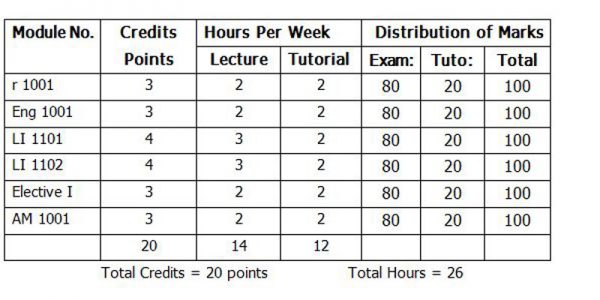
Foundation Courses
မ ၁၀ဝ၁ ျမန္မာစာ
Eng 1001 English
Core Courses
LI 1101 History of Alphabets: Books and Libraries
LI 1102 Organization of Knowledge: Cataloguing and Classification
Elective Courses*
Geog 1003 Geography of Southeast Asian Countries
Hist 1001 Introduction to Myanmar Civilization I
Hist 1002 Renaissance Italy (14th Century to 15th Century)
Hist 1003 World History to 1500 I
မ ၁၀ဝ၃ ျမန္မာ့ဇာတိမာန္စာေပ(၁)
မ ၁၀ဝ၄ ျမန္မာစကားပံုႏွင့္ဆိုရိုးစကားမ်ား(၁)
မ ၁၀ဝ၅ ျမန္မာရိုးရာပံုျပင္(၁)
OS 1001 Fundamentals of Pali Language
OS 1002 Fundamentals of Sanskrit Language
OS 1003 Buddhist Culture
OS 1004 Buddhist Ethnic
Phil 1002 Ethical Values in Myanmar Society
Psy 1001 Psychology of Adolescence
Psy 1002 Child Psychology
Psy 1004 General Psychology (I)
AM 1001 Aspects of Myanmar
Elective Courses (for other Specialization)
LI 1001 Information Sources of Library (Part I)
LI 1002 Data Finding Methods (Part I)
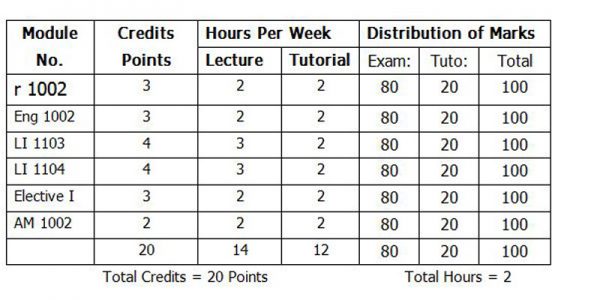
Foundation Courses
မ ၁၀ဝ၂ ျမန္မာစာ
Eng 1002 English
Core Courses
LI 1103 History of Alphabets: Books and Libraries
LI 1104 Organization of Knowledge: Cataloguing and Classification
Elective Courses*
Geo 1004 Geography of Myanmar
Hist 1004 Introduction to Myanmar Civilization II
Hist 1005 Reformation Europe (1450-1650)
Hist 1006 World History to 1500 II
မ ၁၀ဝ၆ ျမန္မာ့ဇာတိမာန္စာေပ(၂)
မ ၁၀ဝ၇ ျမန္မာစကားပံုႏွင့္ဆိုရိုးစကားမ်ား(၂)
မ ၁၀ဝ၈ ျမန္မာရိုးရာပံုျပင္(၂)
OS 1005 Pali Language
OS 1006 Sanskrit Language
OS 1007 Pali Literature
OS 1008 History of Buddhism
Phil 1004 Ethical Values in Myanmar Society
Psy 1005 Understanding Human Interaction
Psy 1006 Nervous System and Behaviour
Psy 1007 General Psychology (II)
AM 1002 Aspects of Myanmar
Elective Courses (for other Specialization)
LI 1003 Information Sources of Library (Part II)
LI 1004 Data Finding Methods (Part II)
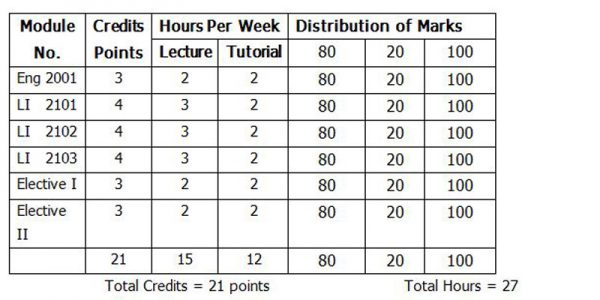
Foundation Courses
Eng 2001 English
Core Courses
LI 2101 Organization of Knowledge: Basic Cataloguing
LI 2102 Organization of Knowledge: Basic Classification
LI 2103 Information Sources
Elective Courses*
Hist 2001 History of Science and Technology I
Hist 2002 World History 1900 to Present I
Eng 2003 Communicative Skill
Eng 2005 Myanmar Literature in English
Law 2003 Introduction to International Law
မ ၂၀ဝ၃ ျမန္မာ့ေက်းလက္ေတးကဗ်ာမ်ား (၁)
မ ၂၀ဝ၄ ျမန္မာအမ်ိဳးသမီးစာဆိုမ်ားႏွင့္၄င္းတို႔၏စာမ်ား(၁)
မ ၂၀ဝ၅ ျမန္မာကေလးစာေပ (၁)
မ ၂၀ဝ၆ ျမန္မာစကားေျပအေရးအသားပံုစံမ်ား (၁)
OS 2001 Pali Language
OS 2002 Buddhadassana
OS 2003 Pali Literature (Prose)
OS 2004 Buddhist Councils
OS 2005 Pali Philosophy
Psy 2001 Language and Thought
Psy 2002 The Development of Self Concept
Psy 2003 Occupational Psychology (I)
Phil 2001 History of Western Intellectual Development
Elective Courses (for other Specialization)
LI 2001 Effective Use of Information Center
LI 2002 Libraries in Myanmar Society
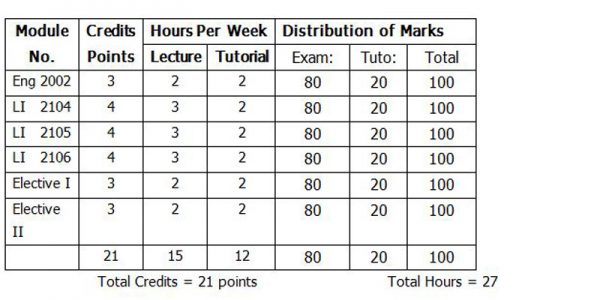
Foundation Courses
Eng 2002 English
Core Courses
LI 2104 Organization of Knowledge: Basic Cataloguing
LI 2105 Organization of Knowledge: Basic Classification
LI 2106 Information Sources
Elective Courses*
Geog 2004 Political Geography
Hist 2004 History of Science and Technology II
Hist 2005 World History 1900 to Present II
Law 2005 Asian Documentation
Law 2006 Sources of International Law
မ ၂၀ဝ၇ ျမန္မာ့ေက်းလက္ေတးကဗ်ာမ်ား (၂)
မ ၂၀ဝ၈ ျမန္မာအမ်ိဳးသမီးစာဆိုမ်ားႏွင့္၄င္းတို႔၏စာမ်ား(၂)
မ ၂၀ဝ၉ ျမန္မာကေလးစာေပ (၂)
မ ၂၀၁၀ ျမန္မာစကားေျပအေရးအသားပံုစံမ်ား (၂)
OS 2006 Pali Language
OS 2007 Buddhadassana
OS 2008 Pali Literature Poetry
OS 2009 Buddhadassana
OS 2010 Buddhist Councils
Psy 2004 Stress and Stress Management
Psy 2005 Individual, Social and Cultural Diversity in Pro and Antisocial Verhaviour
Psy 2006 Occupational Psychology (II)
Eng 2004 Developing Communicative Skills
Phil 2006 History of Western Intellectual Development
Elective Courses (for the Specialization)
LI 2003 Effective Use of Information Center
LI 2004 Libraries in Myanmar Society
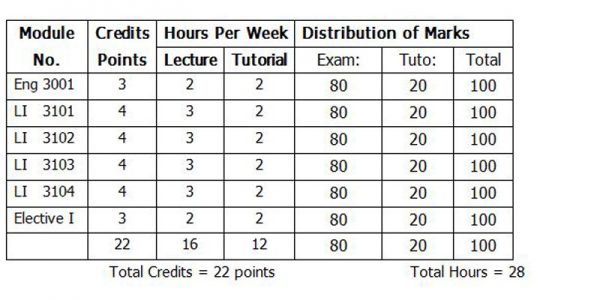
Foundation Courses
Eng 3001 English
Core Courses
LI 3101 Organization of Knowledge: Basic Cataloguing
LI 3102 Organization of Knowledge: Basic Classification
LI 3103 Information Sources: General and Specialized Subjects
LI 3104 Building Library Collection
Elective Courses*
LI 3105 Preservation and Conservation of Library Materials
LI 3106 Development of Myanmar Library
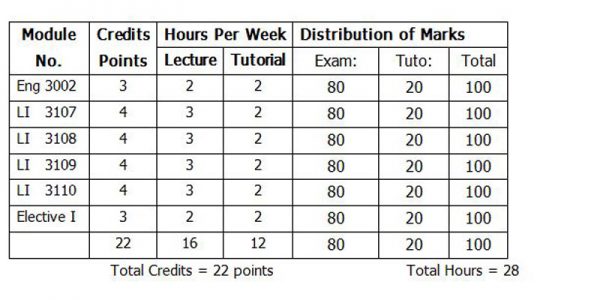
Foundation Courses
Eng 3002 English
Core Courses
LI 3107 Organization of Knowledge: Basic Cataloguing
LI 3108 Organization of Knowledge: Basic Classification
LI 3109 Information Sources: General and Specialized Subjects
LI 3110 Building Library Collection
Elective Courses*
LI 3111 Preservation and Conservation of Library Materials
LI 3112 Development of Myanmar Library

Foundation Courses
Eng 4001 English
Core Courses
LI 4101 Organization of Knowledge: Advanced Cataloguing
LI 4102 Organization of Knowledge: Advanced Classification
LI 4103 Information Sources and Services
LI 4104 Research Methods in Library Profession
Elective Courses*
LI 4105 Intellectual Properties in Library Profession
LI 4106 Contemporary World Library

Foundation Courses
Eng 4002 English
Core Courses
LI 4107 Organization of Knowledge: Advanced Cataloguing
LI 4108 Organization of Knowledge: Advanced Classification
LI 4109 Information Sources and Services
LI 4110 Research Methods in Library Profession
Elective Courses*
LI 4111 Library Practical Training
LI 4112 Contemporary World Library
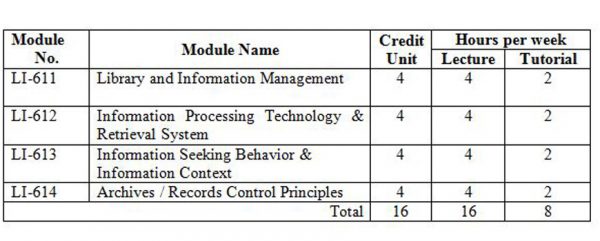
Module Name Library and Information Services Management
References
Module Name Information Processing Technology & Retrieval System
References
Module Name Information Seeking Behavior and Information Context
References:
Module Name Archives / Records Control Principles
References
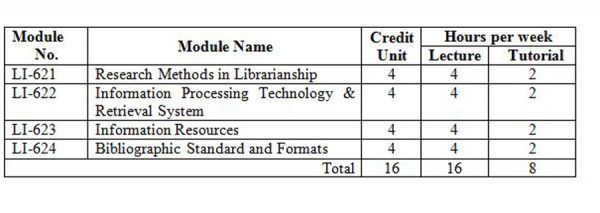
Module Name Research Methods in Librarianship
References
Module Name Information Processing Technology & Retrieval System
References
Module Name Information Resources
References
Module Name Bibliographic Standards and Formats
References
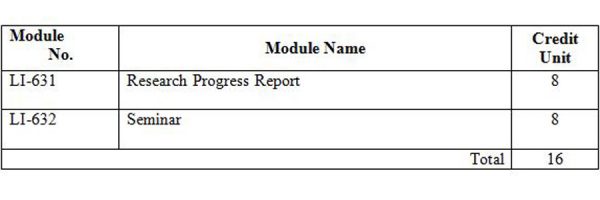




Foundation Courses
Eng 3001 English
Core Courses
LI 3201 Organization of Knowledge: Basic Cataloguing
LI 3202 Organization of Knowledge: Basic Classification
LI 3203 Information Sources: General and Specialized Subjects
LI 3204 Building Library Collection
Elective Courses*
LI 3205 Preservation and Conservation of Library Materials
LI 3206 Development of Myanmar Library
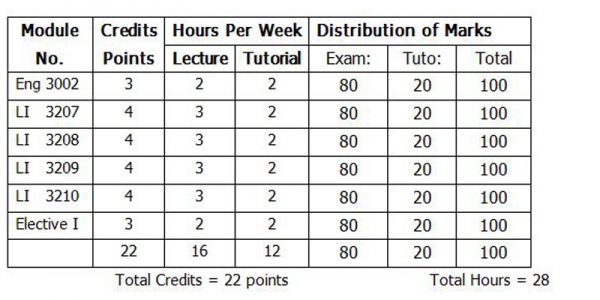
Foundation Courses
Eng 3002 English
Core Courses
LI 3207 Organization of Knowledge: Basic Cataloguing
LI 3208 Organization of Knowledge: Basic Classification
LI 3209 Information Sources: General and Specialized Subjects
LI 3210 Building Library Collection
Elective Courses*
LI 3211 Preservation and Conservation of Library Materials
LI 3212 Development of Myanmar Library
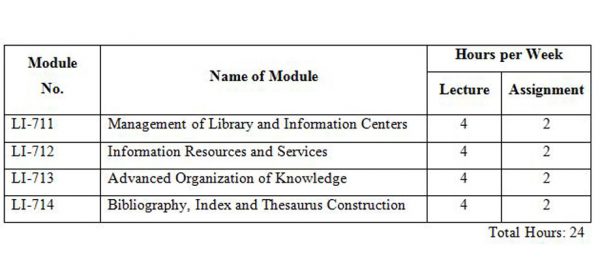
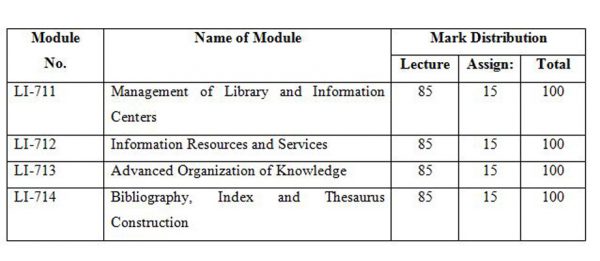
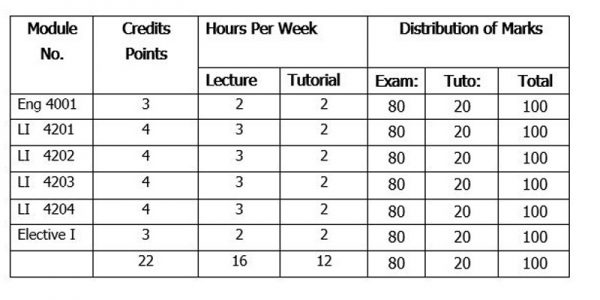
Foundation Courses
Eng 4001 English
Core Courses
LI 4201 Organization of Knowledge: Advanced Cataloguing
LI 4202 Organization of Knowledge: Advanced Classification
LI 4203 Information Sources and Services
LI 4204 Research Methods in Library Profession
Elective Courses*
LI 4205 Intellectual Properties in Library Profession
LI 4206 Contemporary World Library
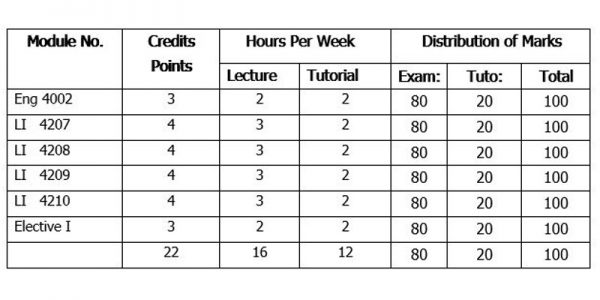
Foundation Courses
Eng 4002 English
Core Courses
LI 4207 Organization of Knowledge: Advanced Cataloguing
LI 4208 Organization of Knowledge: Advanced Classification
LI 4209 Information Sources and Services
LI 4210 Research Methods in Library Profession
Elective Courses*
LI 4211 Library Practical Training
LI 4212 Contemporary World Library

Core Courses
LI 5201 Advanced Cataloguing
LI 5202 Advanced Classification
LI 5203 World Information Sources
LI 5204 Bibliography, Index and Thesaurus
LI 5205 Quantity Services of Library
Elective Courses*
LI 5206 Human Resources Management
LI 5207 Principles of Archive
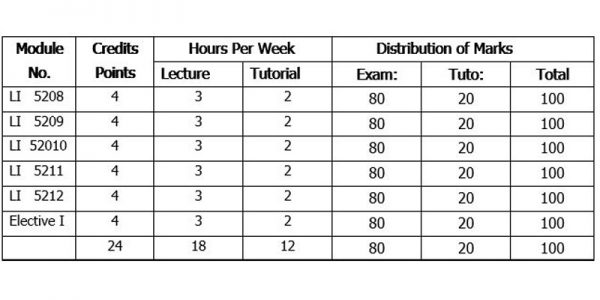
Core Courses
LI 5208 Advanced Cataloguing
LI 5209 Advanced Classification
LI 5210 World Information Sources
LI 5211 Bibliography, Index and Thesaurus
LI 5212 Quantity Services of Library
Elective Courses*
LI 5213 Human Resources Management
LI 5214 Principles of Archive
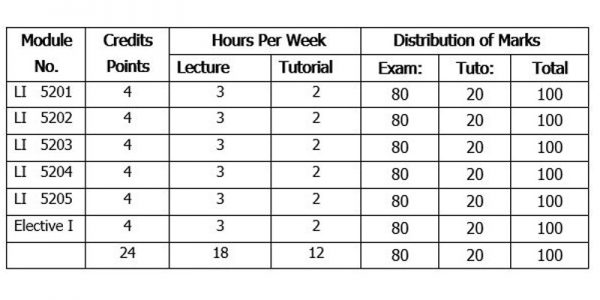
Core Courses
LI 5201 Advanced Cataloguing
LI 5202 Advanced Classification
LI 5203 World Information Sources
LI 5204 Bibliography, Index and Thesaurus
LI 5205 Quantity Services of Library
Elective Courses*
LI 5206 Human Resources Management
LI 5207 Principles of Archive
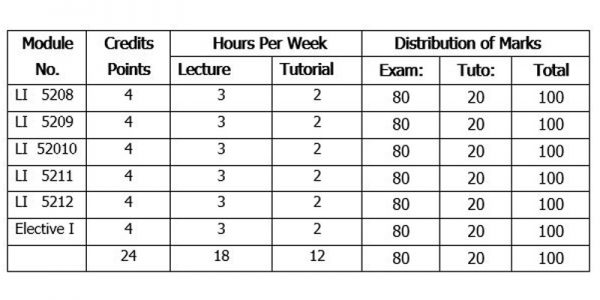
Core Courses
LI 5208 Advanced Cataloguing
LI 5209 Advanced Classification
LI 5210 World Information Sources
LI 5211 Bibliography, Index and Thesaurus
LI 5212 Quantity Services of Library
Elective Courses*
LI 5213 Human Resources Management
LI 5214 Principles of Archive
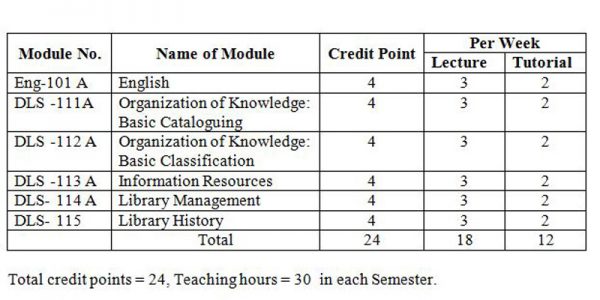
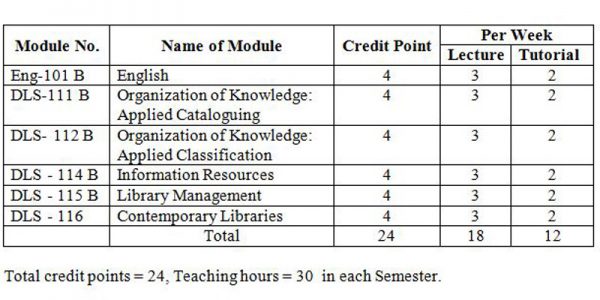
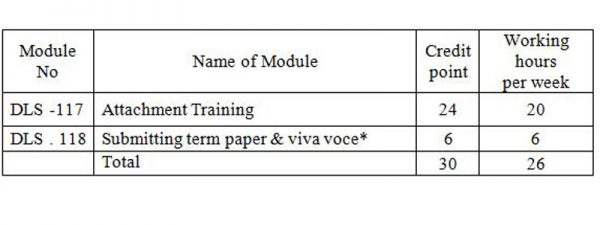
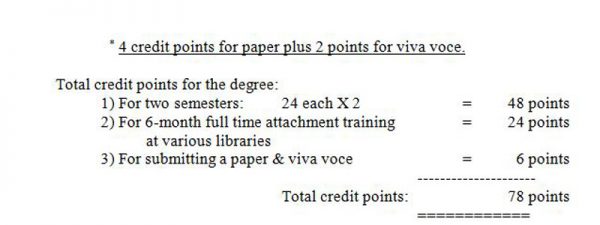
MA
First Semester
MA
Second Year
Phd
Diploma
Projects
Hindunized Symbols in Bagan Mural Paintings (2010)
Art and Architecture of Thambula Temple in Bagan (2019)
Publications
1. Soe Ni Tun, “ Sapwetin: A Symbol of Peaceful Coexistence with Hinduism”, Mandalay University Research Journal, Vol 9, No 1, 2018, pp 215-219
2. Soe Ni Tun, “From Deity to Advisor: Ganesh in Shwedagon Stupa: Colonial Period”, University of Mandalay Research Journal, Vol 11, Mandalay , Mandalay University Press, 2020, pp-234-240
First Year (Anthropology) Semester I

Foundation Courses
မ ၁၀၀၁ (3) မြန်မာစာ
Eng -1001 (3) English
Core Courses
Anth- 1101 (4) General Anthropology (I)
Anth- 1102 (4) Cultural Anthropology (I)
*Elective Courses (For Anthropology Specialization)
Hist-1001 (3) Introduction to Myanmar Civilization (I)
Phil-1001 (3) Logic in Practice
Geog-1003 (3) Geography of South East Asian Countries
Psy- 1001 (3) Child Development
Psy- 1002 (3) States of Consciousness
Psy- 1003 (3) General Psychology I
Psy-1004 (3) Public Relation
IR. 1001 (3) Introduction to International Relations I
Os -1001 (3) Fundamentals of Pāli Language
AM -1001 (3) Aspect of Myanmar (I)
*Elective Courses (For Other Specialization)
Anth- 1001 (3) Introduction to General Anthropology (I)
Anth- 1002 (3) Introduction to Cultural Anthropology (I)
First Year (Anthropology) Semester II

Foundation Courses
မ ၁၀၀၂ (3) ျမန္မာစာ
Eng – 1002 (3) English
Core Courses
Anth- 1103 (4) General Anthropology (II)
Anth- 1104 (4) Cultural Anthropology (II)
*Elective Courses (For Anthropology Specialization)
Hist-1004 (3) Introduction to Myanmar Civilization II
Geog-1004 (3) Geography of Myanmar
Psy- 1005 (3) Psychology of Adolescence
Psy- 1006 (3) Psychological Disorders
Psy- 1007 (3) General Psychology II
Psy -1008 (3) Understanding Human Interaction
IR.1004 (3) Introduction to International Relations II
Os -1002 (3) Fundamentals of Pāli Language
Li- 1002 (3) Library Information Sources
AM -1002 (3) Aspect of Myanmar (II)
*Elective Courses (For Other Specialization)
Anth- 1003 (3) Introduction to General Anthropology (II)
Anth- 1004 (3) Introduction to Cultural Anthropology (II)
Second Year (Anthropology) Semester I
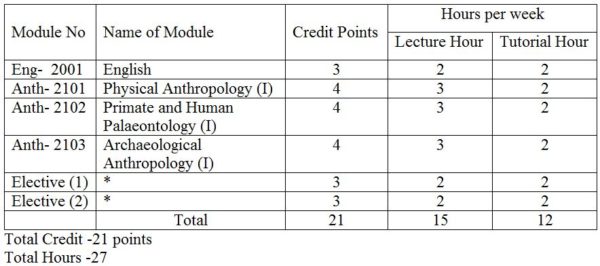
Foundation Course
Eng- 2001 (3)English
Core Courses
Anth- 2101 (4) Physical Anthropology (I)
Anth- 2102 (4) Primate and Human Palaeontology (I)
Anth- 2103 (4) Archaeological Anthropology (I)
*Elective Courses (For Anthropology Specialization)
Hist-2001 (3) History of Science and Technology
Eng-2003 (3) Developing Communicative Skill
Geog-2009 (3) Human Geography (I)
Psy -2001 (3) Language and Thought
Phil-2002 (3) Philosophy of Environmental Conservation and Sustainable Development
IR- 2001 (3) Elements of Political Organization
Os -2001 (3) Pāli Language
Myan-2005 (3) ျမန္မာအမ်ိဳးသမီးစာဆိုေတာ္မ်ားႏွင့္ ၄င္းတို႔၏ စာမ်ား
Anth- 2009 (3) Applied Anthropology (I)
*Elective Courses (For Other Specialization)
Anth- 2001 (3) Physical Anthropology (I)
Anth- 2002 (3) Socio-cultural Anthropology (I)
Anth- 2003 (3) Myanmar Culture (I)
Anth- 2004 (3) Ethnography of Myanmar (I)
Second Year (Anthropology) Semester II
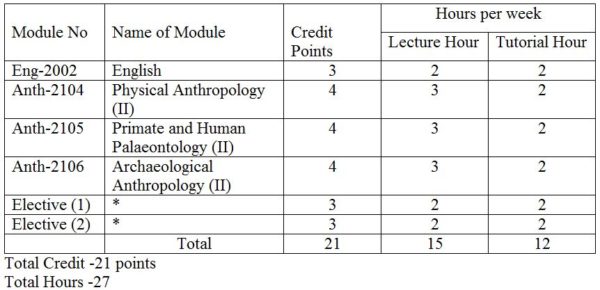
Foundation Course
Eng- 2002 (3)English
Core Courses
Anth- 2104 (4) Physical Anthropology (II)
Anth- 2105 (4) Primate and Human Palaeontology (II)
Anth- 2106 (4) Archaeological Anthropology (II)
*Elective Courses (For Anthropology Specialization)
Hist- 2003 (3) History of Science and Technology
Eng- 2004 (3) Developing Communicative Skill
Geog-2010 (3) Human Geography (II)
Psy – 2005 (3) Introduction to Social Problem
Phil- 2007 (3) Philosophy of Environmental Conservation and Sustainable Development
Os- 2006 (3) Pāli Language
IR- 2004 (3) Elements of Political Organization
Myan-2008 (3) ျမန္မာအမ်ိဳးသမီးစာဆိုေတာ္မ်ားႏွင့္ ၄င္းတို႔၏ စာမ်ား
Anth- 2010 (3) Applied Anthropology (II)
*Elective Courses (For Other Specialization)
Anth- 2005 (3) Physical Anthropology (II)
Anth- 2006 (3) Socio-cultural Anthropology (II)
Anth- 2007 (3) Myanmar Culture (II)
Anth-2008 (3) Ethnography of Myanmar (II)
Third Year (Anthropology) Semester I

Foundation Course
Eng- 3001 (3)English
Core Courses
Anth- 3101 (4) Social Organization (I)
Anth- 3102 (4) Religious Beliefs (I)
Anth- 3103 (4) Culture & Personality (I)
Anth- 3104 (4) The Study of Human Variation (I)
*Elective Courses (For Anthropology Specialization)
Geol-3001 (3) Palaeontology (I)
Anth-3001 (3) Anthropology and the future (1)
*Elective Courses (For Other Specialization)
Anth- 3003 (3) Religious Beliefs (I)
Third Year (Anthropology) Semester II
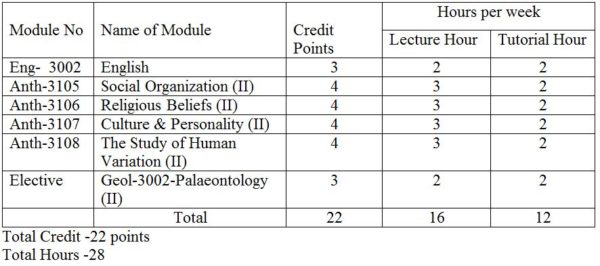
Foundation Course
Eng -3002 (3) English
Core Courses
Anth- 3105 (4) Social Organization (II)
Anth- 3106 (4) Religious Beliefs (II)
Anth- 3107 (4) Culture & Personality (II)
Anth- 3108 (4) The Study of Human Variation (II)
*Elective Courses (For Anthropology Specialization)
Geol-3002 (3) Palaeontology (II)
Anth-3002 (3) Anthropology and the future (1I)
*Elective Courses (For Other Specialization)
Anth- 3004 (3) Religious Beliefs (II)
Fourth Year (Anthropology) Semester I
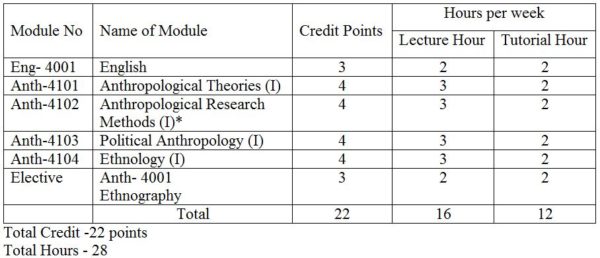
Foundation Course
Eng- 4001 (3) English
Core Courses
Anth- 4101 (4) Anthropological Theories (I)
Anth- 4102 (4) Anthropological Research Methods (I)
Anth- 4103 (4) Political Anthropology (I)
Anth- 4104 (4) Ethnology (I)
*Elective Courses (For Anthropology Specialization)
Anth- 4001 (3) Ethnography
Fourth Year (Anthropology) Semester II
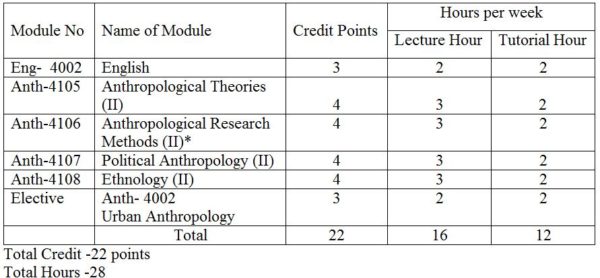
Foundation Course
Eng- 4002 (3) English
Core Courses
Anth- 4105 (4) Anthropological Theories (II)
Anth- 4106 (4) Anthropological Research Methods (II)
Anth- 4107 (4) Political Anthropology (II)
Anth- 4108 (4) Ethnology (II)
*Elective Course (For Anthropology Specialization)
Anth- 4002 (3) Urban Anthropology
မွတ္ခ်က္။ ။ (၁) Anth- 4102 & Anth- 4106, Anthropological Research Methods
ဘာသာရပ္တြင္ ကြင္းဆင္းသုေတသနျပဳလုပ္ပံု၊ ျပဳလုပ္နည္းကို လက္ေတြ႔သင္ၾကားရန္အတြက္ သုေတသနခရီး ထြက္းပါမည္။
(၂) ပထမပညာသင္ႏွစ္ဝက္စာေမးပြဲေျဖဆိုျပီးပါက (၅) ရက္မွ (၁၀)ရက္အထိ ကြင္းဆင္းသုေတသန ခရီးထြက္ပါမည္။
(၃) ၎ဘာသာရပ္အတြက္ Tutorial (၁၀)မွတ္ ၊ လက္ေတြ႔ကြင္းဆင္းမႈကို (၁၀)မွတ္ သတ္မွတ္ပါမည္။
First Year Honours (Anthropology) Semester 1

Foundation Courses
Eng-3001 (3) English
Core Courses
Anth- 3201 (4) Social Organization (I)
Anth- 3202 (4) Religious Beliefs (I)
Anth- 3203 (4) Culture & Personality (I)
Anth- 3204 (4) The Study of Human Variation (I)
*Elective Courses (For Anthropology Specialization)
Geol-3001 (3) Palaeontology (I)
Anth-3001 (3) Anthropology and the future (I)
*Elective Courses (For Other Specialization)
Anth- 3001 (3) Religious Beliefs (I)
First Year Honours (Anthropology) Semester II
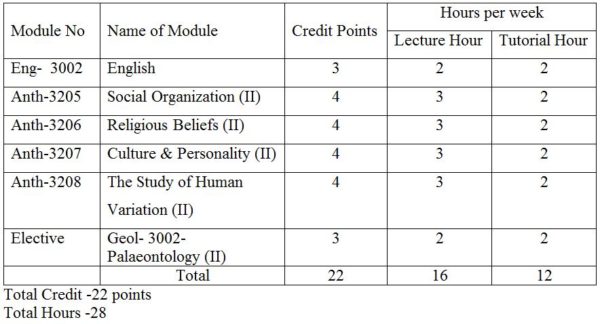
Foundation Courses
Eng- 3002 (3)English
Core Courses
Anth- 3205 (4) Social Organization (II)
Anth- 3206 (4) Religious Beliefs (II)
Anth- 3207 (4) Culture & Personality (II)
Anth- 3208 (4) The Study of Human Variation (II)
*Elective Courses (For Anthropology Specialization)
Geol – 3002 (3) Palaeontology (II)
Anth- 3002 (3) Anthropology and The future (II)
*Elective Courses (For Other Specialization)
Anth- 3002 (3) Religious Beliefs (II)
Second Year Honours (Anthropology) Semester I
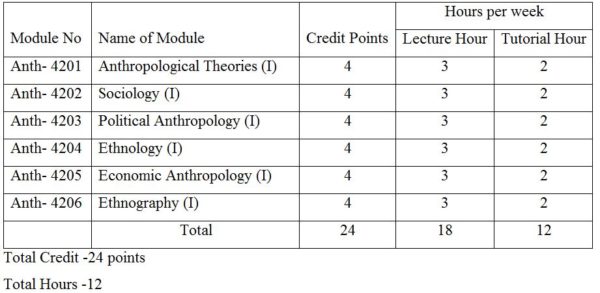
Core Courses
Anth- 4201 (4) Anthropological Theories (I)
Anth- 4202 (4) Sociology (I)
Anth- 4203 (4) Political Anthropology (I)
Anth- 4204 (4) Ethnology (I)
Anth- 4205 (4) Economic Anthropology (I)
Anth- 4206 (4) Ethnography (I)
Second Year Honours (Anthropology) Semester II
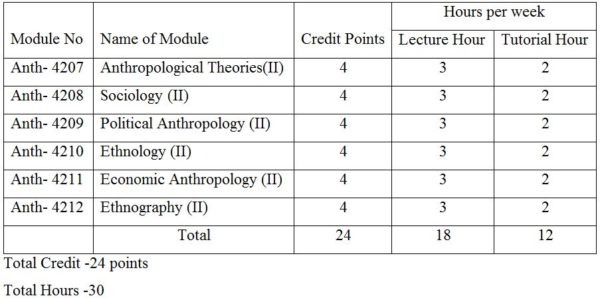
Core Courses
Anth- 4207 (4) Anthropological Theories (II)
Anth- 4208 (4) Sociology (II)
Anth- 4209 (4) Political Anthropology (II)
Anth- 4210 (4) Ethnology (II)
Anth- 4211 (4) Economic Anthropology (II)
Anth- 4012 (4) Ethnography (II)
Third Year Honours (Anthropology) and Qualify Semester I
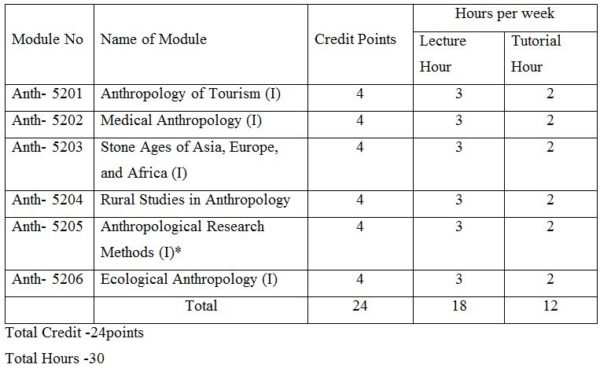
Core Courses
Anth- 5201 (4) Anthropology of Tourism (I)
Anth- 5202 (4) Medical Anthropology (I)
Anth- 5203 (4) Stone Ages of Asia, Europe, and Africa (I)
Anth- 5204 (4) Rural Studies in Anthropology
Anth- 5205 (4) Anthropological Research Methods (I)*
Anth- 5206 (4) Ecological Anthropology (I)
မွတ္ခ်က္။ ။ (၁) Anth- 5205 & Anth- 5211, Anthropological Research Methods
ဘာသာရပ္တြင္ ကြင္းဆင္းသုေတသနျပဳလုပ္ပံု၊ ျပဳလုပ္နည္းကို လက္ေတြ႔သင္ၾကားရန္အတြက္ သုေတသနခရီး ထြက္းပါမည္။
(၂) ပထမပညာသင္ႏွစ္ဝက္စာေမးပြဲေျဖဆိုျပီးပါက (၅) ရက္မွ (၁၀)ရက္အထိ ကြင္းဆင္းသုေတသန ခရီးထြက္ပါမည္။
(၃) ၎ဘာသာရပ္အတြက္ Tutorial (၁၀)မွတ္ ၊ လက္ေတြ႔ကြင္းဆင္းမႈကို (၁၀)မွတ္ သတ္မွတ္ပါမည္။
Third Year Honours (Anthropology) and Qualify Semester II
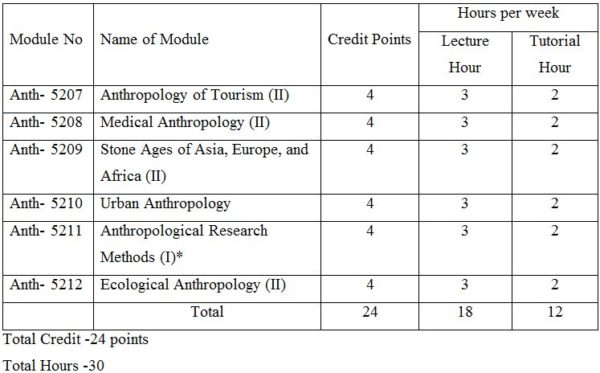
Core Courses
Anth- 5207 (4) Anthropology of Tourism (II)
Anth- 5208 (4) Medical Anthropology (II)
Anth- 5209 (4) Stone Ages of Asia, Europe, and Africa (II)
Anth- 5210 (4) Urban Anthropology (II)
Anth- 5211 (4) Anthropological Research Methods (II)*
Anth- 5212 (4) Ecological Anthropology (II)
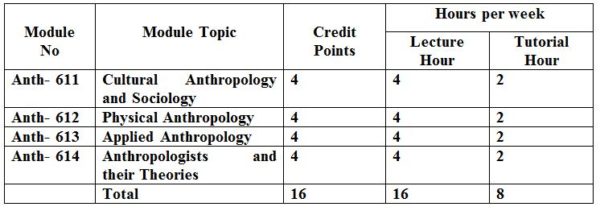
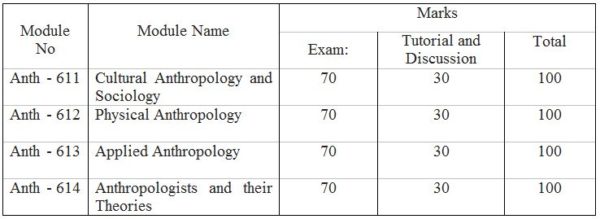

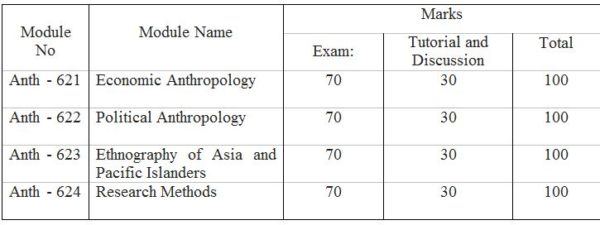







GRADUATE COURSES FOR Ph. D. IN ANTHROPOLOGY
Total Credits = 16 per week
Total Hours = 28 per week
Anth 711 Physical Anthropology
Part- 1
-Chemical compositions of man
-Organelles of cell-structure and functions
– Teminology
– General structure of Nucleic acids
– Deoxyribonucleic acid (DNA)
– Ribonucleic acid ( RNA)
– different types of RNA and their significances
– Amino acids
– Protein synthesis
– Chromosoneal disorders
– Some common diseases
Part- 2
– Origin of earth
(a) The solar system- the sun and nine planets
(b) Theories of formation of the earth
– Vertebrate animal kingdom
(a) Fishes, Amphibians, Reptiles, Mammals, Apes
(a) Concept of Evolution
(b) Approach to Evolution
(c) Early theories in Evolution
(d) Darwin theory of Evolution
– Primate: Fayum Primates, Pondaung Primates, Krabi Primates
– Evolution of man: Auatralopithecus, Homohabilis, Homoerectus, Homo Sapien
Neanderthalensis, Homo Sapien Sapien
(a) Basic anatomy of Man
(b) The genetic mechanisms of evolution
(c) DNA, RNA
(d) Race as an evolution process
Anth 712 Cultural Anthropology
(a) Language and communication
(b) Language in its cultural setting
(c) Language and thought
(d) Theoretical Linguistics
(e) American Linguistics
(a) Capitalist development and cultural experience
(b) Colonialism and Malay peasants
(c) Post colonialism and Philippine
(d) Socio-culturalism and India
(a) Founders
(b) The nature of culture and society
(c) Evolutionary, adaptationalism and materialism
(d) Structures, symbols, and meaning, practice, agency and power
(a) Archaeology in Anthropology
(b) Paleolithic culture, Mesolithic culture, Neolithic Culture, Metal, Metal Age
(c) Prehistoric economy and Social Organization
Anth 713 Ethnographic Methods
An Overview of Ethnography
Ethnographic Perspectives
Writing Ethnography
Anth 714 Applied Anthropology
Medical Anthropology
Introduction to Medical Anthropology
The Anthropological Approach in Health and Health Care
Qualitative Studies Including Anthropological Research in Health
Tourism Anthropology
An Anthropological Perspective on Tourism and Commodification
Authenticity Cultural Patrimony and Tourism
Host and Guest
Ecotourism
Educational Anthropology
Anthropology and Education
Classroom Culture
Local Traditional Education and community
Ecological Anthropology
Traditional Ecological Knowledge
Market Integration and Distribution of Ecological knowledge within An
Ecuadorian Fishing Community.
COURSES FOR DIPLOMA IN ANTHROPOLOGY
Total Credits = 16 per week
Total Hours = 20 per week
DAE 111A An Introduction to General Anthropology
The Definition of Anthropology and Its Aims
The Scope of Anthropology
Introduction to physical anthropology
Introduction to Cultural anthropology
Development of Anthropology
The application of Anthropology
The Relation of Anthropology
Basic Anthropological Terminology
The Study of Ethnic Group in Myanmar
DAE 112 A Social Anthropology
The Meaning of Social Organization
Basic Social Groups
Types of Marriage
Divorce
Forms of Family
Kinship and Descent
Kinship Terminology and Kin Groups
DAE 113 A Making of the Union of Myanmar and Ethnic Groups
DAE 114 A Folk Art
DAE 111 B Field Work Method and Documentation
Notes and Queries
Equipment
Oral History
Choice of Informants
Direct Observation
Indirect Observation
Scientific Documentation
DAE 112 B Role of Folk-tale in Minority Culture
(a) Kachin
(b) Kayah
(c) Kayin
(d) Chin
(e) Bamar
(f) Mon
(g) Rakhine
(h) Shan
DAE 113 B Anthropology of Health and Health Care
DAE 114 B The Interpretation of Culture
(1) The Founder, Tylor’s “The Evolution of Culture’’
(2) Boas’s “Culture in Context’’
(3) Sapir’s “Culture , language and individual”
(4) Mead’s “The Individual and culture”
(5) MalinowsKi’s “The Functions of culture ”
(1) Jenk’s “Culture and social Structure”
(2) Turnen’s “Culture is Symbolic”
(3) Geertz’s “Thick description of Culture”
(4) Marcus’s “Writing Culture”
(5) Irwan Abdullah’s “Culture: The Area of Culture and changing process
in making sense”
(6) Kahn’s “Culture, Multiculture, postculture”
(7) Fernandez’s “post modern Culture and Anthropology”
5. The Redefinition of Culture and the Future of Anthropological Knowledge”
Dr. Sandar Win
Professor and Head, Department of Anthropology
Publications:
Publications:
Daw Aye Aye Swe
MSc in Chemistry, University of Yangon
MSc Title
A study of the isolation of alliin and allicin from allium sativum (Garlic) and its antibacterial activity.
– Environmental Chemistry
– Food Technology
ayeayeswe@uy.edu.mm
Publication:
1. Soe Mya Mya Aye, Htway Htway Khing, Utilization of Data Warehousing as Decision Supporting Tool, Myanmar Academy Arts and Science Research Conference, Vol.V, No.3, 321-330, 2007.
2. Soe Mya Mya Aye, Optimizing Database Queries by Indexing, Universities Research Journal, Vol.1, No.3, 354-362, 2008.
3. Soe Mya Mya Aye, Htway Htway Khing, Myat Su Hlaing, Transformation of one Font to Another Myanmar Font, Myanmar Academy Arts and Science Research Conference, Vol.VI, No.3, 163-175, 2008.
4. Soe Mya Mya Aye, May Myat Mon Phyu, Solving the Redundancy Problem of Data Integration in Data Mining Process by Using Correlation Analysis, Myanmar Academy Arts and Science Research Conference, Vol.VIII, No.3, 199-208, 2010.
5. Soe Mya Mya Aye, The Effect of Indexing Strategies on Relational Database, 5thAUN/SEED-Net Regional Conference on Information and Communications Technology Conference, 80-93, 2012.
6. Soe Mya Mya Aye, Myat Su Hlaing, Nem Khan Dim, Learning Management System for Web Based Teaching System in University of Yangon, Universities of Yangon Research Journal, Vol.9, No.1, 651-656, 2019.
7. Soe Mya Mya Aye, Myat Su Hlaing, Nem Khan Dim, Location Management Using Geographic Information System(GIS) in Mobile Context, MTUJSET, Vol.6, 57-61, 2019.
8. Myat Su Hlaing & et al., Soe Mya Mya Aye, Parallel Computing Development for Image Order-Statistics Filters, Proceeding of The Sixth International Conference, 311-320, 2013.
9. Soe Lin Htet & et al., Soe Mya Mya Aye, Mission Control Over Multi U Vs in the Real-time Distributed Hardware-In-the-Loop Environment, 1st International Conference on Energy, Environment and Human Engineering (ICEEHE), Vol.2, No.2, 1-9, 2014.
10. Khin Sandar Myint, Soe Mya Mya Aye, Ontology Based Retrieval of Myanmar Dictionary Word, Universities Research Journal, Vol.8, No.4, 193-199, 2015.
11. Thet Thet Hlaing & et al., Soe Mya Mya Aye, Multiple Faces Authentication in Video Security System, ARC, Vol.5, NO.1&2, 185-192, 2016
12. Myat Su Hlaing, Soe Mya Mya Aye, Data parallel Programming model for an Operation Based Parallel Image Filtering System, Oral & Poster Presentation, University of Dagon,135-145, 2018.
13. Nem Khan Dim, Soe Mya Mya Aye, Motion Gesture Interfaces in Smartphone for People with Visual Impairments, Proceeding of 16th International Conference on Computer Application, 327-330, 2018.
14. Nem Khan Dim & et al., Soe Mya Mya Aye, GPS based Wearable Vibrations for Pedestrians, Proceeding of The Conference on Science and Technology Development, 148-254, 2018.
15. Myat Su Hlaing, Soe Mya Mya Aye, Parallel Computing Development for Image Order-Statistics Filters, Universities of Yangon Research Journal, Vol.8, No.4, 313-321, 2018.
16. Myat Su Hlaing, Soe Mya Mya Aye, Enhancement of Brain MRI Medical Imaging on Multicore Computer System, Proceeding of The 2nd International Conference on Education and Innovation, Vol.5, 478-481, 2019.
17. Nem Khan Dim & et al., Soe Mya Mya Aye, A Survey on the Use of Mobile Phone for People with Visual Impairments, Universities Research Journal, Vol.11, No.2, 323-332, 2018.
18. Wint Pa Pa Kyaw, Soe Mya Mya Aye, Parallel Processing in Monte Carlo Simulation on Graphical Processing Unit, Universities of Yangon Research Journal, Vol.9, No.1, 663-669, 2019.
19. Thet Thet Hlaing, Soe Mya Mya Aye, Biometric-Based Identification for Attendance Management, Universities of Yangon Research Journal, Vol.9, No.1, 657-662, 2019.
20. Htway Htway Khing & et al., Soe Mya Mya Aye, Using Monitoring Agent as a Learning Master for Virtual Learning Environment, Universities of Yangon Research Journal, Vol.9, No.1, 643-650, 2019.
21. Wint Pa Pa Kyaw, Soe Mya Mya Aye, Parallel chains in Markov Chain Monte Carlo Simulation, Universities Research Journal, Vol.12, No.1, 2019.
22. Htway Htway Khing & et al., Soe Mya Mya Aye, Assistive Interface for People with Visual Impairments, Myanmar Academy Arts and Science Research Conference, Vol.XVIII, No.3, 2020.
23. Shune Lae Aung & et al., Soe Mya Mya Aye, A Learner Aids System for Improving the Access of Online Learning, Myanmar Academy Arts and Science Research Conference, Vol.XVIII, No.3, 2020.
Dr Mya Thandar Aung
Associate Professor
PhD in Chemistry, University of Yangon (2007)
Publications:
Publications
Publications
1. Thet Thet Hlaing, A Study on Quality Measurement Methods for Component-Based Software, MAAS 2009, Vol.VII
2. Thet Thet Hlaing, Keywords Extraction from Textual Data Sources, URJ 2012, Vol.5, NO.1
3. Thet Thet Hlaing, Nwe Nwe Win, Clustering Words for Documents Labeling, The Proceeding of the 7th Global Conference Book, 2013
4. Thet Thet Hlaing, Nwe Nwe Win, Keywords Extraction from Documents Collection, MAAS , 2014, Vol.XII
5. Thet Thet Hlaing, Labeling the Clusters for Documents Categorization, CAIPT 2015, ISSN 2384-1435, The Proceeding of the 3rd International Conference on Computer Applications and Information Processing Technology
6. Thet Thet Hlaing, A Study on User Authentication Methods Using Biometric Information: Face Recognition, The Eight International Conference on Science and Mathematics Education in Developing Countries, 2015
7. Thet Thet Hlaing, Wine Chit, Thiha Tin Maung Aye, Myat Su Hlaing, Soe Mya Mya Aye, Multiple Faces Authentication in Video Security System, Journal of the ASIA Research Centre, Yangon University, 2016, Vol.5,NO.1&2
8. Thet Thet Hlaing, Soe Mya Mya Aye, Biometric-Based Identification for Attendance Management, UYRJ, 2019, Vol.9, No.1
9. Htway Htway Khing, Thet Thet Hlaing, Nwe Nwe Win, System Integration Framework on Multitask Environment, UYRJ 2009, Vol.1, No1
10. Khin Sandar Myint, Thet Mon Win, Thet Thet Hlaing, Searching Large Document Collections, MAAS 2010, Vol.VIII, No.3
11. Kyaw Myint Naing, Thet Thet Hlaing, Surveying of Some Web Filtering Programs and their Performance, Mandalay University of Distance Education Research Journal , 2016, Vol. 7, No. 1, 2016
12. Ohnmar Win, Thet Thet Hlaing, Semantic Concept and Visualization for Semantic Relationship of Pāli Words by Using Graph Database, Yadanabon University Research Journal, 2016, Vol.7, No.1
13. Wine Chit, Thet Thet Hlaing, A Study on Hand Gesture Segmentation for Human Computer Interaction Using Skeleton Tracking Model, MAAS, 2016, Vol XIV, No3, June 2016
14. Kyaw Myint Naing, Thet Thet Hlaing, A Study on Packet Filtering with IPTABLES, Mandalay University of Distance Education Research Journal , 2017, Vol. 8, No. 1
15. Kyaw Myint Naing, Thet Thet Hlaing, Developing and Installing Open SSH Server for Remote Connection, Mandalay University of Distance Education Research Journal, 2018, Vol. 9, No. 1
16. Khin Mar Wai , Thet Thet Hlaing et al, Impact of Flood and Riverbank Erosion on Human Livelihoods: A case study of some riverside villages in Lower Ayeyarwady, Population Development and the Environment: Challenges to Implementing the Sustainable Development Goals, Plagrave Macmillan(Publisher), 2019
17. Kyaw Myint Naing, Thet Thet Hlaing, Developing Samba Server on Linux OS and Studying Server Message Block Protocol (SMB) for Windows Environments, Mandalay University of Distance Education Research Journal, 2019, Vol. 10, No. 1
Dr Yee Mun Than
Lecturer
PhD in Chemistry, University of Yangon
Publications
1. Khin Sandar Myint, Nwe Nwe Win, End User Development in Rapidly Changing Environment, Journal of Myanmar Academy of Arts and Science (MAAS), Vol.V, No.3, 341-348, 2007
2. Khin Sandar Myint, Thet Mon Win, Thet Thet Hlaing, Searching on Large Document Collections, Journal of Myanmar Academy of Arts and Science (MAAS), Vol.VIII, N0.3, 221-228, 2010
3. Khin Sandar Myint, Applying the Ontology Development Process on Textual Information Extraction, University of Yangon Research Journal (UYRJ), Vol.3, No.1, 139-145, 2011
4. Khin Sandar Myint, Nwe Nwe Win, Searching Dictionary Word and Its Part of Speech in Myanmar Document, Journal of Myanmar Academy of Arts and Science (MAAS), Vol.XII, No.3, 77-87, 2014
5. Khin Sandar Myint, Soe Mya Mya Aye, Ontology Based Retrieval of Myanmar Dictionary Word, Universities Research Journal (URJ), Vol.8, No.4, 193-199, 2016
6. Htway Htway Khaing, Khin Sandar Myint, Analyzing the Utilization of Some Myanmar Web Sites by Using User Interface Design Principles, Journal of Myanmar Academy of Arts and Science (MAAS), Vol.VII, No.3, 183-200, 2009
7. Htway Htway Khaing, Khin Sandar Myint, E-learning Based on Personalization Principle Using Conversational Style and Virtual Coaches, Journal of Myanmar Academy of Arts and Science (MAAS), Vol.IX, No.3, 63-75, 2011
8. Thiri May, Khin Sandar Myint, Adaptive Learning in Web-based Educational Environment, MAAS, Vol.X, No.3, 133-144, 2012
Dr Khin Myo Win
Professor, Department of History
Education
BA (Hons:) , September, 1995,Yangon University
MA (October, 2000),Yangon University
Tile:The Social Structure of Myanmar During Late Konbaung Period (1819-1885)
PhD (November, 2006), Yangon University
Title: Economic Activities of Foreigners in Myanmar(1834-1885)
Diploma in Global English (July, 2006), Yangon University
Publication Research Papers
Khin Myo Win, Dr., “Social Condition of Late Kongbaung Period”, Myanmar Historical Research Journal, No.24, June, 2013.
Khin Myo Win, Dr. “Religions and Customs of Late Konbaung Period”, Myanmar Historical Research Journal, No.24, June, 2013.
Khin Myo Win, Dr., “Economic Activities of Foreigners in Late Kongbaung Period”, Myanmar Historical Research Journal, No.26, June, 2014.
Khin Myo Win, Dr., “Festivals of Twelve Seasons in Late Kongbaung Period”, Pathein University Research Journal, No.1, December, 2016.
Khin Myo Win, Dr., “Foreigners’ Participation in Agricultural and Forest Productions of Konbaung Period”, The Third Myanmar-Japan International Symposium Research Papers, ebook, Vol.1, No.1February, 2017.
Khin Myo Win, Dr., “History of Education in Late Kongbaung Period”, Myanmar Historical Research Journal, No.34, 2018.(in the process of printing)
Khin Myo Win, Dr., “Assessment of Historical Facts from the Sittansof Pathein 32 Myos”, The MAAS Journal , Best Paper Award 2018 (in the process of printing)
MRes Thesis Supervision
Myo Win New (MRes-Hist-2), “The Study of Education in Mawlamyine” (1826-1885), May, 2008.
MA Thesis Supervision
Seint Seint Thu (MA-Hist-4), “History of Revenue in Late Konbaung”, March, 2017.
Min Kyaw Myo Naing (MA-Hist-1) “Mon Nationality’s Culture and Tradition in Mon State”, 2018. ( still process)
Research Fields
Social History
Special interest in Economic History
Dr Nan Hlaing
Professor, Department of History
Education
B.A. (Hnos.),
M.A., Ph.D.,
History, Dip. in English, Yangon MA (October, 2000),Yangon University
Tile:The Social Structure of Myanmar During Late Konbaung Period (1819-1885)
PhD (November, 2006), Yangon University
Title: Economic Activities of Foreigners in Myanmar(1834-1885)
Diploma in Global English (July, 2006), Yangon University
Publication Research Papers
1. Historical Sources of the Taunggu Period in Egyins (Historical Ballads), Journal of Myanmar Academic Arts and Science, Vol. IX, Pt.8, June 2011.
2. Influence of Brahmanism in the Inwa Period”, Research Journal of East Yangon University, Vol. I, Pt.III, 2009-2010.
3. “Sacred Kawgun Cave,”Journal of Myanmar Academic Arts and Science,
4. “Laterite Culture of Than Lyin”, Research Journal of Mawlamyine University, Special issue, .Nov., 2012.
5. Laterite Culture of the Mons in Lower Myanmar, read at the Best Paper Awards held by Higher Education Department, Ministry of Education, at Arts Hall, Yangon University
6. “Yodayah Naing Mawgun (Triumph of Myanmar over Ayuthiya)”, The Bulletin of Myanmar Studies, Vol. I, 2012.
7. “Glory and Greatness: Symbolisms of Myanmar Royalty,”The Bulletin of Myanmar Studies, Vol. II, August, 2015.
8. “Four Buddha Images excavated in Ye”,Academic Research Papers on Ye Ancient City, Mawalamyine University and Paper Reading Committee, 2015.
9. A History of the Kayins, Journal of Hpa-an University, Vol.IV ,Pt. I, Dec., 2012.
Semester I

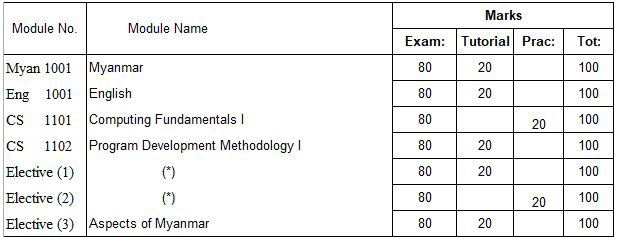
Fundamental Courses
Myan 1001 (3) (2-2) Myanmar
Eng 1001 (3) (2-2) English
Core Courses
CS 1101 (4) (3-2) Computing Fundamentals I
CS 1102 (4) (3-2) Program Development Methodology I
Elective Courses (*)
Maths 1001 (3) (2-2) Mathematics
Phy 1001 (3) (2-2) Physics
AM 1001 (3) (2-2) Aspects of Myanmar
(*) A student can choose any 1 elective offered from the departments of Mathematics and Physics.
Semester II
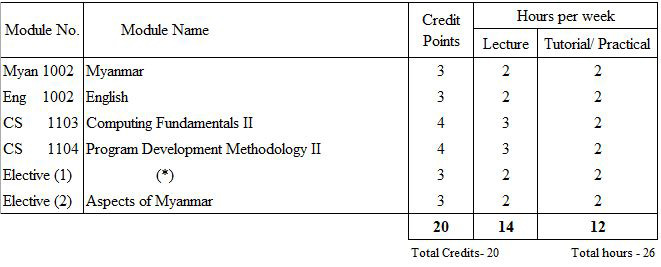

Fundamental Courses
Myan 1002 (3) (2-2) Myanmar
Eng 1002 (3) (2-2) English
Core Courses
CS 1103 (4) (3-2) Computing Fundamentals II
CS 1104 (4) (3-2) Program Development Methodology II
Elective Courses (*)
Maths 1002 (3) (2-2) Mathematics
Phy 1002 (3) (2-2) Physics
AM 1002 (3) (2-2) Aspects of Myanmar
(*) A student can choose any 1 elective offered from the departments of Mathematics and Physics.
Core Courses of Bachelor of Arts in Geography (Four-year Programme)
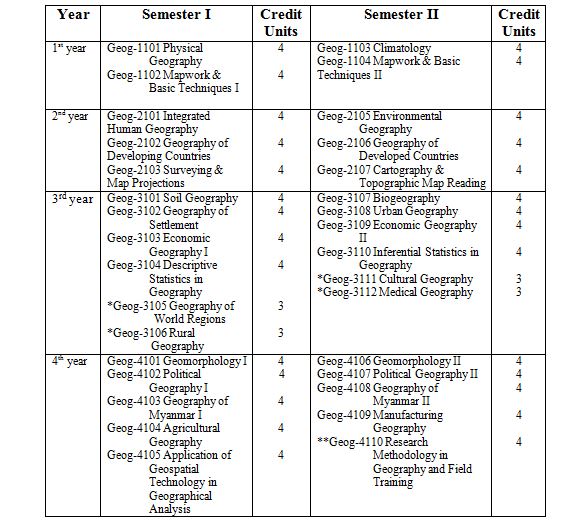
Core Courses of Bachelor of Arts (Honours) in Geography (Five-year Programme)
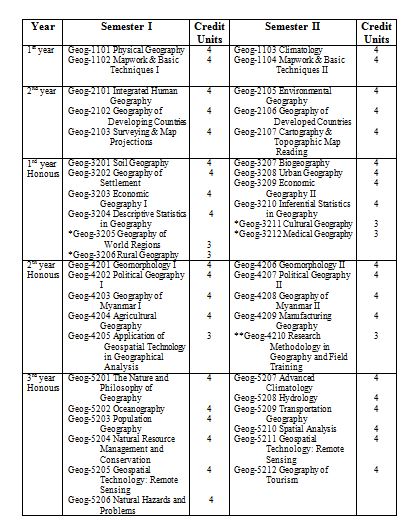
** In partial fulfilment of the requirements for the award of Bachelor of Arts (Honours) in Geography, Third Year Honours Students must take part in occasional field trips / project assignments related to their field of studies, as deemed necessary by the Department of Geography and submit a Term Paper at the end of the second semester.
Semester I
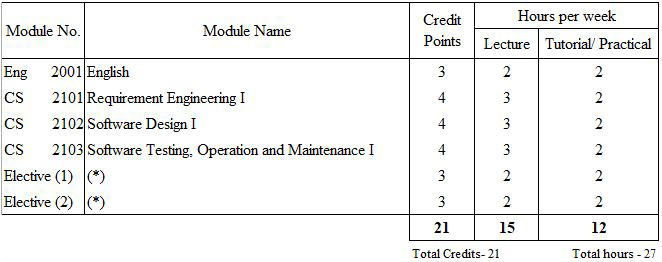
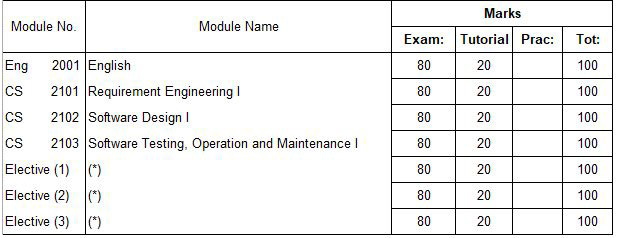
Fundamental Courses
Eng 2001 (3) (2-2) English
Core Courses
CS 2101 (4) (3-2) Requirement Engineering I
CS 2102 (4) (3-2) Software Design I
CS 2103 (4) (3-2) Software Testing, Operation and Maintenance I
Elective Courses (*)
CS 2104 (3) (2-2) Fundamental Database Management System I
CS 2105 (3) (2-2) Computational Mathematics
CS 2106 (3) (2-2) Multimedia System Development I
(*) A student can choose any 2 electives offered from the department of Computer Studies.
Semester II

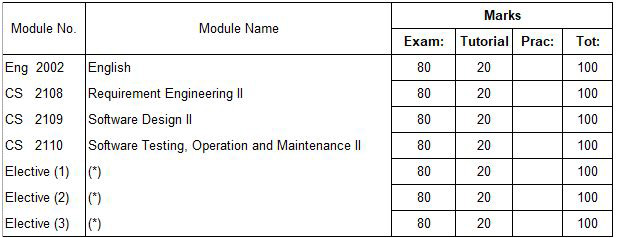
Fundamental Courses
Eng 2002 (3) (2-2) English
Core Courses
CS 2107 (4) (3-2) Requirement Engineering II
CS 2108 (4) (3-2) Software Design II
CS 2109 (4) (3-2) Software Testing, Operation and Maintenance II
Elective Courses (*)
CS 2110 (3) (2-2) Fundamental Database Management System II
CS 2111 (3) (2-2) Discrete Mathematics
CS 2112 (3) (2-2) Multimedia System Development II
(*) A student can choose any 2 electives offered from the department of Computer Studies.
Semester I
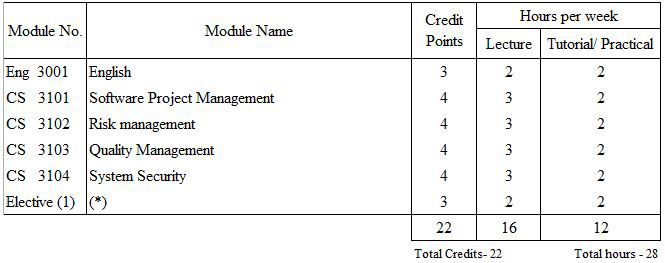
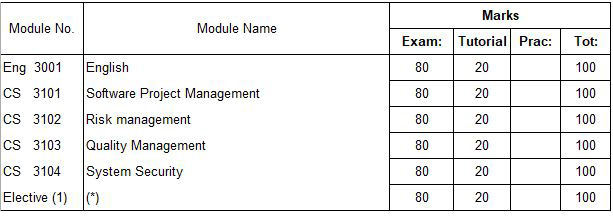
Fundamental Courses
Eng 3001 (3) (2-2) English
Core Courses
CS 3101 (4) (3-2) Software Project Management
CS 3102 (4) (3-2) Risk management
CS 3103 (4) (3-2) Quality Management
CS 3104 (4) (3-2) System Security
Elective Courses (*)
CS 3105 (3) (2-2) Web-based System Development I
CS 3106 (3) (2-2) Computer Graphics I
(*) A student can choose any 1 elective offered from the department of Computer Studies
Semester II
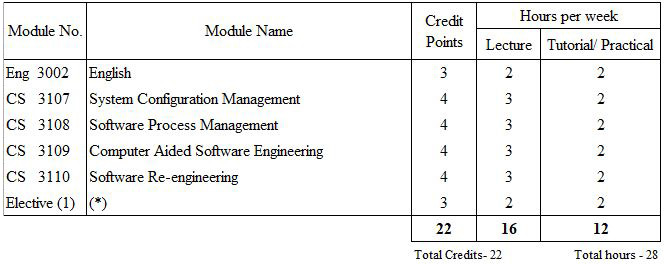

Fundamental Courses
Eng 3001 (3) (2-2) English
Core Courses
CS 3107 (4) (3-2) System Configuration Management
CS 3108 (4) (3-2) Software Process Management
CS 3109 (4) (3-2) Computer Aided Software Engineering
CS 3110 (4) (3-2) Software Re-engineering
Elective Courses (*)
CS 3111 (3) (2-2) Web-based System Development II
CS 3112 (3) (2-2) Computer Graphics II
(*) A student can choose any 1 elective offered from the department of Computer Studies
Semester I

Fundamental Courses
Eng 4001 (3) (2-2) English
Core Courses
CS 4101 (4) (3-2) IT in Business Management I
CS 4102 (4) (3-2) Social and Development Issues
CS 4103 (4) (3-2) Network Computing I
CS 4104 (4) (3-2) Fundamental Research Methodology
Elective Courses (*)
CS 4105 (3) (2-2) Database Development and Implementation I
CS 4106 (3) (2-2) Information Systems Engineering I
(*) A student can choose any 1 elective offered from the department of Computer Studies
Semester II
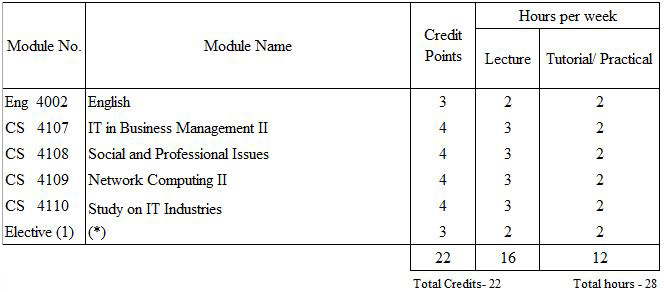
Fundamental Courses
Eng 4002 (3) (2-2) English
Core Courses
CS 4107 (4) (3-2) IT in Business Management II
CS 4108 (4) (3-2) Social and Professional Issues
CS 4109 (4) (3-2) Network Computing II
CS 4110 (4) (3-2) Study on IT Industries
Elective Courses (*)
CS 4111 (3) (2-2) Database Development and Implementation II
CS 4112 (3) (2-2) Information Systems Engineering II
(*) A student can choose any 1 elective offered from the department of Computer Studies
Semester I
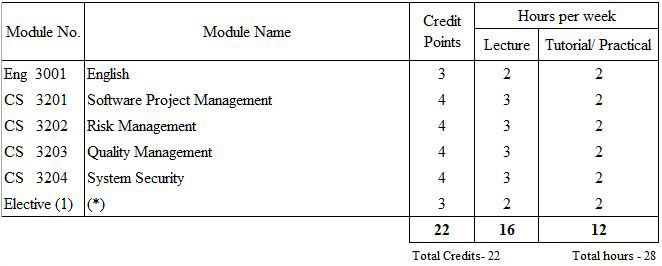
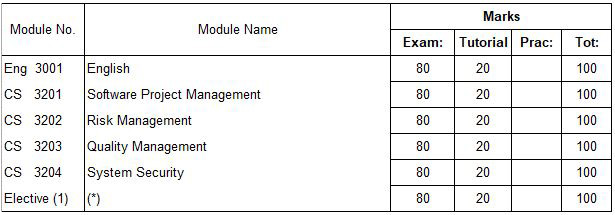
Fundamental Courses
Eng 3001 (3) (2-2) English
Core Courses
CS 3201 (4) (3-2) Software Project Management
CS 3202 (4) (3-2) Risk Management
CS 3203 (4) (3-2) Quality Management
CS 3204 (4) (3-2) System Security
Elective Courses (*)
CS 3205 (3) (2-2) Web-based System development I
CS 3206 (3) (2-2) Computer Graphics I
(*) A student can choose any 1 elective offered from the department of Computer Studies
Semester II
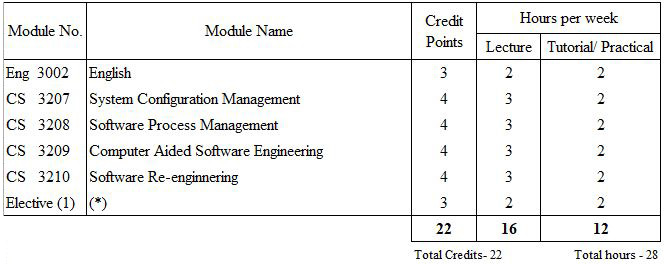
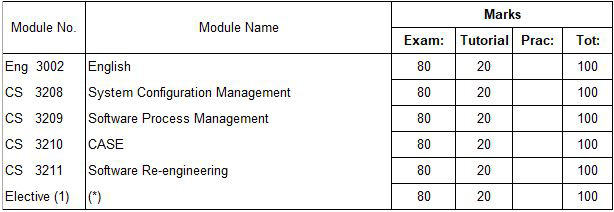
Fundamental Courses
Eng 3002 (3) (2-2) English
Core Courses
CS 3207 (4) (3-2) System Configuration Management
CS 3208 (4) (3-2) Software Process Management
CS 3209 (4) (3-2) Computer Aided Software Engineering
CS 3210 (4) (3-2) Software Re-engineering
Elective Courses (*)
CS 3211 (3) (2-2) Web-based System development II
CS 3212 (3) (2-2) Computer Graphics II
(*) A student can choose any 1 elective offered from the department of Computer Studies
Semester I
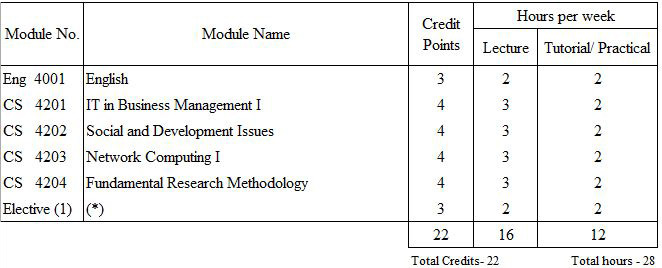

Fundamental Courses
Eng 4001 (3) (2-2) English
Core Courses
CS 4201 (4) (3-2) IT in Business Management I
CS 4202 (4) (3-2) Social and Development Issues
CS 4203 (4) (3-2) Network Computing I
CS 4204 (4) (3-2) Fundamental Research Methodology
Elective Courses (*)
CS 4205 (3) (2-2) Database Development and Implementation I
CS 4206 (3) (2-2) Information Systems Engineering I
(*) A student can choose any 1 elective offered from the department of Computer Studies
Semester II
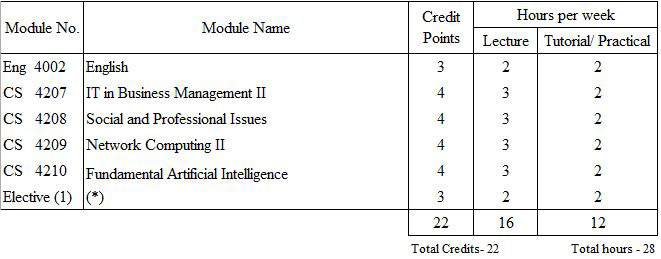
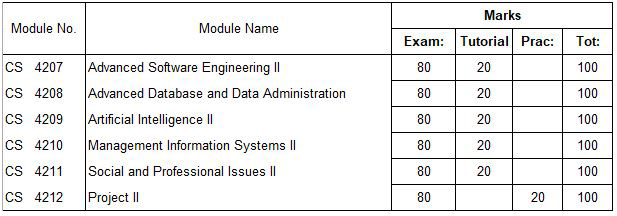
Core Courses
CS 4207 (4) (3-2) IT in Business Management II
CS 4208 (4) (3-2) Social and Professional Issues
CS 4209 (4) (3-2) Network Computing II
CS 4210 (4) (3-2) Fundamental Artificial Intelligence
Elective Courses (*)
CS 4211 (3) (2-2) Database Development and Implementation II
CS 4212 (3) (2-2) Information Systems Engineering II
(*) A student can choose any 1 elective offered from the department of Computer Studies
Semester I
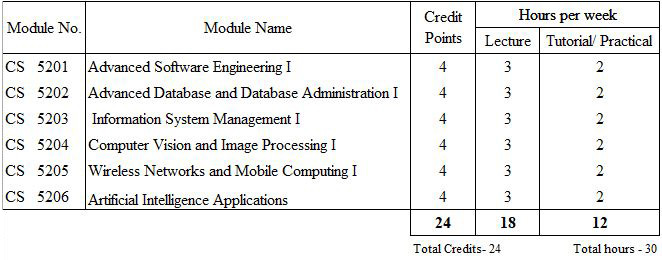
Semester II
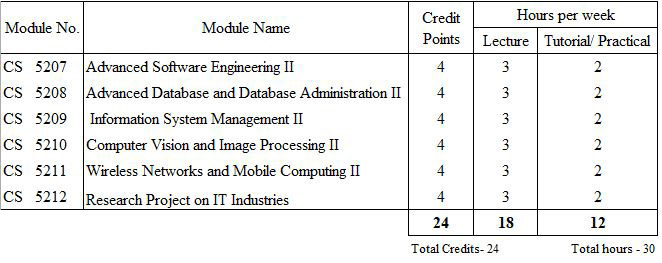
Semester I

*Elective Courses; a student can choose any one elective below
-AM 1001 (3) Aspects of Myanmar
-ES 1001 (3) Environmental Chemistry I
-ES 1002 (3) Environmental Physics I
-ES 1003 (3) Environmental Geology I
Semester II
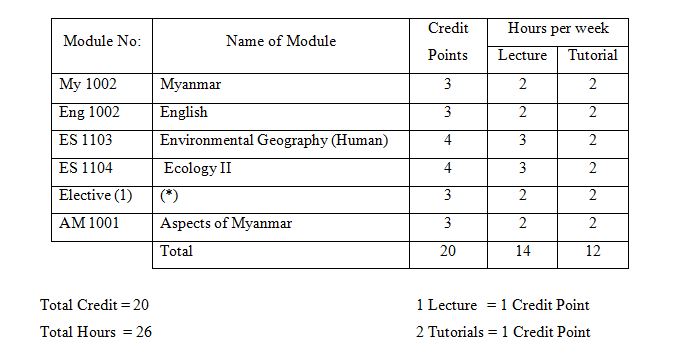
* Elective Courses: a student can choose any one elective shown below
-AM 1002 (3) Aspects of Myanmar
-ES 1004 (3) Environmental Chemistry II
-ES 1005 (3) Environmental Physics II
-ES 1006 (3) Environmental Geology II
Semester I

* Elective Courses
-ES 2104 (3) Geospatial Technology I
-ES 2001 (3) Food Security
– ES 2002 (3) Water Chemistry
– ES 2003 (3) Thermal Physics
– ES 2004 (3) Environmental Psychology
Semester II

* Elective Courses
-ES 2108 (3) Geospatial Technology II
-ES 2005 (3) Environmental Law
-ES 2006 (3) Soil Chemistry
-ES 2007 (3) Thermal Physics
-ES 2008 (3) Environmental Psychology
Semester I

* Electives: A student can choose any one elective shown below
-ES 3001 (3) Geomorphic Environment
-ES 3002 (3) Biodiversity
Semester II
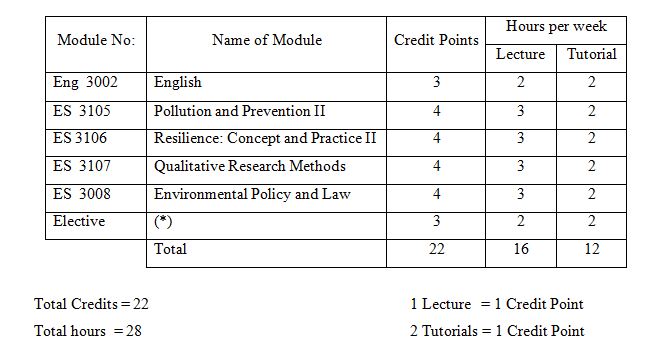
* Electives: A student can choose any one elective shown below.
-ES 3003 (3) Marine and Coastal Environment
-ES 3004 (3) River and Hydrology
Semester I
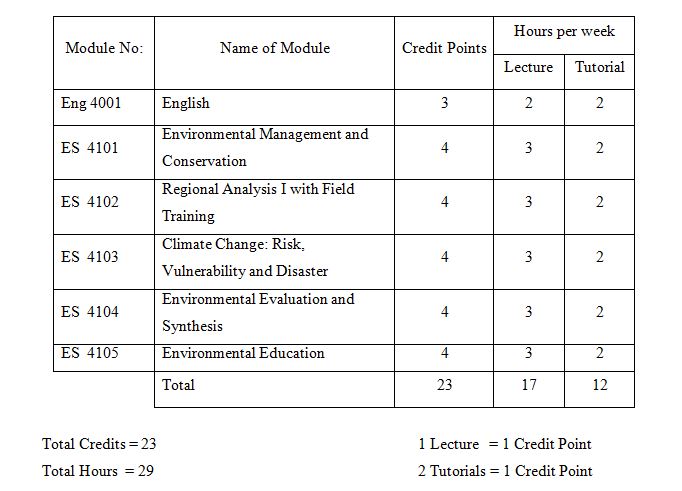
Semester II
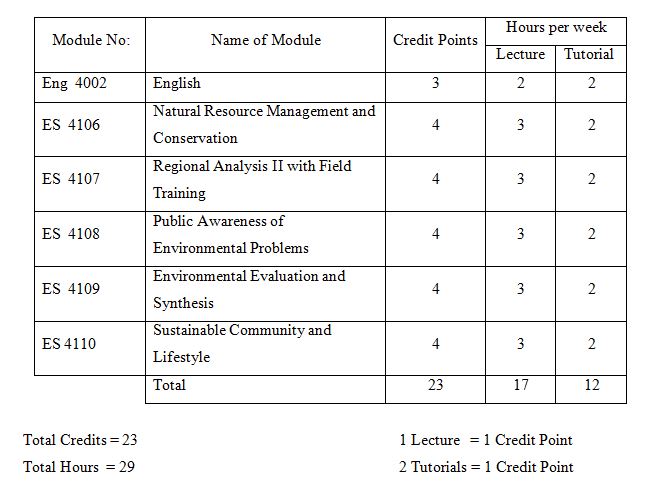
Courses in Diploma in GIS & RS (One-year Programme, Total Credit Units 24)

In partial fulfilment of the requirements for the award of GIS & RS, Diploma Students must take part in occasional field trips / project assignments related to their field of studies, as deemed necessary by the Department of Geography and submit a Term Paper at the end of the academic year.
Courses in PhD in Geography (Five –year Programme)

Courses in Master of Arts & Qualifying (Two-year Programme, Total Credit Units 24)
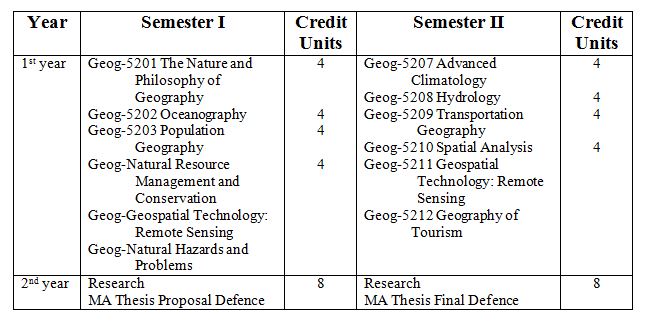
Dr. Soe Soe Than
Professor
Publication:
Dr. Khin Thandar Oo
Associate Professor
Professional Experience
1998 – 2004 Tutor (Dagon University)
2004 – 2005 Tutor (Hpa-an University)
2005 – 2006 Tutor (Dagon University)
2005 – 2011 Assistant Lecturer (Dagon University)
2011 – 2012 Lecturer (University of Distance Education)
2012 – 2014 Lecturer (Sittway University)
2014 – 2015 Lecturer (Dagon University)
2015 – at present Associate Professor (University of Yangon)
Research experience
(၁) ဗုဒ္ဓဘုရားရှင်သက်တော်ထင်ရှားရှိစဉ်ကာလ၌ ၁၉၉၈ နည်းပြ(ဒဂုံ) အဖွဲ့ဝင်
ထင်ရှားသောလူပုဂ္ဂိုလ်များ
(၂) ဗုဒ္ဓဘုရားရှင်သက်တော်ထင်ရှားရှိစဉ်ကာလ၌ ၁၉၉၉ နည်းပြ(ဒဂုံ) အဖွဲ့ဝင်
ထင်ရှားသောတန်ခိုးရှင်များ
(၃) ဒီဃနိကာယ်နှင့် မဇ္ဈိမနိကာယ်တို့၌ တွေ့ရသော ၂၀ဝ၀ နည်းပြ(ဒဂုံ) အဖွဲ့ဝင်
တဗ္ဘာဝပုဒ်များနှင့် တဿမပုဒ်များ
(၄) သံယုတ္တနိကာယ်နှင့် အင်္ဂုတ္တရနိကာယ်တို့၌ တွေ့ရသော ၂၀ဝ၂ နည်းပြ(ဒဂုံ) အဖွဲ့ဝင်
တဗ္ဘာဝပုဒ်များနှင့် တဿမပုဒ်များ
(၅) ပါဠိစာပေလာစကားပုံများ ၂၀ဝ၁-ဝ၂ နည်းပြ(ဒဂုံ) အဖွဲ့ဝင်
(၆) ခုဒ္ဒကနိကာယ်လာ တဗ္ဘာဝပုဒ်များနှင့် တဿမပုဒ်များ ၂၀ဝ၁-ဝ၂ နည်းပြ(ဒဂုံ) အဖွဲ့ဝင်
(၇) ဇာတကဋ္ဌကထာကျမ်း၌ တွေ့ရှိရသော အပင်များအကြောင်း ၂၀ဝ၂-ဝ၃ နည်းပြ(ဒဂုံ) အဖွဲ့ဝင်
(၈) A Study of Mahavanvutthu by Kyee Thei Le 2001 (M.Res) ကိုယ်တိုင်
Htat Sayadaw in Comparison with the Chronicle Mahavamsa
(၉) Buddha Images with Abhaya Mudra found in Mathura 2000 (M.A) ကိုယ်တိုင်
(၁၀) ဗုဒ္ဓခေတ်အမျိုးသမီးများ၏ လူမှု့အခွင့်အရေး ၂၀၁၅ ကထိက(ဒဂုံ) ကိုယ်တိုင်
(၁၁) Buddhist Art in India ၂၀၁၆ တွဲဖက်ပါမောက္ခ(UY) အဖွဲ့ဝင်
(၁၂) The Analysis of Conditional Relation ၂၀၁၈ တွဲဖက်ပါမောက္ခ(UY) အဖွဲ့ဝင်
(၁၃) Buddhism Ethics are Based on Intention or Volition ၂၀၁၈ တွဲဖက်ပါမောက္ခ(UY) အဖွဲ့ဝင်
(၁၄) LIFE AND WORKS OF PANGON SAYADAW BHADDANTA KUMARA 2006 (Ph.D)
Workshop
(1) 6-12-2018 Compassion and Resilience in Stress Management
(2) 7-12-2018 Deep listening and Emotionally Balanced Learning (Mindfulness – based Life Long Learning)
(3) 24-26 April 2019 Upgrading for Curriculum, and Seminar
Dr. Tun Aung Kyaw
Professor (Head of Department)
Dr Wint War War Hlaing
Professor
BA(Hons), MA, MRes, PhD (Myanmar)
drwintwarwarhlaing70@gmail.com
No.95,First floor, Shwe Taung Tan Street, Lanmadaw Township
Dr Cho Cho Aye
Lecturer
Dr Tin Myo Han
Lecturer
Dr Khine Nwe Win
Lecturer
Dr Khin Ni Maw Aung
Lecturer
Dr Myat Thuzar
Lecturer
No.26, Bagayar Road, Kyimyintine Township
Daw Khin May Than
Assistant Lecture
Address : No (307) Myat Lay Hostal, Hlaing University Campus, Hlaing Township, Yangon, Myanmar.
Daw Nyein Nyein Nwe
Assistant Lecture
Daw Wai Wai Soe
Assistant Lecture
Undergraduate Studies
Core Courses of Bachelor of Science in Industrial Chemistry (Four-year Program, Total Credit Units 168)


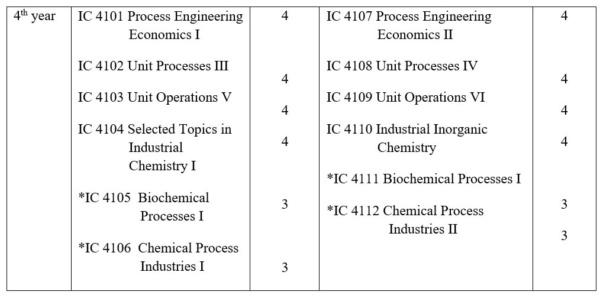
* Elective courses
This is industrial chemsitry in yangon university.
# In partial fulfillment of the requirements for the award of the Bachelor of Science in Industrial Chemistry degree, Fourth Year Students must take part in occasional field trips (to plants / factories) / project assignments, related to their field of studies, as deemed necessary by the Department of Industrial Chemistry and Submission of Term Paper at the end of the second semester.
First Year
Course Description
Industrial Chemistry I (Organic and Analytical Chemistry)
This module includes the structure and nomenclature of organic compounds and the fundamental principles of organic chemistry. It provides the basic concept of analytical chemistry and is also extended to acquire skills in various analytical techniques.
Learning Outcomes
At the end of the course, the students must be able to:
-Understand the fundamental principles and concepts related to Organic and Analytical Chemistry.
-Identify the organic compounds based on their functional groups.
-Apply these principles and concepts in the synthesis and processing of organic compounds.
-Analyze physical and chemical properties, methods of preparation, behavior of solutions and titration indicators.
-Solve the problems related to the calculation of acid base titration.
-Manipulate the Organic and Analytical experiments.
Industrial Chemistry II (Inorganic and Physical Chemistry)
This module provides concepts and principles in the synthesis and methods of processing. This unit deals with the study of different methods to analyze physical and chemical properties, behavior of gases, equilibrium constant. Moreover it can also study the operations and equipment for extraction of minerals and ores.
Learning Outcomes
At the end of the course, the students must be able to:
-Understand the fundamental principles and concepts related to basis chemistry of gases and liquids, colloids.
-Understand colloidal systems for industrial or technological interest.
-Analyze physical and chemical properties, behavior of gases, equilibrium constant.
-Manipulate the acid/base radicals and physical experiments.
-Identify the structure and configuration of atom, nature and energy of electron.
-Classify the position of metals and non-metals in the periodic table and their occurrence, extraction methods and application.
-Understand the methods of exploration, mining and concentrating of the ores, refining of metals and its processing.
Second Year
Course Description
Industrial Organic Chemistry I
This module aims to introduce the naming system, and physical and chemical properties of aromatic, heterocyclic compounds and natural products. This module includes the isolation techniques, preparation and physical and chemical properties of different types of industrially important derivatives.
Learning Outcomes
At the end of the course, the students must be able to:
-Understand the naming system of aromatic and heterocyclic compounds and their derivatives, the sources and pathways of preparation process.
-Apply the isolation techniques for extraction of alkaloids from plant materials.
-Categorize the physical and chemical properties of different types of carbohydrates, the preparation of different products (food and industrially important derivatives).
-Understand the types of amino acid and its nomenclature, physical and chemical properties, structure of amino acids and proteins.
Unit Operations I and II
This module aims to introduce industrial equipment for chemical processes, basic fluid dynamics and characteristics of different types of fluid flow. It provides the fundamentals of solid processing operation. This unit also involves fundamental principles and concepts related to calculation of mass and energy balances in heat exchangers, steam boilers and evaporators.
Learning Outcomes
Unit Operations I
At the end of the course, the students must be able to:
-Understand fundamental units, Dimensional Analysis, Process Development and Industrial Equipment for Chemical Processes.
-Understand the fundamental principles of flow of fluids, size separation, size reduction and sedimentation.
-Apply these mechanisms and principles in industrial engineering.
Unit Operations II
At the end of the course, the students must be able to:
-Understand the fundamental principles and concepts related to calculation of heat balances.
-Apply these concepts and principles in the analysis of specified systems.
-Understand the mechanism of heat exchangers, steam boilers and evaporators.
-Analyze the material and energy balances in heat exchangers, boilers and evaporators.
Industrial Stoichiometry
This module aims to introduce chemical engineering calculations. This unit is also extended to the development of mass and energy balances as applied to the wide range of chemical processes such as distillation columns, evaporators and reactors.
Learning Outcomes
At the end of the course, the students must be able to:
-Understand the fundamental principles and concepts related to calculation of mass and heat balances in distillation and evaporation.
-Analyze the systems of heat transferred and mass transferred across the boundary.
-Derive the appropriate mass and energy balance equations for a giving system.
Learning Outcomes
Industrial Physical Chemistry I
This module deals with the basic concepts and criteria of thermodynamic, phase rule and catalysis. It also involves energy transfer for closed and control volume systems, the interpretation and application of binary phase diagrams and also the important of catalyst in a chemical reaction and their effects on reaction rate.
At the end of the course, the students must be able to:
-Understand the basic concepts of chemical thermodynamic such as temperature, pressure, system, properties, process, state, cycles, equilibrium, enthalpy and entropy.
-Understand the first law, second law and third law of thermodynamics.
-Know heat effect, thermodynamics properties of fluids and flow process.
-Understand the principles of binary phase diagrams.
-Interpret and apply the process conditions.
-Study the importance of catalyst in a chemical reaction and their effects on reaction rate.
-Apply thermodynamics concepts in analyzing the thermal efficiencies of heat engines such as Carnot cycles and the coefficients of performance for refrigerators.
Fuel Science and Technology
This module gives an overview of coal and petroleum industry. It includes the origins, types and qualities of coal and petroleum and their refining as well as introduction to biofuels.
Learning Outcomes
At the end of the course, the students must be able to:
-Understand the fundamental concepts, production, purification and combustion mechanism of fossil fuels (solid, liquid and gaseous).
-Classify the fuels according to their phase state as solid, liquid and gaseous and according to their properties.
-Apply the laboratory tests for the analysis of coal to assess its properties.
-Solve the problems related to combustion of fuel used in chemical process industries.
Third Year
Course Description
Water and Wastewater Technology I & II
This module aims to introduce the general knowledge of natural waters, water characteristics and treatment of water and wastewater. This unit also provides the natural water resources and water quality standards for boiler feed water, surface and ground water, and wastewater.
Learning Outcomes
Water and Wastewater Technology I
At the end of the course, the students must be able to:
-Identify the physical, chemical and biological parameters of the surface and ground water.
-Calculate the chemical parameters such as alkalinity and hardness.
-Recognize the water quality standards.
-Illustrate the fundamentals of water, boiler feed water and wastewater treatment.
-Demonstrate knowledge and understanding of softening and aeration.
-Gain knowledge on disinfection of water.
-Manipulate the experiments of water analysis.
Water and Wastewater Technology II
At the end of the course, the students must be able to:
-Describe and demonstrate basic knowledge of key principles underlying disinfection, coagulation, flocculation, sedimentation and filtration of water and wastewater.
-Describe the physical, chemical, and biological processes necessary for wastewater treatment processes.
-Understand the water pollution control.
-Apply the operational steps in water and wastewater treatment processes.
Unit Processes I & II
Main topics included are hydrolysis, esterification, oxidation, nitration, sulfonation and sulfation reactions in chemical process industries. This module deals with the principles, properties and application of various types of reagents and prime factors influencing the design of nitrators, and also possible side reactions during sulphonation.
Learning Outcomes
Unit Processes I
At the end of the course, the students must be able to:
-Understand the process technologies of various organic and inorganic process industries.
-Describe the principles of oxidation, esterification and hydrolysis reactions in chemical process industries.
-Know the properties of various types of oxidizing gents, esterifying agents and hydrolyzing agents in chemical process industries.
-Apply the technology in manufacture of various inorganic and organic chemicals.
Unit Processes II
At the end of the course, the students must be able to:
-Understand the principles of nitration, sulfonation and sulfation reactions involved in chemical process industries.
-Understand various types of nitration agents, sulfonating and sulfating agents.
-Analyze the pathway of the derivatives through the reactions.
Unit Operations I & II
This module gives an overview of mass transfer, phase equilibria, distillation, extraction and absorption. It involves the study of the fundamental principles of diffusion phenomenon and mass transfer. This unit also provides the equipment, different methods of computation and thermodynamic conditions related to the necessary experimental design.
Learning Outcomes
Unit Operations I
At the end of the course, the students must be able to:
-Understand mass transfer and diffusion in gas, liquid and solid molecules.
-Derive the equations to relate the necessary experimental data and the unknown phase conditions, temperature and pressure.
-Understand the separation techniques.
-Solve the problems related to distillation in chemical process industry.
Unit Operations II
At the end of the course, the students must be able to :
-Compare and contrast the concept of liquid-liquid extraction vs. solid-liquid extraction.
-Derive the mathematic equation of extraction processes.
-Solve the problems using the properties and relationships of extraction processes.
-Understand the mechanism of absorption process.
-Derive the mathematic equations for absorption process.
Industrial Physical Chemistry II & III
This module focuses on basic principles, concepts and mechanisms of chemical engineering kinetics and reactor design. It also provides on study of multiple phase reactions and reaction limitations in continuous and batch type reactors.
Learning Outcomes
Industrial Physical Chemistry II
At the end of the course, the students must be able to:
-Study the rate of chemical reactions and factors affecting the rate of chemical reaction.
-Understand reaction mechanism of chemical reactions.
-Classify the order of reaction and molecularity of chemical reactions.
-Apply various experimental techniques to measure the rate of a chemical reaction, order of reaction, rate constant, molecularity and activation energy in chemical process industries.
Industrial Physical Chemistry III
At the end of the course, the students must be able to:
-Understand the fundamental principles and concepts related to chemical reaction engineering and chemical kinetics.
-Apply these concepts and principles in the analysis of reaction systems.
-Analyze batch and continuous reactor system, multiphase reactor systems and their effects on the reaction.
Petrochemicals
This module gives an overview of the current and future technologies for the oil and gas industry. It involves the study of petrochemicals digest and their derivatives.
Learning Outcomes
At the end of the course, the students must be able to:
-Understand the sources of petrochemicals, techniques, skills and modern tools necessary for the processing of petrochemicals, synthetic gas and detergents.
-Categorize the key products and derivatives of petrochemicals in petroleum based industries.
-Understand the production routes of petroleum based industries.
Plastic Technology
This module gives an overview of the current and future technologies for plastic industry. It involves the study of the fundamental principles of plastic moulding techniques, modern plastic and general properties for design considerations.
Learning Outcomes
At the end of the course, the students must be able to:
-Understand the types and characteristics of raw materials in plastics industries.
-Know the types of plastics, plasticizers, fillers, resins and polymers.
-Understand the manufacturing and polymerization processes, molding techniques and the development of plastics products.
-Know the techniques for the production of elec¬tronic equipments, microelectronic devices and other industrial application.
Fourth Year
Course Description
Process Engineering Economics I & II
This module aims to introduce plant design and economics analysis for chemical engineers. It involves the determination of optimum operating conditions in experimental design, cost estimation and industrial management. Moreover, the leadership and management skill can be taught in this module.
Learning Outcomes
Process Engineering Economics I
At the end of the course, the students must be able to:
-Analyze the optimum operating conditions for minimum cost of a process.
-Apply the concept of alternates based on the quantity or yields.
-Understand the cost estimation of an industry/ factory.
-Evaluate the economic feasibility of new processes and products.
Process engineering Economics II
At the end of the course, the students must be able to:
-Understand the role of leadership and management of differences and conflicts.
-Understand complex ideas and tolerate ambiguity in managerial and organisational problem-solving.
-Understand the basic managerial decisions.
-Manipulate economic analysis for a selection of plant site.
Unit Processes III & IV
Mechanisms of hydrogenation, polymerization, alkylation and industrial polymerization practices can also be learnt in this module. Moreover, it can give the knowledge on the production and application of different resins, covering the alkylation and types of alkylation.
Learning Outcomes
Unit Processes III
At the end of the course, the students must be able to:
-Understand the principles and mechanism of hydrogenation and polymerization reactions involved in chemical process industries.
-Describe the importance of hydrogenation and polymerization catalysts.
-Analyze the techniques of hydrogenation in the production of various types of hydrogenated compounds.
-Apply the polymerization reactions in industrial processes.
Unit Processes IV
At the end of the course, the students must be able to:
-Understand the principles and mechanism of alkylation and polymerization reactions involved in chemical process industries.
-Know the types of alkylating agents in alkylation and catalysts of particular polymerization reactions.
-Apply the technical unit processes and principles of alkylation to produce alkyl aryl detergents.
-Understand industrial polymerization practices.
Unit Operations V & VI
This module gives an overview of filtration, crystallization, drying and their industrial applications. It also provides the empirical and fundamental tools in the design of the process and equipment.
Learning Outcomes
Unit Operations V
At the end of the course, the students must be able to:
-Understand and apply the basic methods of crystallization.
-Evaluate efficiency and requirements of unit operations encountered in process engineering.
-Manipulate empirical and fundamental tools in the design of equipment and processes.
Unit Operations VI
At the end of the course, the students must be able to:
-Understand the basic concepts of drying and adsorption processes in each respective field.
-Know about the dryer types and their classification and operations.
-Study the mechanism of adsorption and types of adsorption, adsorbents and their uses.
-Apply the fundamental theory of adsorption of solid when contacting with fluid mixture and solve the problems encountered in chemical process industries.
Selected Topics in Industrial Chemistry I
This module includes the identification of industrial oil and fat products and also involves the description of their refining and production methods. Moreover, the student can learn the manufacturing processes and uses of soap and detergent, and nitrogen and nitrogen based products. As part of the module, the student can learn research methodology for contribution of research concepts, ideas, laboratory rules, academic writing format and style.
Learning Outcomes
Selected Topics in Industrial Chemistry I
At the end of the course, the students must be able to:
-Understand in the processing and analysis of fats and oils, soaps, detergents and fertilizer.
-Analyze the unit operations and processes involved in manufacturing.
-Understand the basic concept of research methodology, management process and laboratory housekeeping.
-Manipulate research systemically and effectively contribute to the community.
-Write an original/ good research/ project paper.
Industrial Inorganic Chemistry
This module aims to introduce the concepts and principles related to inorganic chemistry and nuclear chemistry. It provides limitations of composites materials used in chemical process industries, properties and uses of the nuclear fuel in nuclear power plants and fundamental concepts of corrosion and the related problems encountered in oil and gas industries.
Learning Outcomes
Industrial Inorganic Chemistry
At the end of the course, the students must be able to:
-Understand the main raw materials, production, properties and uses of composite materials
-Distinguish the types of matrices and reinforcement.
-Discuss the advantages and limitations of composites materials used in chemical process industries.
-Know the fundamental of radioactivity, radioactive decays and nuclear reaction.
-Identify the properties and uses of the nuclear fuel.
-Understand the nuclear reactor and nuclear power plants.
-Understand the fundamental concepts of corrosion and the related problems encountered in oil and gas industries.
-Apply the prevention and protection methods in the piping systems.
Chemical Process Industries I & II
This module can give an access to the factors influencing their manufacturing processes of inorganic acids, pulp and paper products, cosmetic products, and how to prevent the environmental effect related to the chemical industries.
Learning Outcomes
Chemical Process Industries I
At the end of the course, the students must be able to:
-Understand the manufacture of the followings: chlorine and sodium hydroxide, sodium, sulphur, sulphuric acid, hydrochloric acid, some inorganic chemicals, portland cement and glass.
-Identify the influencing factors for the manufacturing process of inorganic and organic products.
Chemical Process Industries II
At the end of the course, the students must be able to:
-Understand the sources, conversion process and manufacture processes of pulp and paper products.
-Manipulate the conversion techniques from biomass into useful products.
-Understand the ingredients used in cosmetics and their functions.
-Describe the basic formulation of a cosmetic product.
-Manipulate the development of cosmetic product.
Undergraduate Studies
Core Courses of Bachelor of Science (Honours) in Industrial Chemistry (Five-year Program, Total Credit Units 216)

* Elective courses
# In partial fulfillment of the requirements for the award of the Bachelor of Science (Honours) in Industrial Chemistry degree, Third Year Honours Students must take part in occasional field trips (to plants / factories) / project assignments, related to their field of studies, as deemed necessary by the Department of Industrial Chemistry and Submission of Term Paper at the end of the second semester.
First Year Honours
Course Description
Water and Wastewater Technology I & II
This module aims to introduce the general knowledge of natural waters, water characteristics and treatment of water and wastewater. This unit also provides the natural water resources and water quality standards for boiler feed water, surface and ground water, and wastewater.
Learning Outcomes
Water and Wastewater Technology I
At the end of the course, the students must be able to:
-Identify the physical, chemical and biological parameters of the surface and ground water.
-Calculate the chemical parameters such as alkalinity and hardness.
-Recognize the water quality standards.
-Illustrate the fundamentals of water, boiler feed water and wastewater treatment.
-Demonstrate knowledge and understanding of softening and aeration.
-Manipulate the experiments of water analysis.
Water and Wastewater Technology II
At the end of the course, the students must be able to:
-Describe and demonstrate basic knowledge of key principles underlying disinfection and wastewater treatment such as coagulation, flocculation, sedimentation and filtration.
-Understand the physical, chemical, and biological processes necessary for wastewater treatment processes.
-Understand the water pollution control.
-Apply the operational steps in water and wastewater treatment processes.
Unit Processes I & II
Main topics included are hydrolysis, esterification, oxidation, nitration, sulfonation and sulfation reactions in chemical process industries. This module deals with the principles, properties and application of various types of reagents and prime factors influencing the design of nitrators, and also possible side reactions during sulphonation.
Learning Outcomes
Unit Processes I
At the end of the course, the students must be able to:
-Understand the process technologies of various organic and inorganic process industries.
-Describe the principles of oxidation, esterification and hydrolysis reactions in chemical process industries.
-Understand the properties of various types of oxidizing gents, esterifying agents and hydrolyzing agents in chemical process industries.
-Apply the technology in manufacture of various inorganic and organic chemicals.
Unit Processes II
At the end of the course, the students must be able to:
-Understand the principles of nitration, sulfonation and sulfation reactions involved in chemical process industries.
-Understand various types of nitration agents, sulfonating and sulfating agents.
-Analyze the pathway of the derivatives through the reactions.
Unit Operations I & II
This module gives an overview of mass transfer, phase equilibria, distillation, extraction and absorption. It involves the study of the fundamental principles of diffusion phenomenon and mass transfer. This unit also provides the equipment, different methods of computation and thermodynamic conditions related to the necessary experimental design.
Learning Outcomes
Unit Operations I
At the end of the course, the students must be able to:
-Understand mass transfer and diffusion in gas, liquid and solid molecules.
-Derive the equations to relate the necessary experimental data and the unknown phase conditions, temperature and pressure.
-Understand the separation techniques.
-Solve the problems related to distillation in chemical process industry.
Unit Operations II
At the end of the course, the students must be able to :
-Compare and contrast the concept of liquid-liquid extraction vs. solid-liquid extraction.
-Derive the mathematic equation of extraction processes.
-Solve the problems using the properties and relationships of extraction processes.
-Understand the mechanism of absorption process.
-Derive the mathematic equation of absorption process.
Industrial Physical Chemistry II & III
This module focuses on basic principles, concepts and mechanisms of chemical engineering kinetics and reactor design. It also provides on study of multiple phase reactions and reaction limitations in continuous and batch type reactors.
Learning Outcomes
Industrial Physical Chemistry II
At the end of the course, the students must be able to:
-Study the rate of chemical reactions and factors affecting the rate of chemical reaction.
-Understand reaction mechanism of chemical reactions.
-Classify the order of reaction and molecularity of chemical reactions.
-Apply various experimental techniques to measure the rate of a chemical reaction, order of reaction, rate constant, molecularity and activation energy in chemical process industries.
Industrial Physical Chemistry III
At the end of the course, the students must be able to:
-Understand the fundamental principles and concepts related to chemical reaction engineering and chemical kinetics.
-Apply these concepts and principles in the analysis of reaction systems.
-Analyze batch and continuous reactor system, multiphase reactor systems and their effects on the reaction.
Petrochemicals
This module gives an overview of the current and future technologies for the oil and gas industry. It involves the study of petrochemicals digest and their derivatives.
Learning Outcomes
At the end of the course, the students must be able to:
-Understand the sources of petrochemicals, techniques, skills and modern tools necessary for the processing of petrochemicals, synthetic gas and detergents.
-Categorize the key products and derivatives of petrochemicals in petroleum based industries.
-Understand the production routes of petroleum based industries.
Plastic Technology
This module gives an overview of the current and future technologies for plastic industry. It involves the study of the fundamental principles of plastic moulding techniques, modern plastic and general properties for design considerations.
Learning Outcomes
Plastic Technology
At the end of the course, the students must be able to:
-Understand the types and characteristics of raw materials in plastics industries.
-Analyze the types of plastics, plasticizers, fillers, resins and polymers.
-Understand the manufacturing and polymerization processes, molding techniques and the development of plastics products.
-Know the techniques for the production of elec¬tronic equipments, microelectronic devices and other industrial application.
Second Year Honours
Course Description
Process Engineering Economics I & II
This module aims to introduce plant design and economics analysis for chemical engineers. It involves the determination of optimum operating conditions in experimental design, cost estimation and industrial management. Moreover, the leadership and management skill can be taught in this module.
Learning Outcomes
Process Engineering Economics I
At the end of the course, the students must be able to:
-Analyze the optimum operating conditions for minimum cost of a process.
-Apply the concept of alternates based on the quantity or yields.
-Understand the cost estimation of an industry/ factory.
-Evaluate the economic feasibility of new processes and products.
Process engineering Economics II
At the end of the course, the students must be able to:
-Understand the role of leadership and management of differences and conflicts.
-Understand complex ideas and tolerate ambiguity in managerial and organisational problem-solving.
-Understand the basic managerial decisions.
-Manipulate economic analysis for a selection of plant site.
Unit Processes III & IV
Mechanisms of hydrogenation, polymerization, alkylation and industrial polymerization practices can also be learnt in this module. Moreover, it can give the knowledge on the production and application of different resins, covering the alkylation and types of alkylation.
Learning Outcomes
Unit Processes III
At the end of the course, the students must be able to:
-Understand the principles and mechanism of hydrogenation and polymerization reactions involved in chemical process industries.
-Describe the importance of catalysts in hydrogenation and polymerization.
-Analyze the techniques of hydrogenation in the production of various types of hydrogenated compounds.
-Apply the polymerization reactions in industrial processes.
Unit Processes IV
At the end of the course, the students must be able to:
-Understand the principles and mechanism of alkylation and polymerization reactions involved in chemical process industries.
-Understand the types of alkylating agents in alkylation and catalysts of particular polymerization reactions.
-Apply the technical unit processes of alkylation for alkyl aryl detergents.
-Understand industrial polymerization practices.
Unit Operations V & VI
This module gives an overview of filtration, crystallization, drying and their industrial applications. It also provides the empirical and fundamental tools in the design of the process and equipment.
Learning Outcomes
Unit Operations V
At the end of the course, the students must be able to:
-Understand and apply the basic methods of crystallization.
-Evaluate efficiency and requirements of unit operations encountered in processes.
-Manipulate empirical and fundamental tools in the design of equipment and processes.
Unit Operations VI
At the end of the course, the students must be able to:
-Understand the basic concepts of drying and adsorption processes.
-Know about the dryer types and their classification and operations.
-Understand the mechanism of adsorption and types of adsorption, adsorbents and their uses.
-Apply the fundamental theory of adsorption of solid when contacting with fluid mixture and solve the problems encountered in chemical process industries.
Selected Topics in Industrial Chemistry I
This module includes the identification of industrial oil and fat products and also involves the description of their refining and production methods. Moreover, the student can learn the manufacturing processes of soap and detergent, and nitrogen and nitrogen based products. As part of the module, the student can learn research methodology for contribution of research concepts, ideas, laboratory rules, academic writing format and style.
Learning Outcomes
Selected Topics in Industrial Chemistry I
At the end of the course, the students must be able to:
-Understand the processing and analysis of fats and oils, soaps, detergents and fertilizer.
-Analyze the unit operations and processes involved in manufacturing.
-Understand the research methodology, management process and laboratory housekeeping.
-Manipulate research systemically and effectively contribute data presentation.
-Write an original/ good research/ project paper.
Industrial Inorganic Chemistry
This module aims to introduce the concepts and principles related to inorganic chemistry and nuclear chemistry. It provides limitations of composites materials used in chemical process industries, properties and uses of the nuclear fuel in nuclear power plants. It also includes fundamental mechanism of corrosion and the related problems encountered in oil and gas industries.
Learning Outcomes
Industrial Inorganic Chemistry
At the end of the course, the students must be able to:
-Understand the main raw materials, production, properties and uses of composite materials
-Distinguish the types of matrices and reinforcement.
-Discuss the advantages and limitations of composites materials used in chemical process industries.
-Understand the fundamental of radioactivity, radioactive decays and nuclear reaction.
-Identify the properties and uses of the nuclear fuel.
-Understand the nuclear reactor and nuclear power plants.
-Understand the fundamental concepts of corrosion and the related problems encountered in oil and gas industries.
-Apply the prevention and protection methods in the piping systems.
Chemical Process Industries I & II
This module can give an access to the influencing factors on their manufacturing processes of inorganic acids, pulp and paper products, cosmetic products, and how to prevent the environmental effect related to the chemical industries.
Learning Outcomes
Chemical Process Industries I
At the end of the course, the students must be able to:
Understand the manufacture of chlorine and sodium hydroxide, sodium, sulphur, sulphuric acid, hydrochloric acid, some inorganic chemicals, portland cement and glass.
-Identify the influencing factors in the manufacturing process of inorganic and organic products.
Chemical Process Industries II
At the end of the course, the students must be able to:
-Understand the sources, conversion process and manufacture processes of pulp and paper products.
-Manipulate the conversion techniques for biomass into useful products.
-Understand the ingredients used in cosmetics and their functions.
-Manipulate and analyze the basic formulation of a cosmetic product.
-Manipulate the development of cosmetic products.
Third Year Honours
Course Description
Process Engineering Economics and Plant Design I & II
This module aims to introduce general design considerations, cost estimation related to optimum design, heat and mass transfer equipment design, handling and treatment of equipment for chemical engineers. It involves determining the optimum conditions of equipment as necessary in the plant design economically.
Learning Outcomes
Process Engineering Economics and Plant Design I
At the end of the course, the students must be able to:
-Understand the equipment of many different units in the development of a complete plant design.
-Apply determining the optimum conditions in unit operations.
-Understand the costs, profits and the important factors in the design of industrial plants.
-Apply the engineering principles in the complete industrial plant design.
Process Engineering Economics and Plant Design II
At the end of the course, the students must be able to:
-Understand the design and cost estimation of heat transfer and mass transfer equipment.
-Analyze the optimum conditions in heat transfer and mass transfer.
-Illustrate the optimum design of heat exchangers by applying basic theories of heat transfer.
Unit Processes V & VI
This module focuses on the mechanisms of amination, halogenation, hydrocarbon synthesis and hydroformylation. It also provides the Nano Science and Technology for the preparation of polymer additives, blends and polymer composites according to solid-state properties of polymers and fundamental thermodynamic relationships.
Learning Outcomes
Unit Processes V
At the end of the course, the students must be able to:
-Understand the solid-state properties of polymers, degradation and fundamental thermodynamic relationships.
-Understand the management of plastics in the environment.
-Understand the polymer additives, blends and polymer composites.
-Apply the nano particles in their related polymer science and technology fields.
Unit Processes VI
At the end of the course, the students must be able to:
-Understand the Fischer Tropsch synthesis processes.
-Understand the reduction methods by amination and halogenation process of the aromatic and aliphatic compounds.
-Understand the design and construction of the equipment for these processes.
Instrumental Methods of Analysis
This module gives the basic principles, instrumentation and applications of UV, IR and NMR spectroscopy. It also provides the identification and purification of organic compounds by interpreting UV, IR and NMR spectrums.
Learning Outcomes
At the end of the course, the students must be able to:
-Understand the basic principles and relevant terms of UV, IR and NMR Spectroscopy.
-Understand the instrumentation and working principle of UV, IR and NMR Spectroscopy devices.
-Interpret UV, IR and NMR spectrums for identification of organic compounds.
Unit Operations VII
This module gives an overview of chemical reactors, fluidization, industrial furnaces, dryers, and different industrial heating processes. This unit also provides the kinetics of homogeneous and heterogeneous reaction processes accompanied by their performance and design of these reactors and also the fuel economy measures and waste heat recovery in industrial furnaces.
Learning Outcomes
At the end of the course, the students must be able to:
-Understand the mechanisms of heterogeneous catalyzed and non-catalyzed reactions and importance of adsorption processes.
-Understand the rate expressions of heterogeneous reactions and catalysis.
-Solve the related problems with fixed bed and fluidized bed reactors.
-Evaluate the design of fixed bed and fluidized bed reactors for heterogeneous reactions.
-Design the component of operating conditions to optimize a desired product in chemical process industries.
Selected Topics in Industrial Chemistry II & III
This module aims to introduce the concepts and principles related to the food product industries, perfume and flavor industries, industrial gases and analysis. It involves the concepts of food processing, preservation and safety, extraction of fragrances from various sources and also the application and handlings of the most common industrial gases.
Learning Outcomes
Selected Topics in Industrial Chemistry II
At the end of the course, the students must be able to:
-Understand the properties of major food constituents and of the biohazards with regard to product quality in food industry.
-Understand the awareness of the principles and importance of cleaning and sanitation in food process operations.
-Evaluate the food processing operations that can affect the quality of foods.
-Apply HACCP for food safety management to a food product design.
-Apply the technical knowledge of waste management in food industry.
Selected Topics in Industrial Chemistry III
At the end of the course, the students must be able to:
-Apply the extraction methods of fragrances or essential oils from various plant sources.
-Understand the various constituents of perfumes and flavors.
-Apply the different synthetics and semi synthetics processes used in perfumes and flavors.
-Understand the industrial gases, specialty gases and its manufacture, uses and safety handling.
Fuel Science
This module includes the fundamental principles of energy conversion by the combustion process (solid fuels, liquid fuels and gaseous fuels) and energy conversion by nuclear reactions. It also provides management of radioactive wastes, application of renewable energy, biological fuel generation, fuel combustion calculation by applying the principles of energy conversion.
Learning Outcomes
At the end of the course, the students must be able to:
-Understand the characteristics of solids, liquid and gaseous fuels for the processing of secondary fuel mixture such as colloidal fuel, petroleum based hydraulic fluids, gasification, methane reforming and synthesis.
-Solve the problems related to the flammability characteristics of hydrocarbon and alcohols, chimney heights and maximum gas concentration at ground level in fuel science and technology.
-Illustrate the basic concept of techniques, skills and modern tools necessary for the processing of nuclear fuel, energy conversion by nuclear reaction and radiation hazards in fissile fuel.
Environmental Science
This module aims to introduce the basic principles underlying air water pollution, effect of weather on pollution, solid waste, chemical reaction in the atmosphere, and stratospheric ozone. This unit provides the water and air pollution prevention techniques in the environment and the management of solid waste, hazardous waste and pesticide.
Learning Outcomes
At the end of the course, the students must be able to:
-Understand the nature and types of water pollutants.
-Understand the reasons of water and air pollution from natural contaminants and various treatment methods employed for the removal of impurities.
-Understand the effects of air pollution on human and animals heaths.
-Evaluate the effect of weather conditions on influence of air pollution and climate changes.
-Apply the systematic use of pesticides and to minimize their impact on environments.
Process Biotechnology I & II
This module gives an overview of fermentation technology and industrial microbiology. It includes basic principles of microbiology, application of fermentation techniques using microorganisms in the processing of food and beverages, production of chemicals and antibiotics and also treatment of wastewater.
Learning Outcomes
Process Biotechnology I
At the end of the course, the students must be able to:
-Understand the growth of substances and environmental conditions required for microorganisms, microbial ecology, and bioreactors.
-Apply these concepts in the production of biomass as source of renewable energy, fermentation process for food production, waste water treatment and composting (will fermentation), production of alcoholic beverages from fruits and vegetables.
-Understand and manipulate the different fermentation processes, treatment of waste effluent from food industries.
-Analyze the effect of influencing factors on different fermentation processes,
Process Biotechnology II
At the end of the course, the students must be able to:
-Understand the basic concepts of biogas technology, production of energy and fertilizer on a decentralized basis for small farms.
-Understand the fermentation conditions.
-Understand the functions of different microorganisms in fermentation.
-Utilize fermentation technology in processing of food, beverages, antibiotics, amino acids, organic acids, and vitamins, etc.
-Understand the process of hydrogen production in biological system.
Courses in Master of Science (Two-year Program, Total Credit Units 64)
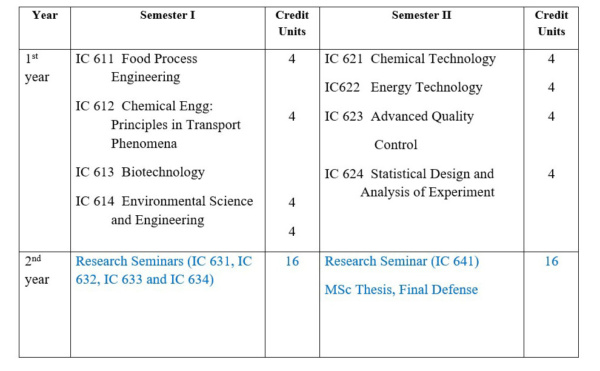
First Year MSc
Course Description
Food Process Engineering
This unit can provide the knowledge in the production of value-added fruits and vegetables related to agro-economics based on nutrition and food safety. Fats and oil technology and their physico-chemical properties are also included in this course.
Learning Outcomes
At the end of the course, the students must be able to:
-Understand keeping the nutritional quality of fruits and vegetables, good quality of fats and oil.
-Apply the knowledge in production of value added fruits and vegetables related agro-foods.
-Integrate the production techniques by maximizing the yield and quality.
-Identify the operations involved in food processing industries.
-Analyze and evaluate the problems involved in unit operations.
Chemical Engineering Principles in Transports Phenomena
This module gives the principles and concepts related to phase separation including distillation and absorption. It also connected with the mass and heat transport phenomena when considering reactor design.
Learning Outcomes
At the end of the course, the students must be able to:
-Understand the phase separation in distillation and absorption units.
-Design proper separation techniques and heat and mass rates.
-Analyze the phases and heat and mass balances.
Biotechnology
The course deals with the metabolic pathway of carbohydrates, fatty acids and amino acids. It also involves principles of fermentation, bioremediation and wastewater treatment.
Learning Outcomes
At the end of the course, the students must be able to:
-Understand advanced fermentation technology and various types of bioreactors.
-Understand the process layout of wastewater treatment.
-Understand the role of enzymes, their immobilization and productions.
-Understand about organic compounds and contaminants.
-Understand the Single-cell proteins and application of microorganisms in making foods.
Environmental Science and Engineering
Environmental Science and Engineering is the study of the principles of sustainable and green chemistry. Key topics are the characteristics of wastes from different industries and key concepts on waste disposal. It also illustrates the chemistry, toxicity, environmental fate and transport of twelve POPs.
Learning Outcomes
At the end of the course, the students must be able to:
-Understand the environmental and human toxicity of persistent organic pollutants.
-Understand the treatment methods of waste emerged from Industrial plant.
-Apply the systematic waste management system in chemical process industries.
-Identify the efficient methods of waste control in industrial plant.
-Illustrate the appropriate materials and methods used in control of environmental pollution problems.
Chemical Technology
This module focus on the production of ceramic, cement, glass, sugar and starch, pulp and paper, paint, varnish, lacquer and allied, leather, gelatin and glue products. It also covers the modern techniques for the preparation and applications of sulphur and nitrogen compounds.
Learning Outcomes
At the end of the course, the students must be able to:
-Understand the manufacturing process and quality control of sugar, starch and related products in sugar and starch industries.
-Understand the processing of paint, varnish, lacquer and allied in organic surface- coatings industries as well as processing, properties and uses of leather, gelatin and glue in leather and leather-tanning industries.
-Understand the fuel consumption in combustion of sulphur compounds, lime, cement and ceramic in chemical technology.
Energy Technology
This unit gives an overview of the current and future technology for deriving energy from biological resources. It also helps the students to understand both radiation and production of bioenergy and nuclear power.
Learning Outcomes
At the end of the course, the students must be able to:
-Apply the processing technology for the production of bioenergy and biofuel (bioethanol, biodiesel) as renewable energy.
-Understand the radiation sources, effects of radiation and how to dispose radioactive waste.
-Review nucleon fusion and nuclear fusion power technology for the generation of nuclear power.
-Classify and analyze the lubricant oil blends which are designed to perform several jobs in engines and other industrial machines.
Advanced Quality Control
This course describes evaluation and interpretation of analytical data which eliminates probable error for sampling processes. It also includes the study of the HPLC and the performance of electrophoresis and electro-chromatography in addition to dealing with the principles of instrumental technique and isolating the elements in compound as pure a form as possible form as possible.
Learning Outcomes
At the end of the course, the students must be able to:
-Manipulate the advance instrumentation of relevant terms of UV, IR, MS, NMR and AAS spectroscopy.
-Understand the instrumentation techniques and working principles of UV, IR, MS, NMR and AAS spectroscopy devices.
-Interpret UV, IR, MS, NMR and AAS spectrums for identification of organic compounds.
Statistical Design and Analysis of Experiments
This unit deals with the process design and experiment, using the basic statistics and statistical software. The process optimization, design and hypothesis of the experimental variables are covered in this unit.
Learning Outcomes
At the end of the course, the students must be able to:
-Understand the concepts related to sampling and population.
-Hypothesize the nature of research and experiments.
-Calculate and design the objective conclusion of data collected.
-Practice and demonstrate the research and experiment using statistics and statistical software.
-Verify the process design and process optimization.
-Relate the statistics in validation of research data.
-Manipulate the research skills using the statistical tool.
Courses in Diploma in Food Technology (One-year Program, Total Credit Units 32)
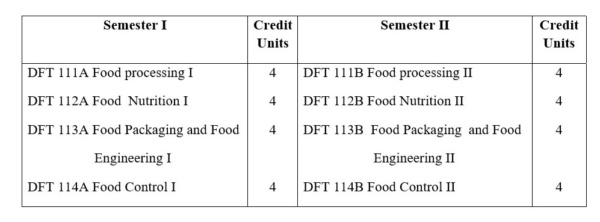
# In partial fulfillment of the requirements for the award of Post-diploma in Food Technology, Diploma Students must take part in occasional field trips (to plants / factories) / project assignments, related to their field of studies, as deemed necessary by the Department of Industrial Chemistry and Submission of Term Paper at the end of the second semester.
Course Description
Food Processing I and II
This module involves the study of sources of fats and oils, their properties and various processing methods as well as processing of milk and milk products, meat, fruits, vegetables, and manufacturing methods of fruit juice and beverages.
Learning Outcomes
At the end of the course, the students must be able to:
-Understand the sources and properties of fats and oils, milk and meat, fruits and vegetables and their various processing methods.
-Manipulate the products based on fats and oils such as butter, magarine, shortening, mayonnaise and salad dressing.
-Adapt to produce fruit juice, carbonated and non-carbonated beverages such as beer, wine, coffee and tea.
-Apply the milling, processing, fermentation techniques to manufacture of value-added cereal products such as bread, cornflakes and corn starch etc.
-Assess different preservation techniques of cereal and cereal products.
-Analyze the spoilage of cereals and cereal products, and range of fermentation processes.
Food Nutrition I and II
This course aims to provide knowledge in the nutritional value of food on the body as it relates to cholesterol, fat, salt and sugar intake. Knowledge of good nutrition that is vital for good health, disease prevention, and essential for healthy growth and development of children and adolescents is also achieved after this course.
Learning Outcomes
At the end of the course, the students must be able to:
-Understand the nutritional values of food on the body.
-Understand the requirements of good health, disease prevention, and essential for healthy growth and development of children and adolescents.
-Understand the structure and properties of biologic molecules.
-Understand the nutrition requirement for pregnant and lactating mothers and prevention of malnutrition.
-Synthesize the nutritive value and processing of supplementary foods, their preservation and function.
-Understand the handling and storage of foods with regard to their physico-chemical characteristics.
Food Packaging and Food Engineering I and II
This course introduces function of food packaging, classification of packaging and packaging containers in food industry and the testing methods of packages. After this course, students can be able to design the process plants and calculate the engineering problems related to mass and energy transfer.
Learning Outcomes
At the end of the course, the students must be able to:
-Understand the function of food packaging and primary materials used in packaging.
-Understand the type of packaging in food industry.
-Classify the types of packaging containers used in food industry.
-Perform the engineering calculations of process plant operations.
Food Control I and II
This course includes major topics of food deterioration and food-borne diseases. It also covers the fundamental principles and concepts related to food preservation by temperature control such as heat and cold processing, sanitary and hygienic practices and habits, national and international food regulations. This also covers the food safety, risks and hazard analysis.
Learning Outcomes
At the end of the course, the students must be able to:
-Understand the major courses of food deterioration and food-borne diseases.
-Understand the principles of food preservation by temperature control.
-Analyze the food safety, risks, hazards and the effect of processing conditions on particular food.
-Apply the food preservation principles in the processing of fruits, vegetables and meat, food nutrition and labeling.
-Verify and solve the deterioration, risk and hazard of foods with the control of food safety.
-Integrate the concepts of food preservation, nutrition and labeling with governmental regulations.
Courses in PhD in Industrial Chemistry (Five –year Program)

PhD Programme
Course Description
Energy Resource Technology
This module gives a board study of the energy conversion by combustion of solid, liquid and gaseous fuels. Key topics include power production, efficiency, operating principles of renewable energy production from various renewable sources.
Learning Outcomes
At the end of the course, the students must be able to:
-Understand the energy conversion by combustion of solid, liquid and gaseous fuels.
-Analyze the mechanism and chemistry of lubrication.
-Understand operating principles, power production, efficiency, energy yield of various renewable energy systems.
-Distinguish between the sustainable energy sources and fossil energy sources with emphasis on solar energy.
-Recognize the need of renewable energy technologies and their role in the Myanmar and world energy demand.
-Disseminate detailed technical aspect of fuel and energy technology.
Biotechnology
This unit let the students analyze chemical changes and biochemical processes and an emphasis will be placed on (1) preservation of the strain and purification of the strains and (2) manipulation of different fermentation states. Moreover, this also covers the concepts of bioreactors and membrane separation techniques.
Learning Outcomes
At the end of the course, the students must be able to:
-Understand the microorganisms, their growth and enzyme actions.
-Analyze chemical changes and biochemical processes.
-Integrate the preservation and purification of the strains.
-Manipulate different fermentation states.
-Adapt bioreactors and membrane separation.
-Integrate and practice fermentation processes.
-Identify different immobilization methods.
Food Science
This course deals with identification and classification of preserving techniques for particular foods. This unit delivers the message to the students about the important facts of temperature control in heat and cold preservation and also atmospheric control in preserving foods. This will investigate the manufacturing processes of various kinds of foods and their appropriate handling for food safety.
Learning Outcomes
At the end of the course, the students must be able to:
-Understand the temperature control in heat and cold preservation and atmospheric control in preserving foods.
-Analyze handling of foods and their constituents, hydrocolloids and manufacturing processes.
-Assess fatty acid profiles, refining of fats and oils focusing on soybean oil extraction and recovery of byproduct
-Adapt preserving techniques for particular foods and manipulate preservation methods.
-Manipulate appropriate food handling and manufacturing processes.
-Solve malpractices of food safety.
Environmental Science
This unit provides in-depth study on water and wastewater treatment, especially on advanced filtration technique based on the concepts of physical and chemical unit processes and operations. Moreover, this also focus on providing the students with the skills to understand the type and nature of air pollutants, the behavior of plumes and relevant meteorological determinants influencing the dispersion of air pollutants.
Learning Outcomes
At the end of the course, the students must be able to:
-Understand in-depth knowledge of physical and chemical properties of unit processes and operations for water and wastewater treatment, especially on advanced filtration technique.
-Understand the radiobiological basis of radiation protection standards and effects radiation on environment and living things.
-Explain and use the main design criteria for water and wastewater treatment processes.
-Evaluate the health risks posed by abandoned toxic/hazardous waste sites and their waste disposal operations.
-Evaluate air quality management and analyze the causes and effects of air pollution.
-Disseminate detailed technical aspect of environmental engineering.
Semester I
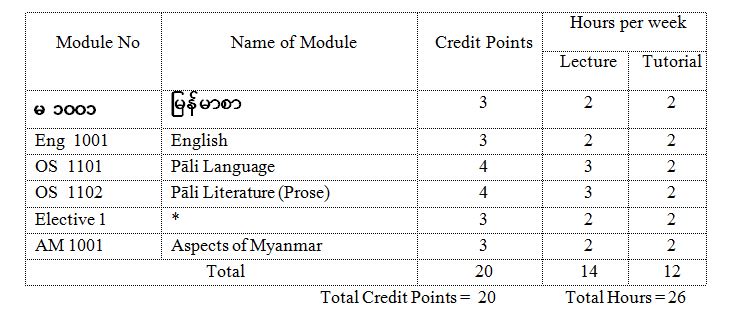
Elective Courses for Oriental Studies Specialization
မ ၁၀ဝ၃ (၃) မြန်မာဇာတိမာန်စာပေ ၁
မ ၁၀ဝ၄ (၃) မြန်မာစကားပုံနှင့်ဆိုရိုးစကားများ
Hist 1001 (3) Introduction to Myanmar Civilization I
Phil 1001 (3) Logic in Practice
Psy 1003 (3) Public Relations
Geo 1003 (3) Geography of South-east Asian Countries
Elective Courses (for Other Specializations)
OS 1001 (3) Fundamentals of the Pāli Language
OS 1002 (3) Fundamentals of the Sanskrit Language
OS 1003 (3) Buddhist Culture
OS 1004 (3) Buddhist Ethics
* A student can choose any one elective course to fulfil the total of 20 credits.
Semester II
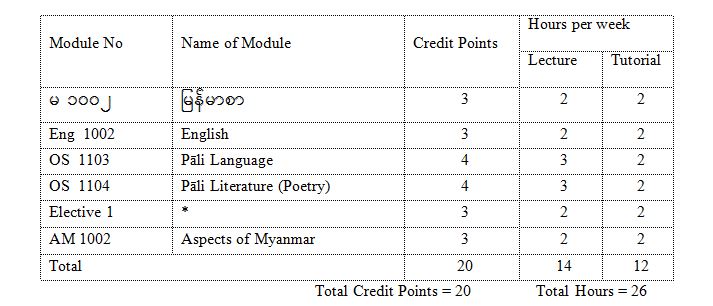
Elective Courses (for Oriental Studies Specialization)
မ ၁၀ဝ၆ (၃) မြန်မာဇာတိမာန်စာပေ ၂
မ ၁၀ဝ၇ (၃) မြန်မာစကားပုံနှင့်ဆိုရိုးစကားများ ၂
Hist 1004 (3) Introduction to Myanmar Civilization II
Phil 1003 (3) Logic in Practice
Psy 1004 (3) Understanding Human Interaction
Geo 1004 (3) Geography of Myanmar
Elective Courses (for Other Specializations)
OS 1005 (3) Pāli Language
OS 1006 (3) Sanskrit Language
OS 1007 (3) Pāli Literature
OS 1008 (3) History of Buddhism
* A student can choose any one elective course to fulfil the total of 20 credits.
Semester I
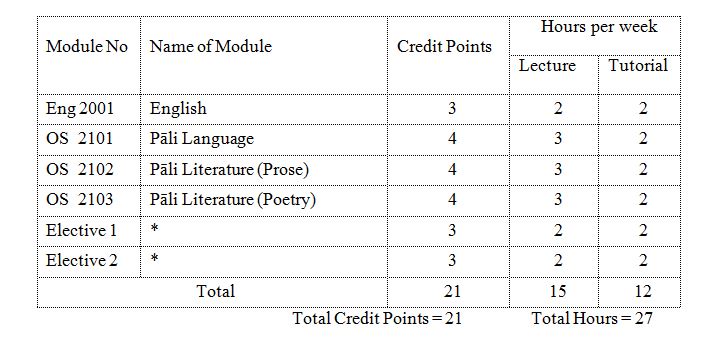
Elective Courses (for Oriental Studies Specialization)
မ ၂၀ဝ၃ (၃) မြန်မာ့ကျေးလက်တေးကဗျာများ(၁)
မ ၂၀ဝ၄ (၃) မြန်မာအမျိုးသမီးစာဆိုများနှင့်၎င်းတို့၏စာများ(၁)
Hist 2002 (3) World History 1900 to the Present I
Eng 2003 (3) Developing Communicative Skills
Phil 2001 (3) History of Western Intellectual Development I
Phil 2003 (3) Aesthetics
OS 2004 (3) Buddhist Councils
Elective Courses (for Other Specializations)
OS 2001 (3) Pāli Language
OS 2002 (3) Buddhadassana
OS 2003 (3) Pāli Literature (Prose)
OS 2004 (3) Buddhist Councils
OS 2005 (3) Pāli Philology
* A student can choose any two elective courses to fulfil the total of 21 credits.
Semester II
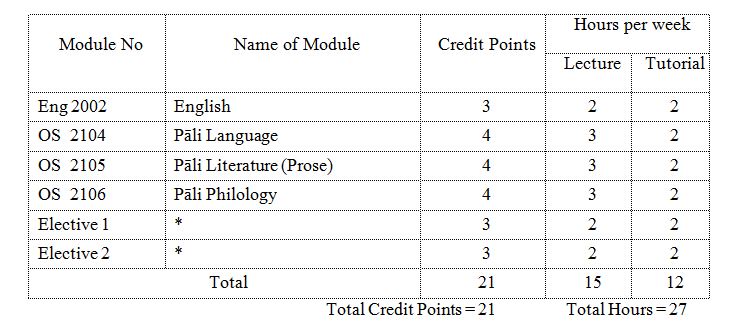
Elective Courses (for Oriental Studies Specialization)
မ ၂၀ဝ၇ (၃) မြန်မာ့ကျေးလက်တေးကဗျာများ(၂)
မ ၂၀ဝ၈ (၃) မြန်မာအမျိုးသမီးစာဆိုများနှင့်၎င်းတို့၏စာများ(၂)
Hist 2005 (3) World History to 1500 II
Eng 2005 (3) Developing Communicative Skills
Phil 2006 (3) History of Western Intellectual Development II
Phil 2008 (3) Aesthetics
OS 2010 (3) Buddhist Councils
Elective Courses (for Other Specializations)
OS 2006 (3) Pāli Language
OS 2007 (3) Nīti Literature
OS 2008 (3) Pāli Literature (Poetry)
OS 2009 (3) Buddhadassana
OS 2010 (3) Buddhist Councils
* A student can choose any two elective courses to fulfil total of 21 credits.
Semester I
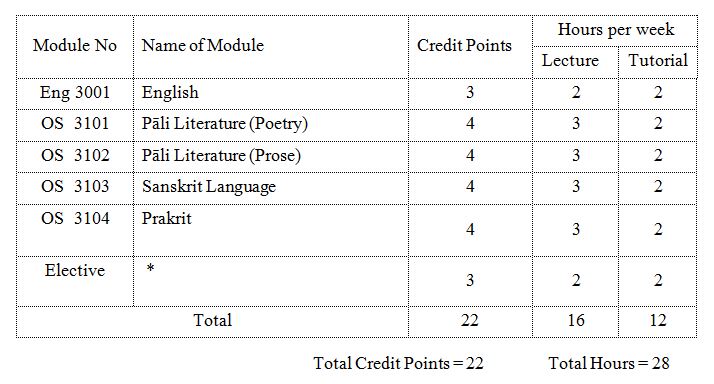
Elective Courses
OS 3105 (3) Pāli Conversation and Composition
OS 3106 (3) History of Buddhism
OS 3107 (3) Linguistics
* A student can choose any one elective course to fulfil total of 22 credits.
Semester II
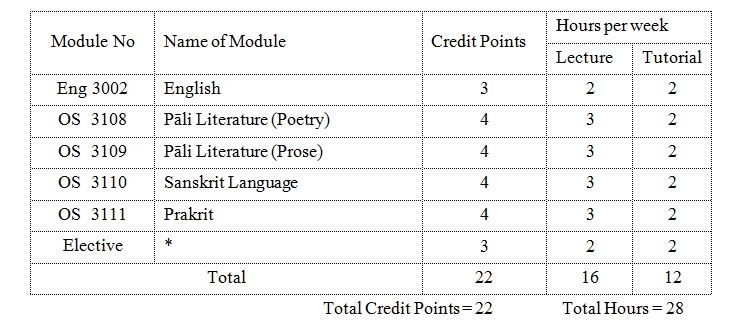
Elective Courses
OS 3112 (3) History of Buddhism
OS 3113 (3) Abhidhamma
OS 3114 (3) Linguistics
* A student can choose any one elective course to fulfil the total of 22 credits.
Semester I
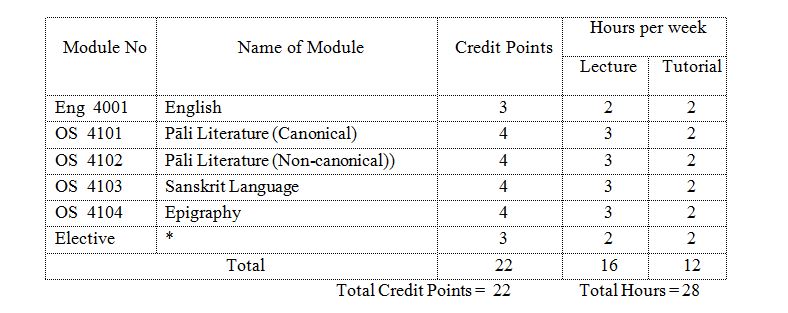
Elective Courses (for Oriental Studies Specialization)
OS 4105 (3) History of Pali Literature in Myanmar
OS 4106 (3) Buddhist Ethics
OS 4107 (3) Buddhist Art and Architecture
* A student can choose any one elective course to fulfil total of 22 credits.
Semester II

Elective Courses (for Oriental Studies Specialization)
OS 4112 (3) Buddhist Culture
OS 4113 (3) Buddhist Philosophy
OS 4114 (3) Buddhist Art and Architecture
* A student can choose any one elective course to fulfil the total of 22 credits.
ပထမနှစ်၊ မြန်မာစာ (ပထမနှစ်၀က် ပညာသင်ကာလ)
မ – ၁၀၀၁ မြန်မာစာ
မ – ၁၁၀၁ စာပေယဉ်ကျေးမှုဆောင်းပါးများ
မ – ၁၀၀၂ အချင်းကဗျာစု
ပထမနှစ်၊ မြန်မာစာ (ဒုတိယနှစ်၀က် ပညာသင်ကာလ)
မ – ၁၁၀၂ မြန်မာစာ
မ – ၁၁၀၃ ဘာသာဆောင်းပါးများ
မ – ၁၁၀၄ ရကန်
ဒုတိယနှစ်၊ မြန်မာစာ (ပထမနှစ်၀က် ပညာသင်ကာလ)
မ – ၂၁၀၁ စကားပြေ
မ – ၂၁၀၂ ကဗျာ (ပျို့)
မ – ၂၁၀၃ ဘာသာဆောင်းပါး
ဒုတိယနှစ်၊ မြန်မာစာ (ဒုတိယနှစ်၀က် ပညာသင်ကာလ)
မ – ၂၁၀၄ ပြဇာတ်
မ – ၂၁၀၅ မော်ကွန်း၊ ဧချင်း
မ – ၂၁၀၆ ဘာသာစကား
တတိယနှစ်၊ မြန်မာစာ (ပထမနှစ်၀က် ပညာသင်ကာလ)
မ – ၃၁၀၁ ၀တ္တု (၁)
မ – ၃၁၀၂ ကဗျာ (၁)
မ – ၃၁၀၃ ဘာသာစကား (၁)
မ – ၃၁၀၄ ဘာသာဗေဒ၊ သဒ္ဒဗေဒ (၁)
မ – ၃၁၀၅ စာပေသဘောတရား
တတိယနှစ်၊ မြန်မာစာ (ဒုတိယနှစ်၀က် ပညာသင်ကာလ)
မ – ၃၁၀၆ ၀တ္တု (၂)
မ – ၃၁၀၇ ကဗျာ (၂)
မ – ၃၁၀၈ ဘာသာစကား (၂)
မ – ၃၁၀၉ ဘာသာဗေဒ၊ သဒ္ဒဗေဒ (၂)
မ – ၃၁၁၀ ကမ္ဘာ့စာပေနိဒါန်း၊ ဘာသာပြန်
စတုတ္ထနှစ်၊ မြန်မာစာ (ပထမနှစ်၀က် ပညာသင်ကာလ)
မ – ၄၁၀၁ ၀တ္တု
မ – ၄၁၀၂ ပျို့
မ – ၄၁၀၃ ဘာသာစကား (၁)
မ – ၄၁၀၄ ဘာသာဗေဒ၊ သဒ္ဒဗေဒ (၁)
မ – ၄၁၀၅ သုတေသနနည်းပညာ၊ ြမန်မာဒေသိယစကားများ (၁)
စတုတ္ထနှစ်၊ မြန်မာစာ (ဒုတိယနှစ်၀က် ပညာသင်ကာလ)
မ – ၄၁၀၆ ပြဇာတ်
မ – ၄၁၀၇ ဇာတိမာန်စာပေ
မ – ၄၁၀၈ ဘာသာစကား (၂)
မ – ၄၁၀၉ ဘာသာဗေဒ၊ သဒ္ဒဗေဒ (၂)
မ – ၄၁၁၀ သုတေသနနည်းပညာ၊ မြန်မာဒေသိယစကားများ (၂)
ပထမနှစ်ဂုဏ်ထူးတန်း၊ မြန်မာစာ (ပထမနှစ်ဝက် ပညာသင်ကာလ)
မ – ၃၂၀၁ ဝတ္တု (၁)
မ – ၃၂၀၂ ကဗျာ (၁)
မ – ၃၂၀၃ ဘာသာစကား (၁)
မ – ၃၂၀၄ ဘာသာဗေဒ၊ သဒ္ဒဗေဒ (၁)
မ – ၃၂၀၅ စာပေသဘောတရား
ပထမနှစ်ဂုဏ်ထူးတန်း၊ မြန်မာစာ (ဒုတိယနှစ်ဝက် ပညာသင်ကာလ)
မ – ၃၂၀၆ ဝတ္တု (၂)
မ – ၃၂၀၇ ကဗျာ (၂)
မ – ၃၂၀၈ ဘာသာစကား (၂)
မ – ၃၂၀၉ ဘာသာဗေဒ၊ သဒ္ဒဗေဒ (၂)
မ – ၃၂၁၀ ကမ္ဘာ့စာပေနိဒါန်း၊ ဘာသာပြန်
ဒုတိယနှစ်ဂုဏ်ထူးတန်း၊ မြန်မာစာ (ပထမနှစ်ဝက် ပညာသင်ကာလ)
မ – ၄၂၀၁ ဝတ္တု
မ – ၄၂၀၂ ပျို့
မ – ၄၂၀၃ ဘာသာစကား (၁)
မ – ၄၂၀၄ ဘာသာဗေဒ၊ သဒ္ဒဗေဒ (၁)
မ – ၄၂၀၅ သုတေသနနည်းပညာ၊ မြန်မာဒေသိယစကားများ (၁)
ဒုတိယနှစ်ဂုဏ်ထူးတန်း၊ မြန်မာစာ(ဒုတိယနှစ်ဝက် ပညာသင်ကာလ)
မ – ၄၂၀၆ ပြဇာတ်
မ – ၄၂၀၇ ဇာတိမာန်စာပေ
မ – ၄၂၀၈ ဘာသာစကား (၂)
မ – ၄၂၀၉ ဘာသာဗေဒ၊ သဒ္ဒဗေဒ (၂)
မ – ၄၂၁၀ သုတေသနနည်းပညာ၊ မြန်မာဒေသိယစကားများ (၂)
တတိယနှစ်ဂုဏ်ထူးတန်း၊ မဟာဝိဇ္ဇာအရည်အချင်းစစ် မြန်မာစာ (ပထမနှစ်ဝက် ပညာသင်ကာလ)
မ – ၅၂၀၁ စကားပြေ
မ – ၅၂၀၂ ဂီတစာပေ
မ – ၅၂၀၃ ရသ/ စာပေသဘောတရား၊ စာပေဝေဖန်ရေး
မ – ၅၂၀၄ ဘာသာစကား (၁)
မ – ၅၂၀၅ ဘာသာစကား (၂)
မ – ၅၂၀၆ ဘာသာစကား (၃)
တတိယနှစ်ဂုဏ်ထူးတန်း၊ မဟာဝိဇ္ဇာအရည်အချင်းစစ် မြန်မာစာ (ဒုတိယနှစ်ဝက် ပညာသင်ကာလ)
မ – ၅၂၀၇ စကားပြေ (၂)
မ – ၅၂၀၈ ဂီတစာပေ
မ – ၅၂၀၉ ရသ/ စာပေသဘောတရား၊ စာပေဝေဖန်ရေး (၂)
မ – ၅၂၁၀ ဘာသာစကား (၄)
မ – ၅၂၁၁ ဘာသာစကား (၅)
မ – ၅၂၁၂ ဘာသာစကား (၆)
မ – ၆၁၁ မြန်မာစကားပြေ
မ – ၆၁၂ မြန်မာကဗျာ
မ – ၆၁၃ ရှေးဟောင်းစာ
မ – ၆၁၄ ဘာသာဗေဒ
မ – ၆၂၁ မြန်မာစကားပြေ
မ – ၆၂၂ မြန်မာကဗျာ
မ – ၆၂၃ ရှေးဟောင်းစာ
မ – ၆၂၄ ဘာသာဗေဒ (၂)
မ – ၆၃၁ ရသစကားပြေ
မ – ၆၃၂ သုတ၊ ရသ စကားပြေ
မ – ၆၃၃ ရှေးစကားပြေ
မ – ၆၃၄ ခေတ်ကဗျာ
မ – ၆၃၁ ရှေးဟောင်းစာ
မ – ၆၃၂ မွန်ကျောက်စာ
မ – ၆၃၃ ဘာသာဗေဒ (၃)
မ – ၆၃၄ ဘာသာဗေဒ (၄)
မ- ၇၁၁ မြန်မာရှေးဟောင်းစာ
မ- ၇၁၂ ပျူ၊ မွန် ရှေးဟောင်းစာ
မ- ၇၁၃ ဘာသာဗေဒ(၁)
မ-၇၁၄ ဘာသာဗေဒ (၂)
မ- ၇၁၁ စာပေသဘောတရား၊ စာပေယဉ်ကျေးမှု
မ- ၇၁၂ ရှေးခေတ်မြန်မာစာပေ
မ- ၇၁၃ ကိုလိုနီခေတ်မြန်မာစာပေ
မ-၇၁၄ လွတ်လပ်ရေးခေတ်မြန်မာစာပေ
စာပေဖန်တီးရေးသားမှုနှင့် တည်းဖြတ်မှုအတတ်ပညာဒီပလိုမာသင်တန်း
DCWE 1011 စာပေသဘောတရား၊ စာပေအတတ်ပညာ
DCWE 1012 စာပေဖန်တီးရေးသားခြင်း၊ ရသပညာ
DCWE 1013 စာပေတည်းဖြတ်ခြင်း
DCWE 1014 စာပေပုံနှိပ်ထုတ်ဝေခြင်းလုပ်ငန်းအခြေခံ
နိုင်ငံခြားသားများအတွက် မြန်မာဘာသာကျွမ်းကျင်တတ်မြောက်မှုဒီပလိုမာ(ပ ဝက်)
မ- ၁၀၁၁ မြန်မာဘာသာ အပြောစွမ်းရည်
မ- ၁၀၁၂ မြန်မာဘာသာ အကြားစွမ်းရည်
မ- ၁၀၁၃ မြန်မာဘာသာ အရေးစွမ်းရည်
မ- ၁၀၁၄ မြန်မာဘာသာ အဖတ်စွမ်းရည်
နိုင်ငံခြားသားများအတွက် မြန်မာဘာသာကျွမ်းကျင်တတ်မြောက်မှုဒီပလိုမာ(ဒု ဝက်)
မ- ၁၀၂၁ အသုံးချမြန်မာဘာသာ
မ- ၁၀၂၂ ဘာသာ၊ စာပေ၊ ယဉ်ကျေးမှု
မ- ၁၀၂၃ အဆင့်မြင့် မြန်မာအရေးအသား
မ- ၁၀၂၄ ရုပ်သံမီဒီယာ မြန်မာဘာသာကြားနာလေ့လာမှု
နိုင်ငံခြားသားများအတွက် အခြေခံမြန်မာဘာသာသင်တန်း
ဘာသာရပ် (၁) အခြေခံအပြောစကား
ဘာသာရပ် (၂) အခြေခံမြန်မာစာ အရေးအသား
ဘာသာရပ် (၃) အခြေခံမြန်မာဘာသာ နာကြားမှု
ဘာသာရပ် (၄) အခြေခံမြန်မာစာဖတ်ရှုမှု

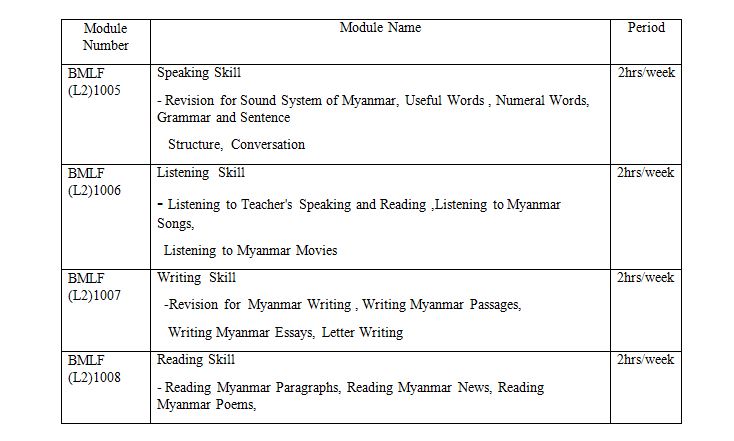
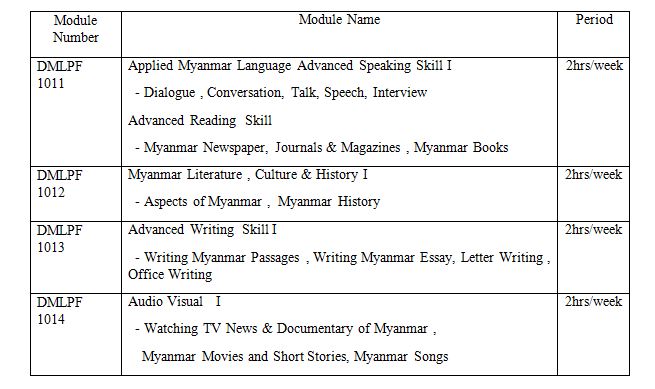
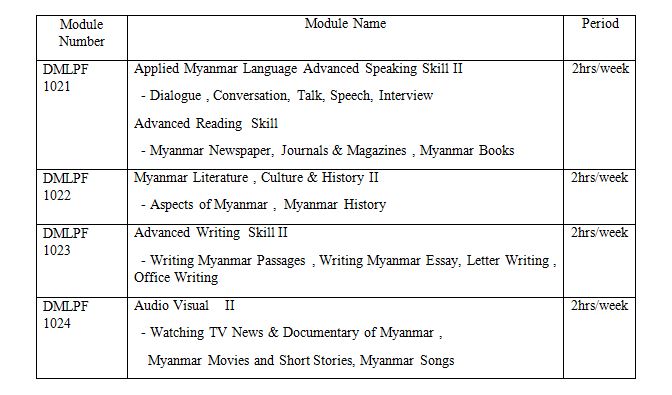
Experience of Review
2007-2020, Research Journal of MAAS
2007-2020, URJ (Universities’ Research Journal)
2013-2020, UYRJ (University of Yangon Research Journal),
2007-2012, WYURJ (West Yangon University’s Research Journal)
Articles
(1) 2018-2019, “Reconsideration of the Watsuji Tetsuro’s Concept of Climate (fudo) from the Perspective of Environmental Aesthetics”, University of Yangon Research Journal, Vol. 9, No. 1
(2) 2018, “A Study of the Image of Woman as Subjection in Some Myanmar Literary Works from Feministic Viewpoint”, Journal of the Asia Research Centre, Yangon University, Vol. 7, No.1 & 2
(3) 2015, “The Concept of Space and Time in Japanese Traditional Thought”, University of Yangon Research Journal, Vol.6
(4) 2010, “The Significant Role of Nagã Symbol in Myanmar Culture”, Universities’ Research Journal, Vol.3, No.7
(5) 2009, “A Study of Some Myanmar Traditional Poems from the Perspective of Western Aesthetics Theories”, West Yangon University Research Journal, 2009, Vol.1, No.1
(6) 2007, “A Study of the Dragon Symbol in Japan and Myanmar from the Perspective of Cultural Adaptability”, Research Journal of MAAS, Vol.5, No.6 (B)
(7) 2003 June, “Dragon Symbolism and Notion of Cosmology in Medieval Japan” (in Japanese), 中世日本における龍の表象と国土観-「行基図」をめぐって-, ZEAMI _ Art and Culture of Medieval Japan_ Vol.2 (Special Issue)
(8) 2003 March, “The Recovery of Artistic Representation” (in Japanese), 表現の奪還-植民地政権.軍事政権下のミャンマー映画―, The Research Proceedings of Culture and Representation Department, The University of Tokyo, Vol.2
Books
(1) 2017, The Role of Japanese Aesthetic Concepts in Environmental Conservation (published by the Research Grant of Sumitomo Foundation, Fiscal 2014 Grant for Japan Related Research Project Awarded), Ahlinnein Media Group, MYANMAR
(2) 1999, Myanmar Astrology and Traditional Myanmar Thought (in Myanmar), “နက္ခတ်ဗေဒင်ပညာနှင့်မြန်မာတို့၏အတွေးအမြင်အစဉ်အလာ”, Yaw Publishing, Yangon, Myanmar, (Co-author is Nandar Thein Zan), Published the research paper which was completed with UY Research Grant 1996.
Dr.Wai Wai Thein
Associate Professor, Department of Botany
Publication
(1) Evaluation of wound healing properties of root extract of Flemingia strobilifera (L.) R. Br. In albino rat model, Journal of Myanmar Academy of Arts and Science, 2019, Vol.17,No.4, 181-188
(2) Estrogenic Activities of Pueraria candollei Grah. Tuberous Roots ( University of Research Journal, 2011, Vol.4,No.1, 139-150)
(3) Effect of Mycorrhiza on Germination, Growth and Mineral Uptake of Spathoglottis plicata Blume.( University of Yangon Research Journal, 2019, Vol.9,No.2, 43-51)
(4) Evaluation of Garbage Enzyme and Its Antimicrobial Activity (University of Yangon Research Journal, 2019, Vol.9, No.2, 171-179)
Supervision
(Total 4)
MRes. (2)
MSc (2)
Daw Aye Aye Cho
Lecturer, Department of Botany
Daw Win Win Aung
Lecturer, Department of Botany
Dr Htet Htet Lyin
Lecturer, Department of Botany
Publication
(1). Study on Morphological and Medicinal Uses of Some Species Grown in Nyaung –Khone Village. (Pyay University Research Journal.2012,Vol.4, No.1)
(2). Study on Fabaceae and Acanthaceae Families of Angiosperms from Pyay Township in West Bago Region. (Universities Research Journal,2017,Vol.10.No.4)
(3). Taxonomic Studies of Some Members of Malvaceae Family occurring in Pyay Township, West Bago Region (Universities Research Journal, 2018, Vol.11, No.10)
(4). Taxonomic Description of the Lamiaceae and Verbenaceae Families of the Flora of Paukkhaung Township (University of Yangon Research Journal, December-2018, Vol.8, No.1)
(5). Study on Some Useful Angiosperm Plants Growing in Mong Kung Township and its Surrounding Area (University of Yangon Research Journal, 2018-2019, Vol.9, No.2)
(6). Study on Some Useful Angiosperm Plants Growing in Aung Myin Bar Hu Protected Forest Area, Pyay Township (Dagon University Commemoration of 25 th Anniversary Silver Jubilee Research Journal, 2019, Vol.9, No.2)
(7). Useful Flowering plants in Myanmar (Korea Research Institute of Bioscience & Biotechnology, 2019, Vol.1)
(8). Study on Some Useful Angiosperm Plants Growing in Nan Oo Pyin Pagoda and its Surrounding Area, Mong Kung Township (3rd Myanmar Korea Conference Research Journal, 2020, Vol. 3, No.4)
Supervision
(Total 1)
MSc 1
Dr Kathy Myint
Lecturer, Department of Botany
Supervision
(Total 7)
MSc 3
MRes 3
PhD (Co) 1
Dr Thu Zar Tin
Lecturer, Department of Botany
Daw Pan Myat Nge
Lecturer, Department of Botany
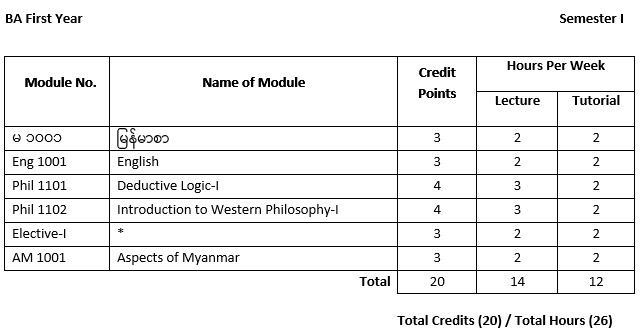
မ ၁၀၀၁ (3) မြန်မာစာ
Eng 1001(3) English
Phil 1101 (4) Deductive Logic-I
Phil 1102 (4) Introduction to Western Philosophy-I
AM 1001 (3) Aspects of Myanmar
Hist 1003 (3) World History to 1500 I
Hist 1004 (3) World History 1500-1900 I
Geog 1003 (3) Geography of Southeast Asian Countries
OS 1001 (3) Fundamentals of the Pāli Language
OS 1002 (3) Fundamentals of the Sanskrit Language
Psy 1003 (3) Public Relations
Psy 1004 (3) General Psychology-I
IR 1002 (3) Introduction to International Relations-I
မ ၁၀၀၅ (3) မြန်မာ့ရိုးရာပုံပြင် (၁)
Anth 1001 (3) Introduction to General Anthropology-I
Math 1002 (3) Mathematics-I
LI 1001 (3) Information Sources of Library (Part-I)
* A student will have to take two electives.
Lecture : (3) Hours per Week * (15) Weeks=(45) Hours
Tutorial/Discussion : (2) Hours per Week * (15) Weeks=(30) Hours
– Logic is the study of sound reasoning and arguments. It investigates the relationship between propositions. This course covers some basic rules, concepts and skills of logic. Students will learn how to identify deductive and inductive arguments; how to use truth-tables to check deductive validity; how to spot formal and informal fallacies of reasoning etc. These skills have lifelong benefits for improving one’s writing, thinking, critical assessment of ideas and personal autonomy.
– The frame of the course bases on the topics of;
1. Introduction to Logic
2. A Study of Logical Fallacies
2.1. The Functions of Language
2.2. Material Fallacies
2.3. Formal Fallacies
3. A Study of Propositions
4. A Study of Immediate Inferences
4.1. The Study of Logical Relations
4.2. Distribution of the Terms in Propositions
4.3. The Traditional Square of Opposition
4.4. Establishing logical relations between propositions
The main objectives of this course are
– The generic learning outcomes
After this study, students will be able to
– The specific learning outcomes
After this study, students will be able to
1. Copi, I. M. (2013). Introduction to Logic (14th Edition). New York: The Macmillan Company.
2. Dan Cryan. Introducing Logic. USA: Icon Books.
3. Epstein, Richard L. (2000). The Pocket Guide to Critical Thinking, Wadsworth: Thomson Learning.
4. Kar, K. N. & U Hla Bu. (1993) A Text Book of Modern Formal Logic. Calcutta: Indian Publicity Society.
5. Khin Maung Din, U. (1982) Lecture Guideline on Elementary Logic, Yangon.
6. Layman, C. Stephen. The Power of Logic. (2005). New York: Mc Graw Hill Co, Inc.
7. Westo, Anhony. (2000). A Rulebook for Arguments, Cambridge: Hackett Publishing Company.
Lecture : (3) Hours per Week * (15) Weeks=(45) Hours
Tutorial/Discussion : (2) Hours per Week * (15) Weeks=(30) Hours
– This course aims at being an introduction to philosophical thinking in general rather than to provide a full survey of philosophical disciplines, their methods, doctrines and leading ideas. Instead of trying to give a comprehensive account of all possible forms philosophy has assumed throughout its long history we shall zero in on several characteristic examples illustrating how classical and modern thinkers formulate their questions and how they grapple with their issues in contrast to ordinary, religious and scientific consciousness. In addition, the course will provide a preliminary orientation about the notion of philosophical argument, its various forms and the ways argument should be analyzed.
– The frame of the course bases on the topics of;
1. Introduction to Western Philosophy
2. The development of Early Greek Philosophy
2.1. The Pre-Socratic Philosophers
2.2. Socrates and the Sophists
3. A General Study of Plato’s Philosophy
4. A General Study of Aristotle’s Philosophy
The main objectives of this course are
– The generic learning outcomes
After this study, students will be able to
– The specific learning outcomes obtain
After this study, students will be able to
1. Armstrong. (1968). An Introduction to Ancient Philosophy. London: Methum Company.
2. Biffle, Christopher. (1999). Landscape of Wisdom. London: Mayfield Publishing Company.
3. Marias, Julian. (1982). History of Philosophy. New York: Dover Publication.
4. Mitchell, Craig Vincent. (2007). Charts of Philosophy and Philosophers. USA: Zodervan.
5. Perelman, C. H. (1965). An Historical Introduction to Philosophical Thinking. New York: Random House.
6. Scruton, Roger. (2001). Kant: A Very Short Introduction. Oxford University Press.
7. Shand, John. (1993). Philosophy and Philosophers. London: UCL Press.
8. Stace, W. T. (1981). A Critical History of Greek Philosophy. New York: The Macmillan Company.
9. Woodhouse, Mark B. (2000). A Preface to Philosophy. Wadsworth: Thomson Learning.
10. Zaine Ridling, PhD. (2001). Philosophy Then and Now: A Look Back at 26 Centuries of Thought. Part I to IV. Access Foundation.
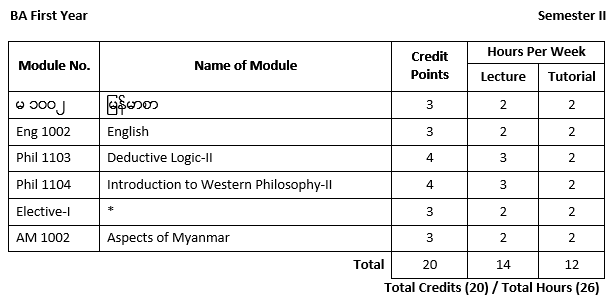
မ ၁၀၀၂ (3) ျမန္မာစာ
Eng 1002 (3) English
Phil 1103 (4) Deductive Logic-II
Phil 1104 (4) Introduction to Western Philosophy-II
AM 1002 (3) Aspects of Myanmar
Hist 1007 (3) World History to 1500-II
Hist 1008 (3) World History 1500-1900-II
Geog 1004 (3) Geography of Myanmar
OS 1005 (3) Pāli Language
OS 1006 (3) Sanskrit Language
Psy 1005 (3) Understanding Human Interaction
Psy 1007 (3) General Psychology-II
IR 1004 (3) Introduction to International Relations-II
မ ၁၀၀၈ (3) မြန်မာ့ရိုးရာပုံပြင် (၂)
Anth 1003 (3) Introduction to General Anthropology-II
Math 1004 (3) Mathematics-II
LI 1003 (3) Information Sources of Library (Part-II)
* A student will have to take two electives (one elective and AM 1002) from among those offered.
Lecture : (3) Hours per Week * (15) Weeks=(45) Hours
Tutorial/Discussion : (2) Hours per Week * (15) Weeks=(30) Hours
– Deductive logic is concerned with valid reasoning in order to apply and utilize this knowledge correctly to new cases which we later come across in experience. Deductive argument is using representational devices, General Rules, Venn’s Diagram, different kinds of Mixed Syllogism and Poly- Syllogism can apply deductive logic as a guide to everyday thinking and everyday life. These rules are determined whether or not a particular deductive argument is valid. This course covers some basic rules, concepts and skills of logic. These skills have lifelong benefits for improving one’s writing, thinking, critical assessment of ideas and personal autonomy.
– The frame of the course bases on the topics of;
A Study of Mediate Inferences
1. The Categorical Syllogism
1.1. The Nature and General Rules of Categorical Syllogisms
1.2. Testing the Validity of Categorical Syllogism
1.3. Some other rules and their proofs.
2. The Mixed Syllogism
3. A Study of Mediate Inference, A Study of Poly-syllogisms, Sorities, Epicherima, Enthymemes
4. The Utility of Deductive Logic for daily life (Problem solving)
The main objectives of this course are
– The generic learning outcomes
After this study, students will be able to
– The specific learning outcomes
After this study, students will be able to
1. Copi, I. M. (2013) Introduction to Logic (14th Edition). New York: The Macmillan Company.
2. Dan Cryan. Introducing Logic. USA: Icon Books.
3. Epstein, Richard L. (2000). The Pocket Guide to Critical Thinking. Wadsworth: Thomson Learning.
4. Kar, K. N. and U Hla Bu. (1993) A Text Book of Modern Formal Logic. Calcutta: Indian Publicity Society.
5. Khin Maung Din, U. (1982) Lecture Guideline on Elementary Logic. Yangon: Department of Philosophy, University of Yangon.
6. Layman, C. Stephen. The Power of Logic. (2005). New York: Mc Graw Hill Co, Inc.
7. Westo, Anhony. (2000). A Rulebook for Arguments. Cambridge: Hackett Publishing Company.
Lecture : (3) Hours per Week * (15) Weeks=(45) Hours
Tutorial/Discussion : (2) Hours per Week * (15) Weeks=(30) Hours
– This course aims at being an introduction to medieval and modern philosophical thinking in general. This course demonstrate understanding of the content and significance of selected viewed of Rationalism, Empiricism and German Idealism. In addition, the course will provide a preliminary orientation about the arguments and conclusions of medieval and modern philosophers, with some reference to the contemporary significance of those arguments and conclusions.
– The frame of the course bases on the topics of;
1. A Study of Medieval Philosophy
2. A Study of Modern Philosophy
2.1. Rationalism Vs Empiricism
2.1.1. René Descartes
2.1.2. Baruch Spinoza
2.1.3. Gottfried Wilhelm Leibniz
2.1.4. Francis Bacon
2.1.5. John Locke
2.1.6. George Berkeley
2.1.7. David Hume
2.2. German Idealism
2.2.1. Immanuel Kant
2.2.2. Johann Gottlieb Fichte
2.2.3. Friedrich Wilhelm Joseph Schelling
2.2.4. Georg Wilhelm Friedrich Hegel
The main objectives of this course are
– The generic learning outcomes
After this study, students will be able to
– The specific learning outcomes
After this study, students will be able to
1. Armstrong. (1968). An Introduction to Ancient Philosophy. London: Methum Company.
2. Biffle, Christopher. (1999). Landscape of Wisdom. London: Mayfield Publishing Company.
3. Marias, Julian. (1982). History of Philosophy. New York: Dover Publication.
4. Mitchell, Craig Vincent. (2007). Charts of Philosophy and Philosophers. USA: Zodervan.
5. Perelman, C. H. (1965). An Historical Introduction to Philosophical Thinking. New York: Random House.
6. Scruton, Roger. (2001). Kant: A Very Short Introduction. Oxford University Press.
7. Shand, John. (1993). Philosophy and Philosophers. London: UCL Press.
8. Stace, W. T. (1981). A Critical History of Greek Philosophy. New York: The Macmillan Company.
9. Woodhouse, Mark B. (2000). A Preface to Philosophy. Wadsworth: Thomson Learning.
10. Zaine Ridling, PhD. (2001). Philosophy Then and Now: A Look Back at 26 Centuries of Thought. Part I to IV. Access Foundation (eBook).

Eng 2001 (3) English
Phil 2101 (4) Eastern Philosophy-I
Phil 2102 (4) Inductive Logic-I
Phil 2103 (4) Twentieth Century Western Philosophy-I
Hist 2002 (3) World History 1900 to Present-I
Geog 2005 (3) Political Geography-I
OS 2001 (3) Pāli Language-I
OS 2003 (3) Pāli Literature (Prose)
Psy 2001 (3) Language and Thought
Psy 2002 (3) The Development of Self-Concept
Eng 2003 (3) Developing Communicative Skills-I
Math 2002 (3) Mathematics-I
LI 2001 (3) Effective Use of Information Centre
r 2004 (3) jrefrmtrsdK;orD;pmqdkrsm;ESifh4if;wdkU\pmrsm; (1)
Phil 2104 (3) The Cultural and Ethical Aspects of Environmental Conservation-I
* A student will have to take two electives.
Lecture : (3) Hours per Week * (15) Weeks=(45) Hours
Tutorial/Discussion : (2) Hours per Week * (15) Weeks=(30) Hours
– This course is a general and thematic introduction to India’s major philosophical traditions. Throughout the course, there will be discussed the differences among Indian philosophical schools and examine three streams of philosophical dissent from the orthodox tradition in the heterodox traditions of Carvaka, Jainism, and Buddhism. From then, move on to examine the development of the orthodox systems, focusing on the Nyaya Vaishesika systems, the Samkhya Yoga, the Mimamsa System and the Vedanta System.
– The frame of the course bases on the topics of;
1. Introduction to Eastern Philosophy
2. The Genesis of Indian Philosophy
2.1. The General Characteristic of Indian Philosophy
2.2. The Stages and Development of Indian Philosophy
3. A General Survey of Indian Philosophical Schools
3.1. The Heterodox Schools
3.2. The Orthodox Schools
The main objectives of this course are
– The generic learning outcomes
After this study, students will be able to
– The specific learning outcomes
After this study, students will be able to
1. Datta & Chatterjee. (1964). An Introduction to Indian Philosophy. Calcutta: University of Calcutta Press.
2. Hiriyana, M. (1949). The Essentials of Indian Philosophy. London: Unwin Brothers Ltd.
3. Hiriyanna, M. (1963). The Essentials of Indian Philosophy. Bombay: Blackie and Son Publishers Pvt. Ltd..
4. Radhakrishnan, Sir. (1982). History of Philosophy Eastern & Western. London: Allen & Unwin Ltd.
Lecture : (3) Hours per Week * (15) Weeks=(45) Hours
Tutorial/Discussion : (2) Hours per Week * (15) Weeks=(30) Hours
– This course aims at being an introduction to the nature of inductive reasoning. Then it can be discussed the process subsidiary to induction, basic principles of induction, and different kinds of induction. Throughout the course, it will be continue to discuss criteria of induction and utility of inductive logic in daily life.
– The frame of the course bases on the topics of;
1. A Study of the Nature of Induction
2. Some Subsidiary Processes of Induction
3. Basic Principles of Induction
4. Different Kinds of Induction
5. Some New Theories of Induction (The modern view – Five kinds of induction)
6. Evaluation of Inductive Reasoning
7. Criteria for causal determination
8. The utility of inductive logic for daily life. (For Student -centred Approach)
The main objectives of this course are
– The generic learning outcomes
After this study, students will be able to
– The specific learning outcomes
After this study, students will be able to
1. Brennan, J. G. (1963). A Handbook of Logic. New York: Harper and Row.
2. Copi, I. M. (1984). Introduction to Logic (Sixth Edition). New York: The Macmillan Company.
3. Dan Cryan. Introducing Logic. USA: Icon Books.
4. Kar, K. N. and U Hla Bu, (1993). A Text Book of Modern Formal Logic. Calcutta: Indian Publicity Society.
5. Khin Maung Din, U. (1982). Lecture Guideline on Elementary Logic. Yangon.
6. Layman, C. Stephen. (2005). The Power of Logic. New York: Mc Graw Hill Co, Inc.
Lecture : (3) Hours per Week * (15) Weeks=(45) Hours
Tutorial/Discussion : (2) Hours per Week * (15) Weeks=(30) Hours
– This course aims to introduce the Twentieth Century philosophy in the light of the historical development and its general characteristics. The study based on some philosophical dimensions disclosed by significant philosophers such as Ontology and Epistemology as the most primary branches and the new trends of thought namely pragmatism, logical positivism and realism.
– The frame of the course bases on the topics of;
1. The Development of Twentieth Century Philosophy and its General Characteristics
2. A Study of Bergson’s Ontology and Epistemology
3. A Study of the Pragmatism
4. A Study of Logical Positivism
5. A Study of Realism
The main objectives of this course are
– The generic learning outcomes
After this study, students will be able to
– The specific learning outcomes
After this study, students will be able to
1. Datta, M. D. (1972). The Chief Currents of Contemporary Philosophy. Calcutta: University of Calcutta Press.
2. Grayling, A. C. (2002). Russell: A Very Short Introduction, Oxford: Oxford University Press.
3. Mitchell, Craig Vincent. (2007). Charts of Philosophy and Philosophers. USA: Zodervan.
4. Perelman, C. H. (1965). An Historical Introduction to Philosophical Thinking. New York: Random House.
5. Russell, Bertrand. (1966). Wisdom of the West. New York: A Fawcett Publication Inc.
6. Shand, John. (1993). Philosophy and Philosophers, London: UCL Press.
7. Thilly, Frank. (1965). A History of philosophy. Allahabad: Indian University Press.
8. Velasquez, Manuel. (2005). Philosophy. New York: Thomson, Wadsworth.
9. Zaine Ridling, PhD. (2001). Philosophy Then and Now: A Look Back at 26 Centuries of Thought, Part I to IV. Access Foundation. (E book)
Lecture : (2) Hours per Week * (15) Weeks=(30) Hours
Tutorial/Discussion : (2) Hours per Week * (15) Weeks=(30) Hours
– This course aims to provide ethical justification and moral motivation for the cause of global environmental protection. In addition, the course will provide an orientation about the notion of environmental conservation, environmental ethics which examines the moral basis of environmental responsibility. This course can contribute to become awareness of environmental responsibility.
– The frame of the course bases on the topics of;
• What is Environmental Conservation
• Definition of Key Terms e
• The need for an ethics of environmental conservation
• Environmental Ethics as a topic of Applied Ethics
• Contribution of Ethics
The main objectives of this course are
– The generic learning outcomes
After this study, students will be able to
– The specific learning outcomes
After this study, students will be able to
1. Attfield, Robin (1991). The Ethics of Environmental Concern (2nd Edition). Athens & London: The University of Georgia Press.
2. Engel, J . Ronald. (1993). Ethics of Environment and Development. London: Belhaven Press.
3. Garvey, James. (2008). The Ethics of Climate Change. London: Continuum International Publishing Group.
4. Kyi Kyi Hla, Daw. (2010). The Ethics of Environmental Conservation. Yangon: Myanmar Academy of Arts and Science.
5. Ministry of Foreign Affairs. (2009) Basic Diplomatic Skills (Lecture Notes). Yangon: Ministry of Foreign Affairs.
6. Taylor, Paul W. (1986). Respect for Nature_A Theory of Environmental Ethics_. Princeton, New Jersey: Princeton University Press.
7. UNESCO. (2004). Ethics in Asia-Pacific. Bangkok: UNESCO.
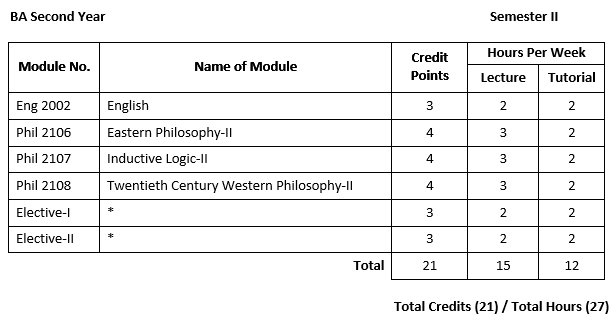
Eng 2002 (3) English
Phil 2106 (4) Eastern Philosophy-II
Phil 2107 (4) Inductive Logic-II
Phil 2108 (4) Twentieth Century Western Philosophy-II
Hist 2005 (3) World History 1900 to Present-II
Geog 2006 (3) Political Geography-II
OS 2006 (3) Pāli Language-II
OS 2008 (3) Pāli Literature (Poetry)
Psy 2004 (3) Stress and Stress Management
Psy 2005 (3) Individual, Social and Cultural Diversity in Pro and Anti-Social Behavior
Eng 2004 (3) Developing Communicative Skills-II
Math 2005 (3) Mathematics-II
LI 2003 (3) Effective Use of Information Centre
r 2008(3) jrefrmtrsdK;orD;pmqdkrsm;ESifh4if;wdkY\pmrsm; (2)
Phil 2109 (3) The Cultural and Ethical Aspects of Environmental Conservation-II
* A student will have to take two electives.
Lecture : (3) Hours per Week * (15) Weeks=(45) Hours
Tutorial/Discussion : (2) Hours per Week * (15) Weeks=(30) Hours
– This course is an introduction to the Chinese philosophy, concerning on the work of such major thinkers as Confucius, Mencius, Hsun Tzu, Mohism, Taoism, Neo-Confucianism and Neo-Taoism. Topics of discussion include the general characteristics of Chinese philosophy, human nature and the human condition, the meaning and value of life, and the nature of the good life.
– The frame of the course bases on the topics of;
1. An Introduction to Chinese Philosophy
2. The Genesis of Chinese Philosophy
3. The General Characteristic of Chinese Philosophies
4. A General Survey of Chinese Philosophy
The main objectives of this course are
– The generic learning outcomes
After this study, students will be able to
– The specific learning outcomes
After this study, students will be able to
1. Chai, C. & W. Chai. (1982). The Stories of Chinese Philosophy. New York: Washington Square Press.
2. Chan, Wing-Tsit. (1963). A Source Book in Chinese Philosophy. Princeton: Princeton University Press.
3. Creel, H. G. (1960). Chinese Thought from Confucius to Mao Tse-tung. Chicago: New American Library.
4. Fung Yu-Lan. (1981). A Short History of Chinese Philosophy. New York: The Free Press.
5. Theodore de Bary, William. (1980). Sources of Chinese Tradition. New York: Columbia University Press.
6. Xu Yuanxiang. (2007). Confucius: A Philosopher for the Ages. Beijing: China International Press.
7. Xu Yuanxiang. (2007). Lao Tzu: The Eternal Tao Te Ching. Beijing: China International Press.
8. Xu Yuanxiang. (2007). Sun Tzu: The Ultimate Master of War. Beijing: China International Press.
Lecture : (3) Hours per Week * (15) Weeks=(45) Hours
Tutorial/Discussion : (2) Hours per Week * (15) Weeks=(30) Hours
– This course aims at being an introduction to the general study of Mill’s method, the nature of inference in science, how to falsified some hypothesis by giving negative instances, some characteristics of scientific methodology and some philosophers’ conception on scientific method.
– The frame of the course bases on the topics of;
1. An Evaluation of Mill’s Method of Causal Determination
2. The Nature of Inference in Science
3. A Study of Scientific Methodology
4. Views Regarding Scientific Methodology
The main objectives of this course are
– The generic learning outcomes
After this study, students will be able to
– The specific learning outcomes
After this study, students will be able to
1. Bernnan, J. G. (1963). A Handbook of Logic. New York: Harper & Row.
2. Copi, I. M. (1982). Symbolic Logic. Fifth Edition, London: The Macmillan Co.
3. Faris, J. A. (1964). Quantification Theories. London: Routledge & Kegan Paul.
4. Gustav, Bergman. (1957). Philosophy of Science. Madison: University of Wisconsin Press.
5. Kar, K. N. and U Hla Bu. (1963). A Text Book of Modern Formal Logic. Third Edition. Rangoon: Rangoon University Press.
6. Layman, C. Stephen. (2005). The Power of Logic. New York: Mc Graw Hill Co, Inc.
7. Prior, A. N. (1963). Formal Logic. London : Oxford University Press.
8. Purtill, R. L. (1971). Logic for Philosophers. New York: Harper & Row.
9. Quine, W. V. O. (1962). Method of Logic. Second Edition. London: Routledge & Kegan Paul.
10. Russell, Bertrand. (1948). Human Knowledge. New York: Siman and Schuster.
11. Tarski, A. (1972). Introduction to Logic and to the Methodology of Educative Science. London: Oxford University Press.
Lecture : (3) Hours per Week * (15) Weeks=(45) Hours
Tutorial/Discussion : (2) Hours per Week * (15) Weeks=(30) Hours
– This course aims at begin the development of analytical philosophy and its general characteristics, the nature of existentialism, idealism and contemporary philosophy, and postmodern thought and some significant philosophers’ views on existentialism, contemporary idealism and postmodern thought from the philosophical perspective. In addition, the course will provide an orientation about the notion of analytical philosophy and significant notions and concepts in twentieth century western philosophy. It can also be familiar students with major figures and movements in the history of western philosophy; familiar with central concepts, topics, theories, and debates and current developments in western philosophy.
– The frame of the course bases on the topics of;
1. A Study of Analytical Philosophy
2. A Study of Existentialism
3. A Study of Contemporary Western Idealism
4. A Study of Later Twentieth Century philosophy
5. An Evaluation of Contemporary Philosophy
6. Postmodern Thought
The main objectives of this course are
– The generic learning outcomes
After this study, students will be able to
– The specific learning outcomes
After this study, students will be able to
1. Anderson, W.T. (1995). The Fortana Postmodernism Reader. London: Fontana Press.
2. Butler, Christopher. (2002). Postmodernism: A Very Short Introduction. Oxford: Oxford University Press.
3. Datta, M. D. (1982). The Chief Currents of Contemporary Philosophy. Calcutta: Calcutta University Press.
4. McCallum, Dennis. (1996). The Death of Truth. USA: Bethany House Publishers.
5. Mitchell, Craig Vincent. (2007). Charts of Philosophy and Philosophers. USA: Zodervan.
6. Perelman, C. H. (1965). An Historical Introduction to Philosophical Thinking. New York: Random House.
7. Ridling, Zaine. PhD. (2001). Philosophy Then and Now: A Look Back at 26 Centuries of Thought, Part I to IV. Access Foundation, (eBook).
8. Shand, John. (1993). Philosophy and Philosophers. London: UCL Press.
9. Thilly, Frank. (1965). A History of Philosophy. Allahabad : Indian University Press.
10. Velasquez, Manuel. (2005). Philosophy. US: Thomson Wadsworth.
Lecture : (2) Hours per Week * (15) Weeks=(30) Hours
Tutorial/Discussion : (2) Hours per Week * (15) Weeks=(30) Hours
– This course aims to provide a unique set of moral values and rules from world religions and ancient cultural views to guide human beings in their relationship with the environment. In addition, the course will provide an orientation about the notions of religion, it can be a powerful source for environmental conservation and protection and world religions, each in their own way, offer a unique set of moral values and rules to guide human beings in their relationship with the environment.
– The frame of the course bases on the topics of;
• Ethical Views on Environmental Conservation and Sustainable Development (Hindu Views)
• Ethical Views of Nature of Taoism
• Ethical Views on Environmental Conservation and Sustainable Development (Myanmar views)
The main objectives of this course are
– The generic learning outcomes
After this study, students will be able to
– The specific learning outcomes
After this study, students will be able to
1. Engel, J . Ronald. (1993). Ethics of Environment and Development. London: Belhaven Press.
2. Garvey, James. (2008) The Ethics of Climate Change. London: Continuum International Publishing Group.
3. Kyi Kyi Hla, Daw. (2010). The Ethics of Environmental Conservation. Yangon: Myanmar Academy of Arts and Science.
4. Ministry of Foreign Affairs. (2009) Basic Diplomatic Skills (Lecture Notes). Yangon: Ministry of Foreign Affairs.
5. Paul W. Taylor (1986). Respect for Nature_A Theory of Environmental Ethics_. Princeton, New Jersey: Princeton University Press.
6. Robin Attfield (1991). The Ethics of Environmental Concern (2nd Edition). Athens & London: The University of Georgia Press.
7. UNESCO. (2004). Ethics in Asia-Pacific. Bangkok: UNESCO.
Eng 3001 – English (Foundation)
Phil 3101 – Advanced Logic-I (Core)
Phil 3102 – Western Aesthetics (Core)
Phil 3103 – Philosophy of History-I (Core)
Phil 3104 – Myanmar Culture and Myanmar Ways of Thinking-I (Core)
*Elective – Student’s Choice (from Philosophy specialization) (Elective)
Eng 3002 – English (Foundation)
Phil 3107 – Advanced Logic-II (Core)
Phil 3108 – Eastern Aesthetics (Core)
Phil 3109 – Philosophy of History-II (Core)
Phil 3110 – Myanmar Culture and Myanmar Ways of Thinking-II (Core)
*Elective – Student’s Choice (from Philosophy specialization) (Elective)
Phil 711 – Traditional Culture of the East and West (Core)
Phil 712 – Philosophical Anthropology (Core)
Phil 713 – Culture, Language and Art (Core)
Phil 714 – Mythology, Culture and Religion (Core)
Dr Soe Soe Yu Hnin
Assistant Lecturer, Department of Botany
Phil 611 – Logic and Research Methodology (Core)
Phil 612 – Social Philosophy (Core)
Phil 613 – Axiological Studies (Core)
Phil 614 – Special Topics in Eastern Philosophy (Core)
Phil 621 – Philosophy of Science (Core)
Phil 622 – Philosophy of Historical Studies (Core)
Phil 623 – Philosophy of Culture (Core)
Phil 624 – Special Topics in Western Philosophy (Core)
Phil 631 – Seminar-I (Core)
Phil 632 – Seminar-II (Core)
Phil 633 – Research and Progress Report (Core)
Phil 634 – Research Outline and their Presentation (Core)
Phil 641 – Research and Seminar (Core)
Phil 642 – Thesis and Viva Voce (Core)
Phil 5201 – Issues in Indian Philosophy (Core)
Phil 5202 – Issues in Western Philosophy -I (Core)
Phil 5203 – Philosophy of Education-I (Core)
Phil 5204 – Topics in Buddhism-I (Core)
Phil 5205 – Ethics of Virtue-I (Plato) (Core)
Phil 5206 – Selected Philosophical Writing-I (Core)
Phil 5207 – Issues in Chinese Philosophy (Core)
Phil 5208 – Issues in Western Philosophy -II (Core)
Phil 5209 – Philosophy of Education-II (Core)
Phil 5210 – Topics in Buddhism-II (Core)
Phil 5211 – Ethics of Virtue-II (Aristotle) (Core)
Phil 5212 – Selected Philosophical Writing-II (Core)
U Sithu Aung Min
Assistant Lecturer, Department of Botany
(1) Metaphysics
(2) Epistemology
(3) Value Study
(4) Social and Political Philosophy
(5) Philosophy of Culture
(6) Comparative Philosophy
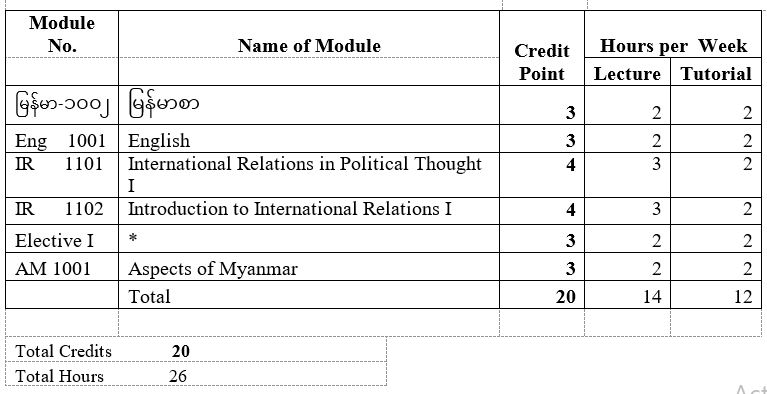
Foundation Courses
မြန်မာစာ-၁၀၀၂ (3) မြန်မာစာ
Eng 1001 – (3) English
Core Courses
IR 1101 – (4) International Relations in Political Thought I
IR 1102 – (4) Introduction to International Relations I
* Elective Courses
Geog 1003 – (3) Geography of Southeast Asian Countries
Hist 1003 – (3) World History to 1500 I
AM 1001 – (3) Aspects of Myanmar
*A student must take one course (3 credits), and can choose one elective (3 credits) offered by the Department of Myanmar, Geography and History.
IR-1101 International Relations in Political Thought I
Course Description
This course aims to introduce students to political thought of various philosophers including western and non-western thinkers as well as classical and modern thinkers. Students will be familiar with famous political thinkers’ different perspectives on human nature, society, justification of government and state, citizenships, liberty, justice, morality, war and peace.
Learning Outcomes
At the end of the course, students will be able
Class organisation
This course is divided into sixteen (16) weeks. In each week, nearly three hours will be devoted to interactive lectures and two hours will be classwork.
Grading
Class Work
Students will be assessed on their participation and attendance in lectures. There will be one-time group presentation (three/four in each group). Students will individually need to submit an essay in which main arguments and thought of two or more thinkers on same issues are critically examined and analyzed in comparative way. Students have to sit three tutorial tests. All class activities will be worth 35 of the students overall final grade.
Class Participation 5
Tutorial 10
Presentation 10
Academic Essay 10
Class Work Total 35
Final Exam
There will be final exam at the end of all lectures. The final exam will be comprehensive (i.e., it will cover the entire semester) and be worth 65 of the overall course grade.
IR-1102 Introduction to International Relations I
Course Description
The course aims to understand the basic concepts of International Relations among nation-states. The course will describe the linkages of conflict and cooperation between states. The course will also explain significant elements of national power and the nature of foreign policy and diplomacy.
Learning Outcomes
At the end of the semester, the students will be able
– to explore different types of state, nation and nation-state in modern state system
– to clarify elements of national power
-to analyze decision making actors and process through the nature of foreign policies
-to examine the criteria of diplomats through learning diplomacy
Class Organization: The course is divided into sixteen weeks. In each week, three hours will be devoted to interactive lectures and two hours will be classwork.
Readings: There are articles and textbook chapters assigned each week which will be provided with handouts.
Grading
Classwork (Attendance and Presentations)
Students will be assessed on their attendance in lectures and their participation in tutorial discussions, including group presentations in reading circles. All class activities and attendance will be worth 35 of the students overall final grade.
Final Exam
There will be final exam in Week 16. The Final exam will be comprehensive (i.e.., it will cover the entire semester) and be worth 65 of the overall course grade.
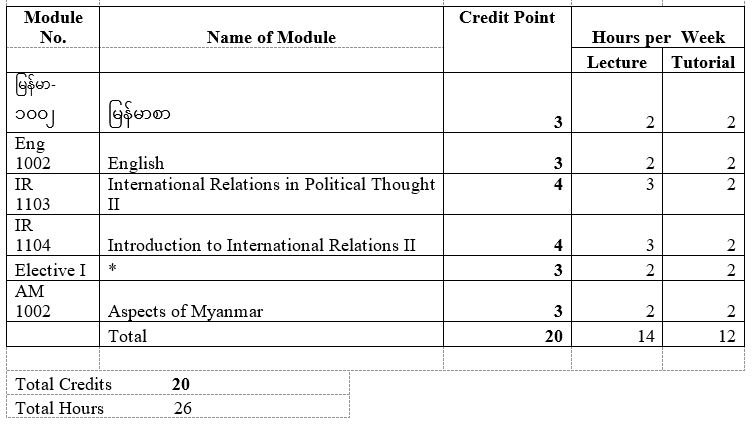
Foundation Courses
မြန်မာစာ-၁၀၀၂ (3) မြန်မာစာ
Eng 1002 – (3) English
Core Courses
IR 1103 – (4) International Relations in Political Thought II
IR 1104 – (4) Introduction to International Relations II
* Elective Courses
Geog 1004 – (3) Geography of Myanmar
Hist 1006 – (3) World History to 1500 II
AM 1002 – (3) Aspects of Myanmar
*A student must take one course (3 Credits) and can choose one elective (3 Credits ) offered by the Department of Myanmar, Geography and History .
IR- 1103: International Relations in Political Thought II
Course Description
This course aims to introduce students to political thought of various philosophers including western and non-western thinkers as well as classical and modern thinkers. Students will be familiar with famous political thinkers’ different perspectives on human nature, society, justification of government and state, citizenships, liberty, justice, morality, war and peace.
Learning Outcomes
By the end of the course, students will be able
Class organisation
This course is divided into sixteen (16) weeks. In each week, nearly three hours will be devoted to interactive lectures and two hours will be class work.
Grading
Class Work
Students will be assessed on their participation and attendance in lectures. There will be one-time group presentation (three/four in each group). Students will individually need to submit an essay in which main arguments and thought of two or more thinkers on same issues are critically examined and analyzed in comparative way. Students have to sit three tutorial tests. All class activities will be worth 35 of the students overall final grade.
Class Participation 5
Tutorial 10
Presentation 10
Academic Essay 10
Class Work Total 35
Final Exam
There will be final exam at the end of all lectures. The final exam will be comprehensive (i.e., it will cover the entire semester) and be worth 65 marks of the overall course grade.
IR 1104- Introduction to International Relations II
Course Description
The course aims to focus on numerous elements of economic and military aspect of International Relations. The course will deal with major threats to global security during the post-cold war era. The course will also explore the salient features of non-state actors in International Relations which involve Regional and International organizations and International Non-governmental Organizations/Non-governmental Organizations (INGOs/NGOs).
Learning Outcomes
At the end of the semester, the students will be able
Class Organization: The course is divided into sixteen weeks. In each week, three hours will be devoted to interactive lectures and two hours will be classwork.
Readings: There are articles and textbook chapters assigned each week which will be provided on handouts.
Grading
Classwork (tutorials, presentations, quiz)
Students will be assessed on their attendance in lectures and their participation in tutorial discussions, including group presentations in reading circles. All class activities and attendance will be worth 35 marks of the students overall final grade.
Final Exam
There will be final exam at the end of all lectures. The final exam will be comprehensive (i.e., it will cover the entire semester) and be worth 65 marks of the overall course grade.
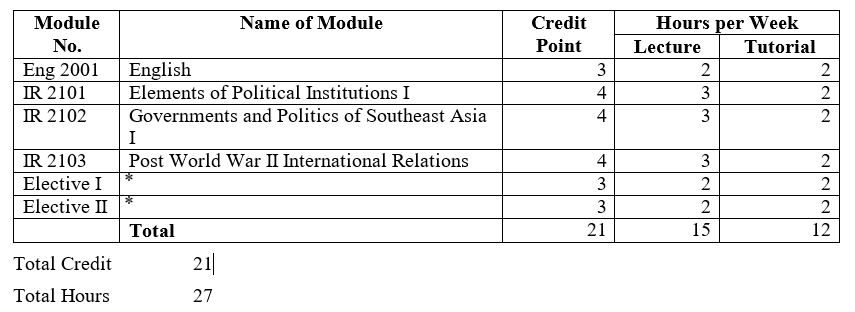
Core Courses
IR 2101 – (4) Elements of Political Institutions I
IR 2102 – (4) Governments and Politics of Southeast Asia I
IR 2103 – (4) Post World War II International Relations
⃰ Elective Courses
Eco 2001 – (3) Principles of Economics
Law 2001- (3) Study of Law
Hist 2001-World History 1900
⃰ A student must choose any two elective courses offered by the Department of Economics, Law and History.
IR 2101 Elements of Political Institutions I
Course Description
The course aims to study the introduction of the nature, classification, functions of different political institutions. It will focus on types of constitution, state systems, and interactive relations between political institutions. Three branches of government (legislative, executive, and judiciary) will also be studied in the course.
Learning Outcomes
Class organization
The course is divided into sixteen (16) weeks. In each week, three hours will be devoted to interactive lectures and two hours will be assigned for presentation and quiz.
Grading
Classwork (Presentation, Assignment, quiz) 35%
Final Exam Paper 65%
Final Exam
There will be a final exam in Week 16. The final exam will be comprehensive (i.e., it will cover the entire semester) and be worth 65% of the overall grade course.
Attendance and Presentation
Students will be assessed on their attendance in lectures, quiz, tutorial, and their participation in group presentation in tutorial time. All tutorial activities and attendance will be worth 35% of the students’ overall final grade.
IR 2102 Governments and Politics of Southeast Asia I
Course Description
This course will introduce the students to study the politics of the Southeast Asia region and regionalism, the role of international actors in SEA and the cold war in SEA. It aims to provide students with the understanding of domestic politics in Indonesia, Malaysia, Singapore and Brunei countries. The system of governance, the party and electoral system, and an assessment of the state will be analyzed in each country. This course will also examine the socio-political, economic trends and developments, foreign policy of each country and their foreign relations with major powers such as US, China and Japan.
Learning Outcomes
Class Organization
The course is divided into sixteen (16) weeks. In each week, three hours will be devoted to interactive lectures and two hours will be assigned for group activities, presentation and tutorials.
Grading
Class Work (Presentation/Assignment/Tutorials) 35%
Final Exam Paper 65%
Final Exam
There will be final exam in Week 16. The final exam will be comprehensive (i.e., it will cover the entire semester) and be worth 65 % of the overall course grade.
Attendance and Presentations
Students will be assessed on their attendance in lectures, tutorials and their participation in group presentations in tutorial time. All tutorial activities and attendance will be worth 35% of the students overall final grade.
IR 2103 Post World War II International Relations
Course Description
The course is designed to introduce the history of international relations after the Second World War. It aims to examine conflicts and cooperation between the two blocs that characterized a bipolar system. The main idea of the course is that the two superpowers confronted one another, the United States and the Soviet Union, although there was disagreement about whether this had led to peace and stability or to rising tension and insecurity.
Learning Outcomes
Class Organization
The course is divided into sixteen (16) weeks. In each week, three hours will be devoted to interactive lectures and two hours will be assigned for group activities, presentation and tutorials.
Grading
Class Work (Presentation/Assignment/Tutorials) 35%
Final Exam Paper 65%
Final Exam
There will be final exam in Week 16. The final exam will be comprehensive (i.e., it will cover the entire semester) and be worth 65 % of the overall course grade.
Attendance and Presentations
Students will be assessed on their attendance in lectures, tutorials and their participation in group presentations in tutorial time. All tutorial activities and attendance will be worth 35% of the students overall final grade.

Core Courses
IR 2104 – (4) Elements of Political Institutions II
IR 2105 – (4) Governments and Politics of Southeast Asia II
IR 2106 – (4) Post-Cold War II International Relations
⃰ Elective Courses
Eco 2002 – (3) International Trade
Law 2006 – (3) Introduction to International Law
Hist 2004 – (3) World History 1900
⃰ A student must choose any two elective courses offered by the Department of Economics, Law and History.
IR 2104 Elements of Political Institutions II
Course Description
This course aims to explore how the concepts of political institutions come to be essential in democratic countries. It will analyze the differences of party systems in democratic countries which have various types of elections, voting system in particular institutions. It will also examine the role of citizenships, civil society and media which are major parts of political institutions in democratic countries.
Learning Outcomes
After ending the course, the students will assess
-To understand the basic concepts of political institutions
-To criticize the differences of the party systems, elections system and voting system
-To explore the important of citizenships, civil society and media
Class Organization
This course is divided into 16 weeks. Three hours will be taken for the lecture time and two hours will be had for other class activities during each week.
Grading:
Final Exam
After ending the semester, all course descriptions will be completed for the final exam which is worth 65 marks of the overall course grade.
Attendance and Presentation
Class participation (attendance, tutorial, discussion, presentation and assignment) is important for a student. Grade will be depended on the student’s activities. Plagiarism is strongly limited in the paper.
IR-2105-Governments and Politics of Southeast Asia II
Course Description
This course will introduce the students to the overview politics of the Southeast Asia region and regionalism, the international actors in SEA and the cold war in SEA. This course aims to provide students with the understanding of domestic politics in Vietnam, Cambodia, Laos, Thailand and the Philippines countries. Each country study includes an analysis of the system of governance, the party and electoral system, and an assessment of the state. This course will also examine the socio-political, economic trends and developments, foreign policy and foreign relations to the larger powers of the US, China and Japan.
Learning Outcomes
By the end of the course, students will evaluate the process of political change and transition with the key trends and development in the Vietnam, Cambodia, Laos, Thailand and the Philippines politics.
Class Organization: The course is divided into sixteen (16) weeks. In each week, it will consist of interactive lectures, group activities, presentation and tutorials.
Grading
Class Work (Presentations/Assignment/Tutorials and Attendance) 35
Final Exam Paper 65
Final Exam
There will be final exam in Week 16. The final exam will be comprehensive (i.e., it will cover the entire semester) and be worth 65 marks of the overall course grade.
Attendance and Presentations
Students will be assessed on their attendance in lectures and tutorials and for their participation in tutorial discussions, including group presentations in tutorial time. All tutorial activities and attendance will be worth 35% of the students overall final grade.
IR 2106 Post-Cold War International Relations
Course Description
This course aims to understand the nature of Cold War, major causes for the outbreak of cold war and the consequences of the Cold War. It will also focus on the role of external powers in the domestic affairs of a country and the unipolar world order which arise after the end of the cold war will be introduced. Students will learn what polarity is, what it means by uni-polarity and the pros and cons of the unipolar world order.
Learning Outcomes
Class Organization
The course is divided into sixteen (16) weeks. Three hours will be devoted to the interactive lectures and two hours will be taken for group discussion and assignment in each week.
Grading:
Class work (discussion and assignment) 35 %
Exam Marks 65 %
Final Exam
There will be final exam in Week 16. The final exam will be comprehensive (i.e., it will cover the entire semester) and be worth 65 % of the overall course grade.
Attendance and Presentation
Students will be assessed on their attendance in lectures, tutorials, assignments and their participation in group presentation in tutorial time. All class activities and attendance will be worth 35 % of the students overall final grade.
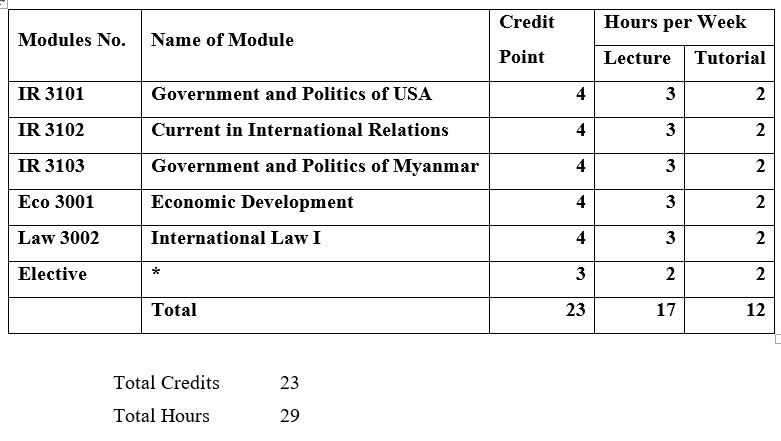
Core Courses
IR 3101 – (4) Government and Politics of USA
IR 3102 – (4) Current Issues in International Relations
IR 3103 – (4) Government and Politics of Myanmar
Eco 3001 – (4) Economic Development
Law 3002 – (4) International Law I
* Elective Courses
IR 3104 – (3) International Relations in Middle East I
IR 3105 – (3) International Relations in Latin America
Geog 3001 – (3) Elements of Political Geography I
*A student must choose any one elective course offered by the Department of International Relations and Geography.
IR 3101 Government and Politics of USA
Course Description
The objective of this course is to introduce key political concepts, ideas, institutions, policies, characteristics of the constitutional system, Supreme Court decisions, the relationships and interactions among political institutions, and political culture of the United States. The course aims to develop critical understanding of the strengths and weakness of the American political system as well as their rights and responsibilities as citizens. This course aims to explore history, the formation of the American system and how it shapes public policy.
Learning Outcomes
At the end of the semester, the student will be able
Class Organization
This course is divided into 16 weeks. In each week, three hours will be devoted to interactive lectures and two or one hours will be devoted to tutorials and discussions.
Grading
Class Room Activities 35 marks (Attendance, Tutorial, Assignment, Discussions and Presentation)
Final Exam Paper 65 marks
Final Exam
There will be final exam in Week 16. The final exam will be comprehensive (i.e it will cover the entire semester) and be worth 65 marks of the overall course grade.
Tutorials, Mini-tests and Presentations
Tutorials will be a range of actives and will aim to increase student’s understanding of the weekly readings and key concepts. In addition, tutorials will build student’s practical skill.
IR 3102 Current Issues in International Relations
Course Description
The course aims to explain causes and effects of current political and economic issues in International Relations. The course will identify sources of social issues among states. The course will also explore major factors in international cooperation to settle the issues.
Learning Outcomes
At the end of the semester, the students will be able
Class Organization
This course is divided into sixteen (16) weeks. In each week, three hours will be devoted to interactive lectures.
Readings
There are articles and textbook chapters assigned each week which will be provided on handouts.
Grading
Attendance and Presentations 35 marks
Final Exam 65 marks
Final Exam
There will be final exam in Week 16. The Final exam will be comprehensive (i.e.., it will cover the entire semester) and be worth 65% of the overall course grade.
Attendance and Presentations
Students will be assessed on their attendance in lectures and interactive discussion in group presentations. Term paper will be included in 35% of the students’ overall final grade.
IR 3103 Government and Politics of Myanmar
Course Description
This course covers the political processes of Myanmar from the colonial period at the beginning of 1900 to current political atmosphere in Myanmar. Since Myanmar regained its independence from Britain in 1948, many challenges continue to face Myanmar, including ethnic peace, economic progress and addressing humanitarian needs. The instructor will start with the political development of Myanmar based on the religion since the early 1900s. Main areas of this course include constitutional interpretation and its implications, ethnic minority rights, faction in parties and organizations as well as the role of military in Myanmar’s politics. The basic idea of this course is to identify themes that have shaped contemporary political landscape of Myanmar. This course also discusses such factors as ethnic politics and legacies of colonial rule that Myanmar government has faced today.
Learning Outcomes
By the end of the course, students will be able
to evaluate contemporary Myanmar politics by learning political history of Myanmar
to assess nature of political institutions and political parties in Myanmar
Class organization
This course is divided into 16 weeks. In each week, three hours lectures will be devoted to interactive learning.
Grading
Class participation (tutorial, assignments, presentation, etc) 35 marks
Exam 65 marks
Final Exam
There will be final exam in Week 16. The Final exam will be comprehensive (i.e.., it will cover the entire semester) and be worth 65% of the overall course grade.
Attendance and Presentations
Students will be assessed on their attendance in lectures and interactive discussion in group presentations. Term paper will be included in 35% of the students’ overall final grade.
*Elective Course (Major)
IR-3104 International Relations in Middle East I
Course Description
This class aims to know the students about the geopolitical locations of Middle East and the emergence of the State of Israel in 1948. After establishing the State of Israel, four major wars appeared among Arab and Israel. International organizations and super powers countries involved the affairs of Middle East but Middle East’s situations cannot settle yet. Different non-states actors evolve and the current circumstances are more complex.
Learning outcomes
At the end of the semester, the students will be able
-to understand the past and present conditions in Middle East,
-to analyze the various problems in Middle East and
-to use effective methods for settling Middle East’s affairs
Class Organization
The Course is divided into 16 weeks. In each week, 3 hours will be devoted to interactive lectures and 2 hours will be classwork.
Grading
Class work (presentation, assignment, quiz) 35 marks
Final Exam paper 65 marks
Final Exam
There will be final exam in week 16. The final exam will be comprehensive ( i.e., it will cover the entire semester) and be worth 65 marks of the overall course grade
Attendance and Presentations
Students will be assessed on their attendance in lectures and tutorials and for their participation in tutorial, discussion, including group presentations in tutorial time. All tutorial activities and attendance will be worth 35% of the students overall final grade.
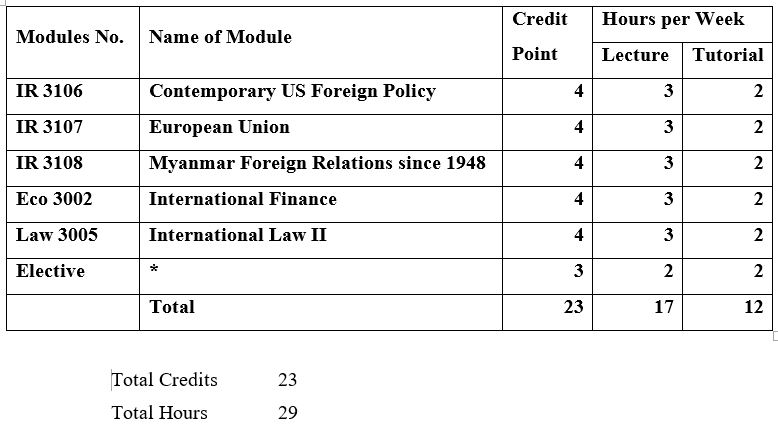
Core Courses
IR 3106 – (4) Contemporary US Foreign Policy
IR 3107 – (4) European Union
IR 3108- (4) Myanmar Foreign Relations since 1948
Eco 3002 – (4) International Finance
Law 3005 – (4) International Law II
* Elective Courses
IR 3109 – (3) International Relations in Middle East II
IR 3110 – (3 Environmental Issues
Geog 3002 – (3) Elements of Political Geography II
*A student must choose any one elective course offered by the Department of International Relations and Geography
IR 3106 Contemporary US Foreign Policy
Course Description
The prominent role of the United States and a global leader makes examining and understanding the actions that the U.S. takes toward the rest of the world and how these decisions are made important for both American and citizens of other nations alike. This course will explain and examine the contemporary United States foreign policy. It also aims to analyze history, theory, and perspectives on foreign policy issues to provide the student with a foundation for understanding the study of foreign policy and perspectives. In general, the foreign policy of the United States includes policy decisions regarding international issues and relationships with foreign countries.
Learning Outcomes
At the end of the semester, the student will be able
Class Organization
This course is divided into 16 weeks. In each week, three hours will be devoted to interactive lectures and two or one hours will be devoted to tutorials and discussions.
Grading
Class Room Activities 35 marks (Attendance, Tutorial, Assignment, Discussions and Presentation)
Final Exam Paper 65 marks
Tutorials, Mini-tests and Presentations
Tutorials will be a range of actives and will aim to increase student’s understanding of the weekly readings and key concepts. In addition, tutorials will build student’s practical skill.
Final Exam
There will be final exam in Week 16. The final exam will be comprehensive (i.e it will cover the entire semester) and be worth 65 marks of the overall course grade.
IR 3107 European Union
Course Description
The course aims to explore the creation of new structure in Europe after the Second World War which involves in integration process of three broad areas: military, political and economic union. The course will explain major institutions of European Union and policy-making and law-making processes. The course will also review border management strategy in Europe and Beyond Brexit in the EU.
Learning Outcomes
At the end of the semester, the students will be able
Class Organization
This course is divided into (16) weeks. In each week, three hours will be devoted to interactive lectures.
Readings
There are articles and textbook chapters assigned each week which will be provided on handouts.
Grading
Attendance and Presentations 35 marks
Final Exam 65 marks
Final Exam
There will be final exam in Week 16. The Final exam will be comprehensive (i.e.., it will cover the entire semester) and be worth 65% of the overall course grade.
Attendance and Presentations
Students will be assessed on their attendance in lectures and interactive discussion in group presentations. Term paper will be included in 35% of the students’ overall final grade.
IR 3108 Myanmar Foreign Relations since 1948
Course Description
Foreign policy is the actions of government officials designed to promote national interests beyond a country’s territorial boundaries. The study of foreign policy and relations is an ever-changing story of how states, institutions and people engage with one another within a dynamic international system. This class will explore the nature of foreign policy and analyze the factors which determine the formulation of the foreign policy. Then, the course illustrates Myanmar’s foreign relations in regional and global context and emphasize how Myanmar maintains friendly ties with all the countries of the world since 1948.
Learning Outcomes
At the end of the course, the students will able:
Class organization
This course is divided into 16 weeks. In each week, three hours will be devoted to interactive lectures.
Grading
Class Work (presentation, assignments, attendance) 35 marks
Final Exam 65 marks
Final Exam
There will be final exam in Week 16. The final exam will be comprehensive (i.e., it will cover the entire semester) and be worth 65% of the overall course grade.
Attendance and Presentations
Students will be assessed on their attendance in lectures and tutorials and for their participation in tutorial discussions, including group presentations in tutorial time. All tutorial activities and attendance will be worth 35% of the students overall final grade.
*Elective Course (Major)
IR-3109 International Relations in Middle East II
Course Description
This lecture aims to understand the students about the past and present situations of Middle East and how to solve the various problem of the Middle East from the United Nations and other superpower countries. What are some conflicts in Middle East? Why did great powers want to influence in Middle East? Is the United Nations effective in keeping peace in Middle East?
Learning outcomes
After finishing the lectures, students will become
-to know the various organizations in Middle East,
-to analyze the previous issues in Middle East and
-to settle the current affairs in Middle East for future peace process.
Class Organization
The Course is divided into 16 weeks. In each week, 3 hours will be devoted to interactive lectures and 2 hours will be classwork.
Grading
Class work (presentation, assignment, quiz) 35 marks
Final Exam paper 65 marks
Final Exam
There will be final exam in week 16. The final exam will be comprehensive ( i.e., it will cover the entire semester) and be worth 65 marks of the overall course grade.
Attendance and Presentations
Students will be assessed on their attendance in lectures and tutorials and for their participation in tutorial, discussion, including group presentations in tutorial time. All tutorial activities and attendance will be worth 35% of the students overall final grade.

Core Courses
IR 3201 – (4) Government and Politics of USA
IR 3202 – (4) Current Issues in International Relations
R 3203 – (4) Government and Politics of Myanmar
Eco 3001 – (4) Economic Development
Law 3202 – (4) International Law I
* Elective Courses
IR 3204 – (3) International Relations in Middle East I
IR 3205 – (3) International Relations in Latin America
Geog 3001 – (3) Elements of Political Geography I
*A student must choose any one elective course offered by the Department of International Relations and Geography.
IR 3201 Government and Politics of USA
Course Description
The objective of this course is to introduce key political concepts, ideas, institutions, policies, characteristics of the constitutional system, Supreme Court decisions, the relationships and interactions among political institutions, and political culture of the United States. The course aims to develop critical understanding of the strengths and weakness of the American political system as well as their rights and responsibilities as citizens. This course aims to explore history, the formation of the American system and how it shapes public policy.
Learning Outcomes
At the end of the semester, the student will be able
Class Organization
This course is divided into 16 weeks. In each week, three hours will be devoted to interactive lectures and two or one hours will be devoted to tutorials and discussions.
Grading
Class Room Activities 35 marks (Attendance, Tutorial, Assignment, Discussions and Presentation)
Final Exam Paper 65 marks
Final Exam
There will be final exam in Week 16. The final exam will be comprehensive (i.e it will cover the entire semester) and be worth 65 marks of the overall course grade.
Tutorials, Mini-tests and Presentations
Tutorials will be a range of actives and will aim to increase student’s understanding of the weekly readings and key concepts. In addition, tutorials will build student’s practical skill.
IR 3202 Current Issues in International Relations
Course Description
The course aims to explain causes and effects of current political and economic issues in International Relations. The course will identify sources of social issues among states. The course will also explore major factors in international cooperation to settle the issues.
Learning Outcomes
At the end of the semester, the students will be able
Class Organization
This course is divided into 16 weeks. In each week, three hours will be devoted to interactive lectures.
Readings
There are articles and textbook chapters assigned each week which will be provided on handouts.
Grading
Attendance and Presentations 35 marks
Final Exam 65 marks
Final Exam
There will be final exam in Week 16. The Final exam will be comprehensive (i.e.., it will cover the entire semester) and be worth 65% of the overall course grade.
Attendance and Presentations
Students will be assessed on their attendance in lectures and interactive discussion in group presentations. Term paper will be included in 35% of the students’ overall final grade.
IR 3203 Government and Politics of Myanmar
Course Description
This course covers the political processes of Myanmar from the colonial period at the beginning of 1900 to current political atmosphere in Myanmar. Since Myanmar regained its independence from Britain in 1948, many challenges continue to face Myanmar, including ethnic peace, economic progress and addressing humanitarian needs. The instructor will start with the political development of Myanmar based on the religion since the early 1900s. Main areas of this course include constitutional interpretation and its implications, ethnic minority rights, faction in parties and organizations as well as the role of military in Myanmar’s politics. The basic idea of this course is to identify themes that have shaped contemporary political landscape of Myanmar. This course also discusses such factors as ethnic politics and legacies of colonial rule that Myanmar government has faced today.
Learning Outcomes
By the end of the course, students will be able
to evaluate contemporary Myanmar politics by learning political history of Myanmar
to assess nature of political institutions and political parties in Myanmar
Class organization
This course is divided into 16 weeks. In each week, three hours lectures will be devoted to interactive learning.
Grading
Class participation (tutorial, assignments, presentation) 35 marks
Exam 65 marks
Final Exam
There will be final exam in Week 16. The Final exam will be comprehensive (i.e.., it will cover the entire semester) and be worth 65% of the overall course grade.
Attendance and Presentations
Students will be assessed on their attendance in lectures and interactive discussion in group presentations. Term paper will be included in 35% of the students’ overall final grade.
*Elective Course (Major)
IR-3204 International Relations in Middle East I
Course Description
This class aims to know the students about the geopolitical locations of Middle East and the emergence of the State of Israel in 1948. After establishing the State of Israel, four major wars appeared among Arab and Israel. International organizations and super powers countries involved the affairs of Middle East but Middle East’s situations cannot settle yet. Different non-states actors evolve and the current circumstances are more complex.
Learning outcomes
At the end of the semester, the students will be able
-to understand the past and present conditions in Middle East,
-to analyze the various problems in Middle East and
-to use effective methods for settling Middle East’s affairs
Class Organization
The Course is divided into 16 weeks. In each week, 3 hours will be devoted to interactive lectures and 2 hours will be classwork.
Grading
Class work (presentation, assignment, quiz) 35 marks
Final Exam paper 65 marks
Final Exam
There will be final exam in week 16. The final exam will be comprehensive ( i.e., it will cover the entire semester) and be worth 65 marks of the overall course grade
.Attendance and Presentations
Students will be assessed on their attendance in lectures and tutorials and for their participation in tutorial, discussion, including group presentations in tutorial time. All tutorial activities and attendance will be worth 35% of the students overall final grade.
* Elective Course (Minor)
IR 3002 Current issues in International Relations (Law)
Course Description
This course will discuss political, security, economic and environmental issues of the world. Firstly, this course will cover political and security issues in the world such as the security cooperation among the US, Japan and India, Russia’s interest in the Arctic Region. Secondly, this module will examine the process of economic issues such as China’s Belt and Road Initiative, US-China trade conflict and economic tension between Japan and South Korea. Thirdly, this course will explore the environmental issues in current international relations such as global warming.
Learning Outcomes
The students will be able to analyze the situations of the international community, to identify the basic concept within and between states in the current issues of International Relations. The students will have the knowledge and skills to have a broad understanding of some of the most important ideas, issues and events in international relations.
Class organization
This course is divided into 16 weeks. In each week, three hours will be devoted to interactive lectures.
Grading
Classwork (assignment, tutorial and presentation) 35 marks
Final Exam 65 marks
Final Exam
There will be a final exam in Week 16. The final exam will be comprehensive (i.e., it will cover the entire semester) and be worth 65 of the overall course grade.
Attendance and Presentations
Students will be assessed on their attendance in lectures and tutorials and for their participation in tutorial discussions, including group presentations in tutorial time. All tutorial activities, attendance will be worth 35 of the student’s overall final grade.
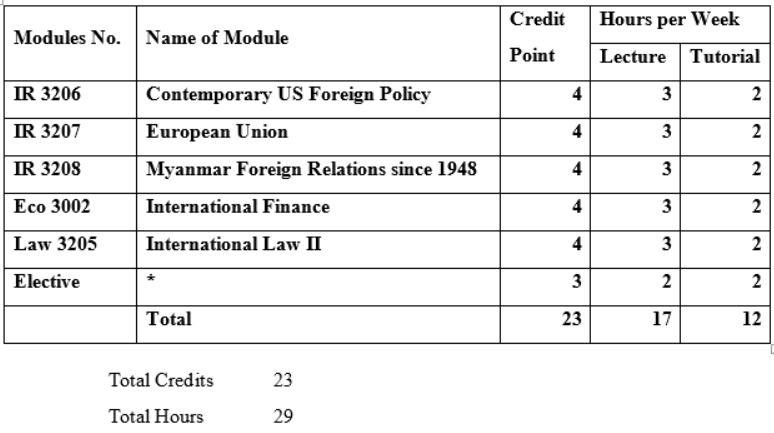
Core Courses
IR 3206 – (4) Contemporary US Foreign Policy
IR 3207 – (4) European Union
R 3208- (4) Myanmar Foreign Relations since 1948
Eco 3002 – (4) International Finance
Law 3205 – (4) International Law II
* Elective Courses
IR 3209 – (3) International Relations in Middle East II
IR 3210 – (3 ) Environmental Issues
Geog 3002 – (3) Elements of Political Geography II
*A student must choose any one elective course offered by the Department of International Relations and Geography
IR 3206 Contemporary US Foreign Policy
Course Description
The prominent role of the United States and a global leader makes examining and understanding the actions that the U.S. takes toward the rest of the world and how these decisions are made important for both American and citizens of other nations alike. This course will explain and examine the contemporary United States foreign policy. It also aims to analyze history, theory, and perspectives on foreign policy issues to provide the student with a foundation for understanding the study of foreign policy and perspectives. In general, the foreign policy of the United States includes policy decisions regarding international issues and relationships with foreign countries.
Learning Outcomes
At the end of the semester, the student will be able
Class Organization
This course is divided into 16 weeks. In each week, three hours will be devoted to interactive lectures and two or one hours will be devoted to tutorials and discussions.
Grading
Class Room Activities 35 marks (Attendance, Tutorial, Assignment, Discussions and Presentation)
Final Exam Paper 65 marks
Tutorials, Mini-tests and Presentations
Tutorials will be a range of actives and will aim to increase student’s understanding of the weekly readings and key concepts. In addition, tutorials will build student’s practical skill.
Final Exam
There will be final exam in Week 16. The final exam will be comprehensive (i.e it will cover the entire semester) and be worth 65 marks of the overall course grade.
IR 3207 European Union
Course Description
The course aims to explore the creation of new structure in Europe after the Second World War which involves in integration process of three broad areas: military, political and economic union. The course will explain major institutions of European Union and policy-making and law-making processes. The course will also review border management strategy in Europe and Beyond Brexit in the EU.
Learning Outcomes
At the end of the semester, the students will be able
Class Organization
This course is divided into 16 weeks. In each week, three hours will be devoted to interactive lectures.
Readings
There are articles and textbook chapters assigned each week which will be provided on handouts.
Grading
Attendance and Presentations 35 marks
Final Exam 65 marks
Final Exam
There will be final exam in Week 16. The Final exam will be comprehensive (i.e.., it will cover the entire semester) and be worth 65% of the overall course grade.
Attendance and Presentations
Students will be assessed on their attendance in lectures and interactive discussion in group presentations. Term paper will be included in 35% of the students’ overall final grade.
IR 3208 Myanmar Foreign Relations since 1948
Course Description
Foreign policy is the actions of government officials designed to promote national interests beyond a country’s territorial boundaries. The study of foreign policy and relations is an ever-changing story of how states, institutions and people engage with one another within a dynamic international system. This class will explore the nature of foreign policy and analyze the factors which determine the formulation of the foreign policy. Then, the course illustrates Myanmar’s foreign relations in regional and global context and emphasize how Myanmar maintains friendly ties with all the countries of the world since 1948.
Learning Outcomes
At the end of the course, the students will able:
Class organization
This course is divided into 16 weeks. In each week, three hours will be devoted to interactive lectures.
Grading
Class Work (presentation, assignments, attendance) 35 marks
Final Exam 65 marks
Final Exam
There will be final exam in Week 16. The final exam will be comprehensive (i.e., it will cover the entire semester) and be worth 65% of the overall course grade.
Attendance and Presentations
Students will be assessed on their attendance in lectures and tutorials and for their participation in tutorial discussions, including group presentations in tutorial time. All tutorial activities and attendance will be worth 35% of the students overall final grade.
*Elective Course (Major)
IR-3209 International Relations in Middle East II
Course Description
This lecture aims to understand the students about the past and present situations of Middle East and how to solve the various problem of the Middle East from the United Nations and other superpower countries. What are some conflicts in Middle East? Why did great powers want to influence in Middle East? Is the United Nations effective in keeping peace in Middle East?
Learning outcomes
After finishing the lectures, students will become
-to know the various organizations in Middle East,
-to analyze the previous issues in Middle East and
-to settle the current affairs in Middle East for future peace process.
Class Organization
The Course is divided into 16 weeks. In each week, 3 hours will be devoted to interactive lectures and 2 hours will be classwork.
Grading
Class work (presentation, assignment, quiz) 35 marks
Final Exam paper 65 marks
Final Exam
There will be final exam in week 16. The final exam will be comprehensive ( i.e., it will cover the entire semester) and be worth 65 marks of the overall course grade.
Attendance and Presentations
Students will be assessed on their attendance in lectures and tutorials and for their participation in tutorial, discussion, including group presentations in tutorial time. All tutorial activities and attendance will be worth 35% of the students overall final grade.
* Elective Course (Minor)
IR 3004 Current issues in International Relations (Law)
Course Description
This course will discuss political, security, economic and environmental issues of the world. Firstly, this course will cover political and security issues in the world such as the security cooperation among the US, Japan and India, Russia’s interest in the Arctic Region. Secondly, this module will examine the process of economic issues such as China’s Belt and Road Initiative, US-China trade conflict and economic tension between Japan and South Korea. Thirdly, this course will explore the environmental issues in current international relations such as global warming.
Learning Outcomes
The students will be able to analyze the situations of the international community, to identify the basic concept within and between states in the current issues of International Relations. The students will have the knowledge and skills to have a broad understanding of some of the most important ideas, issues and events in international relations.
Class organization
This course is divided into 16 weeks. In each week, three hours will be devoted to interactive lectures.
Grading
Classwork (assignment, tutorial and presentation) 35 marks
Final Exam 65 marks
Final Exam
There will be a final exam in Week 16. The final exam will be comprehensive (i.e., it will cover the entire semester) and be worth 65 of the overall course grade.
Attendance and Presentations
Students will be assessed on their attendance in lectures and tutorials and for their participation in tutorial discussions, including group presentations in tutorial time. All tutorial activities, attendance will be worth 35 of the student’s overall final grade.
thantzawmoe1@gmail.com
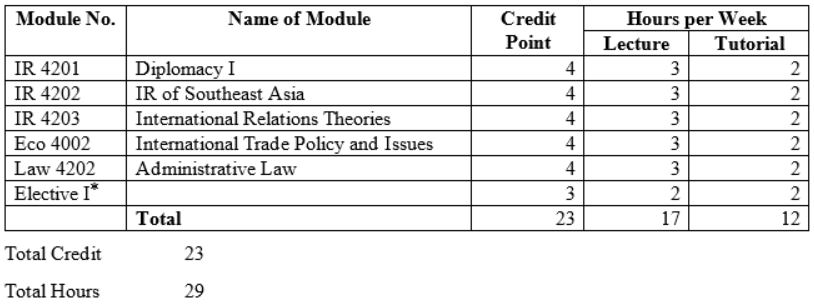
Core Courses
IR 4201 – (4) Diplomacy I
IR 4202 – (4) IR of Southeast Asia
IR 4203 – (4) International Relations Theories
Eco 4001- (4) International Trade Policy and Issues
Law 4202 – (4) Administrative Law
Elective Courses
IR 4204 – (3) Governments and Politics of East Asia
IR 4205- (3) Myanmar-China Relations
A student must submit a research paper as a requirement for the degree of BA.
IR 4201 Diplomacy I
Course Description
This course aims to contribute the students for understanding the significance of diplomacy in international relations. It aims to focus on the evolution of diplomacy since civilization, role and functions of diplomacy in international relations. Diplomatic immunities, Cold War diplomacy, diplomacy in the 21st century, functions of diplomatic mission and Ministry of Foreign Affairs will be studied in the course. Students will engage in group discussion, paper assignment and paper presentation for widening of their knowledge on diplomacy and quality of diplomat in international relations.
Learning Outcomes
At the end of the semester, the students will be able
Class Organization
The course is divided into 16 weeks. In each week, 3 hours will be devoted to interactive lectures and 2 hours will be assigned for group discussion and paper presentation.
Grading
Class work (presentation, assignment) 35
Final Exam paper 65
Final Exam
There will be final exam in Week 16. The final exam will be comprehensive (i.e., it will cover the entire semester) and be worth 65 % of the overall course grade.
Attendance and Presentation
Students will be assessed on their attendance in lectures, tutorials, assignments and their participation in group presentation in tutorial time. All class activities and attendance will be worth 35 % of the students overall final grade.
IR 4202 International Relations of Southeast Asia
Course Description
This class aims to familiarize students with the knowledge of the security and dynamics of international relations in Southeast Asia since the end of World War II. Firstly, this module will cover the development of Southeast Asia regionalism such as imaging Southeast Asia as a region, theoretical perspectives of IR in Asia, and the situation of Southeast Asia in the Cold War and Post-Cold War era. Next, this course will explore the role of such external powers as the United States, China, Australia, Japan, and India in Southeast Asia. Thirdly, this course will cover current regional challenges in building the ASEAN Community. Throughout the course, we will engage seminar discussions to evaluate the regionalism and regional cooperation in Southeast Asia and how ASEAN and its members have coped with several security challenges, and managed regional order and stability.
Learning outcomes
At the end of the semester, the student will be able
Class organization
The course is divided into sixteen (16) weeks. In each week, three hours will be devoted to interactive lectures and two hours will be classwork.
Grading
Classwork (Presentation, Assignment, quiz) 35%
Final Exam Paper 65%
Final Exam
There will be a final exam in Week 16. The final exam will be comprehensive (i.e., it will cover the entire semester) and be worth 65% of the overall grade course.
Attendance and Presentation
Students will be assessed on their attendance in lectures, quiz, tutorial, and for their participation in discussions, involving group presentation in tutorial time. All tutorial activities and attendance will be worth 35% of the students’ overall final grade.
IR 4203 Theories of International Relations
Course Description
This course aims to analyze the important theories of International Relations. It will include four different types of International Relations theories such as Realism, Liberalism, Radicalism and Constructivism. The description on how to apply these theories in the issues of International Relations will also be presented.
Learning Outcomes
After ending the course, the students will assess
– to understand the basic concepts of theories of International Relations
– to criticize the differences of the Realism, Liberalism, Radicalism and Constructivism
– to explore the important of application of the International Relations Theories
Class Organization
This course is divided into 16 weeks. Three hours will be taken for the lecture time and two hours will be had for other class activities during each week.
Grading:
Exam Marks 65 marks
Class activity (attendance, discussion and assignment, etc.) 35 marks
Final Exam
After ending the semester, all course descriptions will be completed for the final exam which is worth 65 marks of the overall course grade.
Attendance and Presentation
Class participation (attendance, tutorial, discussion, presentation and assignment) is important for a student. Grade will be depended on the student’s activities. Plagiarism is strongly limited in the paper.
IR 4204 Governments and Politics of East Asia
Course Description
This course aims to provide the students with clear understanding of politics and governments of East Asians countries as well as some issues between and among them. In addition, it also aims the students at learning how these countries try to solve their issues and how to interact with one another and what the United States’ policy towards East Asia and Pacific will be explored as well. In this sense, we’d like to focus on the politics and governments of only four countries: Japan, two Korea and China although the East Asian region is made up of eight countries.
Learning outcomes
At the end of the semester, the students will be able
Class Organization
The course is divided into 16 weeks. In each week, 3 hours will be devoted to interactive lectures and 2 hours will be classwork
Grading
Class work (presentation, assignment, tutorial) 35
Final Exam paper 65
Final Exam
There will be final exam in Week 16. The final exam will be comprehensive (i.e., it will cover the entire semester) and be worth 65 marks of the overall course grade.
Attendance and Presentations
Students will be assessed on their attendance in lectures and tutorials and for their participation in tutorial discussions, including group presentations in tutorial time. All tutorial activities and attendance will be worth 35% of the students overall final grade.
IR-4205 Myanmar-China Relations
Course Description
This course aims to provide students with a solid understanding of the situations of Myanmar-China Relations as a way of analysing Myanmar and China politics. Student will examine various determinant factors which influence and determine the Myanmar-China Relations. This course will provide students with critical thinking of various the dimensions, obstacles and opportunities in Myanmar-China Relations.
Learning Outcomes
At the end of the semester, the students will be able
Class organisation
This course is divided into sixteen (16) weeks. In each week, two hours will be devoted to interactive lectures and two hours will be devoted to tutorials.
Grading
Attendance and Presentations 35%
Final Exam 65%
Attendance and Presentations
Students will be assessed on their attendance in lectures and tutorials and for their participation in tutorial discussions, including group presentations in tutorial time. All tutorial activities and attendance will be worth 35% of the students overall final grade.
Final Exam
There will be final exam in Week 16. The final exam will be comprehensive (i.e., it will cover the entire semester) and be worth 65% of the overall course grade.
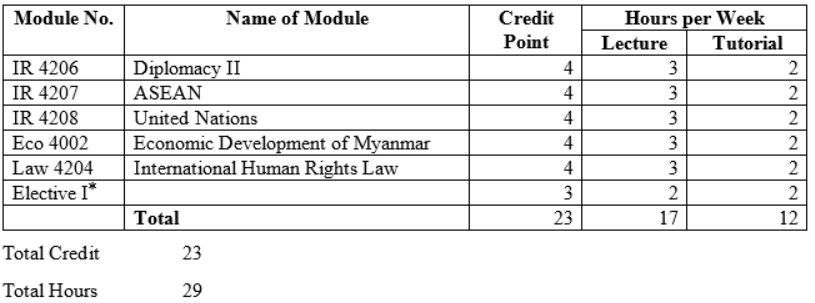
Core Courses
IR 4206 – (4) Diplomacy II
IR 4207 – (4) ASEAN
IR 4208 – (4) United Nations
Eco 4002- (4) Economic Development of Myanmar
Law 4204 – (4) International Human Rights Law
Elective Courses
IR 4209 – (3) Governments and Politics of South Asia
IR 4210 – (3) Myanmar-India Relations
A student must submit a research paper as a requirement for the degree of BA.
IR 4206 Diplomacy II
Course Description
This course aims to contribute the students for understanding the significance of diplomacy in international relations. It aims to focus on the art of negotiation and the instruments of foreign policy in international relations. The necessary arrangements for pre- negotiation and negotiation stages, difficulties and limitations for achieving the successful negotiations and the significant role of military strength and economic wealth in foreign policy formulation will be examined in the course. Students will engage in group discussion, paper assignment and paper presentation for widening of their knowledge on negotiation and international relations.
Learning Outcomes
At the end of the semester, the students will be able
Class Organization
The course is divided into 16 weeks. In each week, 3 hours will be devoted to interactive lectures and 2 hours will be class work.
Grading
Class work (presentation, assignment) 35
Final Exam paper 65
Final Exam
There will be final exam in Week 16. The final exam will be comprehensive (i.e., it will cover the entire semester) and be worth 65 marks of the overall course grade.
Attendance and Presentation
Students will be assessed on their attendance in lectures, tutorials, assignments and their participation in group presentation in tutorial time. All class activities and attendance will be worth 35 % of the students overall final grade.
IR 4207 ASEAN
Course Description
On regards with studying ASEAN, most of the students in Myanmar has developed a perception that ASEAN is a mere “Talk shop” or ASEAN is a semi-EU international institution. The reason is mainly because to understand ASEAN, it is to look from a new lens which is not the lens of Realism, through power or the lens of Liberalism, which is through benefits from cooperation, but from the lens of Constructivism, which emphasize on the reason why ASEAN came together and How they can build a Unity among diversity.
Learning Outcomes
After ending the course, the students will assess
– to understand the basic concepts of the ASEAN
– to criticize the non-interference principle of ASEAN
– to develop a theoretical concept on the progress of ASEAN
Class Organization
This course is divided into 16 weeks. Three hours will be taken for the lecture time and two hours will be had for other class activities during each week.
Grading
Exam Marks 65 marks
Class activity (attendance, discussion and assignment, etc.) 35 marks
Final Exam
After ending the semester, all course descriptions will be completed for the final exam which is worth 65 marks of the overall course grade.
Attendance and Presentation
Class participation (attendance, tutorial, discussion, presentation and assignment) is important for a student. Grade will be depended on the student’s activities. Plagiarism is strongly limited in the paper.
IR 4208 The United Nations
Course Description
IR 4108 is a course that students will study about the history of the United Nations, its structure, main bodies and agencies and also challenges and opportunities that the UN faces in the 21st century. It also introduces students to the academic discussion about the role of the UN in the contemporary world politics. In this course students will examine the strength and weakness of UN in place of overcoming the global challenges. Moreover, students will consider that how does UN response to the pressure of globalization, and whether UN’s performances are converging with those of the Great Power countries and then can determine the positions of Great Powers in the international affairs. In addition, students are expected to be familiar with central theories of international relations regarding the UN and can also understand the unique position of the UN system in the world politics.
Learning Outcomes
By learning this course, the students will be able
– to understand the role of the United Nations in global politics
– to examine the achievements and weakness of UN’s performance in global challenges
– to criticize the impacts of UN’s intervention over some countries
Class Organization
This course is divided into sixteen weeks. In each week, three hours will be devoted to interactive lectures and two hours will be group discussion.
Grading
Tutorials 10%
Group Presentation & Assignment 25%
Final Exam 65%
Final Exam
The final exam will be comprehensive (i.e, it will cover the entire semester) and be worth 65% of the overall course grade. The exam will include materials from lectures, tutorials and discussion topics.
Presentation and Tutorials–Groups will be formed based on students’ portion and assigned topics for presentation. The presentation topics are based on course readings and outside research. Tutorials will include a range of lectures and will aim to increase student’s understanding of the weekly readings and key concepts. All tutorial activities and attendance will be worth 35% of the students overall final grade.
IR 4109 Governments and Politics of South Asia
Course Description
The aims of this course are to provide the students with clear understanding of politics and governments of South Asian countries as well as some issues between and among them. In addition, it also aims the students at learning how these countries try to establish their governments and politics and how to interact with one another will be explored as well. In this sense, we’d like to focus on the politics and governments of only Four countries: India, Pakistan, Bangladesh and Sri Lanka although the South Asian region is made up of eight countries.
Learning outcomes
At the end of the semester, the students will be able
Class Organization
The course is divided into 16 weeks. In each week, 3 hours will be devoted to interactive lectures and 2 hours will be classwork.
Grading
Class work (presentation, assignment, tutorial) 35
Final Exam paper 65
Final Exam
There will be final exam in Week 16. The final exam will be comprehensive (i.e., it will cover the entire semester) and be worth 65 marks of the overall course grade.
Attendance and Presentations
Students will be assessed on their attendance in lectures and tutorials and for their participation in tutorial discussions, including group presentations in tutorial time. All tutorial activities and attendance will be worth 35% of the students overall final grade.
IR-4210 Myanmar-India Relations
Course Description
This course aims to provide students with a solid understanding of the situations of Myanmar-India Relations as a way of analysing Myanmar and India politics. Students will explore the importance of Myanmar-India Relations to implement the Indo-Pacific strategy. Student will examine various determinant factors which influence and determine the Myanmar-India Relations. This course will provide students with critical thinking of various the dimensions, obstacles and opportunities in Myanmar-India Relations.
Learning Outcomes
At the end of the semester, the students will be able
Class organisation
This course is divided into sixteen (16) weeks. In each week, two hours will be devoted to interactive lectures and two hours will be devoted to tutorials.
Grading
Attendance and Presentations 35%
Final Exam 65%
Attendance and Presentations
Students will be assessed on their attendance in lectures and tutorials and for their participation in tutorial discussions, including group presentations in tutorial time. All tutorial activities and attendance will be worth 35% of the students overall final grade.
Final Exam
There will be final exam in Week 16. The final exam will be comprehensive (i.e., it will cover the entire semester) and be worth 65% of the overall course grade.
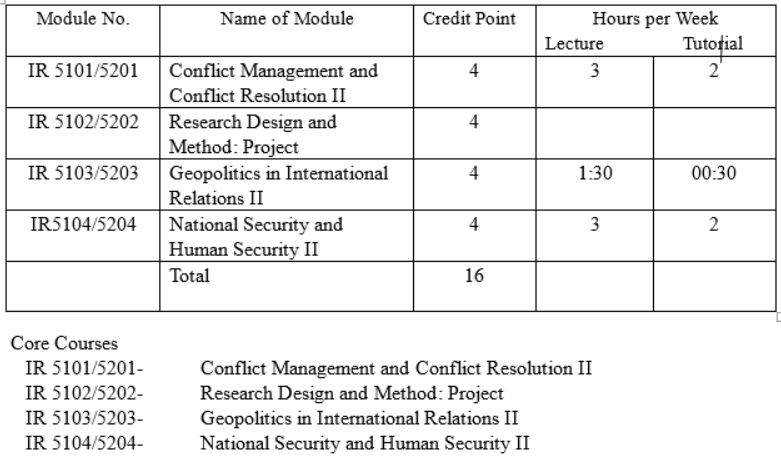
IR – 5101/5201 Conflict Management and Conflict Resolution I
Course Description
The course aims to introduce conceptual framework on conflict management and resolution, and role of states, and non-state actors in conflict resolution .It also aims to provide students with an understanding of theory and practical cases to highlight nature of solutions of international conflicts.
Learning Outcomes
At the end of the semester, students will be able
Class Organization
The course is divided into 16 weeks. In each week three hours will be for interactive lectures and two hours will be class works.
Grading
Classwork (Attendance, assignment, Quiz) – 35%
Final exam – 65% (Closed Book)
Final Exam
The final exam will cover 65% of the overall course grade and will be held in Week 16. It will be a comprehensive exam covering the entire semester. It will be a closed book exam.
Attendance and Presentation
Students will be assessed on their attendance, quiz, and assignment for 35% of the course grade. The assignment will include a group presentation and paper.
IR-5101/5201 Geopolitics and International Relations I
Description of the course
Geopolitics, traditionally the study of power relations across geographic space, has transformed to embrace the cyber domain and the geopolitics of sustainability. Critical issue areas such as the geopolitical impacts of climate change and resource competition are studied alongside enduring classical themes, notably sea power and the return of great power rivalry. The geo-strategies employed by global and regional actors, including China, the United States, and Russia across global regions, are examined through the lens of geopolitical theory. This analytical approach is accompanied by historical and regional-cultural contexts, providing students with knowledge and understanding of the dynamics of contemporary geopolitical challenges.
Learning Outcomes
After completing the module successfully, the students will be able to have the following competences:
Teaching Methodology
The cause is taught with four specific teaching methods: lecturing, group discussions in the class, contributing tutorial tests and presentations. The course combines with 14 lecturers (2 hours for each lecture) in one semester. Main concepts and certain geopolitical theories are basically emphasized in each lecture.
Assessment
Class work (tutorials, group presentations, assignments) – 25%
Attendance – 10%
Exam paper _ 65%
Total – 100%
IR – 5104/5204 National Security and Human Security I
Course description
The course is divided into four parts. The first part deals with the major theories of international relations and their theoretical perceptions on security. The second parts focuses on the collective security involving the study of the regional and international security organizations. The third parts explores the security paradigm shift and non-traditional security issues. Finally, the course concludes with the study of human security.
Class Organization
These four parts will be covered within the sixteen weeks lecturers. Each week will involve: 3 hours lecture and 2 hours discussion.
Learning Outcomes
This course explores the security studies through two different domains: national security and human security. It will take theoretical understanding of the security to examine how the actors and institutions have been working in the international relations. It will consider the changing pattern of security studies and the significant of people-centered security approach. The students will be expected to gain a better understanding on the security studies through different theoretical perspectives at the end of the semester.
Materials: “Paul D. Williams. ‘Security Studies: An Introduction’, Security Studies: An Introduction. London: Routledge (2013) “ will be the major reading for every week. Other relevant readings such as articles will be provided for every week.
Assessments:

IR 5105/ 5205-Conflict Management and Conflict Resolution II
Course Description
The course aims to provide students with an understanding of models of conflict resolution , mediation, and nature of international conflicts .It also aims to examine strategies of mediation and international conflict resolution with practical cases.
Learning Outcomes
At the end of the semester, students will be able
Class Organization
The course is divided into 16 weeks. In each week three hours will be for interactive lectures and two hours will be class works.
Grading
Classwork (Attendance, assignment, Quiz) – 35%
Final exam – 65% (Closed Book)
Final Exam
The final exam will be in week 16 and will cover 65% of the overall course grade. It will be a comprehensive exam covering the entire semester. It will be a closed book exam.
Attendance and Presentation
Students will be assessed on their attendance, quiz, and assignment for 35% of the course grade. The assignment will include a group presentation and paper.
IR- 5107/5207 Geopolitics and International Relations II
Course Description and Objectives
Generally, Geopolitics is a broad spectrum of studying the geographic perspective to aid in understanding the dynamics of contemporary global politics, including issues related to global power struggles, nationalist conflicts, border dynamics, the global military actions over terrorism, peace movements, resource conflicts, and the politics of climate change. This course aims to provide the students with a greater understanding of the subdivision of the international politics called “geopolitics”, how it works, how it can be used to assess the capabilities of a state, a region, or a union of states in terms of their domestic and foreign policy orientations in international relations. In this course, different aspects of the geopolitical approach will be analysed the changing context of geographical, cultural, and political divergent.
Learning Outcomes
By the end of the course, the students are expected to have a greater knowledge on how to assess geopolitical issues, improve their understanding of foreign policy and international system analyses. It is also hoped that students will have a firm grasp of conceptual & theoretical explorations of the core concepts of strategy and related debates and controversies from a global perspective based on their sound knowledge and understanding. Moreover, they are able to analyze the geopolitical principles and strategies within the international relations system with well-developed judgement.
Teaching Methodology
The cause is taught with four specific teaching methods: lecturing, group discussions in the class, contributing tutorial tests and presentations. The course combines with 14 lecturers (2 hours for each lecture) in one semester. Main concepts and certain geopolitical theories are basically emphasized in each lecture.
Assessment
Class work (tutorials, group presentations, assignments) – 25%
Attendance – 10%
Exam paper _ 65%
Total – 100%
IR 5108/5208- National Security and Human Security II
Course description
The course is divided into three parts. The first part explores the meaning of national security in relation to the nature of the state, the nature of threats and individual security. The second parts focuses on developing a national security policy. The third parts aims to study human security.
Class Organization
These three parts will be covered within the sixteen weeks lecturers. Each week will involve: 3 hours lecture and 2 hours discussion.
Objectives and learning outcomes
This course aims to improve students’ in depth understanding on security and its components and at the end of the semester, students are expected to gain the knowledge of national security and human security from various aspects.
Materials: “People, States and Fear: The National Security Problem in International Relations” by Barry Buzan and other relevant readings such as articles will be provided for every week.
Assessments:
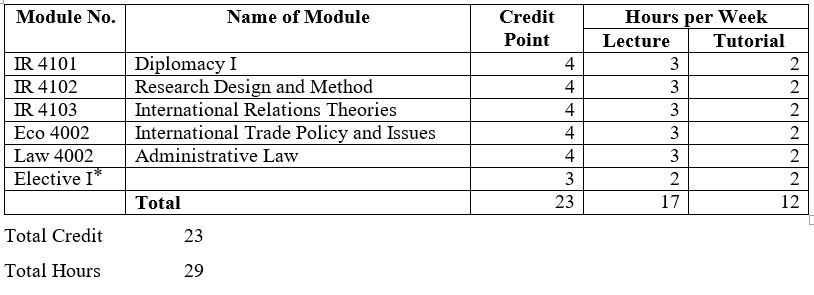
Core Courses
IR 4101 – (4) Diplomacy I
IR 4102 – (4) Research Design & Method
IR 4103 – (4) International Relations Theories
Eco 4001- (4) International Trade Policy and Issues
Law 4002 – (4) Administrative Law
Elective Courses
IR 4104 – (3) Governments and Politics of East Asia
IR 4105- (3) Myanmar-China Relations
A student must submit a research paper as a requirement for the degree of BA.
IR 4101 Diplomacy I
Course Description
This course aims to contribute the students for understanding the significance of diplomacy in international relations. It aims to focus on the evolution of diplomacy since civilization, role and functions of diplomacy in international relations. Diplomatic immunities, Cold War diplomacy, diplomacy in the 21st century, Functions of diplomatic mission and Ministry of Foreign Affairs will be studied in the course. Students will engage in group discussion, paper assignment and paper presentation for widening of their knowledge on diplomacy and quality of diplomat in international relations.
Learning Outcomes
At the end of the semester, the students will be able
Class Organization
The course is divided into 16 weeks. In each week, 3 hours will be devoted to interactive lectures and 2 hours will be assigned for group discussion and paper presentation.
Grading
Class work (presentation, assignment) 35
Final Exam paper 65
Final Exam
There will be final exam in Week 16. The final exam will be comprehensive (i.e., it will cover the entire semester) and be worth 65 % of the overall course grade.
Attendance and Presentation
Students will be assessed on their attendance in lectures, tutorials, assignments and their participation in group presentation in tutorial time. All class activities and attendance will be worth 35 % of the students overall final grade.
IR 4103 Theories of International Relations
Course Description
This course aims to analyze the important theories of International Relations. It will include four different types of International Relations theories such as Realism, Liberalism, Radicalism and Constructivism. The description on how to apply these theories in the issues of International Relations will also be presented.
Learning Outcomes
After ending the course, the students will assess
– to understand the basic concepts of theories of International Relations
– to criticize the differences of the Realism, Liberalism, Radicalism and Constructivism
– to explore the important of application of the International Relations Theories
Class Organization
This course is divided into 16 weeks. Three hours will be taken for the lecture time and two hours will be had for other class activities during each week.
Grading:
Exam Marks 65 marks
Class activity (attendance, discussion and assignment, etc.) 35 marks
Final Exam
After ending the semester, all course descriptions will be completed for the final exam which is worth 65 marks of the overall course grade.
Attendance and Presentation
Class participation (attendance, tutorial, discussion, presentation and assignment) is important for a student. Grade will be depended on the student’s activities. Plagiarism is strongly limited in the paper.
IR 4104 Governments and Politics of East Asia
Course Description
This course aims to provide the students with clear understanding of politics and governments of East Asians countries as well as some issues between and among them. In addition, it also aims the students at learning how these countries try to solve their issues and how to interact with one another and what the United States’ policy towards East Asia and Pacific will be explored as well. In this sense, we’d like to focus on the politics and governments of only four countries: Japan, two Korea and China although the East Asian region is made up of eight countries.
Learning outcomes
At the end of the semester, the students will be able
Class Organization
The course is divided into 16 weeks. In each week, 3 hours will be devoted to interactive lectures and 2 hours will be classwork
Grading
Class work (presentation, assignment, tutorial) 35
Final Exam paper 65
Final Exam
There will be final exam in Week 16. The final exam will be comprehensive (i.e., it will cover the entire semester) and be worth 65 marks of the overall course grade
Attendance and Presentations
Students will be assessed on their attendance in lectures and tutorials and for their participation in tutorial discussions, including group presentations in tutorial time. All tutorial activities and attendance will be worth 35% of the students overall final grade.
IR-4105 Myanmar-China Relations
Course Description
This course aims to provide students with a solid understanding of the situations of Myanmar-China Relations as a way of analysing Myanmar and China politics. Student will examine various determinant factors which influence and determine the Myanmar-China Relations. This course will provide students with critical thinking of various the dimensions, obstacles and opportunities in Myanmar-China Relations.
Learning Outcomes
At the end of the semester, the students will be able
Class organisation
This course is divided into sixteen (16) weeks. In each week, two hours will be devoted to interactive lectures and two hours will be devoted to tutorials.
Readings
Readings from a variety of sources will be available to students through the course. The main textbooks will be “In the name of Pauk-Paw: Myanmar’s China Policy since 1948”, by Maung Aung Myoe and Modern China- Myanmar Relations: Dilemmas of Mutual Dependence, by David I. Steinberg and Hongwei Fan. Chapters from the book of Myanmar: Reintegrating into the International Community will also be used.
Grading
Attendance and Presentations 35%
Final Exam 65%
Attendance and Presentations
Students will be assessed on their attendance in lectures and tutorials and for their participation in tutorial discussions, including group presentations in tutorial time. All tutorial activities and attendance will be worth 35% of the students overall final grade.
Final Exam
There will be final exam in Week 16. The final exam will be comprehensive (i.e., it will cover the entire semester) and be worth 65% of the overall course grade.
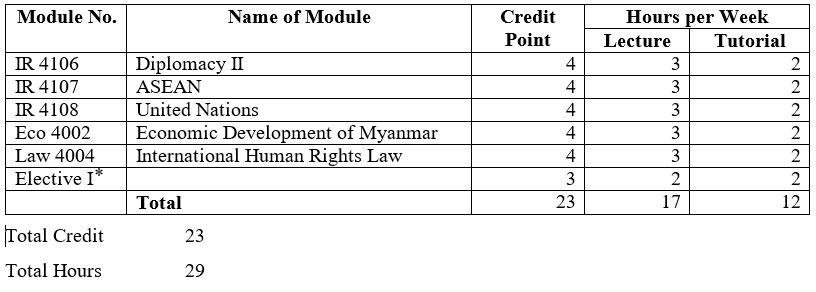
Core Courses
IR 4106 – (4) Diplomacy II
IR 4107 – (4) ASEAN
IR 4108 – (4) United Nations
Eco 4002- (4) Economic Development of Myanmar
Law 4004 – (4) International Human Rights Law
Elective Courses
IR 4109 – (3) Governments and Politics of South Asia
IR 4110 – (3) Myanmar-India Relations
A student must submit a research paper as a requirement for the degree of BA.
IR 4106 Diplomacy II
Course Description
This course aims to contribute the students for understanding the significance of diplomacy in international relations. It aims to focus on the art of negotiation and the instruments of foreign policy in international relations. The necessary arrangements for pre- negotiation and negotiation stages, difficulties and limitations for achieving the successful negotiations and the significant role of military strength and economic wealth in foreign policy formulation will be examined in the course. Students will engage in group discussion, paper assignment and paper presentation for widening of their knowledge on negotiation and international relations.
Learning Outcomes
At the end of the semester, the students will be able
Class Organization
The course is divided into 16 weeks. In each week, 3 hours will be devoted to interactive lectures and 2 hours will be class work.
Grading
Class work (presentation, assignment) 35
Final Exam paper 65
Final Exam
There will be final exam in Week 16. The final exam will be comprehensive (i.e., it will cover the entire semester) and be worth 65 marks of the overall course grade
Attendance and Presentation
Students will be assessed on their attendance in lectures, tutorials, assignments and their participation in group presentation in tutorial time. All class activities and attendance will be worth 35 % of the students overall final grade.
IR 4107 ASEAN
Course Description
On regards with studying ASEAN, most of the students in Myanmar has developed a perception that ASEAN is a mere “Talk shop” or ASEAN is a semi-EU international institution. The reason is mainly because to understand ASEAN, it is to look from a new lens which is not the lens of Realism, through power or the lens of Liberalism, which is through benefits from cooperation, but from the lens of Constructivism, which emphasize on the reason why ASEAN came together and How they can build a Unity among diversity.
Learning Outcomes
After ending the course, the students will assess
– to understand the basic concepts of the ASEAN
– to criticize the non-interference principle of ASEAN
– to develop a theoretical concept on the progress of ASEAN
Class Organization
This course is divided into 16 weeks. Three hours will be taken for the lecture time and two hours will be had for other class activities during each week.
Grading:
Exam Marks 65 marks
Class activity (attendance, discussion and assignment, etc.) 35 marks
Final Exam
After ending the semester, all course descriptions will be completed for the final exam which is worth 65 marks of the overall course grade.
Attendance and Presentation
Class participation (attendance, tutorial, discussion, presentation and assignment) is important for a student. Grade will be depended on the student’s activities. Plagiarism is strongly limited in the paper.
IR 4108 The United Nations
Course Description
IR 4108 is a course that students will study about the history of the United Nations, its structure, main bodies and agencies and also challenges and opportunities that the UN faces in the 21st century. It also introduces students to the academic discussion about the role of the UN in the contemporary world politics. In this course students will examine the strength and weakness of UN in place of overcoming the global challenges. Moreover, students will consider that how does UN response to the pressure of globalization, and whether UN’s performances are converging with those of the Great Power countries and then can determine the positions of Great Powers in the international affairs. In addition, students are expected to be familiar with central theories of international relations regarding the UN and can also understand the unique position of the UN system in the world politics.
Learning Outcomes
By learning this course, the students will be able
– to understand the role of the United Nations in global politics
– to examine the achievements and weakness of UN’s performance in global challenges
– to criticize the impacts of UN’s intervention over some countries
Class Organization
This course is divided into sixteen weeks. In each week, three hours will be devoted to interactive lectures and two hours will be group discussion.
Grading
Tutorials 10%
Group Presentation & Assignment 25%
Final Exam 65%
Final Exam
The final exam will be comprehensive (i.e, it will cover the entire semester) and be worth 65% of the overall course grade. The exam will include materials from lectures, tutorials and discussion topics.
Presentation and Tutorials–Groups will be formed based on students’ portion and assigned topics for presentation. The presentation topics are based on course readings and outside research. Tutorials will include a range of lectures and will aim to increase student’s understanding of the weekly readings and key concepts. All tutorial activities and attendance will be worth 35% of the students overall final grade.
IR 4109 Governments and Politics of South Asia
Course Description
The aims of this course are to provide the students with clear understanding of politics and governments of South Asian countries as well as some issues between and among them. In addition, it also aims the students at learning how these countries try to establish their governments and politics and how to interact with one another will be explored as well. In this sense, we’d like to focus on the politics and governments of only Four countries: India, Pakistan, Bangladesh and Sri Lanka although the South Asian region is made up of eight countries.
Learning outcomes
At the end of the semester, the students will be able
Class Organization
The course is divided into 16 weeks. In each week, 3 hours will be devoted to interactive lectures and 2 hours will be classwork.
Grading
Class work (presentation, assignment, tutorial) 35
Final Exam paper 65
Final Exam
There will be final exam in Week 16. The final exam will be comprehensive (i.e., it will cover the entire semester) and be worth 65 marks of the overall course grade.
Attendance and Presentations
Students will be assessed on their attendance in lectures and tutorials and for their participation in tutorial discussions, including group presentations in tutorial time. All tutorial activities and attendance will be worth 35% of the students overall final grade.
IR-4110 Myanmar-India Relations
Course Description
This course aims to provide students with a solid understanding of the situations of Myanmar-India Relations as a way of analysing Myanmar and India politics. Students will explore the importance of Myanmar-India Relations to implement the Indo-Pacific strategy. Student will examine various determinant factors which influence and determine the Myanmar-India Relations. This course will provide students with critical thinking of various the dimensions, obstacles and opportunities in Myanmar-India Relations.
Learning Outcomes
At the end of the semester, the students will be able
Class organisation
This course is divided into sixteen (16) weeks. In each week, two hours will be devoted to interactive lectures and two hours will be devoted to tutorials.
Readings
Readings from a variety of sources will be available to students through the course. The main textbooks will be India-Myanmar Relations: Changing Contours, by Rajiv Bhatia and India-Myanmar Relations: Historical Links to Contemporary Convergences, by Lipi Ghosh and other authors. The related Articles will also be used.
Grading
Attendance and Presentations 35%
Final Exam 65%
Attendance and Presentations
Students will be assessed on their attendance in lectures and tutorials and for their participation in tutorial discussions, including group presentations in tutorial time. All tutorial activities and attendance will be worth 35% of the students overall final grade.
Final Exam
There will be final exam in Week 16. The final exam will be comprehensive (i.e., it will cover the entire semester) and be worth 65% of the overall course grade.
Modules for International Relations Specialization
(Master of Arts Degree)
IR (First Year)
Semester I
IR 611 International Relations of Asia Pacific I
IR 612 Major Issues in International Relations
IR 613 International Relations: Theories and Approaches
IR 614 International Political Economy I
Semester II
IR 621 International Relations of Asia Pacific II
IR 622 International Relations of Central Asia
IR 623 Globalization: Ecological Issues
IR 624 International Political Economy II
IR (Second Year)
Semester I
IR 631 Research Progress Report
IR 632 Research & Seminar
Semester II
Research
PS (First Year)
Semester I
Semester II
*Modules for Political Science specialization are being discussed.
PS (Second Year)
Semester I
Semester II
*Modules for Political Science specialization are being discussed.
Modules for International Relations Specialization
(PhD Preliminary Course)
Ph D
Preliminary
IR 711 Myanmar Foreign Policy
IR 712 United Nations and Myanmar
IR 713 Regional Development in Asia
IR 714 Treaties, Agreements & Conventions
Modules for Diploma in International Relations (DIR)
DIR
Semester I
D IR Module I Elements of International Relations I
D IR Module II Elements of Political Institutions I
DIR Module III Diplomacy I
D IR Module IV Current Issues in International Relations I
Semester II
D IR Module V Elements of International Relations II
D IR Module VI Elements of Political Institutions II
DIR Module VII Governments of Southeast Asia
D IR Module V III Current Issues in International Relations II
Modules for Diploma in Political Science (DPS)
Semester I
DPS Module I International Relations in Political Thought
DPS Module II Essentials of International Relations
DPS Module III Comparative Politics
DPS Module IV Public Administration
Semester II
DPS Module V Foreign Policy Formulation
DPS Module VI Elements of Political Institutions
DPS Module VII Comparative Politics
DPS Module VIII Public Policy
(a) Tutor (1997 – 2005)
(b) Assistant Lecturer (2005 – 2010)
(c) Lecturer (2010 – 2015)
(d) Invitation Fellowships (JSPS, The University of Tokyo) (2014)
(e) Associate Professor (2015 – 2018)
(f) Invited Researcher (University of Arizona) (2017)
(g) Professor (2018-2021)
(e) Head of Department (2021 to date)
(a) Aquatic animal diseases, OIE listed aquatic animal diseases
(b) Climate change impact in aquaculture and fisheries
(c) Reproductive development of aquatic organisms
(d) Ecosystem approach to fisheries and aquaculture management
(e) Curriculum development of fisheries and aquaculture intertiary education
(f) Quality Assurance in Higher Education
kaylwintun@gmail.com
thezin.edu.30@gmail.com
Dr Khin Ma Ma Myo is an Professor in the Department of International Relations, University of Yangon. Her teaching career at the University of Yangon started in 1997. She teaches peace and security, identity issues in Asia-Pacific, public administration and public policy, and regional development in Asia. She holds an MA in International Development from the International University of Japan and an MA and PhD in International Relations from the University of Yangon. Her research interests include Japan and public administration. She contributed a chapter in “Reintegration into the International Community: Myanmar”, published by World Scientific Press, Singapore in 2016. She has also published articles in Yangon University Research Journal in 2001, Journal of Asia Research Centre in 2015 and MAAS Journal in 2008, 2011 and 2014.
Dr. San San Khine is a Professor of the Department of International Relations and Political Science, University of Yangon. She achieved B.A (Honours) International Relations (IR) (1993), M.A (IR) Credit (2000), Master of Research (IR) (2001), PhD (IR) (2007 February), Diploma in Tourism Studies and Management (2006), Post-grad Diploma in Global English (2010) from University of Yangon. She joined the Department of International Relations, University of Yangon as a Tutor in 1998. She is a member of the MOU/MOA Assessment Team, and a member of the University of Yangon Quality Assurance (UYQA) Team (Core Group). Her research interests are Peace and Security, focusing on Non-traditional Security Issues in International Relations. Currently, she teaches International Relations: Theories and Approaches, Foreign Relations of Central Asia, and Comparative Politics of South Asia, and Political Thoughts to students of International Relations and Political Science. She was awarded research fellowships by Open Society Foundations (OSF), Central European University, Hungary in 2016, and by Korean Foundation for Advanced Studies (KFAS), Republic of Korea in 2018.
Publications
(1) A Study on China’s Strategies towards Southeast Asia”, Yangon University Research Journal Vol.3, No.1, December 2011
(2) Myanmar-Thai Cooperation in Migrant Workers Issues, Journal of Myanmar Academy of Arts and Science, Vol.XII, No.9, June 2014
(3) Myanmar’s Cooperation in BIMST-EC, Journal of the Asian Research Centre, Journal of the Asia Research Centre, Yangon University, Vol.4, No. 1, 2015
(4) Kyaukphyu Special Economic Zone Project in the Context of Myanmar-China Relations, Universities Research Journal Vol.9, August 2017
(5) South Korea’s ODA Policy towards Myanmar, LAP LAMBERT Academic Publishing, Mauritius, June 2019, (eBook) ISBN978-620-0-22520-7,
Myint Zu Win is an Associate Professor of the Department of International Relations and Political Science, University of Yangon. She obtained her PhD in International Relations from the University of Yangon in 2013. She worked previously at Dagon University (2005-2016). She joined the Department of International Relations, University of Yangon as a lecturer in 2016. She teaches the undergraduate and postgraduate courses for Comparative Politics of Southeast Asia and Governments and Politics of Southeast Asia. Her research focuses on Comparison of Myanmar and Southeast Asia Countries.
Publications
1) International Security (Non-Traditional Security)”, ISIS, Malaysia, April 2018.
2) The Role of Military in Myanmar’s Peace Process Since 2011, Journal of Myanmar Academy of Arts and Science 2019, Vol. 17, No.7, August 2019, 253-264.
3) Civil-Military Relations: A Comparative Study of Myanmar and Thailand Since 2011, Journal of Myanmar Academy of Arts and Science 2020, Vol. 18, No.7, August 2020, 335-344.
Daw Lwin Cho Latt is an Associate Professor of the Department of International Relations at the University of Yangon and a PhD candidate at the Graduate School of International Relations at Ritsumeikan University on the JDS programme (2019-2022). She holds a double M.A degree in ‘International Relations’ from the University of Yangon and International University of Japan. Her research focuses on Myanmar’s cooperation with China under the Belt and Road Initiative (BRI) framework and her field of study is Peace and Security.
Hein Myat Thu is an Assistant Lecturer of the Department of International Relations and Political Science, University of Yangon. He obtained B.A (Q) in 2008, MA (Thesis) in 2012 and MRes in 2013 in the specialization of International Relations from Dagon University. He also obtained his PhD degree in International Relations from the University of Yangon in 2019. His specialization is Non-Traditional Security such as Environmental Issue. He has been teaching Environment and Politics and Myanmar Foreign Relations in International Relations and Political Science.
Dr. Wah Wah Aung is an Associate Professor in the Department of International Relations and Political Science at the University of Yangon. She obtained PhD degree in International Relations from the University of Yangon in 2013. Her teaching career began at Dagon University in 2005 and transferred to the Department of International Relations and Political Science, University of Yangon in 2016. She is responsible for teaching International Relations courses on Current Issues in International Relations. Her research focuses on political, social and economic issues in East Asia.
myintsandarwin2016@gamil.com
The Hitachi Global Foundation Asia Innovation Award 2020 (November, 2020) (As a follower)
chochothin.uy2016@gmail.com
Semester I (December-March)
Core Courses
Psy – 1101 Introduction to Psychology I
Elective Courses (for other Specialization)
Psy – 1001 Child Development
Psy – 1002 States of Consciousness
Psy – 1003 General Psychology I
Psy – 1004 Public Relations
Semester II (June-September)
Core Courses
Psy – 1102 Introduction to Psychology II
Elective Courses (for other Specialization)
Psy – 1005 Psychology of Adolescence
Psy – 1005 Psychology of Adolescence
Psy – 1006 Psychological Disorders
Psy – 1007 General Psychology II
Psy – 1008 Understanding Human Interaction
Semester I (December-March)
Core Courses
Psy – 2101 Developmental Psychology
Psy – 2102 Applied Psychology I
Psy – 2103 Experimental Psychology I
Elective Courses (for other Specializations)
Psy – 2001 Language and Thought
Psy – 2002 Psychology of Adulthood and Aging
Psy – 2003 Occupational Psychology I
Semester II (June-September)
Core Courses
Psy – 2104 Educational Psychology
Psy – 2105 Applied Psychology II
Psy – 2106 Experimental Psychology II
Elective Courses (for other Specializations)
Psy – 2004 Stress and Stress Management
Psy – 2005 Psychology of Adulthood and Aging II
Psy – 2006 Occupational Psychology II
Semester I (December-March)
Core Courses
Psy – 3101 Social Psychology I
Psy – 3102 Industrial and Organizational Psychology I
Psy – 3103 Abnormal Psychology I
Psy – 3104 Psychological Statistics I
Elective Courses
Psy – 3105 Crime and Psychology I
Psy – 3106 Community Psychology
Elective Course (for Law)
Psy – 3001 Crime and Psychology I
Semester II (June-September)
Core Courses
Psy – 3107 Social Psychology II
Psy – 3108 Industrial and Organizational Psychology II
Psy – 3109 Abnormal Psychology II
Psy – 3110 Psychological Statistics II
Elective Courses
Psy – 3111 Crime and Psychology II
Psy – 3112 Psychology of Aging
Elective Course (for Law)
Psy – 3002 Crime and Psychology II
Semester I (December-March)
Core Courses
Psy – 4101 Counseling Psychology II
Psy – 4102 Sport Psychology I
Psy – 4103 Psychological Testing I
Psy – 4104 Psychological Research I
Elective Courses
Psy – 4105 Health Psychology I
Psy – 4106 Introduction to Social Problems I
Psy – 4107 Psychology of Communication
Semester II (June-September)
Core Courses
Psy – 4108 Counseling Psychology II
Psy – 4109 Sport Psychology II
Psy – 4110 Psychological Testing II
Psy – 4111 Psychological Research II
Elective Courses
Psy – 4112 Health Psychology II
Psy – 4113 Introduction to Social Problems II
Psy – 4114 The Development of Gender
Semester I (December – March)
Core Course
Psy – 3201 Social Psychology I
Psy – 3202 Industrial and Organizational Psychology I
Psy – 3203 Abnormal Psychology I
Psy – 3204 Psychological Statistics I
Elective Courses
Psy – 3205 Crime and Psychology I
Psy – 3206 Community Psychology
Elective Course (for Law)
Psy – 3101 Crime and Psychology I
Semester II (June – September)
Core Course
Psy – 3207 Social Psychology II
Psy – 3208 Industrial and Organizational Psychology II
Psy – 3209 Abnormal Psychology II
Psy – 3210 Psychological Statistics II
Elective Courses
Psy – 3211 Crime and Psychology II
Psy – 3212 Psychology of Aging
Elective Course (for Law)
Psy – 3102 Crime and Psychology II
Semester I (December – March)
Core Course
Psy – 4201 Counselling Psychology II
Psy – 4202 Sport Psychology I
Psy – 4203 Psychological Testing I
Psy – 4204 Psychological Research I
Elective Courses
Psy – 4205 Health Psychology I
Psy – 4206 Introduction to Social Problems I
Psy – 4207 Psychology of Communication
Semester II (June – September)
Core Course
Psy – 4208 Counselling Psychology II
Psy – 4209 Sport Psychology II
Psy – 4210 Psychological Testing II
Psy – 4211 Psychological Research II
Elective Courses
Psy – 4212 Health Psychology II
Psy – 4213 Introduction to Social Problems II
Psy – 4214 The Development of Gender
Semester I (December – March)
Core Course
Psy – 5201 Advanced Industrial Psychology
Psy – 5202 Advanced Abnormal Psychology
Psy – 5203 Psychological Theories
Psy – 5204 Advanced Psychological Research
Elective Courses
Psy – 5205 Advanced Social Psychology
Psy – 5206 Advanced Health Psychology
Psy – 5207 Advanced Psychological Testing
Semester II (June – September)
Core Course
Psy – 5208 Social Relations and Group Behaviour
Psy – 5209 Organizational Psychology
Psy – 5210 Clinical Psychology
Psy – 5211 Physiological Psychology
Elective Courses
Psy – 5212 Cultural Psychology
Psy – 5213 Environmental Psychology
Psy – 5214 Qualitative and Social Research
B.A (Hons) graduates who have enough credits in their undergraduate course are eligible to study for a Master’s Course in the Department of Psychology. The intake is usually once a year.
Master’s Courses: Psychology Subjects (2 Years)
Semester I (June – September)
Psy-611 Psychological Assessment
Psy-612 Theories of Personality
Psy-613 Counseling and Psychotherapy
Psy-614 Advanced Cognitive Psychology
Semester II (December – March)
Psy-621 Organizational Behaviour
Psy-622 Interpersonal Behaviour and Group Processes
Psy-623 Health Psychology / Environmental Psychology / Psychology of Childhood and Adolescence
Psy-624 Research Methodology
Semester I (June – September)
Psy-631 Seminar I (Review of Literature)
Psy-633 Seminar II (Research and Methodological Issue in the Study Area)
Semester II (December – March)
Psy-641 Seminar III (Results and Discussion)
Psy-642 Thesis and Viva Voce
M.A. graduates are eligible to sit for the selection examination for Ph.D courses conducted by the Doctoral Selection Committee of the Department of Psychology. The intake is usually once a year. The selection is made based on the scores obtained in the written examination and interview, and on the service record.
Ph.D (Preliminary) ( June – March )
Psy – 711 Biological Bases of Behaviour
Psy – 712 Cognitive Affective Bases of Behaviour
Psy – 713 Social Bases of Behaviour
Psy – 714 Individual Differences
First Year Ph.D to Fourth Year ( June – March )
Research
Graduates from any subjects are eligible to study for the Diploma in Applied Psychology Courses in the Department of Psychology. The intake is usually once a year.
Diploma in Applied Psychology (1 1/2 Years)
First Year DAP (June-March)
Psy – 101 Basic Concepts in Psychology
Psy – 102 Industrial and Organizational Psychology
Psy – 103 Counselling and Clinical Psychology
Second Year DAP
Project Paper
Diploma in Applied Psychology (1 Years)
Any graduates are eligible to study for the Diploma in Social Work Courses in the Department of Psychology. The intake is usually once a year. The selection is made based on the scores obtained in a written examination and interview.
First Year DSW
Semester I (June-September)
SW 4001 A Social Work Theory and Practice
SW 4002 A Psychology and Social Work
SW 4003 A Law and Social Work
SW 4004 A Field Work
Semester II (December-March)
SW 4001 B Social Work Theory and Practice
SW 4002 B Psychology and Social Work
SW 4003 B Law and Social Work
SW 4004 B Field Work
Internship
Semester I (June-September)
Field Practicum hours
Semester II (December-March)
120 hours
First Year BSc (Semester I)
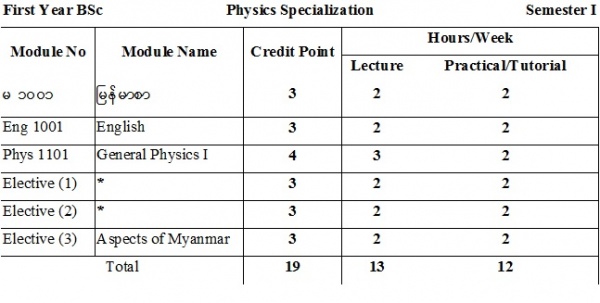
Total Credits – 19: Total hours –25
*A student can choose any threeelectives including those offered by the Department of Mathematics, Geology and Chemistry to fulfill total of 19 credit points. Counseling is advisable.
First Year BSc (Semester II)
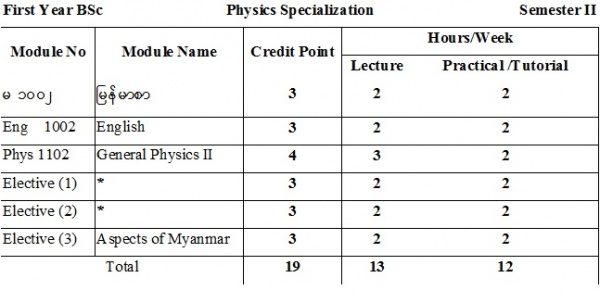
Total Credits – 19: Total hours – 25
A student can choose any threeelectives including those offered by the Department of Mathematics, Geology and Chemistry to fulfill total of 19 credit points. Counseling is advisable.
All students who wish to take Physics as a special or subsidiary subject must take Phys 1101/1001 and proceed to Phys 1102/1002. A total of 170 credit units must be required for a BSc Degree and a total of 218 credit units are required for an Honours Degree.
.
Second Year BSc (Semester I)
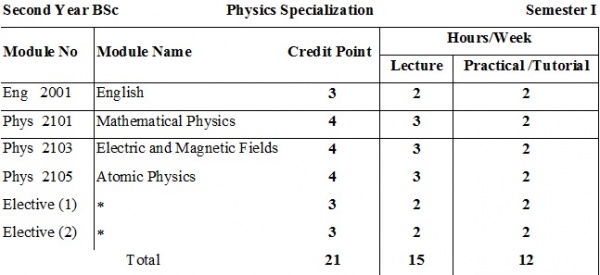
Total Credits – 21: Total hours – 27
*A student can choose any two electives offered from the Department of Mathematics and Physics to fulfill total of 21 credits. Phys 2107or Phys 2109 is assigned as Elective 1. Math 2001 is assigned as Elective 2.
Elective Course for Chemistry, Mathematics, Geology, Industrial Chemistry, Marine Science, GeographyStudents: Phys 2003 Electric and Magnetic Fields.
Second Year BSc(Semester II)
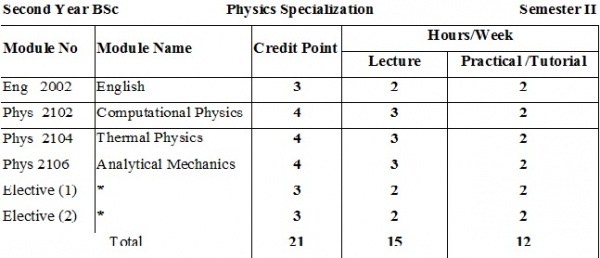
Total Credits – 21: Total hours – 27
*A student can choose any two electives offered from the Department of Mathematics and Physics to fulfill total of 21 credits. Phys 2108 or Phys 2110 is assigned as Elective 1. Math 2004 is assigned as Elective 2.
Third Year BSc (Semester I)
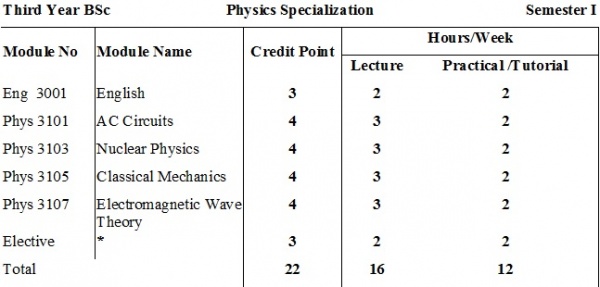
Total Credits – 22: Total hours – 28
*A student can choose any one elective offered from the Department of Mathematics and Physics to fulfill total of 22 credits. Phys 3109 orMath 3001 is assigned as Elective.
Third Year BSc (Semester II)

Total Credits – 22: Total hours – 28
*A student can choose any one elective offered from the Department of Mathematics and Physics to fulfill total of 22 credits. Phys 3110or Math 3002 is assigned as Elective.
Fourth Year BSc (Semester I)

Total Credits – 23: Total hours – 29
*A student can choose Physics to fulfill total of 23 credits.
Fourth Year BSc (Semester II)
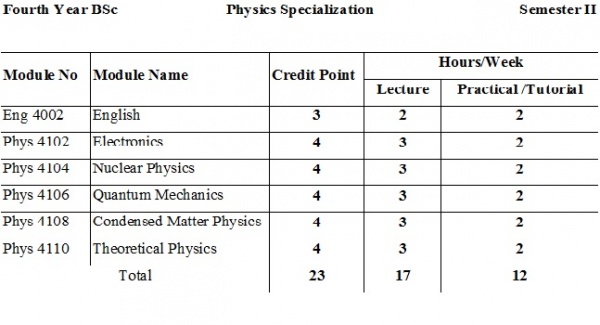
Total Credits – 23: Total hours – 29
*A student can choose Physics to fulfill total of 23 credits. Term/ Project paper must be submitted by each group not more than 10 students in Fourth Year Second Semester. Group paper presentation must be included.
Dr. Yin Maung Maung (Mr)
Contact Detail:
Work Experience
Demonstrator (1997-1999), Department of Physics, Botataung College, Yangon
Demonstrator (1999–2004), Department of Physics, University of Yangon
Assistant Lecturer (2004 – 2005), Department of Physics, University of Yangon
Assistant Lecturer (2005 – 2006), Department of Physics, Kalay University
Assistant Lecturer (2006 – 2010), Department of Physics, University of Yangon
Lecturer (2010 – 2012), Department of Physics, University of Yangon
Lecturer (2012 – 2014), Department of Physics, Kyaing Tong University
Lecturer (2014 – 2015), Department of Physics, University of Yangon
Associate Professor (2015 – 2017), Department of Physics, Mandalay University
Associate Professor (2017 – 2018), Department of Physics, University of Yangon
Professor (2018 – Today), Department of Physics, University of Yangon
Professor/ Head, (2021 July-Today), Department of Physics, University of Yangon, Yangon
Educational Background:
1985-1986, B.E.H.S passed No.2, Basic Education High School Dagon, Yangon
1992-1993, B.Sc. (Physics) (Hons), University of Yangon, Kamayut, Yangon
1995-1996, M.Sc. (Physics), University of Yangon, Kamayut, Yangon
1999-2002, Ph.D.(Physics/Materials Science), University of Yangon, Kamayut, Yangon
2009-2010, Post-doctoral Research, Nano-Materials and Devices Lab Department of Materials Science and Engineering, Korea University, Seoul, Korea
2015-2016, Post-doctoral Research, Study for Mechanisms and Deterrent Technologies for Potential Induced Degradation of Solar Cells Department of Renewable Energy Gifu University, Gifu, Japan
Research interests
1) Materials Science and Engineering
2) Renewable Energy
3) Nanomaterials & Devices
Projects
1.Design and Synthesis of Novel Perovskite Nanocrystals for Photovoltaic Application (First China-Myanmar-Joint-Intergovernmental Research Project)
China Side =prof Jianyu Yuan, Department of Science and Technology of jiangsu Province, Soochow University, China
Myanmar Side=Prof Yin Maung Maung Department of Physics, University of Yangon
(2020-2022)
Area= New Energy
2.Collaborative Research Project (ICE-Matter Program):Project Title : Naphthalene diimide based polymer acceptor for wide band gap all polymer solar cell (2021-2022)
Principal Investigator: Prof Yin Maung Maung, Myanmar
Co-researcher: Prof Ratchatee, KU, Thailand
Award
1.“Structural and Microstructural Properties of TiO2 Nano-Patterns Using PDMS Replica” Best Paper Award (‘“Spring Conference of Surface Engineering”; (Jeju,korea) (2010)
2.“Photoanode Formation Using SnO2 Nanofibres for Enhancing Photovoltaic Properties of Natural Dye Sensitized Solar Cells” (“The 10th International Conference on Photonics and Applications” ) Quality Paper Award : Hanoi, Vietnam) (2018)
3.Post-doc research , Korea University, Korea, 2009-2010 (KFAS, ISEF)
4.Post-doc research , Gifu University, Japan, 2015-2016 (NEDO, Japan)
Quality Paper Awarding:
1) “Structural and Microstructural properties of TiO2 Nano-patterns using PDMS Replica” Yin Maung Maung & Heon Lee, Spring Conference of Korean Institute of Surface Engineering held at Jeju island, Korea.(2010)
2) “SnO2 Nanofibres with Grass Dye Sensitizer” Yin Maung Maung et al, The 10th International Conference on Photonics and Applications held at Halong, Vietnam. (2018)
Proceedings:
1) “Biochars Produced from Biomass Fuels and Their Characterizations for Direct Carbon Fuel Cell (DCFC) Application”, Yin Maung Maung, ThinzarLwin, Than Than Win and Khin Khin Win, CASEAN-6 PROCEEDINGS, 2019 (October)131-136
2) “Photoanode Formation Using SnO2 Nanofibers for Enhancing Photovoltaic Properties of Natural Dye Sensitized Solar Cells”, Yin Maung Maung, Zayar Pyae Phyo Aung, Than Than Win and Khin Khin Win, Proceedings of 10th International Conference on Photonics & Applications (Advances in Optics, Photonics, Spectroscopy & Applications), 2018 (November)305-3014
Peer-reviewed Papers
1.“Aromatic Amine- assisted Pseudo-Solution-Phase Ligand Exchange in CsPbI3 Perovskite Quantum Dot Solar Cells” Xuliang Zhang, Huang Hehe, Yin Maung Maung, Jianyu Yuan, Wanli Ma, CHEMICAL COMMUNICATIONS 57(64) DOI: 10.1039/D1CC 02866 A (IF= 6.22)
2.“Efficient Wide Bandgap All-Polymer Solar Cells Benifiting from a Random n-Type Copolymers Strategy” Xin Yuan, Jiabei Yuan, Ban Li, Yifeng Feng, Yin Maung Maung, jianu yuan CHEMICAL ENGINEERING JOURNAL 417(8) DOI: 10.1016/j.cej 2020. 128000 (IF=16.744)
3.“Understanding the Interplay of Transport Morphology-Performance in PBDB-T Based Polymer Solar Cells”. Q.Zhang; X.Yuan; Y.Feng;B.W.Larson; G.M.Su; Y.Maung Maung; N.Rujisamphan; Y.Li;J.Yuan; W.Ma, SOLAR RRL 4(4) 201900524 (1-8) DOI: 10.1002/Solar.201900524 (IF= 9.2)
4.“Magnetron Sputtered SnO2 Constituting Double Electron Transport Layers for Efficient PbS Quantum Dot Solar Cells”. Yong Li;Fan Yang; Yongjie Wang; Guozheng Shi; Yin Maung Maung; Jianyu Yuan; Shujuan Huang; Wanli Ma, SOLAR RRL 4(7) 2000218 (1-8) DOI: 10.1002/Solr.2020 00218 (IF= 9.2)
Dr Nyein Thida (Ms)
Contact Detail:
Dr Nyein Thida is an Associate Professor at the Department of Physics, University of Yangon. She received her PhD in Theoretical Physics from University of Yangon, Myanmar. She also got her BSc (Hons) and MSc from University of Yangon. She participates as the member of Physics Curriculum & Syllabus Committee (Basic Education) and also a member of the Institute of Physics (IOP, UK).
Work Experience
She started her service life since 1995 and has been in her current position in August 2015. Her research focuses on Theoretical Physics. She has published International Journal, National Journal and Proceedings papers.
Educational background:
1994, BSc (Hons) Physics, University of Yangon
1996, MSc, University of Yangon
2000, DCSc, University of Computer Studies, Yangon
2004, PhD, University of Yangon
Membership
2009, MInstP, IOP (London)
Area of Interest:
(1) Mathematical and Computational Physics
(2) General Relativity
(3) Theoretical Astrophysics and Cosmology
Dr. Khin Lay Thwe
Lecturer
Publication ( Domestic / Foreign )
(1) “Intestate Succession” Mandalay University of Distance Education Research Journal, Vol.1, No.1, 2009.
(2) “ Comparative Legal Education: Challenges for Studying Law Abroad”, Programs for Asian Global Legal Professions Series II, ISBN 978-4-76642504-8, June, 2018.
(3) “How Civil Law is Taught in University of Yangon”, Programs for Asian Global Legal Professions Series III, ISBN 978-4-76642568-5, March, 2019
(4) Myanmar’s Current Legal System and Inheritance under the Myanmar Customary Law, Programs for Asian Global Legal Professions Series III, ISBN 978-4-76642589-5, March, 2019
(5) “Use of Common Topics to Improve Comparative Law and Legal Education of Myanmar1”, Programs for Asian Global Legal Professions Series III, Vol.3 ISBN 784-7664-2568-5, March, 2019
(6) “Constitution and Constitutional Review in Myanmar”, Programs for Asian Global Legal Profession Series IV, ISBN 978-4-7664-2660-1, 2020
(7) “The Functions and Duties of the Constitutional Tribunal of Myanmar”, Emergance and Features if the Constitutional Review Bodies in Asia: A Comparative Analysis of Transitional Countries’ Development, CALE Discussion Paper No.19, 2020
(8)“Legal Aspect on Child’s Right in Myanmar”, Programs for Asian Global Legal Profession Series V- Promoting the Rule of Law in Asian Dynamics, ISBN 978-4-7664-2728-8, January, 2021
(2) Read Research Paper at Sittwe University Research Paper Reading Session, Law Department, Sittwe University on September 2011
Title: Application of Standards and Safety measures under WTO Rules
(3) Read Research Paper at Dagon University Research Paper Reading Session, Law Department, Dagon University on November 2013
Title: Challenges of Myanmar in ASEAN Free Trade Area (2015)
(4) Completed a group research project at Law Department, Dagon University on March 2014
Title: Foreign Direct Investment Laws and Policies of ASEAN Countries
(5) Researched and wrote a research paper at Law Department, Dagon University in 2015
Title: Legal Issues on Domestic Violence against Women in Myanmar
(6) Completed a group research project at Law Department, Dagon University on September 2016
Title: Protection on Myanmar Nationals in Foreign Countries under International Law
(7) Researched and wrote a research paper at Law Department, Dagon University in 2017
Title: Legal Protection on Myanmar Migrant Women in Thailand
(8) Read Research Paper in Silver Jubilee Oral and Poster Presentation, Dagon University at Law Department, Yangon University on December 2018
Title: Legal Analysis on Gender Equality and Women’s Rights in Myanmar
Dr. Su Su Mon
Associate Professor, (LLB, LLM, PhD)
Dr. Khin Hninn Wint Kyaw
Lecturer (LLB, LLM, MRes, PhD)
Publication ( Domestic / Foreign )
(1) “Specific Performance of International Sale Contract: English Law, Myanmar Law and CISG”, Journal of the Myanmar Academy of Arts and Science, Vol. XVII. No.8, August, 2019
(2) “Challenges of the Local People in Dawei Special Economic Zone”, The 20th Anniversary Conference Proceedings, February,2020
(3) “Legal Protection from the Worst Forms of Child Labour”, Dawei University Research Journal, Vol.12. No.1, December, 2020
U Ba Thwin
Part Time Professors
B.Sc, BL, MA (Development Economics, U.S.A)
Director General (Rtd.), Ministry of Foreign Affairs
Prof. Daw Wai Wai Kyi
Part Time Professors
B.A (Law), LLB, LLM
Professor and Head of Department (Rtd.),
Department of Law, Yangon University of Distance Education
FIRST YEAR SEMESTER I
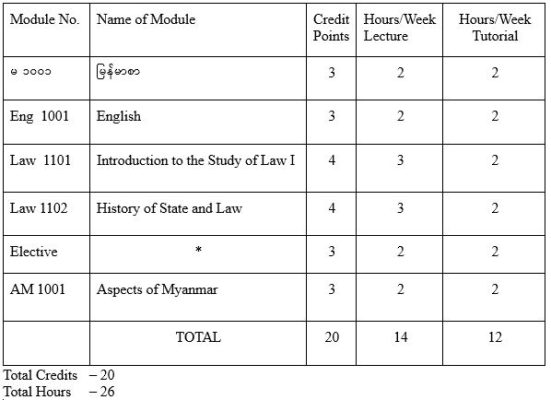
Foundation Courses
မ ၁၀၀၁ ျမန္မာစာ
Eng 1001 English
Core Courses (For Law Specialization)
Law 1101 Introduction to the Study of Law I
Law 1102 History of State and Law
Elective Courses (One subject to be chosen)
Phil 1001 Logic in Practice I
Hist 1001 Introduction to Myanmar Civilizations I
IR 1002 Introduction to International Relations I
Psy 1004 Public Relations
Eco 1001 Principles of Microeconomics
Geog1003 Geography of Southeast Asian Countries
OS 1003 Buddhist Culture
AM 1001 Aspects of Myanmar
FIRST YEAR SEMESTER II
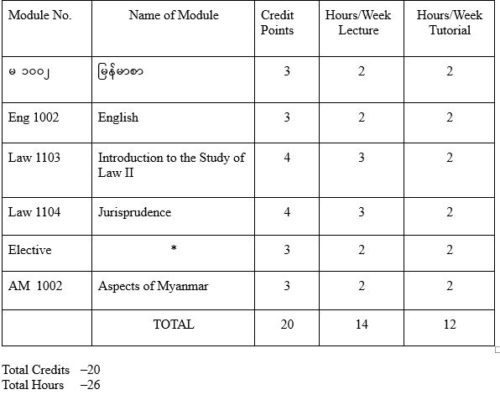
Foundation Courses
မ ၁၀၀၂ ျမန္မာစာ
Eng 1002 English
Core Courses
Law 1103 Introduction to the Study of Law II
Law 1104 Jurisprudence
Elective Courses (One subject to be taken)
Phil 1003 Logic in Practice II
Hist 1004 Introduction to Myanmar Civilizations II
IR 1004 Introduction to International Relations II
Psy 1008 Understanding Human Interaction
Eco 1002 Principles of Macroeconomics
Geog1004 Geography of Myanmar
OS 1007 Pali Literature
AM 1002 Aspects of Myanmar
SECOND YEAR SEMESTER I
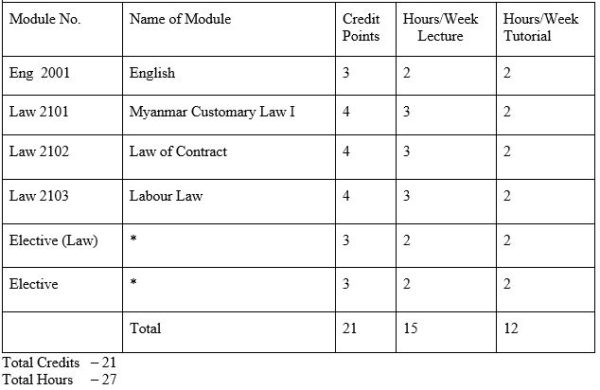
Foundation Course
Eng 2001 English
Core Courses
Law 2101 Myanmar Customary Law I
Law 2102 Law of Contract
Law 2103 Labour Law
Elective Courses (For Law Specialization )
(One subject to be chosen)
Law 2104 Law Relating to Sale of Goods
Law 2105 Principles of Legal Profession
(One subject to be chosen )
Eng 2003 Developing Communicative Skills I
Phil 2004 Philosophy of Law I
IR 2002 Elements of Political Institutions I
Eco 2001 Macroeconomics
Elective Courses ( For other Specializations )
Law 2001 Study of Law (CU – 3 For IR)
Law 2002 Law and Justice I (For Political Science)
SECOND YEAR SEMESTER II
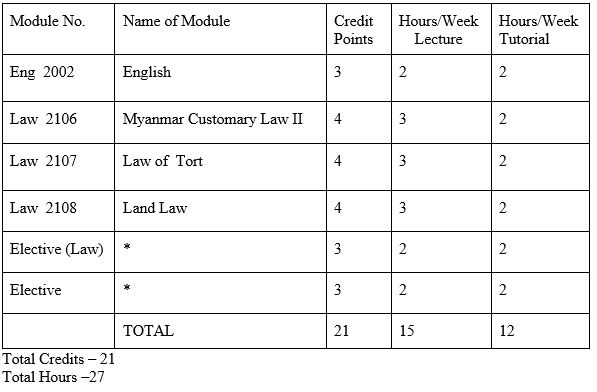
Foundation Course
Eng 2002 English
Core Courses
Law 2106 Myanmar Customary Law II
Law 2107 Law of Tort
Law 2108 Land Law
Elective Courses (For Law Specialization )
(One subject to be chosen)
Law 2109 Negotiable Instruments Act
Law 2110 Law of Banking
(One subject to be taken)
Eco 2002 International Trade
Eng 2004 Developing Communicative Skills II
Phil 2009 Philosophy of Law II
IR 2004 Elements of Political Institutions II
Elective Courses (For other Specializations )
Law 2003 Business Law (Commerce + B Act)
Law 2004 Law and Justice II (For Political Science)
Law 2005 ASEAN Documents
Law 2006 Introduction to International Law (For IR)
THIRD YEAR SEMESTER I
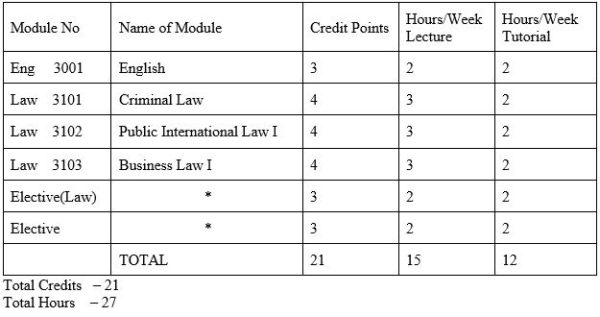
Foundation Course
Eng 3001 English
Core Courses
Law 3101 Criminal Law
Law 3102 Public International Law I
Law 3103 Business Law I
Elective Courses (For Law Specialization)
(One subject to be taken)
Law 3104 Conflict of Laws
Law 3105 Law of Banking
(One subject to be taken)
Psy 3001 Crime and Psychology I
Eng3003 Communicative Skills (Advanced)
Eng 3006 Translation
Eco 3001 Introduction to Economics of Development
IR 3002 Current Issues in International Relations
Elective Courses (For other Specializations)
Law 3001 ILO Convention)
Law 3002 International Law I (4 CU For IR)
Law 3003 General Principles of International Law (For PS)
MS 3105 Customary Law of Myanmar (4 Cu For MS)
Mgt 3101 Business Law
CL 3001 Commercial Law I
BM 3107 Business Law I
PP Administration Law I
ES 3101 Environmental Law
AS 3003 Legal Framework on ASEAN I
THIRD YEAR SEMESTER II
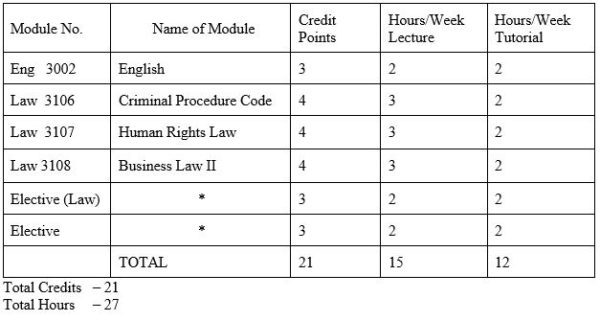
Foundation Course
Eng 3002 English
Core Courses
Law 3106 Criminal Procedure Code
Law 3107 Human Rights Law
Law 3108 Business Law II
Elective Courses (For Law Specialization)
(One subject to be taken)
Law 3109 Law of Insurance
Law 3110 Law of Treaties
Elective Courses (One subject to be taken)
Psy 3002 Crime and Psychology II
Eco 3002 International Finance
Eng 3004 Developing Communicative Skills
IR 3004 Current Issues in International Relations II
Elective Courses (For other Specializations)
Law 3004/Law 3204 Legal Protection of Intellectual Property Rights (For LI)
Law 3005/Law 3205 (1stYr Hon.) International Law II (4 CU for IR)
Law 3006/Law 3206 (1stYr Hon.) International Human Rights Law (For P S)
Law 3007/Law 3207 Business and Human Rights (3Cu for BDevS) (Eco)
BM 3108 Business Law II (For UDE)
PP 3002/PP 3202 Public Administration Law II
AS 3006/ AS 3206 Legal Framework on ASEAN II
FOURTH YEAR SEMESTER I
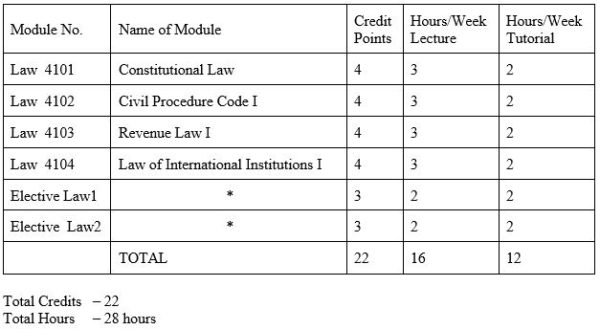
Core Courses
Law 4101 Constitutional Law
Law 4102 Civil Procedure Code I
Law 4103 Revenue Law I
Law 4104 Law of International Institutions I
Elective Courses
Law 4105 Environmental Law
Law 4106 International Economic Law
Law 4107 Child Law of Myanmar
Elective Courses (For Other Specializations)
Law 4001/Law 4201(2nd Yr. Hons) World Constitutions (For IR)
Law 4002/Law 4202 (2nd Yr. Hons) Administrative Law (For IR)
AS 4003/Law 4203 Constitutions of ASEAN Countries I
BS 4002 Business Law (EPP)
FOURTH YEAR SEMESTER II

Core Courses
Law 4108 Administrative Law
Law 4109 Civil Procedure Code II
Law 4110 Revenue Law II
Law 4111 Law of International Institutions II
Elective Courses
Law 4112 Law of the Sea
Law 4113 Transport Law
Law 4114 Intellectual Property Law
Elective Courses (For Other Specializations)
Law 4003/Law 4203 (2nd Yr. Hons) International Environmental Law (For IR)
Law 4004/Law 4204 (2nd Yr. Hons) International Human Rights Law (For IR)
Law 4005 Law of Contract (3 CU for BDevS) (Eco)
ES 4110 (4th Yr.)/4210(2nd Yr. Hons) Enforcement of Environmental Law (4 Cu)
AS 4006/AS 4206 Constitutions of ASEAN Countries II
MS 4109/MS 4209 Practical Aspects of Myanmar Customary Law
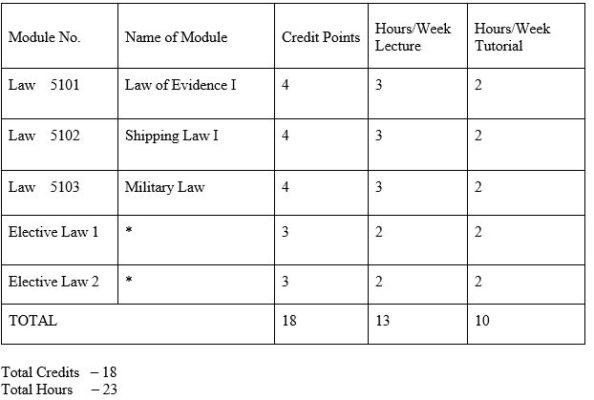
Core Courses
Law 5101 Law of Evidence I
Law 5102 Shipping Law I
Law 5103 Military Law
Elective Courses
Law 5104 Comparative Law
Law 5105 Criminology
Law 5106 International Humanitarian Law
Elective Courses (For Other Specializations)
Law 5001/Law 5201 (3rdYr.Hons) Law of World Institutions I (For IR)
Law 5002/Law 5202 (3rdYr.Hons) Law of Treaties I
ES 5206 (3rd Yr. Hons, Qualifying) Environmental Law and International
Organizations
AS 5003 ASEAN Economic Agreements I
FIFTH YEAR & QUALIFYING CLASS SEMESTER II
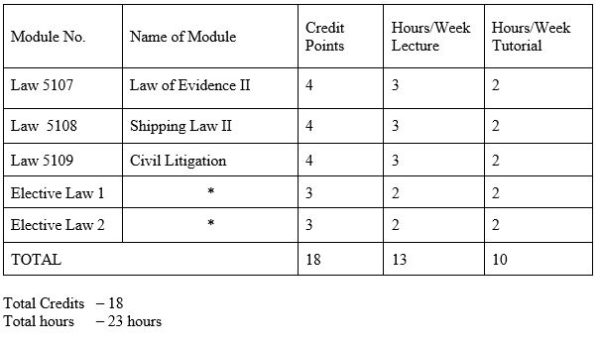
Core courses
Law 5107 Law of Evidence II
Law 5108 Shipping Law II
Law 5109 Civil Litigation
Elective Courses
Law 5110 Constitutions of ASEAN Countries
Law 5111 Law of Commercial Arbitration
Law 5112 International Air and Space Law
Elective Courses (For IR Student)
Law 5003/ Law 5203 (3rd Yr. Hons) Law of World Institutions II (For IR)
Law 5004 / Law 5204 (3rd Yr. Hons) Law of Treaties II
Elective Courses(For Other Specialization)
AS 5006 ASEAN Economic Agreements II
PA 5104 (Final YrHons; BBA, Administrative Law (For Applied Economics)
Qualifying BBA/BDevS)
MS 5212 Family Laws in Myanmar (For MS)
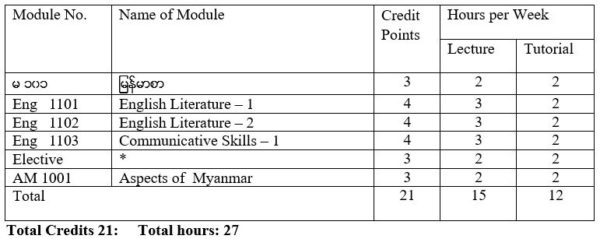
Foundation Course
မ ၁၀၁ ျမန္မာစာ
Core Courses
Eng 1101 English Literature – 1 (19th and 20th Century Prose and 20th Century Short Stories)
Eng 1102 English Literature – 2 (20th Century Poetry and Drama)
Eng 1103 Communicative Skills -1
Elective Courses (for English Specialisation)
Psy 1001 Public Relations
Phil 1001 Logic in Practice – 1
OS 1001 Fundamentals of the Pali Language
IR 1002 Introduction to International Relations – 1
Hist 1003 World History to 1500 – 1
AM 1001 Aspects of Myanmar
* An English specialisation student will have to take two electives (one elective, and AM 1001) from among those offered.
ENG 1101: English Literature – 1 (19th& 20th Century Prose and 20th Century Short Stories)
Course Description
This module introduces students to English literature through selected 19th& 20th century prose passages and the 20th century short stories by well-known authors. The selection is based on the inclusion of a variety of themes. This module will help students to explore various types of prose passages, styles of writing and characteristics of short stories such as plot, setting, mode of development, and literary devices. Prose writing and short stories being mirrors of a particular period or age, these selections will raise students’ awareness of the historical, social and cultural background of the story. This module will also train students to read literary texts closely, and appreciate them and express their understanding of texts both in class discussion and in writing.
Learning Outcomes
At the end of the course, students will be able to:
Assessment
Assessment will be done through the following modes:
Students will be able to demonstrate the achievement of learning outcomes by:
Coursebook
Choo, S & Yeo, R (2013). Mining for Meaning. Learners Publishing Private Limited.
References for Prose
Abrams, M. H. (1986). The Norton Anthology of English Literature. (Fifth edition). New York: Norton & Company.
Armour, J. S. (1958). Standard English Essays. Bombay: Blackie and Son Ltd.
Boas, G. (1954). Modern English Prose. London: Macmillan & Co. Ltd.
Conlin, M.L. (1990). Patterns Plus: A Short Prose Reader with Argumentation. Boston: Houghton Mifflin Company.
D’oyley, E. (1934). Modern Prose. London: Edward Arnold & Co.
Ridout, A. K. & Stuart, J. (1968). Short Stories for Discussion. New York: Charles Scribner’s.
Stafford, W. & Candelaria, F. (1966). The Voices of Prose. USA: McGraw. Hill, Inc.
References for Short Stories
Dolley, C. (1967). The Penguin Book of English Short Stories. Great Britain: Penguin Books Ltd.
Konigsberg, I. (1971) The Classic Short Story. U.S.A.: Harper and Row Inc.
Mizener, A. (1967). Modern Short Stories: The Uses of Imagination. U.S.A.: Norton & Company, Inc.
Chin, B. A. et. al. (2002). Glencoe Literature: The Reader’s Choice. U.S.A.: The McGraw-Hill Companies.
Ridout, A. K. & Stuart, J. (1968). Short Stories for Discussion. New York: Charles Scribner’s Sons.
Eng 1102: English Literature – 2 (20th Century Poetry and Drama)
Course Description
This module deals with 20th century poetry and drama. It will acquaint students with various styles of literary texts and enable them to gain the socio-cultural knowledge of that period as reflected in the selected texts. Students have to study a variety of 20th Century poems, both British and American, which are representative of the period, being presented through a thematic approach. It aims at helping students to appreciate modern English poems. It is hoped that students’ language skills will be enhanced through literature learning. Moreover, students will be able to appreciate and write poems while learning different types of poems. A collection of 20th century English Drama will enable students to read plays not only for pleasure but also to understand life as presented by playwrights This module includes the plays, written in a variety of styles, for the stage, making it possible for them. It makes it possible for students to study plays to get a glimpse of play-acting and the theatre from the mid-nineteenth century to the present, encompassing such radical movements as realism, naturalism and symbolism. It also introduces them to the theatre of the absurd, and post-modernism.
Learning Outcomes
At the end of the module, students will be able to:
Assessment
Assessment will be done through the following modes:
Students will be able to demonstrate the achievement of learning outcomes by:
References
Abrams, M. H. (1986) The Norton Anthology of English Literature. Vol. 1. USA: Norton and Company, Inc.
Alexander, Michael (2000) A History of English Literature. London: Macmillan Press Ltd.
Allison, A. W. et al. (1986) Masterpieces of Drama. USA: Macmillan Publishing Co.
Hewett, R. P. (1984) A Choice of Poets: An Anthology of Poets from Wordsworth to the present day. UK: Nelson House.
Hoeper, Jeffrey D & James H. Pickering (1990) Poetry: An Introduction. USA: Macmillan Publishing Company.
Leech, Geoffrey N, A linguistic guide to English poetry, (1st ed.) London, Longman, 1969.
Peacock, W (1963) English Verse. Vol. V. Oxford: OUP
Pickering, James H. & Jeffrey D Hoeper (1986) Literature. USA: Macmillan Publishing Company.
Pickering, James H. & Jeffrey D Hoeper (1986) Literature. USA: Macmillan Publishing Company.
Vaughan-Rees, Michael, Rhymes and rhythm: A poem-based course for English pronunciation, (1st edn.) UK, Macmillan Publishers Ltd,1994.
Ward, Thomas Humphry (1883) The English Poets. Vol. IV. London: Macmillan and Co.
Weekes, A. R (year not mentioned) The Odes of John Keats. London: University Tutorial Press Ltd.
Wilkie, Brian & James Hurt (1998) Literature of the Western World. Vol. I. USA: Macmillan Publishing Company.
Wollman, Maurice (1948) Poems of Twenty Years: An Anthology. London: Macmillan and Co.
Eng 1103: Communicative Skills – 1
Course Description
This module aims to develop students’ communicative skills. It contains Grammar, Vocabulary, Reading, Listening, and Speaking/Pronunciation components. Grammar is contextualized and introduced through an inductive approach. A variety of authentic and semi-authentic reading and listening texts will be given to introduce grammar and vocabulary. Vocabulary section focuses on word building and lexical patterns and recycled through activities in each unit. Regular pronunciation sections are integrated with the presentation of new language to practice word and sentence stress, difficult sounds, contractions and intonation. The Scenario lessons are included to extend speaking practice with important communicative features in a real-life situation. Study Skills section enhance students’ learning outside the classroom, participation in discussions, note-taking skills, presentation skills, and so on. Different genres of written texts are introduced to develop students’ writing through analysis of models and practice.
Learning Outcomes
At the end of the module, students will be able to:
Assessment Criteria
Assessment will be done through a combination of tutorial-based assessment (20%) and a final examination (80%).
For tutorial-based assessment, the students are asked to do some quizzes, give group presentation, take some mini-tests based on reading, writing, listening, vocabulary, and grammar they have learned.
In the final examination, they will be assessed through such components as reading, vocabulary, grammar, language use, and writing.
References
Cotton, D., Falvey, D. & Kent, S. (2014). New Language Leader 1: Coursebook. Pearson Education Limited.
MyEnglishLab: english.com/activate

Foundation Course
မ ၁၀၂ ျမန္မာစာ
Core Courses
Eng 1104 English Literature – 3 (19thand 20th Century Prose and 20th Century Short Stories)
Eng 1105 English Literature – 4 (20th Century Poetry and Drama)
Eng 1106 Communicative Skills – 2
Elective Courses (for English Specialisation)
OS 1007 Pali Literature
Phil1003 Logic in Practice – 2
Psy1004 Understanding Human Interaction
IR 1005 Introduction to International Relations – 2
Hist 1006 World History 1500 – 2
AM 1002 Aspects of Myanmar
* An English specialisation student will have to take two electives (one elective and AM 1002) from among those offered.
ENG 1104: English Literature – 3 (19th& 20th Century Prose and 20th Century Short Stories)
Course description
This module introduces literature through a selection of 19th& 20th century prose passages and short stories by well-known writers in the 20th century. The selection of literary texts is based on a variety of themes. This module helps students to understand the style of various types of prose passages and the characteristics of short stories such as plot, setting, mode of development, and literary devices. This module focuses on analyzing the narrative features and tension and suspense of a literary work. As short stories are mirrors of the age in which they were written, the selection helps students to gain the historical, social and cultural knowledge of the story. This module trains students to read literary texts intensively and to express their understanding of these texts both in class discussion and in writing.
Learning Outcomes
At the end of the course, students will be able to:
Assessment
Assessment will be done through the following modes:
Students will be able to demonstrate the achievement of learning outcomes by:
Prescribed Coursebook
Choo, S & Yeo, R (2013). Mining for Meaning. Learners Publishing Private Limited.
References for Prose
Abrams, M. H. (1986). The Norton Anthology of English Literature. (Fifth edition). New York: Norton & Company.
Armour, J. S. (1958). Standard English Essays. Bombay: Blackie and Son Ltd.
Boas, G. (1954). Modern English Prose. London: Macmillan & Co. Ltd.
Conlin, M.L. (1990). Patterns Plus: A Short Prose Reader with Argumentation. Boston: Houghton Mifflin Company.
D’oyley, E. (1934). Modern Prose. London: Edward Arnold & Co.
Ridout, A. K. & Stuart, J. (1968). Short Stories for Discussion. New York: Charles Scribner’s.
Stafford, W. & Candelaria, F. (1966). The Voices of Prose. USA: McGraw. Hill, Inc.
References for Short Stories
Dolley, C. (1967). The Penguin Book of English Short Stories. Great Britain: Penguin Books Ltd.
Konigsberg, I. (1971) The Classic Short Story. U.S.A.: Harper and Row Inc.
Mizener, A. (1967). Modern Short Stories: The Uses of Imagination. U.S.A.: Norton & Company, Inc.
Chin, B. A. et. al. (2002). Glencoe Literature: The Reader’s Choice. U.S.A.: The McGraw-Hill Companies.
Ridout, A. K. & Stuart, J. (1968). Short Stories for Discussion. New York: Charles Scribner’s Sons.
Eng 1105: English Literature – 4 (19th and 20th Century Poetry & Drama)
Course Description
This module deals with the study of a rich variety of poems, both British and American, which are representative of the century, being selected and presented in a thematic approach. Students will be able to appreciate the selected poems expressed in modern English so that their language development in speaking and writing will be enhanced.
This module also deals with selections from English Drama of 20th century. Students will be able to read not only for pleasure but also to tackle conventional themes in the light of a new understanding of the theory and development of tragedy, comedy, and other modes of dramatic expression. It aims at helping students to develop their language through an intensive study of the style of writing in these plays, which introduce the on-setting element of modernism.
Learning Outcomes
At the end of the module, students will be able to:
Assessment
Assessment will be done through the following modes:
Students will be able to demonstrate the achievement of learning outcomes by:
References
Abrams, M. H. (1986) The Norton Anthology of English Literature. Vol. 1. USA: Norton and Company, Inc.
Alexander, Michael (2000) A History of English Literature. London: Macmillan Press Ltd.
Allison, A. W. et al. (1986) Masterpieces of Drama. USA: Macmillan Publishing Co.
Hewett, R. P. (1984) A Choice of Poets: An Anthology of Poets from Wordsworth to the present day. UK: Nelson House.
Hoeper, Jeffrey D & James H. Pickering (1990) Poetry: An Introduction. USA: Macmillan Publishing Company.
Leech, Geoffrey N, A linguistic guide to English poetry, (1st edn.) London, Longman, 1969.
Peacock, W (1963) English Verse. Vol. V. Oxford: OUP
Pickering, James H. & Jeffrey D Hoeper (1986) Literature. USA: Macmillan Publishing Company.
Pickering, James H. & Jeffrey D Hoeper (1986) Literature. USA: Macmillan Publishing Company.
Vaughan-Rees, Michael, Rhymes and rhythm: A poem-based course for English pronunciation, (1st edn.) UK, Macmillan Publishers Ltd,1994.
Ward, Thomas Humphry (1883) The English Poets. Vol. IV. London: Macmillan and Co.
Weekes, A. R (year not mentioned) The Odes of John Keats. London: University Tutorial Press Ltd.
Wilkie, Brian & James Hurt (1998) Literature of the Western World. Vol. I. USA: Macmillan Publishing Company.
Wollman, Maurice (1948) Poems of Twenty Years: An Anthology. London: Macmillan and Co.
Eng 1106: Communicative Skills – 2
Course Description
This module aims to develop students’ communicative skills and language skills: grammar, vocabulary, reading, listening, speaking, pronunciation, critical thinking skills, problem solving skills and creativity. Authentic and semi-authentic reading and listening texts are used to teach grammar in inductive approach and introduce vocabulary. The scenario in real-life situation is given to make students practise the language they have learned in different contexts. Students are introduced to different genres and develop their writing through analysis of models and practice in producing different text styles. Throughout the course, engaging class activities will be given to make students communicate in English and develop their language skills.
Learning Outcomes
At the end of the module, students will be able to:
Assessment
Assessment will be done through a combination of tutorial-based assessment (20%) and a final examination (80%).
Tutorial-based assessment includes quizzes, give group presentation, mini-tests based on reading, writing, listening, vocabulary, and grammar they have learned.
In the final examination, they will be assessed through such components as reading, vocabulary, grammar, language use, and writing.
References
Cotton, D., Falvey, D. & Kent, S. (2014). New Language Leader 1: Coursebook. Pearson Education Limited.
MyEnglishLab: english.com/activate

Foundation Course
မ ၂၀၀၁ ျမန္မာစာ
Core Courses
Eng 2101 English Literature – 5 (16th to 20th Century Prose and 19th and 20th Century Short Stories)
Eng 2102 English Literature – 6 (19th and 20th Century Poetry and Drama)
Eng 2103 English Language Studies – 1 (Introduction to General Linguistics and Phonetics)
Eng 2104 Communicative Skills – 3
Elective Courses (for English Specialisation)
Hist 2003 Social History of England
Psy 2001 Language and Thought
Phil 2001 History of Western Intellectual Development – 1
IR 2001 Elements of Political Institutions – 1
OS 2001 Pali Language
OS 2003 Pali Literature (Prose)
Elective Courses (for Other Specialisations)
Eng 2003 Developing Communicative Skills – 1
* An English specialisation student will have to take one elective
Eng 2101: English Literature – 5 (16th to 20th Century Prose and 19th& 20th Century Short Stories)
Course Description
This module introduces students to literature through a selection of 16th to 20th century prose passages and 19th& 20th century short stories by well-known writers in these periods. The selection is done from a variety of themes. This module helps students to extend their knowledge of styles of various types of prose passages and characteristics of short stories.
This module focuses more on characterization and tone of the text in particular. As short stories are mirrors of a certain age, the selection helps the students to gain knowledge about the author’s life, and the historical, social and cultural background of the story. This module trains students to read literary texts intensively, express their understanding of these texts both in class discussion and in writing, and develop language skills through literature.
16th& 20th Century Prose
Close reading (Prose)
15.1. Character types and roles
15.2. Character analysis
16.1. Comedy
16.2. Tragedy
16.3. Irony
19th& 20th Century Short Stories
Learning Outcomes
After this module, students will be able to:
Assessment Criteria
Assessment will be done through a combination of tutorial-based assessment, class and group discussion and formal written assignments and a final closed book written examination.
Students will be able to demonstrate the achievement of learning outcomes by:
Prescribed Coursebook
Choo, S & Yeo, R (2013). Mining for Meaning. Learners Publishing Private Limited.
References for Prose
Abrams, M. H. (1986). The Norton Anthology of English Literature. (Fifth edition). New York: Norton & Company.
Armour, J. S. (1958). Standard English Essays. Bombay: Blackie and Son Ltd.
Boas, G. (1954). Modern English Prose. London: Macmillan & Co. Ltd.
Conlin, M.L. (1990). Patterns Plus: A Short Prose Reader with Argumentation. Boston: Houghton Mifflin Company.
D’oyley, E. (1934). Modern Prose. London: Edward Arnold & Co.
Ridout, A. K. & Stuart, J. (1968). Short Stories for Discussion. New York: Charles Scribner’s.
Stafford, W. & Candelaria, F. (1966). The Voices of Prose. USA: McGraw. Hill, Inc.
References for Short Stories
Dolley, C. (1967). The Penguin Book of English Short Stories. Great Britain: Penguin Books Ltd.
Konigsberg, I. (1971) The Classic Short Story. U.S.A.: Harper and Row Inc.
Mizener, A. (1967). Modern Short Stories: The Uses of Imagination. U.S.A.: Norton & Company, Inc.
Chin, B. A. et. al. (2002). Glencoe Literature: The Reader’s Choice. U.S.A.: The McGraw-Hill Companies.
Ridout, A. K. & Stuart, J. (1968). Short Stories for Discussion. New York: Charles Scribner’s Sons.
Eng 2102: English Literature – 6 (19th& 20th Century Poetry & Drama)
Course Description
This module deals with the study of a rich variety of poems, both British and American, which are representative of the period. The poems are selected and presented using a thematic approach. Students will be able to appreciate the selected poems expressed in English so that their language power in speaking and writing will be enhanced.
This module also deals with selections from English Drama of 19th and 20th centuries. Students will be able to read not only for pleasure but also to tackle conventional themes in the light of a new understanding of the theory and development of tragedy, comedy, and other modes of dramatic expression. It aims at helping students to develop their language through an intensive study of the style of writing in these plays, which introduce the on-setting element of modernism.
19th& 20th Century Poetry
19th& 20th Century Drama
Learning Outcomes
After completing the course, students will be able to:
Assessment
Assessment will be done through a combination of tutorial-based assessment (20%), and a final closed book written examination (80%).
Students will be able to demonstrate the achievement of learning outcomes by:
References for Poetry
Abrams, M. H. (1986) The Norton Anthology of English Literature. Vol. 1. USA: Norton and Company, Inc.
Hewett, R. P. (1984) A Choice of Poets: An Anthology of Poets from Wordsworth to the present day. UK: Nelson House.
Hoeper, Jeffrey D & James H. Pickering (1990) Poetry: An Introduction. USA: Macmillan Publishing Company.
Peacock, W (1963) English Verse. Vol. V. Oxford: OUP
Pickering, James H. & Jeffrey D Hoeper (1986) Literature. USA: Macmillan Publishing Company.
Ward, Thomas Humphry (1883) The English Poets. Vol. IV. London: Macmillan and Co.
Weekes, A. R (year not mentioned) The Odes of John Keats. London: University Tutorial Press Ltd.
Wilkie, Brian & James Hurt (1998) Literature of the Western World. Vol. I. USA: Macmillan Publishing Company.
Wollman, Maurice (1948) Poems of Twenty Years: An Anthology. London: Macmillan and Co.
References for Drama
Abrams, M. H. (1986) The Norton Anthology of English Literature. Norton & Com. Inc
Alexander, Michael (2000) A History of English Literature. Macmillan Press Ltd.
Allison, Alexander W. et al. (1986) Masterpieces of Drama. Macmillan Publishing Co.
Pickering, James H. & Jeffrey D Hoeper (1986) Literature. USA: Macmillan Publishing Company.
Eng 2103: English Language Studies – 1 (Introduction to General Linguistics and Phonetics)
Course Description
This module introduces general linguistics and phonetics. The first part consists of the definition of language, the origin and development of human languages, characteristics and varieties of language, as well as animal and human language. It also focuses on the definition, the scope of linguistics, types of linguistics and its related fields. The second part deals with the definition of phonetics, its branches, and the description of vowels and consonants.
Contents
Part A:
Language
Linguistics
Part B:
Phonetics
Learning Outcomes
At the end of the module, students will be able to
Assessment
Assessment will be done through a combination of tutorial-based assessment, class and group discussion, formal written assignments (20%) and a final examination (80%).
Students will be able to demonstrate the achievement of learning outcomes by:
References
Introduction to General Linguistics and Phonetics
Verma, S.K. & Krishnaswamy, N. (1989). Modern Linguistics: An Introduction. Dehli: OUP.
Radhey L.Varshney (2003). An Introductory Textbook of Linguistics and Phonetics. Bareilly: Student Store. Chapter 2 & 4
Kelly, G. (2000)How to teach pronunciation. England: Pearson Education Ltd.Chapter 1, 3, 4
Fromkin, V. Rodman, R. & Hyams, N. (2003). An Introduction to Language. Heinle. Chapter 6
Clark, J. & Yallop. C (1997). An Introduction and Phonetics and Phonology. UK: Blackwell Publishers Ltd. Chapter 2.
Eng- 2104: Communicative Skills -3
Course description
This module aims to develop students’ communicative skills and language skills: grammar, vocabulary, reading, listening, speaking, pronunciation, critical thinking skills, problem solving skills and creativity. Authentic or semi-authentic reading and listening texts taken from a variety of text types will be used to develop their reading and listening skills. In grammar section, students are encouraged to analyse and understand grammar through an inductive approach regarding examples in reading and listening texts and the vocabulary component pays attention to word building and lexical patterns and they are recycled through the speaking activities. The speaking section includes a variety of activities, which enable the students to comment on the topics and discuss the issues that arise, as well as talk about more personal experiences and knowledge and the writing section will develop students’ writing through analysis of models and practice in producing different text styles.
Learning Outcomes
At the end of the module, students will be able to:
Assessment
Assessment will be done through a combination of tutorial-based assessment, class and group discussion, formal written assignments, presentations (20%) and a final examination (80%).
Students will be able to demonstrate the achievement of learning outcomes by:
Prescribed Coursebook
Cotton, D., Falvey, D. & Kent, S. (2014). New Language Leader 2: Coursebook. England: Pearson Education Limited.
References
https://english-dashboard.pearson.com

Foundation Course
မ ၂၀၀၂ ျမန္မာစာ
Core Courses
Eng 2105 English Literature – 7 (16th to 20th Century Prose and 19th and 20th Century Short Stories)
Eng 2106 English Literature – 8 (19thand 20th Century Poetry and Drama)
Eng 2107 English Language Studies – 2 (Introduction to English Phonology)
Eng 2108 Communicative Skills – 4
Elective Courses (for English Specialisation)
Hist 2006 Social History of England
Psy 2004 Stress and Stress Management
Phil 2006 History of Western Intellectual Development – 2
IR 2004 Elements of Political Institutions – 2
OS 2006 Pali Language
OS 2008 Pali Literature (Poetry)
Elective Courses (for Other Specialisations)
Eng 2004 Developing Communicative Skills – 2
* An English specialisation student will have to take one elective.
Eng 2105: English Literature – 7 (16th to 20th Century Prose & 19th& 20th Century Short Stories)
This module extends students’ knowledge of literature through a selection of 16th to 20th century prose passages and 19th& 20th century short stories by well-known writers in these centuries. Literary works with various themes were selected. This module helps students to study the style of various types of prose passages and the characteristics of short stories.
This module focuses more on prose genres and on the works of the great essayists. As short stories are mirrors of the age, the selection helps the students to gain knowledge about the author’s life, and the historical, social and cultural background of the story. This module trains students to read literary texts intensively and express their understanding of the selected texts both in class discussion and in writing.
16th to 20th Century Prose
19th& 20th Century Short Stories
Learning Outcomes
After this module, students will be able to:
Assessment
Assessment will be done through a combination of tutorial-based assessment, class and group discussion and formal written assignments (20%) and a final examination (80%).
Students will be able to demonstrate the achievement of learning outcomes by:
References for Prose
Abrams, M. H. (1986). The Norton Anthology of English Literature. (Fifth edition). New York: Norton & Company.
Armour, J. S. (1958). Standard English Essays. Bombay: Blackie and Son Ltd.
Boas, G. (1954). Modern English Prose. London: Macmillan & Co. Ltd.
Conlin, M.L. (1990). Patterns Plus: A Short Prose Reader with Argumentation. Boston: Houghton Mifflin Company.
D’oyley, E. (1934). Modern Prose. London: Edward Arnold & Co.
Ridout, A. K. & Stuart, J. (1968). Short Stories for Discussion.NewYork: Charles Scribner’s.
Stafford, W. & Candelaria, F. (1966). The Voices of Prose. USA: McGraw. Hill, Inc.
References for Short Stories
Dolley, C. (1967). The Penguin Book of English Short Stories. Great Britain: Penguin Books Ltd.
Konigsberg, I. (1971) The Classic Short Story. U.S.A.: Harper and Row Inc.
Mizener, A. (1967). Modern Short Stories: The Uses of Imagination. U.S.A.: Norton & Company, Inc.
Chin, B. A. et. al. (2002). Glencoe Literature: The Reader’s Choice. U.S.A.: The McGraw-Hill Companies.
Ridout, A. K. & Stuart, J. (1968). Short Stories for Discussion. New York: Charles Scribner’s Sons.
Eng 2106: English Literature – 8 (19th& 20th Century Poetry & Drama)
Course Description
This module deals with the study of a rich variety of poems, both British and American, which are representative of the century, being selected and presented in a thematic approach. Students will be able to appreciate the selected poems expressed in modern English so that their language power in speaking and writing will be enhanced.
This module also deals with selections from English Drama of 19th&20th centuries. Students will be able to read not only for pleasure but also to tackle conventional themes in the light of a new understanding of the theory and development of tragedy, comedy, and other modes of dramatic expression. It aims at helping students to develop their language through an intensive study of the style of writing in these plays, which introduce the on-setting element of modernism.
19th& 20th Century Poetry
19th& 20th Century Drama
1. The Miracle Worker William Gibson
Learning Outcomes
After completion the course, students will be able to:
Assessment
Assessment will be done through a combination of tutorial-based assessment (20%), and a final closed book written examination (80%).
Students will be able to demonstrate the achievement of learning outcomes by:
References for Poetry
Abrams, M. H. (1986) The Norton Anthology of English Literature. Vol. 1. USA: Norton and Company, Inc.
Hewett, R. P. (1984) A Choice of Poets: An Anthology of Poets from Wordsworth to the present day. UK: Nelson House.
Hoeper, Jeffrey D & James H. Pickering (1990) Poetry: An Introduction. USA: Macmillan Publishing Company.
Peacock, W (1963) English Verse. Vol. V. Oxford: OUP
Pickering, James H. & Jeffrey D Hoeper (1986) Literature. USA: Macmillan Publishing Company.
Ward, Thomas Humphry (1883) The English Poets. Vol. IV. London: Macmillan and Co.
Weekes, A. R (year not mentioned) The Odes of John Keats. London: University Tutorial Press Ltd.
Wilkie, Brian & James Hurt (1998) Literature of the Western World. Vol. I. USA: Macmillan Publishing Company.
Wollman, Maurice (1948) Poems of Twenty Years: An Anthology. London: Macmillan and Co.
References for Drama
Abrams, M. H. (1986) The Norton Anthology of English Literature. Norton & Com. Inc
Alexander, Michael (2000) A History of English Literature. Macmillan Press Ltd.
Allison, Alexander W. et al. (1986) Masterpieces of Drama. Macmillan Publishing Co.
Pickering, James H. & Jeffrey D Hoeper (1986) Literature. USA: Macmillan Publishing Company.
Eng 2107: English Language Studies – 2 (Introduction to English Phonology)
Course Description
The module deals with two sub-disciplines in linguistics, namely phonetics and phonology. It also describes the International Phonetic Alphabet (IPA), English consonants and vowels, and phonemes. It focuses on the smallest of the superordinate units, the syllable and the phonological units above the syllable such as the phonetic characteristics of stress, stress position, segmental phonology of the phrase and word.
Contents
Learning Outcomes
At the end of the module, students will be able to:
Assessment
Assessment will be done through a combination of tutorial-based assessment, class and group discussion and formal written assignments (20%) and a final examination (80%).
Students will be able to demonstrate the achievement of learning outcomes by:
References
McMahon, A. (2002) An Introduction to English Phonology. Edinburgh: EUP. Chapter 3, 6
Clark, J. & Yallop, C (1997). An Introduction and Phonetics and Phonology. UK: Blackwell Publishers Ltd. Chapter 1.
McMahon, A. (2002) An Introduction to English Phonology. Edinburgh: EUP. Chapter 1, 3, 6, 9, 10
Yule, G. (2006). The Study of Language. Cambridge: CUP. Chapter 5.
Eng- 2108: Communicative Skills -4
Course Description
This module aims to develop students’ communicative skills and language skills: grammar, vocabulary, reading, listening, speaking, pronunciation, critical thinking skills, problem solving skills and creativity. Authentic or semi-authentic reading and listening texts taken from a variety of text types will be used to develop their reading and listening skills. In the grammar section, students are encouraged to analyse and understand grammar through an inductive approach regarding examples in reading and listening texts and the vocabulary component pays attention to word building and lexical patterns and they are recycled through the speaking activities. The speaking section includes a variety of activities, which enable the students to comment on the topics and discuss the issues that arise, as well as talk about more personal experiences and knowledge, and the writing section will develop students’ writing through analysis of models and practice in producing different text styles.
Learning Outcomes
At the end of the module, students will be able to:
Assessment
Assessment will be done through a combination of tutorial-based assessment, class and group discussion, formal written assignments, presentations and a final examination.
Students will be able to demonstrate the achievement of learning outcomes by:
Prescribed Coursebook
Cotton, D., Falvey, D. & Kent, S. (2014). New Language Leader 2: Coursebook. England: Pearson Education Limited.
References
https://english-dashboard.pearson.com
THIRD YEAR – ENGLISH SEMESTER – I

Foundation Course
မ ၃၀၀၁ ျမန္မာစာ
Core Courses
Eng 3101 English Literature – 9 (19thand 20th Century Short Stories and The Novel)
Eng 3102 English Literature – 10(18th and 19th Century Poetry and Drama)
Eng 3103 English Language Studies – 3 (Morphology)
Eng 3104 Translation & Interpretation – 1
Elective Courses (for English Specialistion)
Eng 3105 Communicative Skills – 5
Eng 3106 Business English – 1
Eng 3107 Introducing ELT Methodology – 1
Elective Courses (for Other Specialisations)
Eng 3003 Developing Communicative Skills– 3
* An English specialisation student will have to take one elective.
Eng 3101: English Literature – 9 (19th & 20th century Short Stories & The Novel)
Course Description
This module includes a selection of the 19th and 20th century English short stories and novels. Setting, plot, characterization, literary devices, climax, point of view, theme, symbols, conflicts, and development of the story are the focus of this module. This module will enhance the students’ ability to arrive at the correct interpretation of the writer’s message and to appreciate literature from different points of view.
The novels in the 19th and 20thcenturies particularly engaged the students in the events, circumstances, beliefs and attitudes in those periods. It concentrates on a critical study of works by the centuries’ major literary figures like Katherine Mansfield, Graham Greene, George Orwell, etc. The focus is on understanding the role of the novel in representing life and people and exploring socio-cultural changes, the flexibility of the genre and how it developed aesthetically, stylistically and structurally. This module also expands students’ literary vocabulary, and exercises critical reading and writing.
19th& 20th Century (Short Stories)
19th& 20th Century (The Novel)
Learning Outcomes
At the end of the module, students will be able to:
Assessment
There are six assignments / presentations (individual and group work) that make up 20%, and the final closed book written examination of 80%. The assignments / presentations are based on the materials used in class.
Students will be able to demonstrate the achievement of learning outcomes by:
References for Short Stories
Dolley, C. (1967). The Penguin Book of English Short Stories. Great Britain: Penguin Books Ltd.
Konigsberg, I. (1971) The Classic Short Story. U.S.A.: Harper and Row Inc.
Mizener, A. (1967). Modern Short Stories: The Uses of Imagination. U.S.A.: Norton & Company, Inc.
Chin, B. A. et. al. (2002). Glencoe Literature: The Reader’s Choice. U.S.A.: The McGraw-Hill Companies.
Ridout, A. K. & Stuart, J. (1968). Short Stories for Discussion. New York: Charles Scribner’s Sons.
References for The Novel
Alexander, Michael (2000) A History of English Literature. Macmillan. London
Drew, Elizabeth. (1967) The Novel: A Modern Guide to Fifteen English Masterpieces. Dell Publishing Co. Inc.
Lass, Abraham H. Ed. (1966) A Student’s Guide to 50 British Novels. Washington Square Press, Inc. New York.
Pickering, H. James, & Hoeper, D. Jeffrey. (1982) Literature. Macmillan Publishing Company. New York.
Eng-3102: English Literature 10 – (19th & 20th Century Poetry & Drama)
Course Description
This module deals with the study of poems and a play which are representative of 19th and 20th century poetry and drama. Studying selected English poems enables students to extend their knowledge of English poetry that they have already garnered in their academic pursuit. While pursuing the scholarly studies in English poetry, students simultaneously perceive the development of English poetry over the centuries. This module also engages students to learn a farcical comedy of Oscar Wilde, a famous Irish playwright. Through Wilde’s popular Victorian drama, students observe Wilde’s trademarks ‘satiric epigrams, paradoxes and puns’. It is Wilde’s popular work that represents the finest literature in the English language written during the 19th century and questions Victorian social values and norms. Moreover, how nineteenth-century intellectuals think through the relationship between dramatic form and the social world, and how nineteenth-century drama mobilizes new images of gender and the family can be learned through Wilde’s famous drama.
18th& 19th Century Poetry
Drama
The Importance of Being Earnest Oscar Wilde
Learning Outcomes
At the end of the course, students will be able to:
Assessment
Class discussions during the lectures – 5%: Active engagement of students in class discussion is requested. Their active participation will be highly appreciated or graded.
Attendance – 5%: Students are to attend all lectures and their attendance will be one of the criteria in assessment.
Written Assignment – 5% of the grade is for written tasks assigned for the respective poems or acts in the play. Students are asked to work in groups so that they can learn from each other by sharing their own ideas in groups.
Presentation – 5%: 5% of the grade is allotted for students’ group presentation on the assigned tasks. In assessing group presentation, three-fold group assessment will be carried out. The teacher gives a grade to the group’s final product, group members give a grade to each other, and each group member gives a grade to him/herself, and justifies it. Every student’s grade is then a combination of: the teacher’s grade, average of peer grades, and self-assigned grades.
Exam – 80%: The grade is for students’ achievement in the final exam.
References for Poetry
Abrams, M. H. (1986) The Norton Anthology of English Literature. Vol. 1. USA: Norton and Company, Inc.
Hewett, R. P. (1984) A Choice of Poets: An Anthology of Poets from Wordsworth to the Present Day. UK: Nelson House.
Hoeper, Jeffrey D & James H. Pickering (1990) Poetry: An Introduction. USA: Macmillan Publishing Company.
Kloeppel, L. A Teacher’s Guide to ‘The Importance of Being Earnest and Other Plays’. The Signet Classic Edition.
Pickering, James H. & Jeffrey D Hoeper (1986) Literature. USA: Macmillan Publishing Company.
Wilkie, Brian & James Hurt (1998) Literature of the Western World. Vol. I. USA: Macmillan Publishing Company.
References for Drama
Abrams, M. H. (1986) The Norton Anthology of English Literature. Norton & Com. Inc
Alexander, M (2000) A History of English Literature. Macmillan Press Ltd.
Allison, Alexander W. et al. (1986) Masterpieces of Drama. Macmillan Publishing Co.
Pickering, James H. & Jeffrey D Hoeper (1986) Literature. USA: Macmillan Publishing Company.
Eng 3103: English Language Studies – 3 (Morphology)
Course Description
This module acquaints learners of English with some background concepts of words and rules of word formation. Moreover, it also deals with morphemes: free and bound morphemes, lexical and functional morphemes, inflectional versus derivational morphology, and morphological analysis. The objective of this module is to provide an introduction to major concepts in the study of morphology and discusses its place within linguistic theory.
Morphology
Learning Outcomes
At the end of the module, students will be able to:
Assessment
Assessment will be done through a combination of tutorial-based assessment: quizzes, group presentations, individual/group assignments (20%) and a final closed book examination (80%).
Students will be able to demonstrate the achievement of learning outcomes by:
References
Akmajan, A. et al. (2001). Linguistics: An Introduction to Language and Communication. Chapter 2
Fromkin, V. Rodman, R. & Hyams, N. (2003). An Introduction to Language. Heinle. Chapter 2
Thomas, W. Stewart, Jr. & Vaillette, N. (eds). Language Files. Columbus: The Ohio State University Press. File 5
Eng 3104: Translation and Interpretation – 1
Course Description
This module deals with the theoretical aspect of translation and translation studies, the background history of translation, general types of translation, features of a good translation, and directives by different translators. It trains students to apply their theoretical knowledge to the practice of translation. It also focuses on conceptual bases required to understand both the principles and recurrent issues, and difficulties in professional translation and interpreting.
Learning Outcomes
At the end of the module, students will be able to:
Assessment
Assessment will be done through a combination of tutorial-based assessment, class and group discussions and formal written assignments and a final closed book written examination.
Students will be able to demonstrate the achievement of learning outcomes by:
References
Baker, Mona (1992) In Other Words: A Course book on Translation. Routledge.
Carford. J.C (1965) A Linguistic Theory of Translation. OUP.
Gile, D. (2009) Basic Concepts and Models for Interpreters and Translator Training. John Benjamins Publishing Company. Denmark.
Munday, J (2001) Introducing Translation Studies Routledge.
Newmark, P (1988) A Textbook of Translation. Prentice Hall International (UK) Ltd.
Newmark, P (1993) Paragraphs on Translation. Longman.
Win Pe, U, et al., (2008) Translators’ Reference.Volume I. Shwe Pyi Taw Press
Eng 3105: Communicative Skills – 5
Course Description
This Module aims at developing students’ language proficiency, communicative skills and study skills. It introduces language items in authentic and semi-authentic engaging reading and listening texts. It also exposes students to different styles of written texts. Engaging activities will be given to make students practise the language structure, vocabulary and grammar rules in a variety of meaningful contexts to develop their reading, writing, speaking, pronunciation and writing skills with strong emphasis on the area of critical thinking skills. This module enables students to express their ideas and develop their communicative abilities through its engaging content and systematic skills work.
Learning Outcomes
After the course, students will be able to:
Assessment
Assessment will be done through a combination of tutorial-based assessment, class and group discussion, formal written assignments, presentations and a final examination.
Students will be able to demonstrate the completion of learning outcomes by:
Prescribed Coursebook
Clandfield, L (2010) Global. Level 3 Course book, T’s book, Work book), Macmillan Publishing House.
References
Acklam, R.& Crace, A. (2008) Total English, Upper Intermediate, Students’ Book. London: Pearson Longman.
Clare, A.& Wilson, J. J. (2008) Total English, Upper Intermediate, Work Book. London: Pearson Longman.
Naughton, D. (2008) Total English, Upper Intermediate, Teacher’s Resource Book. London: Pearson Longman.
Harris, M. et al. (2006) New Opportunities, Pre-intermediate, Students’ Book. London: Longman.
Dean, M. et al. (2006) New Opportunities, Pre-intermediate, Teacher Book. London: Pearson Education Ltd.
Eng 3106 Business English – 1
Course Description
This module covers all the four language learning skills, grammar points and vocabulary that are used in business communication. It also focuses on different areas of business that closely reflect business undertakings. It aims to develop students’ spoken and written English, enabling them to use it accurately and appropriately. The course provides updated content and a significantly enhanced range of authentic resource material, reflecting the latest trends in the business world.
Learning Outcomes
At the end of the course, students will be able to
Assessment
Exam 80 marks + Tutorial 20 marks
There will be at least 5 tutorials for each semester. Group presentations, role plays, group or individual assignments will also be counted as tutorial.
Students will be able to demonstrate the achievement of learning outcomes by:
Prescribed Coursebook
Market Leader (Intermediate Business English Course Book, 3rd Edition), David Cotton, David Falvey & Simon Kent, Pearson Longman Press
References
Mascull, Bill (2002) Business Vocabulary in Use. CUP.
Naunton, Jon (2005) Profile 1Pre-intermediate, Oxford Business English. OUP.
Eng 3107: Introducing ELT Methodology – 1
Course description
This module introduces the theoretical background to the practice of English language teaching. It also aims to develop students’ awareness of learner differences and its importance in language teaching, different roles of teacher and different teaching methods that are helpful in the realization of teaching methodology.
Learning Outcomes
At the end of the module, students will be able to:
1) classify learners according to their age;
2) analyse learners based on learner differences such as aptitude, learning styles, language levels, motivation, etc.;
3) identify teacher’s roles in language teaching;
4) determine the appropriate teaching methods.
Assessment
Assessment will be done through the following modes:
Students will be able to demonstrate the achievement of learning outcomes by:
References
Harmer, J (1998) The Practice of English Language Teaching. Longman group Ltd. Pg 37 -197.
Edwards, C & Willis, J. (2005) Teachers Exploring Tasks in English Language Teaching. New York: Palgrave Macmillan
THIRD YEAR – ENGLISH SEMESTER – II

Foundation Course
မ ၃၀၀၁၂ ျမန္မာစာ
Core Courses
Eng 3108 English Literature – 11 (19th and 20th Century Short Stories and The Novel)
Eng 3109 English Literature – 12 (18th and 19th Century Poetry and Drama)
Eng 3110 English Language Studies – 4 (Syntactic Theory – 1)
Eng 3111 Translation & Interpretation – 2
Elective Courses (for English Specialisation)
Eng 3112 Communicative Skills – 6
Eng 3113 Business English – 2
Eng 3114 Introducing ELT Methodology – 2
Elective Courses (for Other Specialisations)
Eng 3004 Developing Communicative Skills – 4
* An English specialisation student will have to take one elective.
Eng 3108: English Literature – 11 (19th & 20th century Short Stories & The Novel)
Course Description
This module includes a selection of the 19th and 20th century English short stories and a novel. Short stories are studied with particular attention to setting, plot, characterization, literary devices, climax, point of view, theme, symbols, conflicts, and development of the story. This module will enhance the students’ ability to arrive at the correct interpretation of the writer’s message and to appreciate literature from different points of view.
This module deals with the novel in the 19th and 20thcenturies which were particularly engaged with the events, circumstances, beliefs and attitudes of their time. It concentrates on a critical study of works by the centuries’ major literary figures like RK Narayan, H.G.Wells, Harper Lee,
etc. The focus is on the role of the novel in representing life and people, and exploring social and cultural changes, the flexibility of the genre and how it developed aesthetically, stylistically and structurally. This module also expands literary vocabulary, and exercises critical reading and writing skills.
19th& 20th Century (Short Stories)
19th& 20th Century (The Novel)
To Kill a Mockingbird Harper Lee
Learning Outcomes
At the end of the module, students will be able to:
Assessment
There are six assignments / presentations (individual and group work) that make up 20% and the other 80% goes to the completion of the final closed book written examination of this course. The assignments / presentations are related to the material covered in class.
Students will be able to demonstrate the achievement of learning outcomes by:
References for Short Stories
Dolley, C. (1967). The Penguin Book of English Short Stories. Great Britain: Penguin Books Ltd.
Konigsberg, I. (1971) The Classic Short Story. U.S.A.: Harper and Row Inc.
Mizener, A. (1967). Modern Short Stories: The Uses of Imagination. U.S.A.: Norton & Company, Inc.
Chin, B. A. et. al. (2002). Glencoe Literature: The Reader’s Choice. U.S.A.: The McGraw-Hill Companies.
Ridout, A. K. & Stuart, J. (1968). Short Stories for Discussion. New York: Charles Scribner’s Sons.
References for The Novel
Alexander, Michael (2000) A History of English Literature. Macmillan. London
Drew, Elizabeth. (1967) The Novel: A Modern Guide to Fifteen English Masterpieces. Dell Publishing Co. Inc.
Lass, Abraham H. Ed. (1966) A Student’s Guide to 50 British Novels. Washington Square Press, Inc. New York.
Pickering, H. James, & Hoeper, D. Jeffrey. (1982) Literature. Macmillan Publishing Company. New York.
Eng-3109: English Literature – 12 (19th & 20th Century Poetry & Drama)
Course Description
This module deals with the study of poems and a play which are representative of 19th and 20th century poetry and drama. Studying selected 19th century English poems enables students to extend their knowledge of English poetry that they have already garnered in their academic pursuit. While pursuing the scholarly studies in English poetry, students simultaneously perceive the development of English poetry over the centuries. This module also engages students to learn a 20th century modern American tragedy of Arthur Miller, a famous American playwright. Through Miller’s play, students study what he is trying to say about ‘the American Dream’ of his time.
18th& 19th Century Poetry
Drama
Death of A Salesman Arthur Miller
Learning outcomes
At the end of the course, students will be able to:
Assessment
Class discussions during the lectures – 5%: Active engagement of students in class discussion is requested. Their active participation will be highly appreciated or graded.
Attendance – 5%: Students are to attend all lectures and their attendance will be one of the criteria in assessment.
Written Assignment – 5% of the grade is for written tasks assigned for the respective poems or acts in the play. Students are asked to work in groups so that they can learn from each other by sharing their own ideas in groups.
Presentation – 5%: 5% of the grade is allotted for students’ group presentation on the assigned tasks. In assessing group presentation, three-fold group assessment will be carried out. The teacher gives a grade to the group’s final product, group members give a grade to each other, and each group member gives a grade to him/herself, and justifies it. Every student’s grade is then a combination of: the teacher’s grade, average of peer grades, and self-assigned grades.
Exam – 80%: The grade is for students’ achievement in the final exam.
References for Poetry
Abrams, M. H. (1986) The Norton Anthology of English Literature. Vol. 1. USA: Norton and Company, Inc.
Hewett, R. P. (1984) A Choice of Poets: An Anthology of Poets from Wordsworth to the present day. UK: Nelson House.
Hoeper, Jeffrey D & James H. Pickering (1990) Poetry: An Introduction. USA: Macmillan Publishing Company.
Pickering, James H. & Jeffrey D Hoeper (1986) Literature. USA: Macmillan Publishing Company.
Tetu, R. A Teacher’s Guide to the Arthur Miller’s ‘Death of a Salesman’. The Penguin Edition.
Ward, Thomas Humphry (1883) The English Poets. Vol. IV. London: Macmillan and Co.
Weekes, A. R (year not mentioned) The Odes of John Keats. London: University Tutorial Press Ltd.
Wilkie, Brian & James Hurt (1998) Literature of the Western World. Vol. I. USA: Macmillan Publishing Company.
References for Drama
Abrams, M. H. (1986) The Norton Anthology of English Literature. Norton & Com. Inc
Alexander, Michael (2000) A History of English Literature. Macmillan Press Ltd.
Allison, Alexander W. et al. (1986) Masterpieces of Drama. Macmillan Publishing Co.
Pickering, James H. & Jeffrey, D Hoeper (1986) Literature. USA: Macmillan Publishing Company.
Eng 3103: English Language Studies – 4 (Syntactic Theory – 1)
Course Description
This module concerns preliminaries to syntactic structure such as the goals of syntactic theory, the importance of syntactic theory, introduction to constituent structure, ways of representing constituent structure, investigation of constituent structure and phrasal categories. It also deals with types of syntactic rules, the relation between rules and sentences. Moreover, it also looks at the subcategorization through different approaches such as the Aspects approach, Principles and Parameters (P&P) approach and Phrase Structure Grammar (PSG) approach.
Syntactic Theory – 1
Learning Outcomes
At the end of the module, students will be able to:
Assessment
Assessment will be done through a combination of tutorial-based assessment: quizzes, group presentations, individual/group assignments (20%) and a final closed book examination (80%).
Students will be able to demonstrate the achievement of learning outcomes by:
References
Akmajan, A. et al. (2001). Linguistics: An Introduction to Language and Communication. Chapter 5
Borsley, R. (1999). Syntactic Theory: A Unified Approach. London: Aronold. Chapter 1- 4 (Pg 1- 64)
Fromkin, V. & Rodman, R. (1993). An Introduction to Language. Chapter 3
Thomas, W. Stewart, Jr. & Vaillette, N. (eds). Language Files. Columbus: The Ohio State University Press. File 6
Eng 3111: Translation and Interpretation – 2
Course Description
This module deals with the theoretical aspect of the process of translating and translation procedures. Students will be able to put their theoretical knowledge into practice through the translation of lexis, proper names, idioms and proverbs, abbreviations and acronyms, first at the sentence level, and then at the paragraph level. It also focuses on basic theoretical components in interpreter and translator training, similarities and differences between interpreting and translation.
The concepts of translation
What is translation studies?
A brief History of the Discipline
The Holmes/ Toury ‘map’
Development since the 1970s
Summary
Discussion and Research Points
Introduction
‘Word-for-word’ or ‘Sense-for-sense’
Martin Luther
Faithfulness, spirit and truth
Early attempts at systematic translation theory: Dryden, Dolet and Tytler
Schleiermacher and valorization of the foreign
Translation theory of the nineteenth and early twentieth centuries in Britain
Towards contemporary translation theory
Summary
Discussion and research points
Learning Outcomes
At the end of the module, students will be able to:
Assessment
Assessment will be done through a combination of tutorial-based assessment, class and group discussion and formal written assignments (20%) and a final examination (80%).
Students will be able to demonstrate the completion of learning outcomes by:
References
Baker, Mona (1992) In Other Words: A Course book on Translation. Routledge.
Carford. J.C (1965) A Linguistic Theory of Translation. OUP.
Gile, D. (2009) Basic Concepts and Models for Interpreters and Translator Training. John Benjamins Publishing Company. Denmark.
Munday, J (2001) Introducing Translation Studies Routledge.
Newmark, P (1988) A Textbook of Translation. Prentice Hall International (UK) Ltd.
Newmark, P (1993) Paragraphs on Translation. Longman.
Win Pe, U, et al., (2008) Translators’ Reference.Volume I. Shwe Pyi Taw Press
Eng 3112: Communicative Skills – 6
Course Description
This Module aims at developing students’ language skills, communicative skills and study skills. It introduces language items in authentic and semi-authentic engaging reading and listening texts. It also exposes students to different styles of written texts. Engaging activities will be given to make students practise the language structure, vocabulary and grammar rules in a variety of meaningful contexts to develop their reading, writing, speaking, pronunciation and writing skills with strong emphasis on the area of critical thinking skills. So, this module enables students to express their ideas and develop their communicative abilities through its engaging content and systematic skills work.
Learning Outcomes
After the course, students will be able to:
Assessment
Assessment will be done through a combination of tutorial-based assessment, class and group discussion, formal written assignments, presentations (20%) and a final examination (80%).
Students will be able to demonstrate the completion of learning outcomes by:
Prescribed Coursebook
Clandfield, L (2010) Global. Level 3 Course book, T’s book, Work book, Macmillan Publishing House.
References
Acklam, R.& Crace, A. (2008) Total English, Upper Intermediate, Students’ Book.London: Pearson Longman.
Clare,A.& Wilson,J. J. (2008) Total English, Upper Intermediate, Work Book.London: Pearson Longman.
Naughton,D. (2008) Total English, Upper Intermediate, Teacher’s Resource Book.London: Pearson Longman.
Harris, M. et al. (2006) New Opportunities, Pre-intermediate, Students’ Book.London: Longman.
Dean, M. et al. (2006) New Opportunities,Pre-intermediate, Teacher Book.London: Pearson Education Ltd.
Eng 3113 Business English – 2
Course Description
This module covers all the four language learning skills, grammar and vocabulary that are used in business communication. It also focuses on different areas of business that closely reflect business undertakings. It aims to develop students’ spoken and written English, enabling them to use it accurately and appropriately. The course provides updated content and a significantly enhanced range of authentic resource material, reflecting the latest trends in the business world.
Learning Outcomes
At the end of the course, students will be able to
Assessment
Exam 80 marks + Tutorial 20 marks
There will be at least 5 tutorials for each semester. Group presentations, role plays, group or individual assignments will also be counted as tutorial.
Students will be able to demonstrate the achievement of learning outcomes by:
Prescribed Coursebook
Market Leader (Intermediate Business English Course Book, 3rd Edition), David Cotton, David Falvey & Simon Kent, Pearson Longman Press
References
Mascull, Bill (2002) Business Vocabulary in Use. CUP.
Naunton, Jon (2005) Profile 1Pre-intermediate, Oxford Business English. OUP.
Eng 3114 (Introducing ELT Methodology – 2)
Course Description
This module deals with studying and researching language to increase knowledge of the English language system. It also focuses on teaching pronunciation techniques and the assessment of students’ performance and giving feedback. It explores various aspects of task-based teaching and learning and gives insights into ways in which tasks can be designed, adapted and implemented in a range of teaching contexts and illustrates ways in which tasks and task-based learning can be investigated as a research activity.
Learning Outcomes
At the end of the module, students will be able to:
Assessment
This module will be assessed through a combination of tutorial-based assessment: quizzes, group presentations, individual/group assignments (20%) and a final closed book examination (80%).
References
Harmer, J. (1998) The Practice of English Language Teaching Longman group Ltd. Pg 37-197.
Edwards, C. & Willis, J. (2005) Teachers Exploring Tasks in English Language Teaching. New York: Palgrave Macmillan
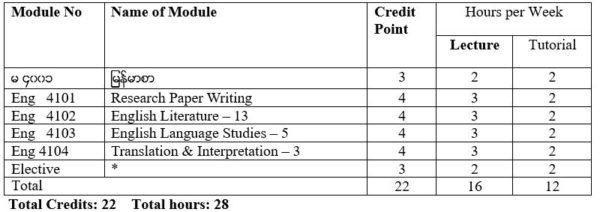
Foundation Course
မ ၄၀၀၁ ျမန္မာစာ
Core Courses
Eng 4101 Research Paper Writing
Eng 4102 English Literature – 13 (19th Century Short Stories and The Novel)
Eng 4103 English Language Studies – 5 (Syntactic Theory – 2 and Introduction to Semantics)
Eng 4104 Translation and Interpretation – 3
Elective Courses (for English Specialisation)
Eng 4105 ASEAN Literature in English – 1
Eng 4106 Communicative Skills – 7
Eng 4107 Business English – 3
Eng 4108 English Language Teaching – 1
* An English specialisation student will have to take one elective.
Eng 4101: Research Paper Writing
Course description
This module is designed to enable students to discover different and essential steps in writing a research paper. It aims at developing students’ skills in writing research papers. It familiarizes students with basic format of a research paper. It enhances students’ understanding of the different approaches to research studies, making decisions on the appropriate approach to any research they undertake. It also helps the students to develop sound techniques and good practice which will serve them well in future research projects. It focuses on writing a research paper systematically with the correct format. It also enables students to find relevant references, to take notes, to develop a reference list and to indicate sources. This module provides students with language convention, instruction and practice. Moreover, this module helps students to write research proposal, literature reviews, summaries, abstract, and especially theses and dissertations.
Learning Outcomes
At the end of the module, students will be able to:
Assessment
Assessment will be done through tutorials and classwork (30%) and the final examination (70%). For the tutorials and classwork (30%) students have to:
Prescribed Coursebook
Weissberg, Robert & Buker, Suzanna (1990) Writing Up Research. NJ: Prentice Hall Regents.
Lionel Menasche (1997) Writing a Research Paper (Revised Edition). University of Michigan.
References
Bell, J. (1999) Doing Your Research Project. Buckingham, Open University Press. (Pages of Check List)
Renandua, W. (-) Qualitative and Quantitative Research in Applied Linguistics. Singapore, RELC.
Shepherd, J.F. (1982) The Houghton Mifflin Study Skills Handbook. Boston, Houghton Mifflin Company. (Pages 290- 311, 362-396).
Sweals, J.M. & Feak, C.B. (1994) Academic Writing for Graduate Students. Ann Arbor, The University of Michigan Press. (pages 131-217)
Sweals, J.M. & Feak, C.B. (2000) English in Today’s Research World: A Writing Guide. Ann Arbor, The University of Michigan Press. (Pages 114-147 Chapter 4)
Eng 4102: English Literature – 13 (19th Century Short Stories & The Novel)
Course description
This module offers students a selection of the 19th century short stories and the novel with particular attention to famous authors such as Leo Tolstoy, Mark Twain, Edgar Allan Poe and Jane Austen. It centers on the critical reading of the selected short stories, enabling students to develop conceptual learning and the critical thinking skills.
This module also deals with the evolution of the nineteenth-century novels through a consideration of the British novel’s historical, literary-historical and critical contexts. It introduces the disruptive pressure of increasingly powerful women and the intensifying pull of the past, which becomes more difficult to resist as modernity takes shape. This module focuses on the works concerned with social comedy and satire of the period, the 19th century. It concentrates on the works of Oscar Wilde, Jane Austen, Emily Bronte, Thomas Hardy, etc.
Short Stories
Novel
Pride and Prejudice Jane Austen (1775-1817)
Learning Outcomes
At the end of studying this module, students will be able to:
Assessment
Students will be assessed through the final examination (80%) and class work, 20 % of total mark, which counts on students’ regular attendance, their active participation in class activities, completion of the assignments and group works, and presentation of their findings.
References for Short Stories
Choo, S & Yeo, R (2013). Mining for Meaning. Learners Publishing Private Limited.
Dolley, C. (1967). The Penguin Book of English Short Stories. Great Britain: Penguin Books Ltd.
Konigsberg, I. (1971) The Classic Short Story. U.S.A.: Harper and Row Inc.
Mizener, A. (1967). Modern Short Stories: The Uses of Imagination. U.S.A.: Norton & Company, Inc.
Chin, B. A. et. al. (2002). Glencoe Literature: The Reader’s Choice. U.S.A.: The McGraw-Hill Companies.
Ridout, A. K. & Stuart, J. (1968). Short Stories for Discussion. New York: Charles Scribner’s Sons.
References for The Novel
Alexander, Michael (2000) A History of English Literature. Macmillan. London
Drew, Elizabeth. (1967) The Novel: A Modern Guide to Fifteen English Masterpieces. Dell Publishing Co. Inc.
Lass, Abraham H. Ed. (1966) A Student’s Guide to 50 British Novels. Washington Square Press, Inc. New York.
Pickering, H. James, & Hoeper, D. Jeffrey. (1982) Literature. Macmillan Publishing Company. New York.
Eng 4103: English Language Studies – 5 (Syntactic Theory & Introduction to Semantics)
Course Description
This module will look at the behaviour of reflexives and reciprocals (known as anaphora) within P&P and PSG frameworks. It will also familiarize students with a variety of sentence types which involve either Noncanonical complements or subjects and canonical complements or subjects and they will be analysed through the monostratal approach (PSG) and multistratal approach (P&P). Moreover, it is also concerned with the notions of subject and object and how they are defined within the frameworks of Lexical Functional Grammar (LFG), Relational Grammar (RG) and Transformational Grammar (TG). Moreover, this module also introduces the area of Semantics which includes the meaning of Semantics, lexical and grammatical meaning, and different semantic theories.
Learning outcomes
At the end of the module, students will be able to:
Assessment
Throughout the course, students will be given 3 tutorials, a group presentation, 3 formal written assignments for classroom-based assessment. There is the final examination at the end of the semester. Mark allocation is 20% for classroom assessment and 80% for the semester-end examination.
Prescribed text:
Borsley, R. (1999). Syntactic Theory: A Unified Approach. London: Aronold. Chapter 7 – 9 (Pg. 96 – 134)
Thomas, W. Stewart, Jr. & Vaillette, N. (eds) (2001). Language Files. Columbus: The Ohio State University Press. Chapter 6 & 7
References
Borsley, R. (1999). Syntactic Theory: A Unified Approach. London: Aronold.
Burton-Roberts, N. (2016). Analysing Sentences: An Introduction to English Syntax. New York: Routledge.
Finegan, E. (2015). Language: Its Structure and Use. University of Southerrn California: CENGAGE. (Chapter 5: Syntax, Chapter 6: Semantics)
Dawson, H. C. & Phelm, M. (2016). Language Files 12: Materials for an Introduction to Language and Linguistics. Columbus: The Ohio State University Press. (Chapter 5 & 6)
Eng 4104: Translation and Interpretation – 3
Course Description
This module focuses on the methods and procedures of translation and interpretation. It imparts the knowledge of strategies of translation and interpretation. Regarding translation, this module trains students to be able to translate texts of various types from source language to target language efficiently at various levels of language. Regarding interpretation, students are trained to interpret different genres of speeches: authentic speeches made by public figures from the local and international arenas. With a special focus on skills development, this module will equip final year BA (English) students with translation and interpretation skills, which are and will be in great demand on the job market now and in the future.
Part A: Translation
Part B: Interpretation
Learning Outcomes
At the end of the course, the students will be able to:
Assessment
This module will be assessed through a combination of class-based assessment (which counts 20% of total marks) which includes class and group discussions, formal written assignments, a group project presentation and a final examination (80%).
Students will be able to demonstrate the completion of learning outcomes by:
References
Baker, Mona (1992) In Other Words: A Course book on Translation. Routledge.
Carford. J.C (1965) A Linguistic Theory of Translation. OUP.
Dollerup, C & Anne Loddegoard (1992) Teaching Translation and Interpreting: Training, Talent and Experience. Papers from the First Language International Conference, Elsinmore, Denmark, 31 May – 2 June 1991 (Copenhagen Studies in Translation)” John Benjamins B.V
Munday, J (2001) Introducing Translation Studies Routledge.
Newmark, P (1988) A Textbook of Translation. Prentice Hall International (UK) Ltd.
Newmark, P (1993) Paragraphs on Translation. Longman.
Win Pe, U, et al., (2008) Translators’ Reference.Volume I. Shwe Pyi Taw Press
Eng 4105: ASEAN Literature in English – 1
Course Description
This module introduces ASEAN Literature in English to students and provides them with knowledge of ASEAN culture and a firm foundation of approaches to literary studies. The focus is on the different genres of literary works written by authors from ASEAN countries. In this module, students have to study several pieces of ASEAN literature that cover a wide range of socio-cultural aspects in Southeast Asian countries such as people, family ties and values, growing up, festivals, and so on. It helps students to gain a critical appreciation of the writer’s craft through close textual study. It also enhances students’ exploration of themes, characterization, setting, plot and point of view of literary texts.
Learning Outcomes
At the end of this module, students will be able to:
Assessment
Assessment will be done through tutorials and classwork (20%) and the final examination (80%). For the tutorials and classwork (20%) students have to:
References
Gill, Richard (2002) Mastering English Literature. Third Edition. Palgrave Master Series.
Hoeper, Jeffrey D. & Pickering, J. H. (1986)Literature. Second Edition. Macmillan Publishing Co. New York.
Salleh, Muhammad Haji (ed) (1997) Stories from South East Asia. Yayasan Penataran Ilmu.
Toh, Glenn (1999) Voices of Southeast Asia: An Anthology of Southeast Asian Short Stories. Singapore :SEMEO Regional Language Centre.
Websites
http://literatureofthephilippines.blogspot.com/2011/09/mats-by-francisco-arcellana.html
http://www.vietnamwebsite.net/story/story18.htm
http://www.textetc.com/criticism.html
http://pages.prodigy.net/manila_girl/rizal
Eng 4106: Communicative Skills – 7
Course Description
This Module aims at developing students’ language proficiency, communication skills and study skills. It introduces language items in authentic and semi-authentic engaging reading and listening texts. It also exposes students to different styles of written texts. The lessons will be conducted in communicative language teaching and deductive approach to present grammar and vocabulary items. Engaging activities will be given to make students practise the language structure, vocabulary and grammar rules in a variety of meaningful contexts to develop their reading, writing, speaking, pronunciation and writing skills.
Learning Outcomes
After the course, students will be able to:
Assessment
Assessment will be done through tutorials and classwork (20%) and the final examination (80%). For the tutorials and classwork (20%) students have to:
Prescribed Text
Cotton, D., Falvey, D. & Kent, S. (2014). New Language Leader 4: Coursebook. Pearson Education Limited.
MyEnglishLab: english.com/activate
References
Acklam, R.& Crace, A. (2008) Total English, Upper Intermediate, Students’ Book. London: Pearson Longman.
Clandfield, L (2010) Global. Level 4 Course book, T’s book, Work book, Macmillan Publishing House.
Clare, A.& Wilson, J. J. (2008) Total English, Upper Intermediate, Work Book. London: Pearson Longman.
Harris, M. et al. (2006) New Opportunities, Intermediate, Students’ Book. London: Longman.
Naughton, D. (2008) Total English, Upper Intermediate, Teacher’s Resource Book. London: Pearson Longman.
Dean, M. et al. (2006) New Opportunities, Intermediate, Teacher Book. London: Pearson Education Ltd.
Eng 4107: Business English – 3
Course Description
This module aims to develop students’ presentation and communication skills to be better able to communicate in a business environment. It enhances students’ exposure to English used in business context, bringing the real world of international business into the language-teaching classroom with topic-based units. Authentic reading texts, listening materials and specially-filmed interviews with business practitioners are included in each unit.
This module is designed to help students to prepare for a career in business and to develop their English communication skills especially in business contexts. Moreover, this module also tries to widen students’ knowledge of different business fields.
Learning Outcomes
At the end of the module students will be able to:
Assessment
Students will be assessed through classroom-based assessment (20%) and a final examination (80%). Classroom-based assessment includes the following:
Coursebook
Cotton, David .et al. (2011) Market Leader (Upper Intermediate), 3th Edition. England, Pearson Education Limited.
References
Learning resources including websites and video are included according to the topics.
Eng 4108: English Language Teaching – 1
Course Description
This module introduces theoretical background to the practice of English language teaching. Moreover, it provides methodologies for developing the language skills: receptive and productive skills. It also deals with classroom management and tackling the problem behaviour of learners.
Learning outcomes
At the end of the module, students will be able to:
Assessment
Assessment will be done through the following modes:
Students will be able to demonstrate the achievement of learning outcomes by:
Reference:
Edwards, C & Willis, J. (2005) Teachers Exploring Tasks in English Language Teaching. New York: Palgrave Macmillan
Harmer, J (1998) The Practice of English Language Teaching. London: Longman group Ltd.
Celce-Murcia, M. (2001) Teaching English as a Second and Foreign Language. UK: Heinle & Heinle.
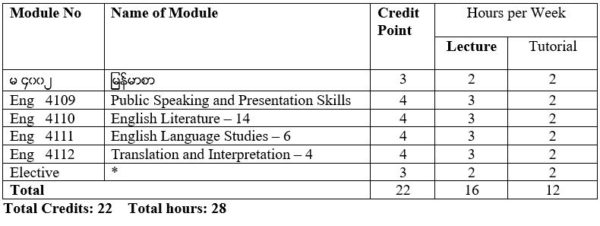
Foundation Course
မ ၄၀၀၂ ျမန္မာစာ
Core Courses
Eng 4109 Public Speaking and Presentation Skills
Eng 4110 English Literature – 14 (17th and 18th Century Poetry and Drama)
Eng 4111 English Language Studies – 6 (Syntactic Theory – 3 and Introduction to Discourse Analysis)
Eng 4112 Translation and Interpretation – 4
Elective Courses (for English Specialisation)
Eng 4113 ASEAN Literature in English – 2
Eng 4114 Communicative Skills – 8
Eng 4115 Business English – 4
Eng 4116 English Language Teaching – 2
* An English specialisation student will have to take one elective.
* It is compulsory for all students to submit term papers at the end of the semester.
Eng 4109: Public Speaking and Presentation Skills
Course description
This module enables students to speak clearly and confidently in different situations – in classrooms, in workplaces and in communities. It enables students to identify the elements of speech communication process and prepare an organized speech. It aims at developing students’ oral communication skills (speaking and listening) and written communication skills (reading and writing). It presents principles with applications emphasizing audience-centred communication so that students can learn how to talk to and with them and not at them. This module also provides students with key skills for effective presentation such as useful language expressions, voice and delivery, rhetorical techniques, question handling and visual preparation.
Learning outcomes
At the end of the module, students will be able to:
Assessment will be done through the following modes:
Students will be able to demonstrate the achievement of learning outcomes by:
Prescribed Coursebook
Hamilton Gregory (2018) Public Speaking for College and Career (11th Ed.). McGraw-Hill
Malcolm Goodale (1998) Professional Presentations. CUP.
References
Gregory, H. (1999) Public Speaking (fifth Edition) McGraw- Hill
Powell, M. (2002) Presenting in English Thomson Heinle
Eng 4110: English Literature – 14 (17th& 18th Century Poetry & Drama)
Course Description
This module deals with the study of a rich variety of theme-based selections of English poetry, which are presumably representative of 17th and 18th century. Students, making an academic pursuit of English poetry over the past centuries, are able to get a broad perspective of how English poetry had developed over the centuries, as well as of how the poetic language in English had changed. This module also introduces students to outstanding literary piece of English Drama written before 1660. It explores the major literary genres of that period, as well as the socio-cultural contexts in which they were produced. It also examines how literary texts articulate changes in language and form, as well as in concepts of family, nation, and community during the medieval period. It deals with the creation of such gifted authors as William Congreve, and – supremely– Shakespeare. It will cover the publication of Shakespeare’s comedies which mark the apex of Renaissance literature.
Learning Outcomes
At the end of the module, students will be able to:
Assessment
Assessment will be done through the following modes:
Students will be able to demonstrate the achievement of learning outcomes by:
References
17th& 18th Century Poetry
References for Poetry
Abrams, M. H. (1986) The Norton Anthology of English Literature. Vol. 1. USA: Norton and Company, Inc.
Hewett, R. P. (1984) A Choice of Poets: An Anthology of Poets from Wordsworth to the present day. UK: Nelson House.
Hoeper, Jeffrey D & James H. Pickering (1990) Poetry: An Introduction. USA: Macmillan Publishing Company.
Peacock, W (1963) English Verse. Vol. V. Oxford: OUP
Pickering, James H. & Jeffrey D Hoeper (1986) Literature. USA: Macmillan Publishing Company.
Ward, Thomas Humphry (1883) The English Poets. Vol. IV. London: Macmillan and Co.
Weekes, A. R (year not mentioned) The Odes of John Keats. London: University Tutorial Press Ltd.
Wilkie, Brian & James Hurt (1998) Literature of the Western World. Vol. I. USA: Macmillan Publishing Company.
Wollman, Maurice (1948) Poems of Twenty Years: An Anthology. London: Macmillan and Co.
Drama
The Tempest William Shakespeare
References for Drama
Abrams, M. H. (1986) The Norton Anthology of English Literature. Norton & Com. Inc.
Alexander, Michael (2000) A History of English Literature. Macmillan Press Ltd.
Allison, Alexander W. et al. (1986) Masterpieces of Drama. Macmillan Publishing Co.
Pickering, James H. & Jeffrey D Hoeper (1986) Literature. USA: Macmillan Publishing Company.
Eng 4111: English Language Studies – 6 (Syntactic Theory & Introduction to Discourse Analysis)
Course Description
This module familiarizes students with the analysis of raising and control sentences using the classical transformational approach and P&P approach. It also discusses the main differences and the relation between P & P and PSG. Moreover, in this module, students will be provided with the definition of discourse, discourse versus text, types of discourse, interpreting discourse, linguistic elements in discourse such as cohesion, coherence, and conversation analysis.
Learning outcomes
At the end of the course, students will be able to:
Assessment
Assessment will be done through the following modes:
Students will be able to demonstrate the achievement of learning outcomes by:
Prescribed texts:
Borsley, R. (1999). Syntactic Theory: A Unified Approach. London: Aronold. Chapter 11- 15 (Pg. 157 – 244)
McCarthy, Michael (1991) Discourse Analysis for Language Teachers. Cambridge Language Teaching Library. Glasgow: CPU (Page 5 – 32)
References
Burton-Roberts, N. (2016). Analysing Sentences: An Introduction to English Syntax. New York: Routledge.
Dawson, H. C. & Phelm, M. (2016). Language Files 12: Materials for an Introduction to Language and Linguistics. Columbus: The Ohio State University Press. (Chapter 5: Syntax).
Finegan, E. (2015). Language: Its Structure and Use. University of Southerrn California: CENGAGE. (Chapter 5, The Structure and Function of Phrases and Sentences: Syntax).
Nunan, D. (1993) Introducing Discourse Analysis. London: The Penguin Group Ltd.
Richards, J. C. (2015). Key Issues in Language Teaching. UK: Cambridge University Press. (Chapter 16: Discourse Analysis).
Thornbury, S. (2005). Beyond the Sentence: Introducing discourse analysis. Oxford: Macmillan Publishers Limited. (Chapter 3, What makes a text make sense ? & Chapter 4, Spoken text).
Eng 4112: Translation and Interpretation – 4
Course Description
This module focuses on the methods and procedures of translation and interpretation. It imparts the knowledge of strategies of translation and interpretation. Regarding translation, this module trains students to be able to translate texts of various types from SL to TL efficiently at various levels of language. Regarding interpretation, students are trained to interpret different genres of speeches: authentic speeches made by public figures from the local and international arenas. With a special focus on skills development, this module will equip final year EPP students with translation and interpretation skills, which are and will be in great demand on the job market now and in the future.
Learning Outcomes
At the end of the course, the students will be able to:
Assessment
Assessment will be done through the following modes:
Students will be able to demonstrate the achievement of learning outcomes by:
References
Baker, Mona (1992) In Other Words: A Course book on Translation., Routledge.
Carford. J.C (1965) A Linguistic Theory of Translation. OUP.
Gile, D. (2009) Basic concepts and models for interpreters and translator training. John Benjamins Publishing Company. Denmark.
Munday, J (2001) Introducing Translation Studies Routledge.
Newmark, P (1988) A Textbook of Translation Prentice Hall International (UK) Ltd
Newmark, P (1993) Paragraphs on Translation. Longman.
Win Pe, U, et al., (2008) Translators’ Reference. Volume II. Shwe Pyi Taw Press.
Eng 4113: ASEAN Literature in English – 2
Course Description
This module introduces students to the study of ASEAN Literature in English and provides them with the knowledge of ASEAN culture and a firm foundation of approaches to literary study. The focus is on the different genres of literary works from ASEAN countries. This module covers a wide range of socio-cultural aspects in South East Asia countries such as people, family ties and values, growing up, festivals, and so on. It helps students to gain a critical appreciation of the writer’s craft through close textual study and through social aspects. It also enhances students’ exploration of themes, characterization, setting, plot and point of view.
Learning Outcomes
At the end of the course, the students will be able to:
Assessment
Assessment will be done through the following modes:
Students will be able to demonstrate the achievement of learning outcomes by:
References
Gill, Richard (2002) Mastering English Literature. Third Edition. Palgrave Master Series.
Hoeper, Jeffrey D. & Pickering, J. H. (1986) Literature. Second Edition. New York: Macmillan Publishing Co.
Salleh, Muhammad Haji (ed) (1997) Stories from South East Asia. Yayasan Penataran Ilmu.
Toh, Glenn (1999) Voices of Southeast Asia: An Anthology of Southeast Asian Short Stories. Singapore: SEMEO Regional Language Centre.
Websites
http://literatureofthephilippines.blogspot.com/2011/09/mats-by-francisco-arcellana.html
http://www.vietnamwebsite.net/story/story18.htm
http://www.textetc.com/criticism.html
http://pages.prodigy.net/manila_girl/rizal
Eng 4114: Communicative Skills – 8
Course Description
This Module aims at developing students language skills, communicative skills and study skills. It introduces language items in authentic and semi-authentic engaging reading and listening texts. It also exposes students to different styles of written texts. The lessons will be conducted in communicative language teaching and deductive approach to present grammar and vocabulary items. Engaging activities will be given to make students practise the language structure, vocabulary and grammar rules in a variety of meaningful contexts to develop their reading, writing, speaking, pronunciation and writing skills.
Learning Outcomes
After the course, students will be able to:
Assessment
Assessment will be done through tutorials and classwork (20%) and the final examination (80%). For the tutorials and classwork (20%) students have to:
Prescribed Text
Cotton, D., Falvey, D. & Kent, S. (2014). New Language Leader 4: Coursebook. Pearson Education Limited.
MyEnglishLab: english.com/activate
References
Acklam, R. & Crace, A. (2008) Total English, Upper Intermediate, Students’ Book. London: Pearson Longman.
Clandfield, L (2010) Global. Level 4 Course book, T’s book, Work book, Macmillan Publishing House.
Clare, A.& Wilson, J. J. (2008) Total English, Upper Intermediate, Work Book. London: Pearson Longman.
Harris, M. et al. (2006) New Opportunities, Intermediate, Students’ Book. London: Longman.
Naughton, D. (2008) Total English, Upper Intermediate, Teacher’s Resource Book. London: Pearson Longman.
Dean, M. et al. (2006) New Opportunities, Intermediate, Teacher Book. London: Pearson Education Ltd.
Eng 4115: Business English 4
Course Description
This module aims to develop students’ presentation and communication skills to be better able to communicate in a business environment. It enhances students’ exposure to English used in business context, bringing the real world of international business into the language-teaching classroom with topic-based units. Authentic reading texts, listening material and specially-filmed interviews with business practitioners are included in each unit.
This module is designed to help students to prepare for a career in business and to develop their English communication skills especially in business contexts. Moreover, this module also tries to widen students’ knowledge of different business fields.
Learning Outcomes
At the end of the module students will be able to:
Assessment
Students will be assessed through classroom-based assessment (20%) and a final examination (80%). Classroom-based assessment includes the following:
Cotton, D. et al. (2011) Market Leader (Upper Intermediate), 3th Edition. England, Pearson Education Limited.
References
Mascull, B. (2002) Business Vocabulary in Use. CUP.
Naunton, J. (2005) Profile 2Intermediate,Oxford Business English. OUP.
Learning resources including websites and video are included according to the topics.
Eng 4116: English Language Teaching – 2
Course Description
This module introduces theoretical background to the practice of English language teaching. Moreover, it provides methodologies for developing the language skills: receptive and productive skills. It also deals with classroom management and tackling the problem behaviour of learners.
Learning outcomes
At the end of the module, students will be able to:
Assessment
Assessment will be done through the following modes:
Students will be able to demonstrate the achievement of learning outcomes by:
References
Edwards, C. & Willis, J. (2005) Teachers Exploring Tasks in English Language Teaching. New York: Palgrave Macmillan
Harmer, J. (1998) The Practice of English Language Teaching. London: Longman group Ltd.
Celce-Murcia, M. (2001) Teaching English as a Second and Foreign Language. UK: Heinle & Heinle.
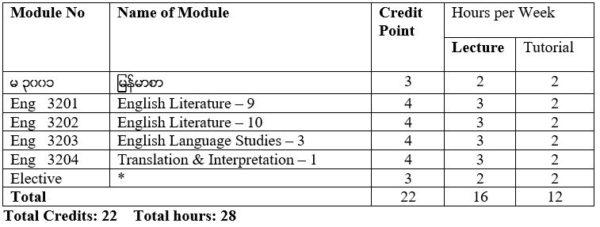
Foundation Course
မ ၃၀၀၁ ျမန္မာစာ
Core Courses
Eng 3201 English Literature – 9 (19th and 20th Century Short Stories and The Novel)
Eng 3202 English Literature – 10 (18th and 19th Century Poetry and Drama)
Eng 3203 English Language Studies –3 (Morphology)
Eng 3204 Translation and Interpretation – 1
Elective Courses (for English Specialisation)
Eng 3205 Communicative Skills – 5
Eng 3206 Business English – 1
Eng 3207 Introducing ELT Methodology– 1
* An English specialisation student will have to take one elective.
Eng 3201: English Literature – 9 (19th & 20th century Short Stories & The Novel)
Course Description
This module includes a selection of the 19th and 20th century English short stories and novel. Setting, plot, characterization, literary devices, climax, point of view, theme, symbols, conflicts, and development of the story are the focus in studying short stories. This module will enhance the students’ ability to arrive at the correct interpretation of the writer’s message and to appreciate literature from different points of view.
The novels in the 19th and 20thcenturies are particularly engaged with the events, circumstances, beliefs and attitudes of their time. It concentrates on a critical study of works by the centuries’ major literary figures like Katherine Mansfield, Graham Greene, George Orwell, etc. The focus is on understanding the role of the novel in representing life and people and exploring socio-cultural changes, the flexibility of the genre and how it developed aesthetically, stylistically and structurally. This module also expands literary vocabulary, exercise critical reading and writing skills and comfort important themes suggested by the literature.
19th& 20th Century (Short Stories)
19th& 20th Century (The Novel)
Learning Outcomes
At the end of the module, students will be able to:
Assessment
There are six assignments / presentations (individual and group work) that make up 20%, and the final closed book written examination of 80%. The assignments / presentations are based on the materials covered in class.
Students will be able to demonstrate the achievement of learning outcomes by:
References for Short Stories
Dolley, C. (1967). The Penguin Book of English Short Stories. Great Britain: Penguin Books Ltd.
Konigsberg, I. (1971) The Classic Short Story. U.S.A.: Harper and Row Inc.
Mizener, A. (1967). Modern Short Stories: The Uses of Imagination. U.S.A.: Norton & Company, Inc.
Chin, B. A. et. al. (2002). Glencoe Literature: The Reader’s Choice. U.S.A.: The McGraw-Hill Companies.
Ridout, A. K. & Stuart, J. (1968). Short Stories for Discussion. New York: Charles Scribner’s Sons.
References for The Novel
Alexander, Michael (2000) A History of English Literature. Macmillan. London
Drew, Elizabeth. (1967) The Novel: A Modern Guide to Fifteen English Masterpieces. Dell Publishing Co. Inc.
Lass, Abraham H. Ed. (1966) A Student’s Guide to 50 British Novels. Washington Square Press, Inc. New York.
Pickering, H. James, & Hoeper, D. Jeffrey. (1982) Literature. Macmillan Publishing Company. New York.
Eng-3202 English Literature –10 (19th & 20th Century Poetry & Drama)
Course Description
This module deals with the study of poems and a play which are representative of 19th and 20th century poetry and drama. Studying selected English poems enables students to extend their knowledge of English poetry that they have already garnered in their academic pursuit. While pursuing the scholarly studies in English poetry, students simultaneously perceive the development of English poetry over the centuries. This module also engages students to learn a farcical comedy of Oscar Wilde, a famous Irish playwright. Through Wilde’s popular Victorian drama, students observe Wilde’s trademarks ‘satiric epigrams, paradoxes and puns’. It is Wilde’s popular work that represents the finest literature in the English language written during the 19th century and questions Victorian social values and norms. Moreover, how nineteenth-century intellectuals think through the relationship between dramatic form and the social world, and how nineteenth-century drama mobilizes new images of gender and the family can be learned through Wilde’s famous drama.
Learning Outcomes
At the end of the course, students will be able to:
recognize and explain the elements of poetry and drama through selected literary texts
Assessment
Class discussions during the lectures – 5%: Active engagement of students in class discussion is requested. Their active participation will be highly appreciated or graded.
Attendance – 5%: Students are to attend all lectures and their attendance will be one of the criteria in assessment.
Written Assignment – 5% of the grade is for written tasks assigned for the respective poems or acts in the play. Students are asked to work in groups so that they can learn from each other by sharing their own ideas in groups.
Presentation – 5%: 5% of the grade is allotted for students’ group presentation on the assigned tasks. In assessing group presentation, three-fold group assessment will be carried out. The teacher gives a grade to the group’s final product, group members give a grade to each other, and each group member gives a grade to him/herself, and justifies it. Every student’s grade is then a combination of: the teacher’s grade, average of peer grades, and self-assigned grades.
Exam – 80%: The grade is for students’ achievement in the final exam.
References for Poetry
Abrams, M. H. (1986) The Norton Anthology of English Literature. Vol. 1. USA: Norton and Company, Inc.
Hewett, R. P. (1984) A Choice of Poets: An Anthology of Poets from Wordsworth to the Present Day. UK: Nelson House.
Hoeper, Jeffrey D & James H. Pickering (1990) Poetry: An Introduction. USA: Macmillan Publishing Company.
Kloeppel, L. A Teacher’s Guide to ‘The Importance of Being Earnest and Other Plays’. The Signet Classic Edition.
Pickering, James H. & Jeffrey D Hoeper (1986) Literature. USA: Macmillan Publishing Company.
Wilkie, Brian & James Hurt (1998) Literature of the Western World. Vol. I. USA: Macmillan Publishing Company.
References for Drama
Abrams, M. H. (1986) The Norton Anthology of English Literature. Norton & Com. Inc
Alexander, M (2000) A History of English Literature. Macmillan Press Ltd.
Allison, Alexander W. et al. (1986) Masterpieces of Drama. Macmillan Publishing Co.
Pickering, James H. & Jeffrey D Hoeper (1986) Literature. USA: Macmillan Publishing Company.
Eng 3203: English Language Studies – 3 (Morphology)
Course Description
This module acquaints learners of English with some background concepts of words and rules of word formation. Moreover, it also deals with morphemes: free and bound morphemes, lexical and functional morphemes, inflectional versus derivational morphology, and morphological analysis. The objective of this module is to provide an introduction to major concepts in the study of morphology and discusses its place within linguistic theory.
Morphology
Learning Outcomes
At the end of the module, students will be able to:
Assessment
Assessment will be done through a combination of tutorial-based assessment: quizzes, group presentations, individual/group assignments (20%) and a final closed book examination (80%).
Students will be able to demonstrate the achievement of learning outcomes by:
References
Akmajan, A. et al. (2001). Linguistics: An Introduction to Language and Communication. Chapter 2
Fromkin, V. Rodman, R. & Hyams, N. (2003). An Introduction to Language. Heinle. Chapter 2
Thomas, W. Stewart, Jr. & Vaillette, N. (eds). Language Files. Columbus: The Ohio State University Press. File 5
Eng 3204: Translation and Interpretation – 1
Course Description
This module deals with the theoretical aspect of translation and translation studies, the background history of translation, general types of translation, features of a good translation, and directives by different translators. It trains students to apply their theoretical knowledge to the practice of translation. It also focuses on conceptual bases required to understand both the principles and recurrent issues and difficulties in professional translation and interpreting.
Learning Outcomes
At the end of the module, students will be able to:
Assessment
Assessment will be done through a combination of tutorial-based assessment, class and group discussions and formal written assignments and a final closed book written examination.
Students will be able to demonstrate the achievement of learning outcomes by:
References
Baker, Mona (1992) In Other Words: A Course book on Translation. Routledge.
Carford. J.C (1965) A Linguistic Theory of Translation. OUP.
Gile, D. (2009) Basic Concepts and Models for Interpreters and Translator Training. John Benjamins Publishing Company. Denmark.
Munday, J (2001) Introducing Translation Studies Routledge.
Newmark, P (1988) A Textbook of Translation. Prentice Hall International (UK) Ltd.
Newmark, P (1993) Paragraphs on Translation. Longman.
Win Pe, U, et al., (2008) Translators’ Reference.Volume I. Shwe Pyi Taw Press
Eng 3205: Communicative Skills – 5
Course Description
This Module aims at developing students’ language proficiency, communicative skills and study skills. It introduces language items in authentic and semi-authentic engaging reading and listening texts. It also exposes students to different styles of written texts. Engaging activities will be given to make students practise the language structure, vocabulary and grammar rules in a variety of meaningful contexts to develop their reading, writing, speaking, pronunciation and writing skills with strong emphasis on the area of critical thinking skills. This module enables students to express their ideas and develop their communicative abilities through its engaging content and systematic skills work.
Learning Outcomes
After the course, students will be able to:
Assessment
Assessment will be done through a combination of tutorial-based assessment, class and group discussion, formal written assignments, presentations and a final examination.
Students will be able to demonstrate the completion of learning outcomes by:
Prescribed Coursebook
Clandfield, L (2010) Global. Level 3 Course book, T’s book, Work book), Macmillan Publishing House.
References
Acklam, R.& Crace, A. (2008) Total English, Upper Intermediate, Students’ Book. London: Pearson Longman.
Clare, A.& Wilson, J. J. (2008) Total English, Upper Intermediate, Work Book. London: Pearson Longman.
Naughton, D. (2008) Total English, Upper Intermediate, Teacher’s Resource Book. London: Pearson Longman.
Harris, M. et al. (2006) New Opportunities, Pre-intermediate, Students’ Book. London: Longman.
Dean, M. et al. (2006) New Opportunities, Pre-intermediate, Teacher Book. London: Pearson Education Ltd.
Eng 3206 Business English – 1
Course Description
This module covers all the four language learning skills, grammar points and vocabulary that are used in business communication. It also focuses on different areas of business that closely reflect business undertakings. It aims to develop students’ spoken and written English, enabling them to use it accurately and appropriately. The course provides updated content and a significantly enhanced range of authentic resource material, reflecting the latest trends in the business world.
Learning Outcomes
At the end of the course, students will be able to
Assessment
Exam 80 marks + Tutorial 20 marks
There will be at least 5 tutorials for each semester. Group presentations, role plays, group or individual assignments will also be counted as tutorial.
Students will be able to demonstrate the achievement of learning outcomes by:
Prescribed Coursebook
Market Leader (Intermediate Business English Course Book, 3rd Edition), David Cotton, David Falvey & Simon Kent, Pearson Longman Press
References
Mascull, Bill (2002) Business Vocabulary in Use. CUP.
Naunton, Jon (2005) Profile 1Pre-intermediate, Oxford Business English. OUP.
Eng 3207: Introducing ELT Methodology – 1
Course description
This module introduces the theoretical background to the practice of English language teaching. It also aims to develop students’ awareness of learner differences and its importance in language teaching, different roles of teacher and different teaching methods that are helpful in the realization of teaching methodology.
Learning Outcomes
At the end of the module, students will be able to:
1) classify learners according to their age;
2) analyse learners based on learner differences such as aptitude, learning styles, language levels, motivation, etc.;
3) identify teacher’s roles in language teaching;
4) determine the appropriate teaching methods.
Assessment
Assessment will be done through the following modes:
Students will be able to demonstrate the achievement of learning outcomes by:
References
Harmer, J (1998) The Practice of English Language Teaching. Longman group Ltd. Pg 37 -197.
Edwards, C & Willis, J. (2005) Teachers Exploring Tasks in English Language Teaching. New York: Palgrave Macmillan
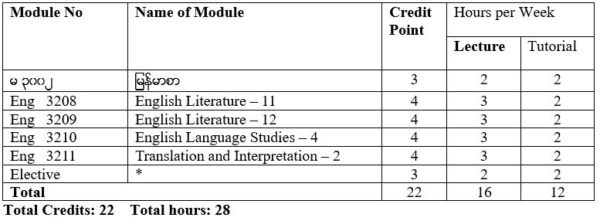
Foundation Course
မ ၃၀၀၂ ျမန္မာစာ
Core Courses
Eng 3208 English Literature – 11 (19th and 20th Century Short Stories and The Novel)
Eng 3209 English Literature – 12 (18th and 19th Century Poetry and Drama)
Eng 3210 English Language Studies – 4 (Syntactic Theory – 1)
Eng 3211 Translation and Interpretation – 2
Elective Courses (for English Specialisation)
Eng 3212 Communicative Skills – 6
Eng 3213 Business English – 2
Eng 3214 Introducing ELT Methodology – 2
* An English specialisation student will have to take one elective.
Eng 3208: English Literature – 11 (19th & 20th century Short Stories & The Novel)
Course Description
This module includes a selection of the 19th and 20th century English short stories and novel. Short stories are studied with particular attention to setting, plot, characterization, literary devices, climax, point of view, theme, symbols, conflicts, and development of the story. This module will enhance the students’ ability to arrive at the correct interpretation of the writer’s message and to appreciate literature from different points of view.
This module deals with the novel in the 19th and 20thcenturies which were particularly engaged with the events, circumstances, beliefs and attitudes of their time. It concentrates on a critical study of works by the centuries’ major literary figures like RK Narayan, H.G.Wells, Harper Lee,
etc. The focus is on the role of the novel in representing life and people and exploring social and cultural changes, the flexibility of the genre and how it developed aesthetically, stylistically and structurally. This module also expands literary vocabulary, exercise critical reading and writing skills and comfort important themes suggested by the literature.
19th& 20th Century (Short Stories)
19th& 20th Century (The Novel)
To Kill a Mockingbird Harper Lee
Learning Outcomes
At the end of the module, students will be able to:
Assessment
There are six assignments / presentations (individual and group work) that make up 20% and the other 80% goes to the completion of the final closed book written examination of this course. The assignments / presentations are related to the material covered in class.
Students will be able to demonstrate the achievement of learning outcomes by:
References for Short Stories
Dolley, C. (1967). The Penguin Book of English Short Stories. Great Britain: Penguin Books Ltd.
Konigsberg, I. (1971) The Classic Short Story. U.S.A.: Harper and Row Inc.
Mizener, A. (1967). Modern Short Stories: The Uses of Imagination. U.S.A.: Norton & Company, Inc.
Chin, B. A. et. al. (2002). Glencoe Literature: The Reader’s Choice. U.S.A.: The McGraw-Hill Companies.
Ridout, A. K. & Stuart, J. (1968). Short Stories for Discussion. New York: Charles Scribner’s Sons.
References for The Novel
Alexander, Michael (2000) A History of English Literature. Macmillan. London
Drew, Elizabeth. (1967) The Novel: A Modern Guide to Fifteen English Masterpieces. Dell Publishing Co. Inc.
Lass, Abraham H. Ed. (1966) A Student’s Guide to 50 British Novels. Washington Square Press, Inc. New York.
Pickering, H. James, & Hoeper, D. Jeffrey. (1982) Literature. Macmillan Publishing Company. New York.
Eng-3109: English Literature – 12 (19th & 20th Century Poetry & Drama)
Course Description
This module deals with the study of poems and a play which are representative of 19th and 20th century poetry and drama. Studying selected 19th century English poems enables students to extend their knowledge of English poetry that they have already garnered in their academic pursuit. While pursuing the scholarly studies in English poetry, students simultaneously perceive the development of English poetry over the centuries. This module also engages students to learn a 20th century modern American tragedy of Arthur Miller, a famous American playwright. Through Miller’s play, students study what he is trying to mean ‘the American Dream’ of his time.
18th& 19th Century Poetry
Drama
Death of A Salesman Arthur Miller
Learning Outcomes
At the end of the course, students will be able to:
Assessment
Class discussions during the lectures – 5%: Active engagement of students in class discussion is requested. Their active participation will be highly appreciated or graded.
Attendance – 5%: Students are to attend all lectures and their attendance will be one of the criteria in assessment.
Written Assignment – 5% of the grade is for written tasks assigned for the respective poems or acts in the play. Students are asked to work in groups so that they can learn from each other by sharing their own ideas in groups.
Presentation – 5%: 5% of the grade is allotted for students’ group presentation on the assigned tasks. In assessing group presentation, three-fold group assessment will be carried out. The teacher gives a grade to the group’s final product, group members give a grade to each other, and each group member gives a grade to him/herself, and justifies it. Every student’s grade is then a combination of: the teacher’s grade, average of peer grades, and self-assigned grades.
Exam – 80%: The grade is for students’ achievement in the final exam.
References for Poetry
Abrams, M. H. (1986) The Norton Anthology of English Literature. Vol. 1. USA: Norton and Company, Inc.
Hewett, R. P. (1984) A Choice of Poets: An Anthology of Poets from Wordsworth to the present day. UK: Nelson House.
Hoeper, Jeffrey D & James H. Pickering (1990) Poetry: An Introduction. USA: Macmillan Publishing Company.
Pickering, James H. & Jeffrey D Hoeper (1986) Literature. USA: Macmillan Publishing Company.
Tetu, R. A Teacher’s Guide to the Arthur Miller’s ‘Death of a Salesman’. The Penguin Edition.
Ward, Thomas Humphry (1883) The English Poets. Vol. IV. London: Macmillan and Co.
Weekes, A. R (year not mentioned) The Odes of John Keats. London: University Tutorial Press Ltd.
Wilkie, Brian & James Hurt (1998) Literature of the Western World. Vol. I. USA: Macmillan Publishing Company.
References for Drama
Abrams, M. H. (1986) The Norton Anthology of English Literature. Norton & Com. Inc
Alexander, Michael (2000) A History of English Literature. Macmillan Press Ltd.
Allison, Alexander W. et al. (1986) Masterpieces of Drama. Macmillan Publishing Co.
Pickering, James H. & Jeffrey, D Hoeper (1986) Literature. USA: Macmillan Publishing Company.
Eng 3210: English Language Studies – 4 (Syntactic Theory – 1)
Course Description
This module concerns preliminaries to syntactic structure such as the goals of syntactic theory, the importance of syntactic theory, introduction to constituent structure, ways of representing constituent structure, investigation of constituent structure and phrasal categories. It also deals with types of syntactic rules, the relation between rules and sentences. Moreover, it also looks at the subcategorization through different approaches such as the Aspects approach, Principles and Parameters (P&P) approach and Phrase Structure Grammar (PSG) approach.
Syntactic Theory – 1
Learning Outcomes
At the end of the module, students will be able to:
Assessment
Assessment will be done through a combination of tutorial-based assessment: quizzes, group presentations, individual/group assignments (20%) and a final closed book examination (80%).
Students will be able to demonstrate the achievement of learning outcomes by:
References
Akmajan, A. et al. (2001). Linguistics: An Introduction to Language and Communication. Chapter 5
Borsley, R. (1999). Syntactic Theory: A Unified Approach. London: Aronold. Chapter 1- 4 (Pg 1- 64)
Fromkin, V. & Rodman, R. (1993). An Introduction to Language. Chapter 3
Thomas, W. Stewart, Jr. & Vaillette, N. (eds). Language Files. Columbus: The Ohio State University Press. File 6
Eng 3211: Translation and Interpretation – 2
Course Description
This module deals with the theoretical aspect of the process of translating and translation procedures. Students will be able to put their theoretical knowledge into practice through the translation of lexis, proper names, idioms and proverbs, abbreviations and acronyms, first at the sentence level, and then at the paragraph level. It also focuses on basic theoretical components in interpreter and translator training, similarities and differences between interpreting and translation.
The concepts of translation
What is translation studies?
A brief History of the Discipline
The Holmes/ Toury ‘map’
Development since the 1970s
Summary
Discussion and Research Points
Introduction
‘Word-for-word’ or ‘Sense-for-sense’
Martin Luther
Faithfulness, spirit and truth
Early attempts at systematic translation theory: Dryden, Dolet and Tytler
Schleiermacher and valorization of the foreign
Translation theory of the nineteenth and early twentieth centuries in Britain
Towards contemporary translation theory
Summary
Discussion and research points
Learning Outcomes
At the end of the module, students will be able to:
Assessment
Assessment will be done through a combination of tutorial-based assessment, class and group discussion and formal written assignments (20%) and a final examination (80%).
Students will be able to demonstrate the completion of learning outcomes by:
References
Baker, Mona (1992) In Other Words: A Course book on Translation. Routledge.
Carford. J.C (1965) A Linguistic Theory of Translation. OUP.
Gile, D. (2009) Basic Concepts and Models for Interpreters and Translator Training. John Benjamins Publishing Company. Denmark.
Munday, J (2001) Introducing Translation Studies Routledge.
Newmark, P (1988) A Textbook of Translation. Prentice Hall International (UK) Ltd.
Newmark, P (1993) Paragraphs on Translation. Longman.
Win Pe, U, et al., (2008) Translators’ Reference.Volume I. Shwe Pyi Taw Press
Eng 3212: Communicative Skills – 6
Course Description
This Module aims at developing students’ language skills, communicative skills and study skills. It introduces language items in authentic and semi-authentic engaging reading and listening texts. It also exposes students to different styles of written texts. Engaging activities will be given to make students practise the language structure, vocabulary and grammar rules in a variety of meaningful contexts to develop their reading, writing, speaking, pronunciation and writing skills with strong emphasis on the area of critical thinking skills. So, this module enables students to express their ideas and develop their communicative abilities through its engaging content and systematic skills work.
Learning Outcomes
After the course, students will be able to:
Assessment
Assessment will be done through a combination of tutorial-based assessment, class and group discussion, formal written assignments, presentations (20%) and a final examination (80%).
Students will be able to demonstrate the completion of learning outcomes by:
Prescribed Coursebook
Clandfield, L (2010) Global. Level 3 Course book, T’s book, Work book, Macmillan Publishing House.
References
Acklam, R.& Crace, A. (2008) Total English, Upper Intermediate, Students’ Book.London: Pearson Longman.
Clare,A.& Wilson,J. J. (2008) Total English, Upper Intermediate, Work Book.London: Pearson Longman.
Naughton,D. (2008) Total English, Upper Intermediate, Teacher’s Resource Book.London: Pearson Longman.
Harris, M. et al. (2006) New Opportunities, Pre-intermediate, Students’ Book.London: Longman.
Dean, M. et al. (2006) New Opportunities,Pre-intermediate, Teacher Book.London: Pearson Education Ltd.
Eng 3213 Business English – 2
Course Description
This module covers all the four language learning skills, grammar points and vocabulary that are used in business communication. It also focuses on different areas of business that closely reflect business undertakings. It aims to develop students’ spoken and written English, enabling them to use it accurately and appropriately. The course provides updated content and a significantly enhanced range of authentic resource material, reflecting the latest trends in the business world.
Learning Outcomes
At the end of the course, students will be able to
Assessment
Exam 80 marks + Tutorial 20 marks
There will be at least 5 tutorials for each semester. Group presentations, role plays, group or individual assignments will also be counted as tutorial.
Students will be able to demonstrate the achievement of learning outcomes by:
Prescribed Coursebook
Market Leader (Intermediate Business English Course Book, 3rd Edition), David Cotton, David Falvey & Simon Kent, Pearson Longman Press
References
Mascull, Bill (2002) Business Vocabulary in Use. CUP.
Naunton, Jon (2005) Profile 1Pre-intermediate, Oxford Business English. OUP.
Eng 3214 (Introducing ELT Methodology – 2)
Course Description
This module deals with studying and researching language to increase knowledge of the English language system. It also focuses on teaching pronunciation techniques and the assessment of students’ performance and giving feedback. It explores various aspects of task-based teaching and learning and gives insights into ways in which tasks can be designed, adapted and implemented in a range of teaching contexts and illustrates ways in which tasks and task-based learning can be investigated as a research activity.
Learning Outcomes
At the end of the module, students will be able to:
Assessment
This module will be assessed through a combination of tutorial-based assessment: quizzes, group presentations, individual/group assignments (20%) and a final closed book examination (80%).
References
Harmer, J. (1998) The Practice of English Language Teaching Longman group Ltd. Pg 37-197.
Edwards, C. & Willis, J. (2005) Teachers Exploring Tasks in English Language Teaching. New York: Palgrave Macmillan

Foundation Course
မ ၄၀၀၁ ျမန္မာစာ
Core Courses
Eng 4201 Research Paper Writing
Eng 4202 English Literature – 13 (19th Century Short Stories and The Novel)
Eng 4203 English Language Studies – 5 (Syntactic Theory – 2 and Introduction to Semantics)
Eng 4204 Translation & Interpretation – 3
Elective Courses (for English Specialisation)
Eng 4205 ASEAN Literature in English – 1
Eng 4206 Communicative Skills – 7
Eng 4207 Business English – 3
Eng 4208 English Language Teaching – 1
* An English specialisation student will have to take one elective.
Eng 4201: Research Paper Writing
Course description
This module is designed to enable students to discover different and essential steps in writing a research paper. It aims at developing students’ skills in writing research papers. It familiarizes students with basic format of a research paper. It enhances students’ understanding of the different approaches to research studies, making decisions on the appropriate approach to any research they undertake. It also helps the students to develop sound techniques and good practice which will serve them well in future research projects. It focuses on writing a research paper systematically with the correct format. It also enables students to find relevant references, to take notes, to develop a reference list and to indicate sources. This module provides students with language convention, instruction and practice. Moreover, this module helps students to write research proposal, literature reviews, summaries, abstract, and especially theses and dissertations.
Learning Outcomes
At the end of the module, students will be able to:
Assessment
Assessment will be done through tutorials and classwork (30%) and the final examination (70%). For the tutorials and classwork (30%) students have to:
Prescribed Coursebook
Weissberg, Robert & Buker, Suzanna (1990) Writing Up Research. NJ: Prentice Hall Regents.
Lionel Menasche (1997) Writing a Research Paper (Revised Edition). University of Michigan.
References
Bell, J. (1999) Doing Your Research Project. Buckingham, Open University Press. (Pages of Check List)
Renandua, W. (-) Qualitative and Quantitative Research in Applied Linguistics. Singapore, RELC.
Shepherd, J.F. (1982) The Houghton Mifflin Study Skills Handbook. Boston, Houghton Mifflin Company. (Pages 290- 311, 362-396).
Sweals, J.M. & Feak, C.B. (1994) Academic Writing for Graduate Students. Ann Arbor, The University of Michigan Press. (pages 131-217)
Sweals, J.M. & Feak, C.B. (2000) English in Today’s Research World: A Writing Guide. Ann Arbor, The University of Michigan Press. (Pages 114-147 Chapter 4)
Eng 4202: English Literature – 13 (19th Century Short Stories & The Novel)
Course description
This module offers students a selection of the 19th century short stories and the novel with particular attention to famous authors such as Leo Tolstoy, Mark Twain, Edgar Allan Poe and Jane Austen. It centers on the critical reading of the selected short stories, enabling students to develop conceptual learning and the critical thinking skills.
This module also deals with the evolution of the nineteenth-century novels through a consideration of the British novel’s historical, literary-historical and critical contexts. It introduces the disruptive pressure of increasingly powerful women and the intensifying pull of the past, which becomes more difficult to resist as modernity takes shape. This module focuses on the works concerned with social comedy and satire of the period, the 19th century. It concentrates on the works of Oscar Wilde, Jane Austen, Emily Bronte, Thomas Hardy, etc.
Short Stories
Novel
Pride and Prejudice Jane Austen (1775-1817)
Learning Outcomes
At the end of studying this module, students will be able to:
Assessment
Students will be assessed through the final examination (80%) and class work, 20 % of total mark, which counts on students’ regular attendance, their active participation in class activities, completion of the assignments and group works, and presentation of their findings.
References for Short Stories
Choo, S & Yeo, R (2013). Mining for Meaning. Learners Publishing Private Limited.
Dolley, C. (1967). The Penguin Book of English Short Stories. Great Britain: Penguin Books Ltd.
Konigsberg, I. (1971) The Classic Short Story. U.S.A.: Harper and Row Inc.
Mizener, A. (1967). Modern Short Stories: The Uses of Imagination. U.S.A.: Norton & Company, Inc.
Chin, B. A. et. al. (2002). Glencoe Literature: The Reader’s Choice. U.S.A.: The McGraw-Hill Companies.
Ridout, A. K. & Stuart, J. (1968). Short Stories for Discussion. New York: Charles Scribner’s Sons.
References for The Novel
Alexander, Michael (2000) A History of English Literature. Macmillan. London
Drew, Elizabeth. (1967) The Novel: A Modern Guide to Fifteen English Masterpieces. Dell Publishing Co. Inc.
Lass, Abraham H. Ed. (1966) A Student’s Guide to 50 British Novels. Washington Square Press, Inc. New York.
Pickering, H. James, & Hoeper, D. Jeffrey. (1982) Literature. Macmillan Publishing Company. New York.
Eng 4203: English Language Studies – 5 (Syntactic Theory & Introduction to Semantics)
Course Description
This module will look at the behaviour of reflexives and reciprocals (known as anaphora) within P&P and PSG frameworks. It will also familiarize students with a variety of sentence types which involve either Noncanonical complements or subjects and canonical complements or subjects and they will be analysed through the monostratal approach (PSG) and multistratal approach (P&P). Moreover, it is also concerned with the notions of subject and object and how they are defined within the frameworks of Lexical Functional Grammar (LFG), Relational Grammar (RG) and Transformational Grammar (TG). Moreover, this module also introduces the area of Semantics which includes the meaning of Semantics, lexical and grammatical meaning, and different semantic theories.
Learning outcomes
At the end of the module, students will be able to:
Assessment
Throughout the course, students will be given 3 tutorials, a group presentation, 3 formal written assignments for classroom-based assessment. There is the final examination at the end of the semester. Mark allocation is 20% for classroom assessment and 80% for the semester-end examination.
Prescribed text:
Borsley, R. (1999). Syntactic Theory: A Unified Approach. London: Aronold. Chapter 7 – 9 (Pg. 96 – 134)
Thomas, W. Stewart, Jr. & Vaillette, N. (eds) (2001). Language Files. Columbus: The Ohio State University Press. Chapter 6 & 7
References
Borsley, R. (1999). Syntactic Theory: A Unified Approach. London: Aronold.
Burton-Roberts, N. (2016). Analysing Sentences: An Introduction to English Syntax. New York: Routledge.
Finegan, E. (2015). Language: Its Structure and Use. University of Southerrn California: CENGAGE. (Chapter 5: Syntax, Chapter 6: Semantics)
Dawson, H. C. & Phelm, M. (2016). Language Files 12: Materials for an Introduction to Language and Linguistics. Columbus: The Ohio State University Press. (Chapter 5 & 6)
Eng 4204: Translation and Interpretation – 3
Course Description
This module focuses on the methods and procedures of translation and interpretation. It imparts the knowledge of strategies of translation and interpretation. Regarding translation, this module trains students to be able to translate texts of various types from source language to target language efficiently at various levels of language. Regarding interpretation, students are trained to interpret different genres of speeches: authentic speeches made by public figures from the local and international arenas. With a special focus on skills development, this module will equip final year BA (English) students with translation and interpretation skills, which are and will be in great demand on the job market now and in the future.
Part A: Translation
Part B: Interpretation
Learning Outcomes
At the end of the course, the students will be able to:
Assessment
This module will be assessed through a combination of class-based assessment (which counts 20% of total marks) which includes class and group discussions, formal written assignments, a group project presentation and a final examination (80%).
Students will be able to demonstrate the completion of learning outcomes by:
References
Baker, Mona (1992) In Other Words: A Course book on Translation. Routledge.
Carford. J.C (1965) A Linguistic Theory of Translation. OUP.
Dollerup, C & Anne Loddegoard (1992) Teaching Translation and Interpreting: Training, Talent and Experience. Papers from the First Language International Conference, Elsinmore, Denmark, 31 May – 2 June 1991 (Copenhagen Studies in Translation)” John Benjamins B.V
Munday, J (2001) Introducing Translation Studies Routledge.
Newmark, P (1988) A Textbook of Translation. Prentice Hall International (UK) Ltd.
Newmark, P (1993) Paragraphs on Translation. Longman.
Win Pe, U, et al., (2008) Translators’ Reference.Volume I. Shwe Pyi Taw Press
Eng 4205: ASEAN Literature in English – 1
Course Description
This module introduces ASEAN Literature in English to students and provides them with knowledge of ASEAN culture and a firm foundation of approaches to literary studies. The focus is on the different genres of literary works written by authors from ASEAN countries. In this module, students have to study several pieces of ASEAN literature that cover a wide range of socio-cultural aspects in Southeast Asian countries such as people, family ties and values, growing up, festivals, and so on. It helps students to gain a critical appreciation of the writer’s craft through close textual study. It also enhances students’ exploration of themes, characterization, setting, plot and point of view of literary texts.
Learning Outcomes
At the end of this module, students will be able to:
Assessment
Assessment will be done through tutorials and classwork (20%) and the final examination (80%). For the tutorials and classwork (20%) students have to:
References
Gill, Richard (2002) Mastering English Literature. Third Edition. Palgrave Master Series.
Hoeper, Jeffrey D. & Pickering, J. H. (1986)Literature. Second Edition. Macmillan Publishing Co. New York.
Salleh, Muhammad Haji (ed) (1997) Stories from South East Asia. Yayasan Penataran Ilmu.
Toh, Glenn (1999) Voices of Southeast Asia: An Anthology of Southeast Asian Short Stories. Singapore :SEMEO Regional Language Centre.
Websites
http://literatureofthephilippines.blogspot.com/2011/09/mats-by-francisco-arcellana.html
http://www.vietnamwebsite.net/story/story18.htm
http://www.textetc.com/criticism.html
http://pages.prodigy.net/manila_girl/rizal
Eng 4206: Communicative Skills – 7
Course Description
This Module aims at developing students’ language proficiency, communication skills and study skills. It introduces language items in authentic and semi-authentic engaging reading and listening texts. It also exposes students to different styles of written texts. The lessons will be conducted in communicative language teaching and deductive approach to present grammar and vocabulary items. Engaging activities will be given to make students practise the language structure, vocabulary and grammar rules in a variety of meaningful contexts to develop their reading, writing, speaking, pronunciation and writing skills.
Learning Outcomes
After the course, students will be able to:
Assessment
Assessment will be done through tutorials and classwork (20%) and the final examination (80%). For the tutorials and classwork (20%) students have to:
Prescribed Text
Cotton, D., Falvey, D. & Kent, S. (2014). New Language Leader 4: Coursebook. Pearson Education Limited.
MyEnglishLab: english.com/activate
References
Acklam, R.& Crace, A. (2008) Total English, Upper Intermediate, Students’ Book. London: Pearson Longman.
Clandfield, L (2010) Global. Level 4 Course book, T’s book, Work book, Macmillan Publishing House.
Clare, A.& Wilson, J. J. (2008) Total English, Upper Intermediate, Work Book. London: Pearson Longman.
Harris, M. et al. (2006) New Opportunities, Intermediate, Students’ Book. London: Longman.
Naughton, D. (2008) Total English, Upper Intermediate, Teacher’s Resource Book. London: Pearson Longman.
Dean, M. et al. (2006) New Opportunities, Intermediate, Teacher Book. London: Pearson Education Ltd.
Eng 4207: Business English – 3
Course Description
This module aims to develop students’ presentation and communication skills to be better able to communicate in a business environment. It enhances students’ exposure to English used in business context, bringing the real world of international business into the language-teaching classroom with topic-based units. Authentic reading texts, listening materials and specially-filmed interviews with business practitioners are included in each unit.
This module is designed to help students to prepare for a career in business and to develop their English communication skills especially in business contexts. Moreover, this module also tries to widen students’ knowledge of different business fields.
Learning Outcomes
At the end of the module students will be able to:
Assessment
Students will be assessed through classroom-based assessment (20%) and a final examination (80%). Classroom-based assessment includes the following:
Coursebook
Cotton, David .et al. (2011) Market Leader (Upper Intermediate), 3th Edition. England, Pearson Education Limited.
References
Learning resources including websites and video are included according to the topics.
Eng 4208: English Language Teaching – 1
Course Description
This module introduces theoretical background to the practice of English language teaching. Moreover, it provides methodologies for developing the language skills: receptive and productive skills. It also deals with classroom management and tackling the problem behaviour of learners.
Learning outcomes
At the end of the module, students will be able to:
Assessment
Assessment will be done through the following modes:
Students will be able to demonstrate the achievement of learning outcomes by:
Reference:
Edwards, C & Willis, J. (2005) Teachers Exploring Tasks in English Language Teaching. New York: Palgrave Macmillan
Harmer, J (1998) The Practice of English Language Teaching. London: Longman group Ltd.
Celce-Murcia, M. (2001) Teaching English as a Second and Foreign Language. UK: Heinle & Heinle.

Foundation Course
မ ၄၀၀၂ ျမန္မာစာ
Core Courses
Eng 4209 Public Speaking and Presentation Skills
Eng 4210 English Literature – 14 (17th and 18th Century Poetry and Drama)
Eng 4211 English Language Studies – 6 (Syntactic Theory – 3 and Introduction to Discourse Analysis)
Eng 4212 Translation and Interpretation – 4
Elective Courses (for English Specialisation)
Eng 4213 ASEAN Literature in English – 2
Eng 4214 Communicative Skills – 8
Eng 4215 Business English – 4
Eng 4216 English Language Teaching – 2
* An English specialisation student will have to take one elective.
Eng 4209: Public Speaking and Presentation Skills
Course description
This module enables students to speak clearly and confidently in different situations – in classrooms, in workplaces and in communities. It enables students to identify the elements of speech communication process and prepare an organized speech. It aims at developing students’ oral communication skills (speaking and listening) and written communication skills (reading and writing). It presents principles with applications emphasizing audience-centred communication so that students can learn how to talk to and with them and not at them. This module also provides students with key skills for effective presentation such as useful language expressions, voice and delivery, rhetorical techniques, question handling and visual preparation.
Learning outcomes
At the end of the module, students will be able to:
Assessment
Assessment will be done through the following modes:
Students will be able to demonstrate the achievement of learning outcomes by:
Prescribed Coursebook
Hamilton Gregory (2018) Public Speaking for College and Career (11th Ed.). McGraw-Hill
Malcolm Goodale (1998) Professional Presentations. CUP.
References
Gregory, H. (1999) Public Speaking (fifth Edition) McGraw- Hill
Powell, M. (2002) Presenting in English Thomson Heinle
Eng 4210: English Literature – 14 (17th& 18th Century Poetry & Drama)
Course Description
This module deals with the study of a rich variety of theme-based selections of English poetry, which are presumably representative of 17th and 18th century. Students, making an academic pursuit of English poetry over the past centuries, are able to get a broad perspective of how English poetry had developed over the centuries, as well as of how the poetic language in English had changed. This module also introduces students to outstanding literary piece of English Drama written before 1660. It explores the major literary genres of that period, as well as the socio-cultural contexts in which they were produced. It also examines how literary texts articulate changes in language and form, as well as in concepts of family, nation, and community during the medieval period. It deals with the creation of such gifted authors as William Congreve, and – supremely– Shakespeare. It will cover the publication of Shakespeare’s comedies which mark the apex of Renaissance literature.
Learning Outcomes
At the end of the module, students will be able to:
Assessment
Assessment will be done through the following modes:
Students will be able to demonstrate the achievement of learning outcomes by:
References
17th& 18th Century Poetry
References for Poetry
Abrams, M. H. (1986) The Norton Anthology of English Literature. Vol. 1. USA: Norton and Company, Inc.
Hewett, R. P. (1984) A Choice of Poets: An Anthology of Poets from Wordsworth to the present day. UK: Nelson House.
Hoeper, Jeffrey D & James H. Pickering (1990) Poetry: An Introduction. USA: Macmillan Publishing Company.
Peacock, W (1963) English Verse. Vol. V. Oxford: OUP
Pickering, James H. & Jeffrey D Hoeper (1986) Literature. USA: Macmillan Publishing Company.
Ward, Thomas Humphry (1883) The English Poets. Vol. IV. London: Macmillan and Co.
Weekes, A. R (year not mentioned) The Odes of John Keats. London: University Tutorial Press Ltd.
Wilkie, Brian & James Hurt (1998) Literature of the Western World. Vol. I. USA: Macmillan Publishing Company.
Wollman, Maurice (1948) Poems of Twenty Years: An Anthology. London: Macmillan and Co.
Drama
The Tempest William Shakespeare
References for Drama
Abrams, M. H. (1986) The Norton Anthology of English Literature. Norton & Com. Inc.
Alexander, Michael (2000) A History of English Literature. Macmillan Press Ltd.
Allison, Alexander W. et al. (1986) Masterpieces of Drama. Macmillan Publishing Co.
Pickering, James H. & Jeffrey D Hoeper (1986) Literature. USA: Macmillan Publishing Company.
Eng 4211: English Language Studies – 6 (Syntactic Theory & Introduction to Discourse Analysis)
Course Description
This module familiarizes students with the analysis of raising and control sentences using the classical transformational approach and P&P approach. It also discusses the main differences and the relation between P & P and PSG. Moreover, in this module, students will be provided with the definition of discourse, discourse versus text, types of discourse, interpreting discourse, linguistic elements in discourse such as cohesion, coherence, and conversation analysis.
Learning outcomes
At the end of the course, students will be able to:
Assessment
Assessment will be done through the following modes:
Students will be able to demonstrate the achievement of learning outcomes by:
Prescribed texts:
Borsley, R. (1999). Syntactic Theory: A Unified Approach. London: Aronold. Chapter 11- 15 (Pg. 157 – 244)
McCarthy, Michael (1991) Discourse Analysis for Language Teachers. Cambridge Language Teaching Library. Glasgow: CPU (Page 5 – 32)
References
Burton-Roberts, N. (2016). Analysing Sentences: An Introduction to English Syntax. New York: Routledge.
Dawson, H. C. & Phelm, M. (2016). Language Files 12: Materials for an Introduction to Language and Linguistics. Columbus: The Ohio State University Press. (Chapter 5: Syntax).
Finegan, E. (2015). Language: Its Structure and Use. University of Southerrn California: CENGAGE. (Chapter 5, The Structure and Function of Phrases and Sentences: Syntax).
Nunan, D. (1993) Introducing Discourse Analysis. London: The Penguin Group Ltd.
Richards, J. C. (2015). Key Issues in Language Teaching. UK: Cambridge University Press. (Chapter 16: Discourse Analysis).
Thornbury, S. (2005). Beyond the Sentence: Introducing discourse analysis. Oxford: Macmillan Publishers Limited. (Chapter 3, What makes a text make sense ? & Chapter 4, Spoken text).
Eng 4212: Translation and Interpretation – 4
Course Description
This module focuses on the methods and procedures of translation and interpretation. It imparts the knowledge of strategies of translation and interpretation. Regarding translation, this module trains students to be able to translate texts of various types from SL to TL efficiently at various levels of language. Regarding interpretation, students are trained to interpret different genres of speeches: authentic speeches made by public figures from the local and international arenas. With a special focus on skills development, this module will equip final year EPP students with translation and interpretation skills, which are and will be in great demand on the job market now and in the future.
Learning Outcomes
At the end of the course, the students will be able to:
Assessment
Assessment will be done through the following modes:
Students will be able to demonstrate the achievement of learning outcomes by:
References
Baker, Mona (1992) In Other Words: A Course book on Translation., Routledge.
Carford. J.C (1965) A Linguistic Theory of Translation. OUP.
Gile, D. (2009) Basic concepts and models for interpreters and translator training. John Benjamins Publishing Company. Denmark.
Munday, J (2001) Introducing Translation Studies Routledge.
Newmark, P (1988) A Textbook of Translation Prentice Hall International (UK) Ltd
Newmark, P (1993) Paragraphs on Translation. Longman.
Win Pe, U, et al., (2008) Translators’ Reference. Volume II. Shwe Pyi Taw Press.
Eng 4213: ASEAN Literature in English – 2
Course Description
This module introduces students to the study of ASEAN Literature in English and provides them with the knowledge of ASEAN culture and a firm foundation of approaches to literary study. The focus is on the different genres of literary works from ASEAN countries. This module covers a wide range of socio-cultural aspects in South East Asia countries such as people, family ties and values, growing up, festivals, and so on. It helps students to gain a critical appreciation of the writer’s craft through close textual study and through social aspects. It also enhances students’ exploration of themes, characterization, setting, plot and point of view.
Learning Outcomes
At the end of the course, the students will be able to:
Assessment
Assessment will be done through the following modes:
Students will be able to demonstrate the achievement of learning outcomes by:
References
Gill, Richard (2002) Mastering English Literature. Third Edition. Palgrave Master Series.
Hoeper, Jeffrey D. & Pickering, J. H. (1986) Literature. Second Edition. New York: Macmillan Publishing Co.
Salleh, Muhammad Haji (ed) (1997) Stories from South East Asia. Yayasan Penataran Ilmu.
Toh, Glenn (1999) Voices of Southeast Asia: An Anthology of Southeast Asian Short Stories. Singapore: SEMEO Regional Language Centre.
Websites
http://literatureofthephilippines.blogspot.com/2011/09/mats-by-francisco-arcellana.html
http://www.vietnamwebsite.net/story/story18.htm
http://www.textetc.com/criticism.html
http://pages.prodigy.net/manila_girl/rizal
Eng 4214: Communicative Skills – 8
Course Description
This Module aims at developing students language skills, communicative skills and study skills. It introduces language items in authentic and semi-authentic engaging reading and listening texts. It also exposes students to different styles of written texts. The lessons will be conducted in communicative language teaching and deductive approach to present grammar and vocabulary items. Engaging activities will be given to make students practise the language structure, vocabulary and grammar rules in a variety of meaningful contexts to develop their reading, writing, speaking, pronunciation and writing skills.
Learning Outcomes
After the course, students will be able to:
Assessment
Assessment will be done through tutorials and classwork (20%) and the final examination (80%). For the tutorials and classwork (20%) students have to:
Prescribed Text
Cotton, D., Falvey, D. & Kent, S. (2014). New Language Leader 4: Coursebook. Pearson Education Limited.
MyEnglishLab: english.com/activate
References
Acklam, R. & Crace, A. (2008) Total English, Upper Intermediate, Students’ Book. London: Pearson Longman.
Clandfield, L (2010) Global. Level 4 Course book, T’s book, Work book, Macmillan Publishing House.
Clare, A.& Wilson, J. J. (2008) Total English, Upper Intermediate, Work Book. London: Pearson Longman.
Harris, M. et al. (2006) New Opportunities, Intermediate, Students’ Book. London: Longman.
Naughton, D. (2008) Total English, Upper Intermediate, Teacher’s Resource Book. London: Pearson Longman.
Dean, M. et al. (2006) New Opportunities, Intermediate, Teacher Book. London: Pearson Education Ltd.
Eng 4215: Business English 4
Course Description
This module aims to develop students’ presentation and communication skills to be better able to communicate in a business environment. It enhances students’ exposure to English used in business context, bringing the real world of international business into the language-teaching classroom with topic-based units. Authentic reading texts, listening material and specially-filmed interviews with business practitioners are included in each unit.
This module is designed to help students to prepare for a career in business and to develop their English communication skills especially in business contexts. Moreover, this module also tries to widen students’ knowledge of different business fields.
Learning Outcomes
At the end of the module students will be able to:
Assessment
Students will be assessed through classroom-based assessment (20%) and a final examination (80%). Classroom-based assessment includes the following:
Cotton, D. et al. (2011) Market Leader (Upper Intermediate), 3th Edition. England, Pearson Education Limited.
References
Mascull, B. (2002) Business Vocabulary in Use. CUP.
Naunton, J. (2005) Profile 2Intermediate,Oxford Business English. OUP.
Learning resources including websites and video are included according to the topics.
Eng 4216: English Language Teaching – 2
Course Description
This module introduces theoretical background to the practice of English language teaching. Moreover, it provides methodologies for developing the language skills: receptive and productive skills. It also deals with classroom management and tackling the problem behaviour of learners.
Learning outcomes
At the end of the module, students will be able to:
Assessment
Assessment will be done through the following modes:
Students will be able to demonstrate the achievement of learning outcomes by:
References
Edwards, C. & Willis, J. (2005) Teachers Exploring Tasks in English Language Teaching. New York: Palgrave Macmillan
Harmer, J. (1998) The Practice of English Language Teaching. London: Longman group Ltd.
Celce-Murcia, M. (2001) Teaching English as a Second and Foreign Language. UK: Heinle & Heinle.
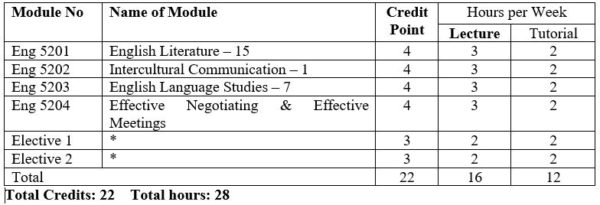
Core Courses
Eng 5201 English Literature – 15
Eng 5202 Intercultural Communication –1
Eng 5203 English Language Studies – 7 (Introduction to Sociolinguistics and Psycholinguistics)
Eng 5204 Effective Negotiating and Effective Meetings
Elective Courses (for English Specialisation)
Eng 5205 World Literature in English – 1
Eng 5206 Communicative Skills – 9
Eng 5207 Business English – 5
Eng 5208 English for Hospitality and Tourism – 1
* An English specialisation student will have to take two electives (elective 1*and 2*) from among those offered.
Eng 5101: English Literature – 15 (Short Stories, Novel, Poetry & Drama in the Themes of Feminism)
Course Description
This module deals with the study of the theme of feminism and the role of women in life and literature. It focuses on the social construction of gender: the gendered division of labour, production, and reproduction; intersections of gender, race, class, and ethnicity. Students will be able to analyse texts in relation to each other – across genres, countries and historical and social contexts. It allows students to track changes in thinking, beliefs and literary conventions which can aid in their understanding and analyses of texts. The repetition of ideas, themes, language and vocabulary across the genres can boost students’ confidence in building up to and dealing with longer and more complex texts, something which is very important for second language learners of literature. The order of study is designed to contribute to this gradual building of the necessary language, reading and critical thinking skills to deal with increasingly more complex texts.
A non-fiction text is introduced in this module. Students will read extracts from this text to develop their understanding of the women’s life at that time and how the works of the writers they are studying reflect and analyse the events of the time and their effects on different peoples around the world. The remaining texts are spread across the 18th, 19th and early 20th centuries to broaden students’ experiences of literature and to allow them to analyse how literature, like politics, beliefs, attitudes etc., and often because of them, change over time.
Short Stories
Novel
Poems
Drama
Learning Outcomes
After completing the course, students will be able to:
articulate creative, informed and relevant responses to literary texts, using appropriate terminology and concepts, and coherent, accurate written expression.
demonstrate detailed critical understanding in analysing the ways in which structure, form and language shape meanings in literary texts.
explore connections and comparisons between different literary texts, informed by interpretations of other readers.
demonstrate understanding of the significance and influence of the contexts in which literary texts are written and received.
Assessment
Assessment will be done through a combination of tutorial-based assessment, and a final closed book written examination.
Students will be able to demonstrate the completion of learning outcomes by:
References
Alpers (editor), Antony (1984). The Stories of Katherine Mansfield. Auckland: Oxford University Press.
Bloom, Harold (2007). Heims, Neil (ed). The Merchant of Venice. New York: Infobase.
Bryan, Patricia L. (1997). “Stories in Fiction and in Fact: Susan Glaspell’s A Jury of Her Peers and the 1901 Murder Trial of Margaret Hossack”. Stanford Law Review.
https://www.ukessays.com/essays/english-literature/regret-by-kate-chopin-english-literature-essay.php?vref=1
Eng 5202: Intercultural Communication – 1
Intercultural Communication focuses on the importance of culture in our everyday lives, and the ways in which culture interrelates with and influences communication processes. This module covers such topics as intercultural communication flexibility, cultural value, cultural and ethnic identities, cultural shock, verbal communication and non-verbal communication across cultures, cultural influences on the expression and perception of emotions, intergroup communication and biases against outgroups. It is intended to help students find out how people from different cultural backgrounds communicate, in similar and different ways among themselves, and how they endeavour to communicate across cultures.
Learning Outcomes
By the end of the course, students are expected to
Assessments
Total : 100 %
Final Examination : 70%
Class Work : 30 %
Coursebook
Ting-Toomey & Chung. (1999). Understanding Intercultural Communication. 2nd ed. OUP.
References
Holliday, Adrian. (2013). Understanding Intercultural Communication: Negotiating a Grammar of Culture. Routledge: London. (H)
Eng 5203: English Language Studies – 7 (Introduction to Sociolinguistics and Psycholinguistics)
Course Description
This module introduces Sociolinguistics and Psycholinguistics. The first part focuses on how language and societies are mutually constitutive and they both have impact on each other. In this part students will learn language variation such as dialects, regional dialects, social dialects, pidgin, creole, registers, second language education, language contact and language in use. The second part focuses on language acquisition. In this part students will be provided with Stages in Language Acquisition.
Learning Outcomes
At the end of this module, students will be able to
Assessment
Assessment will be done through tutorials and examination. They will be given 20% for tutorials and 80% for examination. There will be group assignments, group activities, presentations and individual assignments for tutorials. At the end of the module, there will be an examination.
References
Fromkin, Victoria, Robert Rodman, Nina Hyams(2011) Inroduction to Language. Cengage
Learning: Canada (Page324-374, 430-539)
Radhey L.Varshney(2003). An Introductory Textbook of Linguistics and Phonetics.
Bareilly: Student Store. Chapter 20,21,22
Thomas, W. Stewart, Jr. & Vaillette, N. (eds). Language Files. Columbus: the Ohio State
University Press. File 9,10, 11, 12
Yule, G. (2006). The Study of Language. Cambridge: CUP. Chapter14,15,16,18,19
Eng 5204: English for Negotiating & English for Meetings
Course Description
This module will equip students with important skills that they will need at work: negotiation and meeting skills. Effective negotiating component will provide students with the language they need to hand the typical scenario encountered on the way to successful negotiations. Effective meetings will present all the speaking skills that they students in order to participate in a meeting with confidence. It will also provide them with expressions needed in typical everyday business meetings.
Learning Outcomes
English for Negotiating
At the end of the course, students will be able to:
English for Meetings
At the end of the module, students will be able to:
Assessment
The assessment will be done through a combination of tutorial-based assessment, presentations and formal written assignment and a final examination.
Prescribed Coursebooks
Eng 5205: World Literature – 1
Course Description
This module introduces students a vast collection of literary works produced by authors from different nations. It enables students to study different literary genres of international authors in global contexts. Students dealing with this module will have a chance to enjoy different taste given by the world’s national literatures and the circulation of works in the wider world beyond their country of origin.
Learning outcomes
At the end of the course, students will be able to:
Assessment
Class discussions during the lectures: 5% Active engagement of students in class discussion is assessed. During the lectures, students are expected to give critical response through discussion.
Attendance: 5% Students are to attend all lectures and their attendance will be one of the criteria in assessment.
Written Assignment: 5% of the grade is for written tasks assigned for the respective literary work. The teacher gives a grade to the paper submitted by groups.
Presentation: 5% Another 5% of the grade is allotted for students’ group presentation on the assigned tasks. In assessing group presentation, three-fold group assessment (the teacher’s grade, average of peer grades, and self-assigned grades will be carried out.
Exam: 80% of the grade is for students’ achievement in the final exam.
References
Allison, A.W. et al. (1986) Masterpieces of the Drama. Macmillan. Fifth Edition
Barnet, S. et al. (1997)Types of Drama: Plays and Context. Longman
Bowler et. al. (1996) Literature: World Masterpieces. Prentice-Hall
Eng 5206: Communicative Skills – 9
Course Description
This Module aims to develop students’ language development, communicative skills and study skills. It introduces language items in authentic and semi-authentic engaging reading and listening texts. It also exposes students to different styles of written texts. The lessons will be conducted in communicative language teaching and deductive approach to present grammar and vocabulary items. Engaging activities will be given to make students practise the language structure, vocabulary and grammar rules in a variety of meaningful contexts to develop their reading, writing, speaking, pronunciation and listening skills.
Learning Outcomes
After the course, students will be able to:
Assessment
Assessment will be done through the following modes:
Students will be able to demonstrate the achievement of learning outcomes by:
Prescribed Text
Cotton, D., Falvey, D. & Kent, S. (2014). New Language Leader 5: Coursebook. Pearson Education Limited.
MyEnglishLab: english.com/activate
References
Acklam, R.& Crace, A. (2008) Total English, Upper Intermediate, Students’ Book. London: Pearson Longman.
Clandfield, L (2010) Global. Level 4 Course book, T’s book, Work book, Macmillan Publishing House.
Clare, A.& Wilson, J. J. (2008) Total English, Upper Intermediate, Work Book. London: Pearson Longman.
Harris, M. et al. (2006) New Opportunities, Intermediate, Students’ Book. London: Longman.
Naughton, D. (2008) Total English, Upper Intermediate, Teacher’s Resource Book. London: Pearson Longman.
Dean, M. et al. (2006) New Opportunities, Intermediate, Teacher Book. London: Pearson Education Ltd.
Eng 5207: Business English – 5
Course Description
This module covers all the four language learning skills featuring completely updated content and a significantly enhanced range of authentic materials which reflect the latest trends in the business world. It is based on topics of great interest to everyone involved in or studying international business. This module presents business-related vocabulary, grammar points and functions students will need to use in the workplace. It aims to develop students’ spoken and written English, enabling them to use it accurately and appropriately. Students will be able to develop their language skills as well as the content knowledge regarding respective business functions.
Learning Outcomes
At the end of the course, students will be able to:
Assessment
In terms of tutorials, the questions will mostly be based on writing (Case Study) of each unit. Before the tutorials, students have to discuss the discussion questions given in the text concerning with the respective case study in pairs or in groups to get some ideas or to share their ideas together. Only after that, they have to take the tutorials individually.
In terms of presentations, students are asked to do mainly on the questions of discussion part. Group presentations are preferred because of time constraints. Before they do presentations, they have to discuss with their group members so that active participation is one of the important factors in presentation. Students are assessed on relevancy, accuracy, and organization of the content, presentation, pronunciation as well as the effective use of power point.
In terms of assignments, students are mainly asked to do on tasks of reading and sometimes on writing. Depending on the allotted time and types of task, they will be done at home or in class.
Attendance is thought to be one of the key factors for the students.
References
Council of Europe (2001) Common European Framework of Reference for Languages: Learning, teaching, assessment. Cambridge: Cambridge University Press.
North, B. (2000) The Development of a Common Framework Scale of Language Proficiency. New York: Peter Lang.
Schneider, Guenther and Brian North (1999) ‘In anderen Sprachen kann ich’. Skalen zur Beschreibung, Beurteilung und Selbsteinschätzung der fremdsprachlichen Kommunikationmsfähigkeit. Berne, Project Report, National Research Programme 33, Swiss National Science Research Council.
Schneider, G., North, B. (2000) Fremdsprachen können – was heißt das? Chur / Zürich: Rüegger
Eng 5208: English for Hospitality and Tourism – 1
Course Description
This module focuses on the needs of professionals working in the tourism industry. This course builds learner confidence in the professional skills needed for the tourist industry whilst developing their language awareness. Students practise these skills in realistic Case Studies that reflect topical tourism issues.
Learning Outcomes
At the end of the course, students will be able to:
Assessment
Assignment 20 marks
Final Exam 80 marks
Students need to complete five written assignments and they also need to do some in-class activities for the first semester. They are given all the necessary information to write the assignments. Some assignments are group work and some are individual work on writing a brochure and designing an itinerary for a package, describing different options of transportation in region, holding a meeting and writing a meeting-minute, writing a letter of apology, and writing geographical description of their country. Written assignments will be assessed based on the format and criteria for each particular type of writing.
Prescribed Text
Strutt, Peter (2013) English for International Tourism, Intermediate Coursebook (New Edition). Pearson.
References
Agar, M. Culture. In Language Shock: Understanding the Culture of Conversation, 108-139, New York: Perennial, 1994.
Braithwaite, C. A. Communicative Silence: A Cross-cultural Study of Basso’s Hypothesis. In Cultural Communication and Intercultural Contact, ed. D. Carbaugh, 321-327. Hilsdale, NJ: Lawrence Erlbaum, 1990.
Daun, A. Swedishness as an Obstacle in Cross-cultural interaction. In Intercultural Discourse and Communication: The Essential Readings.eds. S. F. Kiesling and C. B. Paulston, 150-163. Oxford: Blackwell, 2005.
Tannen, D. New York Jewish Conversational Style. In Intercultural Discourse and Communication: The Essential Readings. eds. S. F. Kiesling and C. B. Paulston, 135-149. Oxford: Blackwell, 2005.

Core Courses
Eng 5209 English Literature – 16
Eng 5210 Intercultural Communication – 2
Eng 5211 English Language Studies – 8 (Introduction to Stylistics and Pragmatics)
Eng 5212 English in the Media
Elective Courses (for English Specialisation)
Eng 5213 World Literature in English – 2
Eng 5214 Communicative Skills – 10
Eng 5215 Business English – 6
Eng 5216 English for Hospitality and Tourism – 2
* An English specialisation student will have to take two electives (elective 1*and 2*) from among those offered.
* It is compulsory for all students to submit term papers at the end of the semester.
Eng 5209: English Literature – 16 (Short Stories, Novel, Poetry & Drama in the themes of Colonialism)
Course Description
This module deals with the study of the theme of colonialism and the effects of civil war. Students will be able to analyse texts in relation to each other – across genres, countries and historical and social contexts. It allows students to track changes in thinking, beliefs and literary conventions which can aid in their understanding and analyses of texts. Also, the repetition of ideas, themes, language and vocabulary across the genres can boost students’ confidence in building up to and dealing with longer and more complex texts, something which is very important for second language learners of literature. The order of study is designed to contribute to this gradual building of the necessary language, reading and critical thinking skills to deal with increasingly more complex texts.
A non-fiction text is introduced in this module. Students will read extracts from this text to develop their understanding of the history of colonialism and post colonialism and how the works of the writers they are studying reflect and analyse the events of the time and their effects on different peoples around the world. The remaining texts are spread across the 18th, 19th and early 20th centuries to broaden students’ experiences of literature and to allow them to analyse how literature, like politics, beliefs, attitudes etc., and often because of them, change over time.
Short Stories
Novel
Poems
Drama
Learning Outcomes
After completing the course, students will be able to:
Assessment
Assessment will be carried out through a combination of tutorial-based assessment, and a final closed book written examination.
Students will be able to demonstrate the completion of learning outcomes by:
References
Barton, Thomas F., Robert C. Kingsbury, and Gerald R. Showalter (1970). Southeast Asia in Maps. Chicago: Denoyer-Geppert Company.
Lesley, Cole (1976). The Life of Noël Coward. London: Cape.
Olson, James S., ed. (1996) Historical Dictionary of the British Empire
Osborne, M. 2000, Southeast Asia : An introductory history, 8th edn. Sydney: George Allen & Unwin.
Eng 5210: Intercultural Communication – 2
Course Description
This module focuses on gaining an advanced understanding of the concepts associated with culture and communication. It provides students the opportunity to develop intercultural awareness and patterns of perception and thinking to enable effective communication across cultural boundaries. Topics discussed include the effect of cultural differences on communication styles, personal identities, and various organizational contexts. Students will learn strategies to manage intercultural conflict flexibly, the challenges in developing intercultural-intimate relationship, the communication issues facing a global identity and the practices to become ethical intercultural communicator.
Learning Outcomes
By the end of the course, students will be able to:
Assessments
Total : 100 %
Final Examination : 70 %
Class Work : 30 % (which includes the following a, b, c, and d)
Prescribed Coursebook
Ting-Toomey & Chung. (1999). Understanding Intercultural Communication. 2nd ed. OUP.
References
Agar, M. Culture. In Language Shock: Understanding the Culture of Conversation, 108-139, New York: Perennial, 1994.
Braithwaite, C. A. Communicative Silence: A Cross-cultural Study of Basso’s Hypothesis. In Cultural Communication and Intercultural Contact, ed. D. Carbaugh, 321-327. Hilsdale, NJ: Lawrence Erlbaum, 1990.
Daun, A. Swedishness as an Obstacle in Cross-cultural interaction. In Intercultural Discourse and Communication: The Essential Readings.eds. S. F. Kiesling and C. B. Paulston, 150-163. Oxford: Blackwell, 2005.
Holliday, Adrian. (2013). Understanding Intercultural Communication: Negotiating a Grammar of Culture. Routledge: London. (H)
Tannen, D. New York Jewish Conversational Style. In Intercultural Discourse and Communication: The Essential Readings. eds. S. F. Kiesling and C. B. Paulston, 135-149. Oxford: Blackwell, 2005.
Eng 5211: English Language Studies – 8 (Introduction to Stylistics and Pragmatics)
Course Description
This module introduces Stylistics and Pragmatics. The first part focuses on the interpretation of texts of all types and/or spoken language in regard to their linguistics and tonal style. In this part, students will learn the main concepts and definition of stylistics such as the scope of stylistic study, the definitions of style and stylistics, and stylistic analysis. The second part focuses on how context and convention contribute to meaning and understanding. In this part, students will be provided such definitions as deixis, references, presupposition, and implicature.
Learning Outcomes
At the end of the course, students will be able to:
Assessment
Students will be assessed through tutorials and examination. They will be given 20% for tutorials and 80% for examination. There will be group assignments, group activities, presentations and individual assignments for tutorials. At the end of the semester, there will be an examination.
References
Verdonk, Peter (2014) Stylistics. Series Editor H.G. Widdowson. Oxford University Press. (Page 1-40)
Simpson, Paul (2004) Stylistics. Aresource book for sutdents.(Page 1-13, 53-65)
Yule, George (1996) Pragmatics. Series Editor H.G. Widdowson. Oxford University Press
Radhey L.Varshney (2003). An Introductory Textbook of Linguistics and Phonetics.
Bareilly: Student Store. Chapter 17
Rodman, R. & Hyams, N. (2003). An Introduction to Language. Chapter 3
Thomas, W. Stewart, Jr. & Vaillette, N. (eds). Language Files. Columbus: the Ohio State
University Press. File 8
Yule, G. (2006). The Study of Language. Cambridge: CUP. Chapter 11
Eng 5212: English in the Media
Course Description
This module will improve students’ communication skills at work and their language knowledge in key areas of the media. it will also give students opportunity to discuss the media topic, to participate in listening activities reflecting media scenarios, realistic speaking activities, reading and writing practices based on authentic media documents and engage them in topics and articles which ensure that learning is interesting and motivating.
Learning Outcomes
At the end of the course, students will be able to:
Assessment
The assessment will be carried out through a combination of tutorial-based assessment, presentations and formal written assignment and a final examination.
References
Ceramella, Nick and Lee, Elizabeth (2009) Cambridge English for the Media. Cambridge University Press
Eng 5213: World Literature in English – 2
Course Description
This module introduces students a vast collection of literary works produced by authors from different nations. This module deals with short story, poetry, drama, prose and the novel ranging from 17th century to 20th century, written by writers of great prominence: Russia, France, China, India, Japan, Nigeria, Vietnam, Chile, Spain, South Korea, Norway, Germany, and America. Students are introduced to a rich variety of selections both from the East and the West, written in a variety of styles so that they will get a panorama of the World Literature.
Learning outcomes
At the end of the course, students will be able to:
Assessment
Class discussions during the lectures: 5% Active engagement of students in class discussion is assessed. During the lectures, students are expected to give critical response through discussion.
Attendance: 5% Students are to attend all lectures and their attendance will be one of the criteria in assessment.
Written Assignment: 5% of the grade is for written tasks assigned for the respective literary work. The teacher gives a grade to the paper submitted by groups.
Presentation: 5% Another 5% of the grade is allotted for students’ group presentation on the assigned tasks. In assessing group presentation, three-fold group assessment (the teacher’s grade, average of peer grades, and self-assigned grades will be carried out.
Exam:80% of the grade is for students’ achievement in the final exam.
References
Allison, A.W. et al. (1986) Masterpieces of the Drama. Macmillan. Fifth Edition
Barnet, S. et al. (1997)Types of Drama: Plays and Context. Longman
Bowler et. al. (1996) Literature: World Masterpieces. Prentice-Hall
Eng 5214: Communicative Skills – 10
Course Description
This Module aims to develop students’ language development, communicative skills and study skills. It introduces language items in authentic and semi-authentic engaging reading and listening texts. It also exposes students to different styles of written texts. The lessons will be conducted in communicative language teaching and deductive approach to present grammar and vocabulary items. Engaging activities will be given to make students practise the language structure, vocabulary and grammar rules in a variety of meaningful contexts to develop their reading, writing, speaking, pronunciation and writing skills.
Learning Outcomes
After the course, students will be able to:
Assessment
Assessment will be done through the following modes:
Students will be able to demonstrate the achievement of learning outcomes by:
Prescribed Text
Cotton, D., Falvey, D. & Kent, S. (2014). New Language Leader 5: Coursebook. Pearson Education Limited.
MyEnglishLab: english.com/activate
References
Acklam, R.& Crace, A. (2008) Total English, Upper Intermediate, Students’ Book. London: Pearson Longman.
Clandfield, L (2010) Global. Level 4 Course book, T’s book, Work book, Macmillan Publishing House.
Clare, A.& Wilson, J. J. (2008) Total English, Upper Intermediate, Work Book. London: Pearson Longman.
Harris, M. et al. (2006) New Opportunities, Intermediate, Students’ Book. London: Longman.
Naughton, D. (2008) Total English, Upper Intermediate, Teacher’s Resource Book. London: Pearson Longman.
Dean, M. et al. (2006) New Opportunities, Intermediate, Teacher Book. London: Pearson Education Ltd.
Eng 5215: Business English – 6
Course Description
This module covers all the four language learning skills featuring completely updated content and a significantly enhanced range of authentic materials which reflect the latest trends in the business world. It is based on topics of great interest to everyone involved in or studying international business. This module presents business-related vocabulary, grammar points and functions students will need to use in the workplace. It aims to develop students’ spoken and written English, enabling them to use it accurately and appropriately. Students will be able to develop their language skills as well as the content knowledge regarding respective business functions.
Learning Outcomes
At the end of the course, students will be able to:
Assessment
In terms of tutorials, the questions will mostly be based on writing (Case Study) of each unit. Before the tutorials, students have to discuss the discussion questions given in the text concerning with the respective case study in pairs or in groups to get some ideas or to share their ideas together. Only after that, they have to take the tutorials individually.
In terms of presentations, students are asked to do mainly on the questions of discussion part. Group presentations are preferred because of time constraints. Before they do presentations, they have to discuss with their group members so that active participation is one of the important factors in presentation. Students are assessed on relevancy, accuracy, and organization of the content, presentation, pronunciation as well as the effective use of power point.
In terms of assignments, students are mainly asked to do on tasks of reading and sometimes on writing. Depending on the allotted time and types of task, they will be done at home or in class.
Attendance is thought to be one of the key factors for the students.
References
Council of Europe (2001) Common European Framework of Reference for Languages: Learning, teaching, assessment. Cambridge: Cambridge University Press.
North, B. (2000) The Development of a Common Framework Scale of Language Proficiency. New York: Peter Lang.
Schneider, Guenther and Brian North (1999) ‘In anderen Sprachen kann ich’. Skalen zur Beschreibung, Beurteilung und Selbsteinschätzung der fremdsprachlichen Kommunikationmsfähigkeit. Berne, Project Report, National Research Programme 33, Swiss National Science Research Council.
Schneider, G., North, B. (2000) Fremdsprachen können – was heißt das? Chur / Zürich: Rüegger
Eng 5216: English for Hospitality and Tourism – 2
Course Description
This module focuses on the needs of professionals working in the tourism industry. This course builds learner confidence in the professional skills needed for the tourist industry whilst developing their language awareness. Students practise these skills in realistic Case Studies that reflect topical tourism issues.
Learning Outcomes
At the end of the course, students will be able to:
Assessment
Assignment 20 marks
Final Exam 80 marks
Students need to complete five written assignments and they also need to do some in-class activities for the first semester. They are given all the necessary information to write the assignments. Some assignments are group work and some are individual work on writing a brochure and designing an itinerary for a package, describing different options of transportation in region, holding a meeting and writing a meeting-minute, writing a letter of apology, and writing geographical description of their country. Written assignments will be assessed based on the format and criteria for each particular type of writing.
Coursebook
Strutt, Peter (2013) English for International Tourism, Intermediate Coursebook (New Edition). Pearson.
| MA FIRST YEAR – ENGLISH | SEMESTER – I |
| Module No. | Name of Module | Credit Points | Hours per Week | |
| Lecture | Tutorial | |||
| E 611 | Grammar and Syntax | 4 | 4 | 2 |
| E 612 | Sociolinguistics and Discourse Analysis | 4 | 4 | 2 |
| E 613 | Thematic Studies – 1 | 4 | 4 | 2 |
| E 614 | Methodology | 4 | 4 | 2 |
| Total | 16 | 16 | 8 |
| Total Credit: 16 | Total Hours: 24 |
E 611: Grammar and Syntax
Course Description
This module is designed to introduce different types of grammar, and aims and attitudes of modern linguistics. It also discusses the basic grammar notions, the goals of linguistic theories and the role of grammar in language teaching. This module helps students to discover prominent linguists. They also have to learn classic definitions of language, language in communication and role of grammar in defining a language. Students have to compare and contrast what language, linguistics and its role in modern society with its classic definition of language, traditional aspects of language. The course will include lectures, presentation, discussion and sharing sessions on the following:
Learning Outcomes
At the end of the course, students will be able to:
Assessment
Total : 100 %
Final Examination : 70 %
Class work : 30%
Class work includes attendance (5%), active participation in class discussion and group work (5 %), group- presentations and sharing sessions (10%) and written assignments and tutorials (10 %).
Coursebooks
Allen, J. P. B., & Widdowson, H. G. (1975) Grammar and Language Teaching: Edinburgh Course in Applied Linguistics. Vol. II. London: OUP
Burns, A., & Caroline, C. (2001). Analysing English in Global Context. London: Routledge.
Lyons, John. (1970). Chomsky. London: Fontana Modern Masters.
References
Butt,D. et al. Using Functional Grammar (an explorer’s guide) (3rd ed). (2012) Palgrave Macmillan.
Eggins, S. (2004) Introduction to Systemic Functional Linguistics (2nd ed). Bloomsbury.
Halliday, M.A.K. (1985). An Introduction to Functional Grammar (2nd ed). London: Arnold.
Kim, J-B., & Sells, P. (2008). English Syntax: An Introduction. Center for the Study of Language and Information.
Miller, J. (2002). An Introduction to English Syntax. Edinburgh University Press.
Newson, M. (2006). Basic English Syntax with Exercises. Bolcsesz Konzorcium.
Valin, R. D. V., & Lapolla. R. J. (2004). Syntax: Structure, Meaning & Function. Cambridge University Press.
E 612: Sociolinguistics and Discourse Analysis
Sociolinguistics
Course Description
This module improves students’ understanding of relationship between language and sociology, how social norms and values affect linguistic behaviour, how variety and diversity of language is related to the social framework of its speakers and how language is used by people. The course includes lectures, presentations, discussions and sharing sessions on the following:
Differences between linguistics and sociolinguistics
Key Terms: Speech, Speech Community, Language Community, Dialect (Regional, Social, Temporal)
Language contact & Language change: Bilingualism (Stable/ Unstable), Pidgin, Creole, Lingua franca, External change (Borrowing, Loan translation), Internal change (Coining, Combining, Extending)
Speech event, Speech factors, Speech functions, Paralinguistic behaviour, Code switching
Learning Outcomes
By the end of the course, students will be able to:
Discourse Analysis
This module explores the ways in which language varies according to subject areas, social settings, communicative purposes and the social roles and identities of people. The course includes lectures, presentation, discussion and sharing sessions on the following:
What is discourse analysis?: What is discourse?; Discourse versus context; Spoken versus written language; Types of discourse
Linguistic elements in discourse: Cohesion; Information structure; ‘Given’ and ‘new’ information; Theme and rheme; Genre; Propositional analysis
Making sense of discourse: Discourse coherence; Speech acts; Background knowledge; How we process discourse; Conversation analysis; Negotiating meaning; Intercultural communication
Developing discourse competence: The early years: oral competence; School years
Learning Outcomes
By the end of the course, students will be able to:
Assessment
The assessment of this module is through a combination of tutorial-based assessment, presentations and formal written assignment, (03%) and a final examination (70%).
Students will be able to demonstrate the completion of learning outcomes by:
Assessment:
References for Sociolinguistics
Allen, J. P. B. & S. P. Corder (1975). Papers in Applied Linguistics: Vol. 2. OUP (P.155 –)
Romaine, S. (1994). Language in Society: An Introduction to Sociolinguistics. Oxford: OUP
Wardhaugh, R. (1998). An Introduction to Sociolinguistics. Blackwell Publishers Inc.
References for Discourse Analysis
Coulthard, M. & Montgomery, M. (1981). Studies in Discourse Analysis. London: Routledge & Kegan Paul Ltd.
Halliday, M. A. K. & Hasan, R. (1976) Cohesion in English. Longman Group Ltd.
Kimberly L. G. & Long, A.Y. (2014). Sociolinguistics and Second Language Acquisition: Learning to Use Language in Context. Routledge
McCathy, M. (1991). Discourse Analysis for Language Teachers. Cambridge Teaching Library. CUP.
Nunan, D. (1993) Discourse Analysis: Penguin Books Ltd.
Platridge. B (2012) Discourse Analysis: An Introduction (Bloomsbury Discourse) 2nd Edition. Bloomsbury Publishing
E 613: Thematic Studies – 1
Course Description
This module deals with the study of different genres of literature (poetry, prose and short story) through a thematic approach. It introduces students to 20th Century poems with interesting and recurring themes, different types of prose passages that describe, narrate and reveal cause and effect, and also short stories that address various contemporary themes. This module provokes students into critical and analytical thinking about the central themes to be explored in literary texts. Thematic studies enable students to examine themes or patterns of meaning within qualitative data.
Learning Outcomes
By the end of the course, students will be able to
Assessment
Class discussions during the lectures: 5% Active engagement of students in class discussion is compulsory. During the lectures, students are expected to give proper response when the teacher asks questions that check their understanding of the literary text they are dealing and to give their own opinion and comment enthusiastically in analysing it. The instructor leads the class discussion to check students’ understanding and help them to get ideas about the theme of each literary text in the respective genre. Their active participation will be graded.
Attendance: 5% Attendance of students will be one of the criteria in assessment.
Written Assignment: 10% of the grade is for written tasks assigned for each genre of literature. Students are asked to work in groups so that they can learn from each other by sharing their own ideas in groups. The teacher gives a grade to the paper submitted by groups.
Presentation: 10% The another 10% of the grade is allotted for students’ group presentation on the assigned tasks. In assessing group presentation, Three-fold group assessment will be carried out. The teacher gives a grade to the group’s final product, group members give a grade to each other, and each group member gives a grade to him/herself, and justifies it. Every student’s grade is then a combination of: 50% teacher’s grade, 30% average of peer grades, and 20% of self-assigned grades.
Exam:70% of the grade is for students’ achievement in the final exam.
References
Abrams, M.H. (1993). A Glossary of Literary Terms. Rhinehart and Winston Inc.
Abrams, M.H & Harpham, G.G (2009) A Handbook of Literary Terms. Cengage Learning India Private Limited: New Delhi.
Conlin, M. L. (1992). Pattern Plus: A Short Prose Reader with Argumentation. Boston: Houghton Mifflin Co.
Hoeper, J. D. & Pickering, J. H. (1986). Literature. (Pg. 591-682). Second Edition. Macmillan Publishing Co.
Hoeper, J. D., & Pickering, J. H. (1990) Poetry. An Introduction. New York. Macmillan Publishing Co.
E 614: Methodology
Course Description
This module focuses on different language teaching methods which dated from the very first Grammar Translation to the more commonly used approach, Communicative Approach. This module also provides the common nature of approaches and method in language teaching from three aspects: approach, design and procedure. It also focuses on lesson objectives, materials, the role of teachers and students, the role of native language, and the most outstanding features of each method.
Learning Outcomes
By the end of the course, students will be able to:
Assessment
Class discussions during the lectures: 5%
During the lectures, students are expected to give their own opinion and comment enthusiastically when theories on different methods are discussed. They need to think and give comments on whether a certain method is suitable for the teaching context in our country, and how they can adapt this method. Their active participation will be highly appreciated or graded.
Attendance: 5%
Students are to attend all lectures and their attendance will be one of the criteria in assessment.
Written Assignment: 10%
Students are asked to write assignments in groups so that they can learn from each other by sharing their own ideas in groups. The teacher gives a grade to the paper submitted by groups.
Presentation: 10%
Another 10% of the grade is allotted for students’ group presentation on the assigned tasks. In presentation session, every student is to ask question, discuss on the ideas presented, or give comment. All these activities are graded.
Exam: 70%
70% of the grade is for students’ achievement in the final exam.
Coursebook
Richards, J. C. & Theodore S. Rogers (1986) Approaches and Methods in Language Teaching. Cambridge: CUP.
References
Freeman, Diane Larsen (1998) Techniques and Principles on Language Teaching. OUP.
Lightbown. P.M & Spada.N (2006) How Languages are Learned (Third Edition) Oxford University Press. New York.
Nation. I.S.P (2009) Teaching ESL/ EFL Reading and Writing. Routledge.
Nation. I.S.P & Newton. J (2009) Teaching ESL/EFL Listening and Speaking. Routledge.
Willis & Willis (2007) Doing Task-based Teaching. Oxford University Press. Oxford.
| MA FIRST YEAR – ENGLISH | SEMESTER – II |
| Module No. | Name of Module | Credit Points | Hours per Week | |
| Lecture | Tutorial | |||
| E 621 | Research Methodology | 4 | 4 | 2 |
| E 622 | Error Analysis and Psycholinguistics | 4 | 4 | 2 |
| E 623 | Academic Writing | 4 | 4 | 2 |
| E 624 | Stylistics and Semantics | 4 | 4 | 2 |
| Total | 16 | 16 | 8 |
| Total Credit: 16 | Total Hours: 24 |
E 621: Research Methodology
Course Description
This module is designed to guide students to do research; to impart terms and types of research, methods, procedures and methodology. Moreover, students will be trained to be able to write essential components of a research report: research proposal, introduction, literature review, methodology, discussion, conclusion, references, and abstract. Students have to analyze different research articles and theses so that they will be well aware of the formats, essential components, and common mistakes in writing a research report. This practice session will help students to be confident to start their own research for their thesis in the next semester. The course components will include the following:
Designing a Research Study: introduction (the nature of research), qualitative research, quantitative research, conclusion (course evaluation: combining research types)
Writing a Research Paper: proposal writing, outlining, abstract, introduction, literature review, research methodology, finding and discussion, conclusion, bibliographies, citing sources, paraphrasing, summarizing and quoting.
Learning Outcomes
At the end of the course, students will be able to:
Assessment:
Final Examination : 60 %
Class work : 40 %
Class work includes attendance (5%), active participation in class activities: writing book reviews, group discussions, presentations (5 %), writing a proposal (10 %), writing tasks for introduction, abstract, literature review, etc. (10 %) and an analysis of a research report/ article / thesis in terms of the format, essential elements of each part in the report (10 %).
Coursebooks
Arkin, M., & Macheski, C. (2001). Research Papers: A Practical Guide. Houghton Mifflin Company.
Brown, J. D., & Rodgers, T.S. (2009). Doing Second Language Research. Oxford University Press.
Bitchener, J. (2010) Writing an Applied Linguistics Thesis or Dissertation: A Guide to Presenting Empirical Research. Palgrave Macmillan.
Feak, C. B., & Swales, J.M. (2009). Telling A Research Story: Writing a Literature Review. The University of Michigan Press.
McMillan, K., & Weyers, J. (2011). How to write Dissertations & Project Reports (2nded). Pearson Education Inc.
Swales. J.M., & Feak, C. B. (2009). Abstracts and the Writing of Abstracts. The University of Michigan Press.
Swales. J.M., (2011). Aspects of Article Introductions. The University of Michigan Press
Yagelski, R. P. (2015). The Essentials of Writing: Ten Core Concepts. Cenage Learning.
References
Bell, J., (2005). Doing Your Research Project (4th ed). Open University Press. McGraw-Hill Education.
Brown. J.D., & Coombe, C. (2015). Research in Language Teaching and Learning. Cambridge University Press. UK.
Creswell, J. W. (2014). Research Design (Fourth Edition) SAGE Publications. Inc. USA.
Leedy, P.D., & Ormrod, J. E. (2015). Practical Research: Planning and Design (11th ed). Pearson Education Limited. UK.
Swales, J.M., & Feak, C. B. (2012). Academic Writing for Graduate Students. (3rded).The University of Michigan Press.
Weissberg, R., & Buker, S. (1990). Writing Up Research. Englewood Cliffs: Prentice Hall Regents.
E 622: Error Analysis and Psycholinguistics
Error Analysis
Course Description
This module introduces error analysis, constructive analysis, non-constructive, types of errors and different types of errors and remedial work. The course will include lectures, presentation, discussion and sharing sessions on the following:
The study of learners’ language: Error Analysis: Lapses, mistakes and errors, Expressive and receptive errors, The practical uses of error analysis; Attitudes towards errors: Aims and uses of error analysis, Aims of research workers Aims of teachers, syllabus designers and materials writers;
Data for error analysis: Both correct and incorrect instances should be included, Data from individuals or groups, Variety of data; The significance of learners’ errors: The process of error analysis, Recognition, Interpretation, Reconstruction, Linguistic classification; Explanation of causes: Interlingual causes of errors, Intralingual causes of errors, Cross-association, Wrong analogy and over-generalization, Other possible causes of errors, Carelessness, Other errors ‘encouraged’ by teaching
Non-contrastive approach to error analysis: Types and causes of intralingual and developmental errors, Over-generalisation, Ignorance of rule restriction, Incomplete application of rules, False concepts hypothesized
Remedial work: The need for remedial teaching, Selection of problem areas for remedial work, Errors for incidental correction, Selecting errors for more intensive remedial work
Learning Outcomes
At the end of the module, students will be able to:
Psycholinguistics
This module is designed to introduce students with psycholinguistic principles: how a person acquires his/her mother tongue or first language, how he/she learns his/her second language or third language, perceives a language and produces language, the basic theories in developing language teaching methods and the errors students do in the language teaching. The course will include lectures, presentation, discussion and sharing sessions on the following:
Introduction: View of language from psycholinguistic perspective, Criteria for correct language usage, Behaviourist views of language; Child language acquisition: Milestones and patterns in development, How children learn language, Speech production, Speech comprehension, Relation of speech production, comprehension and thought, Early childhood bilingualism, Developmental sequences; Theoretical approaches to explaining L1 acquisition: Behaviorism, Analyses of Children’s speech samples, Biological basis for the innatist position, The Critical period hypothesis, The interactionist position, Child directed speech; Theoretical approaches to explaining L2 acquisition: Criteria for distinction of L2 acquisition from L1 acquisition, Innatism, Behaviorism, Universal Grammar, Krashen’s ‘monitor model’, Factors affecting L2 learning, Recent psychological theories, Information processing; Factors affecting L2 learning: Characteristics of a good language learner, Research on learner characteristics; Learner language: The concept, Developmental sequences; Second language teaching: Instructional and natural settings, Characteristics in the two settings, Classroom observation schemes, Feedback in the classroom, Teaching methods; Second language learning in the classroom: The implications of classroom research for teaching; Facts and opinions on language teaching.
Learning Outcomes
At the end of the module, students will be able to:
Assessment
This module will be assessed through a combination of tutorial-based assessment, presentations and formal written assignment and a final examination.
Students will be able to demonstrate the completion of learning outcomes by:
Tutorial based assessment:
References for Error Analysis
Corder, S. P. (1973) Introducing Applied Linguistics. Harmondsworth: Penguin.
James, Carl (1998) Errors in Language Learning and Use: Exploring Error Analysis. USA. Addison Wesley Longman Limited.
Keshavarz, M.H (2006) Error Analysis: A Practical Course for English students and teachers. SAMT, Tehran.
Richards, J. C. (1971) A Non-contrastive Approach to Error: Analysis. English Language Teaching. Vol. 25.
Windgard, Peter & Abbott Gerry (1981) The Teaching of English as an International Language: Glasgow: William Collins Sons and Co. Ltd.
References for Psycholinguistics
Allen, J. P. B. & Corder, S. Pit. (1975) Papers in Applied Linguistics: The Edinburgh Course in Applied Linguistics (Vol.2). London: OUP.
Demers, Richard A. et al. (2001) Linguistics: An Introduction to Language and Communication. U.S.A: Massachusetts Institute of Technology.
Fromkin Victoria et al. (2003) An Introduction to Language. USA: Heinle.
Fromkin. V & Rodman. R & Hyams. N (2010) An Introduction to Language. Wordsworth.
Lightbown, Patsy & Spada, Nina (1999) How Languages are Learned (Revised Edition). Oxford: OUP.
Steinberg, Danny & et al. (2001) Psycholinguistics: Language, Mind and World (Second Edition). (Chapter 1 and 6). Essex: Pearson Education Ltd.
E 623: Academic Writing
Course Description
This module introduces unique features of academic writing to students and guides them through the writing process to produce well-organized, adequately developed different types of paragraphs, opinion essays, argumentative essays and critical book reviews (critiques). It also provides students with knowledge about formal and informal registers, the use of transition signals and academic vocabulary. Moreover, this module helps students learn how to write concisely by eliminating wordiness together with extensive practical exercises and activities. Paraphrasing and summary writing are also useful components students need to master in this module. Students will be given a variety of writing assignments, and evaluation of various tasks will necessarily be carried out through students’ peer feedback, their group-work discussion and the instructor’s constructive suggestions. This module will familiarize students with principles of academic writing.
Learning Outcomes
By the end of the course, students will be able to:
Assessment
Class discussions during the lectures: 5% Active engagement of students in class discussion is a must. During the lectures, students are expected to recognize the structures and features of writing genres they are dealing thorough detailed examination of given models together with the instructor. The instructor leads the class discussion and checks students’ understanding about different text types and writing genres.
Attendance: 5% Students are to attend all lectures and their attendance will be one of the criteria in assessment.
Participation and Performance in class work: 10% of the grade is for students’ active participation and performance in practical writing in pairs or in groups. In writing paragraphs and essays, students are asked to go through all writing processes, starting from brain-storming, and moving to outlining and then writing a draft. They are expected to display their ability to write logically, critically, sensibly and concisely in doing their assigned writing tasks together. The teacher will give a grade for the product of each pair or group.
Peer-feedback:10% After writing drafts, students have to do formative peer-feedback activity Students review and comment on each other’s work. Then, each group must rewrite for the improved version based on the comments and suggestions of their peers. Next, the teacher also gives constructive feedback for further improvement. Finally, they have to write a fair/final copy. For book reviews, individual work is requested and peer-feedback is to be done for this.
(*Students have to keep all the written assignments done in class in portfolios so that they can see their progress in writing.)
Examination: 70% of the grade is for students’ achievement in the final exam.
References
Ede, L. (2008). The Academic Writer: A Brief Guide. Bedford / St. Martin’s. USA.
Folse, K. S., & Pugh, T. (2015). Great Writing: From Great Essays to Research 5. (3rd ed). National Geographic Learning/ Cengage Learning. USA.
Godfrey, J. (2013). The Student Phrase Book: Vocabulary for Writing at University. Palgrave Macmillan
Oshima, A. & Hogue, A. (2007). Introduction to Academic Writing. (3rd ed). Level 3. Pearson Education.
Oshima, A., & Hogue, A. (2006). Writing Academic English. (4th ed). Level 4. Pearson Education.
Oshima, A. & Hogue, A. (2017). Longman Academic Writing Series 4. (5th ed). Pearson Education, INc. USA.
Swales, J.M., & Feak, C. B. (2012). Academic Writing for Graduate Students. (3rd ed).
The University of Michigan Press.
Yagelski, R. P. (2015). The Essentials of Writing: Ten Core Concepts. Cenage Learning.
E 624: Stylistics and Semantics
Course Description
Stylistics
This module focuses on linguistic features to be considered in carrying out a stylistic analysis, and practical analysis. First, students need to learn linguistic description and stylistic features in analysis. Next, they learn sample analysis of different types of texts as examples. Finally, they have to carry out an analysis in groups.
Learning Outcomes
After completing the course, students will be able to:
Semantics
The second part focuses on what “semantics” means, general principles of semantics, and semantic structure. Students can learn meanings of “meaning”, different types of meaning and general principles of semantics from which they can learn how to carry out semantic analysis.
Learning Outcomes
After completing the course, students will be able to:
Assessment
Class discussions during the lectures: 5%
During the lectures, students are expected to recognize the theoretical preliminaries and principles so that they will be able to carry out analyses. So their active participation in class discussion will be highly appreciated or graded.
Attendance: 5%
Students are to attend all lectures and their attendance will be one of the criteria in assessment.
Written Assignment: 10%
Students are asked to write assignments in groups so that they can learn from each other by sharing their own ideas in groups. The teacher gives a grade to the paper submitted by groups.
Presentation: 10%
Another 10% of the grade is allotted for students’ group presentation on the assigned tasks. In presentation session, every student is to ask questions, discuss the ideas presented, or give comments. All these activities are graded.
Exam: 70%
70% of the grade is for students’ achievement in the final exam.
Coursebooks for Stylistics
Crystal, David & Derek Davy (1969) Investigating English Style. New York: Longman English Language Series.
Simpson,P. (2004). Stylistics: A resource book for students. Routledge.
Coursebooks for Semantics
Leech, G. (1985). Semantics: The Study of Meaning (2nd ed). Middlesex Penguin. (Chapter 1& 2)
Palmer, F. R. (1976) Semantics. Great Britain. CUP.
Riemer, N. (2012). Introducing Semantics. Cambridge University Press.
References
Allen, J. P. B & S. P. Corder (1975) Papers in Applied Linguistics. (pp. 122 – 153). Vol. 2, OUP.
Crystal, D. (1987) The Cambridge Encyclopedia of Language. (pp. 100-113). Cambridge: CUP.
Jackson. H & Amvela. E.Z (2001) Words, Meaning and Vocabulary: An Introduction to Modern English Lexicology. The Cromwell Press, Trowbridge.
Lyons, John (1971) Introduction to Theoretical Linguistics. (pp. 400-405). London and New York: CUP.
| MA SECOND YEAR – ENGLISH | SEMESTER – I |
| Module No. | Name of Module | Credit Points | Hours per Week | |
| Lecture | Tutorial | |||
| E 631 | Developing Language and Literary Skills | 4 | 4 | 2 |
| E 632 | Syllabus Design | 4 | 4 | 2 |
| E 633 | Thematic Studies – 2 | 4 | 4 | 2 |
| E 634 | Assessment | 4 | 4 | 2 |
| Total | 16 | 16 | 8 |
| Total Credit: 16 | Total Hours: 24 |
E 631: Developing Language and Literary Skills
Course Description
This module consists of two parts: developing language skills and developing literary skills. The main focus of this module is to help students discover more about ideas in English language teaching, gain an overview of theory and practice in ELT, develop a thoughtful and principled approach to using literature in the language classroom and provide with the tools for developing own classroom materials which are relevant to the learners. Developing Language Skills will deal with (1) the framework for teaching and learning: learners and learning, classroom and context, communicative classroom, learner autonomy and learner training (2) teaching and learning systems: vocabulary and grammar (3) developing language skills: listening, speaking, reading and writing and (4) planning and assessing learning: course design and classroom assessment. Developing Literary Skills consists of (1) approaches to using literature with the language learner, (2) selecting and evaluate materials, (3) Material design and lesson planning, and (4) reflecting on the literature lesson.
Learning Outcomes
Developing Language Skills
By the end of the course, students will be able to:
Developing Literary Skills
By the end of the course, students will be able to:
Assessment
Attendance: 5%
Students are to attend the lectures and be engaged in discussions and presentation done in the class.
Presentation: 10%
10% of the grade is allotted for students’ group presentation on the assigned tasks. In assessing group presentation, it includes assessing the product and assessing the process. 5% will be given for the quality of the product which includes fulfillment of the objectives, language, organization and originality. 5% will be given for the process of the presentation including delivery, pronunciation, posture, timing, visual aids and handling questions.
Classroom Participation: 5%
Giving 5% of the grade for classroom participation can stimulate the students’ interest in the topics they are discussing especially they have to give peer feedback on the group presentation. It also makes them the active listeners in the class.
Written Assignment: 10%
10% of the grade is allotted for written assignment.
Examination: 70% of the grade is for students’ achievement in the final examination.
Coursebooks
Hedge, Tricia (2000) Teaching and Learning in the Language Classroom. Oxford: OUP.
Lazar, Gillian (1993) Literature and Language Teaching: A Guide for Teachers and Trainers. Cambridge: CUP
References
Carter, Ronald & Michael N. Long (1991) Teaching Literature. Assessment in Literature Teaching Review of ELT. Longman.
Harmer, Jeremy (1998) How to Teach English. Longman.
Ur, Penny (1997) A Course in the Language Teaching. Trainer Book. Cambridge: CUP.
Windgard, Peter & Abbott Gerry (1981) The Teaching English as a Foreign Language. Collins.
E 632: Syllabus Design
Course Description
In this module, students will be taught key stages and procedures in curriculum development including needs analysis, syllabus design, planning goals and outcomes, course planning, material development and evaluation. The prescribed textbook, “Curriculum Development in Language Teaching” reflects contemporary issues in curriculum development.
Learning Outcomes
At the end of the module, students will be able to:
Assessment
Students’ performance will be assessed by a combination of tutorial-based assessments, presentations, formal written assignment, and a final examination.
Tutorial based assessment:
Final Examination: Closed book long and short answer questions. (70%)
References
Bell, Roger T. (1981) An Introduction to Applied Linguistics: Approaches and Methods in Language Teaching. London: Batsford Academic and Education Ltd.
Clark, John L. (1987) Curriculum Renewal in School Foreign language Learning. Oxford: OUP.
Kelly, A. V. (1977) The Curriculum: Theory and Practice. Harper and Row Ltd.
Lawton, Denis (1983) Curriculum Studies and Educational Planning. Hodder and Stoughton Education.
Munby, John (1978) Communicative Syllabus Design. Cambridge: CUP.
Nation. I. S.P & Macalister. J (2009) Language Curriculum Design. Routledge.
Richards, J. C. (2001) Curriculum Development ion Language Teaching. Cambridge: CUP.
Stenhouse, Lawrence (1975) An Introduction to Curriculum Research and Development. Heinemann Educational Books Ltd.
Strevens, Peter (1978) New Orientations in the Teaching of English. Oxford: OUP.
U Thi-Ha (1999) The ELT Curriculum: An Overview. (In-house Training for YU and YIOE Staff.) (Keynote Address presented at INCELT, IFL, Yangon.)
Ur, Penny (1996) A Course in Language Teaching: Practice and Theory. Cambridge: CUP.
Willis, Dave (1990) The Lexical Syllabus: A New Approach to Language Teaching. Collins Cobuild.
White, Ronald V. (1988) The ELT Curriculum: Design, Innovation and Management. Oxford: Basil Blackwell Ltd.
Yalden, Janice (1983) The Communicative Syllabus: Evaluation, Design and Implementation. New York: Pergammon Press Ltd.
E 633: Thematic Studies – 2
Course Description
This module deals with the study of different genres of literature: two novels by the 19th and 20th centuries’ major literary figures, Chinua Achebe and Scott Fitzgerald, and a tragedy by Shakespeare which mark the apex of Renaissance literature, through a thematic approach. Thematic studies enable students to examine themes or patterns of meaning within qualitative data, analyze language and literary devices used in novels and plays, explore the historical, cultural, and political practices, the morality of society at those times, generalize cause and effect in that society, draw conclusions, referring to the evidences in the literary texts. This module provokes students into critical and analytical thinking about the central themes to be explored in literary texts.
Learning Outcomes
By the end of the course, students are expected to be able to:
Assessment
Final Examination : 70 %
Class work : 30 % (which includes the following a, b, c & d)
Coursebooks
Achebe, C. (1971). Things Fall Apart. St. Paul’s Press Ltd. Malta.
Fitzgerals, F. S., (1968). The Great Gatsby. Charles Scribner’s Sons.
Shakespeare, W. (1960). Macbeth. Ed. Hunter, G. K. Penguin International Edition.
References
Abrams, M.H. (1993). A Glossary of Literary Terms. Rhinehart and Winston Inc.
Abrams, M.H & Harpham, G.G (2009) A Handbook of Literary Terms. Cengage Learning India Private Limited: New Delhi.
Brooks, C. & Robert Penn Warren (1938). Understanding Poetry. An Anthology for College Students. New York: Henry Holt.
Conlin, M. L. (1992). Pattern Plus: A Short Prose Reader with Argumentation. Boston: Houghton Mifflin Co.
De Laney. D, Ward. C & Fiorina C.R (2003) Fields of vision, Literature in the English Language. Volume 1 and 2. Longman Pearson Education Limited. UK.
Hoeper, J. D. & Pickering, J. H. (1986). Literature. (Pg. 591-682). Second Edition. Macmillan Publishing Co. Ltd.
Hoeper, J. D., & Pickering, J. H. (1990) Poetry. An Introduction. New York. Macmillan Publishing Co. Ltd.
Peden, W. (2010) Short Fiction: Shape and Substance. Boston: Houghton Mifflin Co. Ltd.
Wiggins. G at el. (2010) Literature (Language and Literacy). Teacher’s Edition. Pearson.
E 634: Assessment
Course Description
This module is designed to introduce the fundamental concepts of assessment, an important aspect of language teaching. Moreover, students will have to evaluate tests and types of assessment they have experienced with reference to theories and practices introduced in this module. They also have to practise designing sample tests, analyzing texts in terms of characteristics of good tests, and to identify possible ways of assessment for their teaching learning context.
Learning Outcomes
At the end of the course, students will be able to:
Assessment
Class work : 30 % (Tutorial-based assessment 10%, Presentations and Discussion 10% and Designing a test and evaluation 10%)
Final Examination: 70%
Coursebooks
Hughes, A. (2003). Testing for Language Teachers. UK: Cambridge.
Brown, H. D. (2010). Language Assessment: Principles and Classroom Practices. Pearson Education. Inc. USA.
Reference
Barkley, E. F., & Major, C. H. (2016). Learning Assessment Techniques: A Handbook for College Faculty. John Wiley & Sons. Inc. USA.
| MA SECOND YEAR – ENGLISH | SEMESTER – II |
| Module No. | Module Name | Credit Unit | Credit Point |
| E 641 | Research Progress Report and Seminar | 8 | 4 |
| E 642 | Thesis and Viva Voce | 8 | 4 |
| Total | 16 | 8 |
Distribution of Marks for Seminar and Research Progress Report (E 641)
| No. | Description | Mark |
| 1 | Research Progress Report | 20 |
| 2 | Organization of the paper | 20 |
| 3 | Originality and Creativity | 20 |
| 4 | Presentation | 20 |
| 5 | Response to Questions | 20 |
| 100 |
Distribution of Marks for Thesis and Viva Voce (E 642)
| No. | Description | Mark |
| 1 | Organization of the Thesis | 20 |
| 2 | Organization and Creativity | 20 |
| 3 | Contribution of research outcome to academic and national interest | 20 |
| 4 | Presentation | 20 |
| 5 | Response to Questions | 20 |
| 100 |
Conversion from Marks to Grade Point
| No. | Marks | Grade Point |
| 1 | 75 to 100 | 5 |
| 2 | 65 to 74 | 4 |
| 3 | 50 to 64 | 3 |
| 4 | 0 to 49 | 2 |
| POST-GRADUATE DIPLOMA – ENGLISH | SEMESTER – I |
| Module No. | Name of Module | Credit Points | Hours per Week | |
| Lecture | Tutorial | |||
| DE 1 | Developing Communicative Skills – 1 | 4 | 3 | 2 |
| DE 2 | Linguistics and Grammar – 1 | 4 | 3 | 2 |
| DE 3 | Methodology – 1 | 4 | 3 | 2 |
| DE 4 | Teaching Listening and Speaking Skills | 4 | 3 | 2 |
| DE 5 | Phonetics | 4 | 3 | 2 |
| DE 6 | Teaching Pronunciation, Vocabulary and Grammar | 4 | 3 | 2 |
| Total | 24 | 18 | 12 |
| Total Credit: 24 | Total Hours: 30 |
DE 1: Developing Communicative Skills – 1
Course Description
This module aims at developing students’ communicative skills: listening skills, speaking skills, reading skills and writing skills. Reading component familiarizes students with a variety of texts that develop students’ information gathering skills, thinking skills, literal as well as inferential comprehension skills. Writing component provides students with a firm foundation in writing formal, informal business letters and academic papers. Speaking component provides students with useful expressions that can be used in different social, academic and business contexts. Listening component provides students with opportunities to listen to authentic listening materials from a variety of sources to promote understanding. Vocabulary component deals with developing students’ ability to infer meaning from words as used in the context and in building up their vocabulary. Grammar component introduces a variety of sentence structures which will help students improve their reading as well as writing skills.
Learning Outcomes
At the end of the module, students will be able to:
– identify the main ideas in a text through skimming and scanning.
– generate different types of questions based on the reading text.
Assessment
There are six assignments / tutorials (individual and group work) that make up 30% of the final marks of this course. The assignments / tutorials are related to the materials covered in class. The final written examination will count 70% of the total marks.
Prescribed Coursebook
Dummett, P, Hughes, J & Stephenson, H (2014) Life Advanced, T’s book, Work book, St’ book. Cheriton House,United Kingdom.
References
Acklam, R.& Crace, A. (2008) Total English, Advanced, Students’ Book.London: Pearson Longman.
Clare,A.& Wilson,J. J. (2008) Total English, Advanced, Work Book.London: Pearson Longman.
Naughton,D. (2008) Total English, Advanced, Teacher’s Resource Book.London: Pearson Longman.
DE 2: Linguistics and Grammar – 1
Course Description
This module introduces the fundamental concepts of linguistics and the major areas of linguistics on phonology (the sound systems of languages), semantics (the study of meaning), as well as pragmatics and social variation. It introduces students to the techniques of linguistic analysis and equips them with knowledge and skills for future linguistic research and studies.
This module also offers excellent materials and a wide range of grammatical topics with very accessible theoretical explanations along with numerous examples followed by several exercises. Based on the materials, it also explains the role of grammar in language teaching and explores ways to teach grammar effectively.
Learning Outcomes
At the end of the module, students will be able to
Assessment
Assessment will be done through the following modes:
References
Eastwood, J. (1992). Oxford Practice Grammar. OUP
Poole, S. C. (1999). An Introduction to Linguistics. Macmillan
Other learning resources: Websites like you-tube
DE 3: Methodology – 1
Course Description
This module focuses on different language teaching methods which date from the very first Grammar Translation to the more commonly used approach, Communicative Approach. This module not only presents a variety of techniques to students but also encourages them to apply these techniques by providing suggestions and indications for their practical classroom application. It also focuses on the role of teachers and students, culture-specific teaching practice, the role of native language, and the most outstanding features of each method. Therefore, this module is a solid introduction for novice teachers or anyone starting ESL teaching.
Learning Outcomes
After completion of the course, students will be able to:
Assessment
In this module, students will be assessed through a combination of tutorial-based assessment, micro-teaching, and a final closed book written examination.
Students will be able to demonstrate the completion of learning outcomes by:
References
Larsen-Freeman, D. & Anderson, M. (2011) Techniques and Principles in Language Teaching. Oxford: Oxford University Press
Other learning resources including websites, and videos are provided.
DE 4: Teaching Listening and Speaking Skills
Course Description
This module introduces students the factors involved in English language teaching. It familiarizes students with classroom management, different seating arrangements and different types of listening and speaking activities. It enhances students’ understanding of the qualities of a good teacher and learners’ differences. It also provides students with the knowledge of different teaching methodologies and nature of English language. It enables students to teach listening and speaking lessons effectively using different activities.
Learning Outcomes
At the end of the module, students will be able to:
– identify the nature of their students.
– choose the appropriate teaching materials.
– create engaging activities.
– conduct effective and interactive listening and speaking lessons.
Assessment
In this module, students will be assessed through a combination of tutorial-based assessment, assignments, discussions, Presentations (30%) and a final written examination (70%).
Prescribed Coursebook
Jeremy Harmer (2007) How to Teach English (new edition). Pearson Education Ltd.
Reference
Abbott, G. (1981) Teaching English as an International Language. Pearson Education Ltd.
DE 5: Phonetics
Course Description
This module aims to develop students’ English pronunciation and to introduce ways to help their own learners to be able to pronounce English words and English expressions correctly. It introduces the basic terms and theories in phonetics and phonology. Students will learn phonetic symbols or phonemic scripts so that they could check the correct pronunciation of English words in dictionaries. Students will become conscious of correct English pronunciation and will be able to correct their learners’ mispronunciation in English by doing interactive classroom activities like group work, pair work and presentation. Moreover, students will also be provided with sound knowledge of phonetics pedagogy that they can apply in their teaching context, prepare lesson plans and do micro-teaching.
Learning Outcomes
After completion of the course, the participants will be able to:
Assessment
References
Basic Phonetics (YIOE)
Clark,John, Yallop, Colin. An Introduction to Phonetics and Phonology. UK: Blackwell
Publishers Ltd.
Stewart, Thomas W. Language Files: Materials for an Introduction to Language and
Linguistics.
Yule, G. (2010) The Study of Language: Fourth edition, Cambridge University Press
DE 6: Teaching Pronunciation, Vocabulary and Grammar
Course Description
This module introduces methods and techniques to teach English grammar, vocabulary and pronunciation in different contexts. Students will be first introduced to various techniques for teaching grammar, vocabulary and pronunciation. Then, students have to evaluate the methods they are introduced and reflect their own experience of language learning. Finally, students have to practise these techniques in class and in microteaching sessions.
Learning Outcomes
After completing the module successfully, the students will be able to:
Assessment
In this module, students will be assessed through a combination of attendance, discussions, presentations and micro-teaching (30%) and a final written examination (70%).
References
Ur, P. (1996). A Course in Language Teaching: Practice and Theory. Cambridge, CUP.
Websites
https://www.researchgate.net/publication/320571421.
www2.vobs.at/ludescher/pdf files/grammar.pdf ·
https://www.eduhk.hk/ele/programmes/professional.
https://americanenglish.state.gov/files/ae/.
| POST-GRADUATE DIPLOMA – ENGLISH | SEMESTER – II |
| Module No. | Name of Module | Credit Points | Hours per Week | |
| Lecture | Tutorial | |||
| DE 1 | Developing Communicative Skills – 2 | 4 | 3 | 2 |
| DE 2 | Linguistics and Grammar – 2 | 4 | 3 | 2 |
| DE 3 | Methodology – 2 | 4 | 3 | 2 |
| DE 4 | Teaching Reading and Writing Skills | 4 | 3 | 2 |
| DE 5 | Managing the Teaching and Learning Process | 4 | 3 | 2 |
| DE 6 | Basic Research Methodology and Project | 4 | 3 | 2 |
| Total | 24 | 18 | 12 |
| Total Credit: 24 | Total Hours: 30 |
DE 7: Developing Communicative Skills – 2
Course Description
This module aims at developing students’ communicative skills: listening skills, speaking skills, reading skills and writing skills. Reading component familiarizes students with a variety of texts that develop students’ information gathering skills, thinking skills, literal as well as inferential comprehension skills. Writing component provides students with a firm foundation in writing formal, informal business letters and academic papers. Speaking component provides students with useful expressions that can be used in different social, academic and business contexts. Listening component provides students with opportunities to listen to authentic listening materials from a variety of sources to promote understanding. Vocabulary component deals with developing students’ ability to infer meaning from words as used in the context and in building up their vocabulary. Grammar component introduces a variety of sentence structures which will help students improve their reading as well as writing skills.
Learning Outcomes
At the end of the module, students will be able to:
– identify the main ideas in a text through skimming and scanning.
– generate different types of questions based on the reading text.
Assessment
There are six assignments / tutorials (individual and group work) that make up 30% of the final mark of this course. The assignments / tutorials are related to the material covered in class. The final written examination will count 70% of the total marks.
Prescribed Coursebook
Dummett, P, Hughes, J & Stephenson, H (2014) Life Advanced, T’s book, Work book, St’ book. Cheriton House,United Kingdom.
References
Acklam, R.& Crace, A. (2008) Total English, Advanced, Students’ Book.London: Pearson Longman.
Clare,A.& Wilson,J. J. (2008) Total English, Advanced, Work Book.London: Pearson Longman.
Naughton,D. (2008) Total English, Advanced, Teacher’s Resource Book.London: Pearson Longman.
DE 8: Linguistics and Grammar – 2
Course Description
This module introduces the fundamental concepts of linguistics and the major areas of linguistics on morphology (the structure of words) and syntax. It introduces the techniques of linguistic analysis and equips students with knowledge and skills for future linguistic research and studies. This module also offers excellent materials and a wide range of grammatical topics with accessible theoretical explanations along with numerous examples followed by several exercises. Based on the materials, it also explains the role of grammar in language teaching and explores ways to teach grammar effectively.
Learning Outcomes
At the end of the module, students will be able to:
Assessment
Assessment will be done through the following modes:
References
Eastwood, J. (1992). Oxford Practice Grammar
Poole, S. C. (1999). An Introduction to Linguistics. Macmillan
Other learning resources: Websites like you-tube
DE 9: Methodology – 2
This module deals with classroom management techniques. It trains learners to create the most engaging and positive-learning environment, creating and maintaining rapport with their students. It also trains learners to anticipate and avoid problems in the classroom, allowing more time to be devoted to meaningful activities. By analysing the classroom from three perspectives: the classroom, the teacher and the learners, this module presents a ground-breaking analysis of 14 kinds of teacher intervention, allowing learners to examine the way they communicate with their students. It also deals with critical teaching issues including mixed level classes in difficult physical conditions.
Learning Outcomes
After completion of the course, students will be able to:
Assessment
This module will be assessed through a combination of tutorial-based assessment, classroom observation, (30%) and a final closed book written examination (70%).
Students will be able to demonstrate the completion of learning outcomes by:
References
Scrivener, J. (2012) Classroom Management Techniques. Cambridge: Cambridge University Press
Other learning resources including websites, and videos are provided.
DE 10: Teaching Reading and Writing Skills
Course Description
This module introduces students not only to different reading strategies and activities but also to different writing genres and writing issues. It enables students to choose a coursebook and to use it effectively in teaching. It enhances students’ understanding of the use of lesson plan in language teaching. It provides students with assessment knowledge and different test items.
Learning Outcomes
At the end of the module, students will be able to:
Assessment
In this module, students will be assessed through a combination of tutorial-based assessment, assignments, discussions, presentations, and micro-teaching (30%) and a final written examination (70%).
Prescribed Coursebook
Jeremy Harmer (2007) How to Teach English (new edition). Pearson Education Ltd.
References
Abbott, G. (1981) Teaching English as an International Language
Regier, N. (2012) Book Two: 60 Formative Assessment Strategies. Regier Educational Resources
DE 11: Managing the Teaching and Learning Process
Course Description
This module provides an overall insight into the principles and practices of the teaching and learning process. It aims at broadening the students’ understanding of approaches to levels of understanding and learning styles, outcomes-based course planning and designing, and monitoring and evaluation in classrooms. It will enhance students’ skills in writing learning goals and outcomes and statements. It will also address issues related to student motivation and reflective practice, and provide strategies for enhancing student motivation and reflective practice.
Learning Outcomes
At the end of the module students will be able to:
Assessment
In this module, students will be assessed through a combination of tutorial-based assessment, class and group discussion, presentations, formal written assignments and a final examination.
Students will be able to demonstrate the completion of learning outcomes by:
References
Fry, H., Ketteridge, S., Marshall, S. (2009). A Handbook for Learning & Teaching in Higher Education, Second Edition, London, Routledge.
Department of Education (2008), Managing teaching and learning A module of the Advanced Certificate: Education (School Management and Leadership), Department of Education.
Resources for English Language Training and Supervision for University Lecturers in Myanmar. SEAMEO RELC, Singapore.
DE 12: Basic Research Methodology and Project
Course Description
This module is designed to guide students to do research; to impart terms and theories of research methods and procedures; and train them to become confident to do their own research in the field of language teaching and learning. At the end of the course, students will have experienced in doing projects in groups while studying the methods, procedures and practices in language teaching; in writing up the report of their project work (a related topic in English language teaching and learning); and doing presentation on their research project.
Learning Outcomes
At the end of the module, students will be able to:
Assessment
In this module, students will be assessed through a combination of tutorial-based assessment, assignments, discussions, presentations, (30%) and a final written examination (70%).
References
Walliman, N. (2011). Your Research Project: Designing and Planning Your Work. Sage Publications Ltd.
Weissberg, R & Buker, S. (1990). Writing up Research. Prentice Hall Printing.
Dawson, C. (2002). Practical Research Methods. How To Books Ltd. UK.
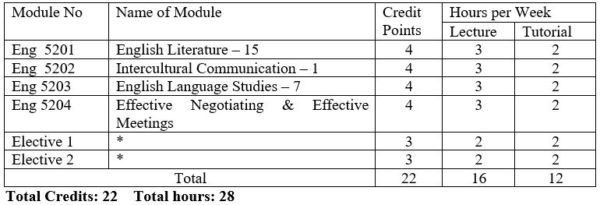
Core Courses
Eng 5201 English Literature – 15
Eng 5202 Intercultural Communication – 1
Eng 5203 English Language Studies – 7 (Introduction to Sociolinguistics and Psycholinguistics)
Eng 5204 Effective Negotiating and Effective Meetings
Elective Courses (for English Specialisation)
Eng 5205 World Literature in English – 1
Eng 5206 Communicative Skills – 9
Eng 5207 Business English – 5
Eng 5208 English for Hospitality and Tourism – 1
* An English specialisation student will have to take two electives (elective 1*and 2* ) from among those offered.

Core Courses
Eng 5209 English Literature – 16
Eng 5210 Intercultural Communication – 2
Eng 5211 English Language Studies – 8 (Introduction to Stylistics and Pragmatics)
Eng 5212 English in the Media
Elective Courses (for English Specialisation)
Eng 5213 World Literature in English – 2
Eng 5214 Communicative Skills – 10
Eng 5215 Business English – 6
Eng 5216 English for Hospitality and Tourism – 2
* An English specialisation student will have to take two electives (elective 1*and 2*) from among those offered.
AVIS was organized by Department of Zoology, University of Yangon, in collaboration with Japan Society for Promotion of Science and the Kyoto University Museum, Kyoto University, Japan.
Objectives of AVIS
1. Formation of Asian (ASEAN + East Asia) network / platform for Asian Vertebrate Species Diversity
2. Sharing the importance of specimens and museums Development of young researchers and students for sustainable biodiversity research
1. Kyoto University and University of Yangon International Symposium:
– 5th Dec, 2017
– Diamond Jubilee Hall, University of Yangon
2. JSPS Core-to-Core Program:
– 7th International Symposium on Asian Vertebrates Species Diversity
– 7th – 8th Dec, 2017
– Art Hall, University of Yangon
3. JSPS Core-to-Core Program:
– Field Training Workshop for Asian Vertebrate Species Diversity Research
– 8th – 9th Dec, 2017
– Hlawga Wildlife Park, Yangon
Department of Zoology, University of Yangon provides weekly lectures on Ecological Science in the Post Graduate Diploma in Environmental Study through the one year course.
Course contents:
1. Biodiversity and Ecosystems
2. Trophic level: Food chain and Food Web
3. Animal ecology: Diversity and population
4. Adaption and distribution
5. Myanmar IUCN Red List animal species and conservation strategy
– B.Sc (Zoology)
– B.Sc (Fisheries and Aquaculture)
– M.Sc (Zoology)
– M.Res (Zoology)
– PhD (Zoology)
– Annual special lectures will be delivered by professors and lecturers from Department of Biological Science, National University of Singapore (NUS)
PALEONTOLOGY SPECIALIZATION

Total Hour – 24
SYLLABUS
Geol 711P Biochronology & Paleoecology
Biochronology
Paleoecology
Geol 712P Advanced Invertebrate Paleontology
Geol 713P Vertebrate Paleontology & Paleobotany
Vertebrate Paleontology
Geol 714P Micropaleontology
* Four term papers and seminars are required; at least two should be from Module No. 711P
ECONOMIC GEOLOGY SPECIALIZATION
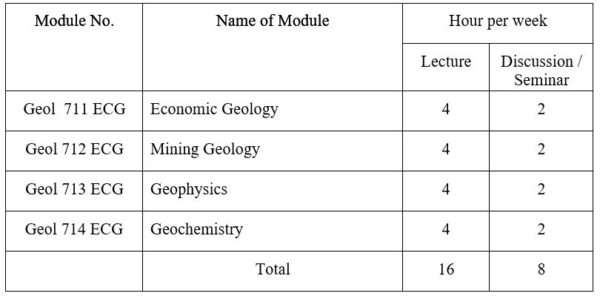
Total Hour – 24
SYLLABUS
Geol 711ECG Economic Geology
Geol 712ECG Mining Geology
Geol 713ECG Geophysics
Geol 714ECG Geochemistry
* Four term papers and seminars are required; at least two should be from Module No. 711ECG
SEDIMENTOLOGY SPECIALIZATION
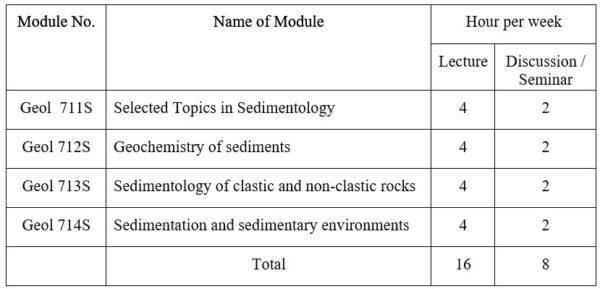
Total Hour – 24
SYLLABUS
Geol 711S Selected Topics in Sedimentology
Geol 712S Geochemistry of sediments
Geol 713S Sedimentology of clastic and non-clastic rocks
Geol 714S Sedimentation and sedimentary environments
* Four term papers and seminars are required; at least two should be from Module No. 711S
REGIONAL GEOLOGY SPECIALIZATION
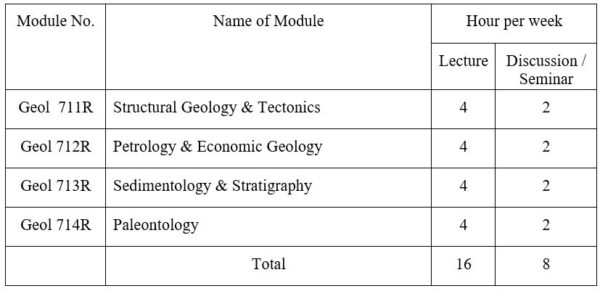
Total Hour – 24
SYLLABUS
Geol 711R Structural Geology & Tectonic
Geol 712R Petrology & Economic Geology
Geol 713R Sedimentology & Stratigraphy
Geol 714R Paleontology
*Four term papers and seminars are required; at least two should be from Module No. 711R
PETROLOGY SPECIALIZATION
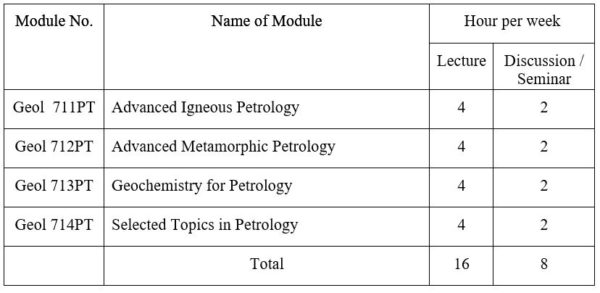
Total Hour – 24
SYLLABUS
Geol 711PT Advanced Igneous Petrology
Geol 712PT Advanced Metamorphic Petrology
Geol 713PT Geochemistry for Petrology
Geol 714PT Selected Topics in Petrology
* Four term papers and seminars are required; at least two should be from Module No. 711PT
ENGINEERING GEOLOGY SPECIALIZATION
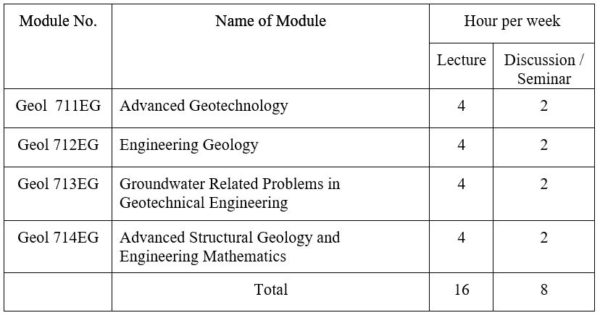
Total Hour – 24
SYLLABUS
Geol 711EG Advanced Geotechnology
Geol 712EG Engineering Geology
Geol 713EG Groundwater Related Problems in Geotechnical Engineering
Geol 714EG Advanced Structural Geology and Engineering Mathematics
* Four term papers and seminars are required; at least two should be from Moduke No. 711EG
HYDROGEOLOGY SPECIALIZATION
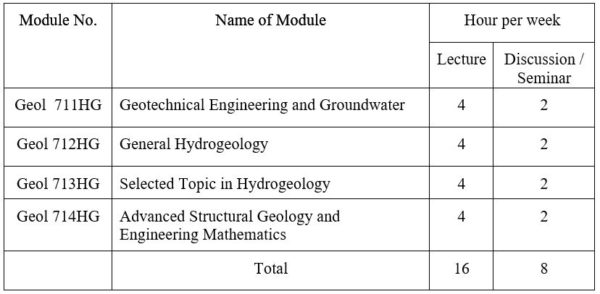
Total Hour – 24
SYLLABUS
Geol 711HG Geotechnical Engineering and Groundwater
Geol 712HG General Hydrogeology
(a) Hydrochemical sequences and facies
(b) Graphical methods and hydrochemistry
Geol 713HG Selected Topics in Hydrogeology
(a) Groundwater and Structural Geology
(b) Groundwater and Petroleum Geology
(c) Groundwater and Thermal Processes
(d) Groundwater and Economic Mineralization
Geol 714HG Advanced Structural Geology and Engineering Mathematics
* Four term papers and seminars are required; at least two should be from Module No. 711HG
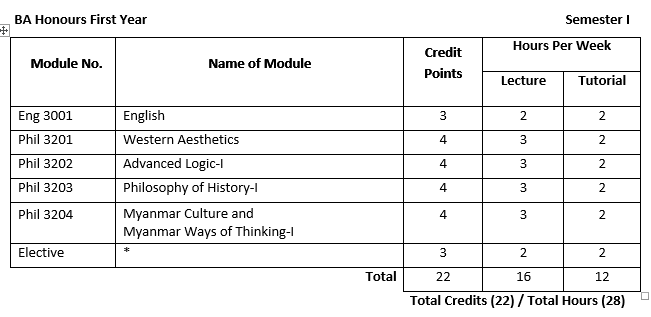
Eng 3001 (3) English
Phil 3201 (4) Western Aesthetics
Phil 3202 (4) Advanced Logic-I
Phil 3203 (4) Philosophy of History-I
Phil 3204 (4) Myanmar Culture and Myanmar Ways of Thinking-I
Phil 3206 (3) Ethics-I (Theoretical Ethics)
Lecture : (3) Hours per Week * (15) Weeks=(45) Hours
Tutorial/Discussion : (2) Hours per Week * (15) Weeks=(30) Hours
– This course aims at begin the nature and scope of aesthetics, difference between art and aesthetics, general characteristics of aesthetics, different kinds of art criticism and the introduction to some aesthetic movements and some philosophers’ view on aesthetics of western traditions in classical period, in transitional period, and in modern period from the philosophical perspective. In addition, the course will provide an orientation about the notion of aesthetics and its applied values in not only in the sphere of art works, it can be found out or appreciate in daily life’s experience of the people through comparison between the Western aesthetic theories and those of the East.
– The frame of the course bases on the topics of;
1. The Nature of Aesthetics
1.1. The definition of Aesthetics
1.2. The history of Aesthetics
1.3. Art and Aesthetics
1.4. Aesthetics and Art Criticism
2. Different Kinds of Art Criticism
3. Art and Society (Western Theories)
4. A Critical Study of Western Aesthetics
4.1. The Classical Period
4.2. The Transitional Period
4.3. The Modern Period
The main objectives of this course are
– The generic learning outcomes
After this study, students will be able to
– The specific learning outcomes
After this study, students will be able to
1. Aldrich, V. C. (1963). Philosophy of Art. Englewood Cliff: Prentice Hall, Inc.
2. Beardsley, M.E. (1966). Aesthetics from Classical Greece to the Present. New York: The Macmillan Company.
3. Commaraswamy, A. C. (1948). The Dance of Shivas. Calcutta, Asia Publishing House, Bombay.
4. Fisher, E. (1959). The Necessity of Art. London, Penguin Book Ltd.
5. Graham, Gordon. (2000). Philosophy of The Arts_An Introduction to Aesthetics_(2nd Edition). London & New York: Routledge.
6. Ridling, Zaine PhD. (2001). Philosophy Then and Now: A Look Back at 26 Centuries of Thought , Part III & IV. Access Foundation.
7. Stolnitz, J. (1981). Aesthetics and Philosophy of Art Criticism. New York, Houghton Mifflin Company.
8. နိုင်ဇော်။ (၂၀၁၀)။ အနုပညာ၏သရဖူကိုသွန်းလုပ်ခြင်း။ ရန်ကုန်၊ သီရိဝစ္ဆစာပေ။
Lecture : (3) Hours per Week * (15) Weeks=(45) Hours
Tutorial/Discussion : (2) Hours per Week * (15) Weeks=(30) Hours
– This course assumes to familiar with symbolic logic, including the meanings of the logical constants, translation from English into logical language, truth tables and a deductive proof system. The special symbols of logic are much better adapted than ordinary language to the actual process of inferences. The use of special technical symbols can also make the nature of deductive inference clear. This course covers some basic rules, concepts and skills of logic. Students will learn how to identify deductive arguments; how to use truth-tables, Polish, Quine methods and formal proof to check deductive validity. These skills have lifelong benefits for improving one’s writing, thinking, critical assessment of ideas and personal autonomy.
– The frame of the course bases on the topics of;
1. A Brief History of Logic
2. Truth Functional Logic
2.1. Simple and Compound Statements
2.2. The Nature of Implication
2.3. Argument Forms and Truth Tables
2.4. Truth-value Analyses
2.5. Tautologies, Contradictions and Contingencies
2.6. Material Equivalences
2.7. Testing Implications and Equivalences by Quine’s Method
3. The method of deduction
3.1. Formal Proof of validity
3.2. Incompleteness of the Nineteen Rules
3.3. The Rules of Conditional Proof
3.4. The Rule of Indirect Proof
3.5. Proof of Tautologies
3.6. Proving Invalidity
3.7. Shorter Truth Table Technique (Reductio ad Absurdum Method)
3.8. The Strengthened Rule of Conditional Proof
The main objectives of this course are
– The generic learning outcomes
After this study, students will be able to
– The specific learning outcomes
After this study, students will be able to
Lecture : (3) Hours per Week * (15) Weeks=(45) Hours
Tutorial/Discussion : (2) Hours per Week * (15) Weeks=(30) Hours
– This course aims to introduce the nature of philosophy of history, the difference between the historical knowledge and scientific knowledge, the idealist account of explanation in history, the nature of the correspondence and coherence theory and its role in history, and nineteenth century historical theories from some philosophers’ point of view.
– The frame of the course bases on the topics of;
1. The Nature of Philosophy of History
2. A Philosophical Study of Historical Problems
3. A study of some nineteenth century historical theories
3.1. Kant’s conception of history
3.2. Herder’s conception of history
The main objectives of this course are
– The generic learning outcomes
After this study, students will be able to
After this study, students will be able to
1. Carr, E. H. (1964). What is History. London: Cox and Warnan Ltd.
2. Collingwood, R. G. (1965). Essays in Philosophy of History. Texas: University of Texas Press.
3. Khaler, E. (1968). The Meaning of History (Meridian Book). New York: World Pub. Co.
4. Popper, K. R. (1969). The Poverty of Historicism, London: Routledge and Kegan Paul.
5. Walsh, W. H. (1967). An Introduction to Philosophy of History. London, Hutchinson University Library.
Lecture : (3) Hours per Week * (15) Weeks=(45) Hours
Tutorial/Discussion : (2) Hours per Week * (15) Weeks=(30) Hours
– This course aims to introduce salient features of Myanmar culture and philosophical thought. This course will provide an overview of Myanmar thought on reality, knowledge, and morality. In this course, some Myanmar proverbs and categories of dialectic method indicates a right way for the achievement of success in human’s thoughts and actions. In addition, Myanmar proverbs synthesize the opposites not to go the extremes and to have right actions in all deeds. The philosophical outlooks can be reduced from Myanmar proverbs.
– The frame of the course bases on the topics of;
1. Nature and Definition of Myanmar Culture
2. Nature of Myanmar Way of Thinking
3. Philosophical impact on Myanmar Traditional Festival
4. Myanmar Thought on Reality
5. Myanmar Thought on Knowledge
6. Myanmar Thought on Morality
7. Myanmar Proverbs and Categories of Dialectic Method
The main objectives of this course are
– The generic learning outcomes
After this study, students will be able to
– The specific learning outcomes
After this study, students will be able to
1. Burma Piṭaka Association. (1987). Digha Nikãya-Long Discourses of the Buddha. Tokyo: Bukkyo Dendo Kyokai (Buddhist Promoting Foundation) (Reproduced and co-distributed).
2. K. (2006). Myanmar Culture. Yangon: Today Publishing.
3. Khin Myo Chit. (1995). Colorful Myanmar. Yangon: Parami Sarpay.
4. Hla Pe, Dr. (1962). Myanmar Proverbs. London: John Murray.
5. Htin Aung, Dr. (1962). Folk Element in Myanmar Buddhism. London: Oxford University Press.
6. Ledi Sayadaw. (1965). Manual of Buddhism. Rangoon: Buddha Sasana Council.
7. Nakamura, Hajime. (1964). Ways of Thinking of Eastern People. Honolulu: East-West Center Press.
8. Shwe Zan Aung. (1956). Compendium of Philosophy. London: Luzac & Co Ltd.
9. Taw Sein Ko. (1913). Burmese Sketches. Rangoon: British Burma Press.
10. စန္ဒာဆွေ။(၁၉၇၇)။စကားပုံကပြောသောဒဿန။ရန်ကုန်၊စိန်ကြည်ပုံနှိပ်တိုက်။
11. သာသနာရေးဝန်ကြီးဌာန။(၁၉၉၇)။ပါထိကဝဂ်ပါဠိတော်-မြန်မာပြန်။ရန်ကုန်မြို့၊သာသနာရေးဝန်ကြီးဌာန၊ သာသနာရေးဦးစီးဌာန။
Lecture : (2) Hours per Week * (15) Weeks=(30) Hours
Tutorial/Discussion : (2) Hours per Week * (15) Weeks=(30) Hours
– The chief aims of the course are to know the fundamental theory of ethics, the nature and scope of moral philosophy. And then how to define human conduct as good or bad and right and wrong from the ethical point of views. It can study why it is needed to relate an ethical theories and applied ethics in human daily life. Finally, ethics is a dynamic, evolving field of knowledge for applying, balancing, and modifying principles in light of new facts, new technology, new social attitudes and changing economic and political conditions.
– The frame of the course bases on the topics of;
1. The Nature and Scope of Ethics
2. The Fundamental Concepts of Ethical Problems
3. A General Study of Some Western Ethical Theories
4. A General Study of Some Eastern Ethical Theories
4.1. Indian Ethics
4.2. Chinese Ethics
4.3. Japanese Ethics
The main objectives of this course are
– The generic learning outcomes
After this study, students will be able to
– The specific learning outcomes
After this study, students will be able to
1. Fung Ya-Lan. (1948). A Short History of Chinese Philosophy. New York: The Macmillan Company.
2. Fung Yu-Lan. (1962). The Spirit of Chinese Philosophy. (Translated by Hughes). Boston: E. R. Beacon press.
3. Huxley, A. (Translated by Swami Prabhavamanda and Christopher Isherwood). (1954). Bhagava Gita. The new American Library.
4. Kaufman, Walter. (1975). Existentialism from Dosteusky to Sartre. New York: New American Library.
5. K. Piovesana S. J., Gino. (1997). Recent Japanese Philosophical Thought. Tokyo: Japanese Library.
6. Lillie, William. (1948). An Introduction of Ethics. New York: Methuen and Noble Inc.
7. Magill, Franh N. & Jan P Mcgreal. (1981). Masterpieces of World Philosophy. New York: Harper & Row, Publishers.
8. Melden, A.J. (1955). Ethical Theories. Prentice-hall Inc.
9. Robinson, Dave and Chris Garratt. (1999). Introducing Ethics. UK. Icon Books Ltd.
10. Ryusaku Tsunoda & Wm. Theodore de Bary. (1958). Sources of Japanese Tradition. New York: Columbia University Press.
11. Sharma, I.C. (1965). Ethical philosophies of India. New York: George Allen and Unwin.
12. Theodore de Bary, William. (edt.) (1958). Sources of Japanese Tradition. New York: Columbia University Press.
13. Theodore de Bary, William. (edt.) (1964). Source of Indian Tradition. New York: Columbia University Press.
14. Titus, H.H. (1966). Ethics for Today. New Delhi: Eurasia Publishing House.
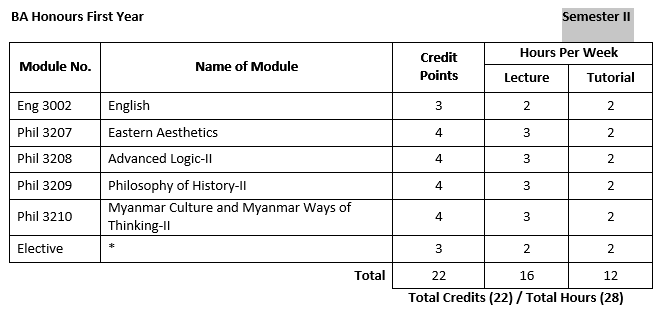
Eng 3002 (3) English
Phil 3207 (4) Eastern Aesthetics
Phil 3208 (4) Advanced Logic-II
Phil 3209 (4) Philosophy of History-II
Phil 3210 (4) Myanmar Culture and Myanmar Ways of Thinking-II
Phil 3212 (3) Ethics-II (Applied Ethics)
Lecture : (3) Hours per Week * (15) Weeks=(45) Hours
Tutorial/Discussion : (2) Hours per Week * (15) Weeks=(30) Hours
– This course aims at being an introduction to aesthetics of Eastern tradition such as Indian, Chinese, Japanese, and Myanmar art or aesthetic theories from the philosophical perspective. In addition, the course will provide an orientation about the notion of aesthetics and its applied values in not only in the sphere of art works, it can be found out or appreciate in daily life’s experience of the people through comparison between the Western aesthetic theories and those of the East.
– The frame of the course bases on the topics of;
1. A Study of Some Eastern Aesthetics
1.1. Indian Aesthetics
1.2. Chinese Aesthetics
1.3. Japanese Aesthetics
2. Myanmar Aesthetics
2.1. Introduction to Myanmar Aesthetics
2.2. Zayya’s View on Art
2.3. Zawgyi’s View on Art
2.4. Dagon Taryar’s View on Art
2.5. Letwae Minnyo’s View on Art
2.6. Min Thu Wun’s View on Art
2.7. Shwe Don B Aung’s View on Film
2.8. Director U Thu Kha’s View on Film and Art
2.9. Bagyi Aung Soe’s View on Art
S
The main objectives of this course are
– The generic learning outcomes
After this study, students will be able to
– The specific learning outcomes
After this study, students will be able to
knowledge of value judgment in their daily lives
1. Aldrich, V. C. (1963). Philosophy of Art. Prentice Hall, Inc., Englewood.
2. Commaraswamy, A. C. (1948). The Dance of Shivas. Bombay, Calcutta: Asia Publishing House.
3. Graham , Gordon. (2000). Philosophy of The Arts_An Introduction to Aesthetics_(2nd Edition). London & New York: Routledge.
4. Lin Yutang. (1969). The Chinese Theory of Art. London, England: Panther Book.
5. Stanley-Baker, Joan. (1988) Japanese Art, London: Thames and Hudson Ltd.
6. Stolnitz, J. (1981) Aesthetics and Philosophy of Art Criticism. U. S. A: Houghton Mifflin Company.
7. Suzuki, D.T. (1959). Zen and Japanese Culture. Princeton: Princeton University Press.
8. Theodore de Bary, William. (edt.). (1958). The Sources of Japanese Tradition. Vol.1, New York and London: Columbia University Press.
9. Theodore de Bary, William. (edt.). (1980). Sources of Chinese Tradition. New York: Columbia University Press.
10. Ueda Makoto. (1967). Literary and Art Theories in Japan. Cleveland: Press of Western Reserve University.
11. Xu Yuanxiang. (2007). Lao Tzu: The Eternal Tao Te Ching. Beijing: China International Press.
12. Zaw Lynn . (2002). “Contemporary Myanmar Painting as Art in Its Second Function”, Research Journal of the Arts and Science Vol. I: Arts & Humanities. Yangon: University Press.
Lecture : (3) Hours per Week * (15) Weeks=(45) Hours
Tutorial/Discussion : (2) Hours per Week * (15) Weeks=(30) Hours
– This course can be applied to establish the validity or invalidity of the arguments whose components are the truth-functionally compound statements cannot be applied to the arguments whose components are not compounds. The special symbols of logic are much better adapted than ordinary language to the actual process of inferences. The use of special technical symbols can also make the nature of deductive inference clear. The arguments are symbolized and proved by using nineteen Rules of inference, the strengthened Rule of Conditional Proof, four Quantification Rules and Quantifier Negation.
– The frame of the course bases on the topics of;
1. Quantification Theory
2. Extended Theory of Quantification
3. Theory of Relations
4. Two types of deductive systems
4.1. Propositional calculus
4.2. Class calculus
5. Boolean Expansion
The main objectives of this course are
– The generic learning outcomes
After this study, students will be able to
– The specific learning outcomes
After this study, students will be able to
1. Bernnan, J. G. A Handbook of Logic. New York: Harper & Row.
2. Copi, I. M. Symbolic Logic (Fifth Edition). London: The Macmillan Company,
3. Faris, J. A. (1964). Quantification Theories. London: Routledge & Kegan Paul.
4. Kar, K. N. and U Hla Bu., (1963). A Text Book of Modern Formal Logic (Third Edition). Yangon: Rangon University Press.
5. Layman, C. Stephen. (2005). The Power of Logic. New York: Mc Graw Hill Co, Inc.
6. Quine, W. V. O. (1962). Method of Logic (Second Edition). London: Routledge & Kegan Paul.
7. Purtill, R. L. (1971). Logic for Philosophers, New York: Harper & Row.
Lecture : (3) Hours per Week * (15) Weeks=(45) Hours
Tutorial/Discussion : (2) Hours per Week * (15) Weeks=(30) Hours
– This course aims to introduce philosophy of history and examine the theoretical foundations of the practice, application, and social consequences of history with special reference to some nineteenth and twentieth century philosophers.
– The frame of the course bases on the topics of;
1. A Study of Some Nineteenth Century Historical Theories
1.1. Georg Wilhelm Friedrich Hegel
1.2. Karl Marx
2. A Study of Some Twentieth Century Philosophy of History
2.1. Leo Tolstoy
2.2. Oswald Spengler
2.3. Arnold Joseph Toynbee
2.4. E. H. Carr
3. Wave Theory of Alvin Toffler
The main objectives of this course are
– The generic learning outcomes
– The specific learning outcomes
After this study, students will be able to
1. Atkinson, R. F. (1978). Knowledge and Explanation in History. New York: Macmillan Education Ltd.
2. Carr, E. H. (1964). What is History. Cox and Warnan Ltd.
3. Collingwood, R. G. (1965). Essays in Philosophy of History. Texas: University of Texas Press.
4. Hegel, G. W. F. (1956). The Philosophy of History. New York: Dover Publications, INC.
5. Khaler, E. (1968). The Meaning of History. Meridian Book.
6. Popper, K. R. (1969). The Poverty of Historicism. London: Routledge and Kegan Paul.
7. Walsh, W. H. (1958). An Introduction to Philosophy of History. London: Hutchinson University Library.
8. Toffler, Alvin. (1982). The Third Wave. New York: Bantan Books.
9. Tolstoy, L. (1970). War and Peace. New York: Macmillan Lid.
Lecture : (3) Hours per Week * (15) Weeks=(45) Hours
Tutorial/Discussion : (2) Hours per Week * (15) Weeks=(30) Hours
– This course aims to introduce Myanmar view on the causal relation with reference to some Myanmar scholars. It can also be studied humanism in Myanmar literature, Myanmar philosophical view on history and Myanmar cultural traditions. In addition, this course highlights logical reasoning and aesthetic value of Myanmar literature especially in Myanmar riddles and poems. More specifically, this course examines the ethics, logic, and aesthetic value of Myanmar cultural heritage.
– The frame of the course bases on the topics of;
1. Myanmar View on Cause and Effect
2. Humanism in Myanmar Literature
3. Myanmar Philosophical View on History
4. Filial piety in Myanmar Tradition
5. Logical Reasoning in Myanmar Riddles
6. The Role of Myanmar Poems in Environmental Aesthetics
The main objectives of this course are
– The generic learning outcomes
After this study, students will be able to
– The specific learning outcomes
After this study, students will be able to
1. Ba Han, Dr. (edt.). (1964). Shin Uttamagyaw’s Tawla and Letwethondara’s Radus. Rangoon: The Hanthawaddy Press. (In Burmese by U Thein Han and U Wun)
2. Burma Piṭaka Association. (1987). Digha Nikãya-Long Discourses of the Buddha. Tokyo: Bukkyo Dendo Kyokai (Buddhist Promoting Foundation) (Reproduced and co-distributed).
3. Carlson, A. (2000). Aesthetics and the Environment: The Appreciation of Nature, Art and Architecture. London: Routledge.
4. Goodman, Nelson (1976): Languages of Art, Indianapolis, IN: Hackett.
5. Hla Pe. (1985). “Riddles” (Part E- On Life), BURMA: Literature, Historiography, Scholarship, Language, Life, and Buddhism. Presented to a Seminar at the School of Oriental and African Studies (University of London). Singapore: Institute of South East Asian Studies. ISBN 9971-988 003.
6. Htin Aung, Dr. (1962) Folk Element in Myanmar Buddhism. London: Oxford University Press.
7. K. (2006). Myanmar Culture. Yangon: Today Publishing.
8. Khin Myo Chit. (1995). Colorful Myanmar. Yangon: Parami Sarpay.
9. Kyi Kyi Hla, Daw. (2004). A Myanmar Tapestry (A Collection of Articles on Myanmar): Yangon: Taw Win Publishing House.
10. Kyi Kyi Hla, Daw. (2010). The Ethics of Environmental Conservation. Yangon: Publication Committee, The Myanmar Academy of Arts and Science.
11. Ledi Sayadaw. (1965). Manual of Buddhism, Rangoon: Buddha Sasana Council.
12. Shwe Zan Aung. (1956). Compendium of Philosophy. London: Luzac& Co Ltd.
13. Taw Sein Ko. (1913). Burmese Sketches. Rangoon: British Burma Press.
Lecture : (2) Hours per Week * (15) Weeks=(30) Hours
Tutorial/Discussion : (2) Hours per Week * (15) Weeks=(30) Hours
– The chief aims of the course are to know the fundamental theory of ethics, the nature and scope of moral philosophy. And then how to define human conduct as good or bad and right and wrong from the ethical point of views. It can be studied why it is needed to relate an ethical theories and applied ethics in human daily life. Finally, ethics is a dynamic, evolving field of knowledge for applying, balancing, and modifying principles in light of new facts, new technology, new social attitudes and changing economic and political conditions.
– The frame of the course bases on the topics of;
1. Introduction
2. Contemporary Ethical Issues
3. Current Ethical Issues in Myanmar
4. Guidelines Provided by the Cognitive Beliefs and Moral Values of Myanmar Theravada Buddhist Culture for Resolving Ethical Conflicts and Issues
4.1. The Brahma Vihara Dhamma As A Moral Norm
4.2. The Mangala Sutta as an Ethical Principle
4.3. The Law of Kamma as an Ethical Principle
The main objectives of this course are
The generic learning outcomes
After this study, students will be able to
– The specific learning outcomes
After this study, students will be able to
1. Engel, J. Ronald & Joan Gibb Engle (edited). (1993). Ethics of Environment and Development. Tucson & London: The University of Arizona Press.
2. Kar, K. N. (1950). Ethics. Rangon: Sarpay Beikman Press.
3. Kyi Kyi Hla, Daw. (2010). The Ethics of Environmental Conservation. Yangon: Myanmar Academy of Arts and Science.
4. Gonsalves, Milton A. (1989). Right and Reason. London: The Macmillan Co.
5. Sīlānandābhivamsa, U. (2000). Paritta Pāli & Protective Verses. Yangon: International Theravāda Buddhist Missionary University.
6. Thiroux, Jacques P. (1980). Ethics: Theory and Practice. New York: Macmillan Publishing.
7. UNESCO. (2004). Ethics in Asia-Pacific. Bangkok: UNESCO.
Core Courses
Phil 4101 – Philosophy of Religion-I
Phil 4102 – Problems of Philosophy-I
Phil 4104 – Research Methodology in Philosophy-I
Phil 4105 – Twentieth Century Eastern Philosophy-I
Phil 4106 – Political Philosophy (West)
Elective Courses (for Philosophy Specialization)
Phil 4103 – Philosophy of Science-I
Phil 4113 – Philosophy of Language-I
Core Courses
Phil 4101 – Philosophy of Religion-II
Phil 4102 – Problems of Philosophy-II
Phil 4114 – Research Methodology in Philosophy-II
Phil 4115 – Twentieth Century Eastern Philosophy-II
Phil 4116 – Political Philosophy (East)
Note: The Final Year Student have to submit their Term Paper two weeks ahead of their final examination as a part of necessary procedures for completion their degree. The TP should be created with their research finding of field study or literature survey.
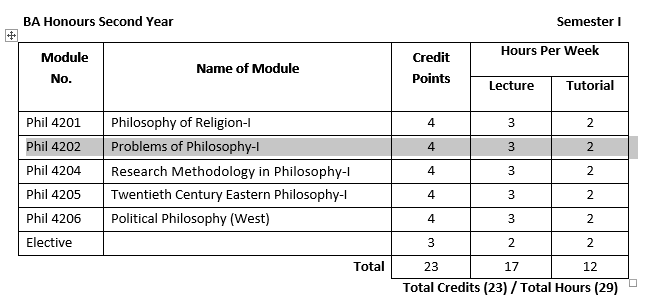
Phil 4201 (4) Philosophy of Religion-I
Phil 4202 (4) Problems of Philosophy-I
Phil 4204 (4) Research Methodology in Philosophy-I
Phil 4205 (4) Twentieth Century Eastern Philosophy-I
Phil 4206 (4) Political Philosophy (West)
Phil 4213 (3) Philosophy of Language-I
Lecture : (3) Hours per Week * (15) Weeks=(45) Hours
Tutorial/Discussion : (2) Hours per Week * (15) Weeks=(30) Hours
– This course aims to introduce the several definitions of religion from the philosophical perspective. This course contains the four major religions of the world and their theoretical and practical principles will be studied elaborately from the approach of philosophy of religion. In addition, the course will provide the knowledge of what are the differences between religion and theology and how religion has made a great contribution in moral cultivation of humankind that is essential for building peace and order of human societies since earliest times of human culture.
– The frame of the course bases on the topics of;
1. Introduction to Philosophy of Religion
2. Approaches to Philosophy of Religion
3. The Four Religions of the World and their Philosophical Trends
4. Analytical Study of Philosophy of Religion
5. The Critical Examination of the Philosophy of Religion
The main objectives of this course are
– The generic learning outcomes
After this study, students will be able to
– The specific learning outcomes
After this study, students will be able to
1. Adams, James L. (1976). On Being Human Religiously: Selected Essays in Religion and Society. New York: Beacon Press.
2. Cheney, Sheldon. (1974). Men Who Have Walked with God. New York: Delta.
3. Elidae, Mircea. (1973). Patterns in Comparative Religion. New York: Sheed and Word.
4. Hick, John. (1973). Philosophy of Religion. 2nd ed. Englewood Cliffs, N.J.: Prentice-Hall.
5. James, William. (1958). Varieties of Religious Experience. New York: Mentor.
6. Kitagawa, Joseph M. (1968). Religions of the East. Philadelphia. Westminister.
7. Pojman, Louis P. (1998). Philosophy of Religion: An Anthology. New York: wadsworth Publishing Co.
8. Chad Meister, (2009). Introducing Philosophy of Religion, London and New York: Routledge.
9. Pojman, Louis P. (2001). Philosophy: The Pursuit of Wisdom, US: Wadsworth, Thomson Learning.
10. Thiroux, Jacques P. (1980). Philosophy: Theory and Practice. New York: Macmillan Publishing. Company
Lecture : (3) Hours per Week * (15) Weeks=(45) Hours
Tutorial/Discussion : (2) Hours per Week * (15) Weeks=(30) Hours
– This course aims to introduce the nature of philosophical problems by focusing on the epistemological problems and problems concerning truth such as reason versus perception, intuition, testimony, the correspondence theory, the coherence theory, and the pragmatic theory.
– The frame of the course bases on the topics of;
1. The Nature of Philosophical Problems
2. A Study of Some Epistemological Problems
2.1. The Problem Concerning the Origin and Source of Knowledge
2.1.1. Reason Versus Perception
2.1.2. Intuition
2.1.3. Testimony
2.2. Problem of Truth
2.2.1. The Correspondence Theory
2.2.2. The Coherence Theory
2.2.3. The Pragmatic Theory
The main objectives of this course are
– The generic learning outcomes
After this study, students will be able to
– The specific learning outcomes
After this study, students will be able to
1. Blackwood, R. T. (1975). Problems in Philosophy: West and East. Englewood Cliffs: Prentice Hall.
2. Chatterjee. (1949). The Problems of Philosophy. Calcutta: Das Gupta.
3. Hartnack, J. (1962). Philosophical Problem- A Modern Introduction, Copenhagen: Munkasggaard.
4. Hirst, R. J. (1959). The Problem of Perception. London: Allen and Unwin.
5. Rachels, James. (2004). Problems from Philosophy. New York: Mc Graw Hill.
6. Ridling, Zaine PhD. (2001). Philosophy Then and Now: A Look Back at 26 Centuries of Thought . Part IV. Access Foundation.
7. Stumpf, Samuel Enoch & James Fieser. (2003). Philosophy: History and Problems.New York:Mc Graw Hill.
Lecture : (3) Hours per Week * (15) Weeks=(45) Hours
Tutorial/Discussion : (2) Hours per Week * (15) Weeks=(30) Hours
– This course aims to introduce the nature and role of research to students through studying concepts and methodological significance of philosophical research. To facilitate students how to construct a research proposal with its essential components such as research problem, hypothesis, methods, finding, principle and contribution. It also includes the study of types of research, methods of thinking, data collection and literature review.
– The frame of the course bases on the topics of;
1. The Nature and Role of Research in Conceptual Learning
2. A General Study of Research Methodology
2.1. Research Problem
2.2. Research Hypothesis
2.3. Research Methods
2.4. Research Finding
2.5. Research Principle
2.6. Contribution
2.7. Definitions of Key words
3. Ways of Thinking and Research Methodology
– Methods of Thinking
4. What is a Research Problem?
– Data Collection and Literature Review
The main objectives of this course are
– The generic learning outcomes
After this study, students will be able to
– The specific learning outcomes
After this study, students will be able to
1. Bloomberg, Linda Dale & Marie Volpe. (2012). Completing Your Qualitative Dissertation _A Road Map from Beginning to End_, 2nd Edition. Thousand Oaks, CA: SAGE Publications, Inc.
2. Creswell, John.W. (1994). Research Design: Qualitative & Quantative Approaches. London: International Educational and Professional Publisher.
3. Feinberg, Joel. (2002). Doing Philosophy, A Guide to the Writing of Philosophy Paper. Belmont, CA: Wadsworth/ Thomson Learning.
4. Good, C. V. & D. E. Scatws. (1979). Methods of Research. New York: Appleton Century Croft Inc.
5. Hansen, Kristine. (2003). Writing in the Social Sciences. USA: Pearson Custom Publishing.
6. Robert, Carol M. (2004). The Dissertation Journey. London: Sage Publications Co
Lecture : (3) Hours per Week * (15) Weeks=(45) Hours
Tutorial/Discussion : (2) Hours per Week * (15) Weeks=(30) Hours
– The chief aims of the course are to introduce the general features and specific ideas of Twentieth Century Eastern philosophy and philosophers. In this course the nature and scope of Indian philosophy and its close relation to cultural practice has deeply rooted in Hinduism. To encourage students’ more comprehensive review on “Significant Views of Outstanding Indian Philosopher, students’ preparation of reading primary or secondary sources thoroughly will be demanded.
– The frame of the course bases on the topics of;
1. A Brief Study of the Background of Indian Thought
2. A Critical Study of the Outstanding Indian Philosophers’ views
2.1. The Philosophy of Sarvepalli Radhakrishnan
2.2. The Philosophy of Sri Aurobindo
2.3. The Philosophy of Rabindranath Tagore
2.4. The Philosophy of Mahatma Gandhi
The main objectives of this course are
– The generic learning outcomes
After this study, students will be able to
– The specific learning outcomes
After this study, students will be able to
1. Dasgupta, S. (1965). Development of Moral Philosophy in India. New York: Frederick Ugra Publishing Co.
2. Radhakrishnan, S. (Edited). (1952) Contemporary Indian Philosophy. London: George Allen & Unwin.
3. Radahakrishnan, S. & C. A. Moore (Edited). (1957). A Source Book in Indian Philosophy. Princeton University Press.
4. Theodore de Bary, William & others (edt. & Compiled). (1959). A Source Book in Indian Philosophy. Columbia University Press.
Lecture : (3) Hours per Week * (15) Weeks=(45) Hours
Tutorial/Discussion : (2) Hours per Week * (15) Weeks=(30) Hours
– This course aims to introduce political philosophy of the west in general rather than to provide a full survey of origin, problem, value and essential political concepts of western political philosophy. This course give comprehensive accounts from ancient Greek to recent political thinkers, formulate their views and how they grapple with their political views. In addition, the course will provide a preliminary orientation about the notion of political argument, its various forms and the ways should be analyzed.
– The frame of the course bases on the topics of;
1. Introduction to Political Philosophy
2. Essential Political Concepts
3. Ancient Greek and Roman Political Institutions and Political Philosophy
4. Medieval Political Philosophy
5. Modern Political Philosophies
6. Social Contract Theories
7. Political Theories of the French Revolution
8. Political Philosophy of Adam Smith and Malthus
9. Marxist Political Thought
10. Recent Political Thoughts
The main objectives of this course are
– The generic learning outcomes
After this study, students will be able to
– The specific learning outcomes
After this study, students will be able to
1. Aristotle. (Jowett, Benjamin (trans.)). (1900). The Politics. New York: The Colonial Press.
2. Fukuyama, Francis. (2011). The Origins of Political Order. Nwe York: Farrar, Straus and Giroux.
3. Fukuyama, Francis. (2014). The Origins of Political Decay. Nwe York: Farrar, Straus and Giroux.
4. Gettell, Raymond G. (1953). History of Political Thought. London: George Allen & Unwin Ltd.
5. Goodin, Robert E. (2007). A Companion to Contemporary Political Philosophy Vol .I&II. (Second Edition). Backwell Publishing Ltd.
6. Nelson, Brain R. (2009). Western Political Thought. Delhi: Dorling Kindersley (India) Pvt, Ltd.
7. Sabine, George H. (1963). A History of Political Theory. London: George G. Harrap & Co. Ltd.
Lecture : (2) Hours per Week * (15) Weeks=(30) Hours
Tutorial/Discussion : (2) Hours per Week * (15) Weeks=(30) Hours
– The purpose of this module is to introduce what philosophy of language is and to convey the development of Philosophy of Language in the West. Students will have the chance to study the significant transitional points of linguistic turn in the West from philosophical point of view from the time of ancient Greek to the Postmordern (developed in the mid-to late 20th century).
– The frame of the course bases on the topics of;
1. Introduction to Philosophy of Language
1.1. Philosophy and Language
1.2. Language and Thought
1.3. Nature, Function and Scope of Philosophy of Language
2. Western Philosophical Perspectives on Language
2.1. Ancient Greek
2.2. Early Modern Period
3. The Linguistic Turn of Western Philosophy
4. Structuralism, Postmodernism and Deconstructionism
The main objectives of this course are
– The generic learning outcomes
After this study, students will be able to
– The specific learning outcomes
After this study, students will be able to
1. Alston, William P. (1964). Philosophy of Language. Prentice-Hall Inc.
2. Cassirer, Ernst. (1953). An Essay on Man. New York: Anchor Book.
3. Garvey, James & Jeremy Stangroom. The Story of Philosophy: A History of Western Thought. Quercus Book.
4. Magee, Bryan. (2011).The Story of Philosophy. Singapore: Dorling Kindersley Book.
5. Morris, Michael. (2006). An Introduction to the Philosophy of Language. Cambridge University Press.
6. Morris, Charles. (1964). Signification and Significance. Cambridge: M.I.T Press.
7. Pike, Kenneth L. (1993). Talk Thought and Think. U.S. A: Sil International, Global Publishing.
8. Sawyer, Sarah (edt). (2010). New Waves in Philosophy of Language. Macmillan.
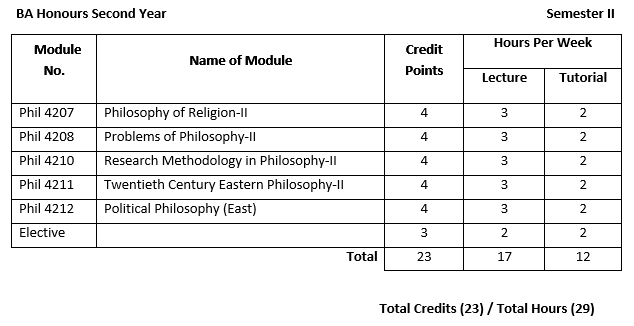
Phil 4207 (4) Philosophy of Religion-II
Phil 4208 (4) Problems of Philosophy-II
Phil 4210 (4) Research Methodology in Philosophy-II
Phil 4211 (4) Twentieth Century Eastern Philosophy-II
Phil 4212 (4) Political Philosophy (East)
Phil 4214 (3) Philosophy of Language-II
* As the BA Honours degree course, Students require to submit a term paper which is necessarily linked to the Two core modules (Phil 4104/Phil 4110: Research Methodology in Philosophy-I/II) at BA Honours third year.
Module No. : Phil 4207
Module Name : Philosophy of Religion-II
TOTAL HOURS : (75) Hours
Lecture : (3) Hours per Week * (15) Weeks=(45) Hours
Tutorial/Discussion : (2) Hours per Week * (15) Weeks=(30) Hours
– This course aims to introduce history and philosophy of religion and to promote students’ understanding of the diverse religions with comparative study and critical examination of the nature of philosophy of religion. Though the course bases on the thorough study of the various religious problems come from their particular nature and cultural backgrounds, Buddhism will be highlighted because of its unique philosophical nature.
– The frame of the course bases on the topics of;
1. History and Philosophy of Religion
2. History of Buddhism
3. Buddhism as Philosophy and Buddhism as Religion
4. A Comparative Study of Religion
5. The Critical Examination of Philosophy of Religion
The main objectives of this course are
– The generic learning outcomes
After this study, students will be able to
– The specific learning outcomes
After this study, students will be able to
1. Adams, James L. (1976). On Being Human Religiously: Selected Essays in Religion and Society. New York: Beacon Press.
2. Cheney, Sheldon. (1974). Men Who Have Walked with God: New York: Delta.
3. Earhart, H Byron. (1982). Japanese Religion, California: Wadsworth Publishing Company.
4. Elidae, Mircea. (1973). Patterns in Comparative Religion: New York: Sheed and Word.
5. Hick, John. (1973). Philosophy of Religion. 2nd ed. Englewood Cliffs, N.J.: Prentice-Hall.
6. James, William. (1958). Varieties of Religious Experience. New York: Mentor.
7. Kitagawa, Joseph M. (1968). Religions of the East. Philadelphia. Westminister.
8. Miller, Edward L. (1972). God and Reason: A Historical Approach to Philosophical Theory. New York: Macmillan.
9. Needleman, Jacob. (1970). The New Religions. New York: Doubleday.
10. Vries, Jan De. (1967). The Study of Religion: New York: Harcourt Brace Jovanovich.
Lecture : (3) Hours per Week * (15) Weeks=(45) Hours
Tutorial/Discussion : (2) Hours per Week * (15) Weeks=(30) Hours
– This course will provide the effective way of studying philosophical problems through the topics found in the ontological problems and ethical problems such as the problem of Being and Becoming, substance, human nature, individual and society and human freedom and determinism.
– The frame of the course bases on the topics of;
1. A Study of Ontological problems
1.1. The problem of Being and Becoming
1.2. The problem of Substance
2. Ethical problem
2.1. The problem of human nature
2.2. The problem of Individual and society
2.3. The problem of human freedom and determinism
The main objectives of this course are
– The generic learning outcomes
After this study, students will be able to
– The specific learning outcomes
After this study, students will be able to
1. Blackwood, R.T. & A.L. Herman (edtd). (1975). Problems in Philosophy: West and East. Englewood Cliffs, N.J.: Prentice-Hall.
2. Hartnack, J. (1962). Philosophical Problem-A Modern Introduction. Munkasggaard, Copenhagen.
3. Hirst, R. J. (1959). The Problem of Perception. London, Allen and Unwin.
4. Rachels, James. (2004). Problems from Philosophy. New York: Mc Graw Hill.
5. Ridling, Zaine PhD. (2001). Philosophy Then and Now: A Look Back at 26 Centuries of Thought , Part IV. Access Foundation.
6. Stumpf, Samuel Enoch & James Fieser. (2003). Philosophy: History and Problems. New York: Mc Graw Hill.
Lecture : (3) Hours per Week * (15) Weeks= (45) Hours
Tutorial/Discussion : (2) Hours per Week * (15) Weeks= (30) Hours
– This course aims to empower the students to write the research paper practically. Hence, how to write essential components of a research proposal and how to complete their paper will be highlighted. In order to achieve this purpose, student will be demanded for going field trip (urban or rural) and doing data collection (literature survey, interview, and questionnaire) as compulsory activities.
– The frame of the course bases on the topics of;
1. The Writing of an Abstract
2. The Entry of Notes, Bibliography, Diagrams, Illustration, Contents
3. Principles of Usage (Words, Citation, Quotation, and so forth)
4. Ethical Consideration
The main objectives of this course are
– The generic learning outcomes
After this study, students will be able to
– The specific learning outcomes
After this study, students will be able to
1. Bloomberg, Linda Dale & Marie Volpe. (2012). Completing Your Qualitative Dissertation _A Road Map from Beginning to End_, 2nd Edition. Thousand Oaks, CA: SAGE Publications, Inc.
2. Creswell, John.W. (1994). Research Design: Qualitative & Quantative Approaches. London: International Eductional and Professional Publisher.
3. Feinberg, Joel. (2002). Doing Philosophy, A Guide to the Writing of Philosophy Paper. Belmont, CA: Wadsworth/ Thomson Learning.
4. Good, C. V. & D. E. Scatws. (1979). Methods of Research. New York: Appleton Century Croft Inc.
5. Hansen, Kristine. (2003). Writing in the Social Sciences. USA: Pearson Custom Publishing.
6. Robert, Carol M. (2004). The Dissertation Journey. London: Sage Publications Co.
Lecture : (3) Hours per Week * (15) Weeks= (45) Hours
Tutorial/Discussion : (2) Hours per Week * (15) Weeks= (30) Hours
– The chief aims of the course are to have more understanding the philosophies of significant Japanese and Chinese philosophers of the Twentieth Century. The course will be highlighted on some particular and important concepts and thoughts in Twentieth Century Japanese and Chinese philosophies. Students will have opportunity to upgrade their knowledge of Japanese and Chinese philosophies more deeply through this course.
– The frame of the course bases on the topics of;
1. Nishida’s Philosophy of Mu
2. A Critical Study of the Outstanding Japanese Philosophy
3. A Brief Study of the Background of Chinese Thought
4. A Critical Study of the Writing of the Outstanding Japanese Philosophers
5. General Characteristics and Evaluation of Contemporary Eastern Philosophy
The main objectives of this course are
– The generic learning outcomes
After this study students will be able to
– The specific learning outcomes
After this study, students will be able to
1. Blocker, H. Gene & Christopher L. Starling. (2001). Japanese Philosophy. State University of New York Press.
2. Boot, Willen. (2006). Sources of Japanese Tradition, Volume 2: Part One: 1600 to 1868 (2nd Abridged edition).Columbia University Press.
3. Chan, Wing-Tsit. (1963). A Source Book in Chinese Philosophy. USA: Printice Hall, Inc.
4. James W. Heisig, Thomas P. Kasulis (Author, Editor). (2011). Japanese Philosophy: A Source Book. University of Hawaii Press.
5. Keene, Donald. (April 10 2002). Sources of Japanese Tradition: Volume 1: From Earliest Times to 1600 (2nd Revised edition). Columbia University Press.
6. Lai, Karyn L.. (2008). Introduction to Chinese Philosophy. Cambridge: Cambridge University Press.
7. Nakamura Hajime. (1964). Ways of Thinking of Eastern Peoples: India, China, Tibet, Japan. (Revised edition). University of Hawaii Press.
8. Natamura & Nakamura Hajime. (1999). A History of the Development of Japanese Thought. Routledge.
9. Piovesana, Gino. (2003). Contemporary Japanese Philosophical Thought. Tokyo.
10. Tsunoda, R.(Compiled). (1960). Sources of Japanese Tradition. New York: Columbia University Press.
Lecture : (3) Hours per Week * (15) Weeks=(45) Hours
Tutorial/Discussion : (2) Hours per Week * (15) Weeks=(30) Hours
– This course aims to introduce political philosophy of the East in general rather than to provide a full survey of Hindu, Chinese and Japanese’s political thoughts are essential political concepts. This course give comprehensive accounts from ancient Hindu to today, high growth democracy political thinkers formulate their views and how they grapple with their political views. In addition, the course will provide a preliminary orientation about the notion of political argument, its various forms and the ways should be analyzed.
– The frame of the course bases on the topics of;
1. Indian Political Thoughts
1.1. Introduction to Ancient Indian Political Thought
1.2. Modern Period
2. Chinese Political Thoughts
2.1. Ancient Period
2.2. Modern Period
2.3. Post-Mao China
3. Japanese Political Thoughts
3.1. Ancient and Medieval Thought
3.2. Modern Period
3.3. Political Thoughts after the Meiji Restoration
3.4. Constitutional Government and Democracy: Yoshino Sakuzo
– The specific learning outcomes
After this study, students will be able to
Lecture : (2) Hours per Week * (15) Weeks=(30) Hours
Tutorial/Discussion : (2) Hours per Week * (15) Weeks=(30) Hours
– The purpose is enable students to examine the specific features of Philosophy of Language and apply their knowledge in other studies in humanities and social sciences. From this study, students will be expected to have better understanding the crucial role of philosophical approach in linguistic research and studies.
– The frame of the course bases on the topics of;
1. Theories Concerning Philosophy of Language
1.1. Theories of Meaning
1.2. Theory of Signs
2. Language and Reality
3. Ordinary Language Philosophy
4. Philosophy of Language and Other Areas of Human Studies
4.1. Philosophy of Language and Linguistics
4.2. Philosophy of Language and Logic
The main objectives of this course are
– The generic learning outcomes
After this study, students will be able to
– The specific learning outcomes
After this study, students will be able to
1. Alston, William P. (1964). Philosophy of Language. Prentice-Hall Inc.
2. Cassirer, Ernst. (1953). An Essay on Man. New York: Anchor Book.
3. Garvey, James & Jeremy Stangroom. The Story of Philosophy: A History of Western Thought. Quercus Book.
4. Magee, Bryan. (2011).The Story of Philosophy. Singapore: Dorling Kindersley Book.
5. Morris, Michael. (2006). An Introduction to the Philosophy of Language. Cambridge University Press.
6. Morris, Charles. (1964). Signification and Significance. Cambridge: M.I.T Press.
7. Pike, Kenneth L. (1993). Talk Thought and Think. U.S. A: Sil International, Global Publishing.
8. Sawyer, Sarah (edt). (2010). New Waves in Philosophy of Language. Macmillan.

Phil 5201 (4) Issues in Indian Philosophy
Phil 5202 (4) Issues in Western Philosophy-I
Phil 5203 (4) Philosophy of Education-I
Phil 5204 (4) Topics in Buddhism-I
Phil 5205 (4) Ethics of Virtue-I (Plato)
Phil 5206 (4) Selected Philosophical Writings-I
Lecture : (3) Hours per Week * (15) Weeks=(45) Hours
Tutorial/Discussion : (2) Hours per Week * (15) Weeks=(30) Hours
The main objectives of this course are
– The generic learning outcomes
After this study, students will be able to
– The specific learning outcomes
After this study, students will be able to
1. Bali, D. R. (1997). Introduction to Philosophy (Revised Edition). New Delhi: Sterling Publishers Private Limited.
2. Datta & Chatterjee. (1956). An Introduction to Indian Philosophy. Calcutta: University of Calcutta Press.
3. Hiriyana, M. (1949). The Essentials of Indian Philosophy. London: Unwin Brothers Ltd.
4. Hiriyanna, M. (1963). The Essentials of Indian Philosophy. Bombay: Blackie and Son Publishers Pvt. Ltd.
5. Radhakrishnan, Sir. (1982). History of Philosophy Eastern & Western. London: Allen & Unwin.
Lecture : (3) Hours per Week * (15) Weeks=(45) Hours
Tutorial/Discussion : (2) Hours per Week * (15) Weeks=(30) Hours
The main objectives of this course are
– The generic learning outcomes
After this study, students will be able to
– The specific learning outcomes
After this study, students will be able to
1. Jones, W.T. and Robert J. Fogelin. (1998) The Twentieth Century to Quine and Derrida (Third Edition). Harcourt Brace College Publishers.
2. Ridling, Zaine PhD. (2001). Philosophy Then and Now: A Look Back at 26 Centuries of Thought, Part I to IV. Access Foundation, (eBook).
3. Solomon, Robert C. (1998) The Big Questions (Fifth Edition). Harcourt Brace College Publishers.
Lecture : (3) Hours per Week * (15) Weeks=(45) Hours
Tutorial/Discussion : (2) Hours per Week * (15) Weeks=(30) Hours
– This course aims at being an introduction to meaning, concepts, nature and function of education and some significant educational philosophers to provide a brief survey of philosophical disciplines, their methods, doctrines and leading ideas. This course is to arrive at a clear understanding of the concept of education and as a result be a better position to assess educational institutions and to determine what can be done to improve them in their function as educational institutions. In addition, the course will provide idealism and realism as a great concern for education.
– The frame of the course bases on the topics of;
1. Meaning of Philosophy of Education
2. The Concepts of Education
3. Values and Education
4. Ethics and Education
5. Eastern Philosophies and Education
6. Idealism and Education
7. Realism and Education
The main objectives of this course are
– The generic learning outcomes
After this study, students will be able to
– The specific learning outcomes
After this study, students will be able to
1. Gutek, Gerald L. (1997). Historical And Philosophical Foundations of Education A Biographical Introduction. New Jersey: Merrill, an important of Prentice Hall.
2. Hamm, Cornel M. (1989). Philosophical Issues in Education: An Introduction. New York: The Flamer Press.
3. Kneller, George F. (1986). Introduction To The Philosophy Of Education. New York: Macmillan Publishing Company.
4. Knowles, Richard T and Mc Learn, George. (1992). Psychological Foundations of Moral Education And Character Development: An Integrated Theory of Moral Development. Washington: Library of Congress Cataloging-in- Publication.
5. Mclean, George F. (1991). Chinese Foundations for Moral Education And Character Development. Washington: Library of Congress Cataloging-in-Publication.
6. Mujibul Hasan Siddiqui. (2016). Philosophical And Sociological Foundations Of Education. New Delhi: A P H Publishing Corporation.
7. Olson, Ivan (2000). The Arts and Critical Thinking in American Education. London: An Important of Greenwood Publishing Group, Inc.
8. Ozmon, Howard A. & Samuel M. Craver. (1986). Philosophical Foundations of Education. London: Merrill Publishing Company.
9. Sharma, Promila. (2013). Philosophy of Education. New Delhi: A P H Publishing Corporation.
10. Tubbs, Nigel. (2004). Philosophy’s Higher Education. New York: Kluwer Academic Publishers.
Lecture : (3) Hours per Week * (15) Weeks=(45) Hours
Tutorial/Discussion : (2) Hours per Week * (15) Weeks=(30) Hours
– This course aims to learn about different schools of Indian philosophy and how they are different and examine the known historical facts of the Buddha’s life. His teachings are introduced, including the Four Noble Truths, the Eightfold Path to Enlightenment, and the five Precepts. It focuses on the history of Buddhist philosophy in the 2500 years science its origin and the differences among the main branches into which Buddhism has evolved. This course provides students with the opportunity to understand explain and critique the broadest possible conceptions of human identity, diversity, and community, as well as how these conceptions should fit into our lives.
– The frame of the course bases on the topics of;
1. The Background of Buddhism
1.1. Upanisad Thinkers
1.2. 7th B.C. Astika and Nastika Thinkers
2. Life of the Buddha
2.1. Social Life in the time of Buddha
2.2. Renunciation, Enlightenment and Demise in Kasinagar
3. A Historical sketch of Buddhism
3.1. 45 Years of Buddha’s Mission
3.2. Basic Teachings of the Buddha
The main objectives of this course are
– The generic learning outcomes
After this study, students will be able to
– The specific learning outcomes
After this study, students will be able to
1. Chatterjee, Satischandra. (1960). An Introduction to Indian Philosophy. Calcutta: Calcutta University Press.
2. Dasgupta, Surama. (1965). Development of Moral Philosophy in India. New York: Unbar Publishing Co.
3. Radhakrishnan, S. (1953). History of Philosophy: Eastern and Western, Vol. I. London: Unwin Brothers Ltd.
4. Radhakrishnan, S. (1957). A Source Book in Indian Philosophy. Princeton, NJ: Princeton University Press.
5. Theodore de Bary, William. (1959). Sources of Indian Tradition. New York: Columbia University Press
Lecture : (3) Hours per Week * (15) Weeks=(45) Hours
Tutorial/Discussion : (2) Hours per Week * (15) Weeks=(30) Hours
– The purpose of this course is to enable you to examine the synthetic ways of Plato’s Virtue Ethics. This course surveys the essential content of the philosophies of Plato and considers more briefly some of the earlier thinkers whose ideas set the context for their works. This course covers general study of Plato’s philosophy and his view on knowledge and virtue.
– The frame of the course bases on the topics of;
1. A General Study of Plato’s Philosophy
2. Plato’s View on Knowledge and Virtue
2.1. Plato’s conception of Knowledge
2.2. Plato’s Conception of Virtue
The main objectives of this course are
– The generic learning outcomes
After this study, students will be able to
– The specific learning outcomes
After this study, students will be able to
1. Gonslaves, M. A. (1989). Right and Reason. Merrill Publishing Company.
2. Gould, J. A., (1989). Classic Philosophical Questions. Macmillan Publishing Company.
3. Hintz, H. W. (1959). Knowledge and Value. Harcourt, Brace & World Inc.
4. Solomon, H. W. (1996). A Handbook of Ethics. Harcourt, Brace & Company.
5. Thiroux, H. W. (1985). Philosophy: Theory and Practice. Macmillan Publishing Company.
Lecture : (3) Hours per Week * (15) Weeks=(45) Hours
Tutorial/Discussion : (2) Hours per Week * (15) Weeks=(30) Hours
– This course aims to provide the main lines of thought from Western Philosophers’ original writings in epistemology. This course emphasizes on theory of knowledge subtracted from the original works of ancient to contemporary philosophers.
– The frame of the course bases on the topics of;
1. Truth and Knowledge
1.1. Plato: Truth as Extra-Sensible Reality
1.2. A.J. Ayer: Sense-Experience as the Standard of Truth
1.3. William James: The Pragmatist’s Approach to Truth
2. Theories of Knowledge
2.1. Rene Descartes: Rationalism
2.2. John Locke: Empiricism
2.3. George Berkeley: Epistemological Idealism
2.4. David Hume: The Empirical Grounds of Causal Reasoning
3. Mind and Matter
3.1. B.F. Skinner: Behaviorism
3.2. Jean-Paul Sartre: Existentialism
The main objectives of this course are
– The generic learning outcomes
After this study, students will be able to
– The specific learning outcomes
After this study, students will be able to
1. Cohen, Eilliot D. (2000). Philosophers at Work. Second Edition, Harcourt College Publisher.
2. Locke, John (Pringle-Pattison, A.S. trans.). (1947). An Essay concerning Human Understanding. New York: Oxford at the Clarendon Press.
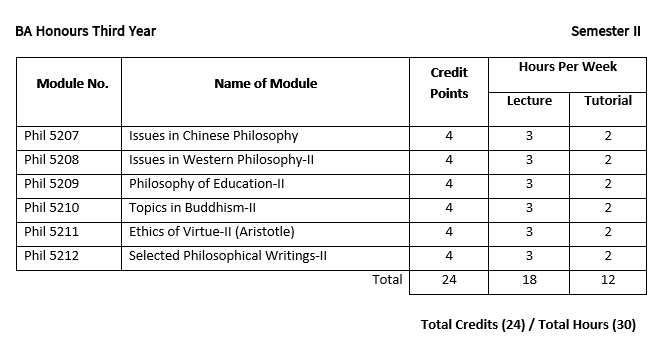
Phil 5207 (4) Issues in Chinese Philosophy
Phil 5208 (4) Issues in Western Philosophy-II
Phil 5209 (4) Philosophy of Education-II
Phil 5210 (4) Topics in Buddhism-II
Phil 5211 (4) Ethics of Virtue-II (Aristotle)
Phil 5212 (4) Selected Philosophical Writings-II
Lecture : (3) Hours per Week * (15) Weeks=(45) Hours
Tutorial/Discussion : (2) Hours per Week * (15) Weeks=(30) Hours
– The purpose of this subject is enable students to examine the synthetic ways of thinking of Eastern Philosophy. Students have to study, in the second semester, characteristic of Chinese Philosophy, stages and development of Chinese Philosophy and a general survey of Chinese Philosophical systems. In addition, students will study bloom of new schools in Chinese Philosophy.
– The frame of the course bases on the topics of;
1. Metaphysical Background of Chinese Philosophy
2. Moral Problems in Chinese Philosophy
2.1. Problem of Human Nature in Confucianism
2.2. Problem of Human Nature in Neo-Confucianism
3. Problems of Human Nature in Chinese Philosophy
3.1. Problem of Human Nature in Taoism
3.2. Problem of Human Nature in Neo-Taoism
3.3. Problem of Human Nature in Maoism
The main objectives of this course are
– The generic learning outcomes
After this study, students will be able to
– The specific learning outcomes
After this study, students will be able to
1. Chai, C. & W. Chai. (1982). The Stories of Chinese Philosophy. New York: Washington Square Press.
2. Chan, Wing-Tsit. (1963). A Source Book in Chinese Philosophy. Princeton: Princeton University Press.
3. Fung Yu- Lan. (1981). A Short History of Chinese Philosophy. New York: The Free Press.
4. Theodore de Bary, William. (1980). Sources of Chinese Tradition. New York: Columbia University Press.
5. Xu Yuanxiang. (2007). Confucius: A Philosopher for the Ages. Beijing: China International Press.
Lecture : (3) Hours per Week * (15) Weeks=(45) Hours
Tutorial/Discussion : (2) Hours per Week * (15) Weeks=(30) Hours
– This course aims to understand issues in Western philosophy through the study of the philosophy of some Greek and modern philosophers. The frame of this course bases on the development of reading, writing, thinking, and speaking with studying on the major works of modern philosophies. In addition, it considers some of the most important problems in the theory of knowledge and morality and the good life from a selection of classical and contemporary viewpoints.
– The frame of the course bases on the topics of;
1. Philosophies of Process
2. Moore and the Revival of Realism
3. The Nature of Truth
4. Morality and The Good life
The main objectives of this course are
– The generic learning outcomes
After this study, students will be able to
– The specific learning outcomes
After this study, students will be able to
1. Jones, W.T. and Robert J. Fogelin. (1998). The Twentieth Century to Quine and Derrida (Third Edition). Harcourt Brace College Publishers.
2. Solomon, Robert C. (1998). The Big Questions (Fifth Edition). Harcourt Brace College Publishers.
Lecture : (3) Hours per Week * (15) Weeks=(45) Hours
Tutorial/Discussion : (2) Hours per Week * (15) Weeks=(30) Hours
– This course aims to provide students with an overview of the most important some significant western educational theories that have been put forward as extensions of, or alternatives. This course is to arrive at a clear understanding of the significant some educational philosophers who have suggested a responsible eclecticism in building a personal philosophy of education. In addition, the course will provide the theories of pragmatists, existentialists, marxists and reconstructionists who advocated an attitude toward change that encourages individuals to try to make life better than it was or is. Moreover, students will have a chance to study some skills which are demanded in 21st Century educational system such as ‘self-study’, ‘creative’, ‘cooperative’, and ‘critical’ can be cultivated students to be active learners by philosophy of education.
– The frame of the course bases on the topics of;
1. Pragmatism and Education
2. Existentialism, Phenomenology, and Education
3. Analytic Philosophy and Education
4. Reconstructionism and Education
5. Behaviourism and Education
6. Marxism and Education
7. Philosophy, the Theory and Practice of Education
The main objectives of this course are
– The generic learning outcomes
After this study, students will be able to
– The specific learning outcomes
After this study, students will be able to
1. Gutek, Gerald L. (1997). Historical And Philosophical Foundations of Education A Biographical Introduction. New Jersey: Merrill, an important of Prentice Hall.
2. Hamm, Cornel M. (1989). Philosophical Issues in Education: An Introduction. New York: The Flamer Press.
3. Kneller, George F. (1986). Introduction To The Philosophy Of Education. New York: Macmillan Publishing Company.
4. Knowles, Richard T and Mc Learn, George. (1992). Psychological Foundations of Moral Education And Character Development: An Integrated Theory of Moral Development. Washington: Library of Congress Cataloging-in- Publication.
5. Mclean, George F. (1991). Chinese Foundations for Moral Education And Character Development. Washington: Library of Congress Cataloging-in-Publication.
6. Mujibul Hasan Siddiqui. (2016). Philosophical And Sociological Foundations Of Education. New Delhi: A P H Publishing Corporation.
7. Olson, Ivan (2000). The Arts and Critical Thinking in American Education. London: An Important of Greenwood Publishing Group, Inc.
8. Ozmon, Howard A. & Samuel M. Craver. (1986). Philosophical Foundations of Education. London: Merrill Publishing Company.
9. Sharma, Promila. (2013). Philosophy of Education. New Delhi: A P H Publishing Corporation.
10. Tubbs, Nigel. (2004). Philosophy’s Higher Education. New York: Kluwer Academic Publishers.
Lecture : (3) Hours per Week * (15) Weeks=(45) Hours
Tutorial/Discussion : (2) Hours per Week * (15) Weeks=(30) Hours
– This course aims to understand a broad view to schools of Buddhist thought, teachings, philosophical concepts and aesthetic evaluation of Buddhist Arts. It covers keys aspects of Theravada Buddhist thought and practice. This course will also provide an overview of Buddhism as it becomes increasingly influential in the modern world, including the areas of art, architecture, science, politics, and culture.
– The frame of the course bases on the topics of;
1. Schools of Buddhist Thought
2. Main Themes of Buddhist Teachings
2.1. The Doctrine of Two Extremes and 62 Brahmanic Views of Ancient India
2.2. The Doctrine of Middle Way
3. Philosophical Concepts in Buddha’s Teachings
4. Aesthetic Evaluation of Buddhist Arts
The main objectives of this course are
– The generic learning outcomes
After this study, students will be able to
– The specific learning outcomes
After this study, students will be able to
1. Chatterjee, S. (1960). An Introduction to Indian Philosophy. Calcutta: Calcutta University Press.
2. Dasgupta, Surama. (1965). Development of Moral Philosophy in India. New York: Unbar Publishing Co.
3. Radhakrishnan, S. (1953). History of Philosophy: Eastern and Western. Vol. I. London: Unwin Brothers.
4. Radhakrishnan, S. (1957). A Source Book in Indian Philosophy. Princeton, NJ: Princeton University Press.
Lecture : (3) Hours per Week * (15) Weeks=(45) Hours
Tutorial/Discussion : (2) Hours per Week * (15) Weeks=(30) Hours
– The purpose of this course is to provide the synthetic ways of Aristotle’s Virtue Ethics. It surveys the essential content of the philosophies of Aristotle and considers more briefly some of the earlier thinkers whose ideas set the context for their works. It examines the history of virtue ethics, one of the major traditions in ethical theory. Virtue ethics is a theory that emphasizes the goodness or badness of those who act, rather than the rightness or wrongness of particular actions. This course focuses on knowledge and virtue of Aristotle’s philosophy.
– The frame of the course bases on the topics of;
1. A General Study of Aristotle’s Philosophy
2. Aristotle’s View on Knowledge and Virtue
2.1. Aristotle’s Conception of Knowledge
2.2. Aristotle’s Conception of Virtue
The main objectives of this course are
The generic learning outcomes
After this study, students will be able to
The specific learning outcomes
After this study, students will be able to
1. Gonslaves, M. A. (1989). Right and Reason. Merrill Publishing Company.
2. Gould, J. A. (1989). Classic Philosophical Questions. New York: Macmillan Publishing Company.
3. Hintz, H. W. (1959). Knowledge and Value. Harcourt, Brace & World Inc.
4. Solomon, R. C. (1996). A Handbook of Ethics. Harcourt, Brace & Company.
5. Thiroux, J. P. (1985). Philosophy: Theory and Practice. New York: Macmillan Publishing Company.
Lecture : (3) Hours per Week * (15) Weeks=(45) Hours
Tutorial/Discussion : (2) Hours per Week * (15) Weeks=(30) Hours
– This course aims to provide the main lines of thought from Western Philosophers’ original writings in ethics. In addition, the course will provide an orientation about the meanings of the good, the end, moral virtue, friendship and happiness in Aristotle’s original writings and the more understanding of the concept of moral values and rules from some of the Western Philosophers’ original writings.
– The frame of the course bases on the topics of;
1. Virtue Ethics (Aristotle)
1.1. The Nicomachean Ethics (Book I- The End)
1.2. The Nicomachean Ethics (Book II- Moral Virtue)
1.3. The Nicomachean Ethics (Book VIII- Why we need friendship)
1.4. The Nicomachean Ethics (Book X – Happiness)
2. Moral Sense Ethics
David Hume- A Treatise of Human Nature
(Moral Distinctions Derived from a Moral Sense)
3. Naturalism and Anti-naturalism
3.1. G. E. Moore- Principia Ethica (Chapter I- The Subject Matter of Ethics)
3.2. John Dewey- Reconstruction in Philosophy (Reconstruction in Moral conception)
4. Ludwig Wittgenstein- A Lecture on Ethics
5. Existentialist Ethics
5.1. Sǿren Kierkegaard
5.2. Friedrich Nietzsche
5.3. Jean-Paul Sartre
The main objectives of this course are
– The generic learning outcomes
After this study, students will be able to
– The specific learning outcomes
After this study, students will be able to
1. Hume, David. (1740). A Treatise of Human Nature. London: Wm. Collins Sons & Co, Ltd.
2. Johnson, Oliver A. (1999) Ethics (Selections from Classical and Contemporary Writers). Harcourt Brace College Publishers.
2. Warnock Mary. (1967). Existentialist Ethics. London: Macmillan.
REGIONAL GEOLOGY SPECIALIZATION
FIRST YEAR SEMESTER I
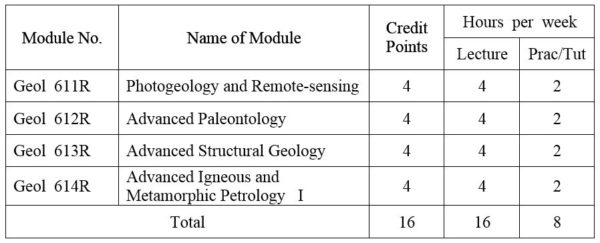
1.Module No: Geol 611R
Geomorphology with special reference to air-photo interpretation; Techniques of air-photo interpretation in geology; Air-photo interpretation of depositional landforms; Structural interpretation of air-photos; Sensor principles and capabilities, specific properties of images and records. Remote-sensing in geologic mapping; Remote sensing in Applied Geology; Remote sensing as an aid in development and the evaluation of natural hazards. Type of images and image processing methods.
2.Module No: Geol 612R
Micropaleontology; Ichnology; Conodonts
3.Module No: Geol 613R
Current trends in structural geology; Stress and strain in two dimensions; Behaviour of rock deformation; Rock behavior under experimental conditions; Dynamics of faulting; Analysis of macro-structures; Petrofabrics; Morphotectonics.
4.Module No: Geol 614R
Petrographic methods- a review; Modern classification and nomenclature of hard rocks; Genetic types of granitoids; Granitoid rocks of Myanmar; Metamorphic facies and facies series- a review; Metamorphic Epochs and Metamorphic Belts of Myanmar; Geochemical Cycles.
FIRST YEAR SEMESTER II
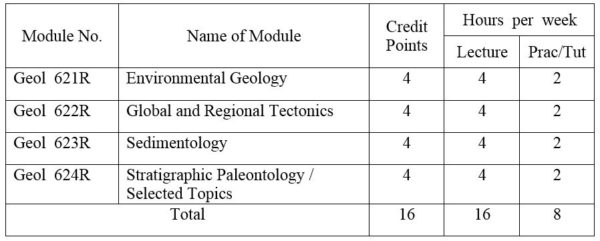
1.Module No: Geol 621R
Overview and general consideration; Nature and aspects of various geologic hazards:-hazards from earthquakes, hazards from volcanic eruption, hazards from ground failures, ways and means of mitigating these hazards; Earthquake prediction and control; Proper use and care for Earth resources:-groundwater resources, mineral resources, fossil fuel, soil; Geologic condition for proper waste disposal; Use of environmental potential maps in regional planning; Disaster Management and Risk Reduction.
2.Module No: Geol 622R
Recent advances in plate tectonics; Magmatism, metamorphism, sedimentation and metallogeny along different plate boundaries; Origin of marginal basins; Collision tectonics of India and Eurasia; Geodynamics of South-east Asia.
3.Module No: Geol 623R
Introduction and general consideration; Principles and problems of classification of sedimentary rocks; Clay minerals; Mud rocks; Turbidites, Flysch; Molasses; Sedimentation as ore genesis; Applied sedimentation.
Sedimentary environments and facies: – alluvial, deltaic, estuarine, clastic shoreline, carbonate platform, bathyal, abyssal, trench; Carbonate petrography; Carbonate microfacies analysis; Organism and sediments; Phosphate; Bedded chert.
4.Module No: Geol 624R
Stratigraphic invertebrate paleontology of the Paleozoic, Mesozoic, and Cenozoic rock sequences; Sedimentologic and stratigraphic application of selected groups of the invertebrates and microfossils; Depo-environments.
(OR)
Geology of the Moon; Mineral belts and mineral epochs of Myanmar; Mineralization at spreading centers; Quaternary stratigraphy of South-East Asia; Theory of evolution- a critical review; and other current topics.
DISTRIBUTION OF MARKS
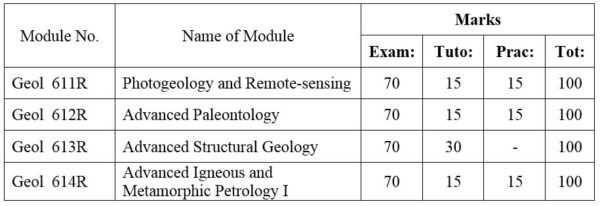

SECOND YEAR SEMESTER I

1.Module No: Geol 631R
2.Module No: Geol 632R
SECOND YEAR SEMESTER II

1. Module No: Geol 641R
2.Module No: Geol 642R
DISTRIBUTION OF MARKS


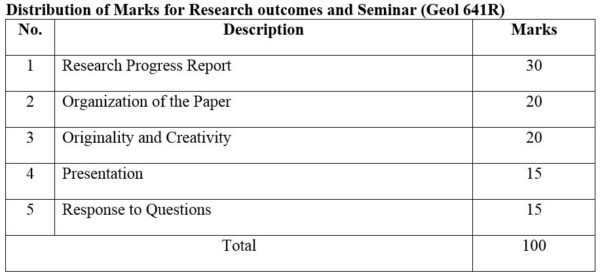
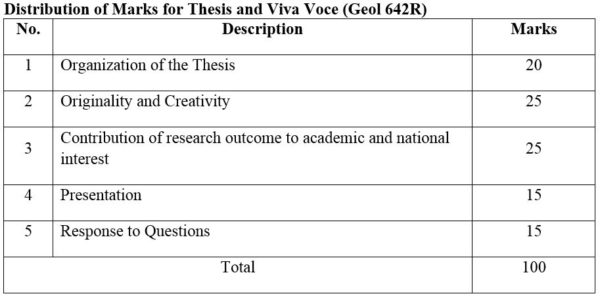

PETROLOGY SPECIALIZATION
FIRST YEAR SEMESTER I
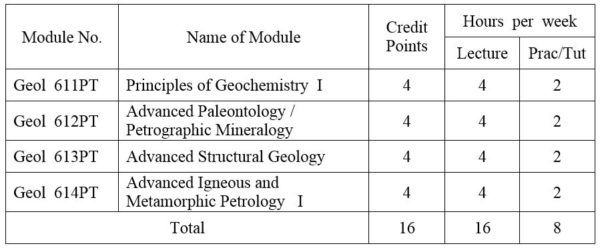
1.Module No: Geol 611PT
Abundance and geochemical classification of elements; Radioactivity and geochronology; Thermodynamics; Crystallization in igneous rocks melts.
2.Module No: Geol 612PT
Micropaleontology; Ichnology; Conodonts(OR) Orthoscopic and conoscopic studies of minerals; Review of silicate structure; Isomorphism and polymorphism in minerals; Solid solution in mineral groups; Systematic microscopic study of all important rock-forming mineral groups with emphasis on feldspar, pyroxene, micas ,aluminosilicates and garnets.
3.Module No: Geol 613PT
Current trends in structural geology; Stress and strain in two dimensions; Behaviour of rock deformation; Rock behavior under experimental conditions; Dynamics of faulting; Analysis of macro-structures; Petrofabrics; Morphotectonics.
4.Module No: Geol 614PT
Petrographic methods- a review; Modern classification and nomenclature of hard rocks; Genetic types of granitoids; Granitoid rocks of Myanmar; Metamorphic facies and facies series- a review; Metamorphic Epochs and Metamorphic Belts of Myanmar; Geochemical Cycles.
FIRST YEAR SEMESTER II
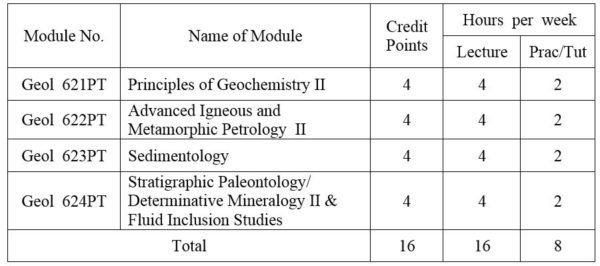
1.Module No: Geol 621PT
Element association in igneous rocks and minerals. Geochemistry of metamorphic processes; Sedimentary geochemistry; The hydrosphere; Atmosphere.
2.Module No: Geol 622PT
Historical development of petrology; Petrogenetic models; Experimental petrology and its uses; Origin of granitic and basaltic magmas; Magma association in relation to plate tectonic settings; Carbonatites; Metamorphism in relation to plate convergence.
3.Module No: Geol 623PT
Introduction and general consideration; Principles and problems of classification of sedimentary rocks; Clay minerals; Mud rocks; Turbidites, Flysch; Molasses; Sedimentation as ore genesis; Applied sedimentation.
Sedimentary environments and facies: – alluvial, deltaic, estuarine, clastic shoreline, carbonate platform, bathyal, abyssal, trench; Carbonate petrography; Carbonate microfacies analysis; Organism and sediments; Phosphate; Bedded chert.
4.Module No: Geol 624PT
Stratigraphic invertebrate paleontology of the Paleozoic, Mesozoic, and Cenozoic rock sequences; Sedimentologic and stratigraphic application of selected groups of the invertebrates and microfossils; Depo-environments.(OR) Scanning Electron Microscope:- General principles of Electron Microscopy; Image formation and electron diffraction; Sample preparation; Scattering of electrons by crystalline solids; Electron optical contrast phenomena. Electron Probe Micro-Analysis:- Instrumentation; The x-ray detection system; Sample preparation; Qualitative and quantitative analyses; Standards and calculation of correction factors; Some applications of the method in mineralogy. Introduction; Historical background of geothermometry; Origin of inclusions; Terms and terminology on fluid inclusions; Properties and characteristics of fluid inclusions. Types of inclusions; Instruments and methods of inclusion studies; Inclusion measurements and interpretation of measurements; Application of inclusion studies in various geologic environments; Future of inclusion studies.
DISTRIBUTION OF MARKS
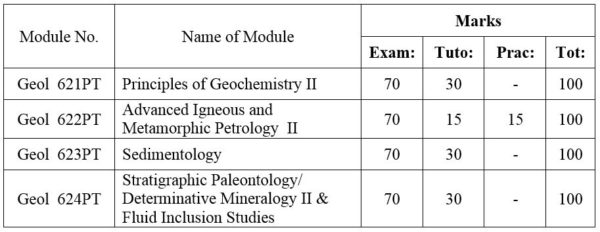
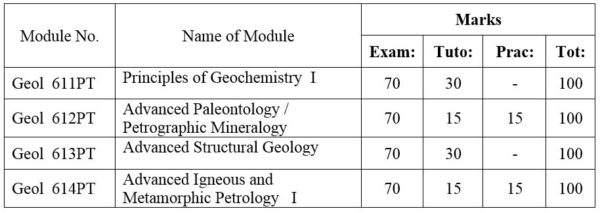
SECOND YEAR SEMESTER I

1.Module No: Geol 631PT
2.Module No: Geol 632PT
SECOND YEAR SEMESTER II
1. Module No: Geol 641PT
2. Module No: Geol 642PT
DISTRIBUTION OF MARKS
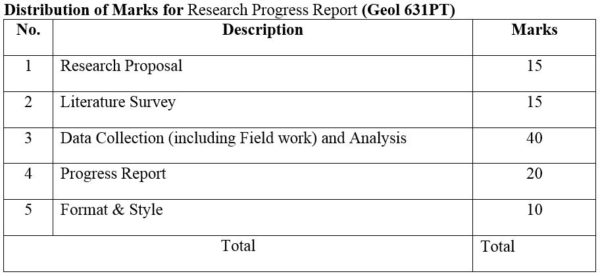
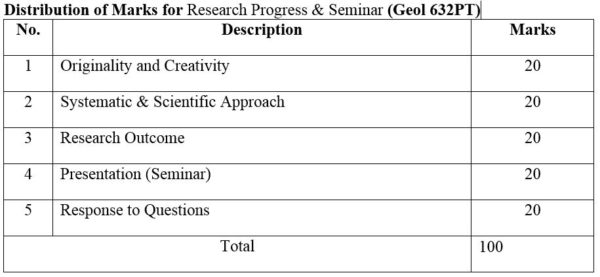
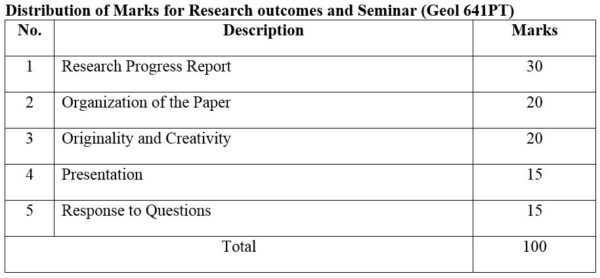
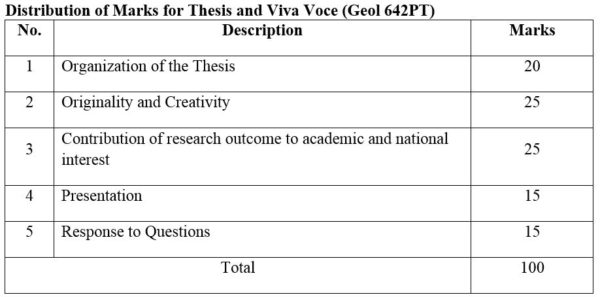
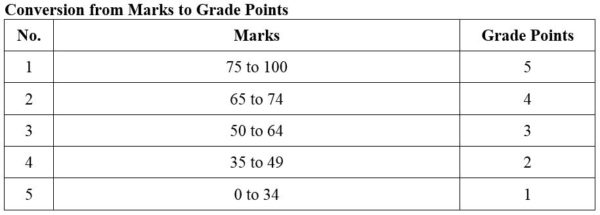
MINERALOGY SPECIALIZATION
FIRST YEAR SEMESTER I
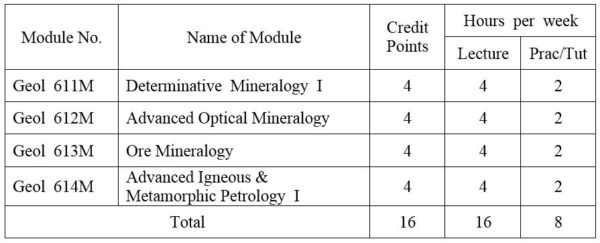
1.Module No: Geol 611M
Mineral separation techniques; Sampling and preparation; Separation by gravity; Magnetic separation; Miscellaneous methods. X-ray diffraction techniques; Classification of crystals; nature and generation of x-rays; The Laue Method; The powder method; Mineral identification.
2.Module No: Geol 612M
Orthoscopic and conoscopic studies of minerals. Uniaxial minerals; wave-velocity sufaces, optical indicatrix, interference figures, optic signs. Biaxial minerals; wave-velocity sufaces, optical indicatrix, interference figures, optic signs. Interference colors in relation to thickness and optical orientation; uses of colour chart. Optic orientation of biaxial minerals; construction of orientation diagram. Review of silicate structure; Isomorphism and polymorphism in minerals; Solid solution in mineral groups; Systematic microscopic study of all important rock-forming mineral groups with emphasis on feldspar, pyroxene, micas ,aluminosilicates and garnets. Principles and applications of Universal Stage.
3.Module No: Geol 613M
Ore microscopy (reflected light polarizing microscope); Physical and optical properties of ore minerals; Reflectivity method; Mineralogical analysis; Ore texture; Ore genesis; Description of important ore minerals (elements and intermetallic compounds, common sulphides and sulphates, oxidic ore minerals, gangue minerals).
4.Module No: Geol 614M
Petrographic methods- a review; Modern classification and nomenclature of hard rocks; Genetic types of granitoids; Granitoid rocks of Myanmar; Metamorphic facies and facies series- a review; Metamorphic Epochs and Metamorphic Belts of Myanmar; Geochemical Cycles
FIRST YEAR SEMESTER II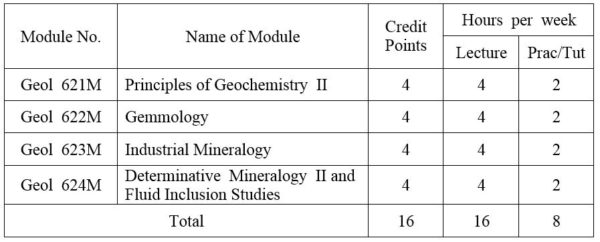
1.Module No: Geol 621M
Element association in igneous rocks and minerals. Geochemistry of metamorphic processes; Sedimentary geochemistry; The hydrosphere; Atmosphere.The Phase Rule and heterogeneous equilibrium- a review; important phase equilibrium; System of silicate melts and important metamorphic reactions; Application of these phase equilibrium and reactions in mineralogy.
2. Module No: Geol 622M
Introduction; Physical properties of gemstones; Light and related phenomena in gemstones; Colour in gemstones; Instruments used in gem testing; Fashioning of gemstones; Synthetic gemstones; Imitation and artificial treatments; Important gem species and their occurrences:- diamond, ruby and sapphire (corundum), emerald and aquamarine (beryl), spinals, garnets, topaz, tourmaline, chrysoberyl and alexandrite, dunburite, peridot, jadeite and nephrite jade, quartz and silica varieties, feldspars (moonstone, sunstone), pearls, corals, amber.
3.Module No: Geol 623M
Glasses, enamels and ceramic materials; Building materials; Phosphate and other mineral fertilizers; Mineral commodities (clay, feldspars, manganese minerals, etc).
4. Module No: Geol 624M
Scanning Electron Microscope:- General principles of Electron Microscopy; Image formation and electron diffraction; Sample preparation; Scattering of electrons by crystalline solids; Electron optical contrast phenomena; Electron Probe Micro-Analysis:- Instrumentation; The x-ray detection system; Sample preparation; Qualitative and quantitative analyses; Standards and calculation of correction factors; Some applications of the method in mineralogy. Introduction; Historical background of geothermometry; Origin of inclusions; Terms and terminology on fluid inclusions; Properties and characteristics of fluid inclusions. Types of inclusions; Instruments and methods of inclusion studies; Inclusion measurements and interpretation of measurements; Application of inclusion studies in various geologic environments; Future of inclusion studies.
DISTRIBUTION OF MARKS
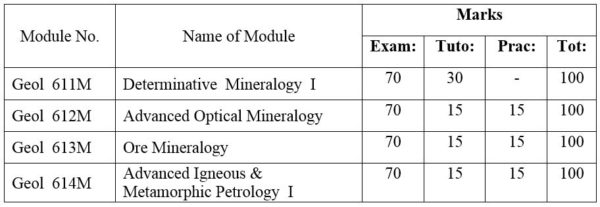

SECOND YEAR SEMESTER I
1.Module No: Geol 631PT
2.Module No: Geol 632PT
SECOND YEAR SEMESTER II

1. Module No: Geol 641PT
2. Module No: Geol 642PT
DISTRIBUTION OF MARKS
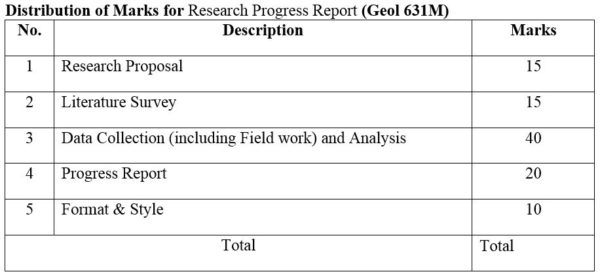
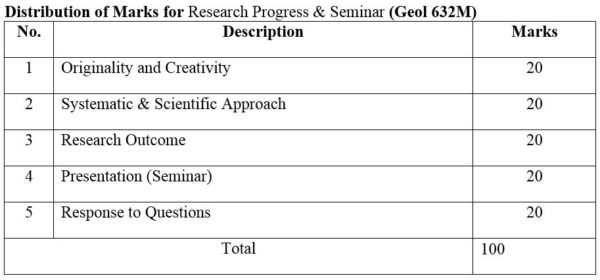
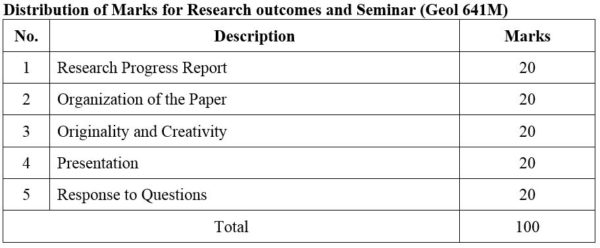
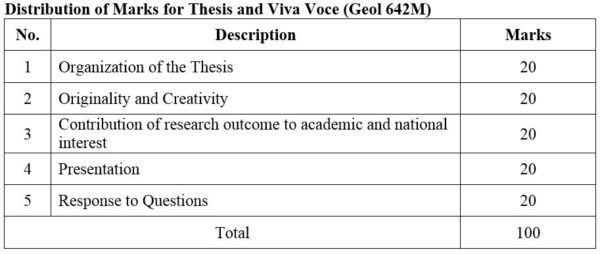
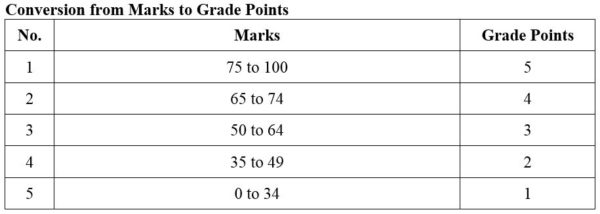
PALEONTOLOGY SPECIALIZATION
FIRST YEAR SEMESTER I
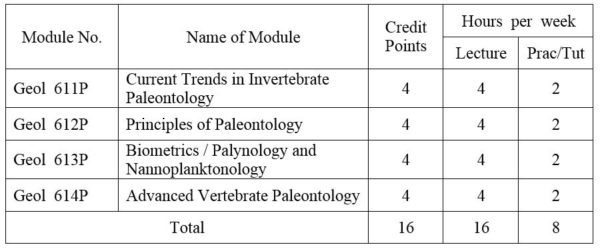
1.Module No: Geol 611P
Modern techniques in current research; mass extinction; Species and species problem; Conodonts. Methods of approach; Morphology and classification; Application of conodonts.
2.Module No: Geol 612P
Nature of fossil records and preservability of organic remains; Principles, practice and methods in description of a fossil specimen; Determination and description of ontogenetic variation; Variation in populations and population dynamics; Species, speciation, species problems, formal naming and description of species; Classification and taxonomy; General procedure and outline in identification of fossils; Modes, rates, trends and patterns of evolution, determination of phylogenetic relationships, and extinction.
3.Module No: Geol 613P
Biometrical methods in the study of invertebrate fossils; Introduction; The role of Biometrics in taxonomy; Basic statistical concepts; Population and sample in paleontology; Univariate analysis; Bivariate analysis: Statistical discrimination: Concepts of variability in bivariate samples. (OR)
Palynology:- Definition. Brief history; Sampling, processing and identification of faunas; Study of pollen assemblages; Determination of chronostratigraphic dating, formation representative and stratigraphic position; Determination of paleoenvironments. Nannoplanktonology:- Definition; Brief history; Methods of study; Sampling and preparation techniques; Identification of Nannofossils; Uses and advantages in application of Nannofossils; Age dating and interpretation of paleoenvironments; Ecology and comparison between forams and Nannofossils.
4.Module No: Geol 614P
Lower vertebrates :- Ostracoderms; Paleozoic fishes:- Placodermi and other groups; Aves:-earliest birds- ( birds of Mesozoic Era); Early reptiles:- marine reptiles, flying reptiles, land reptiles; Early Amphibian; Dinosaurs:- Sauropods, Theropods; Archiac mammals: Primitive mammals, mammals of Tertiary period. Primates:- Lower primates, higher primates, higher Anthropoid primates. Human Paleontology:- evolution of man (from Australopithecus to Homo Sapiens).
FIRST YEAR SEMESTER II
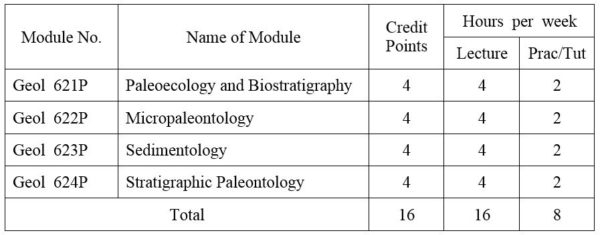
1.Module No: Geol 621P
Paleoecology: Scope; Methods and materials; Paleoautoecology and Synecology; Fossils and sediments association; Analysis and interpretation of paleo-depositional environments.
Biostratigraphy: Methods and approaches; Fossils as chronostratigraphic tools; Biochronology and evolution; Distribution of fossils in time and space; Paleoclimatological interpretation and paleogeographic aspects.
2.Module No: Geol 622P
Application of fossil foraminifera; extraction and processing of foraminifera; Classification; Paleoecology of fossil foraminifera: (a) Planktonic and (b) Benthonic larger foraminifera; Systematic study.
Application of fossil conodonts; extraction and processing of conodonts; Classification; Paleoecology of fossil conodonts.
3.Module No: Geol 623P
Introduction and general consideration; Principles and problems of classification of sedimentary rocks; Clay minerals; Mud rocks; Turbidites, Flysch; Molasses; Sedimentation as ore genesis; Applied sedimentation.
Sedimentary environments and facies:- alluvial, deltaic, estuarine, clastic shoreline, carbonate platform, bathyal, abyssal, trench; Carbonate petrography; Carbonate microfacies analysis; Organism and sediments; Phosphate; Bedded chert.
4. Module No: Geol 624P
Stratigraphic invertebrate paleontology of the Paleozoic, Mesozoic, and Cenozoic rock sequences; Sedimentologic and stratigraphic application of selected groups of the invertebrates and microfossils; Depo-environments.
DISTRIBUTION OF MARKS
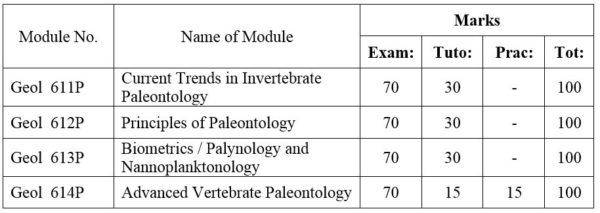

SECOND YEAR SEMESTER I

1.Module No: Geol 631P
2.Module No: Geol 632P
SECOND YEAR SEMESTER II

1. Module No: Geol 641P
2. Module No: Geol 642P
DISTRIBUTION OF MARKS
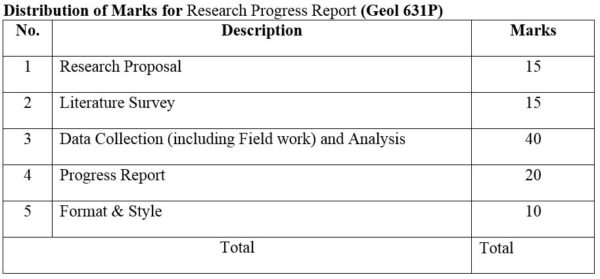
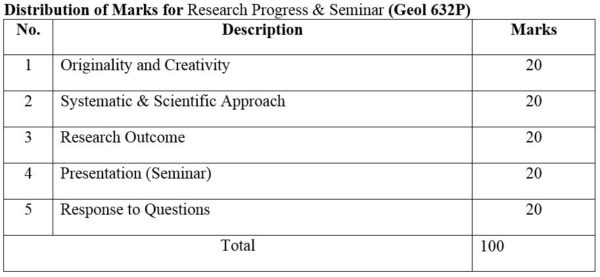

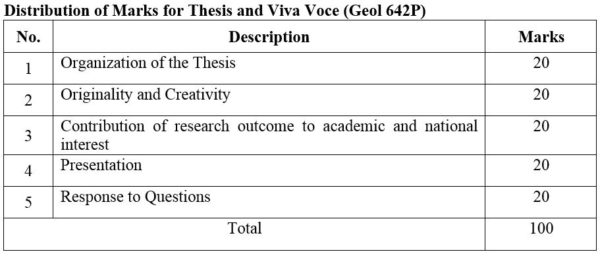

ENGINEERING GEOLOGY SPECIALIZATION
FIRST YEAR SEMESTER I
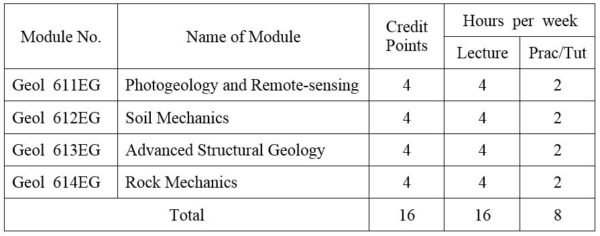
1.Module No: Geol 611EG
Geomorphology with special reference to air-photo interpretation; Techniques of air-photo interpretation in geology; Air-photo interpretation of depositional landforms; Structural interpretation of air-photos; Sensor principles and capabilities, specific properties of images and records. Remote-sensing in geologic mapping; Remote-sensing in Applied Geology; Remote sensing as an aid in development and the evaluation of natural hazards. Types of images and image processing methods.
Applied Geomorphology: Development of landforms. Relationship between landform and the underlying geology. Geomorphologic survey and analysis techniques.
2.Module No: Geol 612EG
Basic principles of soil mechanics; Index properties and soil classification; State of stress in soils; Stress-strain behaviour and shear strength; Effective stress concepts and permeability; Compressibility of soils; normally and overconsoildated soils; Soil compaction. Labiratory tests : Seieve analysis, Liquid limit, plastic limit and other index properties tests, Permeability tests, Triaxial tests, Diert shear test, Standard Proctor Test.
3. Module No: Geol 613EG
Current trends in Structural Geology. Stress and Strain in two dimensions. Behavior of rock deformation; Rock behavior under experimental conditions. Dynamics of faulting; Analysis of macro-structures. Petrofabrics. Morphotectonics. Global Tectonics (with special reference to recent developments).
4. Module No: Geol 614EG
Basic principles of rock mechanics; intact rock properties, rock mass and discontinuities, Deformability of rock mass; Rock slope engineering; basic mechanics of slope failures, Graphical presentation of geologic data, geological data collection, Shear strength of rock, Groundwater flow in rock mass, Plane failure, Wedge failure, circular failure, toppling failure.
FIRST YEAR SEMESTER II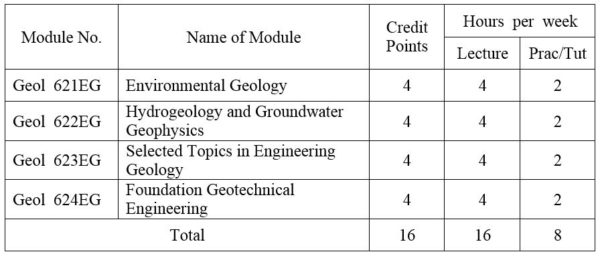
1.Module No: Geol 621EG
Geological hazards:- seismic risk, landslides, subsidence, floods, erosion, volcanic eruptions, discrete and continuous hazards; event return time, Geological resources and their management; Type of resources use and potential environmental conflict; Resource economic and policy formulation; Waste disposal and the mineral industry; Reclamation and rehabilitation of land used for extractive purposes:- Swamp drainage; Geology and Urban planning; Map preparation, Multiple land use principle, Aesthetic criteria for landscape evaluation. Environmental impact of dams, roads, explorative and extractive stages of mining; Impact statement techniques, Case studies; Disaster Management and Risk Reduction.
2. Module No: Geol 622EG
Current trends and aspects in advanced hydrogeology. Groundwater and Geotechnological problems.
Techniques and interpretation of shallow seismic refraction. Application of dam-site, highways, depth of weathering, material quality. Electrical Methods; Direct current geoelectric theory; resistivity sounding and profiling with applications to determination to bedrock depth, location of water table, sheared zones, etc. Magnetic, Electromagnetic and Gravity methods applied to engineering and hydrogeology problems; Various geophysical well loggings applied to determination of rock properties and location of clay-filled joints.
3. Module No: Geol 623EG
Subsurface exploration; Site investigation for dams; Highways and other engineering structures; Foundation analysis; Bearing capacity for shallow and deep foundation; Lateral earth pressure; Ground improvement methods; Tunneling; Disaster prevention and management; Earthquakes, Landslides etc.; Current trends and aspects in advanced geotechnology. Engineering Geology of Myanmar: Case-studies on Engineering Geology of dams, highway, bridge construction foundations etc. of Myanmar.
4. Module No: Geol 624EG
Foundation principles: Shallow and deep foundations (spread footing foundation, mat foundation, deep foundation, bearing capacity); Settlements (basic for design methods)
Foundation investigation for dams and other hydraulic structures; High way and airports, bridges, and building;
Seepage through dam foundation: Groundwater control methods; Cutoff trench, sheet piles, diaphragm walls and other methods of controlling seepages;
Foundation and engineering geology in hydropower development: Diversion type power development; Dam type power development;
Foundation Improvement: Grouting, Dental treatment, Rock anchors, and Load transfer;
Geology of tunnels and large underground openings; Foundations on unstable landforms and in seismically active regions
DISTRIBUTION OF MARKS

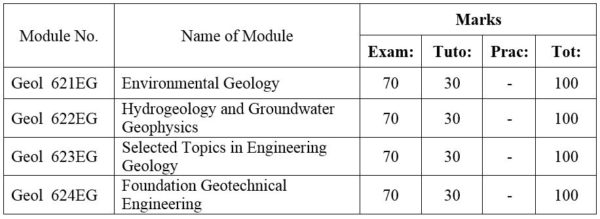
SECOND YEAR SEMESTER I

1. Module No: Geol 631EG
2.Module No: Geol 632EG
SECOND YEAR SEMESTER II

1. Module No: Geol 641EG
2. Module No: Geol 642EG
DISTRIBUTION OF MARKS
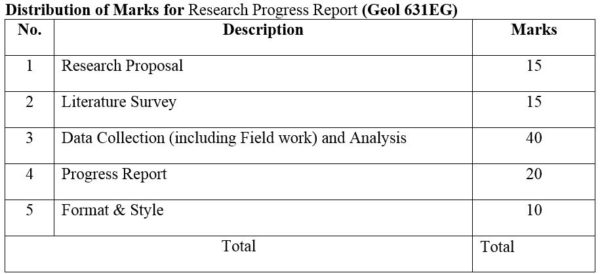
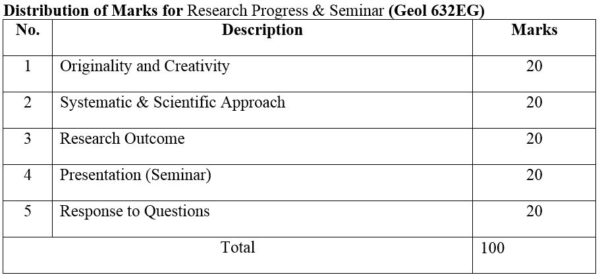
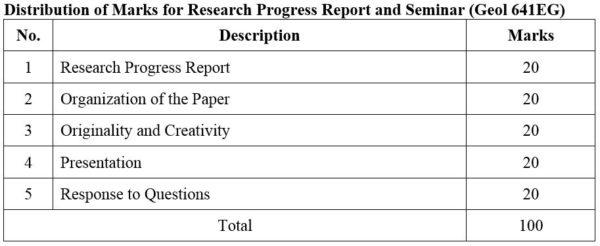


PETROLEUM GEOLOGY SPECIALIZATION
FIRST YEAR SEMESTER I

1. Module No: Geol 611PG
Geomorphology with special reference to air-photo interpretation; Techniques of air-photo interpretation in geology; Air-photo interpretation of depositional landforms; Structural interpretation of air-photos; Sensor principles and capabilities, specific properties of images and records. Remote-sensing in geologic mapping; Remote-sensing in Applied Geology; Remote sensing as an aid in development and the evaluation of natural hazards. Types of images and image processing methods.
2. Module No: Geol 612PG
3. Module No: Geol 613PG
Palynology: Definition. Brief history; Sampling, processing and identification of faunas; Study of pollen assemblages; Determination of chronostratigraphic dating, formation representative and stratigraphic position; Determination of paleoenvironments. Nannoplanktonology: Definition; Brief history; Methods of study; Sampling and preparation techniques; Identification of Nannofossils; Uses and advantages in application of Nannofossils; Age dating and interpretation of paleoenvironments; Ecology and comparison between forams and Nannofossils. (OR)
Current trends in Structural Geology. Stress and Strain in two dimensions. Behavior of rock deformation; Rock behavior under experimental conditions. Dynamics of faulting; Analysis of macro-structures. Petrofabrics. Morphotectonics. Global Tectonics (with special reference to recent developments).
4. Module No: Geol 614PG
Petroleum Geophysics: An advanced course in Petroleum Exploration with emphasis on the techniques and interpretation, GPS, GIS etc.; Laboratory assignments including computer processing of field data and interpretation of problems. Petroleum Geochemistry: Sample collections; Stratigraphy (rock units); Geostratigraphy laboratory analysis; Organic Analysis, TOC and type, Oil and Gas Analysis; Estimation of source rocks (Oil kitchen, Migration & trap); Estimation of oil in place; Risk Analysis.
FIRST YEAR SEMESTER II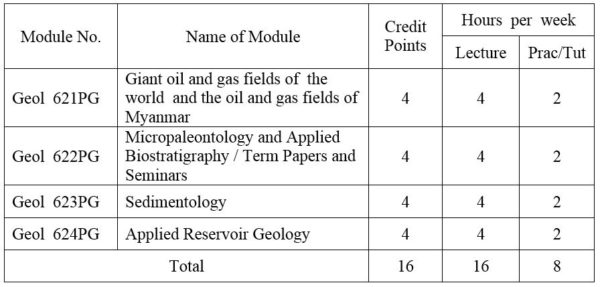
1. Module No: Geol 621PG
Selected topics on the reservoir geology of giant oil and gas field; Myanmar oil field and its economics.
2. Module No: Geol 622PG
Application of fossil Foraminifera; Extraction and processing of foraminifera; Classification; Paleoecology of fossil foraminifera: (a) Planktonic and (b) Benthonic larger foraminifera; Systematic study.
Methods and approaches; Fossils as chronostratigraphic tools; Biochronology and evolution; Distribution of fossils in time and space; Paleoclimtological interpretation and paleogeographic aspects; Current trends in Paleontology and Nannoplanktonology. (OR) Case studies of Petroleum Geology
3. Module No: Geol 623PG
Introduction and general consideration; Principles and problems of classification of sedimentary rocks; Clay minerals; Mud rocks; Turbidites, Flysch; Molasses; Sedimentation as ore genesis; Applied sedimentation.
Sedimentary environments and facies:- alluvial, deltaic, estuarine, clastic shoreline, carbonate platform, bathyal, abyssal, trench; Carbonate petrography; Carbonate microfacies analysis; Organism and sediments; Phosphate; Bedded chert.
4. Module No: Geol 624PG
Structural Mapping, Stratigraphy (Biozone & lithology), Well-log Analysis, Reservoir character (contour, fault, fault blocks, formation water analysis, Lab: data (porosity, Permeability, formation water); Oil & gas character in trap; Decline rate and risk analysis; Primary recovery and Secondary Process.
DISTRIBUTION OF MARKS
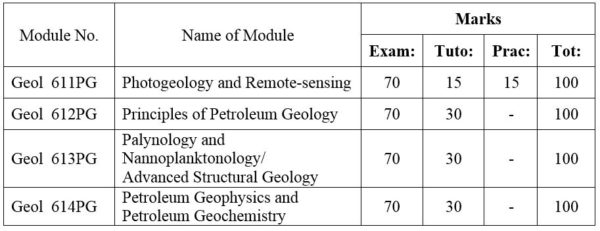
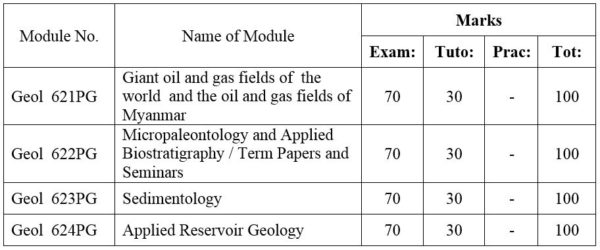
SECOND YEAR SEMESTER I

1. Module No: Geol 631PG
2. Module No: Geol 632PG
SECOND YEAR SEMESTER II
1. Module No: Geol 641PG
2. Module No: Geol 642PG
DISTRIBUTION OF MARKS
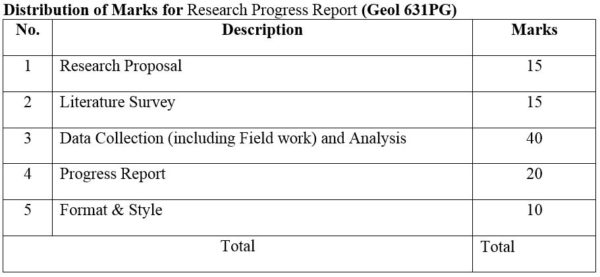
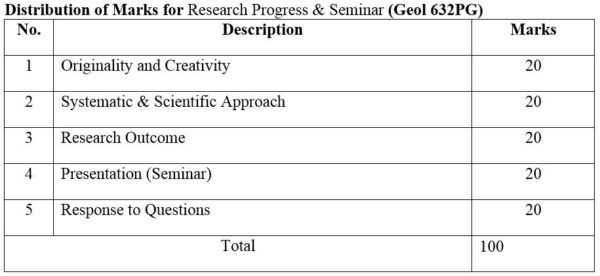
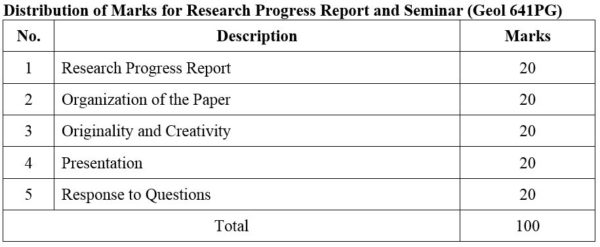
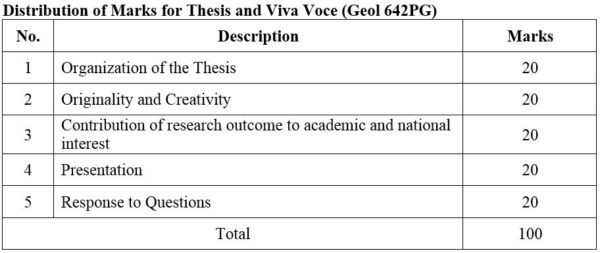
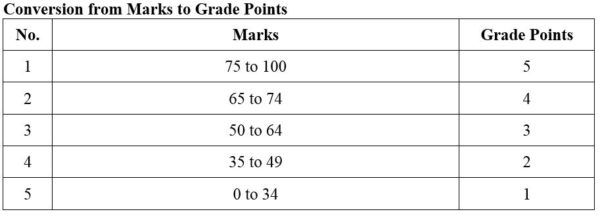
HYDROGEOLOGY SPECIALIZATION
FIRST YEAR SEMESTER I
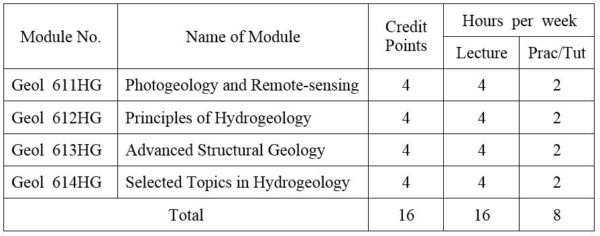
1. Module No: 611HG
Geomorphology with special reference to air-photo interpretation; Techniques of air-photo interpretation in geology; Air-photo interpretation of depositional landforms; Structural interpretation of air-photos; Sensor principles and capabilities, specific properties of images and records. Remote-sensing in geologic mapping; Remote-sensing in Applied Geology; Remote sensing as an aid in development and the evaluation of natural hazards. Types of images and image processing methods. Applied Geomorphology: Development of landforms. Relationship between landform and the underlying geology. Geomorphologic survey and analysis techniques.
2. Module No: Geol 612HG
Hydrologic cycle. Groundwater hydraulics. Hydrochemistry of groundwater. Recent advances in hydrogeology.
3. Module No: Geol 613HG
Current trends in Structural Geology. Stress and Strain in two dimensions. Behavior of rock deformation; Rock behavior under experimental conditions. Dynamics of faulting; Analysis of macro-structures. Petrofabrics. Morphotectonics. Global Tectonics (with special reference to recent developments).
4. Module No: Geol 614HG
Current trends and aspects in advanced hydrogeology. Groundwater and Geotechnological problems.
Hydrogeology of Myanmar: Case studies on Hydrogeology of Myanmar.
FIRST YEAR SEMESTER II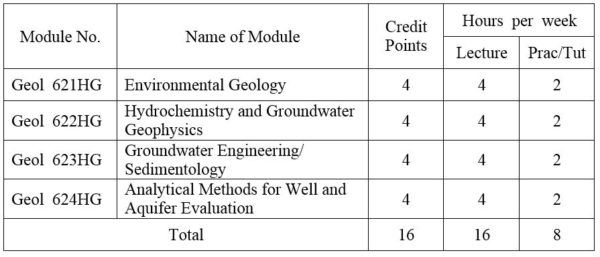
1. Module No: Geol 621HG
Geological hazards:- seismic risk, landslides, subsidence, floods, erosion, volcanic eruptions, discrete and continuous hazards; event return time, Geological resources and their management; Type of resources use and potential environmental conflict; Resource economic and policy formulation; Waste disposal and the mineral industry; Reclamation and rehabilitation of land used for extractive purposes:- Swamp drainage; Geology and Urban planning; Map preparation, Multiple land use principle, Aesthetic criteria for landscape evaluation. Environmental impact of dams, roads, explorative and extractive stages of mining; Impact statement techniques; Case studies; Disaster Management and Risk Reduction.
2. Module No: Geol 622HG
Sources of Salinity , Measures of Water Quality, Chemical Analysis, Graph Representations, Physical Analysis, Biological Analysis, Groundwater Samples, Water Quality Criteria, Changwgs in Chemical Composition, Dissolved Gases, Temperature, Saline Groundwater. Techniques and interpretation of shallow seismic refraction. Application of dam-site, highways, depth of weathering, material quality. Electrical Methods; Direct current geoelectric theory; resistivity sounding and profiling with applications to determination to bedrock depth, location of water table, sheared zones, etc. Magnetic, Electromagnetic and Gravity methods applied to engineering and hydrogeology problems; various geophysical well loggings applied to determination of rock properties and location of clay-filled joints.
3 . Name of Module: Groundwater Engineering (or) Sedimentology
Water Wells, Test Holes and Well Logs, Methods for Construction Shallow Wells, Methods or Drilling Deep Wells, Well Completion, Well Development, Testing Wells for Yield, Well Rehabilitation, Horizontal Wells. Concepts of Basin Management, Equation of Hydrologic Equilibrium, Groundwater Basin Investigations, Data Collection and Fieldwork, Alternative Basin Yields, Evaluation of Penennial Yield, Salt Balance, Basin Management by Conjunctive Use, Examples of Groundwater Management. (OR) Introduction and general consideration; Principles and problems of classification of sedimentary rocks; Clay minerals; Mud rocks; Turbidites, Flysch; Molasses; Sedimentation as ore genesis; Applied sedimentation. Sedimentary environments and facies:- alluvial, deltaic, estuarine, clastic shoreline, carbonate platform, bathyal, abyssal, trench; Carbonate petrography; Carbonate microfacies analysis; Organism and sediments; Phosphate; Bedded chert.
4. Module No: Geol 624HG
Evaluation of bounded aquifers, wedge-shaped and sloping aquifers, Anisotropic aquifers, Multi-layered aquifer systems and partial penetrating wells; well performance tests. Index properties and soil classification; Hydraulic conductivity.
DISTRIBUTION OF MARKS

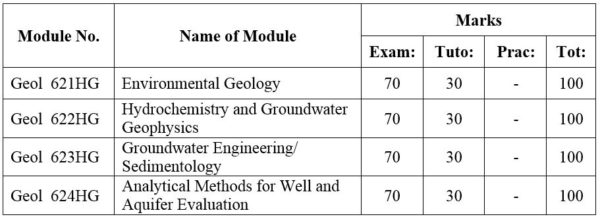
SECOND YEAR SEMESTER I

1. Module No: Geol 631HG
2. Module No: Geol 632HG
SECOND YEAR SEMESTER II
1. Module No: Geol 641HG
2. Module No: Geol 642HG
DISTRIBUTION OF MARKS
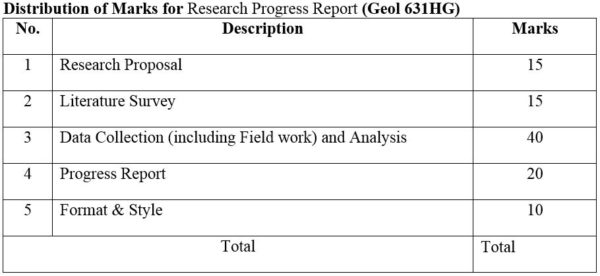
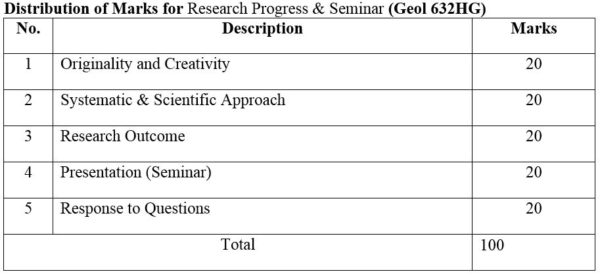
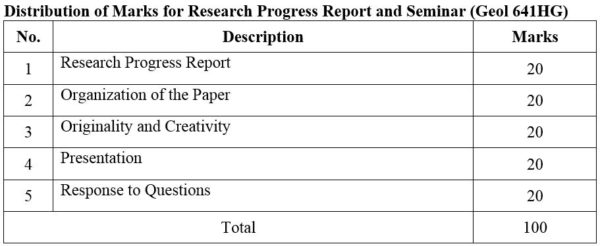
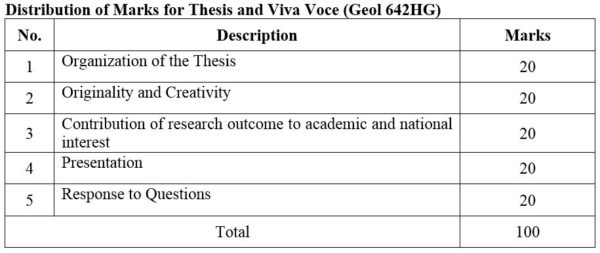

ECONOMIC AND MINING GEOLOGY SPECIALIZATION)
FIRST YEAR SEMESTER I
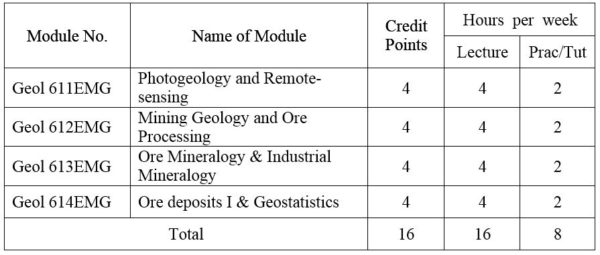
1. Module No: Geol 611EMG
Geomorphology with special reference to air-photo interpretation; Techniques of air-photo interpretation in geology; Air-photo interpretation of depositional landforms; Structural interpretation of air-photos; Sensor principles and capabilities, specific properties of images and records. Remote-sensing in geologic mapping; Remote-sensing in Applied Geology; Remote sensing as an aid in development and the evaluation of natural hazards. Types of images and image processing methods.
2. Module No: Geol 612EMG
Provides a basic introduction to mining. Includes the unique characteristics of the mining industry. Surface and underground mining methods and the unit operations of drilling, blasting, loading and haulage. Myanmar Mines Law is studied. Introduces the role of a mine geologist and the applications of geologic principles to mining practice. Underground and open pit mine mapping and solving of typical problems encountered in the mining industry. Covers mine sampling techniques and ore reserve estimation methods. Includes placer sampling and sampling of drill holes. Calculation of the tonnage factor, recovery, the concentration ratio and the value of the run of mine ore.
A general survey of mineral processing technology and topics include crushing, grinding, sizing, screening, thickening, classification, floatation and leaching.
3. Module No: Geol 613EMG
Ore Mineralogy: A detailed treatment of the ore minerals, their physical, chemical and optical properties, and their relation to each other in ores. Laboratory work includes the identification of minerals by optical, microchemical and X-ray methods, and study of paragenesis of mineral suites from selected mining districts of Myanmar.
Industrial Mineralogy: Glasses, enamels and ceramic materials; Building materials; Phosphate and other mineral fertilizers; Mineral commodities (clay, feldspars, manganese minerals, etc).
4. Module No: Geol 614EMG
The study of the styles, characteristics of metallic ore deposits. Theories of their origin and their implications related to known occurrences. Ore deposits models of the major types of deposits. The lecture series include detailed description of classical mining districts throughout the world.
Studies probability distributions, sampling distributions, estimation and hypotheses testing, regression and correlation.
FIRST YEAR SEMESTER II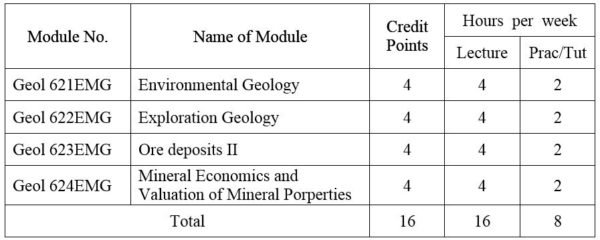
1. Module No: Geol 621EMG
Geological hazards:- seismic risk, landslides, subsidence, floods, erosion, volcanic eruptions, discrete and continuous hazards; event return time, Geological resources and their management; Type of resources use and potential environmental conflict; Resource economic and policy formulation; Waste disposal and the mineral industry; Reclamation and rehabilitation of land used for extractive purposes:- Swamp drainage; Geology and Urban planning; Map preparation, Multiple land use principle, Aesthetic criteria for landscape evaluation. Environmental impact of dams, roads, explorative and extractive stages of mining; Impact statement techniques; Case studies; Disaster Management and Risk Reduction.
2. Module No: Geol 622EMG
Exploration Geochemistry: Lectures deal with various geochemical environments, sample media, sample preparation, analytical methods, control of contamination and error problems. Laboratory work includes layout of exploration programs, sample collection and data analysis using geostatistical computer programs.
Exploration Geophysics: Studies methods of geophysical exploration with emphasis on the fundamental theory of measurement of the physical properties of the earth. The major methods used in geophysical prospecting and the instruments used are studied.
3. Module No: Geol 623EMG
A detailed study of the mining districts of Myanmar which includes the Bawdwin, Yadanatheingi and Bawsaing lead districts, Monywa and Shangalon porphyry copper deposits, the Mawchi tin lodes and the Kyaukpahto, Thabeikkyin and Pyinmana goldfields. Covers the occurrence, distribution, origin and economic importance of nonmetallic deposits. Studies the nonmetallic mining industry of Myanmar.
4. Module No: Geol 624EMG
Case studies on Economic Mineral Deposits of Myanmar
DISTRIBUTION OF MARKS
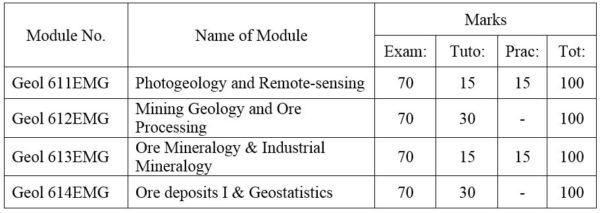
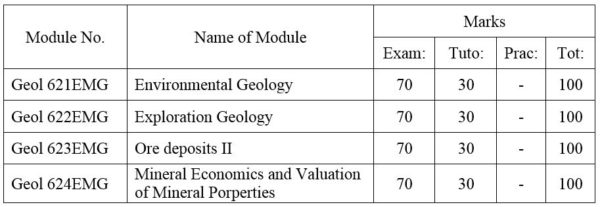
SECOND YEAR SEMESTER I

1. Module No: Geol 631EMG
2. Module No: Geol 632EMG
SECOND YEAR SEMESTER II

1. Module No: Geol 641EMG
2. Module No: Geol 642EMG
DISTRIBUTION OF MARKS
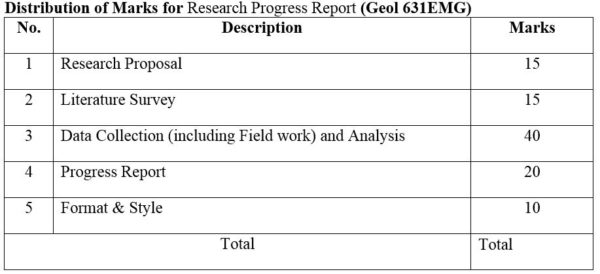
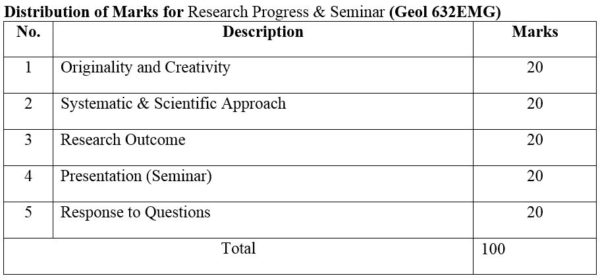
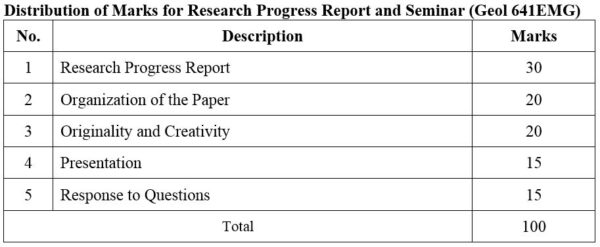
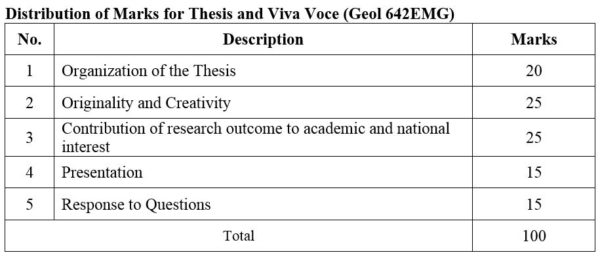
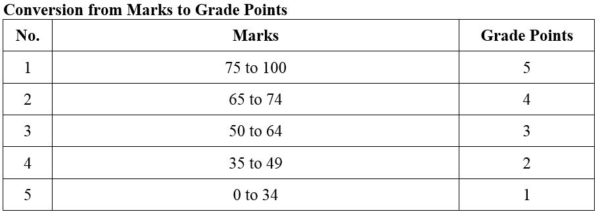
FIRST YEAR SEMESTER I
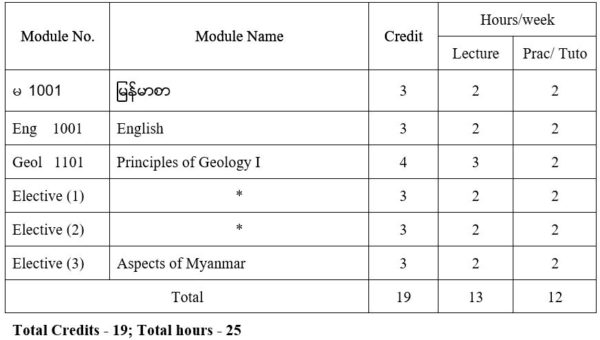
FIRST YEAR SEMESTER II
SECOND YEAR SEMESTER I
SECOND YEAR SEMESTER II
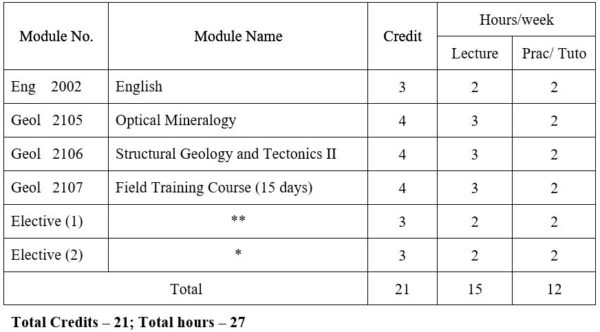
THIRD YEAR SEMESTER I
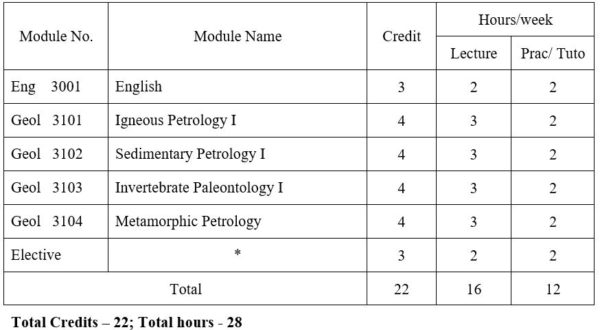
THIRD YEAR SEMESTER II
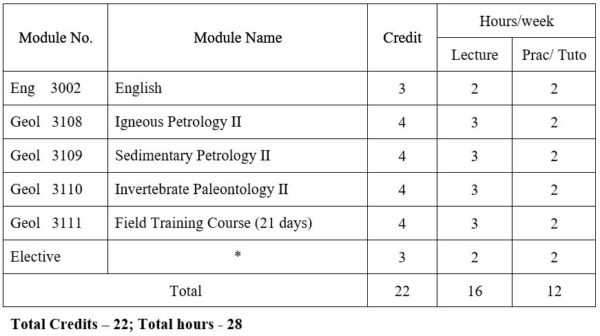
FOURTH YEAR SEMESTER I
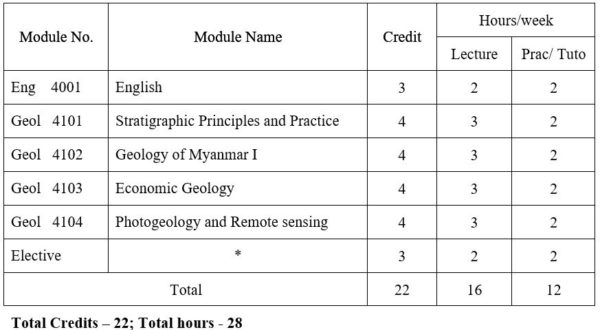
FOURTH YEAR SEMESTER II
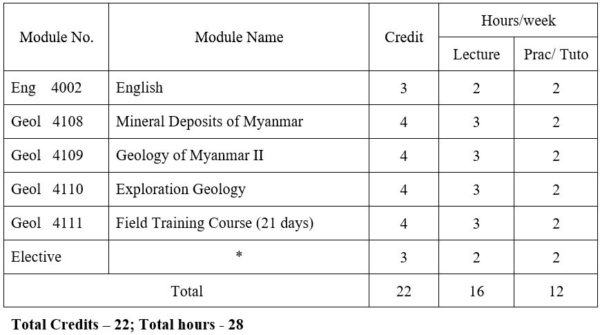
For Economic and Mining Geology Specialization


E 501(A) English: Technical English course intended to give the student enough ability to converse, to read periodicals and write technical reports.
DAG 502-GS Geostatistics and Data processing: Elementary Statistics, frequency distributions, mean, medium, mode and other measurements of distribution. Statistical decision theory. Correlation theory, Analysis of Multivariate data. Computer application in Applied Geology; Data collection and assessment ; Techniques for computer assisted analysis.
DAG 511-EMG Industrial Mineralogy / Ore Mineralogy – I
Fundamentals of the atomic structure of minerals; Mode of formation of minerals and ores in economic metallic and non-metallic minerals. Principles of X-ray diffractometry and the use of X-ray power cameras and diffractometer. Principles of S.E.M. and their application. Nature of reflected light. Ore features and their interpretation. Phase relations. Nature of reflected light. Ore textures and their measurements. Study of selected ores and ore mineral under microscope including textural studies.
DAG 512-EMG Exploration Geophysics – I : Review of the basics in electromagnetic, electromics and vector analysis. Density, magnetic, electrical, conductivity, solubility and other physical and chemical characteristics of common ore and gangue minerals, Introduction to I.P., resistivity, electromagnetic , magnetic, gravity, radiometric and seismic refraction methods, simple laboratory exercises.
DAG 513-EMG Exploration Geochemistry – I : Basic Principles. Field and analytical methods. Dispersion of elements ( secondary and primary ) and its applications in mineral exploration. Some mathematical and statistical methods applied in geochemical exploration. Laboratory exercises.
DAG 514-EMG(A) Ore deposits – I : Types of ore deposits and their geological and geochemical characteristics. Use of isotopic and fluid inclusion data. Genetic models for ore formation.
DAG 515-EMG(A) Economic and Mining Geology – I: General statement. Resources and reserves. Stages in mineral exploration. Mineral exploration techniques. Surveying for field geology. Drilling in mineral exploration. Exploration characteristics of ore deposits. Case studies. Laboratory exercises.
E 501(B) English: Technical English course intended to give the student enough ability to converse, to read periodicals and write technical reports.
DAG 514-EMG(B) Ore deposits – II: Major geological environments with respect to the plate tectonic hypothesis, and associated ore deposits, and their characteristics. Applications of ore genesis modeling in defining the exploration criteria for the various ore deposits.
DAG 515-EMG(B) Economic and Mining Geology – II : Sampling and valuation. Ore reserve calculations and grade controls. Mine surveying. Mining methods. Mineral dressing. Ore microscopy and extractive metallurgy. Marketing. Design and management in mineral exploration and development project. Environmental factors in mining industries.
DAG 521-EMG Structural Geology: Techniques of strain analysis and reconstruction of primary structures. Discussion of fracture patterns, shear zones, folding and boundinage. Statistical analysis of orientation data, superposed folding , domainal analysis of complex structures with practical work. Laboratory work of advanced subsurface methods and stereographic projection.
DAG 522-EMG Remote Sensing and Photogeology include lectures and laboratory exercises useful in mineral exploration and Applied Geology.
DAG 523-EMG Integrated Mineral Exploration ; Ore controls. Case studies of mineral exploration dealing with world and Myanmar examples.
DAG 524-EMG Field Work and Defense of Dissertation : Research works on assigned specialized Field; Preparation and defense of dissertation.
For Exploration Geophysics Specialization


E 501(A) English: Technical English course intended to give the student enough ability to converse, to read periodicals and write technical reports.
DAG 502-GS Geostatistics and Data processing : Elementary Statistics, frequency distributions, mean, medium, mode and other measurements of distribution. Statistical decision theory. Correlation theory, Analysis of Multivariate data. Computer application in Applied Geology; Data collection and assessment ; Techniques for computer assisted analysis.
DAG 511-GP Industrial Mineralogy / Ore Mineralogy – I Fundamentals of the atomic structure of minerals; Mode of formation of minerals and ores in economic metallic and non-metallic minerals. Principles of X-ray diffractometry and the use of X-ray power cameras and diffractometer. Principles of S.E.M. and their application. Nature of reflected light. Ore features and their interpretation. Phase relations. Nature of reflected light. Ore textures and their measurements. Study of selected ores and ore mineral under microscope including textural studies.
DAG 512-GP (A) Exploration Geophysics – I : Review of the basics in electromagnetic, electromics and vector analysis. Density, magnetic, electrical, conductivity, solubility and other physical and chemical characteristics of common ore and gangue minerals, Introduction to I.P., resistivity, electromagnetic, magnetic, gravity, radiometric and seismic refraction methods, Simple laboratory exercises.
DAG 513-GP Exploration Geochemistry – I : Basic Principles. Field and analytical methods. Dispersion of elements (secondary and primary) and its applications in mineral exploration. Some mathematical and statistical methods applied in geochemical exploration. Laboratory exercises.
DAG 514-GP (A) Ore deposits – I: Types of ore deposits and their geological and geochemical characteristics. Use of isotopic and fluid inclusion data. Genetic models for ore formation.
DAG 515-GP Economic and Mining Geology – I: General Statement. Resources and reserves. Stages in mineral exploration. Mineral exploration techniques. Surveying for field geology. Drilling in mineral exploration. Exploration characteristics of oredeposits. Case studies. Laboratory exercises.
E 501(B) English: Technical English course intended to give the student enough ability to converse, to read periodicals and write technical reports.
DAG 512-GP(B) Exploration Geophysics – II : Geophysical methods in exploration includes review of introductory course, induced polarization (frequency and time domains), resistivity ( mapping and sounding), electromagnetic ( Turam, Slingram, V.L.F) , and their applications, field procedures, interpretation and limitations. Also includes magnetic, radiometric, gravity, seismic refraction, airborne and borehole methods; Integrated geophysical surveys and case histories. Laboratory exercises; Instrumentation.
DAG 514-GP (B) Ore deposits – II: Major geological environments with respect to the plate tectonic hypothesis, and associated ore deposits, and their characteristics. Applications of ore genesis modeling in defining the exploration criteria for the various ore deposits.
DAG 521-GP Structural Geology: Techniques of strain analysis and reconstruction of primary structures. Discussion of fracture patterns, shear zones, folding and boundinage. Statistical analysis of orientation data, superposed folding, domainal analysis of complex structures with practical work. Laboratory work of advanced subsurface methods and stereographic projection.
DAG 522-GP Remote Sensing and Photogeology include lectures and laboratory exercises useful in mineral exploration and Applied Geology.
DAG 523-GP Integrated Mineral Exploration; Ore controls. Case studies of mineral exploration dealing with world and Myanmar examples.
DAG 524-GP Field Work and Defense of Dissertation: Research works on assigned specialized field; Preparation and defense of dissertation.
For Exploration Geochemistry Specialization


E 501(A) English : Technical English course intended to give the student enough ability to converse, to read periodicals and write technical reports.
DAG 502-GS Geostatistics and Data processing : Elementary Statistics, frequency distributions, mean, medium, mode and other measurements of distribution. Statistical decision theory. Correlation theory, Analysis of Multivariate data. Computer application in Applied Geology; Data collection and assessment ; Techniques for computer assisted analysis.
DAG 511-GC Industrial Mineralogy / Ore Mineralogy – I Fundamentals of the atomic structure of minerals; Mode of formation of minerals and ores in economic metallic and non-metallic minerals. Principles of X-ray diffractometry and the use of X-ray power cameras and diffractometer. Principles of S.E.M. and their application. Nature of reflected light. Ore features and their interpretation. Phase relations. Nature of reflected light. Ore textures and their measurements. Study of selected ores and ore mineral under microscope including textural studies.
DAG 512-GC Exploration Geophysics – I : Review of the basics in electromagnetic, electromics and vector analysis. Density, magnetic, electrical, conductivity, solubility and other physical and chemical characteristics of common ore and gangue minerals, Introduction to I.P., resistivity, electromagnetic , magnetic, gravity, radiometric and seismic refraction methods, Simple laboratory exercises.
DAG 513-GC(A) Exploration Geochemistry – I : Basic Principles. Field and analytical methods. Dispersion of elements ( secondary and primary ) and its applications in mineral exploration. Some mathematical and statistical methods applied in geochemical exploration. Laboratory exercises.
DAG 514-GC(A) Ore deposits – I : Types of ore deposits and their geological and geochemical characteristics. Use of isotopic and fluid inclusion data. Genetic models for ore formation.
DAG 515-GC Economic and Mining Geology – I: General Statement. Resources and reserves. Stages in mineral exploration. Mineral exploration techniques. Surveying for field geology. Drilling in mineral exploration. Exploration characteristics of ore deposits. Case studies. Laboratory exercises.
E 501(B) English: Technical English course intended to give the student enough ability to converse, to read periodicals and write technical reports.
DAG 513- GC(B) Exploration Geochemistry -II : Geochemistry of the earth. Detailed studies of soil science. Secondary and primary dispersion of elements. Systematic methods and procedures of geochemical exploration. Data processing and interpretation techniques. Review of exploration geochemistry in Myanmar. Seminars and laboratory exercises.
DAG 514-GC(B) Ore deposits – II: Major geological environments with respect to the plate tectonic hypothesis, and associated ore deposits, and their characteristics. Applications of ore genesis modeling in defining the exploration criteria for the various ore deposits.
DAG 521-GC Structural Geology: Techniques of strain analysis and reconstruction of primary structures. Discussion of fracture patterns, shear zones, folding and boundinage. Statistical analysis of orientation data, superposed folding , domainal analysis of complex structures with practical work. Laboratory work of advanced subsurface methods and stereographic projection.
DAG 522-GC Remote Sensing and Photogeology include lectures and laboratory exercises useful in mineral exploration and Applied Geology.
DAG 523-GC Integrated Mineral Exploration : Ore controls. Case studies of mineral exploration dealing with world and Myanmar examples.
DAG 524-GC Field Work and Defense of Dissertation : Research works on assigned specialized field; Preparation and defense of dissertation.
For Industrial Mineralogy and Ore Mineralogy Specialization


E 501(A) English: Technical English course intended to give the student enough ability to converse, to read periodicals and write technical reports.
DAG 502-GS Geostatistics and Data processing : Elementary Statistics, frequency distributions, mean, medium, mode and other measurements of distribution. Statistical decision theory. Correlation theory, Analysis of Multivariate data. Computer application in Applied Geology; Data collection and assessment ; Techniques for computer assisted analysis.
DAG 511-IM (A) Industrial Mineralogy / Ore Mineralogy -I Fundamentals of the atomic structure of minerals; Mode of formation of minerals and ores in economic metallic and non-metallic minerals. Principles of X-ray diffractometry and the use of X-ray power cameras and diffractometer. Principles of S.E.M. and their application. Nature of reflected light. Ore features and their interpretation. Phase relations. Nature of reflected light. Ore textures and their measurements. Study of selected ores and ore mineral under microscope including textural studies.
DAG 512-IM Exploration Geophysics – I: Review of the basics in electromagnetic, electromics and vector analysis. Density, magnetic, electrical, conductivity, solubility and other physical and chemical characteristics of common ore and gangue minerals, Introduction to I.P., resistivity, electromagnetic , magnetic, gravity, radiometric and seismic refraction methods, Simple laboratory exercises.
DAG 513- IM Exploration Geochemistry – I : Basic Principles. Field and analytical methods. Dispersion of elements ( secondary and primary ) and its applications in mineral exploration. Some mathematical and statistical methods applied in geochemical exploration. Laboratory exercises.
DAG 514-IM(A) Ore deposits – I : Types of ore deposits and their geological and geochemical characteristics. Use of isotopic and fluid inclusion data. Genetic models for ore formation.
DAG 515-IM Economic and Mining Geology – I: General Statement. Resources and reserves. Stages in mineral exploration. Mineral exploration techniques. Surveying for field geology. Drilling in mineral exploration. Exploration characteristics of ore deposits. Case studies. Laboratory exercises.
E 501(B) English: Technical English course intended to give the student enough ability to converse, to read periodicals and write technical reports.
DAG 511-IM(B) Industrial mineralogy/ Ore Mineralogy – II : Advanced methods in mineralogy includes ore microscopy; X-ray diffraction; emission spectrography; differential thermal analysis; their basic principles, techniques, interpretation, limitations and practical applications.
Ore mineralogy includes crystal chemistry, principal mineral groups, native metals and semimetals, sulphides and sulphosalts, oxides. Industrial mineralogy includes abrasives, mineral pigments, glasses and enamels, ceramics and refractories, bonding materials, fillers and filters, single crystals, construction materials, metallurgical industry and commodities.
DAG 514-IM(B) Ore deposits – II: Major geological environments with respect to the plate tectonic hypothesis, and associated ore deposits, and their characteristics. Applications of ore genesis modeling in defining the exploration criteria for the various ore deposits.
DAG 521-IM Structural Geology: Techniques of strain analysis and reconstruction of primary structures. Discussion of fracture patterns, shear zones, folding and boundinage. Statistical analysis of orientation data, superposed folding , domainal analysis of complex structures with practical work. Laboratory work of advanced subsurface methods and stereographic projection.
DAG 522-IM Remote Sensing and Photogeology include lectures and laboratory exercises useful in mineral exploration and Applied Geology.
DAG 523-IM Integrated Mineral Exploration ; Ore controls. Case studies of mineral exploration dealing with world and Myanmar examples.
DAG 524-IM Field Work and Defense of Dissertation : Research works on assigned specialized field; Preparation and defense of dissertation.
For Gemmology Specialization


E 501(A) English: Technical English course intended to give the student enough ability to converse, to read periodicals and write technical reports.
DAG 502-GS Geostatistics and Data processing : Elementary Statistics, frequency distributions, mean, medium, mode and other measurements of distribution. Statistical decision theory. Correlation theory, Analysis of Multivariate data. Computer application in Applied Geology; Data collection and assessment ; Techniques for computer assisted analysis.
DAG 511-GM Industrial Mineralogy / Ore Mineralogy – I Fundamentals of the atomic structure of minerals; Mode of formation of minerals and ores in economic metallic and non-metallic minerals. Principles of X-ray diffractometry and the use of X-ray power cameras and diffractometer. Principles of S.E.M. and their application. Nature of reflected light. Ore features and their interpretation. Phase relations. Nature of reflected light. Ore textures and their measurements. Study of selected ores and ore mineral under microscope including textural studies
DAG 512-GM Mineral dressing : Basic theory, comminution, liberation and grindability; conventional comminution equipments. Screening and classification; types of screen. Physical concentration process; gravity concetration; jigs, electronic and optical sorting; electrical and magnetic separation. Chemical concentration process; Leaching Cyanidation and amalgamation, Floatation: Liquid-solid separation: Flocation : Thickening, Filtration. Pollution control.
DAG 513-GM(A) Gemmology – I : Introduction to Gemmology : The nature of gemmology and gemstones,; classification of natural and artificial stones; Formation of minerals and types of occurrence of gems; Elementary crystal chemistry and crystallography ; Physical Properties; Units of Measurement; Nature of light.
DAG 514-GM Ore deposits – I : Types of ore deposits and their geological and geochemical characteristics. Use of isotopic and fluid inclusion data. Genetic models for ore formation.
DAG 515-GM(A) Gemmology-II: Optical Properties; Apparatus used in identification; Fashioning of gemstones; Description and elementary methods of identification of gems.
E 501(B) English: Technical English course intended to give the student enough ability to converse, to read periodicals and write technical reports.
DAG 513-GM(B) Advanced Gemmology – I : Crystal Chemistry and crystallography; Light and colour, Apparatus used in identificaion; Synthetic and imitation ( Simulant stones); Inclusion in Gemstones.
DAG 515-GM(B) Advanced Gemmology – II : Enhancement of Gemstone; Gem species (a) Inorganic Gems and (b) Organic products and their common simulants.
DAG 521-GM Structural Geology: Techniques of strain analysis and reconstruction of primary structures. Discussion of fracture patterns, shear zones, folding and boundinage. Statistical analysis of orientation data, superposed folding , domainal analysis of complex structures with practical work. Laboratory work of advanced subsurface methods and stereographic projection.
DAG 522-GM Remote Sensing and Photogeology include lectures and laboratory exercises useful in mineral exploration and Applied Geology.
DAG 523-GM Exploration for Gemstones: Application of Remote Sensing, Geochemistry, Geophysics and Geology. Extraction of Gemstones.
DAG- 524-GM Field Work and Defense of Dissertation : Research works on assigned specialized field; Preparation and defense of dissertation.
For Engineering Geology Specialization


E 501(A) English : Technical English course intended to give the student enough ability to converse, to read periodicals and write technical reports.
DAG 502-GS Geostatistics and Data processing: Elementary Statistics, frequency distributions, mean, medium, mode and other measurements of distribution. Statistical decision theory. Correlation theory, Analysis of Multivariate data. Computer application in Applied Geology; Data collection and assessment ; Techniques for computer assisted analysis.
DAG 511-EG Environmental Geology : Introduction; Nature and aspects of various geologic hazards; Ways and means of mitigating these hazards; Proper use and care for Earth resources; Waste disposal problems.
DAG 512-EG Exploration Geophysics – I: Review of the basics in electromagnetic, electromics and vector analysis. Density, magnetic, electrical, conductivity, solubility and other physical and chemical characteristics of common ore and gangue minerals, Introduction to I.P., resistivity, electromagnetic , magnetic, gravity, radiometric and seismic refraction methods, Simple laboratory exercises.
DAG 513-EG(A) Engineering Geology – I : Scope and aim of engineering geology; Basic principles of engineering structures ; Geologic conditions for engineers.
DAG 514-EG(A) Soil Mechanics – I: Basic principles of soil mechanics; methods of testing soil properties.
DAG 515-EG Rock Mechanics: Basic Principles of rock mechanics. Interpretation of the geologic conditions concerning the safety of engineering structures, Studies made in the construction of the shafts, drifts, tunnels, mine pillars, rock foundations and slopes, etc.
E 501(B) English: Technical English course intended to give the student enough ability to converse, to read periodicals and write technical reports.
DAG 513-EG(B) Engineering Geology – II : Selected topics in case histories and engineering geological problems. Site visit.
DAG 514-EG(B) Soil Mechanics – II: Continuation of DAG 4306-EG Various engineering problems, such as foundation settlement, slope stability, seepage and drainage.
DAG 521-EG Structural Geology: Techniques of strain analysis and reconstruction of primary structures. Discussion of fracture patterns, shear zones, folding and boundinage. Statistical analysis of orientation data, superposed folding , domainal analysis of complex structures with practical work. Laboratory work of advanced subsurface methods and stereographic projection.
DAG 522- EG Remote Sensing and Photogeology include lectures and laboratory exercises useful in mineral exploration and Applied Geology.
DAG 523- EG Hydrogeology for Engineering Geology: Basic principles of hydrogeology, Groundwater reservoirs, and hydrogeological exploration methods.
DAG 524- EG Field Work and Defense of Dissertation : Research works on assigned specialized field; Preparation and defense of dissertation.
For Hydrogeology Specialization


E 501(A) English: Technical English course intended to give the student enough ability to converse, to read periodicals and write technical reports.
DAG 502-GS Geostatistics and Data processing: Elementary Statistics, frequency distributions, mean, medium, mode and other measurements of distribution. Statistical decision theory. Correlation theory, Analysis of Multivariate data. Computer application in Applied Geology; Data collection and assessment ; Techniques for computer assisted analysis.
DAG 511-HG Environmental Geology :. Introduction; Nature and aspects of various geologic hazards; Ways and means of mitigating these hazards; Proper use and care for Earth resources; Waste disposal problems.
DAG 512-HG Exploration Geophysics -I: Review of the basics in electromagnetic, electronics and vector analysis. Density, magnetic, electrical, conductivity, solubility and other physical and chemical characteristics of common ore and gangue minerals, Introduction to I.P., resistivity, electromagnetic , magnetic, gravity, radiometric and seismic refraction methods, Simple laboratory exercises.
DAG 513-HG(A) Hydrochemistry – I: Principles of hydrogeochemistry. Chemical nature of groundwater, analysis and chemical classification.
DAG 514-HG(A) Groundwater Well Hydraulics – I: Basis of groundwater well hydraulics; hydraulics; hydraulic characteristics of rocks; aquifers and groundwater occurrence; hydraulic characteristics of aquifers.
DAG 515-HG General Hydrology : Hydrologic cycle, Measurement of precipitation, Evaporation & transipiration. Runoff and stream flow; Introduction to hydraulics; Pipe flow; Pumps and their characteristics.
E 501(B) English: Technical English course intended to give the student enough ability to converse, to read periodicals and write technical reports.
DAG 513-HG(B) Hydrochemistry- II: Continuation of DAG 513-HG. Salinity and alkalinity problems of soils with Myanmar examples, mineral factors, and hydrochemical dispersion of elements in groundwater.
DAG 514-HG(B) Groundwater Well Hydraulics – II : Continuation of DAG 514- HG. Methods of pumping test; aquifer boundaries and groundwater flownets; multiple well system; partially penetrating wells; and well spacing problems.
DAG 521-HG Structural Geology: Techniques of strain analysis and reconstruction of primary structures. Discussion of fracture patterns, shear zones, folding and boundinage. Statistical analysis of orientation data, superposed folding , domainal analysis of complex structures with practical work. Laboratory work of advanced subsurface methods and stereographic projection.
DAG 522-HG Remote Sensing and Photogeology include lectures and laboratory exercises useful in mineral exploration and Applied Geology.
DAG 523-HG Exploration methods and Regional Hydrogeology : Classification of aquifers for water supply; hydrogeologic investigation of groundwater for industry, irrigation, etc; hydrogeologic nature of dry zone region; and regional hydrogeology of Myanmar.
DAG- 524-HG Field Work and Defense of Dissertation : Research works on assigned specialized field; Preparation and defense of dissertation.
For Petroleum Geology Specialization


E 501(A) English: Technical English course intended to give the student enough ability to converse, to read periodicals and write technical reports.
DAG 502-GS Geostatistics and Data processing: Elementary Statistics, frequency distributions, mean, medium, mode and other measurements of distribution. Statistical decision theory. Correlation theory, Analysis of Multivariate data. Computer application in Applied Geology; Data collection and assessment ; Techniques for computer assisted analysis.
DAG 511-PG(A) Applied Paleontology: Morphology, Paleoecology, methods of sampling and preparation of various microfossil groups including foraminifera and spores; practical introduction to procedures in micropaleontological laboratories and biostratigraphical methods.
Sedimentology : Textures and structures of sediments; Petrology of sandstones and limestones; processes of deposition ; environmental and basin analysis.
DAG 512-PG(A) Exploration Geophysics – I: Review of the basics in electromagnetic, electromics and vector analysis. Density, magnetic, electrical, conductivity, solubility and other physical and chemical characteristics of common ore and gangue minerals, Introduction to I.P., resistivity, electromagnetic , magnetic, gravity, radiometric and seismic refraction methods, Simple laboratory exercises.
DAG 513-PG Petroleum Exploration : The search for hydrocarbon deposits has led to the development of subsurface branches of stratigraphy, micropaleontology, structural geology and exploration geophysics. This course introduces the student to the application and interaction of these four branches in the exploration for oil and gas.Source, reservoirs, traps, origin, migration, physical and chemical properties and distribution of petroleum, as well as conservation and utilization of hydrocarbon resources are discussed along with drilling, well logging, magnetic, gravity and seismic method. Laboratory work includes well-sample examination, subsurface contour mapping, sedimentary basin evaluation and electrical log correlation.
DAG 514-PG Log Interpretation : Application of electric logs, practical analysis of electrical, radioactivity and temperature Logs and interpretation, base upon their data. Estimation and evaluation of primary oil reserves.
DAG 515-PG Applied Petroleum Geochemistry : Concepts in Geochemistry, Sedimentation of organic matter, composition and structure of organic matter in Immature sediments, transformation of organic matter into Hydrocarbon, source rock character and types of organic matter, oil window area, Migration of hydrocarbon, oil in reservoir and Traps, Geochemical methods and tools in petroleum explorations, and methods to get require data for explorationist.
E 501(B) English: Technical English course intended to give the student enough ability to converse, to read periodicals and write technical reports.
DAG 511-PG(B) Applied Paleontology: Morphology, Paleoecology, methods of sampling and preparation of various microfossil groups including foraminifera and spores; practical introduction to procedures in micropaleontological laboratories and biostratigraphical methods.
Sedimentology : Textures and structures of sediments; Petrology of sandstones and limestones; processes of deposition ; environmental and basin analysis.
DAG 512-PG(B) Petroleum Geophysics : An advanced course in exploration with emphasis on the techniques and interpretation of seismic reflection measurements. Other topics include theory of selected logging methods, and dynamic gravity measurement. Laboratory assignment include computer processing of field data, and interpretation of problems.
DAG 521-PG Structural Geology: Techniques of strain analysis and reconstruction of primary structures. Discussion of fracture patterns, shear zones, folding and boundinage. Statistical analysis of orientation data, superposed folding , domainal analysis of complex structures with practical work. Laboratory work of advanced subsurface methods and stereographic projection.
DAG 522-PG Remote Sensing and Photogeology include lectures and laboratory exercises useful in mineral exploration and Applied Geology.
DAG 523-PG Formation Evaluation and Risk Analysis : Properties of reservoir rocks and fluids, Data evaluation for reservoir calculations water drive and solution gas drive, gas drive oil reservoirs, dissolved gas drive, gas cap drive and water drive oil reservoirs. Infection operations and water flooding process, Pressure maintenance.
DAG 524- PG Field Work and Defense of Dissertation : Research works on Oil field development ; Test well drilling; Cementing; Biostratigraphy and Risk Analysis in oil business; Preparation and defense of Dissertation.
Dr Day Wa Aung
Professor and Head, Department of Geology
Daw Thandar Sein
Lecturer, Department of Geology
Dr Thida Oo
Associate Professor, Department of Geology
Daw Thazin Htet Tin
Demonstrator, Department of Geology
Dr Wai Yan Lai Aung
Demonstrator, Department of Geology
2018 Post-Graduate Dip in Business Law, University of Yangon
2008 Post-Graduate Dip in Applied Geology (Gemmology), University of Yangon
2007 Cert of Advanced Liberian Course, University of Yangon
2015 Cert of the Geological Computer Mapping Course (Auto CAD 2010, Global Mapper II and GPS), GEO CAD
2014 Cert of Swiss Government Excellence Scholarship (FCS), Swiss Federal Institute of Technology, ETH, Zurich, Switzerland
2014 Cert of Perple_X and related software, ETH Zurich, Switzerland
2014 Cert of Special Lecture Course on Resource Geology, University of Yangon
2009 Cert of Ground Surveying and Topo Mapping (Land Development and Software Application), MMT Centre
2008 Cert of Auto CAD 2D/(3D), MMT Centre.
2003 Cert of Advanced Course in Theory and Practical of Gemmology, Gemmological Science Centre, Myanmar.
၁။ ရန်ကုန်တက္ကသိုလ် လူ့စွမ်းအားအရင်းအမြစ်ဖွံ့ဖြိုးမှုဌာန အစီအစဉ်ဖြင့် ၂၀၁၈-၂၀၁၉ ပညာသင်နှစ် အတွက် ဘွဲ့လွန်ဒီပလိုမာဘွဲ့ (Environmental Studies) (၁) နှစ်သင်တန်းကို ဖွင့်လှစ်မည် ဖြစ်ပါသည်။
(၁) သင်တန်းအမည် – Post Graduate Diploma in Environmental Studies
(၂) သင်တန်းအောင်လက်မှတ် – Post Graduate Diploma in Environmental Studies (PGDES)
(၃) သင်တန်းကာလ – (၁) နှစ်
(၄) သင်တန်းဖွင့်မည့်နေ့ရက် – ၃-၁၂-၂၀၁၈ (တနင်္လာနေ့)
(၅) လျှောက်လွှာစတင်လက်ခံမည့်နေ့ရက် – ၁၂-၁၁-၂၀၁၈ (တနင်္လာနေ့)
(၆) လျှောက်လွှာပိတ်မည့်နေ့ရက် – ၂၃-၁၁-၂၀၁၈ (သောကြာနေ့)
(၇) သင်တန်းချိန် – နံနက် (ရးဝ၀) မှ (၉းဝ၀) နာရီအထိ
(တနင်္လာနေ့မှမှ သောကြာနေ့အထိ)
၂။ ဝင်ခွင့်အရည်အချင်းသတ်မှတ်ချက်
(၁) ပြည်ထောင်စုသမ္မတ မြန်မာနိုင်ငံသား ဖြစ်ရမည်။
(၂) တက္ကသိုလ်တစ်ခုခုမှ ဘွဲ့ရရှိပြီးသူများ ဖြစ်ရမည်။
(၃) ဝင်ခွင့်ရေးဖြေစာမေးပွဲကို ၂၅-၁၁-၂၀၁၈ (တနင်္ဂနွေနေ့) နံနက် (၉းဝ၀) နာရီ၊ (A-5) အခန်း၊ ရန်ကုန်တက္ကသိုလ်တွင် ဖြေဆိုရမည်။
(၄) ရြေးဖေစာမေးပွဲ အောင်မြင်ပါက လူတွေ့ဖြေဆိုခြင်းကို ၃၀-၁၁-၂၀၁၈ (သောကြာနေ့) တွင် ြဖေဆိုရမည်။
၃။ ရန်ကုန်တက္ကသိုလ်၊ ကျောင်းသားရေးရာဌာနတွင် သတ်မှတ်ထားသည့် လျှောက်လွှာကို ထုတ်ယူ၍ ၂၃-၁၁-၂၀၁၈ ရက် (သောကြာနေ့) တွင် နောက်ဆုံးထား လျှောက်ထားရမည်။
၄။ အသေးစိတ်အချက်အလက်များကို ရန်ကုန်တက္ကသိုလ်၊ ကျောင်းသားရေးရာဌာန (ဖုန်း-၀၁-၅၃၄၃၉၀) တွင် (ရုံးချိန်)အတွင်း စုံစမ်းနိုင်ပါသည်။
သင်တန်းရေးရာဌာန၊ ရန်ကုန်တက္ကသိုလ်
International Conference: “Transformation Processes in Myanmar III”
15 December 2018
It is our pleasure to invite international and national scholars to the Third International Conference on “Transformation Processes in Myanmar”. The conference is jointly organized by the University of Yangon and the Centre of Excellence on Urban and Regional Development (University of Yangon) in collaboration with the University of Cologne, Germany. It will take place at the University of Yangon on 15th December 2018.
The University of Yangon was established in 1920 and is the first university of Myanmar. On the occasion of its 98th Anniversary in 2018, it is the aim of the International Conference to contribute to the transformation processes in Myanmar. Multidisciplinary topics, approaches and perspectives will be applied in order to support a vivid exchange beyond disciplinary borders and to enhance scientific networks.
The aims of the Conference are:
Topics of sessions
Link to the conference website: www.uy.edu.mm
Publication
In order to enable discussion within the scientific community, we are planning to publish a special issue of the new, reviewed Myanmar Journal of Urban and Regional Development.
Important deadlines
Deadline for the submission of abstract: 3 December 2018.
Travel and accommodation
Unfortunately no travel and accommodation support can be given, but speakers do not need to pay any conference and registration fees.
Organising Committee:
Prof. Dr. Pho Kaung, Rector, University of Yangon (Chair Person)
Prof. Dr. Aung Kyaw, Pro-Professor, University of Yangon (Member)
Prof. Dr. Frauke Kraas, Professor, Institute of Geography, University of Cologne (Member)
Prof. Dr. Htun Ko, Head of Department of Geography, University of Yangon (Member)
Prof. Dr. Zaw Soe Min, Professor, Department of History, University of Yangon (Member)
Prof. Dr. Thandar Aye, Professor of Botany Department, University of Yangon (Member)
Dr. Khin Khin Soe, Associate Professor, Department of Geography, University of Yangon (Secretary)
Dr. Zin Mar Than, Research Fellow, University of Cologne and Centre of Excellence (CoE), University of Yangon (Joint-Secretary)
For any enquiries regarding the programme, please contact: Dr. Khin Khin Soe (khinkhingeog.97@gmail.com).
We are very much looking forward to welcoming you at the International Conference on transformation processes in Myanmar.
Sincerely,
Prof. Dr. Pho Kaung, Rector of the University of Yangon
The Norwegian embassy in Yangon, in collaboration with the University of Yangon, is proud to announce the third time grant for the 10 Bachelor’s scholarships to study at the University of Yangon in the fields of history and humanities.
Background
His Majesty, the King Harald V of Norway during his state visit in Myanmar in early December 2014 announced the establishment of Norwegian scholarship fund to provide the opportunity for selected students from different remote states and regions of Myanmar to study history or humanities at the University of Yangon.
On 4 September 2015, the Royal Norwegian embassy and the University of Yangon signed an official agreement regarding cooperation for the David Taw Scholarship Fund Programme 2015-2020. With addendum No. 1 of 27th November 2017, the scholarship period was extended to 2017-2022.
The scholarship fund is named after David Taw, a distinguished graduate of the University of Yangon, who showed an unwavering commitment to peace throughout his life.
Objective of the Scholarship Fund
The objective of the David TawScholarship Fund is to provide opportunities for outstanding undergraduate students of 2015 to 2018 intakes from different remote states and regions of Myanmar who are financially challenged to study history or humanities at the University of Yangon.
Target groups:
Candidates from rural area of Myanmar who are eligible to study at the University of Yangon and who have been admitted first year of studies at December 2018 intakes in the area of history and humanities subjects (History, Anthropology, Archaeology, Geography, Law, Political Science, Philosophy, Psychology, International relations, Literature (Myanmar and English)
Total Scholarship
Bachelor degree program: 10 scholarships for the December 2018 intakes
Award Value
The award shall be in the form of a grant to subsidize the tuition fee and other expenses associated to the study. Each scholarship will be a monthly award of Kyats 135000 for ten months each academic year.
In order to be entitled to the whole scholarship for the bachelor degree, a student must satisfactorily complete the required credits during the four academic years.
Timeframe
The timeframe of the support cover 2018-2021 academic years Bachelor (8 months for fulltime enrollment).
Selection Critera for the potentail candidates
Student Status: The candidates should be admitted for first year of studies at the University of Yangon during December 2018 intakes in the following fields;
Strong Consideration will be given to
Recruitment
Under this project, qualified first year students enrolled for 2018 December undergraduate intakes will be recruited by an admission committee of the University of Yangon and the Norwegian Embassy.
The decision for admission will solely be upon the admission committee. In addition to the usual application process, on-site recruitment and/or interview may also be conducted, if necessary.
Application and the Closing Date
Application is open from 3 December 2018 and the closing date is 31 December 2018 COB (Close of Business).
How to Apply
Each Applicant will be required to fill up an application form. Electronic Version of the Application forms can be downloaded from the Email and Web based announcements. Hard copies of the application form can be collected from the Training Department of the University of Yangon.
For more information, please contact U Aung Soe, Assistant Registrar of Academic Affairs Department. Office Phone: +95 (1) -534390
(Or)
The Norwegian Embassy, Office: +95 (1) 513459, 513627, 513715, 513740
သမိုင်းနှင့်လူမှုရေးဘာသာရပ်များကို ရန်ကုန်တက္ကသိုလ်၌ ၂၀၁၈ ခုနှစ် ဒီဇင်ဘာလတွင် ပထမနှစ်အဖြစ် စတင်တက်ရောက်ခွင့်ရရှိသည့် ဝေးလံခေါင်သီသည့် ကျေးလက်ဒေသမှ ကျောင်းသူ၊ ကျောင်းသားများအတွက် ရန်ကုန်မြို့ရှိ နော်ဝေနိုင်ငံသံရုံးနှင့် ရန်ကုန်တက္ကသိုလ်တို့ပူးပေါင်းဆောင်ရွက်ကာ ပညာသင်ဆု (၁၀) ဆု ချီးမြှင့်မည်ဖြစ်သည်။
ထောက်ပံကာလအနေဖြင့် ၂၀၁၈-၂၀၂၁ ပညာသင်နှစ်များ၏ တက္ကသိုလ်ပထမဘွဲ့ (Bachelor Degree) အတွက် တနှစ်လျှင် (၁၀) လ ချီးမြှင့်မည်ဖြစ်ပါသည်။
လျှောက်လွှာများကို (၃-၁၂-၂၀၁၈) ရက်နေ့မှ (၃၁-၁-၂၀၁၉) အတွင်း ရန်ကုန်တက္ကသိုလ် ကျောင်းသားရေးရာဌာနတွင် ရယူလျှောက်ထားနိုင်ပါသည်။
အသေးစိတ်အချက်အလက်များပိုမိုသိရှိလိုပါက ဦးအောင်စိုး၊ လက်ထောက်မော်ကွန်းထိန်း၊ သင်တန်းရေးရာဌာန၊ ရန်ကုန်တက္ကသိုလ်ထံ စုံစမ်းနိုင်ပါသည်။
ရုံးဖုန်းနံပါတ် +၉၅ (၁) ၅၃၄၃၉၀
The international Conference on Recent Innovations in NanoScience and Technology 2018 (ICRINT2018) will be held in University of Yangon, Myanmar from 26th December to 28th December, 2018. We invite submissions of papers on all topics related to NanoScience and Technology for the conference proceedings, and proposals for conference.
Department of Physics, University of Yangon, co-hosted by Faculty of Science, Josai University, Japan.
Abstract submissions (250 words approximately) will open on September 25, 2018 and are managed through online (icrint2018@gmail.com):
| Last Day for the Submission of Abstract | 5 November, 2018 |
| Notification of Acceptance of Abstract | 23 November, 2018 |
| Last Day of Registration of Presentation Authors | 3-7 December, 2018 |
| Last Day of Registration of Observers | |
| Last Day of Submission of Full Papers | 10 December, 2018 |
| Local (Excluding Accommodation) | 70000 MMK |
| International Participants | USD 100 |
| Observer (Local) | 30000 MMK |
| Observer (International) | USD 100 |
*** Payment receipt must be sent to icrint2018@gmail.com ***
Bank Name: KBZ Bank, (Kamayut-2 Branch, Yangon)
Name of Account: MA KHIN LAY THWE
Account Number: 16030202100081801
Conference Session and Standard
Submitted paper must be no longer than 5 pages including acknowledgements and references. Camera-ready papers must be submitted to editorial board by *10 December, 2018. Please do not wait until the last day, as fixes might require some time. We will be publishing the proceedings as part of the Proceeding of ICRINT2018 (Paper templates can be downloaded from the website).
Reviewing for ICRINT2018 is double-blind. The reviewers will not know the authors’ identity (and vice versa). We will send back the final version of your paper within 2 weeks.
It is not appropriate to submit papers that are identical to versions that have been previously published, or accepted for publication, or that have been submitted in parallel to other conferences. Such submissions violate our dual submission policy.
Accepted papers must contain significant novel results. Results can be either theoretical or empirical. Results will be judged on the degree to which they have been objectively established and/or their potential for scientific and technological impact.
26.12.2018 Registration, Welcome Reception
27.12.2018 Opening Ceremony, Technical Session, Banquet
28.12.2018 Technical Session, Closing
Dr Aung Kyaw
Professor, Department of Mathematics
Publication:
Dr. Khin Mar Cho who is International Agricultural Extension, Food and Nutrition Specialist, Cornell University, USA, will give a seminar about Food Technology in Industrial Chemistry Department, University of Yangon on 4th December, 2018.
Curriculum for B. Sc. Degree (Mathematics Specialization)
First Year First Semester
| Module No. | Name of Module | Credit
units |
Hours per week | |
| Lecture | Tutorial/ Practical | |||
| Ma 1001 | Myanmar | 3 | 2 | 2 |
| Eng 1001 | English | 3 | 2 | 2 |
| Math 1101 | Algebra and Analytic Geometry | 4 | 3 | 2 |
| Math 1102 | Trigonometry and Differential Calculus | 4 | 3 | 2 |
| Elective | * | 3 | 2 | 2 |
| AM 1001 | Aspects of Myanmar | 3 | 2 | 2 |
| Total | 20 | 14 | 12 | |
*A student can choose any 1 of 4 elective courses offered by the departments of physics, chemistry, philosophy, geology to fulfill a total of 20 credit units.
Foundation Courses
Ma 1001 Myanmar
Eng 1001 English
Core Courses
Math 1101 Algebra and Analytic Geometry
Math 1102 Trigonometry and Differential Calculus
Elective Courses
Phys 1001 Physics
Chem 1001 Chemistry
Phil 1005 Mathematical Logic I
Geol 1001 General Geology I
First Year Second Semester
| Module No. | Name of Module | Credit
units |
Hours per week | |
| Lecture | Tutorial/ Practical | |||
| Ma 1002 | Myanmar | 3 | 2 | 2 |
| Eng 1002 | English | 3 | 2 | 2 |
| Math 1103 | Algebra and Analytical Solid Geometry | 4 | 3 | 2 |
| Math 1104 | Differential and Integral Calculus | 4 | 3 | 2 |
| Elective | * | 3 | 2 | 2 |
| AM 1002 | Aspects of Myanmar | 3 | 2 | 2 |
| Total | 20 | 14 | 12 | |
*A student can choose any 1 of 4 elective courses offered by the departments of physics, chemistry, philosophy, geology to fulfill a total of 20 credit units.
Foundation Courses
Ma 1002 Myanmar
Eng 1002 English
Core Courses
Math 1103 Algebra and Analytical Solid Geometry
Math 1104 Differential and Integral Calculus
Elective Courses
Phys 1002 Physics
Chem 1002 Chemistry
Phil 1006 Mathematical Logic II
Geol 1003 General Geology II
Second Year First Semester
| Module No. | Name of Module | Credit
units |
Hours per week | |
| Lecture | Tutorial/ Practical | |||
| Eng 2001 | English | 3 | 2 | 2 |
| Math 2101 | Complex Variables I | 4 | 3 | 2 |
| Math 2102 | Calculus of Several Variables | 4 | 3 | 2 |
| Math 2103 | Vector Algebra and Statics | 4 | 3 | 2 |
| Elective (1) | * | 3 | 2 | 2 |
| Elective (2) | * | 3 | 2 | 2 |
| Total | 21 | 15 | 12 | |
*A student can choose any 2 of 4 elective courses offered by the department of mathematics and physics to fulfill a total of 21 credit units.
Foundation Courses
Eng 2001 English
Core Courses
Math 2101 Complex Variables I
Math 2102 Calculus of Several Variables
Math 2103 Vector Algebra and Statics
Elective Courses
Phys 2003 Physics
Math 2104 Discrete Mathematics I
Math 2105 Theory of Sets I
Math 2106 Spherical Trigonometry and Its Applications
Second Year Second Semester
| Module No. | Name of Module | Credit
units |
Hours per week | |
| Lecture | Tutorial/ Practical | |||
| Eng 2002 | English | 3 | 2 | 2 |
| Math 2107 | Linear Algebra I | 4 | 3 | 2 |
| Math 2108 | Ordinary Differential Equations | 4 | 3 | 2 |
| Math 2109 | Vector Calculus and Dynamics | 4 | 3 | 2 |
| Elective (1) | * | 3 | 2 | 2 |
| Elective (2) | * | 3 | 2 | 2 |
| Total | 21 | 15 | 12 | |
*A student can choose any 2 of 4 elective courses offered by the department of mathematics and Physics to fulfill a total of 21 credit units.
Foundation Courses
Eng 2002 English
Core Courses
Math 2107 Linear Algebra I
Math 2108 Ordinary Differential Equations
Math 2109 Vector Calculus and Dynamics
Elective Courses
Phys 2004 Physics
Math 2110 Discrete Mathematics II
Math 2111 Theory of Sets II
Math 2112 Astronomy
Third Year First Semester
| Module No. | Name of Module | Credit
units |
Hours per week | |
| Lecture | Tutorial/ Practical | |||
| Eng 3001 | English | 3 | 2 | 2 |
| Math 3101 | Analysis I | 4 | 3 | 2 |
| Math 3102 | Linear Algebra II | 4 | 3 | 2 |
| Math 3103 | Differential Equations | 4 | 3 | 2 |
| Math 3104 | Differential Geometry | 4 | 3 | 2 |
| Elective (1) | * | 3 | 2 | 2 |
| Total | 22 | 16 | 12 | |
*A student can choose any 1 of 2 elective courses offered by the department of mathematics to fulfill a total of 22 credit units.
Foundation Courses
Eng 3001 English
Core Courses
Math 3101 Analysis I
Math 3102 Linear Algebra II
Math 3103 Differential Equations
Math 3104 Differential Geometry
Elective Courses
Math 3105 Tensor Analysis
Math 3106 Number Theory I
Third Year Second Semester
| Module No. | Name of Module | Credit
units |
Hours per week | |
| Lecture | Tutorial/ Practical | |||
| Eng 3002 | English | 3 | 2 | 2 |
| Math 3107 | Analysis II | 4 | 3 | 2 |
| Math 3108 | Linear Algebra III | 4 | 3 | 2 |
| Math 3109 | Mechanics | 4 | 3 | 2 |
| Math 3110 | Probability and Statistics | 4 | 3 | 2 |
| Elective (1) | * | 3 | 2 | 2 |
| Total | 22 | 16 | 12 | |
*A student can choose any 1 of 2 elective courses offered by the department of mathematics to fulfill a total of 22 credit units.
Foundation Courses
Eng 3002 English
Core Courses
Math 3107 Analysis II
Math 3108 Linear Algebra III
Math 3109 Mechanics
Math 3110 Probability and Statistics
Elective Courses
Math 3111 Complex Variables II
Math 3112 Number Theory II
Fourth Year First Semester
| Module No. | Name of Module | Credit
units |
Hours per week | |
| Lecture | Tutorial/ Practical | |||
| Eng 4001 | English | 3 | 2 | 2 |
| Math 4101 | Analysis III | 4 | 3 | 2 |
| Math 4102 | Numerical Analysis I | 4 | 3 | 2 |
| Math 4103 | Linear Programming | 4 | 3 | 2 |
| Math 4104 | Partial Differential Equations | 4 | 3 | 2 |
| Elective (1) | * | 3 | 2 | 2 |
| Total | 22 | 16 | 12 | |
*A student can choose any 1 of 2 elective courses offered by the department of mathematics to fulfill a total of 22 credit units.
Foundation Courses
Eng 4001 English
Core Courses
Math 4101 Analysis III
Math 4102 Numerical Analysis I
Math 4103 Linear Programming
Math 4104 Partial Differential Equations
Elective Courses
Math 4105 Stochastic Process I
Math 4106 Fundamentals of Algorithms and Computer Programming
Fourth Year Second Semester
| Module No. | Name of Module | Credit
units |
Hours per week | |
| Lecture | Tutorial/ Practical | |||
| Eng 4002 | English | 3 | 2 | 2 |
| Math 4107 | Analysis IV | 4 | 3 | 2 |
| Math 4108 | General Topology I | 4 | 3 | 2 |
| Math 4109 | Abstract Algebra I | 4 | 3 | 2 |
| Math 4110 | Hydromechanics | 4 | 3 | 2 |
| Elective (1) | * | 3 | 2 | 2 |
| Total | 22 | 16 | 12 | |
*A student can choose any 1 of 2 elective courses offered by the department of mathematics to fulfill a total of 22 credit units.
Foundation Courses
Eng 4002 English
Core Courses
Math 4107 Analysis IV
Math 4108 General Topology I
Math 4109 Abstract Algebra I
Math 4110 Hydromechanics
Elective Courses
Math 4111 Stochastic Process II
Math 4112 Integer Programming
Curriculum for B. Sc. ( Hons ) Degree (Mathematics Specialization)
First Year Honours First Semester
| Module No. | Name of Module | Credit
units |
Hours per week | |
| Lecture | Tutorial/ Practical | |||
| Eng 3001 | English | 3 | 2 | 2 |
| Math 3201 | Analysis I | 4 | 3 | 2 |
| Math 3202 | Linear Algebra II | 4 | 3 | 2 |
| Math 3203 | Differential Equations | 4 | 3 | 2 |
| Math 3204 | Differential Geometry | 4 | 3 | 2 |
| Elective (1) | * | 3 | 2 | 2 |
| Total | 22 | 16 | 12 | |
*A student can choose any 1 of 2 elective courses offered by the department of mathematics to fulfill a total of 22 credit units.
Foundation Courses
Eng 3001 English
Core Courses
Math 3201 Analysis I
Math 3202 Linear Algebra II
Math 3203 Differential Equations
Math 3204 Differential Geometry
Elective Courses
Math 3205 Tensor Analysis
Math 3206 Number Theory I
First Year Honours Second Semester
| Module No. | Name of Module | Credit
units |
Hours per week | |
| Lecture | Tutorial/ Practical | |||
| Eng 3002 | English | 3 | 2 | 2 |
| Math 3207 | Analysis II | 4 | 3 | 2 |
| Math 3208 | Linear Algebra III | 4 | 3 | 2 |
| Math 3209 | Mechanics | 4 | 3 | 2 |
| Math 3210 | Probability and Statistics | 4 | 3 | 2 |
| Elective (1) | * | 3 | 2 | 2 |
| Total | 22 | 16 | 12 | |
*A student can choose any 1 of 2 elective courses offered by the department of mathematics to fulfill a total of 22 credit units.
Foundation Courses
Eng 3002 English
Core Courses
Math 3207 Analysis II
Math 3208 Linear Algebra III
Math 3209 Mechanics
Math 3210 Probability and Statistics
Elective Courses
Math 3211 Complex Variables II
Math 3212 Number Theory II
Second Year Honours First Semester
| Module No. | Name of Module | Credit
units |
Hours per week | |
| Lecture | Tutorial/ Practical | |||
| Eng 4001 | English | 3 | 2 | 2 |
| Math 4201 | Analysis III | 4 | 3 | 2 |
| Math 4202 | Numerical Analysis I | 4 | 3 | 2 |
| Math 4203 | Linear Programming | 4 | 3 | 2 |
| Math 4204 | Partial Differential Equations | 4 | 3 | 2 |
| Elective (1) | * | 3 | 2 | 2 |
| Total | 22 | 16 | 12 | |
*A student can choose any 1 of 2 elective courses offered by the department of mathematics to fulfill a total of 22 credit units.
Foundation Courses
Eng 4001 English
Core Courses
Math 4201 Analysis III
Math 4202 Numerical Analysis I
Math 4203 Linear Programming
Math 4204 Partial Differential Equations
Elective Courses
Math 4205 Stochastic Process I
Math 4206 Fundamentals of Algorithms and Computer Programming
Second Year Honours Second Semester
| Module No. | Name of Module | Credit
units |
Hours per week | |
| Lecture | Tutorial/ Practical | |||
| Eng 4002 | English | 3 | 2 | 2 |
| Math 4207 | Analysis IV | 4 | 3 | 2 |
| Math 4208 | General Topology I | 4 | 3 | 2 |
| Math 4209 | Abstract Algebra I | 4 | 3 | 2 |
| Math 4210 | Hydromechanics | 4 | 3 | 2 |
| Elective (1) | * | 3 | 2 | 2 |
| Total | 22 | 16 | 12 | |
*A student can choose any 1 of 2 elective courses offered by the department of mathematics to fulfill a total of 22 credit units.
Foundation Courses
Eng 4002 English
Core Courses
Math 4207 Analysis IV
Math 4208 General Topology I
Math 4209 Abstract Algebra I
Math 4210 Hydromechanics
Elective Courses
Math 4211 Stochastic Process II
Math 4212 Integer Programming
Third Year Honours First Semester
| Module No. | Name of Module | Credit
units |
Hours per week | |
| Lecture | Tutorial/ Practical | |||
| Math 5201 | Analysis V | 4 | 4 | 2 |
| Math 5202 | General Topology II | 4 | 4 | 2 |
| Math 5203 | Abstract Algebra II | 4 | 4 | 2 |
| Math 5204 | Hydrodynamics I | 4 | 4 | 2 |
| Math 5205 | Numerical Analysis II | 4 | 4 | 2 |
| Math 5206 | Qualitative Theory of Ordinary Differential Equations I | 4 | 4 | 2 |
| Total | 24 | 24 | 12 | |
Third Year Honours Second Semester
| Module No. | Name of Module | Credit
units |
Hours per week | |
| Lecture | Tutorial/ Practical | |||
| Math 5207 | Analysis VI | 4 | 4 | 2 |
| Math 5208 | General Topology III | 4 | 4 | 2 |
| Math 5209 | Abstract Algebra III | 4 | 4 | 2 |
| Math 5210 | Hydrodynamics II | 4 | 4 | 2 |
| Math 5211 | Graph Theory | 4 | 4 | 2 |
| Math 5212 | Qualitative Theory of Ordinary Differential Equations II | 4 | 4 | 2 |
| Total | 24 | 24 | 12 | |
Curriculum for M Sc. Degree (Mathematics Specialization)
M.Sc First Year First Semester
| Module No. | Name of Module | Credit
units |
Hours per week | |
| Lecture | Tutorial/ Practical | |||
| Math 611 | Analysis I | 4 | 4 | 2 |
| Math 612 | Abstract Algebra | 4 | 4 | 2 |
| Math 613 | (a) Qualitative Theory of Ordinary Differential Equations(OR)
(b) Dynamical systems |
4 | 4 | 2 |
| Math 614 | Discrete Mathematics
|
4 | 4 | 2 |
| Math 615 | Numerical Analysis I
(OR) Solution of linear Systems of equations |
4 | 4 | 2 |
| Math 616 | Physical Applied Mathematics I | 4 | 4 | 2 |
| Math 617 | Stochastics Process I | 4 | 4 | 2 |
| Total | 28 | 28 | 14 | |
M.Sc First Year Second Semester
| Module No. | Name of Module | Credit
units |
Hours per week | |
| Lecture | Tutorial/ Practical | |||
| Math 621 | Analysis II | 4 | 4 | 2 |
| Math 622 | Linear Algebra | 4 | 4 | 2 |
| Math 623 | (a) Partial Differential Equations (OR)
(b) Differential Geometry |
4 | 4 | 2 |
| Math 624 | Graph Theor | 4 | 4 | 2 |
| Math 625 | Numerical Analysis II | 4 | 4 | 2 |
| Math 626 | Physical Applied Mathematics II | 4 | 4 | 2 |
| Math 627 | Stochastics Process II | 4 | 4 | 2 |
| Elective (1) | * | 3 | 2 | 2 |
| Total | 28 | 28 | 14 | |
*A student can choose any 1 of 2 elective courses offered by the department of mathematics to fulfill a total of 22 credit units.
Core Courses
| Math 621 | Analysis II |
| Math 622 | Linear Algebra |
| Math 623 | (a) Partial Differential Equations
(OR) (b) Differential Geometry |
| Math 624 | Graph Theory |
| Math 625 | Numerical Analysis II |
| Math 626 | Physical Applied Mathematics II |
| Math 627 | Stochastics Process II |
Elective Courses
Math 628 PDE and Approximations
Math 629 Applied Probability and Satatistics
FIRST SEMESTER
Math 611 Analysis VII
Integration: concept of measurability, simple functions, elementary properties of measures, integration of positive functions, Lebesgue’s monotone convergence theorem, integration of complex functions, Lebesgue’s dominated convergence theorem.
Positive Borel Measures: Riesz representation theorem, regularity properties of Borel measures, Lebesgue measures, continulity properties of measurable functions
Lp-spaces: convex functions and inequalities, the Lp-spaces, approximation by continuous functions.
Texts
[1] Swe. K. M. (1995) Lectures on Functional Analysis, Mathematics Association,
University of Mawlamyine
[2] Rudin. W. (1966) Real and Complex Analysis, McGraw- Hill, New York.
References
[1] Royden.H.L. (1968) Real Analysis. 2nd Printing, Macmillan.
[2] Friedmen .A. (1982) Foundations of Modern Analysis , Dover
Publications, Inc, New York.
[3] Taylor A.E, General Theory of Function and Integration.
Math 612 Abstract Algebra IV
Ring: Polynomial rings, polynomials over the rationals, field of quotients of an integral domain
Fields: Examples of fields, a brief excursion into vector spaces, field extensions
Text: Herstein, I. N. (1996), Abstract Algebra, Prentice-Hall.
(Chapter 4 Ring Theory [Sections 4.5, 4.6, 4.7]
Chapter 5 Fields [Sections 5.1, 5.2, 5.3])
Math 613
(a) Qualitative Theory of Ordinary Differential Equations
Lyapunov’s second method, applications of ODE
Text: Brauer. F. and Nohel, J. A. (1969), The Qualitative Theory of Ordinary
Differential Equations: An Introduction, W. A. Benjamin, Inc.
(Chapter 5 Lyapunov’s Second Method
Chapter 6 Some Applications)
(OR)
(b) Dynamical Systems
1. Linear differential systems
Case of constant coefficients. Existence and uniqueness theorem in the general case, resolvent.
2. Nonlinear differential systems
Analytical aspects: existence and uniqueness theorem, maximal solutions, estimations of the time of existence, Gronwell lemma.
Geometric aspects: flow, phase portrait and qualitative study of differential systems, Poincare first return map, invariance submanifolds, Poincare-Bendixson theorem. Perturbations of a differential system.
3. Stability of invariant sets
First integrals and Lyapunov functions. Stability of fixed points. Stability of periodic orbits.
4. Local study in the neighborhood of a fixed point
Stable and unstable manifolds of a hyperbolic fixed point. Hartman-Grobman theorem.
Text:
[1] Hirsch, Smale and R. L. Devancy. (2004), Differential equations, dynamical systems and an introduction to chaos, Elevesier.
[2] Arnold. V. I., (1992) Oridinary differential equations, third edition, Springer Verlag
Network models, a maximal flow algorithm, the max flow, min cut theorem, matching,
Reference:
[1] Verhulst, F. (1980) Nonlinear equations and Dynamical Systems. Springer-Verlag
[2] Teschl. G. Oridinary Differential Equations and Dynamical Systems
Math 614 Discrete Mathematics III
Network models, a maximal flow algorithm, the max flow, min cut theorem, matching,
combinatorial circuits, properties of combinatorial circuits, Boolean algebras, Boolean functions and synthesis of circuits, applications
Text: Johnsonbaugh, R. (1990), Discrete Mathematics, Macmillan.
(Chapter 8 Network Models
Chapter 9 Boolean Algebras and Combinatorial Circuits)
Math 615 Numerical Analysis III
Polynomial approximation, interpolation, quadrature formulas, solution of non linear equations, optimization
Text:
[1] Quarteoni, A. and Sacco, R. and Saleri, F. (2007) Numerical mathematics, Springer-Verlag
References:
[1] Ciarlet, P. G. (1989) Introduction to numerical linear algebra and optimization, Cambridge University Press
[2] Trefethen Lioyd N. (2013) Approximation theory and approximation practice, SIAM.
(OR)
Solution of linear systems of equations
Text: Plato. R. (2003), Concise Numerical Mathematics, AMS.
(Chapter 4 Solution of Linear Systems of Equations)
Math 616 Physical Applied Mathematics I
General theory of stress and strain: Definitions of stress, stress vector and components of stress tensor, state of stress at a point, symmetry of stress tensor, transformation of stress components, principal stresses and principal directions, principal direction of stress tensors.
Nature of strain, transformation of the rates of strain components, relation between stress and rate of strain in two dimensional case, the rate of strain quadratic, translation, rotation and deformation.
Viscous fluid: The Navier-Stokes equations of motion of a viscous fluid, the energy equation conservation of energy.
Text
[1] M.D.RAISINGHANIA(2010)
( Chapter 13, Chapter 14)
Math 617 Stochastics Process III
Foundations of probability of theory, limit theorems, probability distributions, probability measures and spaces
References:
[1] Cramer, H. & Leadbetter, M. R. (1946) Stationary and related stochastic
processes, Princeton University Press
[2] Feller, W. (1970) An Introduction to Probability Theory and Its Applications, 3rd
Edition, Vol I, John Wiley & Sons
[3] Feller, W. (1966) An Introduction to Probability Theory and Its Applications,
Vol II, John Wiley & Sons
[4] Hida, T. (1980) Brownian Motion, Springer-Verlag
[5] Hida, T. & Hitsuda, M. (1991) Gaussian Processes, AMS
SECOND SEMESTER
Math 621 Analysis VIII
Banach Spaces: Banach Spaces. Examples: c1 , c0 , C(X) Continuous Linear Transformation. Functionals. Dual Space N * of a Normed Space N. The Hahn Banach Theorem. Duals of Natural Imbedding of N in N ** . Reflexive Spaces. Weak Topology. Weak* topology. The Open Mapping Theorem. The Closed Graph Theorem. The Uniform Boundedness Theorem. The Conjugate of an Operator.
Hilbert Space: Inner Product Space. Hilbert Space. Examples: , l2 , L2. Schwarz Inequality. Orthogonal Complement, Orthonormal Sets. Bessel’s Inequality. Parscal’s Equation. The Conjugate Space H* of a Hilbert Space H. Representation of Functionals in H*. The Adjoint of an Operator. Self-Adjoint Operator. Normal and Unitary Operators-Projectory.
Texts
[1] Swe, K. M. (1995) Lectures on Functional Analysis. University of Mawlamyine, Mathematics Association.
[2] Simmons, G.F. (1963) Introduction to Topology and Modern Analysis, McGraw-Hill, New York.
Reference
[1] Kreyszig, E.(1978) Introductory Functional Analysis with Applications, John Wiley
& Sons, New York.
Math 622 Linear Algebra IV
Eigenvectors and eigenvalues, polynomials and matrices, triangulations of matrices and linear maps
Text: Lang, S. (2004), Linear Algebra, Third Edition, Springer.
(Chapter 8 Eigenvectors and Eigenvalues
Chapter 9 Polynomials and Matrices
Chapter 10 Triangulations of Matrices and Linear Maps)
Math 623
(a) Partial Differential Equations
Integral curves and surfaces of vector fields, theory and applications of quasi-linear and linear equations of first order, series solutions, linear partial differential equations, equations of mathematical Physics
Text: Zachmanoglou, E. C. and Thoe, D. W. (1976), Introduction to Partial
Differential Equations with Applications, Dover Publications, Inc.
(Chapter 2 Integral Curves and Surfaces of Vector Fields
Chapter 3 Theory and Applications of Quasi-Linear and Linear Equations of
First Order
Chapter 4 Series Solutions
Chapter 5 Linear Partial Differential Equations
Chapter 6 Equations of Mathematical Physics)
(OR)
(b) Differential Geometry
The course of differential geometry is an introduction of methods of differential calculus on submanifolds. We address the following points: Inverse function theorem. Implicit function theorem. Local normal forms for maps of constant rank. Definition of submanifolds. Examples. Tangent bundle. Vector fields. Lie bracket. Lie groups. Local geometry of a hypersurface in the Euclidian soace. First and second fundmental form. Gauss curvature. Egregium theorem.
Text:
[1] M. P. Do Carmo, Differential Geometry of curves and surfaces
Math 624 Graph Theory II
Connectivity, Euler tours and Hamilton cycles
Text: Bondy, J. A., and Murty, U. S. R (1984), Graph Theory with Applications,
Springer- Verlag.
(Chapter 3 Connectivity
Chapter 4 Euler Tours and Hamilton Cycles)
Math 625 Numerical Analysis IV
Nonlinear system of equations, explicit one-step methods for initial value problems in ordinary differential equations
Text: Plato. R. (2003), Concise Numerical Mathematics, AMS
(Chapter 5 Nonlinear System of Equations
Chapter 7 Explict One-Step Methods for Initial Value Problems in Ordinary
Differential Equations)
Math 626 Physical Applied Mathematics II
Viscous fluid: Diffusion of vorticity, equations for vorticity and circulation, dissipation of energy, vorticity equation of a vortex filament.
Laminar flow of viscous incompressible fluids: Plane coquette flow, generalized plane Couette flow, plane Poiseuille flow, the Hegen-Poiseuille flow, laminar steady flow of incompressible viscous fluid in tubes of cross-section other than circular.
Text
[1] M.D.RAISINGHANIA(2010)
( Chapter 15, Chapter 16)
Math 627 Stochastics Process IV
Higher dimensional distributions and infinite dimensional distributions, stochastic processes: Principle classes, Canonical representations of Gaussian process, multiple Markov Gaussian processes
References:
[1] Cramer, H. & Leadbetter, M. R. (1946) Stationary and related stochastic
processes, Princeton University Press
[2] Feller, W. (1970) An Introduction to Probability Theory and Its Applications, 3rd
Edition, Vol I, John Wiley & Sons
[3] Feller, W. (1966) An Introduction to Probability Theory and Its Applications,
Vol II, John Wiley & Sons
[4] Hida, T. (1980) Brownian Motion, Springer-Verlag
[5] Hida, T. & Hitsuda, M. (1991) Gaussian Processes, AMS
Math 628 PDE and Approximations
Introduction to the study of elliptic boundary value problems (modeling, mathematical analysis in the 1D case), of parabolic (heat equation) and hyperbolic (wave equation) problems. Introduction to the finite difference method for these 3 (model) problems and numerical simulations
Text:
[1] Le Dret H,m Lucquin B. (2016) Partial differential equations: modeling, analysis and numerical approximation, Birkhauser
References:
[1] Atkinson, K. E. and Han, W. (2009) Theoretical numerical analysis, Springer
[2] Quarteoni, A. and Sacco, R. and Saleri, F. (2007) Numerical mathematics, Springer-Verlag
Math 629 Applied Probability and Statistics 2
Markov chains, the random counterpart of the recursive sequences, and Martingales which are the mathematical tradition of the notion of equitable dynamics in economics. The aim of the course is to introduce the main concepts of the theory but also to furnish quantitative methods to use these models for concrete applications.
Text:
[1] A. N. Sirjaev. (1984) Probability, Springer
Reference:
[1] Williams, D. (1991) Probability with martingales
Dr. Yin Yin Su Win
Professor, Department of Mathematics
Speaker : Dr. Ei Kay Thwe,
Cosmetic Control Section,
Department of Food and Drug Administration
Myanmar
Date : 26th December, 2018
Time : 7:30 am to 9:00 am
Place : U-109 (ULB Building)
Department of Industrial Chemistry
University of Yangon
BA (English), BA (EPP), MA (English) and Diploma in English Language Teaching classes (2018-2019 AY) started on 3 December 2018
Global English Course (1/2019) started on 22 December, 2018 at Panglong Hall.

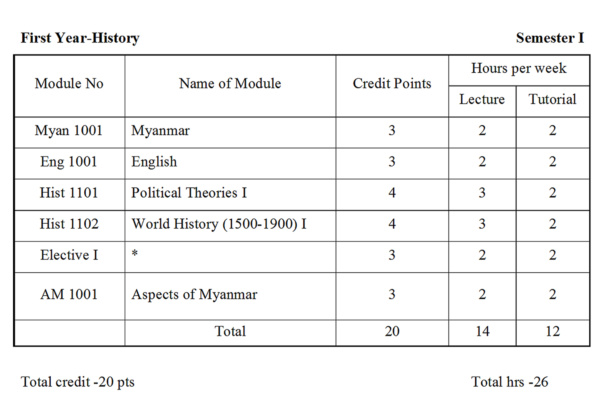
*A student can choose any one elective course
| Core Courses | Elective Courses (for History specialization) | Elective courses (for other specialization) |
| AM 1001 Myanmar | Phil 1001 (3) – Logic in Practice I | Hist 1001 (3) Introduction to Myanmar Civilization I |
| Eng 1001 English | Geog 1003 (3) – Geography of Southeast Asian Countries | Hist 1002 (3) Renaissance Italy (14th Century to 15th Century) |
| Myan 1001 (3) Myanmar | OS 1003 (3) – Buddhist Culture | Hist 1003 (3) World History to 1500 I |
| Eng 1001 (3) English | Psy 1001 (3) – Psychology of Adolescence I | Hist 1004 (3) World History 1500 – 1900 I |
| Hist 1101 (4) Political Theories I | Myan 1003 (3) – MyanmarZarTiMarnSarPay | |
| Hist 1102 (4) World History (1500-1900) I |
| Political Theories I: Hist. 1101 |
1.1 Credit Point
1.2 Theme Area
1.3 Locating the Content of the Course within the Discipline
1.4 Locating the Content of the Course within the Discipline
1.1 Credit Point
4 Credit Points per Semester (total 20 Credit Points for all six subjects per semester)
1.2 Theme Area
Changing Process of Political Thoughts and Institutions from Ancient Time to the Initiation of Modern Era
1.3 Locating the Content of the Course within the Discipline
This course is part of a Two-Semester exploration of Political Theories from ancient time to Karl Marx. The course for Frist Semester is designed to explore the changing process of political thoughts and institutions from ancient time to the initiation of Modern Political Thoughts. Major topics examined in this semester are the Origin and Nature of Political Thoughts, Ideas and Institutions; Primitive, Oriental and Occidental Political Ideas and Thoughts; Roman Political Thoughts and Institutions; Medieval Political Thoughts and Institutions and the Beginning of Modern Political Thoughts.
1.4 Locating the Course within the Curriculum
The course is part of B.A. Degree Programme for First Year (History Specialization) students of the University of Yangon
This course aims at
3.1 Specific Learning Outcomes (SLOs)
3.2 Generic Learning Outcomes (GLOs)
3.1 Specific Learning Outcomes (SLOs)
At the end of the Semester, the students would be able to
3.2 Generic Learning Outcomes (GLOs)
At the end of the Semester, the students would be able to
The course is structured in five broad sections. The first section introduces the Nature of Political Ideas in terms of political thoughts and institutions. The second section covers the Ancient Political Thoughts in relations with Primitive, Oriental and Occidental Ideas and Thoughts. The third section emphasizes on Roman Political Thoughts in terms of political institutions and theory on law. The fourth section reveals the Medieval Political Thoughts in relations with the beginning of medieval political thoughts, and conflict between Church and State. The last section touches the initiation of Modern Political Thoughts for Reformation.
| World History (1500 – 1900) I: Hist. 1102 |
1.1 Credit Point
1.2 Theme Area
1.3 Locating the Content of the Course within the Discipline
1.4 Locating the Course within the Curriculum
1.1 Credit Point
4 Credit Points per Semester (total 20 Credit Points for all six subjects per semester)
1.2 Theme Area
Examining the alteration of global order form medieval to modern aspects
1.3 Locating the Content of the Course within the Discipline
This course is part of a Two-Semester exploration of Political Theories from ancient time to Karl Marx. The course for Frist Semester is designed to explore the changing process of political thoughts and institutions from ancient time to the initiation of Modern Political Thoughts. Major topics examined in this semester are the Origin and Nature of Political Thoughts, Ideas and Institutions; Primitive, Oriental and Occidental Political Ideas and Thoughts; Roman Political Thoughts and Institutions; Medieval Political Thoughts and Institutions and the Beginning of Modern Political Thoughts.
nbsp;
1.4 Locating the Course within the Curriculum
The course is part of B.A. Degree Programme for First Year (History Specialization) students of the University of Yangon.
This course aims at
3.1 Specific Learning Outcomes (SLOs)
3.2 Generic Learning Outcomes (GLOs)
3.1 Specific Learning Outcomes (SLOs)
At the end of the Semester, the students would be able to
3.2 Generic Learning Outcomes (GLOs)
At the end of the Semester, the students would be able to
The course is composed of three broad sections. The first section covers the Beginning of Capitalist Society. The second section reveals the Development of Early Capitalist Society in Europe. The third section covers the Overseas Expansion carried out by the booming European countries.
| Aspects of Myanmar: AM. 1001 |
1.1 Credit Point
1.2 Theme Area
1.3 Locating the Content of the Course within the Discipline
1.4 Locating the Course within the Curriculum
1.1 Credit Point
3 Credit Points per Semester (total 20 Credit Points for all six subjects per semester)
1.2 Theme Area
Surveying general aspects of Myanmar from interdisciplinary approach
1.3 Locating the Content of the Course within the Discipline
This course is a survey on the aspects of Myanmar from interdisciplinary approach. The course is designed to explore the general aspects of Myanmar from primitive time up to the present. Major topics explored in this course are Physical Features and National Races of Myanmar; Prehistory, Early City States and Kingdoms of Myanmar; Colonial and Independent Myanmar; Foreign Policy and Relations; Economic and Cultural aspects of Myanmar.
nbsp;
1.4 Locating the Course within the Curriculum
The course is part of B.A. Degree Programme for First Year (History Specialization) students of the University of Yangon.
This course aims at
3.1 Specific Learning Outcomes (SLOs)
3.2 Generic Learning Outcomes (GLOs)
3.1 Specific Learning Outcomes (SLOs)
At the end of the Semester, the students would be able to
3.2 Generic Learning Outcomes (GLOs)
At the end of the Semester, the students would be able to
The course is composed of five broad sections. The first section covers the Land and People of Myanmar. The second section reveals the History of Myanmar from primitive time up to the democratization of the nation. The third section emphasizes on Foreign Policy and Relations of Myanmar in new global order. The fourth section explores the key sectors of Myanmar Economy. The last section covers the Cultural Aspect of Myanmar.
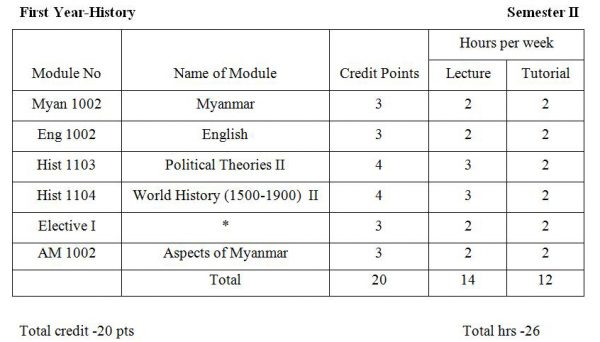
*A student can choose any one elective course
Foundation Courses
Myan 1002 (3) Myanmar
Eng 1002 (3) English
Core Courses
Hist 1103 (4) Political Theories II
Hist 1104 (4) World History (1500-1900) II
Elective Courses(for History specialization)
Phil 1003 (3)– Logic in Practice II
Geog 1004 (3)– Geography of Myanmar
OS 1008 (3)– History of Buddhism
Psy 1003 (3)– Psychology of Adolescence II
Myan 1004 (3)– MyanmarZarTiMarnSarPay
Elective courses (for other specialization)
Hist 1005 (3) Introduction to Myanmar Civilization II
Hist 1006 (3) Reformation Europe (1450-1650)
Hist 1007 (3) World History to 1500 II
Hist 1008 (3) World History 1500 – 1900 II
a. Locating the content of the course within the disciplined
The intention of the course is to explore the basic political culture of the world from the Medieval Period to the Modern time. The course constitutes the evolution of political theories and political thinking; liberalism, nationalism and communism based on democratic way. The course will focus on the comparative study of political ideological theories and scientific political systems. That course discusses how political ideological concepts have appeared and how political institutions; states and governments have emerged in the past in the various places.
b. Locating the course within the curriculum
The course is a part of B.A. Degree for first year (History Specialization) students of University of Yangon.
a. Aims:
The course intentions are as follow,
b. Learning Outcomes:
After participation in class discussion and class work, students should be able to:
By the end of the semester students would be able to:
The course structure is divided into three main sections. The first section covers the evolution theory from capitalism to liberalism. The second part of the course constitutes the strength and growth of extreme nationalist theories outcome from the colonial expansionism. The final portion of this course concludes Marxism that dominated on the theory of the state building before and after World War II.
This Course explores great historical events which transformed the World from Medieval Period to Modern Time. It covers the evolution of political thoughts and ideologies which led to the collapse of feudalism and emergence of constitutional monarchies in Europe under the name of Bourgeoisie Revolution; technological innovations that helped to the development of factory system and its consequences under the name of Industrial Revolution; and conflict of interests between Industrialized Europe and Agro-based Asia with special references to early nationalist movements of India and China.
Theme Area: Changing Global Order from 16th to 19th century
At the end of the semester, the learner would be able to
At the end of the semester, the learner would be able to
a. Locating the content of the course within the disciplined
The intent of the course is to explore the significant historical events of the world from the Medieval period to the Modern time. It covers the evolution of political thoughts and ideologies of bourgeoisie; technological innovations and its consequences; and conflict of interests between industrialized Europe and East Asia. The goal is to interpret a comparative perception of world history that happened from sixteenth to nineteenth centuries.
b. Locating the course within the curriculum
The course is a part of B.A. Degree for first year (History, International Relations, and Political Science Specialization) students of University of Yangon.
a. Aims:
The course aims are as follows:
b. Learning Outcomes:
After participation in class discussions and assignments, students should be able to:
By the end of the semester students would be able to:
The course is structured in three broad sections. The first part covers the collapse of feudalism and emergence of constitutional monarchies in Europe under the name of Bourgeoisie Revolution. The second part of the course contains the development of factory system and its consequences under the name of Industrial Revolution. The third part of the course includes colonialism.
a. Locating the content of the course within the disciplined
The intent of the course is to know the brief history of Inwa, Hanthawaddy, Mrauk-U and Taungoo. It covers the competing of the feudal strength among the Kingdoms; the development of Myanmar Literature according to the period; Buddhism that flourished in Mrauk-U and propagated by Bayinnaung in the Taungoo Period.
b. Locating the course within the curriculum
The course is a part of B.A. Degree for first year (Myanmar Studies) students of University of Yangon.
a. Aims:
The course aims are as follows:
b. Learning Outcomes:
After participation in class discussions and assignments, students should be able to:
By the end of the semester students would be able to:
The course is structured in three broad sections. The first part deals with the rise of Pinya, Sagaing and Inwa, competing of the feudal strength among the kingdom of Inwa and Hanthawaddy (1386-1422) and the literature of the Inwa Period. The second part contains history, social life and religion under the name of History and Culture of Medieval Rakhine. The third part of the course includes history, literature and propagation of Buddhism in the Taungoo Period.
a. Locating the content of the course within the disciplined
The intent of the course is to explore the significant changes and developments of political thought in Europe from the 16th to 20th century. It covers historically notable political philosophers and their works during the period. The goal of the course is to identify the connection between political thought and reality.
b. Locating the course within the curriculum
The course is a part of B.A. Degree for first year (Political Science Specialization) students of University of Yangon.
a. Aims:
The course aims are as follows:
b. Learning Outcomes:
After participation in class discussions and assignments, students should be able to:
By the end of the semester students would be able to:
The course is structured in seventh broad sections. It covers notable political philosophers and their works from 16th century to 20 century. The first part includes rise of modern theory of Sovereignty and the theory of the social contract of Jean Bodin and Hugo Grotious. The second part includes an English philosopher John Lock who attacked the divine theory and absolution. The third part includes the politic of Enlightenment and a French philosopher Montesquieu and a Genevan philosopher Jean Jecques Rousseau. The fourth part includes economic development in Europe and mercantilism. The fifth part includes English Utilitarian philosophers; Benthem and John Stuart Mill. The sixth part includes Marxism, capitalism and socialism and the final part includes the nature of Fascism and Nazism.
a. Locating the content of the course within the disciplined
The intent of the course is to explore the significant historical events of the introduction to Myanmar Civilization. It covers the introduction of Social life, Religion, Literature, Art and Architecture and its consequences
b. Locating the course within the curriculum
The course is a part of B.A. Degree for first year Oriental Studies Specializatio) students of the University of Yangon.
a. Aims:
The course goals are as follows
b. Learning Outcomes:
After participation in class discussions and assignments, students should be able to:
By the end of the semester students would be able to:
The course is structured in four broad sections. The first part covers art and architecture under the name of Mrauk-U Period. The second part of the course contains the Literature of Taungoo Period. The third part of the course includes religion of Nyaungyan Period. The fourth part of the course is wind up the social life of Konbaung Period.


| Fundamental Courses | Elective courses (for History specialization) (*) | Elective courses (for other specialization) (*) |
| Eng 2001 (3) English | Hist 2104 (3) - Political Organization I (Major Elective) | Hist 2001 (3) History of Science and Technology I |
| Hist 2101 (4) Ancient Myanmar I | Hist 2105 (3) - History of Science and Technology I | Hist 2002 (3) World History 1900 to Present I |
| Core Courses | Geog 2005 (3) – Political Geography I | Elective course (for English Specialization) (*) |
| Hist 2102 (4) Ancient Southeast Asia | Phil 2001 (3) – History of Western Intellectual Development I | Hist 2003 (3) Social History of England I |
| Hist 2103 (4) World History 1900 to Present I | OS 2005 (3) - Pali Philology |
| Ancient Myanmar I: Hist. 2101 |
1.1 Credit Point
1.2 Theme Area
1.3 Locating the Content of the Course within the Discipline
1.4 Locating the Course within the Curriculum
1.1 Credit Point
4 Credit Points per Semester (total 21 Credit Points for all six subjects per semester)
1.2 Theme Area
Evolution of Myanmar Civilization from prehistory via city-states to the kingdom
1.3 Locating the Content of the Course within the Discipline
This course ispart of a Two-Semester exploration on Myanmar History from prehistoric time to the end of Nyaungyan period. The course for Frist Semester is designed to explore Myanmar History form Prehistory to the fall of Bagankingdom. Major topics examined in this semester are Geographical Setting of Myanmar, the Stone and Bronze Ages’ Cultures that flourished on the land of Myanmar, Pyu, Rakhine and Mon Civilizations, and the rise and fall of Bagan Kingdom.
1.4 Locating the Course within the Curriculum
The course is part of B.A. Degree Programme for Second Year (History Specialization) students of the University of Yangon.
This course aims at
3.1 Specific Learning Outcomes (SLOs)
3.2 Generic Learning Outcomes (GLOs)
3.1 Specific Learning Outcomes (SLOs)
At the end of the Semester, the students would be able to
3.2 Generic Learning Outcomes (GLOs)
At the end of the Semester,the students would be able to
The course is structured in five broad sections. The first sectionreveals the Prehistory of Myanmar in terms of physical background, and Stone and Bronze Age Civilizations. The second section constitutes the growth of Pyu Civilization based on its early city-states. The third section reveals the emergence of Early Rakhine Civilization at Vesali. The fourth section expresses the growth of Early Mon Civilization in term of Laterite Culture at Suvannabhumi. The last section covers the rise of Bagan Period in terms of History, Economy, Society, Governance, Religion, Art and Architecture until the fall of Bagan kingdom.
| Ancient Southeast Asia: Hist. 2102 |
1.1 Credit Point
1.2 Theme Area
1.3 Locating the Content of the Course within the Discipline
1.4 Locating the Course within the Curriculum
1.1 Credit Point
4 Credit Points per Semester (total 21 Credit Points for all six subjects per semester)
1.2 Theme Area
Evolution of Southeast Asian Societies from Primitive Cultures to Civilized Communities
1.3 Locating the Content of the Course within the Discipline
This course is a survey on Southeast Asian history in ancient time. The course is designed to explore the History of Ancient Southeast Asia from prehistoric time to 16thCentury. Major topics explored in this course are Physical Background of Southeast Asia, Prehistoric Cultures of Southeast Asia from Paleolithic Period to Bronze Age, Spread of Chinese and Indian Cultures to Southeast Asia, Emergence of Early Kingdoms in Mainland and Islands Southeast Asia, and the Spread of Islam to the Peninsular.
1.4 Locating the Course within the Curriculum
The course is part of B.A. Degree Programmefor SecondYear (History Specialization) students of the University of Yangon.
This course aims at
3.1 Specific Learning Outcomes (SLOs)
3.2 Generic Learning Outcomes (GLOs)
3.1 Specific Learning Outcomes (SLOs)
At the end of the Semester, the students would be able to
3.2 Generic Learning Outcomes (GLOs)
At the end of the Semester, the students would be able to
The course is composed ofsevensections.The first section covers the Physical Background of Southeast Asia. The second section constitutes the Prehistory of Southeast Asia. The third section reveals the Spread of Chinese Culture to Vietnam. The fourth section covers the spread of Indian Culture to mainland Southeast Asia. The fifth section reveals the emergence of Early Kingdoms in both mainland and islands of Southeast Asia. The sixth section touches the Emergence of Early Kingdoms on the land of present Thailand. The last section expresses the Spread of Islamism to the Peninsular.
| World History 1900 to Present I: Hist. 2103 |
1.1 Credit Point
1.2 Theme Area
1.3 Locating the Content of the Course within the Discipline
1.4 Locating the Course within the Curriculum
1.1 Credit Point
4 Credit Points per Semester (total 21 Credit Points for all six subjects per semester)
1.2 Theme Area
Changing Global Order during the first four decades of 20th century
1.3 Locating the Content of the Course within the Discipline
This course is part of a Two-Semester surveyonWorld History from 1900 to Present. The course for Frist Semester is designed to explore World History from 1900 to 1939. Major topics explored in this course are causes, events and effects of World War I; Socialist Revolution of Russia; Fascist Movement of Italy and Nazi Movement of Germany that emerged between two World Wars; Nationalist Movement of India; National Awakening of China and Militarist Movement of Japan that happened between two World Wars.
1.4 Locating the Course within the Curriculum
The course is part of B.A. Degree Programmefor SecondYear (History Specialization) students of the University of Yangon.
This course aims at
3.1 Specific Learning Outcomes (SLOs)
3.2 Generic Learning Outcomes (GLOs)
3.1 Specific Learning Outcomes (SLOs)
At the end of the Semester, the students would be able to
3.2 Generic Learning Outcomes (GLOs)
At the end of the Semester, the students would be able to
The course is composed ofthree broad sections.The first section covers the causes, events and effects of World War I. The second section constitutes major Revolution and Movements that happened in Europe between 1917 and 1939. The third section reveals the Nationalist Movement, National Awakening and Militarist Movement that occurred in Asia between 1917 and 1939.
| Political Organization I: Hist. 2104 (Major Elective) |
1.1 Credit Point
1.2 Theme Area
1.3 Locating the Content of the Course within the Discipline
1.4 Locating the Course within the Curriculum
1.1 Credit Point
3Credit Points per Semester (total 21 Credit Points for all six subjects per semester)
1.2 Theme Area
Theories and Definitions on State, Sovereignty, Government and Constitution
1.3 Locating the Content of the Course within the Discipline
This course is part of a Two-Semester exploration onthe development of Political Organization from theoretical approaches. The course for Frist Semester is designed to explore the Structure of the State in Politics. Major topics examined in this semester are Nature of the State and Sovereignty, Organization and Forms of State and Government, and the role of Constitution in balancing the major pillars of State powers.
1.4 Locating the Course within the Curriculum
The course is a part of B.A. Degree Programmefor Second Year (History Specialization) students of the University of Yangon.
This course aims at
3.1 Specific Learning Outcomes (SLOs)
3.2 Generic Learning Outcomes (GLOs)
3.1 Specific Learning Outcomes (SLOs)
At the end of the Semester, the students would be able to
3.2 Generic Learning Outcomes (GLOs)
At the end of the Semester, the students would be able to
The course is composed offour broad sections.The first section covers the Definition, Origin, Evolution and Theories of the State. The second section deals withNature, Location and Limitations of Sovereignty. The third section reveals the Organizations and Forms of State and Government. The last section covers the Definition and Classification of Constitution.
Semester II
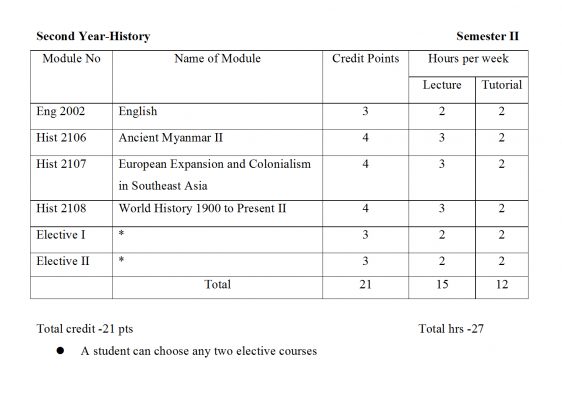
Fundamental Courses
Eng 2001 (3) English
Core Courses
Hist 2101 (4) Ancient Myanmar I
Hist 2102 (4) Ancient Southeast Asia
Hist 2103 (4) World History 1900 to Present I
Elective courses (for History specialization) (*)
Hist 2104 (3) – Political Organization I (Major Elective)
Hist 2105 (3) – History of Science and Technology I
Geog 2005 (3) – Political Geography I
Phil 2001 (3) – History of Western Intellectual Development I
OS 2005 (3) – Pali Philology
Elective courses (for other specialization) (*)
Hist 2001 (3) History of Science and Technology I
Hist 2002 (3) World History 1900 to Present I
Elective course (for English Specialization) (*)
Hist 2003 (3) Social History of England I
a. Locating the content of the course within the disciplined
The course is composed of important events in Ancient Myanmar History: religions of Bagan kingdom, political perspectives on the Bagan period, rise of petty kingdoms in the post Bagan period, Rise of Mon kingdoms, Forty Years War, Rise of Taunggu Dynasty, Relations with Europeans in the Taunggu period.
b. Locating the course within the curriculum
The course is a part of B.A. Degree for second year (History Specialization) students of the University of Yangon.
a. Aims:
The course aims are as follows:
b. Learning Outcomes:
After participation in class discussions and assignments, students should be able to:
By the end of the semester students would be able to:
The course is composed of political perspectives of Bagan kingdom as a fundamental knowledge and Religion of Bagan kingdom, Rakhine, the rise of Inwa and Hanthawaddy kingdoms and monarchic struggles between Inwa and Mon kingdoms, and National Reunification of Taungoo period and introducing with European relations.
a. Locating the content of the course within the disciplined
The course explores key events and developments of the Age of Exploration and colonial policies practiced by the European powers in Southeast Asia from the fifteenth century to the twentieth century. It studies the pattern of colonial rule; the discoveries of New World by Portugal and Spain in the first phase of expansion and conquering of Dutch, English and France in Southeast Asia during the second phase of expansion, variety of motives and colonialism led to intensify and increase the tensions among European powers and Southeast Asian countries. The goal is to criticize European global exploration and the pattern of colonialism affected intensification among European and Southeast Asian countries.
b. Locating the course within the curriculum
The course is a part of B.A. Degree for Second year (History Specialization) students of University of Yangon.
a. Aims:
The course aims are as follows:
b. Learning Outcomes:
After participation in class discussions and assignments, students should be able to:
By the end of the semester students would be able to:
The course is structured in six broad sections. The first part introduces the voyage discovery and the main characteristic of colonialism; the second section covers the discoveries of explorers who arrived in Southeast Asia to 1800 with special references to Portuguese and Spain; the third focuses on one of the economic reforms of the Dutch in Indonesia; the fourth section emphasis British conquest Malaysia and exercised Britain colonial rule; the fifth section studies on the establishment of the French colony in SEA and finally, the conflict between Spain and American in Philippine.
This course explores international relations, conflicts and issues that happened during the period 1919 to 1990. The course is formed with four components: International Relations from 1919 to 1930; International Relations from 1931 to 1939; World War II, and the Cold War. The first component will explore the emergence of the League of Nations and its efforts to maintain international peace and security. The second component will inspect the aggressions of Nazi, Fascist, and Militarist nations. The third component will look over the causes, outbreak and effects of World War II. The last component will analyze changing global order in postwar era under the name of Cold War.
Changing Global Order after World War I until the end of Cold War.
At the end of the semester, the learner would be able to
At the end of the semester, the learner would be able to
a. Locating the content of the course within the disciplined
Theme area of the course is to analyze international relations, conflicts and issues that happened from the end of World War I up to the Cold War Era. This course aims at providing the learners with analytical skill, critical thinking and communication skill in relations with international events as well as with their own workplace situations.
b. Locating the course within the curriculum
This course is a part of B.A Degree Programme for Second Year (History, IR & PS Specialization) Students of the University of Yangon.
a. Aims:
This Course aims at
b. Learning Outcomes
Specific Learning Outcomes (SLOs)
At the end of the semester, the learner would be able to
Generic Learning Outcomes (GLOs)
At the end of the semester, the learner would be able to
The course is formed with four components: International Relations from 1919 to 1930; International Relations from 1931 to 1939; World War II, and Postwar era of the World. The first component will explore the emergence of the League of Nations and its efforts to maintain international peace and security. The second component will inspect the aggressions of Nazi, Fascist, and Militarist nations. The third component will look over the causes, outbreak and effects of World War II. The last component will analyze changing global order in postwar era under the name of Cold War.
a. Locating the content of the course within the disciplined
The intent of the course is to know the nature of the English society from 16th century to 20th century. The course covers the evolution of social changes from Shakespeare England to Victorian England. The goal is to learn English literature well by learning English Social History.
b. Locating the course within the curriculum
a. Aims:
The aims of the course are as follow:
b. Learning Outcomes:
The course will encourage the students to examine the basic social life of Shakespeare England and to compare Myanmar’s social life. It also encourages the students to evaluate social relationship of Shakespeare’s England. Then the course will make the students to understand how English made expansion in the period of Charles and Cromwell and to consider why English made scientific experiment in Restoration England. The students will be aware of the Industrial Revolution and its impact upon society in Victorian England. Examining Social History of England, students will apply in studying English literature and they can create a better society by taking lesson in social conditions of England.
The course is structured with four main parts. The first part covers Religion and Universities, the social policy, industry and seafaring in Shakespeare’s England. The second part contains the colonial expansion of the English under Charles and Cromwell. The third part includes the restoration England. Industrial Revolution and its impact upon society in Victorian England is the fourth part of the course.
a. Locating the content of the course within the disciplined
The intention of the course is to evaluate the state structure of the world politics. The course constitutes the political theories and governmental system based on the state constitution; the separation of political power within the state, division of powers in the Federal government System, Electorate, Universal Suffrage, Constituency and Election System and the three political powers; the Legislature, the Executive and the Judiciary. The course will focus on the political theories and political systems constituted separation and distribution of powers for Federated State. This course will discuss what political institutions would be organized in the good constitutional government and what governance should be practiced in the state.
b. Locating the course within the curriculum
The course is a part of B.A. Degree for Second Year (History Specialization) students of University of Yangon.
a. Aims:
The course intentions are as follow,
b. Learning Outcomes:
After participation in class discussion and class work, students should be able to:
By the end of the semester students would be able to:
The course structure is divided into four main sections. The first section covers the separation of political power. The second part of the course constitutes the division of powers in the Federal government. The third portion of this course is composed of Electorate, Election System and Representatives. The final concluded with the three main powers of the state.
a. Locating the content of the course within the disciplined
This course introduces culture exchange among the indigenous people in Myanmar and can also learn about the impact of the Western and Eastern culture on Myanmar. Western culture absorbed by means of religions into Myanmar, namely Buddhism from India, Islam from Arabia and Christianity from Europe. Myanmar adopted and improved; arts, social life, life style, and government and administration systems as the results of the impact of Eastern culture.
b. Locating the course within the curriculum
This course is a part of B.A. Degree for Second year (Myanmar Studies) students of University of Yangon.
a. Aims:
The aims of the course are as follows:
b. Learning Outcomes:
After participation in class discussions and assignments, students should be able to:
By the end of the semester students would be able to:
This course is structured in three sections in which were organized firstly Cultural Exchanges among the Indigenous People centering Myanmar with Pyu, Mon, Rakhine and Shan, secondly Impact of the Western Cultures accompanying with the religions which were imported into Myanmar, Buddhism from India, Islam from Arabia and Christianity from European countries. The last section is the Impact of the Eastern Cultures which reveal the absorptions of the cultures of China, Japan and Southeast Asian Countries into Myanmar.
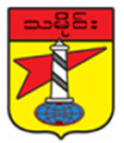
CURRICULUM FOR B.A. DEGREE
Semester I

Fundamental Courses
Eng 3001 (3) English
Core Courses
Hist 3101 (4) Modern Myanmar I
Hist 3102 (4) Modern Southeast Asia I
Hist 3103 (4) Modern China
Hist 3104 (4) Modern Russia
Elective courses (*)
Hist 3105 (3) Modern India I
Hist 3106 (3) Economic and Social History of Modern Southeast Asia I
Hist 3107 (3) Foreign Relations in the Konbaung Period I
Semester II
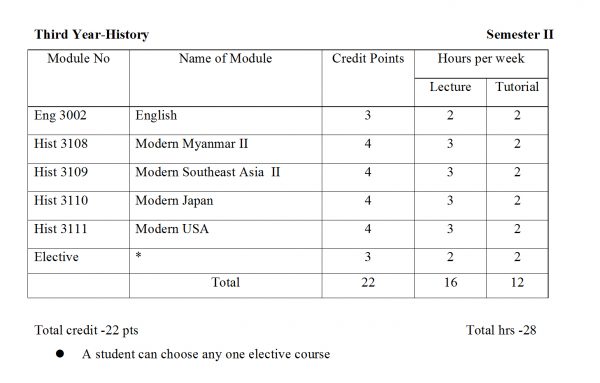
Fundamental Courses
Eng 2001 (3) English
Core Courses
Hist 3108 (4) Modern Myanmar II
Hist 3109 (4) Modern Southeast Asia II
Hist 3110 (4) Modern Japan
Hist 3111 (4) Modern USA
Elective courses (*)
Hist 3112 (3) Modern India II
Hist 3113 (3) Economic and Social History of Modern Southeast Asia II
Hist 3114 (3) Foreign Relations in the Konbaung Period II
| Modern Myanmar I: Hist. 3101 |
1.1 Credit Point
1.2 Theme Area
1.3 Locating the Content of the Course within the Discipline
1.4 Locating the Course within the Curriculum
1.1 Credit Point
4 Credit Points per Semester (total 22 Credit Points for all subjects per semester)
1.2 Theme Area
Changing conditions and ideologies of Myanmar under monarchism and colonialism
1.3 Locating the Content of the Course within the Discipline
This course is part of a Two-Semester exploration on Myanmar History from mid-18th to the end of 20th century. The course for Frist Semester is designed to explore Myanmar History (1752 – 1948) from political and socio-economic aspects of Myanmar. Major topics examined in this semester are Politics, Governance, Economy, Society, Culture and Foreign Relations of Myanmar during Konbaung Period and Nationalist Movement and Independence Struggle of Colonial Myanmar for Achieving Independence.
1.4 Locating the Course within the Curriculum
The course is part of B.A. Degree Programme for Third Year (History Specialization) students of the University of Yangon.
This course aims at
3.1 Specific Learning Outcomes (SLOs)
3.2 Generic Learning Outcomes (GLOs)
3.1 Specific Learning Outcomes (SLOs)
At the end of the Semester, the students would be able to
3.2 Generic Learning Outcomes (GLOs)
At the end of the Semester, the students would be able to
The course is structured in three broad sections. The first section covers the rise of Konbaung Dynasty and its external relations. The second section deals with the Governance, Economy, Society and Culture of Konbaung period, and the fall of Konbaung Dynasty under British colonial expansion. The third section reveals Myanmar nationalist movement and independence struggle against the colonial
| Modern Southeast Asia I: Hist. 3102 |
1.1 Credit Point
1.2 Theme Area
1.3 Locating the Content of the Course within the Discipline
1.4 Locating the Course within the Curriculum
1.1 Credit Point
4 Credit Points per Semester (total 22 Credit Points for all six subjects per semester)
1.2 Theme Area
Changing orders of Southeast Asian countries under Colonialism
1.3 Locating the Content of the Course within the Discipline
This course is part of a Two-Semester survey of Southeast Asian history in modern time. The course for First Semester is designed to explore the Colonial History of Southeast Asia from 16th to mid-20th Century. Major topics examined in this semester are Geographical Background of Southeast Asia, Economics, Society and Government of Southeast Asian countries under Colonialism, and Nationalist Movements of these countries before the Second World War.
nbsp;
1.4 Locating the Course within the Curriculum
The course is part of B.A. Degree Programme for Third Year (History Specialization) students of the University of Yangon.
This course aims at
3.1 Specific Learning Outcomes (SLOs)
3.2 Generic Learning Outcomes (GLOs)
3.1 Specific Learning Outcomes (SLOs)
At the end of the Semester, the students would be able to
3.2 Generic Learning Outcomes (GLOs)
At the end of the Semester, the students would be able to
The course is composed of three broad sections. The first section covers the Geographical Background of Southeast Asia. The second section constitutes the impacts of Colonialism in Southeast Asia in terms of Economy, Society and Governance. The third section includes the rise of Nationalist Movement in Southeast Asian countries before Second World War.
| Modern China: Hist. 3103 |
1.1 Credit Point
1.2 Theme Area
1.3 Locating the Content of the Course within the Discipline
1.4 Locating the Course within the Curriculum
1.1 Credit Point
4 Credit Points per Semester (total 22 Credit Points for all six subjects per semester)
1.2 Theme Area
Uprisings of China and reshaping the country based on changing political and economic ideologies
1.3 Locating the Content of the Course within the Discipline
This course is a survey on modern history of China. It is designed to look into Modern China from the beginning to the end of 20th Century. Major topics explored in this course are National Awakening and Nationalist Struggles against absolute monarchism, warlords’ hegemony and Imperialism; Kuomintang-Communist collaboration and conflict; Triumph of CCP and the emergence of the People’s Republic of China under Mao Zedong and Modernizations of Deng Xiaoping.
nbsp;
1.4 Locating the Course within the Curriculum
The course is part of B.A. Degree Programme for Third Year (History Specialization) students of the University of Yangon.
This course aims at
3.1 Specific Learning Outcomes (SLOs)
3.2 Generic Learning Outcomes (GLOs)
3.1 Specific Learning Outcomes (SLOs)
At the end of the Semester, the students would be able to
3.2 Generic Learning Outcomes (GLOs)
At the end of the Semester, the students would be able to
The course is composed of five broad sections. The first section covers the genesis and events of 1911 Revolution in China. The second section constitutes National Awakening in China against Warlords and Foreign Imperialists after World War I. The third section includes the collaboration and confrontation between Kuomintangs and Communists. The fourth section explores the Politics, Economy and Foreign Relations of the People’s Republic of China under Mao. The last section reveals the transformation and modernization of China after Mao Era.
| Modern Russia: Hist. 3104 |
1.1 Credit Point
1.2 Theme Area
1.3 Locating the Content of the Course within the Discipline
1.4 Locating the Course within the Curriculum
1.1 Credit Point
4 Credit Points per Semester (total 22 Credit Points for all six subjects per semester)
1.2 Theme Area
Transitional process of Russia under different ideas and rules in modern time
1.3 Locating the Content of the Course within the Discipline
This course is a survey on modern history of Russia. The course is designed to explore the History of Modern Russia from the beginning to the end of 20th Century. Major topics examined in this course are the genesis, events and consequences of 1917 Revolution, the struggles of Soviet Union to survive as a socialist state in the middle of capitalist world, its involvements in World War II and Cold War, reforms under Gorbachev, disintegration of Soviet Union and the rise of Russian Federation after Cold War.
nbsp;
1.4 Locating the Course within the Curriculum
The course is part of B.A. Degree Programme for Third Year (History Specialization) students of the University of Yangon.
This course aims at
3.1 Specific Learning Outcomes (SLOs)
3.2 Generic Learning Outcomes (GLOs)
3.1 Specific Learning Outcomes (SLOs)
At the end of the Semester, the students would be able to
3.2 Generic Learning Outcomes (GLOs)
At the end of the Semester, the students would be able to
The course is composed of four broad and three brief sections. The first section covers the causes, events and effects of 1917 Revolution. The second section deals with the attempts of Soviet Union to survive as only communist state before World War II. The third section encompasses the involvement of Soviet Union in World War II and consequences. The fourth section reveals the Role of Soviet Union in global order in the context of Cold War. The rest three brief sections touch the attempts of Gorbachev to reform the Soviet system, the Collapse of Soviet Union and the Emergence of Russian Federation.
a. Locating the content of the course within the disciplined
The purpose of the course is to explore the significant historical events of Southeast Asia from World War II to Post Independence Period. It covers the political, economic & Social Changes of Southeast Asia, Struggle for Independence and Political Conditions &the Development Efforts in Post-Independence Southeast Asia. The goal is to explain the conditions of Modern Southeast Asia that happened from during World War II to Post-Independence Period.
b. Locating the course within the curriculum
The course is a part of B.A. Degree for Third Year, (History Specialization) students of University of Yangon.
a. Aims:
The course aims are as follows:
b. Learning Outcomes:
After participation in class discussions and assignments, students should be able to:
By the end of the semester students would be able to:
surmise the difficulties that faced by Southeast Asian countries for independence.
The course is structured in three broad sections. The first part covers the conditions in World War II in Southeast Asia. The second part of the course contains the post-war struggle for Independence in Southeast Asia. The third part of the course includes Post-Independence Southeast Asia
a. Locating the content of the course within the disciplined
The intent of the course is to explore the modern Japan history from the Tokugawa period (1600-1867) through the Meiji Restoration of 1868 to the present and the local and global nature of modernity in Japan. It highlights key themes, including the Modernization of Japan, Japan’s Emergence as a Power, Development of Militarism, Post Second World War Japan, Development since 1970 and the continued importance of historical memory in Japan today.
b. Locating the course within the curriculum
The course is a part of B.A Degree for Third Year (History Specialization) students of University of Yangon.
a. Aims:
The course aims are as follows:
b. Learning Outcomes:
After participation in class discussions and assignments, students should be able to:
By the end of the semester students would be able to:
The course is structured in five broad sections. The first part discuss how Japanese society had changed from feudal society into industrial society and the changes in the Japanese history after the Meiji Restoration. The second part of the course illustrate the Japanese aggression in China and Russia, and how Japan was became one of the big powers in international politics. The third part of the course includes the causes of the rise of militarism and Japan in World War II. The fourth part of the course covers the political system of Japan after Post World War II and foreign policy of Japan. The last part of the course is the political and economic development of Japan since 1970 and foreign relations of Japan.
a. Locating the content of the course within the disciplined
The intention of the course covers important events in American history from Reconstruction of America, becoming as the world Power through end of 20th century from a political, social and cultural standpoints. The course constitutes the emergence as a world power, American imperialism, the progressive movement, World War I, the roaring Twenties, the Great Depression, the New Deal during the Hundred Days, World War II, cold war and nuclear age in 1950s, Civil Rights and Discriminations. The course will focus on the gradual growth of US balancing in economy and democratic politics. This course discusses how American achieved the global leadership in the critical times.
b. Locating the course within the curriculum
The course is a part of B.A. Degree for Third year (History Specialization) students of University of Yangon.
a. Aims:
The course intents are as follow,
b. Learning Outcomes:
After participation in class discussion forums and class work,
By the end of the semester students would be able to:
The structure of course is divided into three main sections. The first section covers the Emergence as a World Power in the early 20th century. The second part of the course constitutes the Overcoming the Great Depression and World Wars. The final portion of this course concludes her Solving the Discriminations, Civil Rights and Home Affairs.
a. Locating the content of the course within the disciplined
Britain was the most powerful nation on earth in the last two decade of the 19th Century. The British were actually latecomers to the country and the people of Myanmar, their impact of the country was to be out of proportion to that tardiness. The geo-political competition between Britain and France on the European continent had continued in Southeast Asia, as the two European powers jockeyed for position there also, drawing indigenous actors ( such as Myanmar) into their ongoing commercial and political rivalries. Myanmar held the key, in the form of Ayeyarwaddy River to the back door of China. Fear that this key might fall into the hands of the French resulted in the Third Anglo-Myanmar War and 1886 complete absorption of Myanmar into the British Empire.
b. Locating the course within the curriculum
The course is a part of B.A. Degree for third year (History Specialization) students of University of Yangon.
a. Aims:
The course aims are as follows:
b. Learning Outcomes:
After participation in class discussions and assignments, students should be able to:
By the end of the semester students would be able to:
The course is structured in three broad sections. The first part covers the dispute of neighbouring countries and the First Anglo-Myanmar War and the Treaty of Yandabo . The second part of the course contains the causes of Foreign Mission, and the Second Anglo-Myanmar War. The third part of the course includes King Mindon’ foreign policy, Foreign relations with other European Countries and the third Anglo-Myanmar War.

CURRICULUM FOR B.A. DEGREE
Semester I
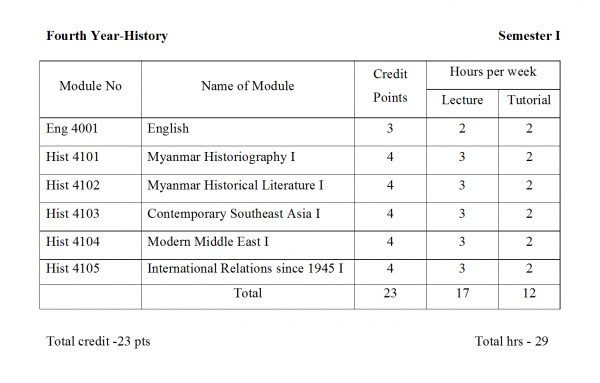
Foundation Courses
Eng 4001 (3) English
Core Courses
Hist 4101 (4) Myanmar Historiography I
Hist 4102 (4) Myanmar Historical Literature I
Hist 4103 (4) Contemporary Southeast Asia I
Hist 4104 (4) Modern Middle East I
Hist 4105 (4) International Relations since 1945 I
Semester II

Foundation Courses
Eng 4002 (3) English
Core Courses
Hist 4106 (4) Myanmar Historiography II
Hist 4107 (4) Myanmar Historical Literature II
Hist 4108 (4) Contemporary Southeast Asia II
Hist 4109 (4) Modern Middle East II
Hist 4110 (4) International Relations since 1945 II
Myanmar Historiography I: Hist. 4101
1.1 Credit Point
1.2 Theme Area
1.3 Locating the Content of the Course within the Discipline
1.4 Locating the Course within the Curriculum
1.1 Credit Point
4 Credit Points per Semester (total 22 Credit Points for all subjects per semester)
1.2 Theme Area
Changing conditions and ideologies of Myanmar under monarchism and colonialism
1.3 Locating the Content of the Course within the Discipline
This course is part of a Two-Semester exploration on Myanmar History from mid-18th to the end of 20th century. The course for Frist Semester is designed to explore Myanmar History (1752 – 1948) from political and socio-economic aspects of Myanmar. Major topics examined in this semester are Politics, Governance, Economy, Society, Culture and Foreign Relations of Myanmar during Konbaung Period and Nationalist Movement and Independence Struggle of Colonial Myanmar for Achieving Independence.
1.4 Locating the Course within the Curriculum
The course is part of B.A. Degree Programme for Third Year (History Specialization) students of the University of Yangon.
This course aims at
3.1 Specific Learning Outcomes (SLOs)
3.2 Generic Learning Outcomes (GLOs)
3.1 Specific Learning Outcomes (SLOs)
At the end of the Semester, the students would be able to
3.2 Generic Learning Outcomes (GLOs)
At the end of the Semester, the students would be able to
The course is structured in three broad sections. The first section covers the rise of Konbaung Dynasty and its external relations. The second section deals with the Governance, Economy, Society and Culture of Konbaung period, and the fall of Konbaung Dynasty under British colonial expansion. The third section reveals Myanmar nationalist movement and independence struggle against the colonial
Myanmar Historical Literature I: Hist. 4102
1.1 Credit Point
1.2 Theme Area
1.3 Locating the Content of the Course within the Discipline
1.4 Locating the Course within the Curriculum
1.1 Credit Point
4 Credit Points per Semester (total 23 Credit Points for all six subjects per semester)
1.2 Theme Area
Exploring and Utilizing Old Historical Literatures as Source Materials for Research
1.3 Locating the Content of the Course within the Discipline
This course is part of a Two-Semester survey of Myanmar Historical Literature. The course for First Semester is designed to explore the Myanmar Historical Literature of Ancient and Medieval times. Major topics examined in this semester are reading and interpreting stone and bell inscriptions, palm leaf and Parabaik manuscripts, chronicles, Ayeydawbons (annals of kingly victories), Egyins (historical ballads), Sittans (inquests), and records on royal traditions and ceremonies: palace building ceremony and coronation ceremony.
1.4 Locating the Course within the Curriculum
The course is part of B.A. Degree Programme for Fourth Year (History Specialization) students of the University of Yangon.
This course aims at
3.1 Specific Learning Outcomes (SLOs)
3.2 Generic Learning Outcomes (GLOs)
3.1 Specific Learning Outcomes (SLOs)
At the end of the Semester, the students would be able to
3.2 Generic Learning Outcomes (GLOs)
At the end of the Semester, the students would be able to
The course is composed of three broad sections. The first section introduces stone inscriptions written in Pali, Sanskrit, Pyu, Mon and Myanmar languages. The second section deals with the interpretation of these inscriptions in terms of economic, social and political aspects. The third section covers reading and interpreting Pyo (epic of Jataka), Egyins (historical ballads), and Mawgun (Royal Eulogy) of medieval Myanmar and utilizing them as historical sources in research works.
Contemporary Southeast Asia I: Hist. 4103
1.1 Credit Point
1.2 Theme Area
1.3 Locating the Content of the Course within the Discipline
1.4 Locating the Course within the Curriculum
1.1 Credit Point
4 Credit Points per Semester (total 23 Credit Points for all six subjects per semester)
1.2 Theme Area
Changing Regional Order of Southeast Asia in the context of global tension
1.3 Locating the Content of the Course within the Discipline
This course is part of a Two-Semester survey on the history of Contemporary Southeast Asia from Post-Independence Era up to the present days. The course for First Semester is designed to explore Southeast Asian nations from the end of the Second World War up to the Cold War Era. Major topics examined in this semester are Political Issues faced by Southeast Asian nations in post-independence era in terms of nation building and economic reconstruction; direct and indirect Impacts of Cold War on Southeast Asian nations and Interactions and Interrelations among Southeast Asian nations in the context of Cold War.
1.4 Locating the Course within the Curriculum
The course is part of B.A. Degree Programme for Fourth Year (History Specialization) students of the University of Yangon.
This course aims at
3.1 Specific Learning Outcomes (SLOs)
3.2 Generic Learning Outcomes (GLOs)
3.1 Specific Learning Outcomes (SLOs)
At the end of the Semester, the students would be able to
3.2 Generic Learning Outcomes (GLOs)
At the end of the Semester, the students would be able to
The course is composed of three broad sections. The first section covers the Political Issues of Southeast Asian nations in post-independence era. The second section emphasizes the reactions of Southeast Asian nations to the global tension of Cold War. The third section reveals the interactions among Southeast Asian nations in the context of global tension.
Modern Middle East I: Hist. 4104
1.1 Credit Point
1.2 Theme Area
1.3 Locating the Content of the Course within the Discipline
1.4 Locating the Course within the Curriculum
1.1 Credit Point
4 Credit Points per Semester (total 23 Credit Points for all six subjects per semester)
1.2 Theme Area
The Role of Middle East in Global Order from medieval to modern times
1.3 Locating the Content of the Course within the Discipline
This course is part of a Two-Semester survey on the history of Modern Middle East from 14th to 20th century. The course for First Semester is designed to explore the history of Modern Middle East from 14th to mid-20th century. Major topics examined in this semester are the Rise and Fall of Ottoman Empire, Involvement of Western Powers in Middle Eastern region during and after World War I, situations of Middle Eastern countries in inter-war period, and their involvements in World War II.
1.4 Locating the Course within the Curriculum
The course is a part of B.A. Degree Programme for Fourth Year (History Specialization) students of the University of Yangon.
This course aims at
3.1 Specific Learning Outcomes (SLOs)
3.2 Generic Learning Outcomes (GLOs)
3.1 Specific Learning Outcomes (SLOs)
At the end of the Semester, the students would be able to
3.2 Generic Learning Outcomes (GLOs)
At the end of the Semester, the students would be able to
The course is composed of four broad sections. The first section covers Emergence and Collapse of Ottoman Empire. The second section deals with the interference of Western Powers in Middle Eastern region during and after the First World War. The third section reveals the conditions of Middle Eastern countries between the two World Wars. The last section covers the involvements of these countries in the Second World War.
International Relations since 1945 I: Hist. 4105
1.1 Credit Point
1.2 Theme Area
1.3 Locating the Content of the Course within the Discipline
1.4 Locating the Course within the Curriculum
1.1 Credit Point
4 Credit Points per Semester (total 23 Credit Points for all six subjects per semester)
1.2 Theme Area
Changing International Relations under Bipolar Global Order after the Second World War
1.3 Locating the Content of the Course within the Discipline
This course is part of a Two-Semester survey on International Relations from 1945 up to the present. The course for First Semester is designed to explore International Relations from the end of World War II to the climax of Cold War. Major topics examined in this semester are Decline of European Powers, Emergence of USA and USSR as Superpowers and the Establishment of UN after World War II, Origin and Development of the Cold War and its case studies and the Formation of Western and Eastern Blocs, and the Development of Non-Align Movement.
1.4 Locating the Course within the Curriculum
The course is a part of B.A. Degree Programme for Fourth Year (History Specialization) students of the University of Yangon.
This course aims at
3.1 Specific Learning Outcomes (SLOs)
3.2 Generic Learning Outcomes (GLOs)
3.1 Specific Learning Outcomes (SLOs)
At the end of the Semester, the students would be able to
3.2 Generic Learning Outcomes (GLOs)
At the end of the Semester, the students would be able to
The course is composed of three broad sections. The first section covers the Conditions of Europe at the End of World War II. The second section reveals the rise of Cold War. The third section deals with the Formation of Power Blocs and attempts to check and balance to each other.
a. Locating the content of the course within the disciplined
This course focuses on the study the Myanmar chronicles of the eighteenth and nineteenth centuries and their influence upon historical writing. This course covers wide range of topics; how modern historical writing in Myanmar emerged, the Records of Royal Exploits in Myanmar mentioned in chronicle, the records of important events in Myanmar and the importance of Ayedawbon treatises in Myanmar historical writing.
b. Locating the course within the curriculum
The course is a part of B.A Degree for Fourth Year, B.A (History Specialization) students of University of Yangon.
a. Academic Aims:
The course aims are as follows:
b. Learning Outcomes:
After participation in class discussions and assignments, students should be able to:
By the end of the semester students would be able to:
The course is structured in three chapters; Modern Historical Writing in Myanmar 1724-1974, Records of Royal Exploits, and Records of Important Events in Myanmar historiography.
The course has five main parts: Students will be introduced how modern historical writing in Myanmar was developed. For a better understanding of the Modern Historical Writing in Myanmar, the students will learn the chronicles in the fifteenth century and the end of the seventeenth century, U Kala’s method and style of composition, and Merits and demerits in the First and the Second Mahayazawin, the Konbaungset Mahayazawin as a continuation to the second Mahazawingyi, a gradual change in the method of historical writing, and about the Burma Research Society. In the second part, the story of Minyin Naratheinkha, the story of Narathihapate and the venerable monk envoy of Bagan will be learned for a better understanding of the Records of Royal Exploits in Myanmar. The importance of Ayedawbon treaties in Myanmar history and the Bayintnaung’s Bell Inscription will be studied to know how Myanmar historical events can be revealed from historical document in the third part.
a. Locating the content of the course within the disciplined
Study is made to know about the types of historical sources: its value and limitation. Discussions are made on different forms of Myanmar historical sources: stone inscriptions, wall-painting, painting on parabike manuscript, royal orders, inquests, governmental reports, censuses, gazetteers, newspapers and periodicals and etc.
b. Locating the course within the curriculum
The course is a part of B.A. Degree for Fourth year (History Specialization) students of University of Yangon.
a. Aims:
The course aims are as follows:
b. Learning Outcomes:
After participation in class discussions and assignments, students should be able to:
By the end of the semester students would be able to:
The course is composed of historical sources for Ancient History of Myanmar; that of Medieval History of Myanmar and Modern History of Myanmar. The course contains four parts: in the first part, students study on stone inscriptions in Pali, Sanskrit, Pyu, Mon, and Myanmar which are found in Myanmar, in the second part, study is made on historical sources and interpretation on the sources how to use for doing political, economic or social history. In the third part, students learn poetic literature in Myanmar: pyo (epic of Jataka) of the Inwa Period, egyins (historical ballads) of the Taunggu Period, and Mawgun (Royal Eulogy) and use as historical sources. It belongs to the Medieval Myanmar. In the fourth part, students do study on sources dealing with Modern Myanmar: newspapers, periodicals, governmental reports, memoirs, and statements.
a. Locating the content of the course within the disciplined
The intention of the course is to illustrate the literature, art and architecture, film and music of Myanmar (1948 – 1974). The course covers the political conditions, and the changes and development of performing arts in Myanmar. This course discusses how the changes and development of Myanmar art and architecture, music , films and literature .
b. Locating the course within the curriculum
The course is a part of B. A Degree for fourth year (Myanmar Studies Specialization) students of University of Yangon.
a. Aims:
The course aims are as follows:
b. Learning Outcomes:
After participation in class discussion and class work, students should be able to:
By the end of the semester students would be able to:
The course is structured in three sections. The first part covers background history of Myanmar after independence period. The second part of the course contains the Culture of Post-Independence Period (1948-1962) and the third part of the course includes the Culture of Post-Independence Period (1962-1974).
a. Locating the content of the course within the disciplined
The course focuses on the historical events of Middle East over the period from the end of World War II until the present. This course examines the Israel and the Arab-Israeli conflict, the involvement of the Great Powers in that region, the creation of Israel and the wars of Arab-Israeli conflict, Cold War on the Arab-Israeli conflict and the significant Yom Kippur war. It concludes with the discussion and analyze on the PLO, the West Bank and the Lebanon Wars in 1982.
b. Locating the course within the curriculum
The course is a part of B.A. Degree for Fourth year (History Specialization) students of University of Yangon.
a. Aims:
The course aims are as follows:
b. Learning Outcomes:
After participation in class discussions and assignments, students should be able to:
By the end of the semester students would be able to:
The course is structured in five broad sections. The first part illustrate the Israel and the Arab-Israeli Conflict. The second part of the course covers the Great Powers and the Middle East. The third part of the course includes Cold War Polarization of the Arab-Israeli Conflict (1957-1966). The fourth part of the course covers The Yam Kipur War (1973) and it’s Antecedents. The last part of the course is The PLO, the West Bank and the Lebanon Wars (1982).
The course has five main parts:
a. Locating the content of the course within the disciplined
This course focuses on the study of the changes of international system, the conditions of US-Soviet relations, the exploitation of the US to approach due to the Sino-Soviet split, the powers involved in the Middle Eastern regions, the problem of Northern and Southern Korea. In addition the spread of nuclear testing, the agreement of partial nuclear test ban, the achievements of the UNO, the Third World emerged as a power in the UNO.
b. Locating the course within the curriculum
The course is a part of B.A Degree for Fourth Year, B.A (History Specialization) students of University of Yangon.
a. Academic Aims:
The course aims are as follows:
b. Learning Outcomes:
After participation in class discussions and assignments, students should be able to:
By the end of the semester students would be able to:
comprehend how the international relations after World War II (after 1945) shaped and how the world’s superpower struggled to influence in international relations and the conditions of world’s politics and effort of disarmament after 1945.
The course is structured in four chapters; Changes in International Relations, The Powers and the Third World, Effort at Disarmament, and Changing Role of the United Nations. The course covers understanding of the Changes in International Relations, the powers involved in the Middle East and involvement of the Powers in Africa and Latin America affairs and the agreement of partial nuclear test ban, the knowledge of SALT, the role of the United Nations after 1945. Students will be learned the changes of international system, U.S Soviet Relations and the gradual deterioration of Sino-Soviet split in the first chapter. The powers involved in the Middle East and the problem of Northern and Southern Korea will be studied by the students in the second chapter. Students will study the spread of nuclear testing and agreement of SALT in the third chapter. The achievement of UNO and the implementation of UNO will be learned in the fourth chapter.
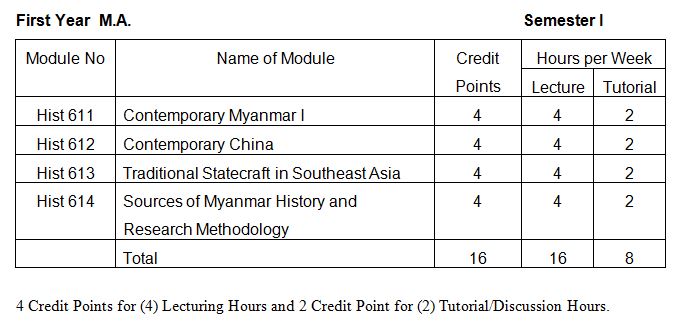
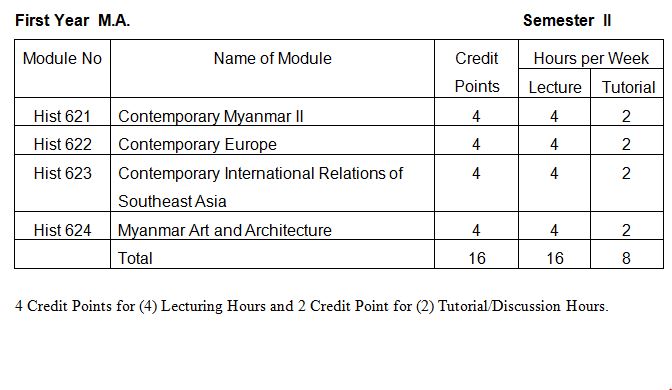
a. Locating the content of the course within the discipline
This course focuses on the contemporary Myanmar history from the prelude to democratization in Myanmar to emergence of new government formed by NLD Party. This course covers the wide range of the topics, including Saffron Revolution, Cyclone Nargis , 2008 Constitution , the new cabinet and the new changes , challenges in economic reforms , national reconciliation and peace process.
b. Locating the course within the curriculum
The course is a part of M.A. Degree for First year MA (History Specialization) students of University of Yangon.
a. Aims:
The course aims are as follows:
b. Learning Outcomes:
After participation in class discussions and assignments, students should be able to:
By the end of the semester students would be able to:
The course is structured in three broad sections. The first part examines prelude to democratization in Myanmar. The second part of the course illustrate democratization of Myanmar between 2011 to 2015 . The third part of the course includes 2015 Election and emergence of new government formed by NLD Party.
a. Locating the content of the course within the disciplined
The course is composed of many parts: basic terms of architecture in Myanmar, Mudrā and Āssana (Hand and foot postures of the Buddhist Art), stūpa (pagoda/solid type) and its architecture, gū (temple/ hollow type) and its architecture, Mon art and architecture and its significances, terracotta artifacts of Myanmar, Paintings of Bagan.
b. Locating the course within the curriculum
The course is a part of M.A. Degree for First year MA (History Specialization) students of University of Yangon.
a. Aims:
The course aims are as follows:
b. Learning Outcomes:
After participation in class discussions and assignments, students should be able to:
By the end of the semester students would be able to:
The course is composed of art and architectural terms of Myanmar tradition, architecture of stupa, and temple, and images, i.e. statue, relief, paintings and these types and styles. The course contains three parts: in the first part, students study on art and architectural terms as a fundamental knowledge. In the second part, study is made on stupa and its type and style. In the third part, students will learn iconographic study including the Buddha, monks, deities, laymen and depictions of Jataka stories. In the fourth part, students do study on art and architecture during the Pyu period, Bagan, and succeeding periods in Myanmar history.

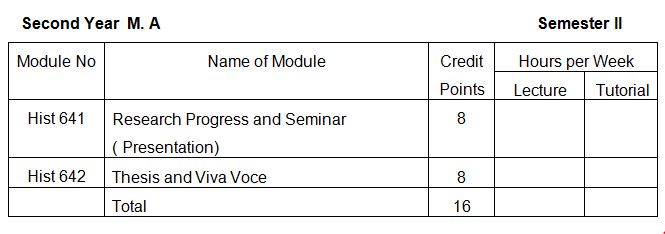
CURRICULUM FOR B.Sc DEGREE
Semester I
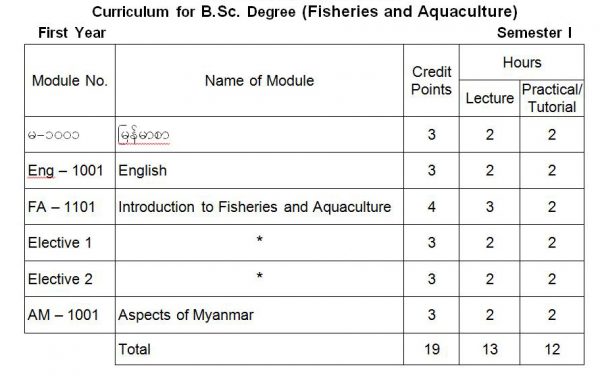
First Year (SI)
Foundation Courses
မ-1001 (3) (2-2) Myanmarsar
Eng – 1001 (3) (2-2) English
Core Courses
FA – 1101 (4) (3-2) Introduction to Fisheries and Aquaculture
Elective 1 *
BC – 1001 (3) (2-2) Biochemistry I
FA – 1102 (3) (2-2) Systematic of Fishes I
Zool – 1101 (3) (2-2) Animal Kingdom and Organization of Life Forms
Elective 2 *
Maths – 1001 (3) (2-2) Mathematics I (For fisheries student)
FA – 1103 (3) (2-2) Freshwater Invertebrate Zoology
Zool- 1102 (3) (2-2) Animal Ecology
* Student can choose any 2 elective courses offered by the Department of Mathematics, Department of Chemistry and Department of Zoology to fulfill a total of 19 credits.
* For elective, student must take both courses in a sequence.
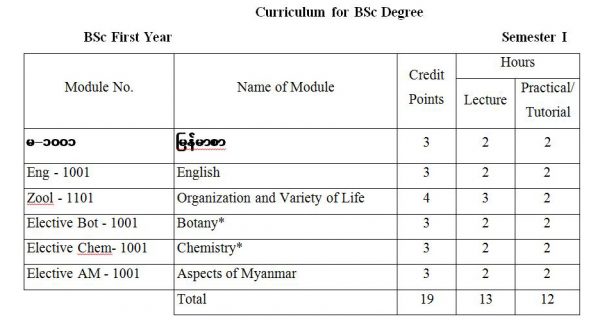
BSc First Year SI
Semester II
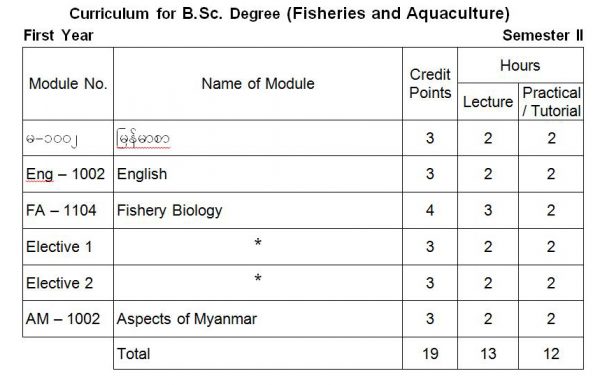
First Year (SII)
Foundation Courses
မ-1002 (3) (2-2) Myanmarsar
Eng – 1002 (3) (2-2) English
Core Courses
FA – 1104 (4) (3-2) Fishery Biology
Elective 1 *
BC – 1002 (3) (2-2) Biochemistry II
FA – 1105 (3) (2-2) Systematic of Fishes II
Zool- 1103 (3) (2-2) Chemical of Life and Life Processes
Elective 2 *
Maths – 1002 (3) (2-2) Mathematics II (For fisheries student)
FA – 1106 (3) (2-2) Marine Invertebrate Zoology
Zool- 1104 (3) (2-2) Biodiversity
* Student can choose any 2 elective courses offered by the Department of Mathematics, Department of Chemistry and Department of Zoology to fulfill a total of 19 credits.
* For elective, student must take both courses in a sequence.
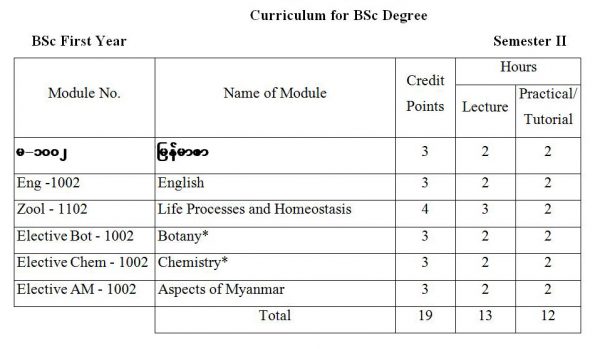
BSc First Year SII
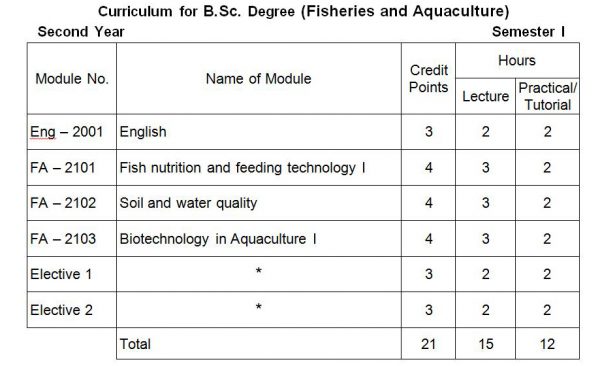
Second Year (SI)

BSc Second Year SI
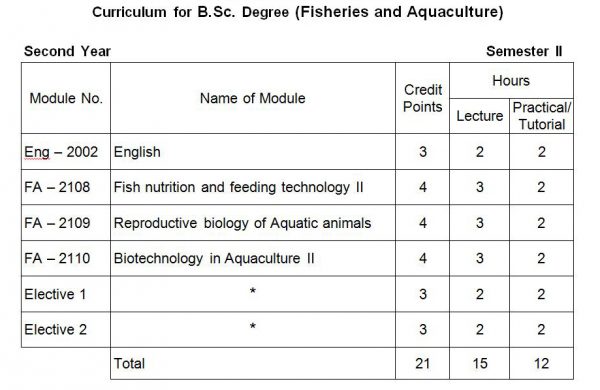
Second Year (SII)

BSc Second Year SII
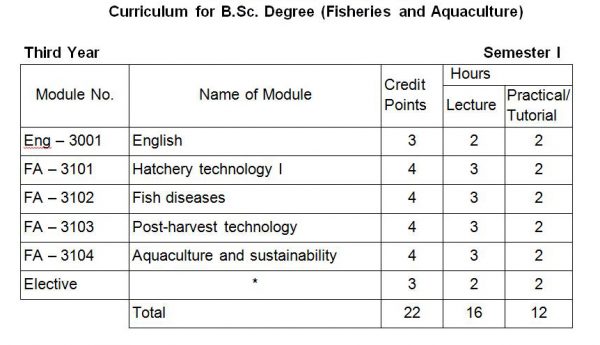
Third Year (SI)

BSc Third Year SI
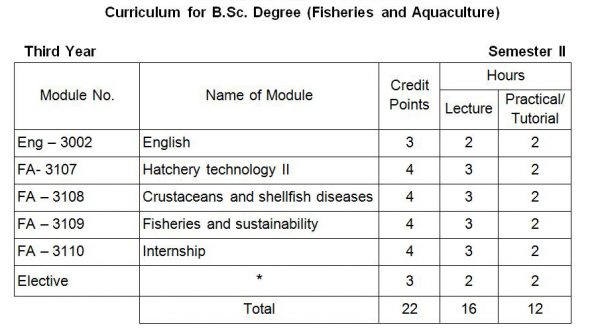
Third Year (SII)
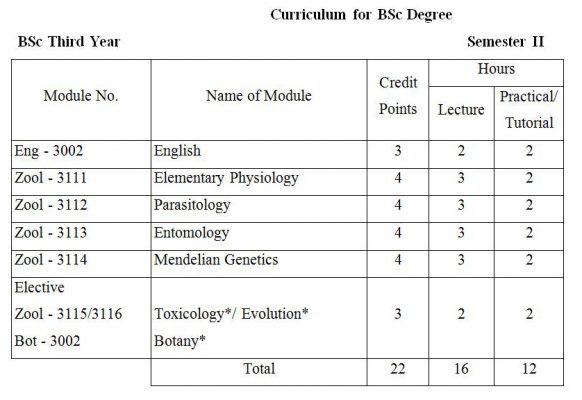
BSc Third Year SII

Fourth Year (SI)
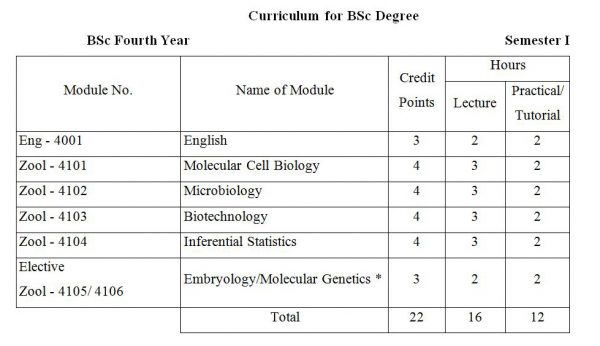
BSC Fourth Year SI
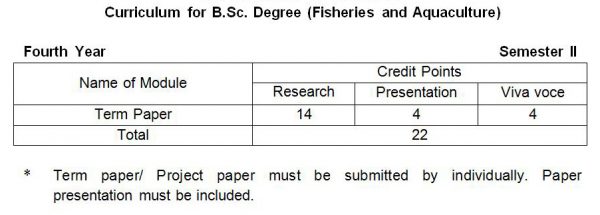
Fourth Year (SII)

BSc Fourth Year SII
University of Yangon participated in the Kick Off meeting of the CABARET project, which took place in Colombo (Sri Lanka) on 27-30 March 2017. CABARET (CApacity Building in Asia for Resilience EducaTion) is funded by the European Union, under the Erasmus + programme, to foster regional cooperation for more effective multi-hazard early warning and increased disaster resilience among coastal communities.The project is inspired by the UN Sendai Framework for Disaster Risk Reduction, agreed by UN member states in 2015. It includes a strong call for higher education to support the understanding of disaster risk and promote risk-informed decisions and risk sensitive planning from the local to the global levels. It also calls for the coordination of existing networks and scientific research institutions at all levels and all regions. The goal is to strengthen the evidence-base in support of the implementation of the new framework.
University of Yangon joined a group of experts from a consortium of 14 European and Asian higher education institutions from Bulgaria, Indonesia, Latvia, the Maldives, Malta, Myanmar, the Philippines, Sri Lanka, and the United Kingdom that hosts the University of Huddersfield’s Global Disaster Resilience Centre, leading partner of CABARET project.The Intergovernmental Oceanographic Commission of UNESCO (IOC-UNESCO), the Asian Disaster Preparedness Center and the Federation of Sri Lankan Local Government Authorities are Associate Partners of the project, and will help to promote the benefits across Asia and beyond.
During the Kick Off meeting, the partners provided the basis for a three year workplan and defined the first phase of CABARET that will involve a detailed analysis of existing capacity for multi-hazard early warning at the national level in Indonesia, the Maldives, Myanmar, the Philippines and Sri Lanka, as well as a wider regional analysis across Asia. This will provide the basis for future capacity development activities aimed at fostering regional cooperation and integration.
This project contributes to the internationalization of University of Yangon and fosters future collaborations with Europe and Asian partners in the field of disaster risk reduction.
The European Commission support for the production of this publication does not constitute an endorsement of the contents which reflects the views only of the authors, and the Commission cannot be held responsible for any use which may be made of the information contained therein.
Over 30 experts from across Europe and Asia met from 27th to 29th September 2017 at IHCantabria, in Santander, Spain, for the Second Steering Committee Meeting of the project CABARET (Capacity Building in Asia for Resilience EducaTion). This is a project funded by the European Union to foster regional cooperation for more effective multi-hazard early warning and increased disaster resilience among coastal communities. It will support joint initiatives and sharing of good practices among Higher Education Institutes in Asia and Europe, as we as promote links between Higher Education and other socio-economic actors.
CABARET aims to promote international cooperation between Higher Education Institutes (HEIs) in Asia and Europe, and among Asian HEIs themselves, to improve multi-hazard early warning and increase resilience among coastal communities. CABARET will strengthen relations between HEIs and the wider economic and social environment through its focus on coastal communities, many of which are under severe pressure resulting from planned and unplanned development, population growth and human induced vulnerability, coastal hazards with increasing frequency and magnitude, and the impacts of global climate change. It will build capacity, foster regional integration and cooperation through joint initiatives, sharing of good practices and cooperation among HEIs in Asia and Europe.
CABARET will empower individuals and organisations with the skills, competencies and credentials needed to promote and sustain regional cooperation within Asia and Europe, and within Asia itself, aimed at reducing the likelhood and impact of disasters in coastal communities. It will enhance the capacities of the partner HEIs in Asia to meet (match) the challenges and specific needs of the wider economic and social environment – strengthening the internationalisation of HEIs and their capacity to network effectively in research, scientific and technological innovation, faciliate the exchange of experience and practice despite of diversity, and increase the ability of partner HEIs in Asia to build relationships with relevant socio-economic actors.
The European Commission support for the production of this publication does not constitute an endorsement of the contents which reflects the views only of the authors, and the Commission cannot be held responsible for any use which may be made of the information contained therein.
In the last few years, Myanmar has undergone a profound political metamorphosis that has resulted in the suspension of economic sanctions that had been applied against the country, the normalization of its relations with the international community, and a deep political transition. These crucial achievements have gradually paved the way for the formulation of major structural reforms that involved a wide range of issues and sectors.

First Year Honours SI

First Year Honours SII

Second Year Honours SI

Second Year Honours SII

Third Year Honours SI
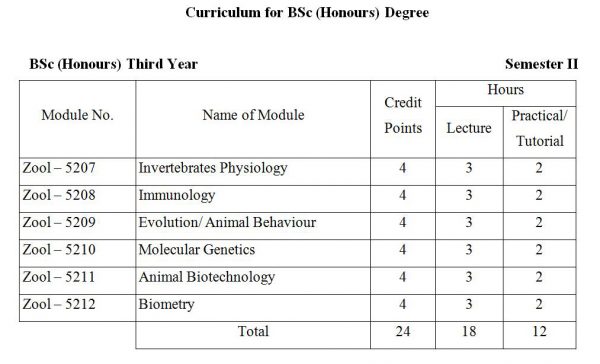
Third Year Honours SII
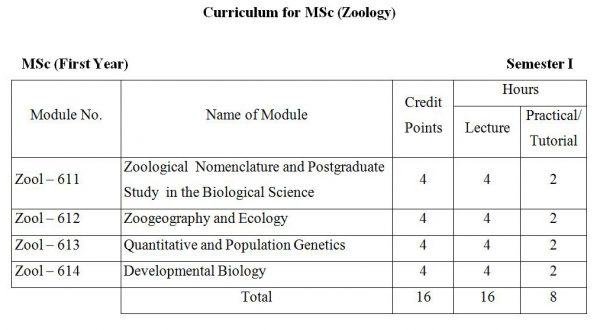
Master (First Year) SI
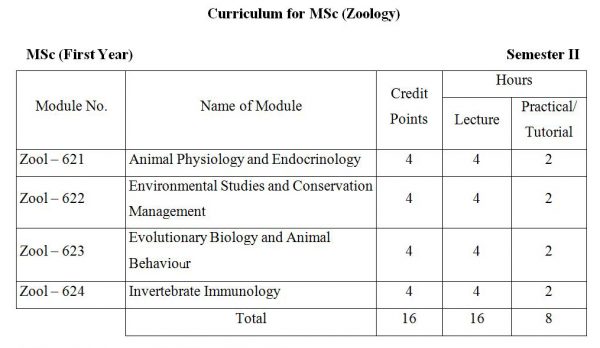
Master (First Year) SII

Master (First Year) SI

Master (First Year) SII
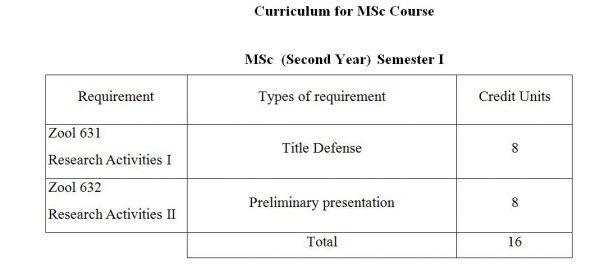

In 2018 – 2019 Academic year, Ms. Choi Jae Hee @ La Wan Choi is
attending at Ph.D (Prelim), Department of Oriental Studies,
University of Yangon. She is Korean. She got (Master of Buddhism) from Dongguk University. Her M.A Thesis title is “Buddhist Impact on Daw Aung San Suu Kyi’s Polictical Thoughts”.
Research Area
– Sanskrit Language and Literature
– Prakrit Language and Literature
– Pāḷi Language and Literature
– History of Buddhism
– Buddhist Councils
– Buddhist Culture
– Buddhist Philosophy
– Buddhist Ethic
– Buddhist Art and Architecture
– Linguistics
Speaker : U Thant Zaw Ko,
Joint Secretary (1)
Myanmar Cosmetics Association (MCA)
CEO of Shangrila-Leap International Co., Ltd.,
Doaru Cosmetics and D Family
Date : 16th January, 2019
Time : 7:30 am to 9:15 am
Place : U-109 (ULB Building),
Department of Industrial Chemistry, University of Yangon
| Date | : | August 6 – 9, 2019 |
| Venue | : | Rose Garden Hotel, Yangon, Myanmar |
| Organizer | : | Department of Industrial Chemistry,
University of Yangon, Myanmar |
| Co-organizer | : | Institut Kimia Malaysia (IKM) |
| Co-organizer | : | Foundation for Interaction between Science and Technology (FIST) |
| Co-organizer | : | Asia Chem Corporation (ACC) |
မကြာမီတွင် သက်တမ်း နှစ် ၁၀၀ ရှိလာတော့မည့် ရန်ကုန်တက္ကသိုလ်ကို နိုင်ငံ တကာအဆင့်မီတက္ကသိုလ်တစ်ခု ဖြစ်လာစေရန်အတွက် ရန်ကုန်တက္ကသိုလ် ပြုပြင် မွှမ်းမံရေးနှင့်အဆင့်မြှင့်တင်ရေးအဖွဲ့က ဦးဆောင်၍ မိတ်ဖက်တက္ကသိုလ်များနှင့် ပူးပေါင်းကာ ရေတို (၂၀၁၈-၂၀၂၀) ရေရှည် (၂၀၁၈-၂၀၃၀) ရည်မှန်းချက်များနှင့် Master Plan ကို ရေးဆွဲ အကောင်အထည်ဖော်လျက်ရှိပါသည်။
လုပ်ငန်းများကို ထိရောက်စွာအကောင်အထည် ဖော်နိုင်ရန်အတွက် ရန်ကုန် တက္ကသိုလ် ပညာရေးအဆင့်မြှင့်တင်မှုကော်မတီ (Software Committee) နှင့် ရန်ကုန် တက္ကသိုလ် အခြေခံအဆောက်အအုံနှင့်ပစ္စည်းကိရိယာများ အဆင့်မြှင့်တင်ရေးကော်မတီ (Hardware Committee) တို့ဖြင့် ဖွဲ့စည်းဆောင်ရွက်လျက် ရှိပါသည်။
ရန်ကုန်တက္ကသိုလ်၏နှစ် ၁၀၀ ပြည့်အမီ လုပ်ဆောင်ရမည့်လုပ်ငန်းများကို ရေတို ရည်မှန်းချက်အဖြစ် အကောင်အထည်ဖော် ဆောင်ရွက်လျက် ရှိပါသည်။ ထိုသို့အကောင် အထည်ဖော်ရာ၌ နိုင်ငံတော်၏ပံ့ပိုးမှုအပြင် ပြည်တွင်းနှင့် ပြည်ပ စီးပွားရေးလုပ်ငန်းရှင် များ၊ ပြည်တွင်းနှင့် ပြည်ပရောက် ကျောင်းသားဟောင်းများ၊ မိတ်ဖက်အဖွဲ့အစည်းများ၊ ကျောင်းသား၊ ဆရာ၊ မိဘများ၊ မြို့မိမြို့ဖများထံမှ ပါဝင်လှူဒါန်းမှုကိုပါ လက်ခံပြီး ရန်ကုန်တက္ကသိုလ် ပြုပြင်မွမ်းမံရေးနှင့် အဆင့်မြှင့်တင်ရေးကော်မတီ၏ ကြီးကြပ်မှုဖြင့် စနစ်တကျစီမံခန့်ခွဲ၍ ပွင့်လင်းမြင်သာစွာ ဆောင်ရွက်သွားနိုင်ရေးအတွက် ရန်ကုန် တက္ကသိုလ်ရာပြည့်အထိမ်းအမှတ်၊ ရန်ကုန်တက္ကသိုလ်ပြုပြင်မွမ်းမံရေးနှင့် အဆင့်မြှင့် တင်ရေး ပထမအကြိမ်အလှူငွေပေးအပ်ပွဲ အခမ်းအနားကို (၄-၂-၂၀၁၉) ရက်နေ့၊ နေ့လယ် (၁) နာရီတွင် ရန်ကုန်တက္ကသိုလ်၊ ဝိဇ္ဇာခန်းမ၌ ကျင်းပပြုလုပ်ခဲ့ပါသည်။
အဆိုပါ အခမ်းအနားသို့ ရန်ကုန်တက္ကသိုလ်ပြုပြင်မွှမ်းမံရေးနှင့် အဆင့်မြှင့်တင်ရေး ကော်မတီဥက္ကဌ ပညာရေးဝန်ကြီးဌာန ပြည်ထောင်စုဝန်ကြီး ဒေါက်တာမျိုးသိမ်းကြီး တက်ရောက်၍ အဖွင့်အမှာစကား ပြောကြားခဲ့ပါသည်။ အခမ်းအနားသို့ ပညာရေးဝန်ကြီး ဌာနမှ ညွှန်ကြားရေးမှူးချုပ်များ၊ မြန်မာနိုင်ငံဝိဇ္ဇာနှင့် သိပ္ပံပညာရှင်အဖွဲ့ ဥက္ကဌ၊ ရန်ကုန် တက္ကသိုလ်ပညာရေးအဆင့်မြှင့်တင်မှုကော်မတီဥက္ကဌ၊ ရန်ကုန်တက္ကသိုလ် အခြေခံ အဆောက်အအုံနှင့် ပစ္စည်းကိရိယာများအဆင့်မြှင့်တင်ရေးကော်မတီ ဥက္ကဌ၊ ဘာသာရပ် ဌာနအသီးသီးမှ ဖိတ်ကြားထားသော ကျောင်းသား/ကျောင်းသူဟောင်းများ၊ အလှူရှင် များတက်ရောက်ခဲ့ကြပါသည်။ ပထမအကြိမ်အလှူငွေပေးအပ်ပွဲတွင် အလှူရှင် (၃၂) ဦးထံမှ အလှူငွေ စုစုပေါင်း (၂၀၅) သိန်းကျပ် တိတိကို လက်ခံရရှိခဲ့ပါသည်။
အလှူငွေများကို ရန်ကုန်တက္ကသိုလ်သို့ တိုက်ရိုက်ဆက်သွယ် လှူဒါန်းနိုင်သည့် အပြင် အောက်ဖေါ်ပြပါ ဘဏ်စာရင်းများတွင်လည်း ပေးပို့ထည့်ဝင် လှူဒါန်းနိုင်ပါသည်။
မြန်မာငွေဖြင့် လှူဒါန်းနိုင်သောဘဏ်စာရင်းများ
(၁) AYA Bank (Account No.: 0134202010077100)
(၂) CB Bank (Account No.: 0107600100074063)
(၃) KBZ Bank (Account No.: 021-304-02105875501 (KANBAWZA BANK Ltd (KMY))
အမေရိကန်ဒေါ်လာငွေဖြင့် လှူဒါန်းနိုင်သောဘဏ်စာရင်းများ
(၁) AYA Bank (Account No.: 0134102030005487)
(၂) CB Bank (Account No.: 0107101200024357)
(၃) KBZ Bank (Account No.: 02110902105875501)
ရန်ကုန်တက္ကသိုလ်သို့ တိုက်ရိုက်လှူဒါန်းလိုပါက အောက်ဖေါ်ပြပါ ပုဂ္ဂိုလ်များသို့ ဆက်သွယ် လှူဒါန်းနိုင်ပါသည်။
ပါမောက္ခချုပ်ရုံး (ဖုန်းနံပါတ်-၀၁-၅၃၄၃၁၈၊ ၀၉-၈၆၀-၂၀၅၇)
ဒေါက်တာဥမ္မာကျော်၊ ဒု-ပါမောက္ခချုပ် (ဖုန်းနံပါတ်-၀၁-၅၁၄၉၁၀)
ဒေါက်တာအောင်ကျော်၊ ဒု-ပါမောက္ခချုပ် (ဖုန်းနံပါတ်-၀၁-၅၃၆၅၀၃)
ဒေါက်တာသောင်းထိုက်၊ ဒု-ပါမောက္ခချုပ် (ဖုန်းနံပါတ်-၀၁-၉၆၆၉၈၆၁)
ဒေါ်ဆွေဆွေအောင်၊ ဌာနမှူး(စီမံ/ဘဏ္ဍာဌာန) ရန်ကုန်တက္ကသိုလ် (၀၁-၅၀၅၆၁၂)
လှူဒါန်းငွေများအတွက် အလှူငွေပေးအပ်ပွဲနှင့် အလှူရှင်ဂုဏ်ပြုပွဲများကို ရန်ကုန် တက္ကသိုလ်တွင် လစဉ်ကျင်းပသွားမည်ဖြစ်ပြီး လှူဒါန်းငွေအပြင် အဆောက်အဦ၊ သင်ထောက်ကူနှင့် လက်တွေ့ခန်းသုံး ပစ္စည်းများ၊ အားကစားသုံးပစ္စည်းများစသည်ဖြင့် လိုအပ်နေသော ပစ္စည်းများအပြင် ကျွမ်းကျင်မှုအကူအညီနှင့် လုပ်အားအလှူ တို့ကိုလည်း ပါဝင်လှူဒါန်း နိုင်ပါသည်။
ရန်ကုန်တက္ကသိုလ်
ဝ၄-ဝ၁-၁၉
| စဉ် | အလှူရှင်အမည် | ရာထူး/ ဌာန/ ကုမ္ပဏီအမည် | အလှူငွေ(ကျပ်) |
|---|---|---|---|
| ၁ | ဒေါက်တာမျိုးသိမ်းကြီး | ပြည်ထောင်စုဝန်ကြီး၊ ပညာရေးဝန်ကြီးဌာန | ၁,၀ဝ၀,ဝ၀ဝ |
| ၂ | ဒေါက်တာအောင်သူ | ပြည်ထောင်စုဝန်ကြီး၊ လယ်ယာစိုက်ပျိုးရေး၊ မွေးမြူရေးနှင့် ဆည်မြောင်းဝန်ကြီးဌာန | ၅၀ဝ,၀ဝ၀ |
| ၃ | မြန်မာနိုင်ငံရူပဗေဒအသင်း | ၂,၁၀ဝ,၀ဝ၀ | |
| ၄ | (၈) ကြိမ်မြောက် ရူပဗေဒဆရာကန်တော့ပွဲ ဖြစ်မြောက်ရေးကော်မတီ | ၂,၀ဝ၀,ဝ၀ဝ | |
| ၅ | အဂ္ဂမဟာသီရိသုဓမ္မ မဏိဇောတဓရ ဦးမောင်မောင်+သီရိသုဓမ္မသိင်္ဂီဒေါ်သက်သက်နိုင် | ဥက္ကဌ၊ Asia Express ကုမ္ပဏီများ ဥက္ကဋ္ဌ၊ မြန်မာနိုင်ငံရူပဗေဒအသင်းဥက္ကဋ္ဌ | ၂,၀ဝ၀,ဝ၀ဝ |
| ၆ | ဦးဇော်ဇော်အောင် (၈၈) | ၁,၀ဝ၀,ဝ၀ဝ | |
| ၇ | စိမ်းလန်းကမ္ဘာကုမ္ပဏီ | စိမ်းလန်းစိုပြည်ပန်းခြံ | ၁,၀ဝ၀,ဝ၀ဝ |
| ၈ | All LLB(UY) | (၁၉၈၁-၂၀၁၈) | ၁,၀ဝ၀,ဝ၀ဝ |
| ၉ | ဦးမောင်မောင်လတ် | ဥက္ကဌ၊ ရန်ကုန်လျှပ်စစ်ဓာတ်အားပေးရေးအဖွဲ့ (YESB) | ၁,၀ဝ၀,ဝ၀ဝ |
| ၁၀ | ဒေါ်စန္ဒာခင် | ဒုဝန်ကြီး (ငြိမ်း)၊ ယဉ်ကျေးမှုဝန်ကြီးဌာန။ ဓာတုဗေဒဆရာမဟောင်း | ၅၀ဝ,၀ဝ၀ |
| ၁၁ | ဦးလှသိန်း | ဥက္ကဌ၊ မြန်မာနိုင်ငံဓာတုသိပ္ပံအသင်း | ၅၀ဝ,၀ဝ၀ |
| ၁၂ | ဒေါက်တာမြတ်ကျော်သူ | ပါမောက္ခ၊ ဓာတုတဗေဒဌာန၊ ရန်ကုန်တက္ကသိုလ် | ၅၀ဝ,၀ဝ၀ |
| ၁၃ | ဦးထိန်လင်းဦး (ခ) James (LLB) | Advocate, Myanmar Partner, MyanmarTrademark & Patent Law Firm | ၅၀ဝ,၀ဝ၀ |
| ၁၄ | ဗိုလ်မှူးကြီးသက်နိုင်၊ ဒေါ်မော်မော်ခိုင် | ဓာတုဗေဒကျောင်းသူဟောင်း | ၃၀ဝ,၀ဝ၀ |
| ၁၅ | ဒေါက်တာသီတာမင်းညီ | ကထိက၊ တက္ကသိုလ်များသိပ္ပံသုတေသနဌာန | ၂၀ဝ,၀ဝ၀ |
| ၁၆ | ဒေါက်တာလဲ့လဲ့ဝင်း | ပါမောက္ခ(ဌာနမှူး)၊ ဒဿနိကဗေဒဌာန၊ ရန်ကုန်တက္ကသိုလ် | ၁၀ဝ,၀ဝ၀ |
| ၁၇ | Daw Kathleen Thein | English Teacher's Trainer | ၁၀ဝ,၀ဝ၀ |
| ၁၈ | ဦးမျိုးမြင့် | ဗိုလ်မှူးချုပ် (ငြိမ်း) | ၁၀ဝ,၀ဝ၀ |
| ၁၉ | ဒေါ်ညွန့်ညွန့်ခိုင် | အင်္ဂလိပ်စာကျောင်းသားဟောင်း | ၁၀ဝ၀ဝ၀ |
| ၂၀ | ရန်ကုန်ကိုယ်ပိုင်ကျောင်းများအသင်း | ၅၀ဝ,၀ဝ၀ | |
| ၂၁ | 86 Batch တက္ကသိုလ် သင်္ချာဆရာမများ | ၉၀ဝ,၀ဝ၀ | |
| ၂၂ | ကောင်စုစံပညာ့ရိပ်မွန် | ၁၀ဝ၀,ဝ၀ဝ | |
| ၂၃ | ILBC | ၅၀ဝ,၀ဝ၀ | |
| ၂၄ | ပြည်သူ့နီတိပန်းပျိုးခင်း | ဘညိုစာပေ | ၅၀ဝ,၀ဝ၀ |
| ၂၅ | ဦးနေအုပ် | Chairman နေ ပညာရေးဖောင်းဒေးရှင်း | ၁,၀ဝ၀,ဝ၀ဝ |
| ၂၆ | PTA ရန်ကုန် | ၅၀ဝ,၀ဝ၀ | |
| ၂၇ | ဒေါ်ညိုညိုဝင်း | ပထဝီကျောင်းသားဟောင်း | ၂၀ဝ,၀ဝ၀ |
| ၂၈ | ဒေါ်သန်းသန်းမော် | ပထဝီကျောင်းသားဟောင်း | ၁၀ဝ,၀ဝ၀ |
| ၂၉ | ဒေါ်ထက်ထက်အောင် | Private Teacher | ၁၀ဝ,၀ဝ၀ |
| ၃၀ | သင်္ချာဌာန (ရန်ကုန်တက္ကသိုလ်) | ၃၀ဝ,၀ဝ၀ | |
| ၃၁ | ဦးမင်းနောင် + ဒေါ်ခင်မျိုးချစ် | ရွှေအိမ်ကမ္ဘာဆောက်လုပ်ရေး | ၂၀ဝ,၀ဝ၀ |
| ၃၂ | မြန်မာနိုင်ငံစိတ်ပညာအသင်း | ၂၀ဝ,၀ဝ၀ | |
| စုစုပေါင်း | ၂၀,၅၀ဝ,၀ဝ၀ |
Dr Ni Ni Than
Professor and Head, Department of Chemistry
Research Fellow of Daimler Benz Foundation, Germany (2002-2005)
Research Fellow of DAAD, Germany (2013-14)
Chairperson of Chemistry Subject-wise Committee, ADB Project
Myanmar National Authority of Chemical Weapon Convention
International Publications:
Publications in Myanmar
Dr Myat Kyaw Thu
Professor
PhD in Chemistry, University of Yangon
Post-doctoral Fellow in Enzymology, Thaiand (2005-2006)
Chairperson of Science Subject-wise Committee, JICA Project
International Publications:
ရက်စွဲ- ၂၀၁၉ခုနှစ် မတ်လ (၈)ရက်
ရန်ကုန်တက္ကသိုလ်တွင် Master Plan အရတည်ဆောက်မည့် အဆောက်အဦ အသစ် (၄) ခု (Student Hub, University Center, Library Extension, University Canteen) အတွက် ဒီဇိုင်းပုံစံ၊ အသုံးပြုမည်လုပ်ငန်းများနှင့်ပတ်သက်သည့် ဆွေးနွေးပွဲကို အောက်ဖေါ်ပြ ပါအတိုင်း ကျင်းပပြုလုပ်မည်ဖြစ်ပါ၍ စိတ်ဝင်စားသူ ကျောင်းသား၊ ကျောင်းသူများ၊ ဆရာ၊ဆရာမများနှင့်ဝန်ထမ်းများ တက်ရောက် ဆွေးနွေးနိုင်ပါရန် ဖိတ်ခေါ်အပ် ပါသည်။
ဆွေးနွေးမည့်နေရာ – ဆရာများအသင်းရုံးခန်း၊ ရန်ကုန်တက္ကသိုလ်
ဆွေးနွေးမည့်သူများ – Mr. Ben Kilburn (Architect), Mr. Anni Kohl (Architect) and Robin Cross (Architect for International Development)
ဆွေးနွေးမည့်အကြောင်းအရာနှင့်အချိန်
| အကြောင်းအရာ | နေ့ရက် | အချိန် |
|---|---|---|
| Student Hub | ၁၂/၃/၂၀၁၉ | နေ့လည် (၁) နာရီ |
| University Center | ၁၃/၃/၂၀၁၉ | နံနက် (၁၀) နာရီ |
| Library Extension | ၁၃/၃/၂၀၁၉ | နေ့လည် (၁) နာရီ |
| University Canteen | ၁၄/၃/၂၀၁၉ | နေ့လည် (၁) နာရီ |
| Student Hub | ၁၂/၃/၂၀၁၉ | နေ့လည် (၁) နာရီ |
(စီမံ/သင်/စာကြည့်တိုက်/သင်ကြားရေးဌာနအသီးသီးရှိဌာနမှူးများမှ မိမိတို့ဌာန အလိုက်အသိပေး ပါရန်နှင့် ဌာနအသီးသီးရှိ notice board တွင်ကပ်ထားပေးပါရန် မေတ္တာရပ်ခံ အပ်ပါသည်)
ပါမောက္ခချုပ်
ရန်ကုန်တက္ကသိုလ်
ရန်ကုန်တက္ကသိုလ် ၂၀၁၈-၂၀၁၉ ဘဏ္ဍာရေးနှစ်အတွင်း အောက်ဖော်ပြပါ ပြင်ဆင်ထိန်းသိမ်း ရေးဆိုင်ရာလုပ်ငန်းများ ဆောင်ရွက်လိုပါသဖြင့် စိတ်ပါဝင်စားသော လုပ်ငန်းရှင်များသည် တင်ဒါပုံစံတစ်စောင် လျှင် သတ်မှတ်ထားသော နှုန်းထားဖြင့် ဘဏ္ဍာဌာနသို့ ပေးသွင်း၍ ဝယ်ယူနိုင်ပါသည်။ တင်ဒါပုံစံများကိုများကို ( ၁၈.၃.၂၀၁၉ ) နေ့တွင် စတင်ရောင်းချမည်ဖြစ်ပြီး ( ၁.၄.၂၀၁၉ ) ရက်နေ့၊ မနက်( ၉ : ၃၀ )နာရီမှ ညနေ( ၄ : ၃၀ ) နာရီနောက်ဆုံးထား၍ တင်ဒါတင်သွင်းကြပါရန် ကြေညာအပ်ပါသည်-
ဖော်ပြရန်စာရွက်စာတမ်းများ
(၁) ဆောင်ရွက်ခဲ့သည့် လုပ်ငန်းအတွေ့အကြုံ စာရွက်စာတမ်းများ
(၂) လုပ်ငန်းရှင်၏ကိုယ်ရေးအချက်အလက်အပြည့်အစုံ
(၃) ပြစ်မှုကင်းရှင်းကြောင်း သက်ဆိုင်ရာမြို့နယ်ထောက်ခံချက်
ဆောင်ရွက်လိုသောလုပ်ငန်းများမှာ –
(၁) ရန်ကုန်တက္ကသိုလ်၊ စစ်ကိုင်းလမ်းရှိ အင်းဝစားသောက်ဆိုင်တန်းများအား မျက်နှာစာ (၃)ဘက် တိုးချဲ့ခြင်း လုပ်ငန်း
အသေးစိတ်အချက်အလက်များကို ရန်ကုန်တက္ကသိုလ်၊ အင်ဂျင်နီယာဌာနသို့ လူကိုယ်တိုင်ဖြစ်စေ တယ်လီဖုန်းအမှတ် ဝ၁-၅၃၄၄၈၉ သို့ ရုံးချိန်အတွင်း စုံစမ်းမေးမြန်း ဝယ်ယူနိုင်ပါသည်။
တင်သွင်းလာသော တင်ဒါလျှောက်လွှာများကို တင်ဒါစိစစ်ရွေးချယ်ရေးအဖွဲ့သို့ တင်သွင်းရမည်။ စည်းကမ်းချက်နှင့် မကိုက်ညီသော တင်သွင်းလွှာများကို လက်ခံစဉ်းစားမည်မဟုတ်ပါ။ တင်သွင်းလာသည့် မည်သည့် အဆိုပြုလွှာကိုမဆို လုပ်ငန်းစဉ်တင်ပြမှုများအပေါ် အခြေခံ၍ စဉ်းစားမည်ဖြစ်ပါသည်။
တင်ဒါရွေးချယ်မည့်အချိန်ကို ပြန်လည်ကြေငြာသွားမည် ဖြစ်ပါသည်။
အမျိုးသားပညာရေးဥပဒေ (၂၀၁၄) နှင့် အမျိုးသားပညာရေးဥပဒေကိုပြင်ဆင်သည့်ဥပဒေ (၂၀၁၅) အရ ရန်ကုန်တက္ကသိုလ်တွင် လွတ်လပ်သည့်သင်ကြားသင်ယူမူနှင့် လွတ်လပ်စွာစီမံခန့်ခွဲရေးစနစ်ကိုကျင့်သုံးနိုင်ရန် ရန်ကုန်တက္ကသိုလ်၏ ရည်မှန်းချက်များနှင့်အညီ ရန်ကုန်တက္ကသိုလ်ပဋိညာဉ်စာတမ်း (မူကြမ်း) ကို ရေးသားပြုစုရန် စီမံဆောင်ရွက်ခဲ့ပါသည်။
ရန်ကုန်တက္ကသိုလ်ပြုပြင်မွမ်းမံရေးနှင့် အဆင့်မြှင့်တင်ရေးအတွက် ရန်ကုန်တက္ကသိုလ်၏ ရေတို၊ ရေရှည် စီမံချက်များပါဝင်သော Master Plan (၂၀၁၈-၂၀၃၀) နှင့်အညီ အကောင်အထည်ဖော်ဆောင်ရွက်နိုင်ရန်အတွက် အဓိကလိုအပ်ချက် တစ်ခုဖြစ်သောရန်ကုန်တက္ကသိုလ် ပဋိညာဉ်စာတမ်းမူကြမ်းကို ရေးဆွဲပြုစုနိုင်ခဲ့ပါသည်။
ရန်ကုန်တက္ကသိုလ် ပဋိညာဉ်စာတမ်းမူကြမ်းကို www.uy.edu.mm တွင် ဝင်ရောက်ကြည့်ရှု့နိုင်ပါသည်။
အဆိုပါ မူကြမ်းအပေါ် ဆရာ၊ ဆရာမများ၊ ကျောင်းသား၊ ကျောင်းသူများ၊ ပညာရှင်များ၊ အကျိုးစီးပွားဆက်စပ်မှုရှိသူများနှင့် စိတ်ပါဝင်စားသူများထံမှ အကြံပြုချက်များကို ဖိတ်ခေါ်အပ်ပါသည်။
အကြံပြုချက်များကို အောက်ပါနည်းလမ်းများဖြင့် ပေးပို့နိုင်ပါသည်-
(၁) စာတိုက်မှ ပေးပို့ပါက – အပြည်ပြည်ဆိုင်ရာပူးပေါင်းဆောင်ရွက်ရေးရုံး၊ ရန်ကုန်တက္ကသိုလ်
တက္ကသိုလ်ရိပ်သာလမ်း၊ ကမာရွတ်မြို့နယ်၊ ရန်ကုန်မြို့။
စာတိုက်သေတ္တာအမှတ် – ၁၁၀၄၁
(၂) Email မှ ပေးပို့ပါက – international@uy.edu.mm
(၃) Online မှ ပေးပို့ပါက – www.uy.edu.mm
(၄) ထို့အပြင် ဘာသာရပ်ပါမောက္ခ(ဌာနမှူး)များမှ တစ်ဆင့်လည်းပေးပို့နိုင်ပါသည်။
အကြံပြုချက်များကို ၁၄-၆-၂၀၁၉ ရက်နေ့ (သောကြာနေ့) နောက်ဆုံးထား၍ ပေးပို့နိုင်ပါသည်။
ရန်ကုန်တက္ကသိုလ်
(၃-၄-၂၀၁၉)
URKUND is an automatic text-recognition system made for detecting, preventing and handling plagiarism, no matter language. We are passionate about helping schools, universities and corporations to encourage original writing and have done so for almost 20 years.
How to access UrKund Plagiarism Checker (Download Powerpoint)
https://secure.urkund.com/account/auth/login
“tekkatho” means “university” in Pali.
eTekkatho, is a not-for-profit project committed to providing a free digital library of research and learning resources to today’s students, academics and librarians in Myanmar (Burma). The eTekkatho digital library contains key educational resources specially collected to support teaching and research in Myanmar.
We select the best global open educational resources and adapt them so that they can work anywhere, even in places with little or no internet connection.
We are a virtual collaboration between the Tekkatho Foundation and our participating partner institutions in Myanmar. The library content is selected to support the curricula and ethos of our partner universities and institutions and each resource is approved by at least two specialists.
Alongside providing a free digital library, we also run programmes of training to librarians, educators and students where we introduce people of all ages in Myanmar to using the eTekkatho library, self-study and basic computer (IT) skills.
Visit : www.etekkatho.org
၁။ ရန်ကုန်တက္ကသိုလ် ၂၀၁၈-၂၀၁၉ ပညာသင်နှစ် ဘွဲ့ကြိုသင်တန်း (ဒုတိယပညာသင်ကာလ) နှင့် ဘွဲ့လွန် သင်တန်း (ပထမပညာသင်ကာလ) အတွက် ရန်ကုန်တက္ကသိုလ် အမျိုးသားဆောင် (ကေတုမတီဆောင် (A)) နှင့် အမျိုးသမီးဆောင်များ (မြတ်လေးဆောင်(A)၊ မြတ်လေးဆောင် (B))တို့အတွက် စားသောက်ရေးလုပ်ငန်းများ ဆောင်ရွက်လိုပါသဖြင့် စိတ်ပါဝင်စားသော လုပ်ငန်းရှင်များသည် တင်ဒါပုံစံတစ်စောင်လျှင် ၂၀ဝ၀ိ/-(ကျပ်နှစ်ထောင်တိတိ)နှုန်းဖြင့် ရန်ကုန်တက္ကသိုလ်၊ ဘဏ္ဍာဌာနသို့ ပေးသွင်း၍ (၁၇-၅-၂၀၁၉) ရက်နေ့ နေ့လယ်(၂:ဝ၀)နာရီတိတိတွင် နောက်ဆုံးထား၍ တင်ဒါတင်သွင်းကြပါရန် ကြေညာအပ်ပါသည်။
တင်ပြရန်စာရွက်စာတမ်း
၁။ ယခင်အစားအသောက်ကျွေးမွေးခဲ့ဖူးသော အဆောင်(သို့မဟုတ်)လုပ်ငန်း
၂။ လုပ်ငန်းရှင်၏ ကိုယ်ရေးအချက်အလက်အပြည့်အစုံ
၃။ ပြစ်မှုကင်းရှင်းကြောင်း သက်ဆိုင်ရာမြို့နယ် အုပ်ချုပ်ရေးရုံး (သို့မဟုတ်) မြို့နယ်ရဲစခန်း ထောက်ခံချက် မူရင်း(၆ လ အတွင်း)
အစားအသောက်ကျွေးမွေးရမည့်ကျောင်းဆောင်များ
အမျိုးသားဆောင်
(၁) ကေတုမတီဆောင်(A)
အမျိုးသမီးဆောင်
(၁) မြတ်လေးဆောင်(A)
(၂) မြတ်လေးဆောင်(B)
၂။ အသေးစိတ်အချက်အလက်များကို ရန်ကုန်တက္ကသိုလ်၊ သင်တန်းရေးရာဌာနသို့ လူကိုယ်တိုင်ဖြစ်စေ၊ တယ်လီဖုန်းအမှတ် ဝ၁-၅၃၄၃၉၀ သို့ဖြစ်စေ ရုံးချိန်အတွင်း စုံစမ်းနိုင်ပါသည်။
၃။ တင်သွင်းလာသော တင်ဒါလျှောက်လွှာများကို သတ်မှတ်ထားသောရက်တွင် တင်ဒါစိစစ်ရွေးချယ်ရေးအဖွဲ့ သို့တင်သွင်းရမည်။ စည်းကမ်းချက်နှင့် မကိုက်ညီသော တင်သွင်းလွှာများကို လက်ခံစဉ်းစားမည်မဟုတ်ပါ။ တင်သွင်းလာသည့် မည်သည့်အဆိုပြုလွှာကိုမဆို လုပ်ငန်းစဉ်တင်ပြမှုများအပေါ် အခြေခံ၍စဉ်းစားမည် ဖြစ်ပါ သည်။
၄။ (၁၇-၅-၂၀၁၉) ရက် နေ့လယ်(၂းဝ၀)နာရီတိတိ အချိန်တွင် တင်ဒါတင်သွင်းမည်ဖြစ်ပါသည်။
ရန်ကုန်တက္ကသိုလ်၊ ဝိဇ္ဇာခန်းမ၌ ၈-၅-၂၀၁၉ ရက်နေ့တွင် ရန်ကုန်တက္ကသိုလ်၊ ဥပဒေပညာဌာနနှင့် ဂျပန်နိုင်ငံ Kelo Law School တို့ MoU လက်မှတ်ရေးထိုးပွဲ ကျင်းပစဉ်
ရန်ကုန်တက္ကသိုလ်၊ ပင်လုံဆောင်၌ ၂၀၁၉ ခုနှစ် မေလ ၆-၇ ရက်နေ့များတွင် Central European University မှ ကျင်းပပြုလုပ်သော Workshop on Student-Centered and Outcomes-Based Curriculum Design in Higher Education
၁။ ရန်ကုန်တက္ကသိုလ်တွင် ၂၀၁၉-၂၀၂၀ ပညာသင်နှစ်အတွက် ပါရဂူဘွဲ့ (PhD) သင်တန်းကို အောက်ဖော်ပြပါ အထူးပြုဘာသာရပ်များဖြင့် ဖွင့်လှစ်သင်ကြားမည်ဖြစ်ပါသည်-
(က) မြန်မာစာ (ဋ) ရှေးဟောင်းသုတေသနပညာ
(ခ) အင်္ဂလိပ်စာ (ဌ) စာကြည့်တိုက်နှင့်သုတပညာ
(ဂ) ပထဝီဝင် (ဍ) ဓာတုဗေဒ
(ဃ) သမိုင်း (ဎ) ရူပဗေဒ
(င) ဒဿနိကဗေဒ (ဏ) သင်္ချာ
(စ) စိတ်ပညာ (တ) သတ္တဗေဒ
(ဆ) ဥပဒေပညာ (ထ) ရုက္ခဗေဒ
(ဇ) အရှေ့တိုင်းပညာ (ဒ) ဘူမိဗေဒ
(ဈ) နိုင်ငံတကာဆက်ဆံရေးပညာ (ဓ) ကုန်ထုတ်ဓာတုဗေဒ
(ည) မနုဿဗေဒ (န) ကွန်ပျူတာသိပ္ပံပညာ
(ပ) အဏုဇီဝဗေဒ
၂။ ပါရဂူဘွဲ့ (PhD) သင်တန်းတက်ရောက်ရန် အောက်ပါသတ်မှတ်ချက်များနှင့် ပြည့်စုံသူများ လျှောက်ထား နိုင်ပါသည်-
(က) ပါရဂူဘွဲ့သင်တန်းတက်ရောက်ခွင့်လျှောက်ထားသူသည်ပြည်ထောင်စုသမ္မတမြန်မာနိုင်ငံသား ဖြစ်ရမည်။
(ခ) ၂၀၁၉ ခုနှစ်၊ ဇွန်လ(၁)ရက်နေ့တွင် အသက်(၃၀)နှစ်ထက် မကျော်လွန်သူဖြစ်ရမည်။
(လုပ်ငန်းခွင်အတွေ့အကြုံရှိသူများကိုအသက်ကန့်သတ်ချက် လျှော့ပေါ့စဉ်းစားမည်။)
(ဂ) ပါရဂူဘွဲ့အကြိုသင်တန်းကို အချိန်ပြည့်တစ်နှစ် တက်ရောက်နိုင်သူဖြစ်ရမည်။
(ဃ) ဝင်ခွင့်လျှောက်ထားသူ၏ အရည်အချင်းသတ်မှတ်ချက်များမှာ အောက်ပါအတိုင်း ဖြစ်ပါသည်-
ပညာရေးဝန်ကြီးဌာနဝန်ထမ်းများအတွက်
(၁) အသိအမှတ်ပြုထားသော တက္ကသိုလ်တစ်ခုခုမှ မိမိလျှောက်ထားလိုသော ဘာသာရပ်နယ်ပယ်၌ အနိမ့်ဆုံးမဟာဘွဲ့အောင်မြင်သူဖြစ်ရမည်။ ဘာသာရပ်ဆိုင်ရာ (၃)နာရီ မေးခွန်းနှင့် အင်္ဂလိပ်စာ (၃)နာရီမေးခွန်း ဝင်ခွင့်စာမေးပွဲဖြေဆို အောင်မြင်ပြီး လူတွေ့စစ်ဆေးခြင်းအောင်မြင်သူများ ကိုသာ လက်ခံမည်။
(၂) အသိအမှတ်ပြု တက္ကသိုလ်တစ်ခုခုမှ မဟာသုတေသနဘွဲ့ ရရှိထားသူများသည် (ဝင်ခွင့်စာမေးပွဲ ဖြေဆိုရန်မလိုပါ) လူတွေ့စစ်ဆေးခြင်းကို ဖြေဆိုအောင်မြင်ရမည်။
(၃) တက္ကသိုလ်၊ ဒီဂရီကောလိပ်များမှ နည်းပြ၊ သရုပ်ပြဖြစ်ပါက နည်းပြ၊ သရုပ်ပြ ရာထူးတွင် လုပ်သက်(၁)နှစ် အနည်းဆုံးရှိရမည်။
(၄) တက္ကသိုလ်၊ ဒီဂရီကောလိပ်များမှ ဆရာ၊ ဆရာမများ မဟုတ်သော ပညာရေး ဝန်ထမ်းများဖြစ်လျှင် နည်းပြ၊ သရုပ်ပြနှင့် အဆင့်တူရာထူးတွင် လုပ်သက်(၂)နှစ် အနည်းဆုံး ရှိသူဖြစ်ရမည့်အပြင် လျှောက်ထားသူသည် သုတေသနဆိုင်ရာ လုပ်ငန်းဆောင်ရွက်နေသူဖြစ်ပြီး ပါရဂူဘွဲ့သင်တန်းတက်ရောက်ခွင့်ပြုခြင်းဖြင့် ဌာနဆိုင်ရာလုပ်ငန်းတွင် တိုက်ရိုက်အကျိုးပြုနိုင် ကြောင်း သက်ဆိုင်ရာဌာနဆိုင်ရာ အကြီးအကဲက ထောက်ခံသူဖြစ်ရမည်။
(၅) ပါရဂူကြိုသင်တန်းတက်ရောက်ခွင့်ရရှိပါကသက်ဆိုင်ရာဦးစီးဌာန ညွှန်ကြားရေးမှူးချုပ် (သို့မဟုတ်) သက်ဆိုင်ရာတက္ကသိုလ်၊ ဒီဂရီကောလိပ်၊ ပါမောက္ခချုပ်၊ ကျောင်းအုပ်ကြီးထံမှ အချိန်ပြည့်(၁)နှစ် တက်ရောက်ခွင့်ပြုနိုင်ကြောင်း ထောက်ခံစာတင်ပြရမည်။
အခြားဝန်ကြီးဌာနဝန်ထမ်းများအတွက်
(၁) အသိအမှတ်ပြုထားသော တက္ကသိုလ်တစ်ခုခုမှ မိမိလျှောက်ထားလိုသော ဘာသာရပ် နယ်ပယ်၌ အနိမ့်ဆုံးမဟာဘွဲ့အောင်မြင်သူဖြစ်ရမည်။ ဘာသာရပ် ဆိုင်ရာ(၃)နာရီမေးခွန်း နှင့် အင်္ဂလိပ်စာ(၃)နာရီမေးခွန်း ဝင်ခွင့်စာမေးပွဲဖြေဆို အောင်မြင်ပြီး လူတွေ့စစ်ဆေးခြင်း အောင်မြင်သူများကိုသာလက်ခံမည်။
(၂) အသိအမှတ်ပြု တက္ကသိုလ်တစ်ခုခုမှ မဟာသုတေသနဘွဲ့ ရရှိထားသူများသည် (ဝင်ခွင့် စာမေးပွဲဖြေဆိုရန်မလိုပါ) လူတွေ့စစ်ဆေးခြင်းကို ဖြေဆိုအောင်မြင် ရမည်။
(၃) အနိမ့်ဆုံး နည်းပြ၊ သရုပ်ပြ (သို့မဟုတ်) ယင်းနှင့်အဆင့်တူ ရာထူးတွင် လုပ်သက်(၂)နှစ် အနည်းဆုံး ရှိရမည်။
(၄) ပါရဂူကြိုသင်တန်းတက်ရောက်ခွင့်ရရှိပါက သက်ဆိုင်ရာ ညွှန်ကြားရေးမှူးချုပ်ထံမှ အချိန်ပြည့် (၁)နှစ် တက်ရောက်ခွင့်ပြုကြောင်းထောက်ခံစာတင်ပြရမည်။
နိုင်ငံ့ဝန်ထမ်းမဟုတ်သူများအတွက်
အသိအမှတ်ပြုထားသော တက္ကသိုလ်တစ်ခုခုမှ မိမိလျှောက်ထားလိုသော ဘာသာရပ် နယ်ပယ်၌ အနိမ့်ဆုံးမဟာသုတေသနဘွဲ့ရရှိပြီးသူဖြစ်ရမည်။ မဟာသုတေသနဘွဲ့ အတွက် ပြုလုပ်ခဲ့သော သုတေသနအကျဉ်းချုပ်နှင့် ပါရဂူဘွဲ့သင်တန်းတွင် ဆောင်ရွက်လိုသော သုတေသန နယ်ပယ်အဆိုပြုချက် (ကွန်ပျူတာစာစီ၍ စာမျက်နှာ(၃)မျက်နှာ ထက်မပိုသော)ကို လျှောက်လွှာ နှင့် အတူ ပူးတွဲတင်ပြရမည်။ လူတွေ့ စစ်ဆေးခြင်းကို ဖြေဆိုအောင်မြင်ရမည်။
၃။ ရန်ကုန်တက္ကသိုလ်၊ ကျောင်းသားရေးရာဌာနတွင် သတ်မှတ်ထားသည့် လျှောက်လွှာပုံစံဖြင့် (၁၇-၅-၂၀၁၉) ရက်(သောကြာနေ့) နောက်ဆုံးထား၍ လျှောက်ထားရမည်။
၄။ လျှောက်ထားသူများသည် ရန်ကုန်တက္ကသိုလ်တွင် ပါရဂူဘွဲ့(PhD) သင်တန်းဝင်ခွင့် စာမေးပွဲကို အောက်ပါ အတိုင်း ဝင်ရောက်ဖြေဆိုရမည်။
(က) ၂၀ -၅-၂၀၁၉ (တနင်္လာနေ့) ဝ၉:ဝ၀ နာရီမှ ၁၂:ဝ၀နာရီ သက်ဆိုင်ရာဘာသာရပ်
(ခ) ၂၁-၅-၂၀၁၉ (အင်္ဂါနေ့) ဝ၉:ဝ၀ နာရီမှ ၁၂:ဝ၀နာရီ အင်္ဂလိပ်စာဘာသာရပ်
၅။ ရေးဖြေစာမေးပွဲ အောင်မြင်သူများနှင့် မဟာသုတေသနဘွဲ့ရှိထားသူများကို (၂၈-၅-၂၀၁၉) ရက် (အင်္ဂါနေ့) တွင် လူတွေ့စစ်ဆေးမည်။
၆။ အသေးစိတ်အချက်အလက်များကို ဘာသာရပ်နှင့်စပ်လျဉ်း၍ သက်ဆိုင်ရာဘာသာရပ် ပါမောက္ခ(ဌာနမှူး)များ ထံတွင်လည်းကောင်း၊ သင်တန်းဝင်ခွင့်နှင့်စပ်လျဉ်း၍ (ဖုန်းနံပါတ်-၅၃၄၀၉၈) ထံတွင် လည်းကောင်း စုံစမ်းနိုင်ပါ သည်။
မော်ကွန်းထိန်း(သင်တန်းရေးရာ)
ရန်ကုန်တက္ကသိုလ်
၁။ ရန်ကုန်တက္ကသိုလ်တွင် ၂၀၁၉-၂၀၂၀ ပညာသင်နှစ်အတွက် ပါရဂူ(ဝါရင့်) သင်တန်းဝင်ခွင့် (လူတွေ့ စစ်ဆေး) စာမေးပွဲဖြေဆိုရန် လျှောက်လွှာများ တင်သွင်းနိုင်ရန် အကြောင်းကြားပါသည်။ အောက်ဖော်ပြပါ အထူးပြုဘာသာရပ်များဖြင့် ဖွင့်လှစ်သင်ကြားမည်ဖြစ်ပါသည်-
| (က) | မြန်မာစာ | (ဋ) | ရှေးဟောင်းသုတေသနပညာ |
| (ခ) | အင်္ဂလိပ်စာ | (ဌ) | စာကြည့်တိုက်နှင့်သုတပညာ |
| (ဂ) | ပထဝီဝင် | (ဍ) | ဓာတုဗေဒ |
| (ဃ) | သမိုင်း | (ဎ) | ရူပဗေဒ |
| (င) | ဒဿနိကဗေဒ | (ဏ) | သင်္ချာ |
| (စ) | စိတ်ပညာ | (တ) | သတ္တဗေဒ |
| (ဆ) | ဥပဒေပညာ | (ထ) | ရုက္ခဗေဒ |
| (ဇ) | အရှေ့တိုင်းပညာ | (ဒ) | ဘူမိဗေဒ |
| (ဈ) | နိုင်ငံတကာဆက်ဆံရေးပညာ | (ဓ) | ကုန်ထုတ်ဓာတုဗေဒ |
| (ည) | မနုဿဗေဒ | (န) | ကွန်ပျူတာသိပ္ပံပညာ |
| (ပ) | အဏုဇီဝဗေဒ |
၂။ သင်တန်းအတွက်အရည်အချင်းသတ်မှတ်ချက်မှာ အဆင့်မြင့်ပညာဦးစီးဌာန၏(၂၄-၅-၂၀၁၆) ရက်စွဲပါ စာအမှတ်၊ အဆင့်မြင့်/ရုံးချုပ်/စီမံ/ပါရဂူဝင်ခွင့်မူ/၂၀၁၆(၂၄၂၈) ပါသတ်မှတ်ချက်များ အတိုင်းဖြစ်ပါသည်။
၃။ ပါရဂူ(ဝါရင့်) သင်တန်းဝင်ခွင့် လျှောက်လွှာများကို ၂၃-၅-၂၀၁၉ ရက် (ကြာသပတေးနေ့) နောက်ဆုံး ထား၍ ရန်ကုန်တက္ကသိုလ် ကျောင်းသားရေးရာဌာနတွင် တင်သွင်းရမည်ဖြစ်ပါသည်။
၄။ ဝင်ခွင့်(လူတွေ့စစ်ဆေးခြင်း)ကို ၂၈-၅-၂၀၁၉ ရက် (အင်္ဂါနေ့)တွင် သက်ဆိုင်ရာ ဘာသာရပ်ဌာန အသီးသီး၌ ဖြေဆိုရမည်ဖြစ်ပါသည်။
မော်ကွန်းထိန်း၊သင်တန်းရေးရာဌာန
ရန်ကုန်တက္ကသိုလ်
Thermoelectric device modeling and fabrication workshop-2019 has been jointly organized by Universities’ Research Centre at University of Yangon, Myanmar and Center of Excellence on Alternative Energy, Research and Development Institute, Sakon Nakhon Rajabhat University, Thailand from 7-8 March 2019. About two hundred researchers and students from the Universities across Myanmar were participated in this training workshop. The workshop provided the participants background of thermoelectric materials and technology, modeling and simulation for thermoelectric properties, and hands-on works of assembling thermoelectric module, Seebeck voltage measurement and data analysis for the obtained results.
Research Interest
Integrated Navigation for unmanned vehicle, SLAM , Nonlinear Kalman Filtering for sensor fusion, UAV and UGV control. Nano chemical Imaging, Fabrication of microsensors
Major publications
• Real-time Attitude Heading Reference System Using Extended Kalman Filter for Programmable SoC” IEEE MCSoC-17, 2017
• Design of Metrix Enhanced Processor on the Reconfigurable hardware, RCCIE , p216, 2016
• Application of Unscented Kalman Filter with Non-symmetric Sigma Point Sampling on the Integrated Navigation System”, Gigaku Journal Vol 2 No2. p. S01007/1-6, 2014.
• Mission Control over Multi UAVs in the Real-time Distributed Hardware-In-the-Loop Environment”, Gigaku Journal Vol 2 No2. P. S01018/1-9, 2014
• Educational Program for Systems on Chip Design Using Minimal Set of Standalone Computer”, ITC-CSCC, p-627, Phuket, Thailand, 2014
• Robust Navigation System for a Land Vehicle” PCO Proceeding , AIP Guide Vol: 2008, p-237, ISBN: 978-983-44483-63, 2013
• Real-Time Obstacle Avoidance and Fuzzy Dynamic Steering Control for an Unmanned Ground Vehicle”, PCO Proceeding, AIP Guide Vol: 2008,p-244, ISBN: 978-983-44483-63, 2013
• Measurement of Thermal Conductivity of Copper Nanofluid Using Transient Hot Wire Method,” PCO Proceeding, AIP Guide Vol: 2008,p-155, ISBN: 978-983-44483-63,2013
• Prototyping of a Microsensor for Organic Vapours and Solutions, JARC, 2017, Vol.6,No 1&2, p-205
Research Interest
Electronics
Major publications
(1) Navigation System Using Neural Network, MAAS, 2015
(2) Hybrid Navigation System Based on Neural Network, International Conference, 2018
အစားအသောက်ဘေးကင်းစိတ်ချရမှုဆိုင်ရာ အလေ့အကျင့်ကောင်းများ အခြေခံသင်တန်း
| Trainers | : | (1) Dr. Khin Saw Hla
Director (Retired) Food and Drug Administration – Yangon Branch Ministry of Health and Sport |
| (2) Professor Dr. Yi Yi Myint
Head of Department (Retired) Department of Industrial Chemistry Yadanabon University |
||
| Date | : | 10th – 11th June, 2019 |
| Time | : | 2:00 pm – 3:30 pm |
| Place | : | Science Hall, University of Yangon |
၂၀၁၉-၂၀၂၀ ပညာသင်နှစ်
ပါရဂူဘွဲ့အကြိုသင်တန်း PhD(Prelim) ဝင်ခွင့်စာမေးပွဲ
The American Chamber of Commerce in Myanmar (AMCHAM) is pleased to announce that we are recruiting new students for the AMCHAM Scholarship Program.
Scholarship Application Seminar: AMCHAM will be conducting an informational seminar for all interested students on Thursday, 13 June 2019 from 9 am to 12 noon at the University of Yangon. If you have questions about the Scholarship Program or the application process, please join us.
About the AMCHAM Scholarship Program
With the objective of investing in the development of Myanmar’s young talent, AMCHAM has been supporting students at Yangon University since 2014 and remains committed to empowering Myanmar’s future leaders and brightest minds.
The AMCHAM Scholarship Program is an extremely competitive program that provides needs-based financial assistance as well as offering students a number of programs to help launch their career after graduation.
Beyond graduation, AMCHAM aims to keep scholarship alumni connected to the AMCHAM network through ongoing activities to help them build connections and develop their careers.
Eligibility Criteria: Students who meet the following general criteria are invited to apply for the AMCHAM Scholarship Program.
Selection Criteria: The Scholarship Selection Committee will assess applicants based on a number of factors including academic competence and financial need. All components of the application will be taken into consideration. AMCHAM is an inclusive organization and aims to recruit scholarship students who represent the diversity of the Myanmar population.
AMCHAM Scholarship Program Benefits
Financial Assistance: 500,000 kyats per student, per year. The funds will be awarded in two installments (250,000 kyats per semester). A unique feature of the AMCHAM Scholarship Program is that eligible students may renew the scholarship each year until they complete their undergraduate degree
Career Preparation Activities:
How to apply
Selection Process: There are three stages in the selection process.
Application Timeline
| Opening date: | 5 June 2019 |
| Closing date: | Friday, 5 July 2019* |
| Test & Interview: | Saturday, 13 July 2019** |
| Recipients announced: | Final week of July |
| Award presentation: | August (exact date to be announced) |
*Applications or supporting documents received after the closing date will not be considered.
**Only shortlisted candidates will be invited to the English test and interview stage.
Application Form: To download the application form please click here [https://www.amchammyanmar.com/asp/view_doc.asp?DocCID=5437].
Applications must be filled out completely, include all required supporting documentation, and be submitted by the closing date. Incomplete applications will not be considered.
Application Contact: We encourage applications to be submitted electronically to Clara Tang at clara@amchammyanmar.com by the closing date.
Hard copy applications may be delivered to the AMCHAM Myanmar office at:
#19-09 Sule Square, 221 Sule Pagoda Road, Kyauktada Township, Yangon 11182
Tel: +95 (0)1-925-5080
Office hours are 9 am to 5 pm (Mon-Fri)
Renewal Criteria: Each semester, students who meet the following criteria will be qualified to renew their scholarship.
About AMCHAM Myanmar
The American Chamber of Commerce in Myanmar (AMCHAM Myanmar) was established on October 31, 2013. To date, more than 170 companies employing over 20,000 Myanmar nationals have joined the Chamber. These companies represent a diverse collection of industries and nationalities, with a common goal to expand American business and promote the highest business standards in Myanmar.
The mission of AMCHAM Myanmar is to promote and connect American business in Myanmar by encouraging local partnerships and upholding the highest business standards. For more information, visit www.amchammyanmar.com.
၁။ ရန်ကုန်တက္ကသိုလ်၊ လူ့စွမ်းအားအရင်းအမြစ်ဖွံ့ဖြိုးမှုဌာန၏ အစီအစဉ်ဖြင့် ဓာတုဗေဒ ဌာန၊ ကုန်ထုတ်ဓာတုဗေဒဌာန၊ သတ္တဗေဒဌာနနှင့် ရုက္ခဗေဒဌာနများ ပူးပေါင်း၍ Certificate in Food Technology Course သင်တန်းအမှတ်စဉ် (၂) ကို ရန်ကုန် တက္ကသိုလ်၊ ဓာတုဗေဒဌာန၌ ဖွင့်လှစ်မည်ဖြစ်ပါသည်။
၂။ သင်တန်းဝင်ခွင့်အရည်အချင်း – တက္ကသိုလ်တစ်ခုခုမှဘွဲ့ရရှိပြီး စာသောက်ကုန်လုပ်ငန်း အတွေ့အကြုံရှိသူ
၃။ သင်တန်းကာလ – (၃) လ
၄။ သင်တန်းချိန် – နံနက်(၇)နာရီ မှ (၉)နာရီထိ (တနင်္လာ မှ သောကြာနေ့)
နံနက်(၈)နာရီ မှ ညနေ(၃)နာရီထိ (တနင်္ဂနွေနေ့)
၅။ သင်တန်းဖွင့်မည့်ရက် – (၁၇.၆.၂၀၁၇)
၆။ သင်တန်းတက်ရောက်လိုသော သင်တန်းသာ/သူများသည် ၈.၆.၂၀၁၉ နံနက် (၉)နာရီမှ စ၍ အောက်ဖော်ပြပါ website link ၌ ဝင်ခွင့်ပုံစံဖြည့်စွက်လျှောက်ထားနိုင်ပါသည်။ ဦးစွာရောက်ရှိပြီး ပြည့်စုံသောလျှောက်လွှာများကို ဦးစားပေးအစီအစဉ်အတိုင်း သတ်မှတ်ဦးရေ ပြည့်သည်အထိ လက်ခံမည်ဖြစ်ပါသည်။ သင်တန်း တက်ရောက်ခွင့် ရသူများ၏ အမည်စာရင်းကို ရန်ကုန် တက္ကသိုလ်၊ ဓာတုဗေဒဌာန၌ (၁၄.၆.၂၀၁၉) ညနေ (၃)နာရီတွင် ကြေညာပါမည်။ ၄င်းအမည် စာရင်းတွင် ပါဝင်သူများသည် လူကိုယ်တိုင်လာရောက်၍ ကျောင်းအပ်နှံရမည် ဖြစ်ပါသည်။
Training Course Registration Form
ဓာတုဗေဒဌာန
ရန်ကုန်တက္ကသိုလ်
Dr Aye Thandar Soe
Associate Professor, Department of Mathematics
Dr Kyawt Kyawt Khine Than
Lecturer, Department of Mathematics
Dr Sandar Aung
Assistant Lecturer, Department of Mathematics
(က) ၂၀၁၉ ခုနှစ်တွင် ကျင်းပခဲ့သော တက္ကသိုလ်၀င်စာမေးပွဲကို အောင်မြင်ခဲ့သူဖြစ်ရမည်။
(ခ) နိုင်ငံသားဖြစ်မှုနှင့်ပတ်သက်၍ ဝင်ခွင့်လျှောက်ထားချိန်၌ တည်ဆဲနိုင်ငံသားဖြစ်မှုဥပဒေ နှင့်ကိုက်ညီသော နိုင်ငံသား ဖြစ်ရမည်။ (မှတ်ပုံတင်မိတ္တူများ ပူးတွဲတင်ပြရန်)
(ဂ) ဤတက္ကသိုလ်မှ သတ်မှတ်ထားသော စည်းကမ်းများကို လိုက်နာနိုင်သူဖြစ်ရမည်။
(ဃ) ပြည်ထောင်စုသမ္မတမြန်မာနိုင်ငံတော်အတွင်း မည်သည့်ဒေသမှမဆို တန်းတူ လျှောက်ထား နိုင်သည်။
(င) လျှောက်ထားလိုသူများသည် ရန်ကုန်တက္ကသိုလ်သို့ တိုက်ရိုက် လျှောက်ထားရမည်။
(စ) စုစုပေါင်း ကျောင်းသား၊ ကျောင်းသူ ဦးရေ (၂၁၃၀)ဦး လက်ခံမည်။
(ဆ) အောက်ဖော်ပြပါ အထူးပြုဘာသာရပ်များကို လျှောက်ထားနိုင်ပါသည်-
| စဉ် | ဘာသာရပ် | အရည်အချင်းသတ်မှတ်ချက် | အရည်အချင်းသတ်မှတ်ချက် | အရည်အချင်းသတ်မှတ်ချက် | သင်တန်း ကာလ | အပ်နှင်းမည့်ဘွဲ့ |
| စဉ် | ဘာသာရပ် | အနိမ့်ဆုံးရမှတ် | အနိမ့်ဆုံးစုစုပေါင်းရမှတ် | သင်တန်း ကာလ | ||
| ၁ | မြန်မာ | မြန်မာစာ | ၇၀ | ၄၁၀ | ၄ နှစ် | B.A. |
| ၂ | မြန်မာမှုပညာ | မြန်မာစာ | ၆၀ | ၄၀ဝ | ၄ နှစ် | B.A. |
| အင်္ဂလိပ်စာ | ၆၀ | |||||
| ၃ | အင်္ဂလိပ်စာ | အင်္ဂလိပ်စာ | ၇၀ | ၄၅၀ | ၄ နှစ် | B.A. |
| ၄ | ပထဝီဝင် | ၃၆၀ | ၄ နှစ် | B.A. | ||
| ၅ | ပတ်ဝန်းကျင်ဆိုင်ရာလေ့လာမှုပညာ | အင်္ဂလိပ်စာ | ၆၅ | ၄၀ဝ | ၄ နှစ် | B.ES. |
| ၆ | သမိုင်း | အင်္ဂလိပ်စာ | ၆၀ | ၃၆၀ | ၄ နှစ် | B.A. |
| ပြင်ဆင်ချက်-တက္ကသိုလ်ဝင်ခွင့်လမ်းညွှန်စာအုပ်တွင် သမိုင်းအထူးပြုအတွက် အရည်အချင်းသတ်မှတ်ချက် ဘာသာရပ်တွင် သမိုင်း အစား အင်္ဂလိပ်စာ ဖြစ်ရမည်။ | ||||||
| ၇ | ဒဿနိကဗေဒ | အင်္ဂလိပ်စာ | ၆၀ | ၃၆၀ | ၄ နှစ် | B.A. |
| ၈ | စိတ်ပညာ | အင်္ဂလိပ်စာ | ၆၅ | ၄၀ဝ | ၄ နှစ် | B.A. |
| ၉ | အရှေ့တိုင်းပညာ | အင်္ဂလိပ်စာ | ၆၀ | ၃၆၀ | ၄ နှစ် | B.A. |
| ၁၀ | နိုင်ငံတကာဆက်ဆံရေးပညာ | အင်္ဂလိပ်စာ | ၇၀ | ၄၇၀ | ၄ နှစ် | B.A. |
| ၁၁ | နိုင်ငံရေးသိပ္ပံ | အင်္ဂလိပ်စာ | ၆၅ | ၄၂၀ | ၄ နှစ် | B.A. |
| ၁၂ | မနုဿဗေဒ | အင်္ဂလိပ်စာ | ၆၀ | ၃၆၀ | ၄ နှစ် | B.A. |
| ၁၃ | ရှေးဟောင်းသုတေသနပညာ | အင်္ဂလိပ်စာ | ၆၀ | ၃၈၀ | ၄ နှစ် | B.A. |
| ၁၄ | စာကြည့်တိုက်နှင့်သုတပညာ | အင်္ဂလိပ်စာ | ၆၀ | ၃၆၀ | ၄ နှစ် | B.A. |
| ၁၅ | ဥပဒေပညာ | အင်္ဂလိပ်စာ | ၆၅ | ၄၂၅ | ၅ နှစ် | LLB |
| ၁၆ | ဓာတုဗေဒ | ဓာတုဗေဒ | ၈၀ | ၄၀ဝ | ၄ နှစ် | B.Sc. |
| ၁၇ | ဇီဝဓာတုဗေဒ | ဓာတုဗေဒ | ၈၀ | ၄၀ဝ | ၄ နှစ် | B.Sc. |
| ဇီဝဓာတုဗေဒ | ဇီဝဗေဒ | ၇၀ | ၄၀ဝ | ၄ နှစ် | B.Sc. | |
| ၁၈ | ကုန်ထုတ်ဓာတုဗေဒ | ဓာတုဗေဒ | ၈၀ | ၄၀ဝ | ၄ နှစ် | B.Sc. |
| ၁၉ | ရူပဗေဒ | ရူပဗေဒ | ၈၀ | ၄၀ဝ | ၄ နှစ် | B.Sc. |
| ၂၀ | သင်္ချာ | သင်္ချာ | ၈၀ | ၄၀ဝ | ၄ နှစ် | B.Sc. |
| ၂၁ | သတ္တဗေဒ | ဇီဝဗေဒ | ၇၅ | ၄၀ဝ | ၄ နှစ် | B.Sc. |
| ၂၂ | ရုက္ခဗေဒ | ဇီဝဗေဒ | ၇၅ | ၄၀ဝ | ၄ နှစ် | B.Sc. |
| ၂၃ | အဏုဇီဝဗေဒ | ဇီဝဗေဒ | ၇၅ | ၄၀ဝ | ၄ နှစ် | B.Sc. |
| ၂၄ | ဘူမိဗေဒ | ရူပ/ဓာတု | ၇၀ | ၄၀ဝ | ၄ နှစ် | B.Sc. |
| ၂၅ | ကွန်ပျူတာသိပ္ပံ | သင်္ချာ | ၈၀ | ၄၅၀ | ၄ နှစ် | B.Sc. |
| ၂၆ | ငါးလုပ်ငန်းဆိုင်ရာဘာသာရပ် | အင်္ဂလိပ်စာ | ၆၀ | ၄၂၀ | ၄ နှစ် | B.Sc. |
| ၂၆ | ငါးလုပ်ငန်းဆိုင်ရာဘာသာရပ် | ဇီဝဗေဒ | ၇၅ | ၄၂၀ | ၄ နှစ် |
(စျ) ဝေးလံခေါင်ဖျားဒေသများမှ လျှောက်ထားသော ကျောင်းသား၊ ကျောင်းသူများအတွက် ခွဲတမ်းကို ဘာသာရပ် အသီးသီးတွင် လက်ခံမည့်ဦးရေ၏ ၂ % ထားရှိမည် ဖြစ်ပါသည်။
(ည) တက္ကသိုလ်ဝင်ခွင့်ကို အရည်အချင်းစစ် လူတွေ့နှုတ်ဖြေ စာမေးပွဲဖြင့် ရွေးချယ် ဆောင်ရွက်ပါမည်။
(ဋ) ဘူမိဗေဒဘာသာရပ်သို့ လျှောက်ထားသူများသည် လူတွေ့နှုတ်ဖြေစာမေးပွဲအပြင် သတ်မှတ် ထားသောစည်းမျဉ်းနှင့်အညီ မိုင်(၂၀)လမ်းလျှောက်နိုင်ရမည်။
(ဋ) ရန်ကုန်တက္ကသိုလ်၌ တက်ရောက်ခွင့်ရရှိသူအမည်စာရင်းကို www.uy.edu.mm တွင် လည်းကောင်း၊ ရန်ကုန်တက္ကသိုလ် ကျောင်းသားရေးရာ ကြော်ငြာသင်ပုန်းတွင် လည်းကောင်း ထုတ်ပြန် ကြေညာပေးပါမည်။
(ဍ) အသေးစိတ်သိရှိလိုပါက ရန်ကုန်တက္ကသိုလ်၊ မော်ကွန်းထိန်း (သင်တန်း) ၀၁-၅၃၄၀၂၄၊ လက်ထောက်မော်ကွန်းထိန်း(ကျောင်းသားရေးရာ) ၀၁-၅၃၄၃၉၀ သို့ ရုံးချိန်အတွင်း ဆက်သွယ်မေး မြန်းနိုင်ပါသည်။
CFP Info Session
| Date | : | July 20th 2019 |
| Time | : | 2:00PM -4:30PM |
| Venue | : | Sule Shangri-la Hotel |
Dr Swe Swe Aye
Associate Professor, Department of Botany
MSc (Pharmacognosy, University of Yangon), 2002,Myanmar
MRes (Pharmacognosy, University of Yangon), 2003,Myanmar
PhD ( Pharmacognosy, University of Yangon), 2008, Myanmar
Food Safety and Security Course Training, Faculty of Life Science,
Tel-Aviv University, Israel, 2016
Academic Performance
(1) Sub members : Asian Chemical Biology Intiative supported by JSPS Core –to-Core Program, 2018-now
Supervision (Total 11)
MSc 1
MRes 3
PhD 7
Current Project
(1) Project Leader : Isolation and Characterization of natural polymers from mucilage producing plants (2019-2022, နိုင်ငံ အကျိုးပြုသုတေသန ပရောဂျက်)
(2) Project Member : Bioprospecting on Biological Materials of Myanmar (The University of Yangon (UY) and Korea Research Institute of Bioscience and Biotechnology ( KRIBB), 2014-now)
Academic Performance
(1) Sub members : Asian Chemical Biology Intiative supported by JSPS Core –to-Core Program, 2018-now
The Bachelor degree’s curriculum is designed to help students develop the botanical skills and insights to live successfully and to serve their country effectively after graduation.
Undergraduate courses
Bachelor of Science in Botany is a four year degree programme that provides students with a strong background in the various aspects of Botany. The curriculum covers:
Year 1: Plant Biology and Basic Concepts of Applied Botany
Year 2: Survey of the Plant Kingdom, Angiosperms, Genetics, Ecology, Horticulture
Year 3: Medicinal Plants, Plant Cytology and Anatomy, Plant Physiology, Environmental Biology, Cell Biology, Cytogenetics, Biodiversity and Conservation
Year 4: Plant Systematics, Biochemistry, Plant Biotechnology, Pharmacognosy, Microbiology, Applied Ecology, Applied Microbiology and Biostatistics.
Bachelor (Honours) Botany students cover:
Year 1: Medicinal Plants, Plant Cytology and Anatomy, Plant Physiology, Environmental Biology, Cell Biology, Cytogenetics, Biodiversity and Conservation (the same courses offered in the 3rd year of the ordinary degree, above).
Year 2: Plant Systematics, Applied Ecology, Pharmacognosy, Microbiology, Biochemistry, Applied Microbiology, Biostatistics, Plant Biotechnology (the same courses as in Year 4 above).
Year 3: Industrial Microbiology, Advanced Plant Physiology, Advanced Pharmacognosy, Molecular Genetics, Plant Geography, Industrial Economic Plants, Enzymology, Ethnobotany and Environmental Education and Ethics.
Environmental Science is also offered by the Botany Department. Students who pass the second year of any specialization may enroll in this programme.
MSc
Botany specialization covers:
Evolutionary Survey of the Plant Kingdom, Principles of Taxonomy, Pharmacognosy, Environmental Science, Cell Biology, Embryology and Morphogenesis, Plant Geography, Plant Microbiology, Research Methods and Basic Techniques, Biodiversity and Conservation, Plant Biochemistry, Molecular Biology and Biotechnology, Genetics and Evolution
Microbiology specialization covers:
Interaction of Plants and Microbes, Yeast Microbiology, Microbial Deterioration of Materials, Microbiology of Fermented Food, Advanced Bacterial Genetics and Advanced Cell and Molecular Biology.
A Botany major PhD covers the following areas in seminars and literature survey:
Principles and Concepts of Theories on Plant Groups and their Evolution, Pharmacology, Anatomy, Cytology, Analytical Methods and Biometrics, Molecular Cell Biology, Microbiology and Biotechnology, Plant Pathology, Biostatistics, General Techniques, Research Projects.
A Microbiology PhD covers:
Pharmaceutical and Industrial Microbiology, Microbial Diversity and its Environmental Application.
PhD Dissertation
PhD candidates’ performance is continuously monitored in course work as well as in their research and presentations of scientific data. PhD students present the results of their research findings in draft manuscript submission and gain approval of their manuscript by defending it. Candidates undertake postgraduate research in Microbiology, Pharmacognosy, Environmental Science, Horticulture, Taxonomy, Anatomy, Biochemistry, Limnology, Mycology, Pathology, Physiology, Ecophysiology, Ethnobotany, Genetics and Cytogenetics.
Dr Win Ko Ko
Lecturer
Qualification
:
BA, MA, PhD(Myanmar)
Phone
:
–
:
–
Address
:
No.44, first floor, Aungmytta Street, Hlaing Township, Yangon, Myanmar.
Dr Lay Ngone
Lecturer
Qualification
:
BA, MA, PhD(Myanmar)
Phone
:
–
:
–
Address
:
–
Dr Soe Soe Naing
Lecturer
Qualification : BA,MA, MRes, PhD
Phone : 09258666550
Email : soethant686@gmail.com
Address : YCDC Campus, No201,B(1),Yankin Township, Yangon.
ရန်ကုန်တက္ကသိုလ် ၂၀၁၈-၂၀၁၉ ဘဏ္ဍာရေးနှစ်အတွင်း အောက်ဖော်ပြပါ ပြင်ဆင်ထိန်းသိမ်း ရေးဆိုင်ရာ လုပ်ငန်းများ ဆောင်ရွက်လိုပါသဖြင့် စိတ်ပါဝင်စားသော လုပ်ငန်းရှင်များသည် တင်ဒါပုံစံတစ်စောင် လျှင် သတ်မှတ်ထားသော နှုန်းထားဖြင့် ဘဏ္ဍာဌာနသို့ ပေးသွင်း၍ ဝယ်ယူနိုင်ပါသည်။ တင်ဒါပုံစံများကိုများကို ( ၁၀.၇.၂၀၁၉ ) နေ့တွင် စတင်ရောင်းချမည်ဖြစ်ပြီး ( ၂၉.၇.၂၀၁၉ )ရက်နေ့၊ မနက်( ၉:၃၀ )နာရီမှ ညနေ( ၄:၃၀ ) နာရီနောက်ဆုံးထား၍ တင်ဒါတင်သွင်းကြပါရန် ကြေညာအပ်ပါသည်-
ဖော်ပြရန်စာရွက်စာတမ်းများ
(၁) ဆောင်ရွက်ခဲ့သည့် လုပ်ငန်းအတွေ့အကြုံ စာရွက်စာတမ်းများ
(၂) လုပ်ငန်းရှင်၏ကိုယ်ရေးအချက်အလက်အပြည့်အစုံ
(၃) ပြစ်မှုကင်းရှင်းကြောင်း သက်ဆိုင်ရာမြို့နယ်ထောက်ခံချက်
ဆောင်ရွက်လိုသောလုပ်ငန်းများမှာ –
(၁) ရန်ကုန်တက္ကသိုလ် ပရဝုဏ်အတွင်း Ground Penetrating Radar Survery ( GPR ) တိုင်းတာခြင်း လုပ်ငန်း
(၂) ရန်ကုန်တက္ကသိုလ်( လှိုင်နယ်မြေ ) လူသွားစင်္ကြန်လျှောက်လမ်း ပြုပြင်ခြင်းလုပ်ငန်း
(၃) ရန်ကုန်တက္ကသိုလ်၊ အပန်းဖြေရိပ်သာ ( RC ) အမိုးအား အမိုး ပြုပြင်ခြင်းလုပ်ငန်း
(၄) ရန်ကုန်တက္ကသိုလ်၊ သုတသေန ဗဟိုဌာန မြေညီထပ် Granite Floor ပြုပြင်ခြင်းလုပ်ငန်း
(၅) ရန်ကုန်တက္ကသိုလ်၊ သုတသေန ဗဟိုဌာန မြေညီထပ် Aluminum နှင့် မှန်နံရံ ပြုပြင်ခြင်း လုပ်ငန်း
အသေးစိတ်အချက်အလက်များကို ရန်ကုန်တက္ကသိုလ်၊ အင်ဂျင်နီယာဌာနသို့ လူကိုယ်တိုင်ဖြစ်စေ တယ်လီဖုန်းအမှတ် ဝ၁-၅၃၄၄၈၉ သို့ ရုံးချိန်အတွင်း စုံစမ်းမေးမြန်း ဝယ်ယူနိုင်ပါသည်။
တင်သွင်းလာသော တင်ဒါလျှောက်လွှာများကို တင်ဒါစိစစ်ရွေးချယ်ရေးအဖွဲ့သို့ တင်သွင်းရမည်။ စည်းကမ်းချက်နှင့် မကိုက်ညီသော တင်သွင်းလွှာများကို လက်ခံစဉ်းစားမည်မဟုတ်ပါ။ တင်သွင်းလာသည့် မည်သည့် အဆိုပြုလွှာကိုမဆို လုပ်ငန်းစဉ်တင်ပြမှုများအပေါ် အခြေခံ၍ စဉ်းစားမည်ဖြစ်ပါသည်။
တင်ဒါရွေးချယ်မည် အချိန်အား ပြန်လည်ကြေညာသွားမည် ဖြစ်ပါသည်။
Dr. Su Su Kyi
Professor, Department of Geology
Field of Nature : Engineering Geology and Geotechnical Engineering
အမျိုးသားပညာရေးဥပဒေ (၂၀၁၄) နှင့် အမျိုးသားပညာရေးဥပဒေကိုပြင်ဆင်သည့်ဥပဒေ (၂၀၁၅) အရ ရန်ကုန်တက္ကသိုလ်တွင် လွတ်လပ်သည့်သင်ကြားသင်ယူမူနှင့် လွတ်လပ်စွာစီမံခန့်ခွဲရေးစနစ်ကိုကျင့်သုံးနိုင်ရန် ရန်ကုန်တက္ကသိုလ်၏ ရည်မှန်းချက်များနှင့်အညီ ရန်ကုန်တက္ကသိုလ်ပဋိညာဉ်စာတမ်း (မူကြမ်း) ကို ရေးသား ပြုစုရန် စီမံဆောင်ရွက်ခဲ့ပါသည်။
ရန်ကုန်တက္ကသိုလ်ပြုပြင်မွမ်းမံရေးနှင့် အဆင့်မြှင့်တင်ရေးအတွက် ရန်ကုန်တက္ကသိုလ်၏ ရေတို၊ ရေရှည် စီမံချက်များပါဝင်သော Master Plan (၂၀၁၈-၂၀၃၀) နှင့်အညီ အကောင်အထည်ဖော်ဆောင်ရွက်နိုင်ရန်အတွက် အဓိကလိုအပ်ချက် တစ်ခုဖြစ်သောရန်ကုန်တက္ကသိုလ် ပဋိညာဉ်စာတမ်းမူကြမ်းကို ရေးဆွဲပြုစုနိုင်ခဲ့ပါသည်။
ရန်ကုန်တက္ကသိုလ် ပဋိညာဉ်စာတမ်းမူကြမ်းကို www.uy.edu.mm တွင် ဝင်ရောက်ကြည့်ရှု့နိုင်ပါသည်။
အဆိုပါ မူကြမ်းအပေါ် ဆရာ၊ ဆရာမများ၊ ကျောင်းသား၊ ကျောင်းသူများ၊ ပညာရှင်များ၊ အကျိုးစီးပွား ဆက်စပ်မှုရှိသူများနှင့် စိတ်ပါဝင်စားသူများထံမှ အကြံပြုချက်များကို (၁၄-၆-၂၀၁၉) ရက်နေ့ နောက်ဆုံးထား ပေးပို့နိုင်ရန် ဖိတ်ခေါ်ခဲ့ပါသည်။ ယခုအခါ အကြံပြုချက်များ ပေးပို့နိုင်သောရက်အား (၁၅-၈-၂၀၁၉) ရက်နေ့အထိ တိုးမြှင့်ထား၍ အကြံပြုချက်များ ပေးပို့နိုင်ရန် ဖိတ်ခေါ်အပ်ပါသည်။
အကြံပြုချက်များကို အောက်ပါနည်းလမ်းများဖြင့် ပေးပို့နိုင်ပါသည်-
(၁) စာတိုက်မှ ပေးပို့ပါက – အပြည်ပြည်ဆိုင်ရာပူးပေါင်းဆောင်ရွက်ရေးရုံး၊ ရန်ကုန်တက္ကသိုလ်
တက္ကသိုလ်ရိပ်သာလမ်း၊ ကမာရွတ်မြို့နယ်၊ ရန်ကုန်မြို့။
စာတိုက်သေတ္တာအမှတ် – ၁၁၀၄၁
(၂) Email မှ ပေးပို့ပါက – international@uy.edu.mm
(၃) Online မှ ပေးပို့ပါက – www.uy.edu.mm
(၄) ထို့အပြင် ဘာသာရပ်ပါမောက္ခ(ဌာနမှူး)များမှ တစ်ဆင့်လည်းပေးပို့နိုင်ပါသည်။
ရန်ကုန်တက္ကသိုလ်
ရန်ကုန်တက္ကသိုလ်တွင် ပထမဦးစားပေးဘာသာရပ်အတွက် လူတွေ့ဖြေဆိုခွင့်ရရှိသူများသည် (၂၇-၇-၂၀၁၉) ရက်နေ့နှင့် (၂၈-၇-၂၀၁၉) ရက်နေ့များတွင် သက်ဆိုင်ရာဘာသာရပ်ဌာနများ၌ နံနက် (၉:၃၀) နာရီ တွင် လူတွေ့ဖြေဆိုရမည်ဖြစ်ပါသည်။
1.Anthropology – PDF Download
2.Archaeology – PDF Download
3.English – PDF Download
4.Geography – PDF Download
5.History – PDF Download
6.International Relations – PDF Download
7.Law – PDF Download
8.Libraries & Information Studies – PDF Download
9.Myanmar – PDF Download
10.Oriental Studies – PDF Download
11.Philosophy – PDF Download
12.Psychology – PDF Download
1.Botany – PDF Download
2.Chemistry – PDF Download
3.Computer Studies – PDF Download
4.Geology – PDF Download
5.Industrial Chemistry – PDF Download
6.Mathematics – PDF Download
7.Physics – PDF Download
8.Zoology- PDF Download
(30-7-2019)
Transition To University Autonomy Workshop in University of Yangon.
Dr William Ruggles Barratt, Honorable Professor of Indiana State University and Fulbright Visiting Scholar of University of Malaya.
Transition To University Autonomy Workshop ကို ရန်ကုန်တက္ကသိုလ်၊ ၊ိဇ္ဇာဆောင် Conference Hall တွင် ယနေ့ (၃၀-၇-၂၀၁၉)ရက်နေ့တွင် ကျင်းပပြုလုပ်ခဲ့ရာ Dr William Ruggles Barratt, Honorable Professor of Indiana State University and Fulbright Visiting Scholar of University of Malaya နှင့် အဖွဲ့ဝင်(၂)ဦးအပါအဝင် ရန်ကုန်တက္ကသိုလ် ပါမောက္ခချုပ်၊ ဒုတိယပါမောက္ခချုပ်များနှင့် ဘာသာရပ်ဆိုင်ရာ ပါမောက္ခ(ဌာနမှူး)၊ ပါမောက္ခများနှင့် ဆရာ၊ ဆရာမများ၊ စီမံ/ဘဏ္ဍာဌာန၊ သင်တန်းရေးရာဌာနများမှ အရာထမ်းများတက်ရောက်ခဲ့ကြပြီး Workshop Activities များလုပ်ဆောင်ခဲ့ကြပါသည်။
ရန်ကုန်တက္ကသိုလ် ၂၀၁၈-၂၀၁၉ ဘဏ္ဍာရေးနှစ်အတွင်း အောက်ဖော်ပြပါ ပြင်ဆင်ထိန်းသိမ်း ရေးဆိုင်ရာ လုပ်ငန်းများ ဆောင်ရွက်လိုပါသဖြင့် စိတ်ပါဝင်စားသော လုပ်ငန်းရှင်များသည် တင်ဒါပုံစံတစ်စောင် လျှင် သတ်မှတ်ထားသော နှုန်းထားဖြင့် ဘဏ္ဍာဌာနသို့ ပေးသွင်း၍ ဝယ်ယူနိုင်ပါသည်။ တင်ဒါပုံစံများကိုများကို ( ၂.၈.၂၀၁၉ ) နေ့တွင် စတင်ရောင်းချမည်ဖြစ်ပြီး ( ၁၆.၈.၂၀၁၉ )ရက်နေ့၊ မနက်( ၉:၃၀ )နာရီမှ ညနေ( ၄:၃၀ ) နာရီနောက်ဆုံးထား၍ တင်ဒါတင်သွင်းကြပါရန် ကြေညာအပ်ပါသည်-
ဖော်ပြရန်စာရွက်စာတမ်းများ
(၁) ဆောင်ရွက်ခဲ့သည့် လုပ်ငန်းအတွေ့အကြုံ စာရွက်စာတမ်းများ
(၂) လုပ်ငန်းရှင်၏ကိုယ်ရေးအချက်အလက်အပြည့်အစုံ
(၃) ပြစ်မှုကင်းရှင်းကြောင်း သက်ဆိုင်ရာမြို့နယ်ထောက်ခံချက်
ဆောင်ရွက်လိုသောလုပ်ငန်းများမှာ –
(၁) ရန်ကုန်တက္ကသိုလ်၊ ဝိဇ္ဇာဆောင်နှင့်သိပ္ပံဆောင်တွင် Network ပြုပြင်ခြင်း
အသေးစိတ်အချက်အလက်များကို ရန်ကုန်တက္ကသိုလ်၊ အင်ဂျင်နီယာဌာနသို့ လူကိုယ်တိုင်ဖြစ်စေ တယ်လီဖုန်းအမှတ် ဝ၁-၅၃၄၄၈၉ သို့ ရုံးချိန်အတွင်း စုံစမ်းမေးမြန်း ဝယ်ယူနိုင်ပါသည်။
တင်သွင်းလာသော တင်ဒါလျှောက်လွှာများကို တင်ဒါစိစစ်ရွေးချယ်ရေးအဖွဲ့သို့ တင်သွင်းရမည်။ စည်းကမ်းချက်နှင့် မကိုက်ညီသော တင်သွင်းလွှာများကို လက်ခံစဉ်းစားမည်မဟုတ်ပါ။ တင်သွင်းလာသည့် မည်သည့် အဆိုပြုလွှာကိုမဆို လုပ်ငန်းစဉ်တင်ပြမှုများအပေါ် အခြေခံ၍ စဉ်းစားမည်ဖြစ်ပါသည်။
တင်ဒါရွေးချယ်မည် အချိန်အား ပြန်လည်ကြေညာသွားမည် ဖြစ်ပါသည်။
| Speaker | : | Prof. K. Muthukumarappan, Ph.D., CFS
Fulbright Specialist Distinguished Professor and Graduate Coordinator Food and Bioprocess Engineering Department of Agricultural and Biosystems Engineering South Dakota State University United States of America |
| Date | : | 22nd August, 2019 (Thursday) |
| Time | : | 7:30 am to 9:00 am |
| Place | : | U 109 (ULB Building), Department of Industrial Chemistry,
University of Yangon |
Seoul National University, Korea မှ Spring 2020 တွင်ဖွင့်လှစ်မည့် PhDဘွဲ့သင်တန်းများအတွက် အရည်အချင်းပြည့်မီသော ကျောင်းသူ/သားများအား လျှောက်ထားနိုင်ပါသည်။
Please visit it at this link: http://oia.snu.ac.kr/
၂၀၁၉-၂၀၂၀ ပညာသင်နှစ် ရန်ကုန်တက္ကသိုလ်သို့ တက်ရောက်ရန် ဝင်ခွင့် လျှောက်ထားသူများသည်
ရန်ကုန်တက္ကသိုလ်၏ (ဒုတိယအကြိမ်) လူတွေ့စစ်ဆေးခြင်းကို (၂၀-၈-၂၀၁၉)ရက်နေ့နှင့် ( ၂၁-၈-၂၀၁၉) ရက်နေ့ နံနက် (၁၀:၀၀)နာရီတွင် ပြုလုပ်မည်ဖြစ်ပါသဖြင့် သက်ဆိုင်ရာ ဘာသာရပ်ဌာနတွင် လူတွေ့ဖြေဆိုကြရမည်ဖြစ်ပါသည်။
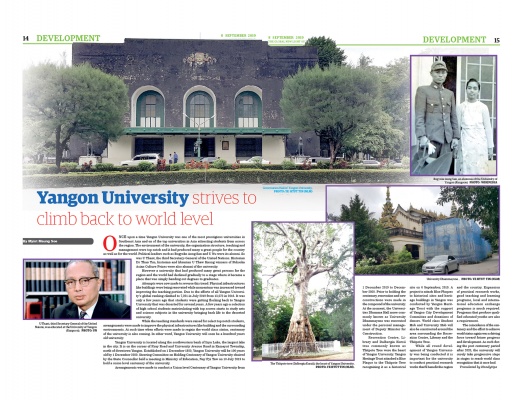
Yangon University strives to climb back to world level
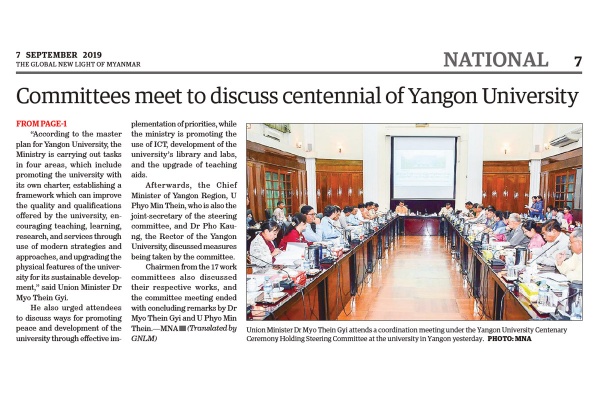
Committees meet to discuss centennial of Yangon University
Workshop on the Civil Documentation Fieldwork Research
| Place | : | Diamond Jubliee Hall, University of Yangon |
Emergence and Features of the Constitutional Review Bodies in Asia: A Comparative Analysis of Transnational Countries’ Development
| Date | : | 22nd October, 2019 |
| Time | : | 9:30 – 16:00 pm |
| Venue | : | Myanmar-Japan Legal Research Center, Chancellor Road, University of Yangon Postal Compound, Kamayut Township 11041, Yangon |
| Contact | : | 01-536628, 09448008719 |
ရန်ကုန်တက္ကသိုလ် ဝိဇ္ဇာခန်းမတွင် အောက်တိုဘာလ (၁၉) ရက်နေ့မှ (၂၀) ရက်နေ့အထိကျင်းပြုလုပ်သည့်
ရွှေတိဂုံစေတီတော်မြတ်ကြီးအား ရွှေသင်္ကန်းတော် ကပ်လှူခြင်းဆိုင်ရာ နည်းပညာ အလုပ်ရုံဆွေးနွေးပွဲ
“ကျောင်းဝင်ခွင့်မှတ်ပုံတင်ရမည့်ရက်နှင့် အပ်နှံရန် ဆောင်ရွက်ရမည့် လမ်းညွှန်ချက်များအား ဆက်လက်ကြေညာသွားမည်ဖြစ်ပါသည်။”
လျှောက်လွှာ ခေါ်ယူခြင်း
၁။ ၂၀၁၉-၂၀၂၀ ပညာသင်နှစ်အတွက် ရန်ကုန်တက္ကသိုလ်၊ ကုန်ထုတ်ဓာတုဗေဒဌာနတွင် အလှကုန်လုပ်ငန်းအတတ်ပညာ (Certificate in Cosmetic Technology) သင်တန်းကို ဖွင့်လှစ်သင်ကြားပေးမည် ဖြစ်ပါသည်။
၂။ အထက်ပါသင်တန်းကို အောက်ပါအရည်အချင်းနှင့်ပြည့်စုံသူများလျှောက်ထားနိုင်ပါသည်-
(က) တက္ကသိုလ်ဝင်တန်းအောင်လက်မှတ်ရရှိပြီးသူ ဖြစ်ရမည်။
(ခ) အစိုးရဝန်ထမ်းနှင့် အခြားလုပ်ငန်းတွင်အလုပ်လုပ်သူဖြစ်ပါက ဌာန/လုပ်ငန်းဆိုင်ရာ အကြီးအကဲ (ညွှန်ကြားရေးမှူးချုပ်/ဦးဆောင်ညွှန်ကြားရေးမှူး)က တက်ရောက်ခွင့်ပြု ကြောင်း ထောက်ခံချက် ပါရှိရမည်။
၃။ သင်တန်းစတင်ဖွင့်လှစ်မည့်ရက်မှာ (၃-၁၂-၂၀၁၉) ဖြစ်ပါသည်။ သင်တန်းကာလမှာ (၃)လ ဖြစ်ပြီး သင်တန်းချိန်မှာ (နံနက် ၇ နာရီ မှ ၉ နာရီ)အထိ ဖြစ်ပါသည်။
၄။ အသေးစိတ်အချက်အလက်များကို ကုန်ထုတ်ဓာတုဗေဒဌာန၊ ရန်ကုန်တက္ကသိုလ်တွင် စုံစမ်းနိုင် ပါသည်။
၅။ ရန်ကုန်တက္ကသိုလ်၊ ကျောင်းသားရေးရာဌာနတွင် သတ်မှတ်ထားသည့် လျှောက်လွှာပုံစံဖြင့် (၁-၁၁-၂၀၁၉ ရက် မှ ၂၂-၁၁-၂၀၁၉ ရက်နေ့)အထိ လျှောက်ထားနိုင်ပါသည်။
Waseda University Spring 2020 Application Link【01】
Spring 2020 Application Information
Application period: 1st Nov – 20th Nov 2019 (Japan time)
Online application link:
https://www6.webcas.net/form/pub/waseda/exapp202004_01
*This link will become accessible on November 1st (Japan Time)
Announcement of the result: scheduled on Jan. 31, 2020 (Japan time)
Application Instructions:
https://www.waseda.jp/inst/cie/en/exchange/application
“International Symposium on Environmental-Life Science and Nanoscales Technology 2019,”; ISENT (2019) is hosted by the Department of Physics, University of Yangon, Myanmar and co-hosted by Faculty of Science, Josai University, Japan.
The aim of the ISENT (2019) is to provide a forum for scientists and engineers from both academia and industry to exchange up-to-date ideas on current research and new applications in the field of Environmental-Life Science and Nanoscales Technology.
| Important Dates | |
|---|---|
| Abstract Submission Deadline | 30 November 2019 |
| Abstract Acceptance Notification | 12 December 2019 |
| Registration | 13-20 December 2019 |
| Full Paper Submission Deadline | 28 December 2019 |
| Registration fees | ||
|---|---|---|
| Local | Author | 100,000 MMK |
| Listener | 70,000 MMK | |
| Foreign | Author | 100 US$ |
| Listener | 100 US$ | |
Department of Physics, University of Yangon
Kamaryut, 11041, Yangon, Myanmar
Tel: +95-1536772, Fax: +95-1510721
Email: ISENT2019@gmail.com, physics@uy.edu.mm
Website: www. uy.edu.mm
Dr Min Maung Maung (Mr))
Contact Detail:
Dr Min Maung Maung is a Associate Professor, Department of Physics, University of Yangon. He received his PhD in Material Science, Department of Physics, University of Yangon, Myanmar. He was awarded his BSc (Hons) and MSc by the Mawlamyine University, Myanmar. He acts as a member of Physics Curriculum & Syllabus Committee (Basic Education). He is also a member of the Institute of Physics (IOP, UK).
Work Experience
(1) Demonstrator (14-10-1997 to 1-7-2005)
(2) Assistant Lecturer (2-7-2005 to 1-2-2010)
(3) Lecturer ( 1-2-2010 to 30-11-2016)
(4) Associate Professor ( 1-12-2016 to 30-11-2019)
(5) Professor (1-12-2019 to date)
Educational background:
1994, BSc (Hons), Mawlamyine University
1996, MSc , Mawlamyine University
2002, DCSc, University of Computer Studies, Yangon
2005, PhD, University of Yangon, Myanmar.
Membership
2012, MInstP, IOP (London, UK)
Area of Interest:
1) Materials Science (ceramics, nanotechnology, nano composites, Organic, semiconductors, glass ceramics)
2) Renewable Energy and Technology
3) Environmental Physics
ရန်ကုန်တက္ကသိုလ်တွင် ဆောင်ရွက်လျက်ရှိသော Ring Road၊ Landscaping စီမံကိန်းနှင့် အခြားဖွံ့ဖြိုးရေးလုပ်ငန်းများနှင့်ပတ်သက်၍ အဆင့်မြင့်ပညာဦးစီးဌာန၊ ရန်ကုန်တက္ကသိုလ်၊ ရန်ကုန်တက္ကသိုလ် ဆရာ၊ ဆရာမများသမဂ္ဂ၊ ရန်ကုန်တက္ကသိုလ်ကျောင်းသားများသမဂ္ဂနှင့် University of Yangon Environmental Club တို့ တွေ့ဆုံဆွေးနွေး၍ ဆက်လက်ဆောင်ရွက်မည့် လုပ်ငန်းစဉ်များနှင့် စပ်လျဉ်း၍ ကြေငြာချက်ထုတ်ပြန်လိုက်သည်။
အဆင့်မြင့်ပညာဉီးစီးဌာနအောက်ရှိ တက္ကသိုလ်များမှ ရာထူးတိုး/ပြောင်းစာရင်းများ
It is our pleasure to invite international and national scholars to the Fourth International Conference on “Transformation Processes in Myanmar IV”. The conference is jointly organised by the University of Yangon and the Centre of Excellence on Urban and Regional Development (CoE, University of Yangon/University of Cologne) in collaboration with the University of Cologne, Germany. It will take place at the University of Yangon on 7 December 2019.
The University of Yangon was established in 1920 and is the first university of Myanmar. On the occasion of its 99th Anniversary in 2019, it is the aim of the International Conference to contribute to the knowledge and exchange on current transformation processes in Myanmar. Multidisciplinary topics, approaches and perspectives will be applied in order to support a vivid exchange beyond disciplinary borders and to enhance scientific networks.
The aims of the Conference are:
Topics of sessions
Publication
In order to contribute to the discussion within the scientific community, we are planning to publish selected articles, topic-oriented ones in the reviewed Myanmar Journal of Urban and Regional Development.
Online proceeding
The selected articles will be published as online proceeding
Deadline
Deadline for the submission of presentation title: 2 December 2019.
Deadline for the submission of abstracts: 4 December 2019.
Travel and accommodation
Travel and accommodation support can unfortunately not be given, but speakers do not need to pay any conference and registration fees.
Organizing Committee
Prof. Dr. Pho Kaung, Rector, University of Yangon (Chair Person)
Prof. Dr. Omar Kyaw, Pro-Rector, University of Yangon (Member)
Prof. Dr. Frauke Kraas, Head of Department, Institute of Geography, University of Cologne (Member)
Prof. Dr. Htun Ko, Head of Department of Geography, University of Yangon (Member)
Prof. Dr. Zaw Soe Min, Professor, Department of History, University of Yangon (Member)
Prof. Dr. Thandar Aye, Professor of Botany Department, University of Yangon (Member)
Dr. Khin Khin Soe, Professor, Department of Geography, Sittwe University (Secretary)
Dr. Zin Mar Than, Research Fellow, University of Cologne and Centre of Excellence (CoE), University of Yangon (Joint Secretary)
For any enquiries regarding the programme, please contact: Dr. Khin Khin Soe (khinkhingeog.97@gmail.com).
International Conference on “Transformation Processes in Myanmar IV” 7th December 2019 Programme
Testing letter Testing letter Testing letter Testing letter Testing letter Testing letter Testing letter Testing letter Testing letter Testing letter Testing letter Testing letter Testing letter Testing letter Testing letter Testing letter Testing letter Testing letter Testing letter Testing letter Testing letter Testing letter Testing letter Testing letter Testing letter Testing letter Testing letter Testing letter Testing letter Testing letter Testing letter Testing letter Testing letter Testing letter Testing letter Testing letter Testing letter Testing letter Testing letter Testing letter Testing letter Testing letter Testing letter Testing letter Testing letter Testing letter Testing letter Testing letter Testing letter Testing letter Testing letter Testing letter Testing letter Testing letter Testing letter Testing letter Testing letter Testing letter Testing letter Testing letter Testing letter Testing letter Testing letter Testing letter Testing letter Testing letter Testing letter Testing letter Testing letter Testing letter Testing letter Testing letter Testing letter Testing letter Testing letter Testing letter Testing letter Testing letter Testing letter Testing letter Testing letter Testing letter Testing letter Testing letter Testing letter Testing letter Testing letter Testing letter Testing letter Testing letter Testing letter Testing letter Testing letter Testing letter Testing letter Testing letter Testing letter Testing letter Testing letter Testing letter Testing letter Testing letter Testing letter Testing letter Testing letter Testing letter Testing letter Testing letter Testing letter Testing letter Testing letter Testing letter Testing letter Testing letter Testing letter Testing letter Testing letter Testing letter Testing letter Testing letter Testing letter Testing letter Testing letter Testing letter Testing letter Testing letter Testing letter Testing letter Testing letter Testing letter Testing letter Testing letter Testing letter
 The Centenary Research Conference of the University of Yangon (RCCUY2020); “Sustainable Development Goals to Transform Peaceful and Prosperous Myanmar” is a leading-edge to share recent research trend, the most updated technology and experiences among academicians and community who are committed to innovation and advancement of their research fields of interest in ushering the Centenary of the University of Yangon…
The Centenary Research Conference of the University of Yangon (RCCUY2020); “Sustainable Development Goals to Transform Peaceful and Prosperous Myanmar” is a leading-edge to share recent research trend, the most updated technology and experiences among academicians and community who are committed to innovation and advancement of their research fields of interest in ushering the Centenary of the University of Yangon…| Local Participants | -Ks 20,000 |
| Foreign Participants | -USD 200 |
| Observers | -Free of Charge |
| Conference Date | -15th – 18th October 2020 |
| Full Paper submission deadline | -30th April 2020 |
| Acceptance notification | -31st August 2020 |
| Registration fee payment deadline | -30th September 2020 |
**The paper submission dead line has been extended to 30th June 2020.
The Research Conference for the Centenary of the University of Yangon (RCCUY2020) has been postponed to December 2020. The conference date will be announced in time.
The papers are now under review and the acceptance status will come out soon.
| Bank Name | –AYA Bank |
| Name of Account Owner | -University of Yangon |
| Account Number | –0134102030005487 |
| Bank Name | –AYA Bank |
| Name of Account Owner | -University of Yangon |
| Account Number | –0134202010077100 |
Click here to download the Submission Procedure (PDF)
Click here to download the Paper Template (RCCUY2020)
Email: RCCUY2020@gmail.com
Website: https://www.uy.edu.mm/events/
ရန်ကုန်တက္ကသိုလ် ရာပြည့် အမှတ်သညာ ပွဲတော် အစီအစဉ်
University of Yangon Open History Project Agenda
1st December, 2019
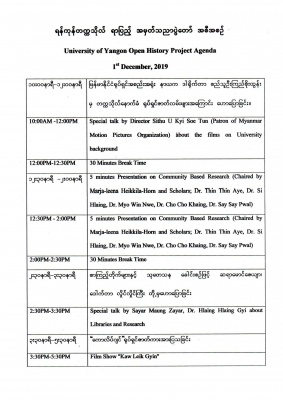
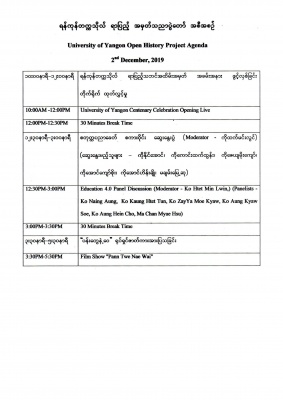
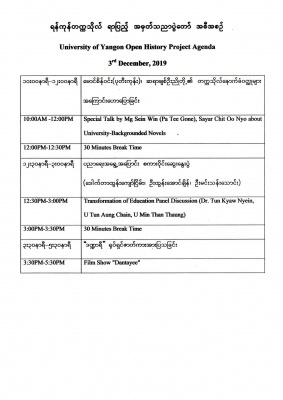
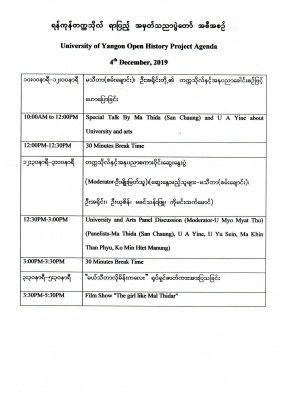
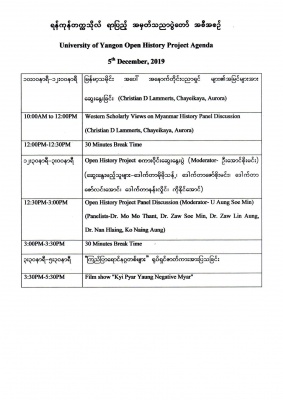
ရန်ကုန်တက္ကသိုလ် ရာပြည့်အကြို အထိမ်းအမှတ် ရန်ကုန်တက္ကသိုလ် စာကြည့်တိုက် စာအုပ်ပြပွဲနှင့် စာအုပ်စျေးရောင်းပွဲတော် ၅-၁၂-၂၀၁၉ မှ ၈-၁၂-၂၀၁၉ ထိ
Purdue University Fort Wayne နှင့် ရန်ကုန်တက္ကသိုလ်၊ အင်္ဂလိပ်ဘာသာစကား အမျိုးသားဗဟိုဌာနတို့အကြား နားလည်မှုစာချွန်လွှာ လက်မှတ်ရေးထိုးပွဲ ကျင်းပစဉ်
This is UY Centenary test for Sidebar.
The International Cooperation Office (ICO) of the University of Yangon was officially opened by the EU Ambassador to Myanmar, Mr Kristian Schmidt, and UY Rector Dr Pho Kaung on Friday 10th January 2020.
The ICO was established in December 2017 and is led by the Pro Rector for Academic Affairs, Dr Omar Kyaw, and a team of academic staff who work part-time in the ICO to support the University’s international engagement. The ICO recently received a donation of IT equipment under the Chinlone project, co-funded by the Erasmus + programme of the European Union. The University has refurbished two offices in the Arts Hall for the ICO.
The ceremony was attended by Associate Professor Antonio Fiori, Department of Political and Social Sciences, University of Bologna, who leads the Chinlone project, representatives of the Chinlone European partners, Uppsala and Vilnius universities, heads of departments at UY and the ICO team.
ရန်ကုန်တက္ကသိုလ်၊ ဝိဇ္ဇာခန်းမ၌ ၆-၂-၂၀၂၀ ရက်နေ့ နံနက် (၉:၀၀) နာရီတွင် ရန်ကုန်တက္ကသိုလ် ရာပြည့်ကိုဂုဏ်ပြု၍ကျင်းပသော IT နည်းပညာဆိုင်ရာ ဟောပြောပွဲနှင့် စကားဝိုင်းဆွေးနွေးပွဲသို့ ဌာနဆိုင်ရာအကြီးအကဲများ၊ ပါမောက္ခချုပ်များ၊ ကျောင်းအုပ်ကြီးများ၊ ဆရာ၊ဆရာမများ၊ ကျောင်းသူကျောင်းသားများနှင့် အထူးဖိတ်ကြားထားသော ဧည့်သည်တော်ကြီးများ တက်ရောက်ကြပါသည်။
Industrial Chemistry departments from the University of Yangon, Mandalay University, Dagon University, East Yangon University, West Yangon University, and Yadanabon University are planning to conduct the Centenary Celebrations of the University of Yangon and invite all students (undergraduate) from Industrial Chemistry to participate in Quiz Bowl and Business Model Project Competition-2020.
Event Periods: October – December 2020
| Eligible Applicants:
|
Theme Compositions:
|
||
| ICQB-2020: | Level I – 1st year and 2nd year;
Level II – 3rd year and above |
ICQB-2020: | Core and Allied Industrial Chemistry Courses |
| ICBMPC-2020: | Undergraduate students or freshly graduated students in the year 2018 and 2019 | ICBMPC-2020: | Applied Fields of Food/ Cosmetics/Pharmaceutical/Herbal Products; Applied Science |
Handsome cash prizes and certificates will be awarded to the Winners.
၁။ ရန်ကုန်တက္ကသိုလ် ပရဝဏ်ရှိ ရတနာဆောင်ဝင်းအတွင်း သစ်ပင်ပန်းပင်များ စိမ်းလန်းစိုပြည်ရေး ဆိုင်ရာ ထိန်းသိမ်းခြင်းအတွက် မြက်ပေါင်းများ ရိတ်ခြင်း၊ ခုတ်ခြင်း၊ ပုံသွင်းခြင်း၊ လှဲကျင်းခြင်း၊ ရေလောင်းခြင်း၊ အမှိုက်များလှဲခြင်း၊ အမှိုက်များကို အမှိုက်ကားဖြင့် စွန့်ပစ်ခြင်း၊ မြက်ကွက်နေသော နေရာများတွင် မြက်များ အစားထိုးစိုက်ခြင်း၊ ပန်းအလှပြုပြင်ခြင်း၊ ရေမြောင်းတွင်း အမှိုက်များ ရှင်းလင်းခြင်း၊ အပင်များဖြတ်ခြင်း၊ ညှပ်ခြင်း၊ ပုံသွင်းခြင်းများ ဆောင်ရွက်ရန် မြန်မာနိုင်ငံသား လုပ်ငန်းရှင်များအား ဖိတ်ခေါ်ပါသည်။
၂။ အဆိုပါလုပ်ငန်းများဆောင်ရွက်လိုသော လုပ်ငန်းရှင်များအနေဖြင့် ရန်ကုန်တက္ကသိုလ် စီမံရေးရာ ဌာနတွင် လျှောက်လွှာပုံစံများကို (၁)စောင်လျှင်၂၀၀၀/-ကျပ်နှုန်းဖြင့် လာရောက်ဝယ်ယူ လျှောက်ထား နိုင်ပါသည်။မိမိဆောင်ရွက်မည့် စျေးနှုန်းကိုပါ တစ်ပါတည်း ရေးသွင်း တင်ပြပေးရမည် ဖြစ်ပါသည်။
(က) တင်ဒါ စတင်ရောင်းချမည့်နေ့ ( ၁၁. ၂ .၂၀၂၀ )ရက် နံနက် (၉;၃၀)နာရီ
(ခ) တင်ဒါ ပိတ်မည့်နေ့ ( ၂၅ . ၂ .၂၀၂၀ )ရက် မွန်းလွဲ (၂;၀၀)နာရီ
(ဂ) တင်ဒါ ဖွင့်မည့်နေ့ ( ၂၇ . ၂ .၂၀၂၀ )ရက် မွန်းလွဲ (၂;၀၀)နာရီ
၁။ ရန်ကုန်တက္ကသိုလ်၊ အဓိပတိလမ်းဝဲ/ယာနှင့် ဘွဲ့နှင်းသဘင်လမ်းဝဲ/ယာရှိ ရိတ်ထားသော ၊ ခုတ်ထားသော မြက်ပေါင်းများ လှဲကျင်းခြင်း၊ ရေလောင်းခြင်း၊ အမှိုက်များလှဲခြင်း၊ အမှိုက်များစွန့်ပစ်ခြင်း၊ မြက်ကွက်နေသော နေရာများတွင် မြက်များအစားထိုးစိုက်ခြင်း၊ ရေမြောင်းတွင်း အမှိုက်များရှင်းလင်းခြင်း၊ အပင်များဖြတ်ခြင်း၊ ညှပ်ခြင်း၊ ပုံသွင်းခြင်းများ ဆောင်ရွက်ရန်အတွက် မြန်မာနိုင်ငံသား လုပ်ငန်းရှင်များ အား ဖိတ်ခေါ်ပါသည်။
၂။ အဆိုပါလုပ်ငန်းများဆောင်ရွက်လိုသော လုပ်ငန်းရှင်များအနေဖြင့် ရန်ကုန်တက္ကသိုလ် စီမံရေးရာ ဌာနတွင် လျှောက်လွှာပုံစံများကို (၁)စောင်လျှင်၂၀၀၀/-ကျပ်နှုန်းဖြင့် လာရောက်ဝယ်ယူ လျှောက်ထား နိုင်ပါသည်။မိမိဆောင်ရွက်မည့် စျေးနှုန်းကိုပါ တစ်ပါတည်း ရေးသွင်း တင်ပြပေးရမည် ဖြစ်ပါသည်။
(က) တင်ဒါ စတင်ရောင်းချမည့်နေ့ ( ၁၈. ၂ .၂၀၂၀ )ရက် နံနက် (၉;၃၀)နာရီ
(ခ) တင်ဒါ ပိတ်မည့်နေ့ ( ၂၆. ၂ .၂၀၂၀ )ရက် မွန်းလွဲ (၂;၀၀)နာရီ
(ဂ) တင်ဒါ ဖွင့်မည့်နေ့ ( ၂၇. ၂ .၂၀၂၀ )ရက် မွန်းလွဲ (၂;၀၀)နာရီ
Mr William Schabas, professor of international law at Middlesex University, UK, and professor of international human laws and human rights at Leiden University in the Netherlands, gave a lecture on the experiences at the International Court of Justice (ICJ) and on international law at Yangon University.
Also attending the lectures were 160 officials, including Union Minister for Office of the State Counsellor U Kyaw Tint Swe, Union Minister for Education Dr Myo Thein Gyi, Deputy Minister U Min Lwin, officials from the Ministry of Foreign Affairs, Ministry of Office of the State Counsellor and Myanmar Institute of Strategic and International Studies, faculties from Yangon University, Yangon University of Distance Education, Dagon University, East Yangon University, West Yangon University and Yangon University of Foreign Languages, and officials from Yangon Region government, Myanmar National Human Rights Commission, International Court Legal Aid Organization. In addition, 985 law students were also in attendance. Union Minister Dr Myo Thein Gyi delivered the opening speech at the event and introduced Prof Schabas to the audience before the talk. The two experts answered questions from the audience.
In the afternoon, Dr Christopher Staker, member of the Bar of England and Wales, gave a lecture on legal matters at Yangon University.
Lecturer Dr Khin Ei Ei Thein
PhD in Chemistry, University of Yangon, Myanmar
Publications:
၁။ ရန်ကုန်တက္ကသိုလ်၊ ၂၀၂၀ ပြည့်နှစ် မတ်လ ၁၈ ရက်နေ့တွင် စတင်ပြုလုပ်မည့် စာမေးပွဲအားဖြေဆိုမည့် ကျောင်းသား/သူများသည် ဖြေဆိုရမည့်ဘာသာရပ်များ အားလုံး ပြီးဆုံးအောင် ဖြေဆိုရမည်ဖြစ်ပြီး စာမေးပွဲ စည်းမျဉ်း အရဆောင်ရွက်မည် ဖြစ်သည်။
၂။ COVID-19 ကို စိုးရိမ်၍ ဖြေဆိုလိုခြင်း မရှိပါက ၂၀၂၀ ခုနှစ် ဇွန်လဆန်းတွင် အစားထိုး စာမေးပွဲကို ကျင်းပပြုလုပ်ပေးမည် ဖြစ်ပါသည်။
၃။ အစားထိုးဖြေဆိုမည့်သူများသည် ယနေ့မှ စတင်သော စာမေးပွဲတွင် ဖြေဆိုရမည့် ဘာသာရပ်များအားလုံးကို ဝင်ရောက်ဖြေဆိုခြင်း မပြုရန် အသိပေးကြေညာ လိုက်သည်။

University of Yangon is hosting the annual Regional Conference Program of ASEAN University Network/Southeast Asia Engineering Education Development Network (JICA Project for AUN/SEED-Net). In ushering the Centenary of the University of Yangon, the Regional Conference is hosted as a synergy event on Geological and Geo-resources Engineering and Natural Disaster, aiming to share current research trends and challenges, updated technology and experiences among researchers and industry practitioners working on both fields.
We, Department of Geology, University of Yangon, invites scientists and engineers in the ASEAN region including member Institutions (MIs) and Japanese Supporting Universities (JSUs) to join this AUN/SEED-Net Regional Synergy Conference. This conference provides an opportunity to present and discuss progress and outcomes obtained from several researches of the member universities, the latest issues and solutions for sustainable development in ASEAN. Furthermore, the conference can strengthen the research network among geoscientists from ASEAN universities, government institutions, industries and communities.
Based on the current situation of COVID-19, the conference tends to be hosted as Local participants by onsite participation in the event and the international participants via online platform.
Enhancing the capacity and technology advancement in Disaster Risk Reduction and Geo-resource Engineering for Sustainable development in ASEAN
| Venue date: | February 4-6, 2021 |
| Extended Abstract Submission Deadline: | November 20, 2020 (Extension) |
| Acceptance notification : | November 25, 2020 |
| Full paper submission: | December 10, 2020. |
| Registration deadline: | December 5, 2020 |
| Participants (International) | 250 USD |
| Student (International) | 150 USD |
| Participants (Local) | 60,000 Kyats |
| Universities/Governmental Staff/MGS/MEC/MES | 20,000 Kyats |
| Students (Local) | Free |
The registration fee will cover for the participation of the conference, lunch and tea breaks, conference kits and accessories.
Note: The AUN/SEED-Net sponsored participants are required to submit full paper to be published with ASEAN Engineering Journal (AEJ) within 1 year after the RC. This paper must not be published anywhere else with ISBN/ISSN, including conference proceedings. Failure to complete the submission, he/she will be temporarily suspended from receiving the future RC sponsorship.
Click here to download Schedule_RCGeoE&RCND2020_Feb 4-6
| Email: | uyrcgeoe@uy.edu.mm for GeoE uyrcnd@uy.edu.mm for ND |
| Mobile: | 95-9-250074719; 95-9-683987387 |

![]()



First Year BSc Honours(Semester I)
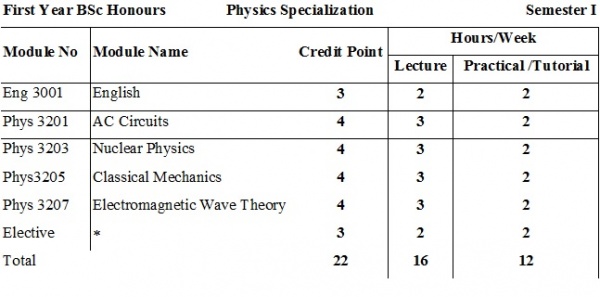
Total Credits – 22: Total hours – 28
*A student can choose any one elective offered from the Department of Mathematics and Physics to fulfill total of 22 credits. Phys 3209 or Math 3001 is assigned as elective.
First Year BSc Honours(Semester II)
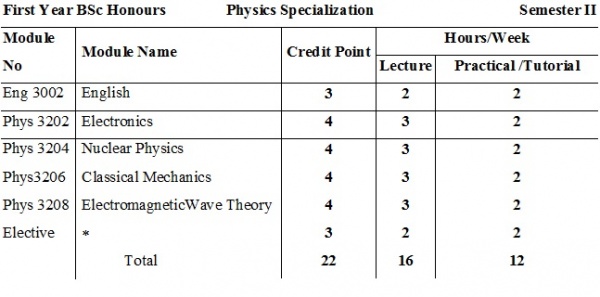
Total Credits – 22: Total hours – 28
*A student can choose any one elective offered from the Department of Mathematics and Physics to fulfill total of 22 credits. Phys 3210 or Math 3003 is assigned as elective .
Second Year BSc Honours(Semester I)
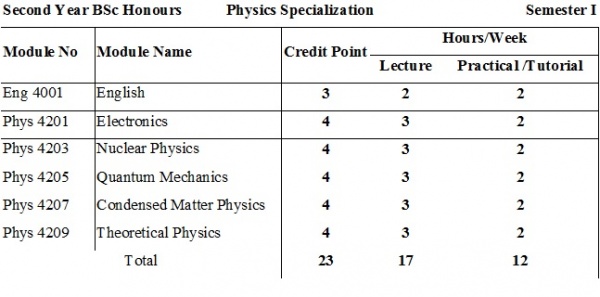
Total Credits – 23: Total hours – 29
*A student can choose Physics to fulfill total of 23 credits.
Second Year BSc Honours (Semester II)
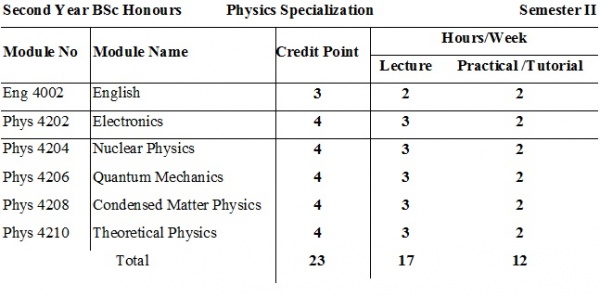
Total Credits – 23: Total hours – 29
*A student can choose Physics to fulfill total of 23 credits.
Third Yea BSc Honour (Semester I)
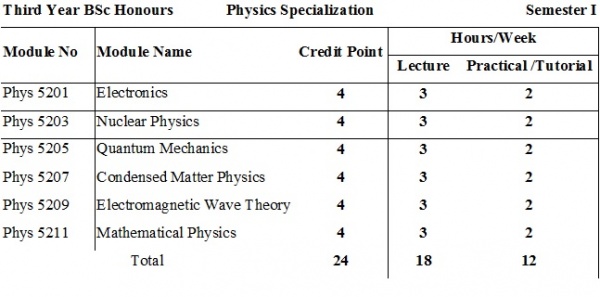
Total Credits – 24: Total hours – 30
*A student can choose Physics to fulfill total of 24 credits.
Third Yea BSc Honour (Semester II)
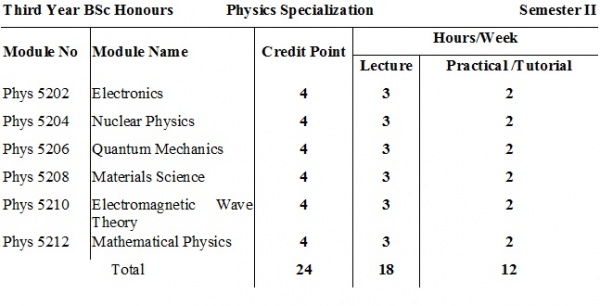
Total Credits – 24: Total hours – 30
*A student can choose Physics to fulfill total of 24 credits. Term/ Project paper must be submitted by each group not more than 10 students in Third Year Honours Second Semester. Group paper presentation must be included.
MSc Qualifying(Semester I)
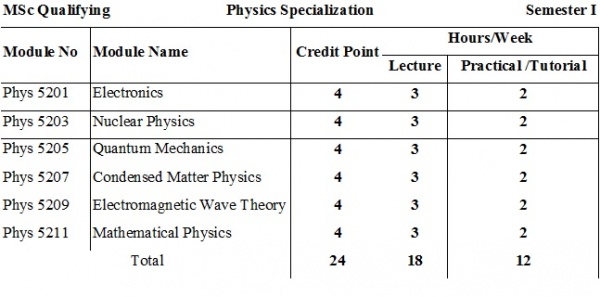
Total Credits – 24: Total hours – 30
MSc Qualifying(Semester II)
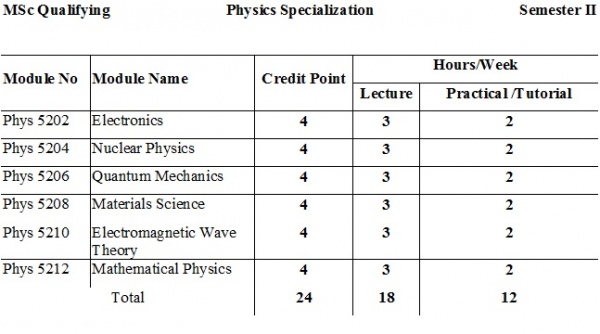
MSc Qualifying (Semester I)

Total Credits – 24: Total hours – 30
MSc Qualifying (Semester II)
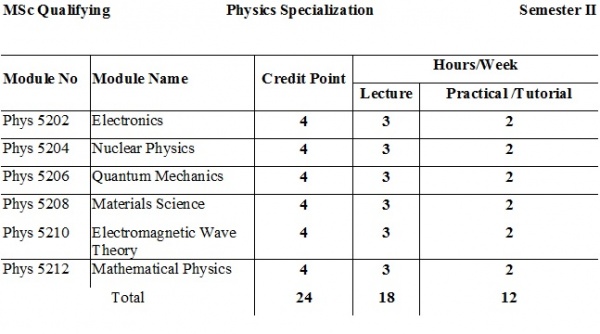
MSc First Year (Semester I)

MSc First Year (Semester II)
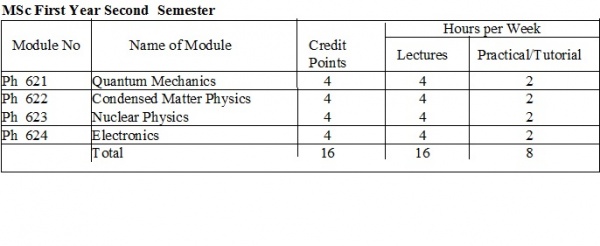
MSc Second Year (Semester I)

MSc Second Year (Semester II)

ရန်ကုန်တက္ကသိုလ်စာကြည့်တိုက် ၏ online ဝန်ဆောင်မှု
https://www.uy.edu.mm/e-library/
ကျောင်းသား/ကျောင်းသူ၊ ဆရာ/ဆရာမများနှင့် သုတေသီများရှင့်
ရန်ကုန်တက္ကသိုလ်စာကြည့်တိုက်(UYL)တွင် စုဆောင်းထားရှိသော အင်္ဂလိပ်၊ မြန်မာ စာအုပ်များနှင့် eResource database များကို မိမိတို့နေအိမ်မှ UY website (https://www. uy.edu.mm/) မှတဆင့် UYLibrary (https://www.uy.edu.mm/e-library/) တွင် ရှာဖွေ နိုင်ပါသည်။ ထိုသို့ရှာဖွေရာတွင် လိုအပ်သောစာအုပ်များကို UYLibrary ရှိ Online Catalogue မှ စာရေးသူအမည်၊ စာအုပ်အမည်၊ ပညာရပ်အမည်တို့ဖြင့် အလွယ်အကူ အင်္ဂလိပ်၊ မြန်မာစာအုပ်များ ကိုလည်းရှာဖွေနိုင်ပါသည်။
Database A-Z အောက်တွင် eRsource database များမှ မိမိတို့လိုအပ်သော ebook များနှင့် article များကိုလည်း ရှာဖွေနိုင်ပါသည်။ စာငှားကောင်တာမှ ငှားရမ်းထားသော စာအုပ်များကို စာငှားရက်ထပ်တိုးခြင်း (renew) ပြုလုပ်လိုပါက email, တယ်လီဖုန်းမှ တစ်ဆင့် ပြုလုပ်နိုင်ပါသည်။
ရန်ကုန်တက္ကသိုလ်၏ Repository (uyr.uy.edu.mm) တွင် လွှင့်တင်ထားသော ပြည်တွင်း ပြည်ပသုတေသနစာစောင်များနှင့် ကျမ်းများ၏ အနှစ်ချုပ်တို့ကို pdf full-text versions ဖြင့် download ချ၍ ဖတ်ရှုနိုင်ပါသည်။
သုတ−ရသစာအုပ်များကို အသစ်ငှားရမ်းလိုပါက UYLibrary ရှိ Online Catalogue ၏ https://www.uy.edu.mm/e-library/မှ ငှားရမ်းလိုသော စာအုပ်၏ Call number (Class number, Author initial နှင့် Accession number) တို့ကို မှတ်သား၍ email, တယ်လီဖုန်းမှတစ်ဆင့် ကြိုတင်အကြောင်းကြားပြီး သတ်မှတ်သောရက်တွင် လာရောက် ငှားရမ်းနိုင်ကြောင်း အသိပေး¬အကြောင်းကြား အပ်ပါသည်။
တက္ကသိုလ် ဆရာ၊ ဆရာမများအတွက် အင်္ဂလိပ်စာသင်တန်းကိုအွန်လိုင်းစနစ်ဖြင့် အင်္ဂလိပ်ဘာသာ စကားအမျိုးသားဗဟိုဌာနနှင့် ရန်ကုန်တက္ကသိုလ်၊ အင်္ဂလိပ်စာဌာနတို့ကပူးပေါင်း၍ ၂၀၂၀ပြည့်နှစ် မေလ (၄)ရက်နေ့မှ (၂၉)ရက်နေ့အထိ ပထမဆုံးပို့ချလျက်ရှိပါသည်။
သင်တန်းကို ရန်ကုန်တက္ကသိုလ်တွင် ၂၀၁၅ခုနှစ်နှင့် ၎င်းနှစ်နောက်ပိုင်းတွင် ခန့်အပ်သော အင်္ဂလိပ်စာဘာသာရပ် ဆရာဆရာမများမှအပ ကျန်ဘာသာရပ် (၂၁)ခုမှ ဆရာ၊ဆရာမ (၉၁)ဦး တက်ရောက်လျက်ရှိပါသည်။
၎င်းသင်တန်းကို တက္ကသိုလ်ဆရာ၊ ဆရာမများ၏ ဘာသာစကား စွမ်းရည်မြှင့်တင်ပေးရန်၊ Presentation များကို ထိရောက်စွာဆောင်ရွက်နိုင်စေရန်၊ Presentation များ၊ Workshop များ၊ Seminar များတွင် ကောင်းမွန်စွာ ပါဝင်ဆွေးနွေးနိုင်စေရန်၊ စာသင်ခန်းသုံးဘာသာစကား အသုံးပြု၍ စာသင်ခန်းကိုစီမံခန့်ခွဲတတ်စေရန်၊ ဆန်းစစ်နည်းမျိုးစုံဖြင့် ရင်းနှီးကျွမ်းဝင်မှုရှိစေရန် စသည့် ရည်ရွယ်ချက်များဖြင့် ပို့ချခြင်းဖြစ်ပါသည်။
သင်တန်းတွင် သင်တန်းသားများကို အခန်း(၄)ခန်းခွဲ ကာသင်ကြားပြီး သင်တန်းသားများကို ကျောင်းသားဗဟိုပြုအပြန်အလှန်ဆွေးနွေးသည့် နည်းစနစ်ဖြင့် သင်ကြားပို့ချပါသည်။
သင်တန်းသားများအား သင်တန်း မစတင်မီလိုအပ်သော ညွှန်ကြားချက်များကို အီးလ်မေးဖြင့် ကြိုတင် ပေးပို့ပြီး သင်တန်းအကြိုသိသင့်သည်များကို Orientation(၄)ကြိမ်ခွဲ၍ ပို့ချခဲ့ပါသည်။
သင်တန်းသည် (၄)ပတ်ကြာမြှင့်မည်ဖြစ်ပြီး Microsoft Teams Application ကိုအသုံးပြု၍ သင်ကြား ပို့ချခြင်းဖြစ်ပါသည်။
သင်တန်းသားများသည် နေ့စဉ် (တနင်္လာနေ့မှ သောကြာနေ့အထိ) တစ်နေ့လျှင် (၃)နာရီကြာ အွန်လိုင်းရှိစာသင်ခန်းတွင် အခြားသင်တန်းသားများ နှင့်အတူ ပူးပေါင်းလေ့လာသင်ယူခွင့် ရရှိ ပါသည်။ ထို့အပြင် နှစ်ဦးတွဲ၊ အဖွဲ့လိုက် လေ့ကျင့်ခန်းများဆောင်ရွက်ခြင်း၊ ဆွေးနွေးခြင်း၊ Quiz များဖြေဆိုခြင်းတို့ကိုလုပ်ဆောင်စေမည်ဖြစ်ပြီး အခြားအွန်လိုင်းတွင်ရနိုင်သော Digital Resources ကိုအသုံးပြုပြီး မိမိကိုယ်တိုင်လေ့ကျင့်မှုများလည်း ပြုလုပ်စေမည် ဖြစ်ပါသည်။
သင်တန်းကိုအောင်မြင် ပြီးမြောက်ပြီး လိုအပ်သောအရည်အချင်းပြည့်မီသည့် သင်တန်းသားများအား သင်တန်းဆင်းလက်မှတ်များချီးမြှင့်မည်ဖြစ်ပါသည်။
နောင်တွင် ပညာရေးဝန်ကြီးဌာနလက်အောက်ရှိ တက္ကသိုလ်၊ ဒီဂရီကောလိပ်၊ ကောလိပ်များရှိ အင်္ဂလိပ်စာဆရာ၊ဆရာမ မဟုတ်သည့် ဆရာ၊ဆရာမများအတွက် အလားတူ အွန်လိုင်းသင်တန်းများ ကိုဆက်လက် ပို့ချသွားမည်ဖြစ်ပါသည်။
The first online English Language Course for Higher Education Teachers (1/2020) is being jointly offered by the National Centre for English Language and English Department, University of Yangon from 4thto 29thMay 2020.
It is offered for non-English teachers appointed in 2015 and beyond at the University of Yangon and altogether 91 faculty members from 21 disciplines are attending the course.
The course aims to upgrade the language proficiency of the university teachers; to train them to be able to do presentations effectively and participate in presentations, workshops, and seminars; to acquaint them with classroom language and management; to familiarize them with different modes of assessment.
During the training, the trainees are formed into four different sections in which they are engaged in their learning through the student-centred interactive approach.
The trainees are given guidelines for the online course via email in advance before the course and orientation was provided to participants in four different sessions.
The training is a four-week course conducted by using the Microsoft Teams Application. Trainees will have an opportunity to do collaborative learning with their peers in the virtual classroom for three hours a day. Moreover, trainees are assigned to do pair work and group work activities, discussions, quizzes and are given loads of digital resources for their self-learning.
Participants who have successfully completed the course and who have fulfilled the requirements of the course will be awarded certificates.
More online training courses will continue to be offered in the future for non-English teachers from universities, degree colleges, and colleges under the Ministry of Education.
၁။ ၂၀၁၉-၂၀၂၀ ဘဏ္ဍာရေးနှစ်အတွက် ရန်ကုန်တိုင်းဒေသကြီး၊ ရန်ကုန်တက္ကသိုလ်တွင် အောက်ဖော်ပြပါ တည်ဆောက်ရေးလုပ်ငန်းများ ဆောင်ရွက်ရန်ရှိပါသဖြင့် မြန်မာနိုင်ငံသား လုပ် ငန်းရှင်များထံမှ အိတ်ဖွင့်တင်ဒါတင်သွင်းရန် ဖိတ်ခေါ်အပ်ပါသည် –
| လုပ်ငန်းတည်နေရာ | စဉ် | လုပ်ငန်းအမည် |
| ရန်ကုန်တက္ကသိုလ်၊ ရိုးမရိပ်သာ၊ ကမာရွတ်မြို့နယ် | ၁ | (၄) ခန်းတွဲ(၄) ထပ်ဝန်ထမ်းအိမ်ယာ(၁)လုံး တည် ဆောက်ခြင်း(98'x64') RC (မြို့ပြ၊ ရေသန့်၊ လျှပ်စစ်) (၂၅၀၈၈ စပေ ) |
| ရန်ကုန်တက္ကသိုလ်၊ တိုးကြောင်ကလေး ငါးမွေးမြူရေးစခန်း၊ အရှေ့ဒဂုံမြို့နယ် | ၂ | RC (၂)ထပ် စာသင်ဆောင် (၁)လုံး တည်ဆောက် ခြင်း (မြို့ပြ၊ ရေသန့်၊ လျှပ်စစ်)(156'x38')(၁၁၈၅၆ စပေ) |
| ရန်ကုန်တက္ကသိုလ်၊ တိုးကြောင်ကလေး ငါးမွေးမြူရေးစခန်း၊ အရှေ့ဒဂုံမြို့နယ် | ၃ | RC (၁)ထပ်၊ (၄)ခန်းတွဲ ဝန်ထမ်းအိမ်(၁)လုံး တည် ဆောက်ခြင်း ( မြို့ပြ၊ ရေသန့်၊ လျှပ်စစ် ) ( 60'x30' ) ( ၁၈၀၀ စပေ ) |
| ရန်ကုန်တက္ကသိုလ်၊ တိုးကြောင်ကလေး ငါးမွေးမြူရေးစခန်း၊ အရှေ့ဒဂုံမြို့နယ် | ၄ | 200 KVA Transformer နှင့် ဆက်စပ်ပစ္စည်းများ တပ်ဆင်ခြင်း ( HT, LT Line အပါအ၀င် ) |
| ရန်ကုန်တက္ကသိုလ်၊ တိုးကြောင်ကလေး ငါးမွေးမြူရေးစခန်း၊ အရှေ့ဒဂုံမြို့နယ် | ၅ | ပြင်ပရေသန့်လုပ်ငန်း |
၂။ အိတ်ဖွင့်တင်ဒါပုံစံနှင့် စည်းကမ်းချက်များကို ၂၁-၅-၂၀၂၀ ရက်နေ့မှစတင်၍ ရောင်းချ မည်ဖြစ်ပြီး၊ အိတ်ဖွင့်တင်ဒါများကို ၂၂-၆-၂၀၂၀ ရက်နေ့၊ (၁၆:၀၀) နာရီ နောက်ဆုံးထား၍ တင်သွင်း ရမည်ဖြစ်ပါသည်။
၃။ အိတ်ဖွင့်တင်ဒါတင်သွင်းလိုသူသည် မိမိတင်သွင်းလိုသည့် လုပ်ငန်းအတွက် သတ်မှတ်တင်ဒါ အာမခံကြေးကို အိတ်ဖွင့်တင်ဒါတင်သွင်းရမည့် ရန်ကုန်တက္ကသိုလ်၊ ဘဏ္ဍာဌာနတွင် ကျသင့်ငွေ ပေးသွင်းပြီး၊ ငွေသွင်းပြေစာမိတ္တူကို သတ်မှတ်အိတ်ဖွင့်တင်ဒါပုံစံနှင့်အတူ ပူးတွဲ၍တင်သွင်းရမည်။ လုပ်ငန်းတစ်ခုထက်ပိုမို၍ တင်ဒါတင်သွင်းလိုပါက မိမိတင်သွင်းလိုသည့် လုပ်ငန်းအမျိုးအစား တစ်ခုစီအတွက် တင်ဒါအာမခံကြေးကို သီးခြားစီပေးသွင်းပြီး၊ သတ်မှတ်အိတ်ဖွင့်တင်ဒါပုံစံနှင့် တစ်ခုချင်းစီ တင်သွင်းရမည် ဖြစ်ပါသည်။
၄။ အိတ်ဖွင့်တင်ဒါနှင့်သက်ဆိုင်သည့် အသေးစိတ်သိရှိလိုသောအချက်များကို ဖုန်းနံပါတ် – ၀၁-၅၃၄၄၈၉ သို့ ရုံးချိန်အတွင်း ဆက်သွယ်မေးမြန်း စုံစမ်းနိုင်ပါသည်။
တင်ဒါကော်မတီ
| Name | : | Dr. Seinn Lei Aye |
| Position | : | Professor and Head of Department |
| Contact | : | s einnlei2006@gmail.com, seinnleiaye@uy.edu.mm
+95 9515 4143 |
Education:
Research Fellowship:
Research Interest:
Publications:
Award Achieved:
ရန်ကုန်တက္ကသိုလ် ၂၀၁၉-၂၀၂၀ ဘဏ္ဍာရေးနှစ်အတွင်း အောက်ဖော်ပြပါ ပြင်ဆင် ထိန်းသိမ်းရေးဆိုင်ရာ လုပ်ငန်းများ ဆောင်ရွက်လိုပါသဖြင့် စိတ်ပါဝင်စားသော လုပ်ငန်းရှင်များသည် တင်ဒါပုံစံတစ်စောင်လျှင် သတ်မှတ်ထားသော နှုန်းထားဖြင့် ဘဏ္ဍာဌာနသို့ ပေးသွင်း၍ ဝယ်ယူနိုင် ပါသည်။ တင်ဒါပုံစံများကို ( ၁၀.၇.၂၀၂၀ )နေ့တွင် စတင်ရောင်းချမည်ဖြစ်ပြီး ( ၂၄.၇.၂၀၂၀ )ရက်နေ့၊ မနက်( ၉:၃၀ )နာရီမှ ညနေ( ၄:၃၀ ) နာရီနောက်ဆုံးထား၍ တင်ဒါတင်သွင်းကြပါရန် ကြေညာ အပ်ပါသည်-
ဖော်ပြရန် စာရွက်စာတမ်းများ
(၁) ဆောင်ရွက်ခဲ့သည့် လုပ်ငန်းအတွေ့အကြုံ စာရွက်စာတမ်းများ
(၂) လုပ်ငန်းရှင်၏ကိုယ်ရေးအချက်အလက်အပြည့်အစုံ
(၃) ပြစ်မှုကင်းရှင်းကြောင်း သက်ဆိုင်ရာမြို့နယ်ထောက်ခံချက်
ဆောင်ရွက်လိုသောလုပ်ငန်းများမှာ –
(၁) ရန်ကုန်တက္ကသိုလ်အတွင်းရှိ ဒဂုံဆောင်( ယာ )လမ်း ကျောက်ကတ္တရာဖြင့် လမ်း သား ပြုပြင်ပြီး ကတ္တရာ ကွန်ကရိ ခင်းခြင်း လုပ်ငန်း
(၂) ရန်ကုန်တက္ကသိုလ် သထုံလမ်း တင်းနစ်ကွင်း အမှတ်( ၄ ) ( ၅ ) ( ၆ ) နှင့် တင်းနစ် ကွင်း အမှတ် ( ၇ ) ( ၈ ) ( ၉ )တို့ကို ကာရံထားသည့် ပျက်စီးနေသော အုတ်နံရံကြီး အား ဖျက်သိမ်းပြီး နံရံအသစ် ပြုပြင်ခြင်း လုပ်ငန်း( 165′-0″x 8′-6″ )
(၃) ရန်ကုန်တက္ကသိုလ်၊ သထုံဆောင်ရှေ့ ခြံစည်းရိုး ပြုပြင်ခြင်း လုပ်ငန်း
(၄) ရန်ကုန်တက္ကသိုလ်၊ ဝိဇ္ဇာဆောင် လုံခြုံရေး မီးနှင့် လျှောက်လမ်း မီးများ ပြုပြင်ခြင်း လုပ်ငန်း
(၅) ရန်ကုန်တက္ကသိုလ်၊ သိပ္ပံဆောင် လုံခြုံရေး မီးနှင့် လျှောက်လမ်း မီးများ ပြုပြင်ခြင်း လုပ်ငန်း
(၆) ရန်ကုန်တက္ကသိုလ်၊ ဘွဲ့နှင်းသဘင် အဆောက်အဦအတွင်း နံရံများ ရေဆေး၊ ဆီ ဆေး သုတ်ခြင်းနှင့် ခန်းမကြီး၊ စင်မြင့် ပေါ်လစ်တင်ခြင်း လုပ်ငန်း
(၇) ရန်ကုန်တက္ကသိုလ်၊ ကျောင်းသား/ကျောင်းသူ အိပ်ဆောင် (၁၀)ဆောင်တွင် Net work ပြုပြင်ခြင်း လုပ်ငန်း
(၈) ရန်ကုန်တက္ကသိုလ်၊ လှိုင်နယ်မြေတွင် Network ပြုပြင်ခြင်း လုပ်ငန်း
အသေးစိတ် အချက်အလက်များကို ရန်ကုန်တက္ကသိုလ်၊ အင်ဂျင်နီယာဌာနသို့ လူကိုယ်တိုင် ဖြစ်စေ တယ်လီဖုန်းအမှတ် ၀၁၇-၅၃၄၄၈၉ သို့ ရုံးချိန်အတွင်း စုံစမ်းမေးမြန်း ဝယ်ယူနိုင်ပါသည်။
တင်သွင်းလာသော တင်ဒါလျှောက်လွှာများကို တင်ဒါစိစစ် ရွေးချယ်ရေးအဖွဲ့သို့ တင်သွင်း ရမည်။ စည်းကမ်းချက်နှင့် မကိုက်ညီသော တင်သွင်းလွှာများကို လက်ခံစဉ်းစားမည်မဟုတ်ပါ။ တင်သွင်း လာသည့် မည်သည့် အဆိုပြုလွှာကိုမဆို လုပ်ငန်းစဉ်တင်ပြမှုများအပေါ် အခြေခံ၍ စဉ်းစားမည် ဖြစ်ပါသည်။
တင်ဒါရွေးချယ်မည့် အချိန်အား ပြန်လည် ကြေညာသွားပါမည်။
၁။ ရန်ကုန်တက္ကသိုလ်(လှိုင်နယ်မြေ)၊ ကေတုမတီဆောင်တွင် လုံခြုံရေးလုပ်ငန်း ဆောင်ရွက်ရန် အတွက် စိတ်ပါဝင်စားသော မြန်မာနိုင်ငံသားလုပ်ငန်းရှင်များအား အိတ်ဖွင့်တင်ဒါ ပုံစံနှင့် စည်းကမ်း သတ်မှတ်ချက် တစ်စုံလျှင်(၂၀၀၀/-) ကျပ်နှုန်းဖြင့် ရန်ကုန်တက္ကသိုလ် ငွေလက်ခံဌာန၌ ငွေသွင်း၍ စီမံရေးရာဌာနတွင် အိတ်ဖွင့်တင်ဒါ ပုံစံရယူ၍ တင်သွင်းရန် ဖိတ်ခေါ်အပ်ပါသည် –
(က) တင်ဒါ စတင်ရောင်းချမည့်ရက် – ၁၂ – ၈ – ၂၀၂၀ ( ဗုဒ္ဓဟူးနေ့ )
အချိန် – ( ၁၀;၀၀ ) နာရီ
(ခ) တင်ဒါ ပိတ်မည့်ရက် – ၂၇ – ၈ – ၂၀၂၀ ( ကြာသပတေးနေ့ )
အချိန် – ( ၁၄;၀၀ ) နာရီ
(ဂ) တင်ဒါဖွင့်လှစ်မည့်ရက် – ၂၈ – ၈ – ၂၀၂၀ ( သောကြာနေ့ )
အချိန် – ( ၁၅;၀၀ ) နာရီ
၂။ အသေးစိတ်အချက်အလက်များနှင့် စည်းကမ်းသတ်မှတ်ချက်များအား သိရှိလိုပါက ရန်ကုန်တက္ကသိုလ် စီမံရေးရာဌာနတွင် လူကိုယ်တိုင်ဖြစ်စေ၊ တယ်လီဖုန်းအမှတ် – ၀၁-၅၃၅၇၅၁၊ ၀၁-၅၃၂၃၁၀ သို့ ရုံးချိန် အတွင်း ဆက်သွယ်စုံစမ်းနိုင်ပါသည်။
၃။ တင်သွင်းလာသော အိတ်ဖွင့်တင်ဒါ လျှောက်လွှာများကို အိတ်ဖွင့်တင်ဒါ စိစစ်ရွေးချယ်အဖွဲ့သို့ တင်သွင်းရမည်။ စည်းကမ်းသတ်မှတ်ချက်နှင့် မကိုက်ညီသော တင်သွင်းလွှာများကို အဖွဲ့ကပယ်ဖျက်ပိုင်ခွင့်ရှိ သည်။ တင်သွင်းလာသည့် မည်သည့် လျှောက်လွှာကိုမဆို မည်သည့်အကြောင်းပြချက်မှ ပြသရန်မလိုဘဲ အဖွဲ့က ငြင်းပယ်ပိုင်ခွင့်ရှိသည်။
အိတ်ဖွင့်တင်ဒါစိစစ်ရွေးချယ်ရေးအဖွဲ့
ရန်ကုန်တက္ကသိုလ်
NAQAC 4 UY
– Dr. Kyi Shwin
– Rector, YUFL
– 19th AUG 2020



Daw Margret Hkawn Tawng
Assistant Lecturer
MRes in Chemistry
Dr Jue Jue Khin
Assistant Lecturer
PhD in Chemistry, University of Yangon
Publications:
Dr. Min Soe
Professor
+959 5148129
Education:
B.A (Hons;) (History), September, 1993, University of Yangon
M.A (History), May, 2002, University of Yangon
Title: A Study on the Political Activities of U Nu (1948-1958)
Ph.D (History), May, 2017, University of Yangon
Title: Myanmar Under the Japanese Occupation (1942-1945)
M.A Supervision
Yee Yee Htwe (MA- Hist-1), “The Administrative System of the Konbaung Period (1819-1885)”, October, 2014
Eh Nar Say (MA-Hist-3), History of Phasaung Township, October, 2019
Research Field
Political History of Myanmar
a. Locating the content of the course within the disciplined
The focus of the course is to explore the changes of political patterns in Myanmar. It covers the situation of politics since Konbaung Dynasty to Burma Socialist Program Party period of Myanmar. The goal is to examine how the changes of politics in Myanmar and what we should take a lesson from the events.
b. Locating the course within the curriculum
The course is a part of Ph.D (History) Degree for preliminary history students of University of Yangon.
a. Aims:
The course aims are as follows:
To give students to the knowledge of political changes of Myanmar
To evaluate the why and how the convinced of different political patterns in Myanmar.
b. Learning Outcomes:
After participation in class discussions and assignments, students should be able to:
By the end of the semester students would be able to:
The course is structured in four main sections.
a. Locating the content of the course within the disciplined
The purpose of the course is to explore the significant historical events of Southeast Asia from World War II to Post Independence Period. It covers the political, economic & Social Changes of Southeast Asia, Struggle for Independence and Political Conditions &the Development Efforts in Post-Independence Southeast Asia. The goal is to explain the conditions of Modern Southeast Asia that happened from during World War II to Post-Independence Period.
b. Locating the course within the curriculum
The course is a part of B.A. (Hons) Degree for First Year (Hons), (History Specialization) students of University of Yangon.
a. Aims:
The course aims are as follows:
b. Learning Outcomes:
After participation in class discussions and assignments, students should be able to:
By the end of the semester students would be able to:
The course is structured in three broad sections. The first part covers the conditions in World War II in Southeast Asia. The second part of the course contains the post-war struggle for Independence in Southeast Asia. The third part of the course includes Post-Independence Southeast Asia
a. Locating the content of the course within the disciplined
The intent of the course is to explore the modern Japan history from the Tokugawa period (1600-1867) through the Meiji Restoration of 1868 to the present and the local and global nature of modernity in Japan. It highlights key themes, including the Modernization of Japan, Japan’s Emergence as a Power, Development of Militarism, Post Second World War Japan, Development since 1970 and the continued importance of historical memory in Japan today.
b. Locating the course within the curriculum
The course is a part of B.A (Hons). Degree for First Year Hons (History Specialization) students of University of Yangon.
a. Aims:
The course aims are as follows:
b. Learning Outcomes:
After participation in class discussions and assignments, students should be able to:
By the end of the semester students would be able to:
The course is structured in five broad sections. The first part discuss how Japanese society had changed from feudal society into industrial society and the changes in the Japanese history after the Meiji Restoration. The second part of the course illustrate the Japanese aggression in China and Russia, and how Japan was became one of the big powers in international politics. The third part of the course includes the causes of the rise of militarism and Japan in World War II. The fourth part of the course covers the political system of Japan after Post World War II and foreign policy of Japan. The last part of the course is the political and economic development of Japan since 1970 and foreign relations of Japan.
a. Locating the content of the course within the disciplined
The intention of the course covers important events in American history from Reconstruction of America, becoming as the world Power through end of 20th century from a political, social and cultural standpoints. The course constitutes the emergence as a world power, American imperialism, the progressive movement, World War I, the roaring Twenties, the Great Depression, the New Deal during the Hundred Days, World War II, cold war and nuclear age in 1950s, Civil Rights and Discriminations. The course will focus on the gradual growth of US balancing in economy and democratic politics. This course discusses how American achieved the global leadership in the critical times.
b. Locating the course within the curriculum
The course is a part of B.A. (Hons) Degree for first year (History Specialization) students of University of Yangon.
a. Aims:
The course intents are as follow,
b. Learning Outcomes:
After participation in class discussion forums and class work,
By the end of the semester students would be able to:
The structure of course is divided into three main sections. The first section covers the Emergence as a World Power in the early 20th century. The second part of the course constitutes the Overcoming the Great Depression and World Wars. The final portion of this course concludes her Solving the Discriminations, Civil Rights and Home Affairs.
a. Locating the content of the course within the disciplined
Britain was the most powerful nation on earth in the last two decade of the 19th Century. The British were actually latecomers to the country and the people of Myanmar, their impact of the country was to be out of proportion to that tardiness. The geo-political competition between Britain and France on the European continent had continued in Southeast Asia, as the two European powers jockeyed for position there also, drawing indigenous actors ( such as Myanmar) into their ongoing commercial and political rivalries. Myanmar held the key, in the form of Ayeyarwaddy River to the back door of China. Fear that this key might fall into the hands of the French resulted in the Third Anglo-Myanmar War and 1886 complete absorption of Myanmar into the British Empire.
b. Locating the course within the curriculum
The course is a part of B.A. (Hons) Degree for First Year (Hons) (History Specialization) students of University of Yangon.
a. Aims:
The course aims are as follows:
b. Learning Outcomes:
After participation in class discussions and assignments, students should be able to:
By the end of the semester students would be able to:
estimate the geo-political competition between Britain and France.
The course is structured in three broad sections. The first part covers the dispute of neighbouring countries and the First Anglo-Myanmar War and the Treaty of Yandabo . The second part of the course contains the causes of Foreign Mission, and the Second Anglo-Myanmar War. The third part of the course includes King Mindon’ foreign policy, Foreign relations with other European Countries and the third Anglo-Myanmar War.
a. Locating the content of the course within the disciplined
This course focuses on the study the Myanmar chronicles of the eighteenth and nineteenth centuries and their influence upon historical writing. This course covers wide range of topics; how modern historical writing in Myanmar emerged, the Records of Royal Exploits in Myanmar mentioned in chronicle, the records of important events in Myanmar and the importance of Ayedawbon treatises in Myanmar historical writing.
b. Locating the course within the curriculum
The course is a part of B.A (Honour) Degree for Second Year, B.A (Honour) (History Specialization) students of University of Yangon.
a. Academic Aims:
The course aims are as follows:
b. Learning Outcomes:
After participation in class discussions and assignments, students should be able to:
By the end of the semester students would be able to:
The course is structured in three chapters; Modern Historical Writing in Myanmar 1724-1974, Records of Royal Exploits, and Records of Important Events in Myanmar historiography.
The course has five main parts: Students will be introduced how modern historical writing in Myanmar was developed. For a better understanding of the Modern Historical Writing in Myanmar, the students will learn the chronicles in the fifteenth century and the end of the seventeenth century, U Kala’s method and style of composition, and Merits and demerits in the First and the Second Mahayazawin, the Konbaungset Mahayazawin as a continuation to the second Mahazawingyi, a gradual change in the method of historical writing, and about the Burma Research Society. In the second part, the story of Minyin Naratheinkha, the story of Narathihapate and the venerable monk envoy of Bagan will be learned for a better understanding of the Records of Royal Exploits in Myanmar. The importance of Ayedawbon treaties in Myanmar history and the Bayintnaung’s Bell Inscription will be studied to know how Myanmar historical events can be revealed from historical document in the third part.
a. Locating the content of the course within the disciplined
Study is made to know about the types of historical sources: its value and limitation. Discussions are made on different forms of Myanmar historical sources: stone inscriptions, wall-painting, painting on parabike manuscript, royal orders, inquests, governmental reports, censuses, gazetteers, newspapers and periodicals and etc.
b.Locating the course within the curriculum
The course is a part of B.A. (Hons) Degree for second year (History Specialization) students of University of Yangon.
a. Aims:
The course aims are as follows:
b. Learning Outcomes:
After participation in class discussions and assignments, students should be able to:
By the end of the semester students would be able to:
The course is composed of historical sources for Ancient History of Myanmar; that of Medieval History of Myanmar and Modern History of Myanmar. The course contains four parts: in the first part, students study on stone inscriptions in Pali, Sanskrit, Pyu, Mon, and Myanmar which are found in Myanmar, in the second part, study is made on historical sources and interpretation on the sources how to use for doing political, economic or social history. In the third part, students learn poetic literature in Myanmar: pyo (epic of Jataka) of the Inwa Period, egyins (historical ballads) of the Taunggu Period, and Mawgun (Royal Eulogy) and use as historical sources. It belongs to the Medieval Myanmar. In the fourth part, students do study on sources dealing with Modern Myanmar: newspapers, periodicals, governmental reports, memoirs, and statements.
a. Locating the content of the course within the disciplined
The intention of the course is to illustrate the literature, art and architecture, film and music of Myanmar (1948 – 1974). The course covers the political conditions, and the changes and development of performing arts in Myanmar. This course discusses how the changes and development of Myanmar art and architecture, music , films and literature .
b. Locating the course within the curriculum
The course is a part of B. A Honours Degree for second year (Myanmar Studies Specialization) students of University of Yangon.
a. Aims:
The course aims are as follows:
b. Learning Outcomes:
After participation in class discussion and class work, students should be able to:
By the end of the semester students would be able to:
The course is structured in three sections. The first part covers background history of Myanmar after independence period. The second part of the course contains the Culture of Post-Independence Period (1948-1962) and the third part of the course includes the Culture of Post-Independence Period (1962-1974).
a. Locating the content of the course within the disciplined
The course focuses on the historical events of Middle East over the period from the end of World War II until the present. This course examines the Israel and the Arab-Israeli conflict, the involvement of the Great Powers in that region, the creation of Israel and the wars of Arab-Israeli conflict, Cold War on the Arab-Israeli conflict and the significant Yom Kippur war. It concludes with the discussion and analyze on the PLO, the West Bank and the Lebanon Wars in 1982.
b. Locating the course within the curriculum
The course is a part of B.A.(Hons) Degree for Second year (Hons) (History Specialization) students of University of Yangon.
a. Aims:
The course aims are as follows:
b. Learning Outcomes:
After participation in class discussions and assignments, students should be able to:
By the end of the semester students would be able to:
The course is structured in five broad sections. The first part illustrate the Israel and the Arab-Israeli Conflict. The second part of the course covers the Great Powers and the Middle East. The third part of the course includes Cold War Polarization of the Arab-Israeli Conflict (1957-1966). The fourth part of the course covers The Yam Kipur War (1973) and it’s Antecedents. The last part of the course is The PLO, the West Bank and the Lebanon Wars (1982).
The course has five main parts:
a. Locating the content of the course within the disciplined
This course focuses on the study of the changes of international system, the conditions of US-Soviet relations, the exploitation of the US to approach due to the Sino-Soviet split, the powers involved in the Middle Eastern regions, the problem of Northern and Southern Korea. In addition the spread of nuclear testing, the agreement of partial nuclear test ban, the achievements of the UNO, the Third World emerged as a power in the UNO.
b. Locating the course within the curriculum
The course is a part of B.A (Honour) Degree for Second Year, B.A (Honour) (History Specialization) students of University of Yangon.
a. Academic Aims:
The course aims are as follows:
b. Learning Outcomes:
After participation in class discussions and assignments, students should be able to:
By the end of the semester students would be able to:
comprehend how the international relations after World War II (after 1945) shaped and how the world’s superpower struggled to influence in international relations and the conditions of world’s politics and effort of disarmament after 1945
The course is structured in four chapters; Changes in International Relations, The Powers and the Third World, Effort at Disarmament, and Changing Role of the United Nations. The course covers understanding of the Changes in International Relations, the powers involved in the Middle East and involvement of the Powers in Africa and Latin America affairs and the agreement of partial nuclear test ban, the knowledge of SALT, the role of the United Nations after 1945. Students will be learned the changes of international system, U.S Soviet Relations and the gradual deterioration of Sino-Soviet split in the first chapter. The powers involved in the Middle East and the problem of Northern and Southern Korea will be studied by the students in the second chapter. Students will study the spread of nuclear testing and agreement of SALT in the third chapter. The achievement of UNO and the implementation of UNO will be learned in the fourth chapter.
a. Locating the content of the course within the disciplined
Theme area of the course is to analyze energy sources and causes of energy crisis, the effects of greenhouses and causes of global warming which cause bad effect in present environmental problems in the world. Moreover, it will explore how population growth effect on environment and man-made disasters which contributed to the world’s environment. This course aims at providing the learners with analytical skill, critical thinking and communication skill in relations with environmental issues and problems currently facing and aim to aware how these problems could be solved.
b. Locating the course within the curriculum
This course is a part of B.A (Honour) Degree Programme for Third Year (Honour) and M.A Degree for MA (Qualifying) (History Specialization) students majoring in History Subject in the University of Yangon.
a. Aims:
This Course aims at
b. Learning Outcomes
Specific Learning Outcomes (SLOs)
At the end of the semester, the learner would be able to
Generic Learning Outcomes (GLOs)
At the end of the semester, the learner would be able to
The course is formed with five components: Energy Crisis, Global Warming and Future Environmentalism, Population and Environment, Technological Hazard: Disasters and Accidents and Deforestation and Its Effects.
a. Locating the content of the course within the disciplined
This course illustrates literary movement in Italy, England and French from the time of Renaissance period to seventeenth century. It examines the historical writing of the greatest of the historians in the Renaissance Italy and England and compare the historical writing in the 17th century differ from traditional western history.
b. Locating the course within the curriculum
The course is a part of B.A. (Hons) Degree for Third Year (Hons) and M.A Degree for MA (Qualifying) (History Specialization) students of University of Yangon.
a. Aims:
The course aims are as follows:
b. Learning Outcomes:
After participation in class discussions and assignments, students should be able to:
By the end of the semester students would be able to:
The course is structured in two broad sections. The first part of the course explore the process of historical writing, and some of the main issues and interpretive frameworks in history. The second part of the course examine how did historical writing in the 17th century differ from traditional western history.
a. Locating the content of the course within the disciplined
The purpose of the course was to study the economic policies and the main economic policies of Myanmar from 1948 to 1958 after independence. And, this was to study the political and economic situation after the AFPFL. The aim is to learn about the economic history of Myanmar, which operated between 1948-58 and 1958-62.
b. Locating the course within the curriculum
The course is a part of B.A. (Hons) Degree for Third Year (Hons) and M.A Degree for MA (Qualifying) (History Specialization) students of University of Yangon.
a. Aims:
The course aims are as follows:
b. Learning Outcomes:
After participation in class discussions and assignments, students should be able to:
By the end of the semester,
After learning about Myanmar’s independent economy, students would be able to compare it with today’s economy.
The course is structured in three broad sections.
ရန်ကုန်တက္ကသိုလ် အနုပညာအသင်းက
စောင်း ဦးမောင်မောင်ခင်
စည်းဝါး ဦးဌေးမော်တို့ရဲ့ အားဖြည့်ကူညီမှုနဲ့
ဆရာဦးမျိုးမြတ်သူ နဲ့ Mandalay FM က ဝန်ထမ်းများနဲ့အတူ
ဒေါက်တာညိမ်းညိမ်း (ပါမောက္ခ ဌာနမှူး
မြန်မာစာဌာန)
ဒေါက်တာဥမ္မာခင် (ကထိက မြန်မာစာဌာန)
ဒေါက်တာဖြူဖြူငြိမ်းသွယ်
(ကထိက မြန်မာစာဌာန)
ဒေါ်အိဖြိုးဖြိုးနိုင်
(လက်ထောက်ကထိက မြန်မာစာဌာန)
မောင်ဟိန်းထက်ဇော်(မြန်မာစာအထူးပြုကျောင်းသား)တို့ ပူးပေါင်းတင်ဆက်ထားတဲ့
လေသွဲ့ယူငင် ရသစာစဉ်

ပြည်ထောင်စုသမ္မတမြန်မာနိုင်ငံတော်အစိုးရ
ပညာရေးဝန်ကြီးဌာန
ရန်ကုန်တက္ကသိုလ်
၁။ ရန်ကုန်တက္ကသိုလ်သို့ အောက်ဖော်ပြပါ သတ်မှတ်ချက်များနှင့် ကိုက်ညီပါက ရာထူး တိုးမြှင့်/ ပြောင်းရွှေ့ လျှောက်ထားနိုင်ပါသည် –
(က) သက်ဆိုင်ရာ ဘာသာရပ်များတွင် ပါရဂူဘွဲ့(သို့မဟုတ်) မဟာဘွဲ့ရရှိထားသူ၊
(ခ) အဆင့်မြင့်ပညာဦးစီးဌာနအောက်ရှိ တက္ကသိုလ်၊ ဒီဂရီကောလိပ်၊ ကောလိပ်များတွင် သင်ကြားရေး တာဝန်ထမ်းဆောင်နေသူ၊
(ဂ) အဆင့်မြင့်ပညာဦးစီးဌာနက သတ်မှတ်ထားသော တက္ကသိုလ်၊ ဒီဂရီကောလိပ်အလိုက် အနည်းဆုံး တာဝန်ထမ်းဆောင်ရမည့် အသားတင်ကာလပြည့်မီသူ၊
(ဃ) သင်ကြားရေးနှင့် သုတေသနလုပ်ငန်းများကို စိတ်၀င်စားစွာ အချိန်နှင့်တပြေးညီ ကြိုစား ဆောင်ရွက်နိုင်သူ၊
၂။ အဆိုပြုလျှောက်ထားသူများသည် အောက်ပါ အထောက်အထားများ၊ စာရွက်စာတမ်းမူရင်းနှင့် မိတ္တူမှန်များ (၂) စုံစီကို ပါမောက္ခ/ဌာနမှူး နှင့် ပါမောက္ခချုပ်/ကျောင်းအုပ်ကြီးတို့က စိစစ် အတည်ပြု လက်မှတ်ရေးထိုးပြီး ပါမောက္ခချုပ်/ကျောင်းအုပ်ကြီးများမှတဆင့် ရန်ကုန်တက္ကသိုလ်၊ ပါမောက္ခချုပ်ထံလိပ်မူ၍ အမြန်ချောပို့ (သို့မဟုတ်) staff@uy.edu.mm သို့ (၁၅-၁၀-၂၀၂၀) ရက်နေ့ နောက်ဆုံးထား ပူးတွဲပေးပို့နိုင်ပါသည် –
(က) ရာထူးတိုးမြှင့်ခန့်ထားရန် အဆိုပြုလွှာ(သို့မဟုတ်) ပြောင်းရွှေ့ တာဝန်ထမ်းဆောင်ခွင့် လျှောက်ထားသူများဖြည့်စွက်ရန်ပုံစံများနှင့် အထောက်အထားများ
(ခ) ပညာအရည်အချင်း အတွက် ဘွဲ့လက်မှတ် အထောက်အထား မိတ္တူမှန်များ၊
(ဂ) (၃၀-၆-၂၀၂၀) ရက်နေ့အထိ ရေးသားထုတ်ဝေခဲ့သည့် သုတေသနစာစောင် အထောက် အထားများ၊
(သုတေသနစာစောင်အမျိုးအစားများမှာ တက္ကသိုလ် အလိုက်ထုတ်ဝေသော သုတေသန ဂျာနယ်များ၊ အဆင့်မြင့်ပညာဦးစီးဌာနကထုတ်ဝေသော URJ၊ MAAS သုတေသနဂျာနယ်၊ MURC က ထုတ်ဝေသော Conference Proceedings များ၊ Myanmar Academy of Technology က ထုတ်ဝေသော သုတေသနဂျာနယ်များ ၊ပြည်ပပညာရှင်များဝင်၍ ပြည်တွင်း/ ပြည်ပတွင် ပြုလုပ်သော Conference များကထုတ်ဝေသော Local Proceedings များ International Publicationများ ဖြစ်သည်)
(ဃ) (၃၆) ချက် ကိုယ်ရေးမှတ်တမ်း၊
(င) (၁၉) ချက် ကိုယ်ရေးမှတ်တမ်း (လ/ထကထိက ရာထူးသို့ တိုးမြှင့်လျှောက်ထားသူများသာ)
(စ) လုပ်သက်အတွက် အမှတ်တွက်ပုံ (၃၁-၁၂-၂၀၂၀ အထိ တွက်ချက်ရန်)
(ဆ) ဝဖ အကဲဖြတ်မှတ်တမ်း၊ (ပုံစံ-(၁၆) (သို့မဟုတ်) (ပုံစံ (၁၉))
(ဇ) ရာထူးတိုးရန်အဆိုပြုတင်ပြထားသူတစ်ဦးချင်း အတွက် သက်ဆိုင်ရာ ပါမောက္ခ/ဌာနမှူးနှင့် ပါမောက္ခချုပ်/ ကျောင်းအုပ်ကြီးတို့ကစိစစ်ချက်ပုံစံ၊
(ဈ) လုပ်သက်တစ်လျှောက်ခွင့်ခံစားမှုမှတ်တမ်း (စီမံအရာထမ်းနှင့် သက်ဆိုင်ရာ ပါမောက္ခချုပ်/ ကျောင်းအုပ်ကြီး လက်မှတ်ရေးထိုးလျက်)၊
(ည) ရာထူးတိုးမြှင့်အဆိုပြု တင်ပြခြင်းအတွက် ပြစ်ဒဏ်ကာလအတွင်း မဟုတ်ကြောင်း ကတိခံဝန်ချက်နှင့်စိစစ်တင်ပြချက် ၊
၃။ အချက်အလက်ပြည့်စုံသူများအား Online စနစ်ဖြင့် လူတွေ့စစ်ဆေးမည်။
၄။ ရာထူးခေါ်စာနှင့် သတ်မှတ်ပုံစံများကို အဆင့်မြင့်ပညာဦးစီးဌာနအောက်ရှိ တက္ကသိုလ်၊ဒီဂရီ ကောလိပ်များသို့ email ဖြင့်လည်း ဖြန့်ဝေပေးပို့ထားပါမည်။
၅။ အသေးစိတ်အချက်အလက်များကို ရန်ကုန်တက္ကသိုလ်ဌာနမှူး(စီမံ/ဘဏ္ဍာ) ဖုန်းနံပါတ် (၀၁-၅၀၅၆၁၂၊ ၀၉-၄၃၀၄၃၁၉၄)၊ ဌာနခွဲမှူး(စီမံ) (၀၁-၅၃၂၃၁၀၊ ၀၉-၄၃၀၇၃၉၂၀) နှင့် ဌာနစုမှူး(စီမံ) (၀၁-၅၃၆၀၀၁၊ ၀၉-၄၂၀၁၄၅၇၀၀၊ ၀၉-၄၀၃၈၆၆၉၇၇) သို့ရုံးချိန်အတွင်း ဆက်သွယ်စုံစမ်းမေးမြန်းနိုင်ပါ သည်။
ရန်ကုန်တက္ကသိုလ်
Download
ရာထူးတိုးမြှင့်ခန့်ထားရန် အဆိုပြုလွှာ (PDF)
ရာထူးတိုးမြှင့်ခန့်ထားရန် အဆိုပြုလွှာ (Word File)
ပြောင်းရွှေ့တာဝန်ထမ်းဆောင်ခွင့်လျှောက်လွှာ (PDF)
ပြောင်းရွှေ့တာဝန်ထမ်းဆောင်ခွင့်လျှောက်လွှာ (Word File)
လုပ်သက်အတွက်အမှတ်တွက်ပုံ (PDF)
အရည်အချင်းစိစစ်ချက်ပုံစံ (PDF)
အရည်အချင်းစိစစ်ချက်ပုံစံ (Word File)
ခွင့်ခံစားမှုမှတ်တမ်း (Word File)
ကထိက၊ လက်ထောက်ကထိက၊ နည်းပြ/သရုပ်ပြ ရာထူးများအတွက် အကဲဖြတ်မှတ်တမ်းပုံစံ (ပုံစံ-(၁၆)) (PDF)
ကထိက၊ လက်ထောက်ကထိက၊ နည်းပြ/သရုပ်ပြ ရာထူးများအတွက် အကဲဖြတ်မှတ်တမ်းပုံစံ (ပုံစံ-(၁၆)) (Word File)
ပါမောက္ခ၊ တွဲဖက်ပါမောက္ခ ရာထူးအတွက် အကဲဖြတ်မှတ်တမ်းပုံစံ (ပုံစံ (၁၉)) (PDF)
ပါမောက္ခ၊ တွဲဖက်ပါမောက္ခ ရာထူးအတွက် အကဲဖြတ်မှတ်တမ်းပုံစံ (ပုံစံ (၁၉)) (Word File)
ကိုယ်ရေးမှတ်တမ်း (၁၉) ချက် (PDF)
ကိုယ်ရေးမှတ်တမ်း (၁၉) ချက် (Word File)
သင်ရိုးသစ်ကိုလည်း အထောက်အကူဖြစ်စေပါမယ်
တို့ရွှေအင်းဝ သာယာဝပြောသည်
ဆရာ ဦးမျိုးမြတ်သူ၊ Mandalay FM နဲ့ ရန်ကုန်တက္ကသိုလ် မြန်မာစာဌာနတို့ ပူးပေါင်းစီစဥ် ထားတဲ့ လေသွဲ့ယူငင်ရသစာစဥ်
ရည်ရွယ်ချက်
အင်းဝခေတ်ရဲ့ စိတ်ဝင်စားစရာ မြန်မာစာပေသမိုင်းကြောင်းနဲ့ အင်းဝခေတ်မြန်မာစာပေ အခြေအနေ ကို သိရှိလာစေဖို့ပါ။
ပါဝင်သောအကြောင်းအရာ
ဇာတ်ညွှန်း
ပါဝင်သူတင်ဆက်သူများ
ကူညီအားဖြည့်ပေးသူများ
ထုတ်လွှင့်မည့် ချယ်နယ်(CHANNEL)
ထုတ်လွှင့်ချိန်
ပြန်လည်ထုတ်လွှင့်ချိန်
လွမ်းစရာ့ဌာနီ ကေတုမတီ
ဆရာ ဦးမျိုးမြတ်သူ၊ Mandalay FM နဲ့ ရန်ကုန်တက္ကသိုလ် မြန်မာစာဌာနတို့ ပူးပေါင်းစီစဥ် ထားတဲ့ လေသွဲ့ယူငင်ရသစာစဥ်
ရည်ရွယ်ချက်
တောင်ငူခေတ်ရဲ့ စိတ်ဝင်စားစရာ မြန်မာစာပေသမိုင်းကြောင်းနဲ့ အင်းဝခေတ်မြန်မာစာပေ အခြေအနေ ကို သိရှိလာစေဖို့ပါ။
ပါဝင်သောအကြောင်းအရာ
ဇာတ်ညွှန်း
ပါဝင်သူတင်ဆက်သူများ
ကူညီအားဖြည့်ပေးသူများ
ထုတ်လွှင့်မည့် ချယ်နယ်(CHANNEL)
ထုတ်လွှင့်ချိန်
ပြန်လည်ထုတ်လွှင့်ချိန်
၁။ အဆင့်မြင့်ပညာဦးစီးဌာန ရန်ကုန်တက္ကသိုလ်၊ ( ကမာရွတ်၊ လှိုင်) နယ်မြေတွင် ၂၀၂၀ -၂၀၂၁ ဘဏ္ဍာရေး နှစ်အတွင်း ဆောင်ရွက်လိုသော ပြင်ဆင်ထိန်းသိမ်းရေးလုပ်ငန်း ( မြို့ပြလုပ်ငန်း၊ ရေသန့်လုပ်ငန်း၊ လျှပ်စစ်လုပ်ငန်း၊ ICT လုပ်ငန်း) များကို ဆောင်ရွက်ရန်အတွက် စိတ်ပါဝင်စားသူ မြန်မာနိုင်ငံသား လုပ်ငန်း ရှင်များသည် ရန်ကုန်တက္ကသိုလ် အင်ဂျင်နီယာဌာနသို့ Online စနစ်ဖြင့် လျှောက်ထားနိုင်ပါကြောင်း ဖိတ်ခေါ်အပ်ပါသည်။ Online စနစ်ဖြင့် လျှောက်ထားရန် လိုအပ်သော ပုံစံအားရယူရန် အောက်ဖော်ပြပါ Link တွင် လိုအပ်သောအချက်အလက်များ ဖြည့်စွက်ပါ။ ထို့နောက် အင်ဂျင်နီယာဌာန၊ ရန်ကုန်တက္ကသိုလ်မှ လုပ်ငန်းရှင်လျှောက်လွှာအား Email ပြန်လည်ပေးပို့သွားမည်ဖြစ်ပါသည်။ လုပ်ငန်းရှင်လျှောက်လွှာနှင့်အတူ ရန်ကုန်တက္ကသိုလ်၊ အင်ဂျင်နီယာဌာန၏ Email- uyengoffice@uy.edu.mm သို့ အောက်ဖော်ပြပါ စာရွက်စာတမ်းများ ပူးတွဲလျက် (၂၃.၁၀.၂၀၂၀) ရက်နေ့ ညနေ (၄ : ၃၀) နာရီ နောက်ဆုံးထား၍ ပေးပို့ လျှောက်ထားနိုင်သည်။ သတ်မှတ်ချိန်ကျော်လွန်၍ လျှောက်ထားမှုများကို လက်ခံစဉ်းစားမည်မဟုတ်ပါ။
(မှတ်ချက် – စာရွက်စာတမ်းများအား ဓါတ်ပုံရိုက်၍ ပေးပို့ခြင်းမပြုပဲ Scan ပြုလုပ်ပေးပို့ရန်ဖြစ်သည်)
၂။ အသေးစိတ်အချက်အလက်များနှင့် စည်းကမ်းချက်များကို သိရှိလိုပါက ရန်ကုန်တက္ကသိုလ်၊ အင်ဂျင်နီယာ ဌာန တယ်လီဖုန်းအမှတ်- ၀၁၇၅၃၄၄၈၉ သို့ရုံးချိန် အတွင်း ဆက်သွယ်စုံစမ်းနိုင်ပါသည်။
လုပ်ငန်းလက်ခံဆောင်ရွက်သူ လိုက်နာရမည့် စည်းကမ်းချက်များ
၁။ လုပ်ငန်းလက်ခံသူသည် အပ်နှံသည့် လုပ်ငန်းကို သတ်မှတ်ထားသော အင်ဂျင်နီယာ စံချိန်စံညွှန်းနှင့်အညီ သတ်မှတ်ရက်အတွင်း ပြီးစီးအောင် ဆောင်ရွက်ရန်။
၂။ ပစ္စည်းမပြည့်စုံခြင်း၊ လူအင်အားမလုံလောက်ခြင်းစသည့် အကြောင်းများကြောင့် ကြန့်ကြာမှု မရှိစေဘဲ လုပ်ငန်းပြီးအောင် ဆောင်ရွက်ရန်။
၃။ အကယ်၍ မလွှဲမရှောင်သာ ကိစ္စကြောင့် လုပ်ငန်းကို သတ်မှတ်ရက်အတွင်း မပြီးနိုင်ကြောင်း သိရလျှင် အင်ဂျင်နီယာဌာနမှတဆင့် ပါမောက္ခချုပ်ထံသို့ ချက်ချင်းစာဖြင့် ရေးသားတင်ပြ၍ သဘောတူညီချက် ရယူရန်။
၄။ လုပ်ငန်းခွင်တွင် လုံခြုံရေး၊ ဘေးအန္တာရာယ်ကင်းရှင်းရေးနှင့် လုပ်သားများ စည်းကမ်းတကျ ရှိရေးကို တာဝန်ယူဆောင်ရွက်ရန်။
၅။ လုပ်ငန်းဆောင်ရွက်နေစဉ်အတွင်း ခန့်မှန်းခြေပါ အတိုင်းအတာ၊ လုပ်ငန်းပမာဏ၊ လုပ်ငန်း စံချိန်စံညွှန်း၊ ပစ္စည်းအမျိုးအစား၊ ပစ္စည်းအရေအတွက်၊ မှန်ကန်ကိုက်ညီမှုရှိစေရန် လုပ်ငန်းစစ်၊ အရည်အသွေးစစ်များ မှ အခါအားလျော်စွာ စစ်ဆေးမှုကို လိုက်နာရန်။
၆။ လုပ်ငန်းအပ်နှံဆောင်ရွက်ပြီးစီးပါက လုပ်ငန်းလက်ခံသူပိုင် ပစ္စည်းများနှင့် ယန္တရားများကို ဖယ်ရှားပြောင်း ရွှေ့ပြီးနောက် လုပ်ငန်းခွင်ပတ်ဝန်းကျင်အား ရှင်းလင်းပေးသွားမည် ဖြစ်ကြောင်း ကတိပြုရန်။
၇။ လုပ်ငန်းပြီးစီးသည့်နေ့မှ တစ်လထက် နောက်မကျစေဘဲ လုပ်ငန်းအတိုင်းအတာပမာဏ၊ အသုံးပြုသည့် ပစ္စည်း၊ လုပ်အားခများ ပါဝင်သော BQ, BE, Detail Measurement, Drawing, လုပ်ငန်းပြီးစီးကြောင်းတို့ ပါဝင်သော ငွေတောင်းခံလွှာကို တင်ပြရန်။
ပြင်ဆင်ထိန်းသိမ်းရေးကော်မတီ
ရန်ကုန်တက္ကသိုလ်
ဆရာ ဦးမျိုးမြတ်သူ၊ Mandalay FM နဲ့ ရန်ကုန်တက္ကသိုလ် မြန်မာစာဌာနတို့ ပူးပေါင်းစီစဥ်ထားတဲ့ လေသွဲ့ယူငင်ရသစာစဥ် အစီအစဥ်ပါ။
ရည်ရွယ်ချက်
ယနေ့ခေတ် အကောင်အထည်ဖော်နေတဲ့ သင်ရိုးသစ်တွေကို သင်ကြားပေးမဲ့ ဆရာဆရာမတွေ သင်ကြားရေးအထောက်အကူဖြစ်စေရန်နဲ့ လေ့လာသင်ယူကြမဲ့ ကျောင်းသား ကျောင်းသူတွေ သင်ယူမှု လွယ်ကူစေရန်အတွက် ရည်ရွယ်ပါတယ်။
မြန်မာစာပေကို ချစ်မြတ်နိုးလာအောင် ဝိုင်းဝန်းကြိုးပမ်းထားတဲ့ အစီအစဥ်တစ်ခုပါ။ မြန်မာစာြမန်မာမှုနယ်ပယ်က သုတရသနှစ်ဖြာသော အကြောင်းအရာတွေကို ရသခံစား နားဆင်နိုင် ပါမယ်။
စိတ်ဝင်စားစရာ မြန်မာစာပေသမိုင်းနဲ့ ရသစာပေ၊ ဂီတအနုပညာတွေကို ဆက်စပ်ပေးထားတာ ဖြစ်ပါတယ်။ သီချင်းတွေတစ်လှည့် ဗဟုသုတတွေတစ်လှည့်နဲ့ ရသမျိုးစုံ ခံစားနိုင်မဲ့ အစီအစဥ်သစ်ပါ။
ဇာတ်ညွှန်း
– ဒေါက်တာညိမ်းညိမ်း (ပါမောက္ခ၊ ဌာနမှူး၊ မြန်မာစာဌာန၊ ရန်ကုန်တက္ကသိုလ်)
ပါဝင်သူတင်ဆက်သူများ
– ဆရာ ဦးမျိုးမြတ်သူ(Mandalay FM)
– ရန်ကုန်တက္ကသိုလ်၊ မြန်မာစာဌာန ဆရာဆရာမများ၊ ကျောင်းသားကျောင်းသူများ
ကူညီအားဖြည့်ပေးသူများ
– စောင်း- ဆရာ ဦးမောင်မောင်ခင်(ရန်ကုန်တက္ကသိုလ်ကျောင်းသားဟောင်း၊ ရန်ကုန်တက္ကသိုလ် အနုပညာအသင်း)
– စည်းဝါး- ဆရာ ဦးဌေးမော်( ရန်ကုန်တက္ကသိုလ်ကျောင်းသားဟောင်း၊ ရန်ကုန်တက္ကသိုလ် အနုပညာအသင်း)
ထုတ်လွှင့်မည့် ချယ်နယ်(CHANNEL)
– 87.9 (Mandalay FM)
ထုတ်လွှင့်ချိန်
– အပတ်စဥ် စနေနေ့ မနက် ၁၀နာရီနဲ့ ၁၁ နာရီ
ပြန်လည်ထုတ်လွှင့်ချိန်
– ကြာသပတေးနေ့ နေ့လယ် ၂ နာရီကနေ ၃ နာရီ
http://www.uy.edu.mm/ မှာလဲ အပတ်စဥ် ဝင်ရောက်နားဆင်နိုင်ပါတယ်။
ပြည်ထောင်စုသမ္မတမြန်မာနိုင်ငံတော်အစိုးရ
ရန်ကုန်တိုင်းဒေသကြီးအစိုးရအဖွဲ့
ရန်ကုန်မြို့
ဒီဇိုင်းတင်ဒါလုပ်ငန်းများဆောင်ရွက်ရန်
Expression of Interest (EOI) ဖိတ်ခေါ်ခြင်း
၁။ ၂၀၂၀-၂၀၂၁ ဘဏ္ဍာရေးနှစ်အတွက် ရန်ကုန်တိုင်းဒေသကြီး၊ ရန်ကုန်တက္ကသိုလ်တွင် အောက်ဖော် ပြပါ ဒီဇိုင်းတင်ဒါလုပ်ငန်းများ ဆောင်ရွက်ရန်ရှိပါသဖြင့် သက်ဆိုင်ရာမြန်မာနိုင်ငံသားလုပ်ငန်းရှင်များထံမှ Expression of Interest (EOI) တင်သွင်းရန် ဖိတ်ခေါ်အပ်ပါသည် –
| ၁ | တိုးကြောင်ကလေး၊ ငါးမွေးမြူရေးစခန်း မြေဧက(၂၄)ဧကပေါ်တွင် စာသင်ဆောင် ဇုံ၊ ဝန်ထမ်းအိမ်ရာ ဇုံ၊ လမ်းများ၊ ငါးကန်များ ဇုံ၊ ပြင်ပလျှပ်စစ်လိုင်း၊ ပြင်ပရေလိုင်းများ စသည်များ ပါဝင်သော Master Plan Design ရေးဆွဲခြင်း | Lot -1 |
| ၂ | ရန်ကုန်တက္ကသိုလ်(ကမာရွတ်နယ်မြေ) ရိုးမရိပ်သာ မြေဧက (၁.၂၉၇)ဧကပေါ်တွင် ဝန်ထမ်း အိမ်ရာ၊ လမ်းများ၊ ပြင်ပ ရေလိုင်း၊ ပြင်ပ လျှပ်စစ်လိုင်းများ ပါဝင်သော Master Plan Design ရေးဆွဲခြင်း | Lot- 2 |
| ၃ | ရန်ကုန်တက္ကသိုလ်(ကမာရွတ်နယ်မြေ) ရိုးမရိပ်သာဝင်းအတွင်း RCC (၆)ခန်းတွဲ(၇)ထပ် ဝန်ထမ်းအိမ်ရာ (၁)လုံး Architectural & Structure Design, M&E Design ရေးဆွဲခြင်းနှင့် BQ တွက်ချက်ခြင်း (Soil Test ဆောင်ရွက်ခြင်းအပါအဝင်) |
၂။ EOI ပုံစံနှင့် စည်းကမ်းချက်များကို ၁၂-၁၀-၂၀၂၀ ရက်နေ့မှစတင်၍ Online စနစ်ဖြင့် ရောင်းချ မည်ဖြစ်ပြီး၊ EOI ပုံစံများကို ၁၂-၁၁-၂၀၂၀ ရက်နေ့၊ (၁၆:၃၀) နာရီ နောက်ဆုံးထား၍ ရန်ကုန်တက္ကသိုလ်၊ အင်ဂျင်နီယာဌာနတွင် တင်သွင်း ရမည်ဖြစ်ပါသည်။
၃။ EOI ပုံစံအား Online စနစ်ဖြင့်ဝယ်ယူရန် လျှောက်လွှာတန်ဖိုးများအား (လျှောက်လွှာတန်ဖိုး) Link တွင် ဖော်ပြထားပါသည်။ ဝယ်ယူမည့် Lot များအလိုက် လျှောက်လွှာတန်ဖိုးအား KBZPay ဖြင့် ဖုန်းနံပါတ် 09 260030538 သို့ ပေးသွင်းရမည်။ ထို့နောက် လျှောက်လွှာဝယ်ယူရန် ပုံစံအား Download ရယူ၍ လိုအပ်သောအချက်အလက်များ ဖြည့်သွင်း၍ Scan ပြုလုပ်ပြီး (ဓါတ်ပုံရိုက်၍ ပေးပို့ခြင်းမပြုရ) လျှောက်လွှာတန်ဖိုး ပေးသွင်းပြီးသော KPZPay transaction screen shot အား ပူးတွဲ၍ ရန်ကုန်တက္ကသိုလ်၊ အင်ဂျင်နီယာဌာန email – uyengoffice@uy.edu.mm သို့ email ပေးပို့ရမည်။ အင်ဂျင်နီယာဌာနမှ အချက်အလက်များစစ်ဆေးပြီး ရန်ကုန်တက္ကသိုလ်၊ ဘဏ္ဍာဌာနတွင် လျှောက်လွှာတန်ဖိုးများပေးသွင်းပြီးနောက် ငွေသွင်းချလံမိတ္တူနှင့် ဝယ်ယူထားသော EOI အချက်အလက်များအား Email ပြန်လည် ပေးပို့သွားမည်ဖြစ်ပါသည်။ အခြားသိရှိလိုသောအချက်များအား ဖုန်းနံပါတ် – ၀၉-၆၉၀၈၂၉၂၃၆၊ ၀၁-၇၅၃၄၄၈၉ သို့ ရုံးချိန်အတွင်း ဆက်သွယ်မေးမြန်း စုံစမ်းနိုင်ပါသည်။
တင်ဒါကော်မတီ
ပြည်ထောင်စုသမ္မတမြန်မာနိုင်ငံတော်အစိုးရ
ရန်ကုန်တိုင်းဒေသကြီးအစိုးရအဖွဲ့
ရန်ကုန်မြို့
တည်ဆောက်ရေးလုပ်ငန်းများဆောင်ရွက်ရန်
အိတ်ဖွင့်တင်ဒါခေါ်ယူခြင်း
၁။ ၂၀၂၀-၂၀၂၁ ဘဏ္ဍာရေးနှစ်အတွက် ရန်ကုန်တိုင်းဒေသကြီး၊ ရန်ကုန်တက္ကသိုလ်တွင် အောက်ဖော် ပြပါ တည်ဆောက်ရေးလုပ်ငန်းများ ဆောင်ရွက်ရန်ရှိပါသဖြင့် မြန်မာနိုင်ငံသားလုပ်ငန်းရှင်များထံမှ အိတ် ဖွင့်တင်ဒါ တင်သွင်းရန် ဖိတ်ခေါ်အပ်ပါသည် –
| လုပ်ငန်းတည်နေရာ | စဉ် | လုပ်ငန်းအမည် |
| ရန်ကုန်တက္ကသိုလ် | ၁ | ရိုးမရိပ်သာ၊(၄)ခန်းတွဲ(၄)ထပ်ဝန်ထမ်းအိမ်ရာ(RCC) (၉၈'x၆၄')အဆောက်အဦတွင် ပြင်ပရေသန့်နှင့် ပြင်ပလျှပ်စစ်လုပ်ငန်း |
| ရန်ကုန်တက္ကသိုလ် | ၂ | ရန်ကုန်တက္ကသိုလ်၊ ICT Infrastructure နှင့် ဆက်စပ် လုပ်ငန်းများ |
| ရန်ကုန်တက္ကသိုလ် | ၃ | ရူပဗေဒဌာန လက်တွေ့ခန်းများ အဆင့်မြှင့်ပြင်ဆင် ခြင်း (၂) ခန်း |
| ရန်ကုန်တက္ကသိုလ် | ၄ | ရန်ကုန်တက္ကသိုလ်၊ ဓာတုဗေဒဌာန လက်တွေ့ခန်း များ အဆင့်မြှင့်ပြင်ဆင်ခြင်း (၃ ခန်း) |
| ရန်ကုန်တက္ကသိုလ် | ၅ | ရန်ကုန်တက္ကသိုလ်၊ သတ္တဗေဒဌာန လက်တွေ့ခန်းများ အဆင့်မြှင့်ပြင်ဆင်ခြင်း (၂ ခန်း) |
| ရန်ကုန်တက္ကသိုလ် | ၆ | ရန်ကုန်တက္ကသိုလ်၊ URC ဌာန လက်တွေ့ခန်းများ အဆင့်မြှင့်ပြင်ဆင်ခြင်း (၂ ခန်း) |
၂။ အိတ်ဖွင့်တင်ဒါပုံစံနှင့် စည်းကမ်းချက်များကို ၁၂-၁၀-၂၀၂၀ ရက်နေ့မှစတင်၍ Online စနစ်ဖြင့် ရောင်းချမည် ဖြစ်ပြီး၊ အိတ်ဖွင့်တင်ဒါများကို ၁၂-၁၁-၂၀၂၀ ရက်နေ့၊ (၁၆:၃၀) နာရီ နောက်ဆုံးထား၍ ရန်ကုန်တက္ကသိုလ်၊ အင်ဂျင်နီယာဌာနတွင် တင်သွင်း ရမည်ဖြစ်ပါသည်။
၃။ အိတ်ဖွင့်တင်ဒါတင်သွင်းလိုသူသည် မိမိတင်သွင်းလိုသည့် လုပ်ငန်းအတွက် သတ်မှတ်တင်ဒါအာမခံ ကြေးကို မြန်မာ့စီးပွားရေးဘဏ် (ကမာရွတ်) တွင် ပေးသွင်း၍ ငွေသွင်းပြေစာကို အိတ်ဖွင့်တင်ဒါ တင် သွင်းရမည့် ရန်ကုန်တက္ကသိုလ်၊ ဘဏ္ဍာဌာနတွင် ပေးသွင်းပြီး၊ ငွေသွင်းပြေစာမိတ္တူကို သတ်မှတ်အိတ်ဖွင့် တင်ဒါပုံစံနှင့်အတူပူးတွဲ၍ တင်သွင်းရမည်။ လုပ်ငန်း တစ်ခုထက်ပိုမို၍ တင်ဒါတင်သွင်းလိုပါက မိမိ တင်သွင်းလိုသည့် လုပ်ငန်းအမျိုးအစား တစ်ခုစီအတွက် တင်ဒါအာမခံကြေးကို သီးခြားစီပေးသွင်းပြီး၊ သတ်မှတ်အိတ်ဖွင့်တင်ဒါပုံစံနှင့် တစ်ခုချင်းစီ တင်သွင်းရမည် ဖြစ်ပါသည်။ မြန်မာ့စီးပွားရေးဘဏ် (ကမာရွတ်) တွင် တင်ဒါအာမခံကြေးပေးသွင်းနိုင်ရန် အကြောင်းကြားစာအား ရန်ကုန်တက္ကသိုလ်၊ ဘဏ္ဍာ ဌာနသို့ လျှောက်ထားရယူရမည်ဖြစ်သည်။
၄။ အိတ်ဖွင့်တင်ဒါအား Online စနစ်ဖြင့်ဝယ်ယူရန် တင်ဒါလျှောက်လွှာတန်ဖိုးများအား (လျှောက်လွှာတန်ဖိုး) Link တွင် ဖော်ပြထားပါသည်။ ဝယ်ယူမည့် Lot များအလိုက် လျှောက်လွှာတန်ဖိုးအား KBZPay ဖြင့် ဖုန်းနံပါတ် 09 260030538 သို့ ပေးသွင်းရမည်။ ထို့နောက် လျှောက်လွှာဝယ်ယူရန် ပုံစံအား Download ရယူ၍ လိုအပ်သောအချက်အလက်များ ဖြည့်သွင်း၍ Scan ပြုလုပ်ပြီး (ဓါတ်ပုံရိုက်၍ ပေးပို့ခြင်းမပြုရ) လျှောက်လွှာတန်ဖိုး ပေးသွင်းပြီးသော KPZPay transaction screen shot အား ပူးတွဲ၍ ရန်ကုန်တက္ကသိုလ်၊ အင်ဂျင်နီယာဌာန email – uyengoffice@uy.edu.mm သို့ email ပေးပို့ရမည်။ အင်ဂျင်နီယာဌာနမှ အချက်အလက်များစစ်ဆေးပြီး ရန်ကုန်တက္ကသိုလ်၊ ဘဏ္ဍာဌာနတွင် လျှောက်လွှာတန်ဖိုးများပေးသွင်းပြီးနောက် ငွေသွင်းချလံမိတ္တူနှင့် ဝယ်ယူထားသော တင်ဒါအချက်အလက်များအား Email ပြန်လည် ပေးပို့သွားမည်ဖြစ်ပါသည်။ အခြားသိရှိလိုသောအချက်များအား ဖုန်းနံပါတ် – ၀၉-၆၉၀၈၂၉၂၃၆၊ ၀၁-၇၅၃၄၄၈၉ သို့ ရုံးချိန်အတွင်း ဆက်သွယ်မေးမြန်း စုံစမ်းနိုင်ပါသည်။
တင်ဒါကော်မတီ
ပြည်ထောင်စုသမ္မတမြန်မာနိုင်ငံတော်အစိုးရ
ပညာရေးဝန်ကြီးဌာန
ရန်ကုန်တက္ကသိုလ်
ကြေညာချက်
၁။ ရန်ကုန်တက္ကသိုလ်သို့ တွဲဖက်ပါမောက္ခ ရာထူးတိုးလျှောက်ထားသူများနှင့် တွဲဖက်ပါမောက္ခ ရာထူးပြောင်းရွှေ့ လျှောက်ထားသူ ဆရာ၊ဆရာမများအား Online ဖြင့် Interview ပြုလုပ်သွားမည်ဖြစ်ပါသည်။
၂။ သို့ဖြစ်ပါ၍ တက္ကသိုလ်၊ဒီဂရီကောလိပ်၊ ကောလိပ်များမှ ရန်ကုန်တက္ကသိုလ်သို့ တွဲဖက်ပါမောက္ခ ရာထူး တိုးမြှင့်/ပြောင်းရွှေ့လျှောက်ထားကြသည့် ဆရာ၊ဆရာမများအနေဖြင့် အောက်ဖော်ပြပါ အချက်များကို ကြိုတင်ပြင်ဆင်ဆောင်ရွက်ထားနိုင်ရေးအတွက် အသိပေးနိုင်ပါရန် ညှိနှိုင်း အကြောင်းကြားအပ်ပါသည်။
ကြိုတင်သိရှိ ပြင်ဆင်ထားရမည့်အချက်များ
(က) မိမိအထူးပြုဘာသာရပ်နှင့်ပတ်သက်၍ Power Point Presentation (၁၀)မိနစ်ပြုလုပ်ရမည်။ PPTကို အင်္ဂလိပ်ဘာသာဖြင့် ရှင်းလင်းတင်ပြရမည်။
(ခ) ဝန်ထမ်းစည်းမျဉ်းစည်းကမ်းနှင့် နိုင်ငံ့ဝန်ထမ်းနည်းဉပဒေဆိုင်ရာ အထွေထွေဗဟုသုတများကို လေ့လာထားရန် လိုအပ်ပါသည်။
ရန်ကုန်တက္ကသိုလ်


It is our pleasure to invite international and national scholars to the Fifth International Conference on “Transformation Processes in Myanmar V”. The conference is jointly organised by the University of Yangon and the Centre of Excellence on Urban and Regional Development (CoE, University of Yangon/University of Cologne) in collaboration with the University of Cologne, Germany. It will take place at the University of Yangon on 27 November 2020.
The University of Yangon was established in 1920 and is the first university of Myanmar. On the occasion of its 100th Anniversary in 2020, it is the aim of the International Conference to contribute to the knowledge and exchange on current transformation processes in Myanmar. Multidisciplinary topics, approaches and perspectives will be applied in order to support a vivid exchange beyond disciplinary borders and to enhance scientific networks.
The aims of the conference are:
Topics of sessions
Link to the conference website:www.uy.edu.mm
Publication
In order to contribute to the discussion within the scientific community, we are planning to publish selected articles in the reviewed Myanmar Journal of Urban and Regional Development.
Online proceeding
Selected presentations will be published as online proceeding
Deadline
The deadline for the submission of the title and abstract of the paper:Sunday, 15November 2020.
The Power Point presentation should be sent latest on 24 November 2020.
Title, abstract and Power Point should be sent to Prof. Dr. Zin Nwe Myint (yucoe@uy.edu.mm)
Due to the Covid-19 pandemic, the conference will be held as digital conference.
Organizing Committee
For any enquiries regarding the programme, please contact: Prof. Dr. Zin Nwe Myint (zinnwemyint@gmail.com)
We are very much looking forward to welcoming you at the International Conference in December.
Sincerely,
Prof. Dr. Nilar Aung
Pro-Rector of the University of Yangon
ရန်ကုန်တက္ကသိုလ် ဒုတိယပါမောက္ခချုပ် ဒေါက်တာနီလာအောင်၊ ဒေါက်တာသောင်းထိုက်တို့မှ ဦးစီး၍ အလှူရှင်များမှ လှူဒါန်းသော အလှူငွေများဖြင့် ရန်ကုန်တက္ကသိုလ်၏ လစာနည်းဝန်ထမ်း (၅၅၇) ဦးအား တစ်ဦးလျှင် (၁၁,၀၀၀) ကျပ်နှုန်းဖြင့် Covid-19 ကာလအတွက် ထောက်ပံ့ပေးအပ်ခဲ့ပါသည်။
Dr. Ei Ei Phyu works at the Department of International Relations, University of Yangon as a lecturer. She has joined the teaching career at the East Yangon University in 2012 and was transferred to Yandanabon University in 2016 and promoted as an assistant lecturer. She was transferred to University of Yangon in April 2019 and promoted as a lecturer in March 2020. She earned her PhD Degree (International Relations) from the University of Yangon in 2013 and her research focuses on Myanmar-Japan economic cooperation since 1988. She is responsible for teaching International Relations courses on Current Issues in International Relations as well as for supervising MA student.
Thidar Kyaw is a Lecturer in the Department of International Relation at University of Yangon. Prior to this, she worked as an Assistant Lecturer in the Department of International Relations, Yadanabon University in Mandalay from late 2017 to March 2020, and a former Assistant Lecturer and Tutor from 2012 to 2017 at University of Yangon.
She has Bachelor of Honours Degree, Master Degree and Master of Research Degree in International Relations from Dagon University in 2006, 2008 and 2010 respectively. In addition, she received the Second Master Degree in International Relations from the College of Asia and the Pacific, the Australian National University in 2017. Her research interests include Security Studies in the Asia-Pacific, and peace-building process. Thidar Kyaw teaches the undergraduate courses for Peace and Security PS-3110/3210 and Political Economy PS-3109/3209.
(က) တွဲဖက်ပါမောက္ခရာထူး ပြောင်းရွှေ့ လူတွေ့နှုတ်ဖြေ (ဝိဇ္ဇာဘာသာရပ်)
| ကျင်းပမည့်ရက် | ၂၄-၁၀-၂၀၂၀ | ၂၄-၁၀-၂၀၂၀ |
| အချိန် | နံနက်ပိုင်း | နံနက်ပိုင်း |
| အဖွဲ့ | Group-1 | Group-2 |
| ဘာသာရပ် | မြန်မာစာ၊ ပထဝီဝင်၊ ရှေး/သု | စိတ်ပညာ၊ ဥပဒေ၊ IR ၊ မနုဿ၊ စာ/သု |
| Meeting ID | 941 1173 5108 | 859 9448 1697 |
| Passcode | group1arts | group2arts |
(ခ) တွဲဖက်ပါမောက္ခရာထူး ပြောင်းရွှေ့ လူတွေ့နှုတ်ဖြေ (သိပ္ပံဘာသာရပ်)
| ကျင်းပမည့်ရက် | ၂၄-၁၀-၂၀၂၀ | ၂၄-၁၀-၂၀၂၀ |
| အချိန် | နံနက်ပိုင်း | နံနက်ပိုင်း |
| အဖွဲ့ | Group-1 | Group-2 |
| ဘာသာရပ် | သတ္တ၊ ရုက္ခ၊ ဘူမိ | ဓာတု၊ ရူပ၊ သင်္ချာ |
| Meeting ID | 847 1799 8822 | 871 8402 4963 |
| Passcode | group1sci | group2sci |
(ဂ) တွဲဖက်ပါမောက္ခရာထူး တိုးမြှင့် လူတွေ့နှုတ်ဖြေ (ဝိဇ္ဇာဘာသာရပ်)
Group-1
| ကျင်းပမည့်ရက် | ၂၄-၁၀-၂၀၂၀ | ၂၅-၁၀-၂၀၂၀ |
| အချိန် | မွန်းလွဲပိုင်း | နံနက်ပိုင်း |
| ဘာသာရပ် | မြန်မာစာ၊ အင်္ဂလိပ်စာ | ပထဝီဝင်၊ ဒဿနိကဗေဒ၊ ရှေး/သု |
| Meeting ID | 941 1173 5108 | |
| Passcode | group1arts | |
Group-2
| ကျင်းပမည့်ရက် | ၂၄-၁၀-၂၀၂၀ | ၂၅-၁၀-၂၀၂၀ |
| အချိန် | မွန်းလွဲပိုင်း | နံနက်ပိုင်း |
| ဘာသာရပ် | သမိုင်း၊ IR | စိတ်ပညာ၊ ဥပဒေ၊ မနုဿ၊ စာ/သု |
| Meeting ID | 859 9448 1697 | |
| Passcode | group2arts | |
(ဃ) တွဲဖက်ပါမောက္ခရာထူး တိုးမြှင့် လူတွေ့နှုတ်ဖြေ (သိပ္ပံဘာသာရပ်)
Group-1
| ကျင်းပမည့်ရက် | ၂၄-၁၀-၂၀၂၀ | ၂၅-၁၀-၂၀၂၀ |
| အချိန် | မွန်းလွဲပိုင်း | နံနက်ပိုင်း+မွန်းလွဲပိုင်း |
| ဘာသာရပ် | ရုက္ခ၊ ဘူမိ၊ ရေပညာ | သတ္တဗေဒ |
| Meeting ID | 847 1799 8822 | |
| Passcode | group1sci | |
Group-2
| ကျင်းပမည့်ရက် | ၂၄-၁၀-၂၀၂၀ | ၂၅-၁၀-၂၀၂၀ |
| အချိန် | မွန်းလွဲပိုင်း | နံနက်ပိုင်း+မွန်းလွဲပိုင်း |
| ဘာသာရပ် | ရူပ | ဓာတု၊ သင်္ချာ၊ IC ၊ CS |
| Meeting ID | 871 8402 4963 | |
| Passcode | group2sci | |
(င) ဘာသာရပ်ဆိုင်ရာဖွံ့ဖြိုးတိုးတက်ရေး၊ သုတေသနလုပ်ငန်းများ ဆောင်ရွက်မည့် အစီအစဉ်များ (အင်္ဂလိပ်ဘာသာဖြင့် ရှင်းလင်းတင်ပြရန်) အတွက် Power point (၇)မိနစ်စာ ကြိုတင်ပြင်ဆင်ထားရန်ဖြစ်ပါသည်။
မှတ်ချက်
သိပ္ပံဘာသာရပ်များအတွက် စုံစမ်းမေးမြန်းခြင်းပါက (ဖုန်း-၀၉၄၀၃၈၆၆၉၇၇)၊ (ဖုန်း-၀၉၄၂၀၁၄၅၆၈၀)
ဝိဇ္ဇာဘာသာရပ်များအတွက် စုံစမ်းမေးမြန်းခြင်းပါက (ဖုန်း-၀၉၄၂၀၁၄၅၇၀၀)၊ (ဖုန်း-၀၉၄၂၀၁၄၅၆၈၁)
ဝိဇ္ဇာဘာသာရပ် တွဲဖက်ပါမောက္ခရာထူးတိုးမြှင့် Interview ပြုလုပ်မည့် အချိန်ဇယား (Group-1)
ရက်စွဲ၊ ၂၄-၁၀-၂၀၂၀
ဝိဇ္ဇာဘာသာရပ် တွဲဖက်ပါမောက္ခရာထူးတိုးမြှင့် Interview ပြုလုပ်မည့် အချိန်ဇယား (Group-1)
ရက်စွဲ၊ ၂၅-၁၀-၂၀၂၀
ဝိဇ္ဇာဘာသာရပ် တွဲဖက်ပါမောက္ခရာထူးတိုးမြှင့် Interview ပြုလုပ်မည့် အချိန်ဇယား (Group-2)
ရက်စွဲ၊ ၂၄-၁၀-၂၀၂၀
ဝိဇ္ဇာဘာသာရပ် တွဲဖက်ပါမောက္ခရာထူးတိုးမြှင့် Interview ပြုလုပ်မည့် အချိန်ဇယား (Group-2)
ရက်စွဲ၊ ၂၅-၁၀-၂၀၂၀
ဝိဇ္ဇာဘာသာရပ် တွဲဖက်ပါမောက္ခရာထူးပြောင်းရွှေ့ Interview ပြုလုပ်မည့် အချိန်ဇယား (Group-1)
ရက်စွဲ၊ ၂၄-၁၀-၂၀၂၀
ဝိဇ္ဇာဘာသာရပ် တွဲဖက်ပါမောက္ခရာထူးပြောင်းရွှေ့ Interview ပြုလုပ်မည့် အချိန်ဇယား (Group-2)
ရက်စွဲ၊ ၂၄-၁၀-၂၀၂၀
သိပ္ပံဘာသာရပ် တွဲဖက်ပါမောက္ခရာထူးတိုးမြှင့် Interview ပြုလုပ်မည့် အချိန်ဇယား (Group-1)
ရက်စွဲ၊ ၂၄-၁၀-၂၀၂၀
သိပ္ပံဘာသာရပ် တွဲဖက်ပါမောက္ခရာထူးတိုးမြှင့် Interview ပြုလုပ်မည့် အချိန်ဇယား (Group-1)
ရက်စွဲ၊ ၂၅-၁၀-၂၀၂၀
သိပ္ပံဘာသာရပ် တွဲဖက်ပါမောက္ခရာထူးတိုးမြှင့် Interview ပြုလုပ်မည့် အချိန်ဇယား (Group-2)
ရက်စွဲ၊ ၂၄-၁၀-၂၀၂၀
သိပ္ပံဘာသာရပ် တွဲဖက်ပါမောက္ခရာထူးတိုးမြှင့် Interview ပြုလုပ်မည့် အချိန်ဇယား (Group-2)
ရက်စွဲ၊ ၂၅-၁၀-၂၀၂၀
သိပ္ပံဘာသာရပ် တွဲဖက်ပါမောက္ခရာထူးပြောင်းရွှေ့ Interview ပြုလုပ်မည့် အချိန်ဇယား (Group-1)
ရက်စွဲ၊ ၂၄-၁၀-၂၀၂၀
သိပ္ပံဘာသာရပ် တွဲဖက်ပါမောက္ခရာထူးပြောင်းရွှေ့ Interview ပြုလုပ်မည့် အချိန်ဇယား (Group-2)
ရက်စွဲ၊ ၂၄-၁၀-၂၀၂၀

ရန်ကုန်တက္ကသိုလ်သည် ၂၀၂၀ ပြည့်နှစ် ဒီဇင်ဘာလ (၁) ရက်နေ့တွင် နှစ် (၁၀၀) ပြည့် မြောက်ပြီဖြစ်ရာ ရန်ကုန်တက္ကသိုလ် ရာပြည့်အထိမ်းအမှတ် ဉာဏ်စမ်းပဟေဠိပြိုင်ပွဲကို ကျင်းပမည် ဖြစ်ပါသည်။ ပြိုင်ပွဲကျင်းပရခြင်း၏ရည်ရွယ်ချက်များမှာ အစဉ်အလာကြီးမားခဲ့သည့် ရန်ကုန်တက္ကသိုလ် ၏သမိုင်းကြောင်းကို ပြည်သူများအနေနှင့်နှံ့စပ်စွာသိရှိနိုင်စေရန်၊ ရန်ကုန်တက္ကသိုလ်၏ နိုင်ငံ့ ဂုဏ်ဆောင် ဆရာကြီး၊ဆရာမကြီးများနှင့် ကျောင်းသား၊ကျောင်းသူဟောင်းများ၏ ဂုဏ်သတင်း အချက်အလက်များကို ပြန်လည်ဖော်ထုတ်နိုင်ရန်၊ ယခင်က အရှေ့တောင်အာရှတွင် ထင်ရှား ကျော်ကြားခဲ့သည့် ရန်ကုန်တက္ကသိုလ်၏ အတိတ်ပုံရိပ်များကို ပြန်လည်အောက်မေ့သတိရလာ စေရန်၊ ရန်ကုန်တက္ကသိုလ်၏အောင်မြင်မှုများကို လေးစားအတုယူ၍ ပညာရေးအဆင့်အတန်း မြင့်မားရေးအတွက် ဝိုင်းဝန်းကြိုးပမ်း ဆောင်ရွက်လိုစိတ်များဖြစ်ပေါ်လာစေရန် ရည်ရွယ်ကျင်းပခြင်း ဖြစ်ပါသည်။
ဉာဏ်စမ်းပဟေဠိပြိုင်ပွဲသို့ တက္ကသိုလ်၊ ဒီဂရီ၊ ကောလိပ် အသီးသီးတွင် တက်ရောက်လျက် ရှိသော ကျောင်းသား၊ကျောင်းသူများသည် တစ်ဖွဲ့လျှင်(၃)ဦးပါဝင်သောအဖွဲ့ ဖွဲ့၍ အဖွဲ့လိုက် ဝင်ရောက်ယှဉ်ပြိုင်နိုင်သည်။ ပါဝင်ယှဉ်ပြိုင်မည့်အဖွဲ့များသည် အောက်ဖော်ပြပါလိပ်စာများတွင် ဖော်ပြထားသည့် ပြိုင်ပွဲဝင် လျှောက်လွှာပုံစံများကို ပြည့်စုံစွာဖြည့်စွက်၍ (၃-၁၁-၂၀၂၀)ရက်နေ့ နောက်ဆုံးထား၍ ဖော်ပြပါ email လိပ်စာများသို့ ပြန်လည်ပေးပို့ရမည်။ ပြိုင်ပွဲဝင်လျှောက်လွှာများ အနက်မှ ရွေးချယ်ခံရသူများစာရင်းကို (၅-၁၁-၂၀၂၀)ရက်နေ့၌ www.uy.edu.mm နှင့် www.dagonuniversity.edu.mm တို့တွင် ကြေညာပေးမည်ဖြစ်သည်။ အဆင့်လိုက် ပြိုင်ပွဲများကို မြန်မာ့အသံနှင့်ရုပ်မြင်သံကြားတွင် ရိုက်ကူးထုတ်လွှင့်ပြသမည်ဖြစ်သည်။ ကြိုတင် လေ့လာဖတ်ရှု ထားရမည့် စာအုပ်များမှာ –
အသေးစိတ်အချက်အလက်များကိုသိရှိလိုပါက ဝက်ဆိုက်စာမျက်နှာ www.uy.edu.mm နှင့် www.dagonuniversity.edu.mm တွင်လည်းကောင်း၊ Facebook Page – National University of Art and Culture – Yangon, NUAC-Ygn, Official တွင် လည်းကောင်း၊ email လိပ်စာ ဒေါက်တာထိပ်တင်ဟန်၊ htatetinhan@gmail.com ၊ ဖုန်း- ၀၉၂၆၄၆၃၆၁၂၉၊ ဒေါက်တာဇော်စိုးမင်း၊ zawsoemin@uy.edu.mm ဖုန်း-၀၉၅၁၃၇၅၅၄၊ ဒေါက်တာလဲ့လဲ့အောင်၊ llaung1111@gmail.com ဖုန်း-၀၉၅၁၉၄၁၁၂ တို့တွင် စုံစမ်းမေးမြန်း နိုင်ပါသည်။
ရန်ကုန်တက္ကသိုလ်ရာပြည့်သဘင်အခမ်းအနား
ပျော်ပွဲရွှင်ပွဲကျင်းပရေးလုပ်ငန်းကော်မတီ
ပါမောက္ခရာထူး တိုးမြှင့်/ပြောင်းရွှေ့ လူတွေ့နှုတ်ဖြေ (Online Interview) အတွက် ဖြေဆိုရမည့်အမည်စာရင်းနှင့်အချိန်ဇယားများ
(က) ပါမောက္ခရာထူး တိုးမြှင့်/ပြောင်းရွှေ့ လူတွေ့နှုတ်ဖြေ အချိန်ဇယား
| ကျင်းပမည့်ရက် | ၂၉-၁၀-၂၀၂၀ | ၃၀-၁၀-၂၀၂၀ |
| စတင်မည့်အချိန် | နံနက် ၈:၃၀ နာရီ | နံနက် ၈:၃၀ နာရီ |
| ဘာသာရပ် | မြန်မာစာ၊ အင်္ဂလိပ်စာ၊ ပထဝီဝင်၊ သမိုင်း၊ ဒဿနိက၊ စိတ်ပညာ၊ ဥပဒေ၊ အရှေ့တိုင်းပညာ၊ IR ၊ စာ/သု၊ | မနုဿ၊ ရှေး/သု၊ ဓာတု၊ ရူပ၊ သင်္ချာ၊ သတ္တ၊ ရုက္ခ၊ IC ၊ CS၊ ရေပညာ |
| Meeting ID | 813 5403 6318 | |
| Passcode | uyprof | |
(ခ) လူတွေ့ဖြေဆိုမည့်သူများသည် အောက်ဖော်ပြပါ အကြောင်းအရာများကို အင်္ဂလိပ် ဘာသာဖြင့် (၇) မိနစ်အတွင်း လိုရင်း/တိုရှင်း တင်ပြနိုင်ရန် ကြိုတင်ပြင်ဆင်ထားရမည် ဖြစ်ပါသည်။ Power point ဖြင့်တင်ပြရန်မလိုပါ။
မှတ်ချက်။ ။ဖြေဆိုရမည့်သူများသည် ၎င်းတို့၏ ခုံနံပါတ်များဖြင့် မိမိတို့ ဖြေဆိုမည့် Zoom Meeting Account ကို နာမည်တပ်၍ ဖြေဆိုရမည့်အချိန်ထက် (၅) မိနစ်ကြိုတင်၍ ဝင်ရောက် ရမည်ဖြစ်ပါသည်။
ရန်ကုန်တက္ကသိုလ်
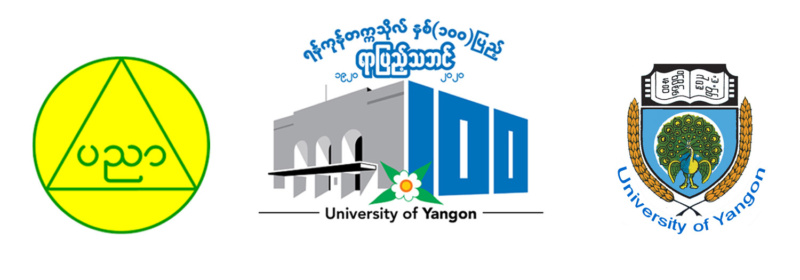
We are pleased to announce that the papers of the following authors have been accepted for presentation in the Research Conference for the Centenary of the University of Yangon (RCCUY2020) to be held in the University of Yangon.
| Sr. No. | Paper ID | Primary Subject Area | Authors |
| 1 | 17 | Good Health and Well-being | Khin Khin Theint (University of Nursing) |
| 2 | 19 | Industry, Innovation and Infrastructur | Thar Htat Kyaw (Technological University, Thanlyin) |
| 3 | 20 | Good Health and Well-being | September Win (Ministry of Education) |
| 4 | 21 | Industry, Innovation and Infrastructur | Mya Theingi (Ministry of Education) |
| 5 | 22 | Life on Earth | Aung Than Htwe (University of Yangon) |
| 6 | 23 | Quality Education | Nay Mar Soe (Yangon University of Education) |
| 7 | 24 | Quality Education | Naw Naw ( Yatanarpon Cyber City) |
| 8 | 25 | Quality Education | Aye Aye Aung (Yangon University of Education) |
| 9 | 26 | Quality Education | Aung Ye Ko (University of Yangon) |
| 10 | 27 | Quality Education | Mai Leine Htung (Yangon University of Education) |
| 11 | 28 | Quality Education | Naing Naing Maw (Yangon University of Education) |
| 12 | 29 | Industry, Innovation and Infrastructur | Soe Soe Han (Loikaw University) |
| 13 | 31 | Clean Water and Sanitation | Myint Myint Soe (Chemistry) |
| 14 | 32 | Quality Education | Su Myat Myat Phyoe (BEHS (Branch), Wethtoe) |
| 15 | 33 | Quality Education | Win WIN Maw (University of Yangon) |
| 16 | 34 | Quality Education | Nitra Soe Min (University of Yangon) |
| 17 | 35 | Quality Education | Khin Myat Thwe (Myeik Computer University ) |
| 18 | 36 | Quality Education | Khin Marlar Aung (Yenanchaung Degree College) |
| 19 | 39 | Life on Earth | Yu Hlaing (University of Yangon) |
| 20 | 40 | Quality Education | Ohmar Aung |
| 21 | 44 | Life on Earth | Htay Htay Khine (University of Yangon) |
| 22 | 47 | Quality Education | Khin Mu Mu Han (Yangon University of Education) |
| 23 | 48 | Life on Earth | Min Kyaw Thu (University of Yangon) |
| 24 | 1048 | Decent Work and Economic Growth | Aye Win (University of Monywa) |
| 25 | 1050 | Clean Water and Sanitation | khin khin Myint (Chemistry Department) |
| 26 | 1051 | Quality Education | Soe Pyae Mon (Yangon University of Education) |
| 27 | 1052 | Quality Education | Hla Hla Thi (Yangon University of Education) |
| 28 | 1055 | Quality Education | Moe Moe Naing (Sagaing University of Education) |
| 29 | 1057 | Quality Education | Moe Sandar Aung (TU ) |
| 30 | 1058 | Industry, Innovation and Infrastructur | Ei Thu Zar (Physics) |
| 31 | 1059 | Peace and Justice Strong Institutions | Khin Phyu Soe (Univeristy of Yangon) |
| 32 | 1060 | Industry, Innovation and Infrastructur | Khin Thinn Thinn Oo (University of Yangon) |
| 33 | 1062 | Industry, Innovation and Infrastructur | Moe Theingi Hlaing (Ministry of Education) |
| 34 | 1063 | Life on Earth | Mie Mie Kyaw (University of Mandalay) |
| 35 | 1064 | Climate Action | Thida Htoo (Ministry of Education) |
| 36 | 1065 | Life on Earth | Khin San Htay (University of Monywa) |
| 37 | 1066 | Life on Earth | Tin Tin Lynn (University of Magway) |
| 38 | 1067 | Quality Education | May Wah Linn (Yangon Univeresity of Education) |
| 39 | 1069 | Quality Education | Pwint Yi Thein (NYRDC, Yangon) |
| 40 | 1071 | Industry, Innovation and Infrastructur | Nan Kyi Kyi Thein (University of Mandalay) |
| 41 | 1072 | Clean Water and Sanitation | Shwe Sin Oo (Panglong University) |
| 42 | 1073 | Clean Water and Sanitation | Nyein Chan Soe (University of Veterinary Science) |
| 43 | 1074 | Life on Earth | Myo Thet Naung (University of Veterinary Science) |
| 44 | 1075 | Climate Action | Khin Thida One (Yezin Agricultural University) |
| 45 | 1076 | Life on Earth | Khaing Shwe Aye (Yezin Agricultural University) |
| 46 | 1077 | Quality Education | Min Min Htun (University of Yangon) |
| 47 | 1078 | Life on Earth | Nyein N Htwe (Yezin Agricultural University) |
| 48 | 1079 | Life on Earth | Nyein N Htwe (Yezin Agricultural University) |
| 49 | 1080 | Industry, Innovation and Infrastructur | Naing Min Tun (University of Yangon) |
| 50 | 1081 | Life on Earth | Moe Hnin Phyu (Yezin Agricultural University) |
| 51 | 1082 | Life on Earth | Khin Sandar Myint (University of Veterinary Science) |
| 52 | 1083 | Climate Action | Khin Swe Tun (Yezin Agricultural University) |
| 53 | 1084 | Life on Earth | Lei L Thinn (Ydb university) |
| 54 | 1086 | Quality Education | Thant Phyu Kyi (University of Yangon) |
| 55 | 1087 | Good Health and Well-being | Wint Wint Htun ( Pathein University) |
| 56 | 1089 | Life on Earth | Nyein Nyein Aye (Yezin Agricultural University) |
| 57 | 1090 | Life on Earth | myo khant (Yezin Agricultural University) |
| 58 | 1091 | Good Health and Well-being | Zaw Linn Myo Htun (Yezin Agricultural University) |
| 59 | 1092 | Peace and Justice Strong Institutions | Mu Mu Myint (University of Yangon) |
| 60 | 1093 | Life on Earth | Wai Lwin Oo (University of Veterinary Science) |
| 61 | 1094 | Good Health and Well-being | Kyu Kyu Khaing (Yezin Agricultural University) |
| 62 | 1095 | Good Health and Well-being | Mar Mar Win (Yezin Agricultural University) |
| 63 | 1096 | Good Health and Well-being | Saw Sandar Oo (YAU) |
| 64 | 1097 | Good Health and Well-being | Nang Kham (Yezin Agricultural University) |
| 65 | 1098 | Quality Education | Htar Htar Naing (Yezin Agricultural University) |
| 66 | 1099 | Good Health and Well-being | Sint Than Than (University of Veterinary Science ) |
| 67 | 1101 | Industry, Innovation and Infrastructur | Chaw Su Lwin (University of Yangon) |
| 68 | 1102 | Life on Earth | Yamonnar Kyaw Tin (University of Veterinary Science) |
| 69 | 1103 | Life on Earth | Aung Cho (Taungoo University) |
| 70 | 1104 | Life on Earth | Aye Aye Naing (Computer University, KyaingTong) |
| 71 | 1105 | Industry, Innovation and Infrastructur | Aye Aye Lwin (Higher Education) |
| 72 | 1106 | Life on Earth | Kyi Kyi Win |
| 73 | 1107 | Life on Earth | Thint Thint Aung (Zoology Department) |
| 74 | 1111 | Peace and Justice Strong Institutions | Khin Khin Oo (University of Yangon) |
| 75 | 1114 | Industry, Innovation and Infrastructur | Nu Nu Lwin (Yangon University of Economics) |
| 76 | 1115 | Life on Earth | See Zein (University of Yangon) |
PowerPoint Submission deadline via Email RCCUY2020@gmail.com is November 15, 2020.
Each author will be informed of the details of the reviewer report in order to prepare full paper. The oral presentation can be conducted either virtual or face to face (for authors in Yangon).
Conference registration can now be made by submitting conference registration Fee; Kyat 20000 per author for presenting paper at University of Yangon AYA Bank, Account No :0134202010077100 before November 15, 2020.
Conference Date will be announced soon.
| ရန်ကုန်တက္ကသိုလ် နှစ် (၁၀၀) ပြည့်၊ ရာပြည့်သဘင်အခမ်းအနား ကျင်းပရေး သုတေသနစာတမ်းဖတ်ပွဲနှင့် ဟောပြောပွဲကျင်းပရေးလုပ်ငန်းကော်မတီ |
| စဉ် | အဖွဲ့အမည် | အဖွဲ့ဝင်အမည် | တက္ကသိုလ် (အထူးပြုဘာသာရပ်) | သင်တန်းနှစ် |
| ပွဲစဉ်-၁ | ရာမည | မမေဖူးမြတ်ခင် | ရန်ကုန်တက္ကသိုလ်(ဥပဒေ) | တတိယနှစ် |
| မချစ်သက်မွန်ခင် | ရန်ကုန်တက္ကသိုလ် (ဥပဒေ) | စတုတ္ထနှစ် | ||
| မောင်လင်းခန့်ဦး | ဒဂုံတက္ကသိုလ်(အ္င်္ဂလိပ်စာ) | တတိယနှစ် | ||
| ပွဲစဉ်-၁ | ပဲခူး | မောင်မင်းမင်းညိမ်း | ဒဂုံတက္ကသိုလ်(အ္င်္ဂလိပ်စာ) | တတိယနှစ် |
| မဝင်းမြမြမိုး | ဒဂုံတက္ကသိုလ်(ဥပဒေ) | မဟာဝိဇ္ဇာ(ပထမနှစ်) | ||
| မောင်အောင်ကျော်ဟိန်း | ရန်ကုန်တက္ကသိုလ် (ဥပဒေ) | တတိယနှစ် | ||
| ပွဲစဉ်-၂ | မန္တလေး | မောင်ဟိန်းထက်ဇော် | ရန်ကုန်တက္ကသိုလ်(ဘူမိဗေဒ) | ပထမနှစ် |
| မောင်အောင်ခန့်မင်း | ရန်ကုန်တက္ကသိုလ်(ဘူမိဗေဒ) | ပထမနှစ် | ||
| မယမင်းစိုး | ရန်ကုန်တက္ကသိုလ်(ဘူမိဗေဒ) | ပထမနှစ်` | ||
| ပွဲစဉ်-၂ | မာလာ | မဝင်းသော်တာ | ရန်ကုန်တက္ကသိုလ် (ငါးလုပ်ငန်းဆိုင်ရာဘာသာရပ်) | ဒုတိယနှစ် |
| မဖူးပြည့်ဝင်းစံ | ရန်ကုန်တက္ကသိုလ် (ငါးလုပ်ငန်းဆိုင်ရာဘာသာရပ်) | ဒုတိယနှစ် | ||
| မစောသန္တာလှိုင် | ရန်ကုန်တက္ကသိုလ် (ငါးလုပ်ငန်းဆိုင်ရာဘာသာရပ်) | ဒုတိယနှစ် | ||
| ပွဲစဉ်-၃ | အင်းလျား | မစုဝေမြင့်မြတ် | ရန်ကုန်တက္ကသိုလ်(အဏုဇီဝ) | ဒုတိယနှစ် |
| မခွန်းဆင့်ဖူးဝေ | ရန်ကုန်တက္ကသိုလ်(အဏုဇီဝ) | ဒုတိယနှစ် | ||
| မခိုင်ဇင်သော် | ရန်ကုန်တက္ကသိုလ်(အဏုဇီဝ) | ဒုတိယနှစ် | ||
| ပွဲစဉ်-၃ | အင်းဝ | မောင်ထက်အောင်လှိုင် | ဒဂုံတက္ကသိုလ်(သတ္တဗေဒ) | ဒုတိယနှစ်(ဂုဏ်ထူးတန်း) |
| မောင်အောင်မင်းခိုင် | ဒဂုံတက္ကသိုလ်(သတ္တဗေဒ) | စတုတ္ထနှစ် | ||
| မောင်ထက်ဇော်ဖုန်း | ဒဂုံတက္ကသိုလ်(ဇီဝနည်းပညာ) | စတုတ္ထနှစ် | ||
| ပွဲစဉ်-၄ | ဝေသာလီ | မောင်စည်သူမိုး | ရန်ကုန်တက္ကသိုလ် (နိုင်ငံတကာဆက်ဆံရေး) | ဒုတိယနှစ် |
| မဆုနေရည်ညွန့် | ရန်ကုန်တက္ကသိုလ် (နိုင်ငံတကာဆက်ဆံရေး) | ဒုတိယနှစ် | ||
| မလှိုင်ဖူးပွင့်ဖြူ | ရန်ကုန်တက္ကသိုလ် (နိုင်ငံတကာဆက်ဆံရေး) | ဒုတိယနှစ် | ||
| ပွဲစဉ်-၄ | သီရိ | မမျိုးပပဝင်း | ဒဂုံတက္ကသိုလ်(သ္င်္ချာ) | တတိယနှစ်(ဂုဏ်ထူးတန်း) |
| မသိမ်းချမ်းမြေ့ဟန် | ဒဂုံတက္ကသိုလ်(သ္င်္ချာ) | တတိယနှစ်(ဂုဏ်ထူးတန်း) | ||
| မထက်ထက်ဦးဝေ | ဒဂုံတက္ကသိုလ်(သ္င်္ချာ) | မဟာဝိဇ္ဇာ | ||
| ပွဲစဉ်-၅ | ဒဂုံ | မောင်သန်းထွန်းဟိန်း | ဒဂုံတက္ကသိုလ်(မြန်မာစာ) | ဒုတိယနှစ်(ဂုဏ်ထူးတန်း) |
| မဆုမြတ်နွယ် | ဒဂုံတက္ကသိုလ်(မြန်မာစာ) | စတုတ္ထနှစ် | ||
| မလွင်လွင်ချို | ဒဂုံတက္ကသိုလ်(မြန်မာစာ) | ဒုတိယနှစ်(ဂုဏ်ထူးတန်း) | ||
| ပွဲစဉ်-၅ | ရတနာ | မဂျက်စမင်ပိုးဥလွင် | ရန်ကုန်တက္ကသိုလ် (နိုင်ငံရေးသိပ္ပံ) | B.A (Political Science) Qualified |
| မထူးမြတ်အိန္ဒြေ | ရန်ကုန်တက္ကသိုလ် (နိုင်ငံရေးသိပ္ပံ) | မဟာဝိဇ္ဇာ တက်ရောက်ရန်။ ။ ။ ။ | ||
| မဇင်ဝေနိုင် | ရန်ကုန်တက္ကသိုလ် (နိုင်ငံရေးသိပ္ပံ) | ဂုဏ်ထူးတန်း (နောက်ဆုံးနှစ်) | ||
| ပွဲစဉ်-၆ | တောင်ငူ | မောင်ကျော်စည်သူဟိန်း | ဒဂုံတက္ကသိုလ်(မြန်မာစာ) | ဒုတိယနှစ် |
| မမှူးနေခြည် | ဒဂုံတက္ကသိုလ်(အဏုဇီဝ) | ဒုတိယနှစ်(ဂုဏ်ထူးတန်း) | ||
| မပုလဲနုညီညီရှိန် | ဒဂုံတက္ကသိုလ်(မြန်မာစာ) | ဒုတိယနှစ် | ||
| ပွဲစဉ်-၆ | သထုံ | မောင်ထက်အောင်ခိုင် | ရန်ကုန်တက္ကသိုလ် (နိုင်ငံတကာဆက်ဆံရေး) | ဒုတိယနှစ် |
| မမှူးမြင့်မြတ် | ရန်ကုန်တက္ကသိုလ် (နိုင်ငံတကာဆက်ဆံရေး) | ဒုတိယနှစ် | ||
| မဝတ်ရည်ဖြိုး | ရန်ကုန်တက္ကသိုလ် (နိုင်ငံတကာဆက်ဆံရေး) | ဒုတိယနှစ် | ||
| ပွဲစဉ်-၇ | အမရ | မောင်အေးမင်းဖြိုး | ဒဂုံတက္ကသိုလ်(မြန်မာစာ) | စတုတ္ထနှစ် |
| မောင်ရှိုင်းရှိုင်း | ဒဂုံတက္ကသိုလ်(မြန်မာစာ) | ဒုတိယနှစ် | ||
| မထက်ထက်ငြိမ်း | ဒဂုံတက္ကသိုလ်(မြန်မာစာ) | စတုတ္တနှစ် | ||
| ပွဲစဉ်-၇ | ရွှေဘို | မောင်မင်းဇင်ဦး | ဒဂုံတက္ကသိုလ်(သင်္ချာ) | ဒုတိယနှစ် |
| မတင့်တင့်စံ | ဒဂုံတက္ကသိုလ်(သင်္ချာ) | စတုတ္ထနှစ် | ||
| မအေးမြတ်နွယ် | ဒဂုံတက္ကသိုလ်(သင်္ချာ) | ဒုတိယနှစ် | ||
| ပွဲစဉ်-၈ | စစ်ကိုင်း | မောင်ကောင်းမြတ်စံ | ရန်ကုန်အရှေ့ပိုင်းတက္ကသိုလ် (နိုင်ငံတကာဆက်ဆံရေး) | တတိယနှစ် |
| မနန်းဆက်နောင် | ရန်ကုန်အရှေ့ပိုင်းတက္ကသိုလ် (သမိုင်း) | ဒုတိယနှစ် (ဂုဏ်ထူးတန်း) | ||
| မမိုးထက်ထက်အောင် | ရန်ကုန်အရှေ့ပိုင်းတက္ကသိုလ် (သမိုင်း) | ဒုတိယနှစ် (ဂုဏ်ထူးတန်း) | ||
| ပွဲစဉ်-၈ | ပင်းယ | မောင်အောင်ကျော်စိုး | ရန်ကုန်တက္ကသိုလ် ်(နိုင်ငံရေးသိပ္ပံ) | ပထမနှစ် (ဂုဏ်ထူးတန်း) |
| မဖူးပြည့်စုံကျော် | ရန်ကုန်တက္ကသိုလ် (နိုင်ငံတကာဆက်ဆံရေး) | ပထမနှစ် (ဂုဏ်ထူးတန်း) | ||
| မောင်ဇေယျမိုးကျော် | ရန်ကုန်တက္ကသိုလ် (စိတ်ပညာ) | တတိယနှစ် (ဂုဏ်ထူးတန်း) |
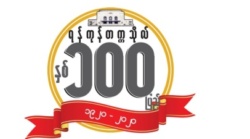
၊
– ပထမအဆင့်မေးခွန်းပုံစံ
* တစ်ဖွဲ့လျှင် မေးခွန်း (၅) ခုဖြေဆိုရမည်ဖြစ်ပြီး မေးခွန်း (၁)ခုအတွက် (၂) မှတ်၊ ဖြေဆိုရန် စဉ်းစားချိန် မေးခွန်းတစ်ခုအတွက် (၁) မိနစ်ဖြစ်သည်။
* ပြိုင်ဖက်အဖွဲ့မှ မဖြေဆိုနိုင်သည့် မေးခွန်းကို မိမိအဖွဲ့အနေနှင့် ဖြေဆိုနိုင်ပါက (၁)မှတ် ရပါမည်။
– ဒုတိယအဆင့်မေးခွန်းပုံစံ
** တစ်ဖွဲ့လျှင် မေးခွန်း(၁၀)ခု ဖြေဆိုရမည်ဖြစ်ပြီး မေးခွန်း (၁) ခုအတွက် (၂) မှတ်၊ ဖြေဆိုရန် စဉ်းစားချိန် မေးခွန်းတစ်ခုအတွက် (၁)မိနစ်ဖြစ်သည်။
** ပြိုင်ဘက်အဖွဲ့မှ မဖြေဆိုနိုင်သည့် မေးခွန်းကို မိမိအဖွဲ့အနေနှင့် ဖြေဆိုနိုင်ပါက (၁)မှတ်ရပါမည်။
– နောက်ဆုံးအဆင့်မေးခွန်းပုံစံ
***တစ်ဖွဲ့လျှင် မေးခွန်း(၁၂)ခု ဖြေဆိုရမည်ဖြစ်ပြီး မေးခွန်း (၁) ခုအတွက် (၂) မှတ်၊ ဖြေဆိုရန် စဉ်းစားချိန် မေးခွန်းတစ်ခုအတွက် (၁)မိနစ်ဖြစ်သည်။
***ပြိုင်ဘက်အဖွဲ့မှ မဖြေဆိုနိုင်သည့် မေးခွန်းကို မိမိအဖွဲ့အနေနှင့် ဖြေဆိုနိုင်ပါက (၁)မှတ်ရပါမည်။
မှတ်ချက်။ ၁။ မေးခွန်းပုံစံမှာ ပေးထားသော အဖြေ(၃)ခုအနက်အဖြေမှန်ရွေးချယ်ခြင်း၊ ကွက်လပ်ဖြည့်ပေးခြင်းနှင့် မေးထားသည့် မေးခွန်းကို လိုရင်းအဖြေဖြေဆိုခြင်း တို့ဖြစ်သည်။
မှတ်ချက်။ ၂။ ပေးထားသော အဖြေ (၃) ခုအနက် အဖြေမှန်ရွေးချယ်သည့် မေးခွန်းတွင် အခြားအဖွဲ့အတွက် မေးခွန်းဖြေဆိုခြင်းအစီအစဉ် မပါဝင်ပါ။
ရန်ကုန်တက္ကသိုလ်နှစ်(၁၀၀)ပြည့် ရာပြည့်သဘင်အခမ်းအနား ကျင်းပပြုလုပ်ရေးလုပ်ငန်းကော်မတီ
ဆက်သွယ်ရန်-ဒေါက်တာလဲ့လဲ့အောင်၊ ၀၉၅၁၉၄၁၁၂၊ llaung1111@gmail.com
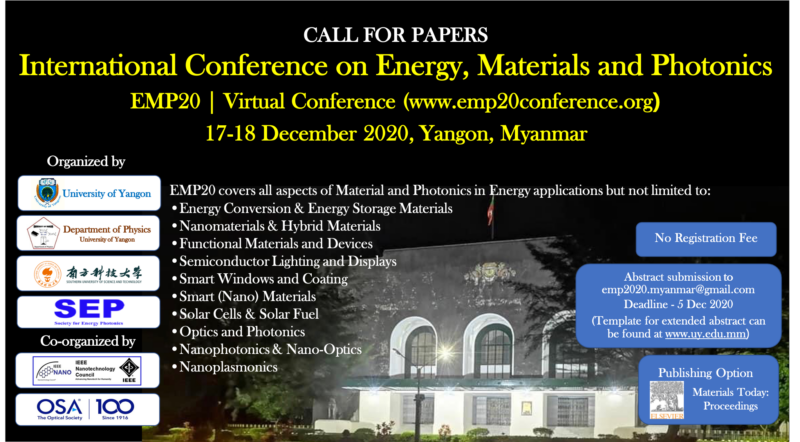
Scope of EMP20
EMP conferences have been held every year since 2015. Following the successful EMP18 conference in Montreal, Canada and the EMP19 conference in Shanghai, China, the EMP20 will be held in Yangon, Myanmar, in conjunction with 100th Anniversary of University of Yangon. The EMP20 conference was previously planned to hold on 8-11 June 2020. Due to the unprecedented Covid-19 outbreak, it has been postoned to December 2020. The EMP20 will be held on 17-18 December 2020 through virtual conferencing platform. The aim of this conference is to provide a platform for academics, scientists, business leaders, innovators, and industrialists around the world to exchange ideas and form collaborations to jointly fight energy crisis, and combat global warming and climate change. In particular, we solicit papers in a broad area of energy photonics, an emerging area in applying photonics in high efficiency energy production, utilization, and related material researches supporting these applications.
EMP20 covers all aspects of Material and Photonics in Energy applications including but not limited to:

Department of Physics, University of Yangon, Southern University of Science and Technology, Society for Energy Photonics.

IEEE Nanotechnology Council and The Optical Society as co-organizer.
EMP20 Committees
-Prof. Pho Kaung, Rector, University of Yangon.
-Prof. Khin Khin Win, University of Yangon.
– Prof. Aung Ko Ko Kyaw, Southern University of Science and Technology, China
– Prof. Thi Thi Lay, Josai University, Japan
– Prof. Ye Chan, University of Yangon
– Prof. Aye Aye Thant, University of Yangon
– Prof. Yin Maung Maung, University of Yangon
– Prof. Than Zaw Oo, University of Yangon
– Prof. Min Maung Maung, University of Yangon
Committee:
– Prof. Xiao Wei Sun, Southern University of Science and Technology, China.
– Prof. Renaud Bachelot, University of Technology of Troyes, France.
– Prof. Dongling Ma, Institut National de la Recherche Scientifique (INRS), Canada.
– Prof. Saw Wai Hla, Ohio University, USA.
– Prof. Jianwei Xu, Institute of Materials Research and Engineering (A*STAR), Singapore.
Prof. Min Maung Maung, University of Yangon
Invited speakers: The list will be uploaded soon.
NO REGISTRATION FEE
Abstract submission: Submit the extended abstract to the email (emp2020.myanmar@gmail.com)
Template for extended abstract is available at www.uy.edu.mm.
Deadline – 5 Dec 2020
Publishing Option: After the conference, full papers can be submitted and the selected manuscripts will be published in Materials Today: Proceedings (Elsevier).
Contact:
Phone – (+95)1536772
Email – emp2020.myanmar@gmail.com
ရန်ကုန်တက္ကသိုလ်နှစ် (၁၀၀) ပြည့်အထိမ်းအမှတ် အဖြစ် ၂၅-၁၁-၂၀၂၀ (ဗုဒ္ဓဟူးနေ့) နံနက် (၉:၀၀) နာရီတွင် Oxford ဆရာတော်ကြီးက တရားဒေသနာတော်များကို Zoom Application ဖြင့် ဟောကြားချီးမြှင့်ပေးမည်ဖြစ်ပါသဖြင့် တရားနာယူနိုင်ပါရန် ဖိတ်ကြားအပ်ပါသည်။
Meeting ID – 681 612 0774
Passcode – 1234567
ရန်ကုန်တက္ကသိုလ်မိသားစု
ရန်ကုန်တက္ကသိုလ် နှစ် (၁၀၀) ြည့် အထိမ်းအမှတ် ရုပ်မြင်သံကြားဉာဏ်စမ်းပဟေဠိပြိုင်ပွဲတွင် ပြိုင်ပွဲဝင်အသင်း (၁၄) သင်း၏ယှဉ်ပြိုင်မှုများကို ပထမအဆင့်၊ ဒုတိယအဆင့်၊ နောက်ဆုံးအဆင့် ပြိုင်ပွဲများအဖြစ်ကျင်းပကာ မြန်မာ့အသံ၏ ရုပ်မြင်သံကြားဉာဏ်စမ်းပဟေဠိ အစီအစဉ်ဖြင့် ညနေ ၅ နာရီ နှင့် ၆ နာရီ အတွင်း ပွဲစဉ် တစ်ပွဲကိုကြာမြင့်ချိန် (၅၅) မိနစ် ဖြင့် နိုဝင်ဘာလ ၂၄၊ ၂၅၊ ၂၆၊၂၇၊၂၈၊၂၉ ရက်များတွင် ၆ ရက်ခွဲကာ MRTV မှ ပြသသွားမည်ဖြစ်ပါသည်။
“YUitganic” Project သည် ရန်ကုန်တက္ကသိုလ် Environnmental Club နှင့်ရန်ကုန်တက္ကသိုလ် Science Club တို့မှ ကျောင်းသားများ ပူးပေါင်းပါဝင် လုပ်ဆောင်လျက်ရှိသော Project ဖြစ်ပါသည်။ ရန်ကုန်တက္ကသိုလ်၊ ဓါတုဗေဒဌာန မှ ကထိက ဒေါက်တာအောင်ကျော်စွာ ၏ လမ်းညွှန်မှုနှင့်အတူ ပါမောက္ခ/ဌာနမှူး ဒေါက်တာနီနီသန်း ၏ ပံ့ပိုးကူညီမှုဖြင့် ဓါတုဗေဒဌာန၊ အင်အော်ဂဲနစ် ဓါတုဗေဒ သုတေသနဓါတ်ခွဲခန်းများတွင် လက်သန့်စင်ဆေးရည်များ ကိုယ်တိုင်ထုတ်လုပ်ပြီး လိုအပ်သောနေရာများ နှင့် ရှားပါးသောနေရာများသို့ လှူဒါန်းလျက်ရှိပါသည်။ ရန်ကုန်တက္ကသိုလ် မိသားစု၊ ကျောင်းသားကျောင်းသူများ၊ စေတနာရှင်များ၏ အလှူငွေများဖြင့် လက်သန့်ဆေးရည်အမြောက်အမြားကို အရည်အသွေးပြည့်မီစွာ ထုတ်လုပ်လှူဒါန်းလျက်ရှိပြီး ကမ္ဘောဇဘဏ်မှလည်း လီတာ (၂၀၀၀) စာ တန်ဖိုးငွေကျပ် သိန်း (၅၀) ကို ပံ့ပိုးလှူဒါန်းခဲ့ပါသည်။ ယခုအခါတွင် လက်သန့်စင်ဆေးရည် လီတာ ၃၃၀၀ ခန့်ကို ထုတ်လုပ်ပြီးဖြစ်ပြီး ရန်ကုန်တိုင်းဒေသကြီး အနှံ့အပြား နှင့် တိုင်းနှင့်ပြည်နယ် ၅ ခုသို့ ဆက်သွယ်ပေးပို့လှူဒါန်းပြီးဖြစ်ပါသည်။
ကျောင်းသူကျောင်းသားများ၏ ကြိုးစားအားထုတ်မှုဖြင့် ဆောင်ရွက်လျက်ရှိသော YUitganic Project ကို ASEAN University Network ၏ Official Website တွင်လည်းဂုဏ်ပြုမှတ်တမ်းတင် ဖော်ပြထားပါသည်။
http://www.aunsec.org/pressroom_news80.php
The Centre of Excellence for Urban and Regional Development in Myanmar“ (CoE) was founded at the University of Yangon on 1st November 2012 under the rectorate and his always great support of Rector Prof. Dr. Tin Tun. Prof. Dr. Frauke Kraas has initiated the Centre and is co-leading it with an interdisciplinary team of scientists of the University of Yangon. Rector Prof. Dr. Aung Thu and Rector Prof. Dr. Pho Kaung have also been always very supportive and strongly encouraged the work of the Centre.
The leading team started its work on 17th December 2012 – with the CoE core members Dr. Bay Dar (Department of Botany), Dr. Zaw Soe Min (Department of History), Dr. Hla Yin Nu, Dr. Khin Khin Soe and Dr. Zin Nwe Myint (Department of Geography), University of Yangon and Prof. Dr. Frauke Kraas, Institute of Geography, University of Cologne and Yangon.
After successful two years of work, the official opening ceremony took place on 28 July 2014. The Department of Geography is in charge of the CoE since it was founded in 2012.
The centre aims to further develop modern teaching qualifications with research-oriented teaching on all levels of education. Inter-institutional and interdisciplinary collaboration, also with international research partners shall be extended. Knowledge, expertise and qualification shall be made available for all universities in Myanmar and for the civil society.
The focus of the Centre of Excellence is “Urban and Regional Development”. It was chosen in order to underline the university’s commitment and scientific contribution to the urban and regional development processes of the country. All related academic disciplines can join the research activities. Major areas are environmental change, cultural, economic and social development and rural and urban transformation processes in Myanmar.
The CoE-URDM is chaired by
Center of Excellence for Urban and Regional Development in Myanmar
CoE-URDM Office
Room A-18, Arts Hall,
University of Yangon
University Avenue Road, Kamayut Township (11041)
Yangon, Myanmar
Tel.: +95-1-505045
Email: yucoe2012@gmail.com
Dr Ni Ni Htun
Associate Professor, Department of Botany
Publication
(1) Study of Some Popular Edible Fruits in Myeik Area (Sanda Hlaing, Ohn Mar Kyaw, Ni Ni Htun, Myeik University Research Journal 2014, Vol.5, No.1, Pp 74-88)
(2) The Study of Some Diseases Occurrence in Mangifera indica L. (Mango) (Ni Ni Htun, Banmaw University Research Journal Vol. 7,2017, Pp. 111-122)
(3) Acute Toxicity Test and Uterine Relaxant Activity of Meik-tha –lin (Ni Ni Htun, University Research Journal 2018, Vol. 10, No. 4, Pp. 91-101)
(4) Uterine Relaxant Activity of Rhizome of Zingiber cassumunar Roxb. (Ni Ni Htun, Banmaw University Research Journal, 2018, Vol.9, Pp. 195-201)
(5) A Study on Elemental and Phytochemical Analysis of Zingiber cassumunar Roxb. Rhizome (Ni Ni Htun, Banmaw University Research Journal, 2019, Vol.10, No.1, Pp. 240-250)
(6) Comparative Morphology and Phytochemical Test of Genus Zingiber Plants Found in Hlawga Area (Ni Ni Htun, Dagon University Commemoration of 25th Anniversary Silver Jubilee Research Journal 2019, Vol.9, No.2, Pp.335-341)
(7) Isolation of Active Compounds from Essential Oil Extracted from Rhizome of Zingiber cassumunar Roxb. and Their Antimicrobial Activity (Ni Ni Htun, University of Yangon Research Journal 2019, Vol.9. No.2, Pp. 61-68)
(8) Phytochemical and Antimicrobial Evaluation on Rhizome of Zingiber zerumbet (L.) Roscoe e Sm. (Ni Ni Htun, Sandar Sann, 1st Myanmar International Science and Culture Conference 2019, Pp. 122-125)
(9) Anatomical and Phytochemical Studies on Leaves of Clerodendrum siphonanthus R.Br. (Sandar Sann, Ni Ni Htun, 1st Myanmar International Science and Culture Conference 2019, Pp. 90-94)
(10) Morphological Identification and Phytochemical Investigation of Cassia occidentalis L. Leaves and Its Antimicrobial Activity (Ni Ni Htun, Journal of the Myanmar Academy of Arts and Science 2020, Vol.XVIII, No.4A, Pp. 267-275)
(11) Morphological Identification of Hyptis suaveolens (L.) Poit. And Its Antimicrobial Activity (Ni Ni Htun, Sandar Sann, 3rd Myanmar Korea Conference Research Journal 2020, Vol.3, No.2, Pp.571-576)
(12) Macroscopical Characters and Phytochemical Analysis of Leaves of Lycopersicon esculentum Mill. And Its Antimicrobial Activity (Sandar Sann, Ni Ni Htun, 3rd Myanmar Korea Conference Research Journal 2020, Vol.3, No.3, Pp. 767-775)
Supervision
(Total 5)
MSc 3
MRes 1
PhD (co-supervisor) 1
Daw Aye Aye Oo
Lecturer, Department of Botany
Publication
(1) Production of Biologically Active Compounds from Endophytic Strains Isolated from Different Plant Species (Yee Yee Thu, Ko Tin (Lec., YU), Aye Aye Oo (Lec. YU), Thwe Thwe Oo (Lec, YU, Journal of the Asia Research Centre, 2016, Vol. 5, No.1 & 2, 131-148)
(2) Morphological and Medicinal Uses of Some Ornamental Plants (Aye Aye Oo) Pyay University Research Journal, 217, Vol.9, N0.1, 359-367
The Centenary Celebration of University of Yangon
Programme for
International Conference: Transformation Processes in Myanmar V
27-28 November 2020
ရန်ကုန်တက္ကသိုလ်နှစ် (၁၀၀) ပြည့်အထိမ်းအမှတ် အဖြစ် ၁-၁၂-၂၀၂၀ (အင်္ဂါနေ့) နံနက် (၁၀:၀၀) နာရီတွင် Oxford ဆရာတော်ကြီးက တရားဒေသနာတော်များကို Zoom Application ဖြင့် ဟောကြားချီးမြှင့်ပေးမည်ဖြစ်ပါသဖြင့် တရားနာယူနိုင်ပါရန် ဖိတ်ကြားအပ်ပါသည်။
Meeting ID – 562 211 2020
Passcode – 562211
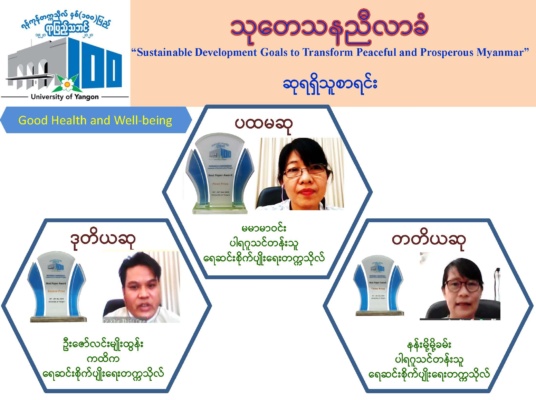


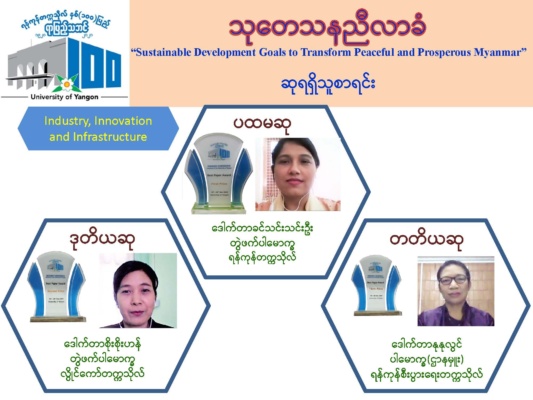
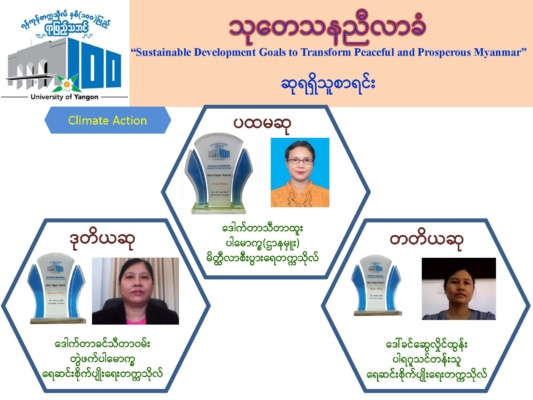
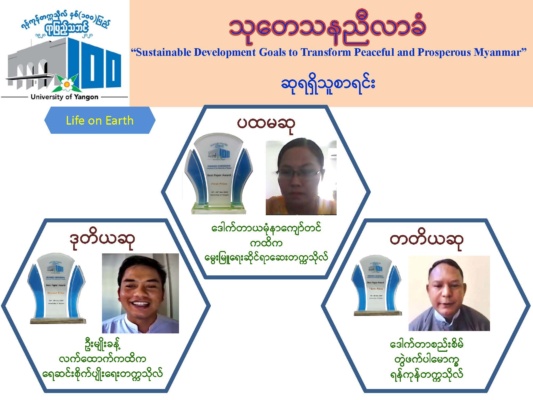
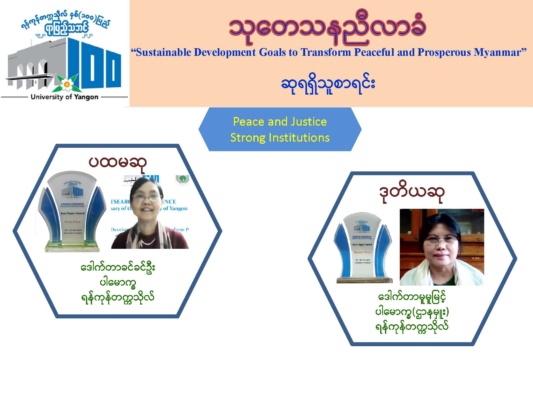
Dr Nwet Nwet Aung
Associate Professor, Department of Botany
Supervision
Total ( 12 )
PhD 4
MRes 6
MSc 2
Daw Win Win Aung
Lecturer, Department of Botany
Supervision
Total (2)
MRes 1
MSc 1
Dr Khin Aye Aye San
Lecturer, Department of Botany
It is our privilege to express the congratulatory letters/messages/short video wishes presented by our dedicated international partners on the momentous occasion of the Centennial of the University of Yangon.
Dr Khin Ohn Myint
Lecturer, Department of Botany
Dr Cho Cho
Lecturer, Department of Botany
Dr Hnin Wit Mhone
Assistant Lecturer, Department of Botany
Daw Phoo Wint Yee Thaw
Assistant Lecturer, Department of Botany
Dr Khin Swe Oo
Professor
Publication:
Dr Seinn Lei Lei Phyu
Associate Professor
Publication:
Dr Win Thi Yein
Lecturer
Publication:
Award:
Click here to download PhD Student From (.doc)
Click here to download PhD Student From (.pdf)
Click here to download PhD Student From (2) (.pdf)
-Myanmar- French Neolithic- Bronze- Iron Age Research Project (from 2015 to present)
-Myanmar- French archaeological project ” Thanintharyi and the Maritime Silk Roads” (from 2017 to present)
Projects
-Comparative study of copper-base artifacts dated to Bronze- Iron Age (2018)
-The National Geographic Society-funded project “Investigating the role of strategic resources in the rise and fall of the Kingdom of Bagan 9th-14th c. AD, Myanmar” (2019)
-Asia Research Centre, University of Yangon, funded project “Archaeology and Geological evidences from southern most area of Myanmar” (2021)
Dr Lwin Mar Saing
Professor, Department of Botany
Career history
28.7.1998 – 1.12.2006- Demonstrator (Dagon University, Myeik University)
1.12.2006 – 1.12.2011- Assistant Lecturer (Dagon University)
1.12.2011 – 31.3.2016- Lecturer (Dagon University, Dawei University, Dagon University)
1.4.2016 – 28.12.2020- Associate Professor (Pang Long University, Pyay University)
5.1.2021 – Until now – Professor (Yangon University)
Publications
(Research journal in Universities)
(a)Significant Characters of Bamboo (Green- Gold) and Their Natural Resources in Myanmar (University of Maguage Research Journal) (Vol. IX, Life Science) 2019
(b) Some Novel Wild Sweet Grasses in Myanmar (Proceedngs of the International Joint Symposium (Vol.1, No 2) (2019)
(c)Botanical study and Important Uses of Tinyu (Pinus spp.) Forest in Pang Long Area (3rd Myanmar – Korea Conference on Useful Plants) (2020)
(d) A Benificial invasive Plant in Pyay University Campus (Pyay University research Journal) (Vol. 11, No.1) 2019
(e) Less awareness and evolutionary trends of wild Saccharum spp. (wild sugarcane) in Myanmar (Universities Research Journal) (Vol. 11, No .9) (2019)
(f) Some Important Rosewood and Their Deforestation Status in Southern Shan State of Myanmar Dagon University,2nd Myanmar – Korea Conference on Useful Plants) (Vol. 1) (2019)
(g)Indigenous knowledge and traditional uses of Hsalon Tribe on Family Bambusaceae(Bamboo) in Done-Palae-Arr Island (Universities Research Journal (Vol. 10, No.5) (2018)
(h)Significance roles of some beneficial weeds and their bridging the gap between humanity and natural environment in Pang Long University Campus (Pang Long University) (Vol.8, No.1) (2017)
(i) Study on different wild Paddy Genus Oryza L. in Myanmar (The best Research award in Ministry of Higher Education (lower Myanmar) Dagon university ceremony (Vol. 7, No.2) (2016)
(j)Invasive Alien Species in Pang Long University Campus (Pang Long University) (Vol.7, No.1) (2016)
(k)Study of some C₄ Grasses for Cattle fodder in Myanmar (Dawei University) (Vol.5, No.1) (2013)
(l)Study on significantly different characters between genera of Dendrocalamus and Bambusa in Myanmar (Universities research Journal (Vol .5, No .1) (2012)
Supervision and Examiners
| Supervisor (PhD) | 2 |
| Supervisor (MRes) | 2 |
| Supervisor MSc | 2 |
| MSc Member | 6 |
| MSc External examiner | 1 |
| MRes Member | 1 |
| Total | 14 |
Professional honors, awards and fellowships
(a) Awarwless of wild Paddy Genus Oryza L. in Myanmar (The best Research award in Ministry of Higher Education (lower Myanmar) & the best science research in 23rd Dagon university ceremony (2016) (Vol. 7, No.1)
(b) “Spot” characters of some species in Myanmar (People Republic of China) (Presentation for Myanmar’ Tropical Biodiversity and Taxonomy Knowledge Changes Program Conference as Consultant for Ministry of Higher Education (Pang Long University) (2017-2018)
(c)Some important species in Southern Shan State of Myanmar (The best Research award in Ceremony of Pang Long University) (2018)
(d) Distinct spot characters and evolutionary trends of wild family Cyperaceae (Sedge) in some areas of Southern Shan State (The best Research award in Ceremony of Taungyi University) (2017)
Current doing research (2018 – at the present)
(a)Importance role for conservation and development issue of some wild natural plants, native wild coffee family in Southern Shan State of Myanmar (2018- doing at the present) (FRI)
(b)The vast role of wild sugarcane as cultivar and biodiversity sustainable development in Southern Shan State of Myanmar (2018- doing at the present) (FRI)
(c) Taxonomic study and conserve status for some endanger species of wild Palm (Coconus family) in Myanmar. (2019- doing at the present) (FRI)
Community service
(a) Natural Ecosystem Course Master Training (Manchester.ac.uk, TIDE)
(b)Flora of Myanmar (contributor) at the present
(c) Grasses of Myanmar (contributor) at the present
(d) RES (Emp-024) “Matching the Graduates and Employability in Myanmar (nepc ir &research)
Membership and activities in professional associations
Taxonomy and tropical biodiversity and Conservation Knowledge Changes for Myanmar in People Republic of China (Shenzhen fairy Lake University/ Lab / Garden as a consultant for Ministry of Higher Education in Myanmar)
Other professional activities (Workshops, Seminars and consultations)
(a)Ecosystem Valuation Training (Research Capacity Building Program) Myanmar Coastal Conservation Lab.
(b)Workshop on Myanmar Biodiversity and Conservation
Page
Wild type of plants in Myanmar, (www.wtpm.edu.co/mwtp)
Click here to download Webinar Invitation for the students of YU
Click here to download Webinar Invitation for the faculty members of University of Yangon
Dr Sann Sann Shein is a Professor of the Department of International Relations and Political Science, University of Yangon. She received her BA (Honours) (1993) and MA (2001) degrees in International Relations from University of Mandalay. In 2011, she attained her PhD degree from University of Yangon. She achieved her Diploma in Japanese from Yangon University of Foreign Languages in 2005. Her teaching profession started at Magway University in 1998. She worked previously at Yadanarbon University (2000-2004), Yangon University of Foreign Languages (2004-2011), East Yangon University (2011-2015) and Monywa University (2015-2020). In 2020, she was assigned as a Professor at the Department of International Relations and Political Science, University of Yangon. She teaches diverse courses including Diplomacy, IR in Middle East, IR in Southeast Asia, Security Issues in Southeast Asia, Government and Politics of Southeast Asia, Government and Politics of East Asia, Government and Politics of US, Contemporary US Foreign Policy, European Union, and IR Theories. Moreover, she gives lecture on “Elements of International Relations” for DIR Class students. Her research fields include the ASEAN-China Relations and Environmental Affairs. Her PhD dissertation focuses on “Myanmar’s Efforts for Sustainable Forest Management since 1988”.
Publications
(1) “Mangrove Conservation under Sustainable Forest Management”, Yangon University of Foreign Languages Research Journal, Vol-1, No-1, December 2009
(2) “Myanmar’s Efforts for Greening the Central Dry Zone”, Yangon University of Foreign Languages Research Journal, Vol-2, No-2, December 2010
(3) “The Role of Myanmar Peace Centre in Myanmar Peace Building Process”, Monywa University Research Journal, Vol-9, No-1, February 2019
(4) “ASEAN-China Security Relations over the Spratlys Islands Dispute”, Monywa University Research Journal, Vol-12, No-1, December 2020
Dr San San Aye
Professor, Department of Chemistry
PhD in Natural Product Organic Chemistry
Publications:
Dr Thet Thet Mar Win
Professor, Department of Botany
Career history
Demonstrator (1998-2006) , Assistant Lecturer (2006-2011 ),
Lecturer (2011-2016), Associate Professor (2016-2020), Professor (2021-until now)
Publications
(1)Integrated study on plants distribution and trace elements dispersion in soil, Khwayaik Taung, Heho, Southern Shan State, Myanmar Academy of Arts and Science Journal (MAAS) Vol. IV, No.4, 2006
(2) Phytosociological study on different lithologic units in Khwayaik Taung, copper deposit, Shan State, Myanmar Academy of Arts and Science Journal (MAAS) Vol. VII, No.4, 2009
(3) Study on Indicator Plant for Copper Mineralization in Khwayaik Taung, Heho, Southern Shan State, Myeik University Research Journal, Vol. II, No. 1, 2010
(4) Standardization and Acute Toxicity Study of Premna integrifolia Linn. (Taung-Tan-Gyi), The Myanmar Health Sciences Research Journal, Vol. 2, No. 2, 2012
(5) Species Diversity and Floristic Composition of Plant Communities in the Shinma-Taung and Powin-Taung Reserved Forests in the Dry Zone Area, Journal of the Asia Research CentreVol. 3, No.2, 2013
(6) မြန်မာနိုင်ငံပုပ္ပါးတောင်ရှိဆေးဖက်ဝင်အပင်များ စုစည်းမှု့ ISBN 978-89-6811-250-8 93480, 2016 (National Institute of Biological Resources (NIBR)), South Korea
(7) Molecular phylogenetic study of Rhododendron L. (Ericaceae) species inferred from the Chloroplast and Nuclear Ribosomal DNA sequences, Myanmar Academy of Arts and Science Journal (MAAS) Vol. XV, No.4 ISSN 2520-0186, 2017
(8) Ethnobotany of wild medicinal plants used by the Müün ethnic people; A quantitative survey in southern Chin State, Myanmar, Journal of Herbal Medicine, 2210-8033/ © 2017 Elsevier GmbH. Vol.13, 2017
(9) Study on Fabaceae and Acanthaceae families of Angiosperms from Pyay Township in West Universities Research JournalVol.10, No.4, 2018
(10) Chin indigenous Ethnomedicinal plants and traditional knowledge among three groups in Natma Taung National Park (Myanmar), Journal of Ethnopharmacology, 0378-8741/ © 2018 Elsevier B.V. Vol. 225, Vol. 8,2018
(11) Taxonomic Description of the Lamiaceae and Verbenaceae Families of the Flora of Paukkhaung Township, University of Yangon Research Journal, Vol. 8, 2018
(12) Study on some Useful Plants Angiosperm Growing in Aung Myin Bar Hu Protected Forest Area, Pyay Township, Dagon University Commemoration of 25th Anniversary Silver Jubilee Research Journal Vol. 9, No.2, 2019
(13) Useful flowering plants in Myanmar, Vol. I (Korea Research Institute of Bioscience & Biotechnology, Daejeon, Republic of Korea , 2019, Vol. I , Page 1-209, ISBN: 978-89-6709-135-4)
(14) Taxonomical Studies of Some Members of Malvaceae Family occurring in Pyay Township, West Bago Region, Universities Research Journal, Vol. 11, No.10, 2019
(15) Ethnobotanical study of medicinal plants among four Chin indigenous groups in Tedim Township, Northern Chin State, Myanmar, Vol. 11, 2020
Supervision and Examiners
| Supervisor (PhD) | 5 |
| Co-supervisor (PhD) | 2 |
| Member (PhD) | 1 |
| Supervisor (MRes) | 1 |
| MSc Supervisor | 1 |
| MSc External examiner | 3 |
| Total | 13 |
International Participation
Lower Mekong Initiative (LMI Young Scientist Programmed, 2017-2019) Lao PDR, Myanmar and Vietnam
Major publications
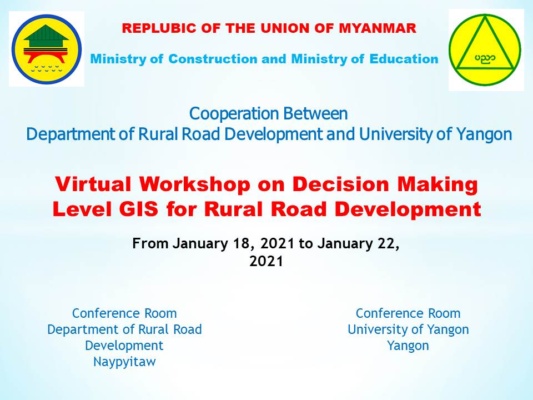
ပြည်ထောင်စုသမ္မတမြန်မာနိုင်ငံတော်အစိုးရ၊ ပညာရေးဝန်ကြီးဌာန၊ ရန်ကုန်တက္ကသိုလ်၊ ပထဝီဝင်ဌာနနှင့် ဆောက်လုပ်ရေးဝန်ကြီးဌာန၊ ကျေးလက်လမ်း ဖွံ့ဖြိုးရေးဦးစီးဌာနတို့အကြားပူးပေါင်းဆောင်ရွက်မှုအဖြစ် “Workshop on Decision Making Level GIS for Rural Road Development” အလုပ်ရုံဆွေးနွေးပွဲအား ၂၀၂၁ခုနှစ်ဇန်နဝါရီလ ၁၈၊ ၁၉ နှင့် ၂၁၊ ၂၂ နေ့ များတွင် Virtual Workshop ပုံစံဖြင့် Webinar ကျင်းပခဲ့ပါသည်။
အဆိုပါ အလုပ်ရုံဆွေးနွေးပွဲ ဖွင့်ပွဲအခမ်းအနားကို ရန်ကုန်တက္ကသိုလ်၊ ဝိဇ္ဇာခန်းမ ရှိ အစည်းဝေးခန်းမနှင့်၊ ကျေးလက်လမ်းဖွံ့ဖြိုးရေးဦါ်စီးဌာန၊ ရုံးချုပ်၊ နေပြည်တော်ရှိ အစည်းဝေးခန်းမများတွင် ကျင်းပခဲ့ရာ ကျေးလက် လမ်းဖွံ့ဖြိုးရေးဦးစီးဌာ၊ ညွှန်ကြားရေးမှူးချုပ် ဦးဝဏ္ဏဇော် နှင့် ရန်ကုန်တက္ကသိုလ်၊ တာဝန်ခံပါမောက္ခချုပ် ဒေါက်တာနီလာအောင်တို့မှ အဖွင့်အမှာစကားပြောကြားခဲ့ပြီး၊ ရန်ကုန်တက္ကသိုလ်၊ ပထဝီဝင်ဌာန၊ ပါမောက္ခ၊ ဌာနမှူး (Team Leader, The Group of Geoinformatic, UY) ဒေါက်တာထွန်းကို က အလုပ်ရုံဆွေးနွေးပွဲ ဆောင်ရွက်ရခြင်း၏ ရည်ရွယ်ချက်များနှင့် မျှော်မှန်းရလဒ်များ၊ GIS နည်းပညာရပ်၏ စီမံခန့်ခွဲမှုနယ်ပယ်တွင် အသုံးဝင်မှုများအား ရှင်းလင်းပြောကြားခဲ့ပါသည်။ ဖွင့်ပွဲအခမ်းအနားအပြီးတွင် ဆွေးနွေးပွဲ ကိုဆက်လက်ကျင်းပ ခဲ့ရာ ရန်ကုန်တက္ကသိုလ်၊ ပထဝီဝင်ဌာနရှိ The Group of Geoinformatic, UY မှ ဒေါက်တာထွန်းကိုနှင့် ဦးချစ်မျိုးလွင်တို့မှ
စသည့်အကြောင်းအရာများအားဦးဆောင်ဆွေးနွေးတင်ပြခဲ့ကြပြီး တက်ရောက်လာကြသူများက မိမိတို့တိုင်း ဒေသကြီး၊ ပြည်နယ်အသီးသီးရှိ ဆောင်ရွက်လျှက်ရှိသော ကျေးလက်လမ်းဖွံ့ဖြိုးမှု၊ ကျေးလက်ဒေသဖွံ့ဖြိုးမှု များတွင် ကြုံတွေ့နေရသည့်အခြေအနေများ နှင့် ယှဉ်ကာဆွေးနွေးခဲ့ကြပါသည်။
အဆိုပါ အလုပ်ရုံဆွေးနွေးပွဲသို့ ရန်ကုန်တက္ကသိုလ်၊ ပထဝီဝင်ဌာန မှ ပါမောက္ခ၊ တွဲဖက်ပါမောက္ခ၊ ဆရာ/ဆရာမများ၊ ကျေးလက်လမ်းဖွံ့ဖြိုးရေးဦးစီးဌာန ရုံးချုပ် (နေပြည်တော်)နှင့် တိုင်းဒေသကြီး၊ ပြည်နယ် အသီးသီး မှ ညွှန်ကြားရေးမှူးများတက်ရောက်ခဲ့ကြပါသည်။
2011-2014: Associate Professor, Myanmar Department, Hinthada University
2014- : Professor, Myanmar Department, Kalay University, Yunnan Minzu University
(Kunming, China) , Pathein University & Yangon University
ရန်ကုန်တက္ကသိုလ်တွင်ဖွင့်လှစ်သင်ကြားလျှက်ရှိသော ငါးလုပ်ငန်းပညာဘာသာရပ်၊ မဟာဘွဲ့ သင်တန်းသင်ရိုးညွှန်းတမ်းများရေးဆွဲခြင်းကို Stakeholders များ၏လိုအပ်ချက်နှင့်အညီ Competency-based curriculum ကိုရေးဆွဲနိုင်ရန်အတွက် (၁၉-၁-၂၀၂၁) တွင် Stakeholders Consultation Workshop ကိုရန်ကုန်တက္ကသိုလ်၊ ငါးလုပ်ငန်းပညာတွင် Virtual စနစ်ဖြင့်ကျင်းပရာ ရန်ကုန်တက္ကသိုလ် မှဒုတိယပါမောက္ခချုပ်ဒေါက်တာနီလာအောင်၊ ရန်ကုန်တိုင်းငါးလုပ်ငန်းဦးစီးဌာနမှ ညွှန်ကြားရေးမှုး ဒေါက်တာယဉ်ယဉ်မိုး၊ မြန်မာနိုင်ငံငါးလုပ်ငန်းအဖွဲ့ချုပ်မှဒုတိယဥက္ကဌ ဒေါက်တာတိုးနန္ဒာတင်၊ Myanmar Sustainable Aquaculture Programme (MYSAP) မှ Dr Florian Muehlbauerတို့မှ အဖွင့်အမှာစကားပြောကြားခဲ့ကြပါသည်။ ထို့နောက် Private sectors များဖြစ်ကြသည့် မြန်မာနိုင်ငံငါးလုပ်ငန်းအဖွဲ့ချုပ်၊ ငါးစာထုတ်လုပ်ရေးကုမ္ပဏီများ၊ ငါး/ပုဇွန်သားပေါက်ထုတ်လုပ်ရေးနှင့် မွေးမြူရေးကုမ္ပဏီများ၊ ရေထွက်ပို့ကုန်နှင့် ထုတ်လုပ်ရေးစက်ရုံများ၊ ငါးလုပ်ငန်း ဦးစီးဌာန (နေပြည်တော်)မှ ညွှန်ကြားရေးမှုးများနှင့်ပညာရှင်များ၊ ရန်ကုန်တိုင်း ငါးလုပ်ငန်းဦးစီးဌာနမှ ညွှန်ကြားရေးမှုးနှင့် ငါးလုပ်ငန်းအတတ်သင်ကျောင်းများမှကျောင်းအုပ်ကြီးများ၊ ရန်ကုန်တက္ကသိုလ်၊ သတ္တဗေဒဌာန၊ ရုက္ခဗေဒဌာန၊ သင်္ချာဗေဒဌာန၊ ဓာတုဗေဒဌာန၊ ဘူမိဗေဒဌာန၊ မန္တလေးတက္ကသိုလ် နှင့် ကမ်းရိုးတန်းဒေသရှိ တက္ကသိုလ် များ၏ သတ္တဗေဒနှင့်အဏ္ဏဝါသိပ္ပံဌာနများမှ ပါမောက္ခဆရာမများ၊ ရေဆင်းစိုက်ပျိုးရေးတက္ကသိုလ်နှင့်တိရိစာ္ဆန် မွေးမြူရေးနှင့်ဆေးကုရေးတက္ကသိုလ်မှ ပါမောက္ခများ၊ University of Malaya, University of Otago မှပါမောက္ခများ၊ International development partner များဖြစ်ကြသည့် FAO, Worldfish, USAID (Farmer to Farmer program), Honorary attach in the Ministry of Ocean and Fisheries of Korea, MYANOR-Fish project, Center for Economic and Social Development မှပညာရှင်များတတ်ရောက်ခဲ့ကြပြီး အဖွဲ့လိုက်ဆွေးနွေးကာ ငါးလုပ်ငန်းပညာ မဟာဘွဲ့သင်တန်းအတွက် ထည့်သွင်းရမည့် သင်ရိုးညွှန်းတမ်းများကိုအကြံပြုခဲ့ကြပါသည်။
ငါးလုပ်ငန်းပညာဘွဲ့ကြိုသင်တန်းနှင့်ဘွဲ့လွန်သင်တန်း သင်ရိုးညွန်းတမ်းများကို Competency-based curriculum များဖြစ်စေရန် Myanmar Sustainable Aquaculture Programme (MYSAP)၏ ကူညီပံ့ပိုးမှဖြင့် Asian Institute of Technology (AIT)မှပညာရှင်များ၊ နိုင်ငံတကာ တက္ကသိုလ်မှ ပညာရှင်များနှင့် နှင့် ရန်ကုန်တက္ကသိုလ်၊ ငါးလုပ်ငန်းပညာ တို့ပူးပေါင်း ရေးဆွဲလျက်ရှိကြပါသည်။
ရန်ကုန်တက္ကသိုလ် တွင် သင်ကြား လျက်ရှိသောဘာသာရပ်ဆိုင်ရာ ဘွဲ့များ၏ သင်ရိုးညွှန်းတမ်းများကို Stakeholders ၏လိုအပ်ချက်နှင့်အညီ Competency-based curriculum များရေးဆွဲနိုင်ရေးအတွက် ကြိုးပမ်းဆောင်ရွက်လျက်ရှိပြီး University Industry Collaboration များကိုတိုးမြှင့်ဆောင်ရွက်သွားမည်ဖြစ်သည်။
Publication ( Domestic / Foreign )
(1)Title : The Various Types of Liability Insurance
Journal : Mawlamyine University Research Journal Vol.3 , No. 1 , 2011
Page numbers: Page 69-74
Year : December , 2011
Remark : First Author
(2)Title : The Study of Liability Insurance Practiced in Korea
Final Reserarch Result Supported by KFAS International Scholar Exchange Fellowship
(ISEF) Program , 2008-2009
Year : August 14 , 2009
Remark : First Author
Publications
-“Need for Port State Control”
(Journal of the Myanmar Academy of Arts and Science, 2004, Vol.2, No.6)
-“General Maritime Law and Practices in Myanmar”
(Journal of the Asia Research Centre of, 2004, Vol.1, No.1)
“An Analysis on the interpretation of membership of a particular social group under refugee law”
(Journal of the Myanmar Academy of Arts and Science, 2009, Vol.7, No.8)
“An Analysis of the Article 31(1) of the Refugee Convention: Non Penalization”
(Journal of the Myanmar Academy of Arts and Science, 2010, Vol.2, No.1)
“Study on the Right to Family Unity and Reunification for Refugee and Others in Need of Protection”
(Journal of the Myanmar Academy of Arts and Science, 2011, Vol.3, No.1)
“Port State Control Inspection in Myanmar”
(Journal of the Myanmar Academy of Arts and Science, 2012, Vol.10, No.11)
“Study on the Interpretation of article 31 of the Refugee Convention: Illegal Entry”
(Journal of the Myanmar Academy of Arts and Science, 2013, Vol.11, No.10)
“Protection of Women in Time of War”
(Journal of the Myanmar Academy of Arts and Science, 2014, Vol.12, No.10)
“Maritime Security Threats and Security Responsibilities in Myanmar: Glance on Drug Smuggling”
(Journal of the Asia Research Centre, 2016, Vol.5, No.1, 2)
“Legal Aspect of Public Participation in Environmental Impact Assessment in Myanmar”
(Universities Research Journal 2018, Vol.10, No.10)
“Protection of the Natural Environment in Time of Armed Conflict”
(Journal of Taungoo University, 2019, Vol.10, No.1)
“Self-Defence under International Law”
(Journal of Taungoo University, 2020, Vol. 11, No.1)
PhD (Prelim) သင်တန်းအတွက် နှုတ်ဖြေစာမေးပွဲ ဖြေဆိုခွင့်ရရှိသူများစာရင်း
PhD Prelim
ဝင်ခွင့်ဖြေဆိုခွင့်ရရှိသူများသည် မိမိတို့လျှောက်ထားသော ဘာသာရပ်ဌာနများတွင် ၁၀-၇-၂၀၂၁ ရက်နေ့ နံနက် (၉:၀၀) နာရီ တွင် လူတွေ့ စာမေးပွဲဖြေဆိုကြရမည်ဖြစ်ပါသည်။
The Support to Higher Education in the ASEAN Region (SHARE) Programme is the European Union’s flagship higher education programme with ASEAN. The objective of the SHARE Programme is to strengthen regional cooperation, enhance the quality, regional competitiveness and internationalisation of ASEAN higher education institutions contributing to an ASEAN Community in 2025 and beyond. It also aims to catalyse the transfer of ownership of programme outcomes to ASEAN entities and nominated organisations to be embedded within sustainable ASEAN-led structures and processes.
In order to gain a deeper understanding of the gender equality and inclusion issues that impact on Higher Education in the ASEAN region, the SHARE programme is seeking an experienced expert/consultancy to provide EU SHARE team with an evidence base for engaging with the wider Higher Education sector in the ASEAN region to prioritise and ensure that gender and other equality issues are built into future ASEAN development plans including the ongoing work on the ASEAN Work Plan on Education 2021 – 2025.
The project will entail:
Please download and complete the following documents upon your submission:
All documents required as part of your tender response should be submitted to IDJKTprocurement@britishcouncil.or.id by the Response Deadline, as set out in the Timescales section of this RFP.
Deadline for submission: 20 August 2021.
Source: https://bit.ly/SHARERFP-EDIStudy
Dr Cho Cho Thet (Mrs)
Contact Detail:
Work Experience
1)Demonstrator – 2002-2002 Department of Physics, Bago Degree College, Bago
2)Demonstrator – 2002-2008 Department of Physics, University of Yangon
3)Demonstrator – 2008 – 2010 Department of Physics, Hpa-An University
4)Assistant Lecturer – 2010 – 2011 Department of Physics, Hpa-An University
5)Assistant Lecturer – 2011 – 2014 Universities’ Research Centre (URC), University of Yangon
6)Lecturer – 2014 – 2018 Universities’ Research Centre (URC), University of Yangon
7)Associate Professor – 2018– 2020 Department of Physics, Myeik University
8)Professor – 2020 – 2021 Department of Physics, Dawei University
9)Professor – 2021–Today Department of Physics, University of Yangon
Educational background:
1993-1998, B.Sc. (Physics) (Hons), Dagon University, Yangon
1999-2001, M.Sc. (Physics), Dagon University, Yangon
2003-2007, Ph.D. (Electrical Engineering), Semiconductor Device Research Laboratory (SDRL), Chulalongkorn University, Bangkok, Thailand
2017-2018, Post-Doctoral Research, Department of Materials Science and Technology, Nagaoka University of Technology, Japan
Research Areas:
1) Semiconductor Materials and Devices
2) Renewable Energy
3) Nanomaterials and Technology
Research Fields
Molecular Beam Epitaxy (III-V) Compound, Cross Hatch Pattern, Quantum Dots, Semiconducting Nanostructures and Solar Cells, Materials Science and Technology, Sonochemical Synthesis, Soil Remediation, Arsenic Removal
Dr Ohn Mar Swe (Ms.)
Contact Detail:
Dr Ohn Mar Swe is an Associate Professor at the Department of Physics, University of Yangon. She received her PhD in Metrical Physics of the University of Yangon, Myanmar, and she was arwarded her BSc (Hons) (Dagon University) and MSc by the Dagon University, Myanmar.
Work Experience
2002-2003 Demonstrator at Physics Department, Hinthada University
2003-2006 Demonstrator at Physics Department, University of Yangon
2006-2010 Demonstrator at Physics Department, Hinthada University
2010-2014 Assistant Lecturer, Department of Physics, Dagon University
2014-2016 Lecture, Department of Physics, Panglong University
2016-2021 Lecturer, Department of Physics, University of Yangon
2021-today Associate Professor, Department of Physics, University of Yangon
Educational background:
1998, BSc (Hons) (Phyiscs), Dagon University
2001, MSc, (Physics), Dagon University
2005, PhD (Physics), University of Yangon
Area of Interest:
Materials Science
Conference Papers:
1. Study on Characterization of CdS Particles by Chemical Precipitation Method (ISENT 2019)
Dr Zin Mar Win (Ms.)
Contact Detail:
Dr Zin Mar Win is an Associate Professor at the Department of Physics, University of Yangon. She received her PhD in Material Physics of the University of Yangon, Myanmar, and She was awarded her BSc (Hons) (Dagon University) and MSc by the University of Yangon, Myanmar.
Work Experience
2002-2003 Demonstrator at Physics Department, Kalay University
2003-2008 Demonstrator at Physics Department, Dagon University
2008-2010 Demonstrator at Physics Department, Hpa-an University
2010-2011 Assistant Lecturer, Department of Physics, Hpa-an University
2011-2014 Assistant Lecturer, Department of Physics, Dagon University
2014-2016 Lecturer, Department of Physics, Myeik University
2016-2021 Lecturer, Department of Physics, University of Yangon
2021-today Associate Professor, Department of Physics, University of Yangon
Educational background:
1996, BSc (Hons) (Physics), University of Yangon
2000, MSc, (Physics), Dagon University
2009, PhD (Physics), University of Yangon
Area of Interest:
Materials Science
Dr Khine Khine Linn (Ms)
Contact Detail:
Dr Khine Khine Linn is an Associate Professor at the Department of Physics, University of Yangon. She obtained her PhD in Material Physics from the University of Yangon, Myanmar. She was awarded her BSc (Hons), MSc (Engineering Physics) by the University of Yangon, Myanmar.
Work Experience
1) Demonstrator (2002-2008), Department of Physics, Yangon University of Distance Education
2) Demonstrator (2008-– 2010), Department of Physics, Hinthada University
3) Assistant Lecturer (2010 – 2011), Department of Physics, Hinthada University
4) Assistant Lecturer (2011 – 2014), Department of Physics, Dagon University
5) Lecturer (2014-2017), Hinthada University
6) Lecturer (2017- 2021), Yangon University of Distance Education
7) Associate Professor (2021- present), University of Yangon
Educational background:
1999, BSc (Hons)(Physics), University of Yangon
2001, MSc (Engineering Physics), University of Yangon
2007, PhD(Physics), University of Yangon
Area of Interest:
Materials Science
Dr Aye Aye Swe (Ms)
Contact Detail:
Dr Aye Aye Swe is an Associate Professor at the Department of Physics, University of Yangon. She received her PhD in Metrical Physics of the University of Yangon, Myanmar, and she was arwarded her BSc (Hons) (Dagon University) and MSc by the Dagon University, Myanmar.
Work Experience
2002-2003 Demonstrator at Physics Department, Loikaw University
2003-2008 Demonstrator at Physics Department, Dagon University
2008-2010 Demonstrator at Physics Department, Myingan University
2010-2011 Assistant Lecturer, Department of Physics, Myingan University
2011-2014 Assistant Lecture, Department of Physics, Dagon University
2014-2019 Lecturer, Department of Physics, Yenanchaung University
2019-2021 Lecturer, Department of Physics, Dagon University
2021-today Associate Professor, Department of Physics, University of Yangon
Educational background:
1998, BSc (Hons) (Phyiscs), Dagon University
2001, MSc, (Physics), Dagon University
2009, PhD (Physics), University of Yangon
Area of Interest:
Materials Science
Dr Myo Myo Tun (Ms)
Contact Detail:
Dr Myo Myo Tun is an Associate Professor at the Department of Physics, University of Yangon. She received her PhD in Materials Physics of the Universit¬¬y of Yangon, Myanmar, and she was awarded her BSc (Hons) (Yangon University), MSc (Yangon University) and MRes by the Yangon University, Myanmar.
Work Experience
2002-2005 Demonstrator at Physics Department, Taunggyi University
2005-2010 Demonstrator at Physics Department, East Yangon University
2010-2012 Assistant Lecturer, Department of Physics, Myingyan Degree College
2012- 2014 Assistant Lecturer, Department of Physics, East Yangon University
2014-2018 Lecturer, Department of physics, East Yangon University
2018-2019 Lecturer, Department of physics, Kyaing Tong University
2019-2021 Lecturer, Department of physics, East Yangon University
2021-today Associate Professor, Department of Physics, Yangon University
Educational background:
1998 BSc (Hons) (Physics), Yangon University
2001 MSc Engineering Physics, Yangon University
2002 MRes Physics, Yangon University
2008 PhD Physics, Yangon University
Area of Interest:
Materials Science
Dr Chan Nyein Aung (Mr)
Contact Detail:
Dr Chan Nyein Aung is a Lecturer at the Department of Physics, University of Yangon. He received his ME (Technique & Technology) and PhD in Condensed Matter Physics from South West State University, Kursk Russia. He is also graduated from University of Myitkyina in BSc (Hons.) Physics. He acts as a member of Curriculum & Syllabus Committee of Physics (Basic Education).
Work Experience
He started his service life since and has been in her current position in December
2018. His work experiences are:
1) Demonstrator (2007 – 2015), Department of Physics, University of Myitkyina
2) Assistant Lecturer (2015 – 2018), Department of Physics, University of Myitkyina
3) Lecturer (2018 – 2021), Department of Physics, University of Yangon
4) Associate Professor (2021 – 2021), Department of Physics, University of Yangon
Educational background:
2007, BSc (Hons), University of Myitkyina
2011, ME (Technique & Technology), South-West State University, Kursk, Russia
2014, PhD (Condensed Matter Physics), South-West State University, Kursk, Russia
Area of Interest:
His interest is Materials Science (Nanotechnology) and he tries to do experiments and explain the physical process of self-organization in natural system.
Daw Phyu Phyu Win (Ms)
Contact Detail:
Daw Phyu Phyu Win is a lecturer in the department of physics at the University of Yangon. She obtained her MSc and BSc (Q) in Physics from the University of Yangon, Myanmar, in 1998 and 1994.
Work Experience
1) Demonstrator (2001 – 2002), Department of Physics, University of Medicine
Mandalay
2) Demonstrator (2002 – 2008), Department of Physics, University of Medicine (2)
3) Assistant Lecturer (2008 – 2018), Department of Physics, University of Medicine (2)
4) Assistant Lecturer (2018 – 2019), Department of Physics, University of Taungboke
3) Lecturer (2019 – present), Department of Physics, University of Yangon
Educational background:
1994, BSc (Q), University of Yangon
1998, MSc (physics), University of Yangon
Area of Interest:
Materials Science (Nanotechnology)
Dr Thet Thet Swe (Ms)
Contact Detail:
Dr Thet Thet Swe is a Lecturer at Department of Physics, University of Yangon. She obtained her Ph.D. in Physics from University of Yangon in 2016 and her Master of Research, MSc and BSc (Honours) specialization in Physics from the Dagon University, Myanmar in 2011, 2010 and 2007 respectively. Moreover, she was awarded AUN/SEED-Net Doctoral Degree Sandwich Scholarship 2016 and completed her PhD degree in Advanced Materials from Universiti Sains Malaysia (USM) with specialization of Biomaterials for bone implantation. Relating that scholarship, she went to Kyushu University for short term study and did research concerning with the clinical characterization (in-vitro cells study) of biomaterials. She was also achieved the best poster awards in Regional Conference on Materials and ASEAN Microscopy Conference 2017 and 3rd International Postgraduate Conference on Materials, Mineral and Polymer 2019.
Work Experience
1) Demonstrator (2012 – 2016), Department of Physics, Myingyan University
2) Assistant Lecturer (2016 – 2020), Department of Physics, University of Yangon
3) Lecturer (2020 – Present), Department of Physics, University of Yangon
Educational background:
2007, BSc (Hons) (Physics), Dagon University, Yangon
2010, MSc (Physics) , Dagon University, Yangon
2011, MRes (Physics), Dagon University, Yangon
2016, PhD (Physics), University of Yangon
2021, PhD (Advanced Materials), Universiti Sains Malaysia
Area of Interest:
Bioglass, Bioceramics and Advanced Materials
Dr May Kalayar Kyaing (Ms)
Contact Detail:
Dr May Kalayar Kyaing is a Lecturer at the Department of Physics, University of Yangon. She received her PhD in Materials Science from the University of Yangon, Myanmar. She got her MRes and MSc in Physics from the University of Yangon, Myanmar. She also got her BSc in Physics from Pyay University, Myanmar.
Professional Experience:
1) Demonstrator (2012- 2016), Department of Physics, Pathein University
2) Assistant Lecturer (2016 – 2020), Department of Physics, University of Yangon
3) Lecturer (2020 – present), Department of Physics, University of Yangon
Educational background:
2001, BSc (Physics), Pyay University, Myanmar
2005, MSc (Engineering Physics), University of Yangon, Myanmar
2006, MRes (Physics), University of Yangon, Myanmar
2011, PhD (Physics), University of Yangon, Myanmar
Area of Interest:
1) Materials Science (Ferroelectric Materials)
2) Nuclear Physics (Radioactive Behavior in Air, Soil and Water)
9) Amy Aung, May Kalayar Kyaing, Moh Moh Than (2019) “Synthesis and Characterization of Natural Groundnut Shell,” International Symposium on Environmental-Life Science and Nanoscales Technology 2019 (ISENT-2019), pp-116-121
U Phyo Aung (Mr)
Contact Detail:
Mr Phyo Aung is a Lecturer at the Department of Physics, University of Yangon. He got his BSc (Hons) in Physics from Pathein University, Myanmar. He received his MRes and MSc in Physics from the University of PangLong, Southern Shan State, Myanmar.
Professional Experience:
1) Demonstrator (2012- 2016), Department of Physics, Pathein University
2) Assistant Lecturer (2016 – 2020), Department of Physics, University of Yangon
3) Lecturer (2020 – present), Department of Physics, University of Yangon
Educational background:
2001, BSc (Physics), Pyay University, Myanmar
2005, MSc (Engineering Physics), University of Yangon, Myanmar
2006, MRes (Physics), University of Yangon, Myanmar
2011, PhD (Physics), University of Yangon, Myanmar
Area of Interest:
1) Materials Science (Ferroelectric Materials)
2) Nuclear Physics (Radioactive Behavior in Air, Soil and Water)
Dr Oak Kar Shin (Ms)
Contact Detail:
Dr Oak Kar Shin is an Assistant lecturer at the Department of Physics, University of Yangon. She received her PhD in Material Physics, MSc (Engineering Physics) and MRes Physics from University of Yangon Myanmar. And she awarded her BSc (hons:)Physics from Dangon University, Myanmar.
Professional Experience:
2017-2021 Demonstrator at Physics Department, Kyaukse University
2021- Today Assistant Lecturer, Department of Physics, University of Yangon
Educational background:
2004, BSc (Hons:) Physics, Dagon University
2006, MSc (Engineering Physics, University of Yangon
2008, MRes Physics, University of Yangon
2013, PhD Physics, University of Yangon
Area of Interest:
Materials Science and Electronics Physics
Career History
– Tutor (1997-2003)
– Assistant Lecturer (2003-2004)
– Lecturer (2004-2015)
– Associate Professor (2015-2017)
– Professor (2017-present)
Course Taught
Algebra, Programming, Numerical Analysis,
Engineering Mathematics
Research interest
lgebra, Calculus, Numerical Analysis, Real Analysis
Career History
– Tutor (1986-1994)
– Assistant Lecturer (1994-1999)
– Lecturer (1999- 2020)
– Associate Professor (2020-2021)
– Professor (2021 to date)
Course Taught
Algebra
Research interest
Social Applied
Dr Thin Thin Aye
Professor(Head), Department of History
Bio Data
: Dr Thin Thin Aye is a Professor of the Department of History at the University of Yangon, Myanmar. She studied at the Yangon University where she received her BA (Hons), MA and doctorate in history. She also received Diploma on the International Relations and Development Studies in the Joint Program with John Hopkins University and Chung Ang University. She is a member of the Curriculum Development Team in History. Her research area is Governance and Development Studies, with a special interest in governance of Myanmar. She has published numerous articles in major scientific journals. Her field of teachings is Contemporary Myanmar History for both undergraduate and postgraduate classes.
Publication lists
| No | Titles | Journals | Pages |
| 1 | Livelihoods of Street Food Vendors in Yangon, Myanmar | https://coe-urdm.uni-koeln.de/sites/geographie/user_upload/Kley/CoE/Workshops/Internat-Conference-UnivYangon-UnivCologne-CoE-2019-online-proceedings-final.pdf,2020 | 149-163 |
| 2 | Myanmar Historian Kyan (1918-2019) | http://bios.myanmar-institut.org/2020/06/02/daw-kyan-1918-2019-myanmar-historian/ 2020 | |
| 3 | နယ်ပိုင်ဝန်ထောက်အုပ်ချုပ်ရေး | ယဉ်ကျေးမှုဝန်ကြီးဌာန သမိုင်းသုတေသနဦးစီးဌာန၊ မြန်မာဓလေ့ ဖြစ်ထွန်းမှုများ ( ၁၉၄၈ -၁၉၆၂) ၊၂၀၁၉ | 209-227 |
| 4 | Historical Significant Feature of Ledo Road | Journal of Asia Research Centre , YU ARC-YU,2018 | 55-73 |
| 5 | The Role of Rural Women in Environmental Management in Myanmar: A case Study of Ngaputaw Township | Open Science Journal , Vuka Karadzica 3, 21235, 2018 Temerin , (ISSN-1075-3480-1PB )
https://pdfs.semanticscholar.org/b1ca/7d1746b020201fc92c855b363dbf620795c0. pdf |
1–14 |
| 6 | Military Competition between Japan and Allied Forces: A Case Study of Mandalay Campaign (1942-1945) | International Journal of Scientific & Engineering Research, Volume 9, Issue 2, February-2018 ( ISSN-2229-5518) | 186-193 |
| 7 | Historical Perspective on Maha Dhammayanthi Eindawyar Zedi | Journal of Yangon University of Foreign Languages , Vol-8, No-1, 2017 | 129-136 |
| 8 | Vendors and Consumers of Street Food in Myanmar: A Case Study of Energy Usage of Street Food Vendors | Historysocietycommunication,(Sapienza) University of Rome,2017 (ISBN- ISBN: 9788867128524 ) | 295-312 |
| 9 | Village Administrator and Rural Development in Myanmar: A Case Study of Ngapudaw Township, Ayeyarwady Region, Myanmar | Lambert Academic Publishing Riga,Latvia ,2017 ( ISBN -978-3-330-34275-0)
https://www.amazon.com/Village-Administrator-Rural-Development-Ngapudaw/dp/3330342757 |
1–88 |
| 10 | The Kachin People: History , Culture and Issues | Journal of Yangon University of Foreign Languages , Vol-7, No-1, 2016 | 99-105 |
| 11 | Sitke in Myanmar History | Journal of Myanmar Academy of Arts and Science, Vol XIII, No-9,2015 | 101-114 |
| 12 | Khayaingwun throughout the Ages | Journal of Cultural Tradition of SEAMEO,2014 | 147-163 |
| 13 | Ywathugyi in Colonial Myanmar | Universities’ Research Journal, Vol 7, No-5,2014 | 197-210 |
| 14 | Traditional Myanmar Folk Toys : Special Case Study of Thungedaw (Po Wa Yoke), Tumbling Kelly (Pyit Taing Taung) and Owl (Zee Kwet) | Journal of Myanmar Academy of Arts and Science, Vol XI, No-9,2013 | 79-93 |
| 15 | ဗဒုံမင်း၏ နိုင်ငံတော်စည်းလုံးရေးနှင့် တည်တံ့ခိုင်မြဲရေးကြိုးပမ်းဆောင်ရွက်ချက်များ | မြန်မာ့သမိုင်းသုတေသနဂျာနယ်၊ အမှတ် – ၂၅၊ ၂၀၁၃ | 171-190 |
| 16 | Conditions of North West Myanmar in Konbaung Period | Universities’ Research Journal, Vol V, No-9,2012 | 1–14 |
| 17 | Konbaung Horseman | Journal of Myanmar Academy of Arts and Science, Vol X, No-9,2012 | 103-122 |
| 18 | Study on the Mural Paintings of Shweguni Pagoda in Kyaukka Village, Monywa Township | Journal of Myanmar Academy of Arts and Science, Vol VII, No7B,2009 | 161-173 |
| 19 | Postage Stamps in Myanmar throughout the Ages | Journal of Myanmar Academy of Arts and Science, Vol VI, No-6B,2008 | 177-201 |
| 20 | The Deputy Commissioner in Revenue Administration (1948-62) | Journal of Myanmar Academy of Arts and Science, Vol V, No-6B,2007 | 63-75 |
Publication ( Domestic / Foreign )
:(1) The Rights of the Child to protection from Corporal Punishment in Schools of Myanmar, Mandalay University Research Journal,Vol-10No-2 (2019).
(2) Rights to work in Environment Free of harassment: Harassment at workplace in Myanmar, Mandalay University Research Journal, Vol.1 (2020)
Publication ( Domestic / Foreign )
1. International Conventions (Treaties) are Important Sources of International Law, UJ (Dec7, 2012, Vol.4, No.1 p-103-113)
2. Jurisdiction of International Criminal Court relating to International Crimes in Domestic Law and Practice, UJ (Dec, 2017, Vol.9, No.1, p-110-119)
3. Martens Clause in Customary International Humanitarian Law, UJ (Dec, 2018, Vol.10, No.1 p-85-94)
4. Cultural Heritage Protection in Myanmar, MAAS (Oct, 2019, p-189-202)
5. Legal Protection of Cultural Heritage in Sri Ksetra, Sri Ksetra Conference 2019 (Nov & Dec 2019, p-105-110)
6. Legal Rights of Diplomatic Agents in Diplomatic Relations, UJ (Dec, 2019, Vol.11, No.2 p-196-205)
7. Legal Status of the International Committee of the Red Cross in Promoting International Humanitarian Law, UJ (Dec, 2020, Vol.12, No.2, p-234-242)
Publication ( Domestic / Foreign )
“Legal Study on Illicit Dumping of Hazardous Wastes Under International Law”, Taungoo University Research Journal,Vol-9, No-2 (2019)
Publication ( Domestic / Foreign )
“Comparison of Shipowner’Liability between Hague Rules, Hague/Visby Rules and Hamburg Rules”, Sittway University Research Journal, Vol IV, No I
Publication ( Domestic / Foreign )
(1) “Legal Control on Human Trafficking in Myanmar”, Mawlamyine University Research Journal, Vol. 10, No.1, December, 2018
(2) “Legal Protection from Violence against Children”, Mawlamyine University Research Journal, Vol. 11, No.1, December, 2019
(3) “Legal Rights of Migrant Workers”, The 20th Anniversary Conference Proceedings, February, 2020
Dr. Nwe Ni Win
Professor
Publication:
Dr. Khin Si Win
Professor
Publication:
Dr. Nay Yee Nyunt Oo
Lecturer
Publication:
Dr San San Win is a Professor of the Department of International Relations and Political Science, University of Yangon. She got her BA (IR) Q Credit (1993), MA (IR) Credit (2003) and PhD (IR) (2010) degrees from University of Yangon. She also achieved Diploma in CAU-KOICA Program on International Studies (2014) from University of Yangon. She joined the Department of International Relations, University of Yangon as a tutor in 1998. She became assistant lecturer at this department in 2006. Then, she was promoted as Lecturer in 2011. In 2015, she became associate professor and was transferred to Yadanarbon University. She worked there two years and in 2017, she was transferred to Dagon University. In 2021, she was assigned as a Professor at the Department of International Relations and Political Science, University of Yangon. She teaches diverse courses including Introduction to IR and Post-Cold War IR. Her research fields include trade related researches, East West Economic Corridor: Benefits and Future Prospects for Myanmar and Political Development in Myanmar. Her PhD dissertation focuses on “Myanmar’s Border Trade with Neighbouring Countries: Bangladesh, China and India since 1994”.
Publications
(1) Trade Policy Reforms in Myanmar (1988-2010), Universities Research Journal, Vol. 7, No.4, Feb, 2015, p. 333-347
(2) Cross Border Trade Between Myanmar and North East India (1995-2010), Universities Research Journal, Vol. 8, No.4, Aug, 2016, p. 225-241
(3) Political Development in Myanmar since 2011, Dagon University Research Journal, Vol. 10, Aug, 2019, p. 57-65
(4) Thailand’s Positive Engagement with Myanmar since 2011: Border Tourism, Universities Research Journal, Vol. 12, No.9, Dec, 2020, p. 367-383
(5) China’s Look South Strategy towards Myanmar: Muse Border Trade Zone, Dagon University Research Journal, Vol. 12, No. 1, Sep, 2021, p. 135-142
Chaw Chaw Su Win is an Associate Professor of the Department of International Relations and Political Science, University of Yangon. She achieved B.A (Honours) International Relations (IR) (2004), M.A (IR) Credit (2006), Master of Research (IR) (2008), M.A (IR) IUJ (2014), and PhD (IR) (July 2020). She worked previously at East Yangon University (2005-2019), and Yangon University of Foreign Languages (2019-2021). She joined the Department of International Relations and Political Science, University of Yangon as an Associate Professor in October 2021. Currently, she is responsible for teaching international Relations courses on European Union. Her research interest is civil society and democracy development in Indonesia and Myanmar.
Publications
(1) “The Important Role of Pro-reformed Stakeholders during Transitional Period in Indonesia and Myanmar”, Yangon University of Foreign Languages Research Journal, Vol. 11, No. 2, June, 2020, pp. 301-312
(2) “Analyzing The Legalized Spaces of Indonesian and Myanmar’s CSOs”, Universities Research Journal, Vol. 12, No. 9, December, 2020, pp. 343-353
Oak Soe San is a Lecturer at the Department of International Relations and Political Science, University of Yangon. She earned her PhD (International Relations) in 2013. She started her teaching career at University of Yangon in 2012 and later taught at Yadanabon University (2016-2017) academic year and Monwya University (2019-2021) academic year. Her research interests focus on geopolitics, foreign aid, foreign policy and foreign relations. She was a Research Fellow at Institute for Advanced Studies on Asia (Tokyo University), Ritsumeikan University (Kyoto) and Central European University (Hungary).
Publications
(1) Oak Soe San. (2016). Assessing Foreign Aid Policy Orientations towards Myanmar. Universities Research Journal 2015, 8(4), 243-254
(2) Chaw Chaw Sein & Oak Soe San. (2016). Myanmar’s Reform and its Impact on Myanmar-China Relations. Journal of Asia Research Centre, 5,(1&2),41-52
(3) Oak Soe San. (2017). Myanmar in the Geopolitical Context of Bay of Bengal , J. Myanmar Acad. Arts Sci 2017, 15(8), 129-141
(4) Oak Soe San. (2018). EU’s Changing Policy towards Myanmar since 2011. J. Myanmar Acad. Arts Sci 2018, 16(7), 113-127
(5) Oak Soe San.(2018). Myanmar and Foreign Aid: Comparison on China and Japan’s Aid Policy. University of Yangon Research Journal 2017-2018, 8,401-412
(6) Oak Soe San. (2020). Myanmar and Major Regional Powers: A Complex Interplay of Geopolitics. Universities Research Journal 2019, 12(9) ,355-366
(7) Oak Soe San and Chaw Chaw Sein. (2019) Poverty Alleviation Strategy of Myanmar in the context of LMC, In Charlotte Gallway (Ed.), Managing Challenges in Myanmar Transition Myanmar Updated 2019, 132-143
(8) Chaw Chaw Sein & Oak Soe San. (2019) Managing University in Transition Myanmar: Challenges and Prospects, In Charlotte Gallway (Ed.), Managing Challenges in Myanmar Transition Myanmar Updated 2019,83-93
(9) Chaw Chaw Sein & Oak Soe San. (2021). Struggle for the Fight Against Poverty Alleviation in the context of BIMSTEC, In Sreeradha Datta (Ed)), BIMSTEC: Journey and the Way Ahead, pp (159-174) Vivekananda International Foundation, Pentagon Press, New Delhi
Aye Ei Ei Aung Than is a Lecturer of the Department of International Relations and Political Science, University of Yangon. From 2015 to 2018 she worked as a tutor in the Department of IR and PS. In 2004 she got her first degree (Bachelor of Honours Degree) from East Yangon University and in 2007 she also received her Master Degree in International Relations from University of Yangon. She, moreover, attained the Second Master Degree in International Relations from the College of Asia and the Pacific, the Australian National University in 2018. Her research interests include Security Studies. Aye Ei Ei Aung Than teaches the undergraduate courses (National Security and Human Security and IR in political thoughts) for students of IR and PS.
Daw Thwin Hnin Hlaing is a Lecturer in the Department of International Relations and Political Science, University of Yangon. She has joined the teaching career at East Yangon University in 2012 and promoted as an assistant lecturer in 2016. She got Master degree from Ritsumeikan University (Japan) in 2017.She was transferred to Yandanabon University in 2018. She was promoted as Lecturer in 2019 and transferred to the Monywa University. She was transferred to the University of Yangon in December 2021. Her research interests focus on Myanmar Foreign Policy. She is responsible for teaching International Relations courses on Political Institutions and Gender and Politics.
Publications
(1) Thwin Hnin Hlaing. (2019). Myanmar Foreign Policy and its Relations with China and Japan (1988-2015). Yadanabon University Research Journal 2019, 10(1), 416-422
(2) Thwin Hnin Hlaing & Khaing Khaing Tun Myint (2020). Myanmar’s Stand on the US-China Competition under the NLD Government. Monywa University Research Journal 2020, 12(1),422-431
Thwe Thwe San is a Tutor in the Department of International Relations and Political Science at the University of Yangon. She got her bachelor degree in English in 2009 from the Sittway University and a MA degree in International Relations from Peoples’ Friendship University of Russia. She achieved her Diploma in Russian Language from Peoples’ Friendship University of Russia.
Dr Thida Aung
Professor(Head), International Relations and Political Science
Bio Data
Dr Thida Aung is a Professor and Head of the Department of International Relations and Political Science, University of Yangon. She achieved PhD in International Relations from the University of Yangon in 2005. She also received Diploma in Tourism Studies and Management from the University of Yangon in 2006. Her research areas focus on International Organizations and Non- Traditional Security Issues such as food security, water security and environmental issues. She has been teaching Media and Politics, Foreign Policy and Diplomacy in International Relations and Political Science.
Publication:
| Name | : | Dr. Wint Thuzar Than |
| Position | : | Professor |
| Contact | : | wintthuzarthan1974@gmail.com , wintthuzarthan@uy.edu.mm , +959 5177981 |
Education:
Research Interest:
Publications:
| Name | : | Dr Thin Thin Soe |
| Position | : | Associate Professor |
| Contact | : | thinthinsoe.dr@gmail.com , +959 5186850 |
Education:
Research Interest:
Publications:
| Name | : | Dr Shwe Sin Oo |
| Position | : | Associate Professor |
| Contact | : | 77floralshwesin@gmail.com , +95 9797678716 |
Education:
Research Interest:
Publications:
Award Achieved:
Dr Amy Aung (Ms)
Contact Detail:
Dr Amy Aung is a Lecturer at the Department of Physics, University of Yangon. She obtained her PhD in Materials Science from the University of Yangon, Myanmar. She was awarded her BSc (Hons), MSc (Engineering Physics) and MRes by the University of Yangon, Myanmar.
Professional Experience:
1) Demonstrator (2012 – 2016), Department of Physics, Pyay University
2) Demonstrator (2016 – 2016), Department of Physics, University of Yangon
3) Assistant Lecturer (2016 – 2020), Department of Physics, University of Yangon
4) Lecturer (2020 – 2021), Department of Physics, Monywa University
5) Lecturer (2021 – Present), Department of Physics, University of Yangon
Educational background:
2002, BSc (Hons) (Physics), University of Yangon
2005, MSc (Engineering Physics), University of Yangon
2006, MRes (Physics), University of Yangon
2011, PhD (Physics), University of Yangon
Area of Interest:
1) Materials Science
2) Environmental Science
2) Health Physics
Experience of Review
2020, MURJ (Myeik University Research Journal)
2020, WYURJ (West Yangon University Research Journal)
2009-2012, Research Journal of MAAS
2009-2012, URJ (Universities’ Research Journal)
2009-2012, YURJ (Yangon University Research Journal)
2007-2009, KURJ (Kyaukse University Research Journal)
Articles
(1) 2020, “A Study of the Concept of Wu Wei in Lao Tzu’s Taoism” (2nd Author), Myeik University Research Journal, Vol. 11, No. 2, pp. 183-190
(2) 2020, “The Maṅgala Sutta in Myanmar Ways of Thinking”, Myeik University Research Journal, Vol. 11, No. 2, pp. 175-182
(3) 2020, “The Role of Art in Society” (2nd Author), Myeik University Research Journal, Vol. 11, No. 1, pp. 129-135
(4) 2020, “A Study of the Rites of the Passage in Myanmar Buddhist Society”, Myeik University Research Journal, Vol. 11, No. 1, pp. 119-128
(5) 2019, “A Study of Moral Education for Children in Myanmar”, Universities Research Journal, Vol. 11, No. 7, pp. 337-355
(6) 2019, “A Philosophical Analysis of the Concept of Harmony in a Society”, West Yangon University Research Journal, Vol. 7, No. 1, pp. 150-161
(7) 2016, “The Role of Women and Environmental Conservation in Myanmar”, Journal of the Myanmar Academy of Arts and Science, Vol. XIV, No. 9, pp. 157-172
(8) 2013, “A Profile of the Myanmar People and their Way of Thinking”, Journal of the Asia Research Centre, Yangon University, Vol. 3, No. 1, pp. 188-207
(9) 2011, “Rabindranath Tagore’s Philosophy on Life”, University of Yangon Research Journal, Vol. 3, No. 1, pp. 85-89
(10) 2009, “The Concept of Mangala and its Relevance in Contemporary Times”, Universities Research Journal, Vol. 2, No. 9, pp. 29-43
A treasure trove of ASEAN’s digitised cultural heritage assets, which can be viewed in 3D and 2D, as well as other multimedia formats
A website providing information about the ASEAN region such as culture, history, natural and cultural heritage, educational opportunities, and news, amongst others
Comic strips on ASEAN initiatives such as digital literacy, creative economy, and fostering greater understanding, tolerance, and a sense of regional agendas among the peoples of ASEAN.
A booklet containing the inspiring stories of 10 ASEAN Champions.
A video series for viewers to learn more about ASEAN and its developments, as shared by the ASEAN Secretariat staff.
including supporting creative economy, community outreach, and Culture of Prevention.
A podcast series showcasing the stories of inspiring ASEAN citizens who have created opportunities for their communities.
Dr. Win Win Ye
Professor(Head)
Daw Phyu Phyu Aung
Assistant Lecturer, Department of Geology
Field of Interest : Sedimentology, Environmental Geology
Dr. Aung Kyaw Myat
Professor
Field of Interest : Engineering Geology, Geotechnical Engineering and Structural Geology
Dr. Thazin Htet Tin
Assistant Lecturer, Department of Geology
Research Activities : GPreliminary study on seismic hazard and site characterization for Bagan-Nyaung U area, Mandalay Region, Myanmar (2017), (co-researcher of AUN/SEED Net project)
Site Specific Probabilistic Seismic Hazard Assessment for Yangon City, Myanmar (2016), (co-researcher of AUN/SEED Net project)
Seismic Hazard Assessment of Major Cities such as Sagaing, Bago and Taungoo Cities occurred along the Sagaing Fault (2014), (co-researcher of AUN/SEED Net project)
Development of Seismic Microzonation Maps of Mandalay City, Mandalay Region (2014), (co-researcher of ADPC project)
S-Wave Velocity Profiles Based on the HVRs in Bago, Myanmar for Seismic Hazard Mapping (2013), (co-researcher of AUN/SEED Net project)
Tha Zin Htet Tin, Nishimura, T., Hashimoto, M., Lindsey, E.O., Aung, L.T., Min, S.M., Thant, M., 2022. Present-day crustal deformation and slip rate along the southern Sagaing fault in Myanmar by GNSS observation. J. Asian Earth Sci. 228, 105125. https://doi.org/10.1016/j.jseaes.2022.105125
Tha Zin Htet Tin, Khin Kyawt Kyawt Oo, Myo Thant 2018. Development of Seismic Hazard Maps for Taungoo City, Bago Region by Utilizing the Probabilistic Method. The Second Myanmar National Conference on Earth Sciences (MNCES, 2018)
Dr Theingi Kyaw
Professor, Department of Geology
Research Activities Theingi Kyaw, 1994 (Micropaleontological Study of the Tertiary Limestones of Central Myanmar and Ayeyawady Delta Areas)
Theingi Kyaw, 1996 (Distribution of Recent Foraminifera from the Ayeyarwady Delta Shelf)
Theingi Kyaw, 2000 (Ranikothalia sindensis in the Late Paleocene Biostratigraphy in Myanmar)
Theingi Kyaw, 2002 (Study of Orbitolina and associated Foraminifers from the northern Myanmar)
Theingi Kyaw, 2003 (Review on the stratigraphy of the Paunggyi Formation)
Saw Mu Thalay Paw, Theingi Kyaw, Chit Saing, 2004 (On the Age of Myanmar Tertiary Limestones)
Theingi Kyaw, 2005 (A Glance at the Geology of Minbyin-Yenandaung Area, Northern Yanbye Kyun)
Theingi Kyaw, 2005 (Foraminiferal Biostratigraphy and Paleobiogeography of the Paunggyi Formation, Saw Township)
Theingi Kyaw, Thura Oo, Chit Saing, 2005 (Biogeography of Palaeocene -Eocene larger foraminifers)
Than Than Thwe, Theingi Kyaw, Thura Oo, 2005 (Re-Investigation on the Red Beds, Kalaw Townsip)
Kyaw Min Min Soe, Theingi Kyaw, Than Than Thwe, Chaw Thuzar Win et al., 2007 (Kalaw Red Beds, Myanmar)
Pwint Thwe Win, Theingi Kyaw, Moe Thinzar Maw, Yin Min Thu, Thura Oo, 2007 (Foundation Treatments of Dams Built on the Tertiary Rocks)
Theingi Kyaw, Kyaw Min Min Soe, Chaw Thuzar Win, Kyaw Myo Wai, Thura Oo, 2007, (Foraminifers as found in limestone pebbles of Kalaw red beds)
Thura Oo, Theingi Kyaw, 2007, (Early Permian Antitropic Brachiopods and Associated Faunas in Southern Myanmar)
Theingi Kyaw, 2008 (Tertiary Carbonate Ramp and their biotic significance in Myanmar)
Theingi Kyaw, 2010 (Preliminary study on the geology and mineral occurrence of Katan Island)
Theingi Kyaw, 2011 (Contribution to the geology and mineralogy of the Yaw Formation and its related units)
Khin Mar Than, Theingi Kyaw, 2014 (Petrology of the Nebutaung Limestone in Taunggok Township, Rakhine State)
Kyaw Lin Zaw, Nwai Lei Ngal, Theingi Kyaw, 2016 (Mineralization Characteristics of Htongyi Area, Yamethin Township, Mandalay Region)
Theingi Kyaw, Day Wa Aung, Aung Kyaw Myat, Nyein Nyein Sint, 2021 (Paleoenvironmental Study of the Neogene Rock Units in the Akauktaung Area with Special Reference to the Foraminferal Species, Kyangin Township, Ayeyarwady Region)
&nbps;
University of Yangon (AUN-QA), 2012, Cascade Training on AUN-QA System
Hinthada University, 2018, The Second Myanmar National Conference on Earth Sciences MNCES 2018
Dr Ni Ni Win
Professor, Department of History
Education
2009 Ph.D, (History), University of Yangon, Yangon, Myanmar
1999 M.A, (History),University of Yangon, Yangon, Myanmar
1993 B.A.(Q), (History), University of Yangon, Yangon, Myanmar
Publication Research Papers
Ni Ni Win, Dr, Associate Professor, “Agricultural conditions of Myanmar in the Colonial Period (1920-1930)”, Kyaing Tong University Research Journal, December, 2017, Vol.8, No.1, P.53-57.
Mya Mya Aye and Ni Ni Win, Dr, Associate Professor, “A Study of the Burmese (Myanmar) People’s Fundamental Rights Prescribed in the Japanese Constitutions”, Pyay University Research Journal, December, 2019, Vol.11, No.2, P.103-109
Ni Ni Win, Dr, Associate Professor, “A Study on the Culture of Lathu Ethnic Nationality”, Pyay University Research Journal, December, 2020, Vol.12, No.2, P.147-155
Ni Ni Win, Dr, Associate Professor, “A Study on Economic Conditions of Khin Oo Township Shwebo district After independent Period” Pyay Universiy Research Journal, December, 2021, Vol.13, No.1, P.
Dr Thida Myint
Professor, Department of History
Publication Research Papers
2. Content Analysis of PhD. Dissertations Submitted to the Department of History, University of Yangon (2002-2007). Journal of Myanmar Academy of Arts and Science, Vol. XV, No 7 (August, 2017). p 361-379. (The Best Paper).
3. Citation Analysis of PhD. Dissertations Submitted to the Department of History, University of Yangon (2002-2007). Universities Research Journal, 2017, Vol. 10, No. 10. 311-330.
4. A Study on Information Seeking Behabivour of Faculty Members in University of Yangon Library. International Journal of Advanced Research in Science, Engineering and Technology Vol. 6, Issue 8 (August 2019): 3619-3630.
5. Information Literacy Skills of Library professionals in Universities’ Central Library. Myanmar Universities’ Research Conference 2019. Vol. 1, No. 1 (May 2019): 257-268.
6. Assessment of Information Literacy Skills Among Students in University of Yangon. Yadanabon University Research Journal. vol. 11, no.3 (May 2020): 87-98.
7. Marketing Strategies Used by Universities’ Central Library. Yadanabon University Research Journal. vol. 12, no.2 (August 2022): 120-131.
7.Yu Yu Aye, Thant Zin, Kay Lwin Tun (2022). Myxozosporean infection in the muscles of Cirrhinus mrigala (Hamilton, 1822), Myanmar Academy of Arts and Science (MAAS).
Dr Nyan Tun
Professor
Ph.D., in Chemistry, University of Yangon
D.C.Sc., in Computer Science, University of Computer Studies, Yangon
Member of Chemistry Subject-Wise Committee, ADB Project (2022 – up to date)
Member of National Mirror Standardisation and Technical Sub-committee, Myanmar Standardisation Council, Union of Myanmar (2022 – up to date)
Publications:
Dr Aye Aye Cho
Lecturer
PhD in Chemistry, University of Yangon, Myanmar
U Than Tun Aung
Lecturer
Master of Teaching in Ecology, Lomonosov Moscow State University, Russia (2008-2011)
PhD Candidate at De La Salle University Manila, Philippines
U Aung Khaing
Lecturer
M.Res in West Yangon University (2013)
Publications:
Daw Yamin Thet
Lecturer
MSc in Chemistry, Mawlamyine University
Daw Htet Htet Lin
Lecturer
MRes (Chemistry), Kyaukse University
Dr Swe Sint
Lecturer
PhD (Organic Chemistry), 2022
Daw Soe Mi Mi
Lecturer
MSc in Chemistry
Daw Aye Aye Thant
Lecturer
MSc in Chemistry, 2004
Daw Khin Than Naing Soe
Lecturer
MSc in Engineering Chemistry
Dr Aye Aye Myat
Demonstrator
PhD in Chemistry, University of Yangon
Publications:
Daw Ngwe Sin
Demonstrator
MSc in Chemistry, University of Yangon
Daw San Thu Zar Aye
Demonstrator
MRes in Chemistry, West Yangon University
Daw Kay Khine Win Swe
Demonstrator
BSc. (Hons), MSc, MRes, PhD (Thesis), University of Yangon
Publications:
Daw May Phyo Tun
Demonstrator
MSc in Chemistry, Dagon University
Daw Nyein Ei Ei Kyaw
Demonstrator
M.Sc in Biochemistry, University of Yangon
Daw May Thazin Kyaw
Demonstrator
M.Sc in Chemisitry, Dagon University
Daw Htun Ei Ei Zar Win
Demonstrator
M.Sc in Biochemistry, University of Yangon
Daw Moh Moh Win
Demonstrator
MRes in Chemistry, University of Yangon
Daw Mar Cho
Demonstrator
BSc (Q), MSc in Biochemistry, University of Yangon
Daw Ei Ei Min
Demonstrator
MSc in Chemistry, Dagon University
Daw Win Pa Pa Phyo
Demonstrator
MSc in Chemistry, University of Yangon
Daw Aye Aye Lwin
Demonstrator
MSc in Chemistry, University of Yangon
U Thaw Zin Htoo
Demonstrator
MSc in Chemistry, University of Yangon
Daw Aye Myat Myat Phyo
Demonstrator
MSc in Chemistry, University of Yangon
Daw Win Htet Htet Moe
Demonstrator
MSc in Chemistry, University of Yangon
Dr Thazin Oo
Demonstrator
PhD in Chemistry, University of Yangon
Publications:
Daw Hnin Wutyi Phoo
Demonstrator
M.Sc in Biochemistry, University of Yangon
Dr Saw Lin Oo
PhD. (CityU, Hong Kong)
Lecturer
Department of Physics & Universities’ Research Centre
University of Yangon, Myanmar
Publications:
Associate Professor , West Yangon University (5.12.19-8.9.22)
Course Taught : Hist-2101 – Ancient Myanmar
: Hist-3101 – Modern Myanmar
: Hist-5204 – Constitutional History of Myanmar
: Hist-5202 – Western Historingraphy
: Hist – 613 Traditional Statecraft in Southeast Asia
: Hist – 621 -Contemporary Europe
Associate Professor , Myitkyinar University (3.9.2015-5.11.2019)
Course Taught – : Hist – 2106 – Ancient Myanmar
: Hist – 3102 – Modern Southeast Asia
: Hist – 4105 – International Relation Since 1945
: Hist – 4101 – Myanmar Histography
: Hist – 5210 – Constitutional History of Myanmar
Lecturer , Taungoo University (2.7.2014 – 28.8.2015)
Course Taught – A.M 1001 Aspects of Myanmar
: Hist – 2102 Ancient Southeast Asia
: Hist – 3102 Modern Southeast Asia
Lecturer , Dagon University (1.12.2011-30.6.2014)
Course Taught – : Hist – 2013 World History (1900 to Present I)
A.M 1001 Aspects of Myanmar
Asssistant Lecturer, University of Yangon (1.12.2006-30.11.2011)
Course Taught – A.M 1001
Tutor , East Yangon University , Yangon , Myanmar
Dawei University (27.71998-5.1.2005)
Course Taught – A.M 1001 Aspects of Myanmar
Hist – 1103 World History (1500 – 1900)
Tutor, Pathein University (1.9.2009-30.11.2011),
Yangon University of Foreign Languages (5.12.2011-12.8.2016)
Course Taught : A.M 1001 – Aspects of Myanmar
Hist 2009 – Contemporary Europe
Ph.D, 2011, University of Yangon, Yangon, Myanmar
Title : The History of Myanmar Police Force (1948-1974)
Course Taught : A.M 1001 – Aspects of Myanmar
Hist 1005 – Introduction to Myanmar Civilization I @ II
Hist 2104 -History of Science and Technology
Tutor, Maubin University
Course Taught : A.M 1001 – Aspects of Myanmar
Publications:
Publications:
Publications:
Research Work::
Research Work::
Research Work::
Research Work:
Research Work::
| Name | : | Dr. Ko Myint |
| Position | : | Associate Professor |
| Contact | : | komyint07@gmail.com , komyintews@uy.edu.mm , +959 250311839 |
Education:
Research Fellowship:
Award achieved:
Research Interest:
Publications:
Dr Myo Kyaw Hlaing
Lecturer, Department of Geology
Dr Myo Kyaw Hlaing
Lecturer, Department of Geology
Dr Myo Kyaw Hlaing
Lecturer, Department of Geology
Dr Myo Kyaw Hlaing
Lecturer, Department of Geology